
-

Publication of TriQuarterly is made possible in part by the donors of gifts and grants to the magazine. For their recent and continuing support, we are very pleased to thank the Joyce Foundation, the John D. and Catherine T. MacArthur Foundation, the National Endowment for the Arts, the Illinois Arts Council and the Borg-Warner Foundation.
Associate Editor Susan Hahn
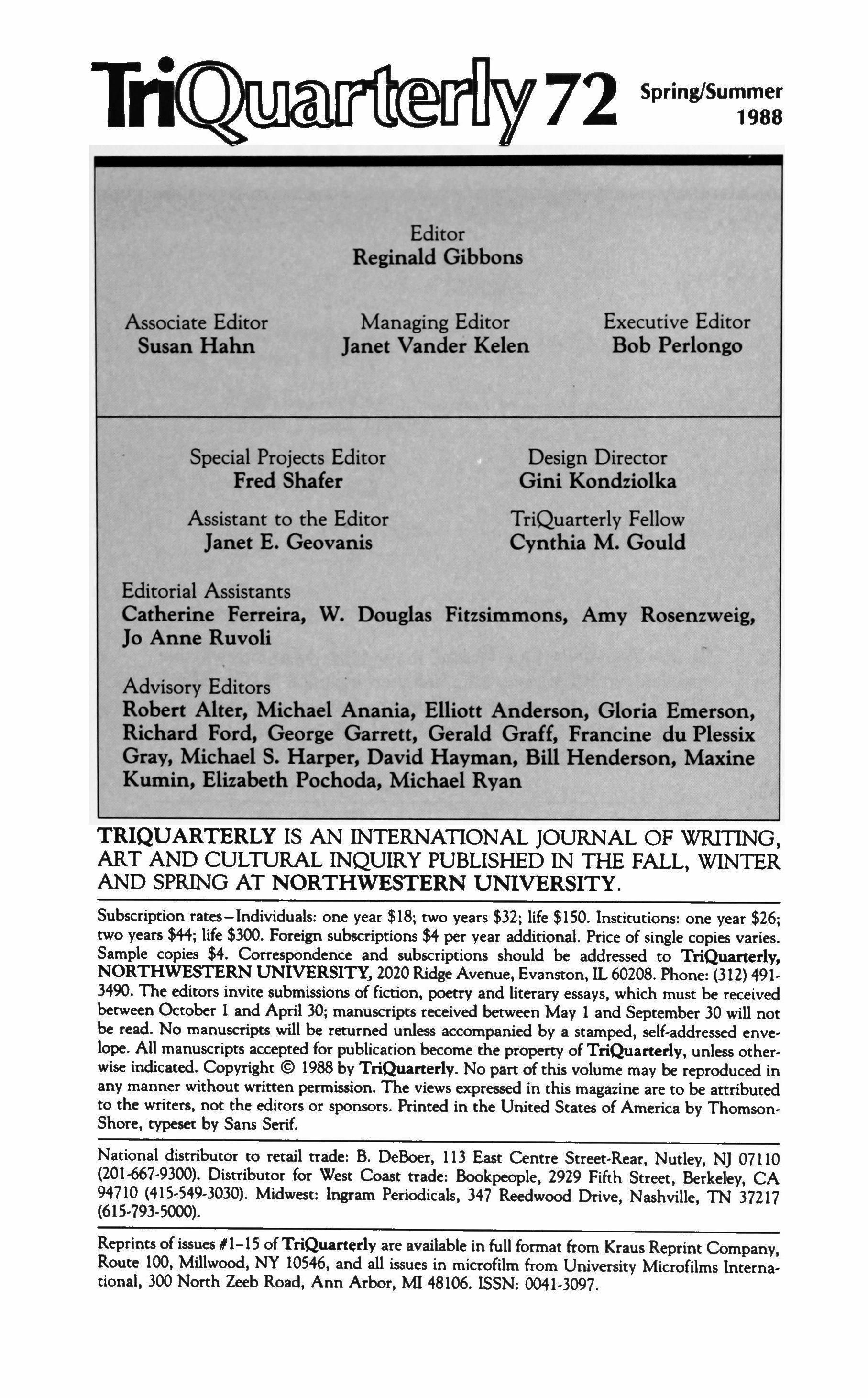
Editor
Reginald Gibbons
Managing Editor Janet Vander Kelen
Special Projects Editor Fred Shafer
Assistant to the Editor Janet E. Geovanis
Editorial Assistants
Executive Editor Bob Perlongo
Design Director Gini Kondziolka
TriQuarterly Fellow Cynthia M. Gould
Catherine Ferreira, W. Douglas Fitzsimmons, Amy Rosenzweig, Jo Anne Ruvoli
Advisory Editors
Robert Alter, Michael Anania, Elliott Anderson, Gloria Emerson, Richard Ford, George Garrett, Gerald Graff, Francine du Plessix Gray, Michael S. Harper, David Hayman, Bill Henderson, Maxine Kumin, Elizabeth Pochoda, Michael Ryan
TRIQUARTERLY IS AN INTERNATIONAL JOURNAL OF WRITING, ART AND CULTURAL INQUIRY PUBLISHED IN THE FALL, WINTER AND SPRING AT NORTHWESTERN UNIVERSITY.
Subscription rates-Individuals: one year $18; two years $32; life $150. Institutions: one year $26; two years $44; life $300. Foreign subscriptions $4 per year additional. Price of single copies varies. Sample copies $4. Correspondence and subscriptions should be addressed to TriQuarterlv. NORTHWESTERN UNIVERSITY. 2020 Ridge Avenue, Evanston, IL 60208. Phone: (312) 4913490. The editors invite submissions of fiction, poetry and literary essays, which must be received between October 1 and April 30; manuscripts received between May 1 and September 30 will not be read. No manuscripts will be returned unless accompanied by a stamped, self-addressed envelope. All manuscripts accepted for publication become the property of TriQuarterly, unless otherwise indicated. Copyright © 1988 by TriQuarterlv. No part of this volume may be reproduced in any manner without written permission. The views expressed in this magazine are to be attributed to the writers, not the editors or sponsors. Printed in the United States of America by ThomsonShore, typeset by Sans Serif.
National distributor to retail rrade: B. DeBoer, 113 East Centre Street-Rear, Nutley, NJ 07110 (201-667-9300). Distributor for West Coast rrade: 8ookpeople, 2929 Fifth Street, Berkeley, CA 94710 (415-549-3030). Midwest: Ingram Periodicals, 347 Reedwood Drive, Nashville, TN 37217 (615-793-5000).
Reprints of issues II-IS ofTriQuarterlv are available in full format from Kraus Reprint Company, Route 100, Millwood, NY 10546, and all issues in microfilm from University Microfilms International, 300 North Zeeb Road, Ann Arbor, MI 48106. lSSN: 0041-3097.
72 Spring/Summer
1988

"In the Air, Over Our Heads," a story by Amy Herrick that appeared in TriQuarterly #67, has been included in The Editors' Clwice, Volume IV, a Bantam/Wampeter Press book compiled by George E. Murphy, jr., and published simultaneously in hardcover and trade paperback.
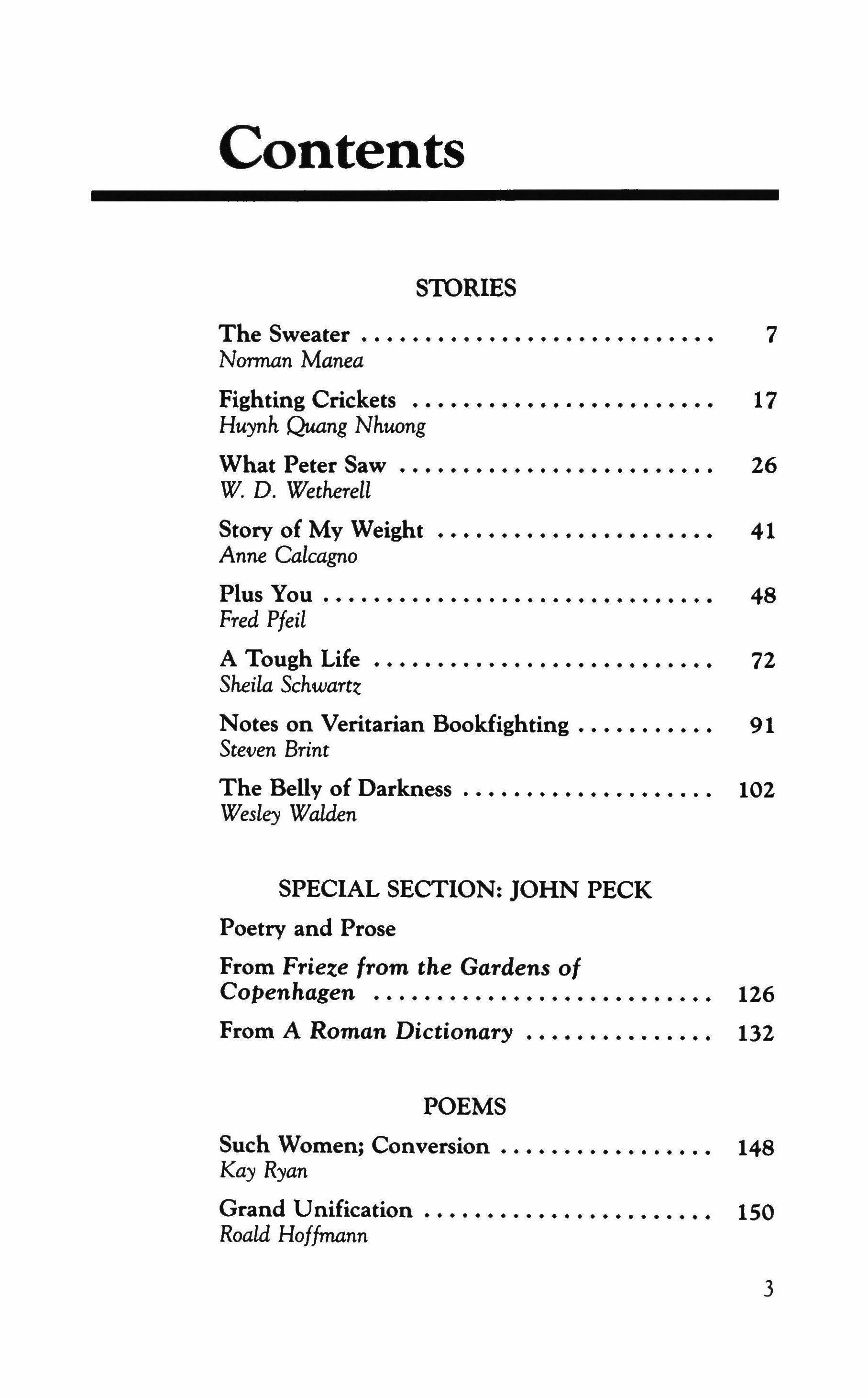
Contents STORIES The Sweater 7 Norman Manea Fighting Crickets 17 Huynh Quang Nhuong What Peter Saw ••••••••....•.•.•..•••••• 26 W. D. Wetherell Story of My Weight •••••.....••....•••••• 41 Anne Calcagno Plus You. 48 Fred Pfeil A Tough Life 72 Sheila Schwartz Notes on Veritarian Bookfighting 91 Steven Brint The Belly of Darkness 102 Wesley Walden SPECIAL SECTION: JOHN PECK Poetry and Prose From Frieze from the Gardens of Copenhagen •.••.••.•••••••••••.•••.••• 126 From A Roman Dictionary 132 POEMS Such Women; Conversion. 148 Kay Ryan Grand Unification 150 Roald Hoffmann 3
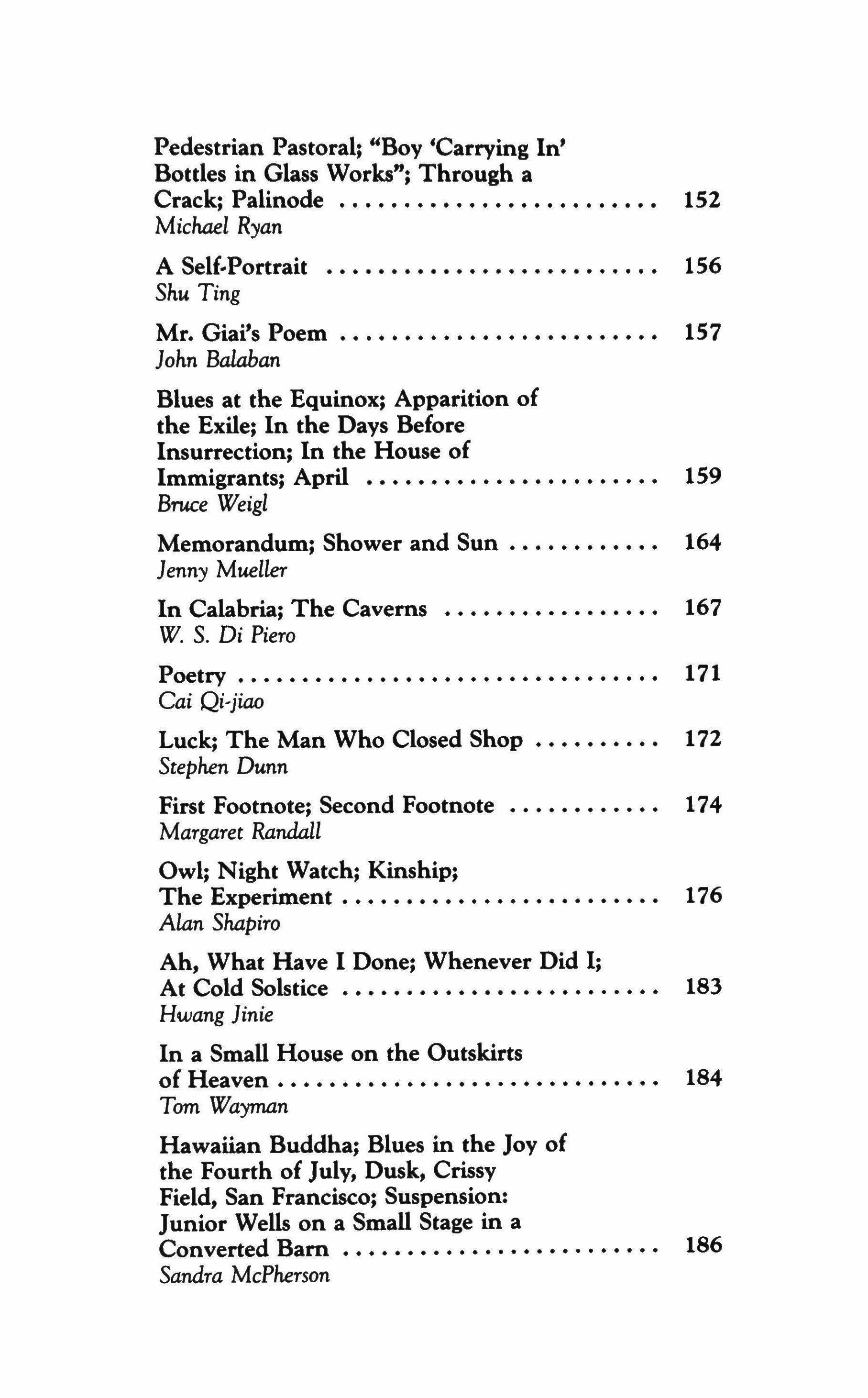
Pedestrian Pastoral; "Boy 'Carrying In' Bottles in Glass Works"; Through a Crack; Palinode ..••..•.•...•••..••..•... 152 Michael Ryan A Self-Portrait 156 Shu Ting Mr. Giai's Poem 157 John Balaban Blues at the Equinox; Apparition of the Exile; In the Days Before Insurrection; In the House of Immigrants; April •.••••••••••••...•••••• 159 Bruce Weigl Memorandum; Shower and Sun. 164 Jenny Mueller In Calabria; The Caverns •.••...•...•••••• 167 W. S. t» Piero Poetry 171 Cai Qi-jiao Luck; The Man Who Closed Shop •.•••••••• 172 Stephen Dunn First Footnote; Second Footnote ....•....... 174 Margaret Randall Owl; Night Watch; Kinship; The Experiment 176 Alan Shapiro Ah, What Have I Done; Whenever Did I; At Cold Solstice 183 Hwang linie In a Small House on the Outskirts of Heaven 184 Tom Wayman Hawaiian Buddha; Blues in the Joy of the Fourth of July, Dusk, Crissy Field, San Francisco; Suspension: Junior Wells on a Small Stage in a Converted Bam •••.•.•...•...•.....••..• 186 Sandra McPherson
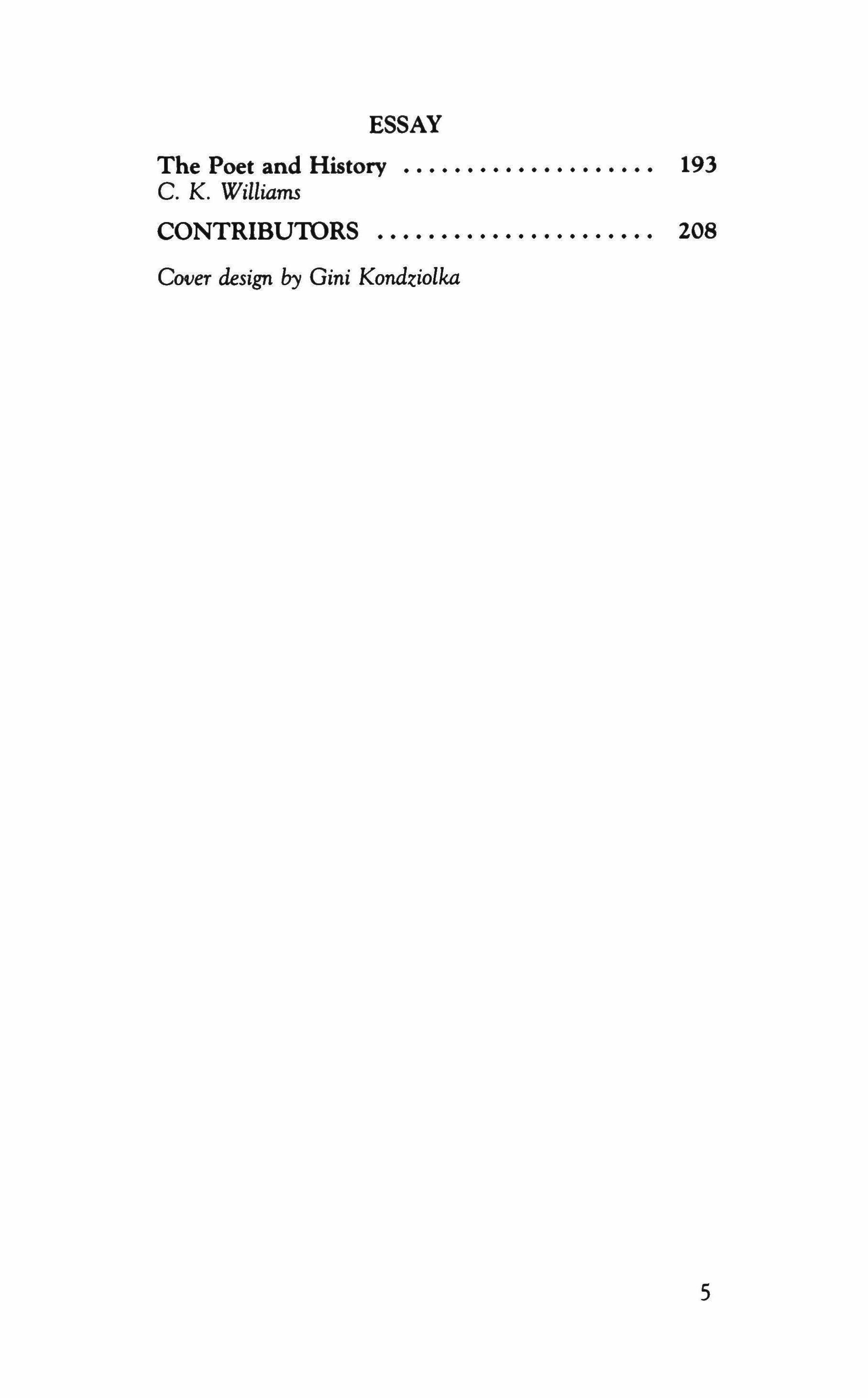
The Poet and History 193
C. K. Williams
CONTRIBUTORS 208
Cover design by Gini Kondziolka
ESSAY
5

The Sweater
Norman Manea

She would leave Monday and return on Friday. She would leave crying as if it were for the last time. Next time she would not have the strength to leave us alone-so much can happen in a week. Or at the end of her days away a miracle would occur; she would not have to leave us anymore.
The sky would suddenly open; we would find ourselves in a real train, not like the one they unloaded us from, like cattle to slaughter, in this empty place at the end of the world. A warm, brightly lit train with soft seats kind, polite ladies would serve us any kind of food we wanted, as is the right of travelers returning from the other world. Or by Friday, when she should corne back, this endless ashen sky, which we kept waiting with dread to enter at last, and have done with everything, would corne crashing down and swallow us up.
She returned hurriedly, panting, bent under the weight of her sack, which bulged with the days and nights she labored for us. She looked like a shadow; she had withered; she had turned black. We waited at the window for her to rise slowly out of the smoke of the plain as she approached feverishly, a phantom. She had fought, we knew, she had begged; finally they had allowed her to go to the foreign village nearby. She had nowhere to run, and we stayed where we were. They paid for Father's work with a quarter loafofbread a day. Without her, we would have died at the beginning.
So they had let her go, with their cynical goodwill accepting her pleas as a game worth playing a while longer, if only to interrupt it suddenly with an abundance of cruelty and pleasure.
Monday to Friday she knitted for those local peasants whose language she did not know.
7
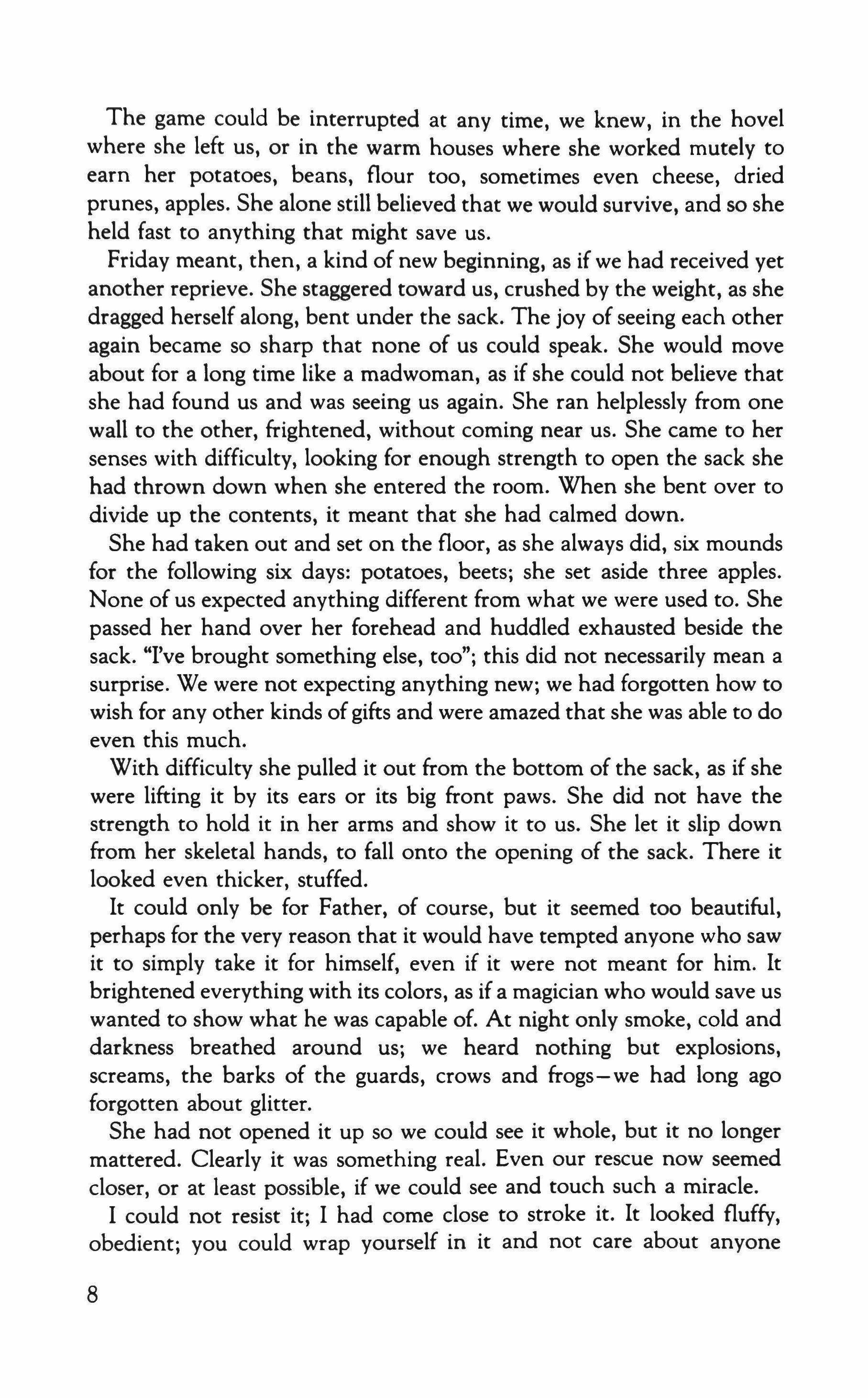
The game could be interrupted at any time, we knew, in the hovel where she left us, or in the warm houses where she worked mutely to earn her potatoes, beans, flour too, sometimes even cheese, dried prunes, apples. She alone still believed that we would survive, and so she held fast to anything that might save us.
Friday meant, then, a kind of new beginning, as if we had received yet another reprieve. She staggered toward us, crushed by the weight, as she dragged herself along, bent under the sack. The joy of seeing each other again became so sharp that none of us could speak. She would move about for a long time like a madwoman, as if she could not believe that she had found us and was seeing us again. She ran helplessly from one wall to the other, frightened, without coming near us. She came to her senses with difficulty, looking for enough strength to open the sack she had thrown down when she entered the room. When she bent over to divide up the contents, it meant that she had calmed down.
She had taken out and set on the floor, as she always did, six mounds for the following six days: potatoes, beets; she set aside three apples. None of us expected anything different from what we were used to. She passed her hand over her forehead and huddled exhausted beside the sack. "I've brought something else, too"; this did not necessarily mean a surprise. We were not expecting anything new; we had forgotten how to wish for any other kinds ofgifts and were amazed that she was able to do even this much.
With difficulty she pulled it out from the bottom of the sack, as if she were lifting it by its ears or its big front paws. She did not have the strength to hold it in her arms and show it to us. She let it slip down from her skeletal hands, to fall onto the opening of the sack. There it looked even thicker, stuffed.
It could only be for Father, of course, but it seemed too beautiful, perhaps for the very reason that it would have tempted anyone who saw it to simply take it for himself, even if it were not meant for him. It brightened everything with its colors, as if a magician who would save us wanted to show what he was capable of. At night only smoke, cold and darkness breathed around us; we heard nothing but explosions, screams, the barks of the guards, crows and frogs-we had long ago forgotten about glitter.
She had not opened it up so we could see it whole, but it no longer mattered. Clearly it was something real. Even our rescue now seemed closer, or at least possible, if we could see and touch such a miracle.
I could not resist it; I had come close to stroke it. It looked fluffy, obedient; you could wrap yourself in it and not care about anyone
8
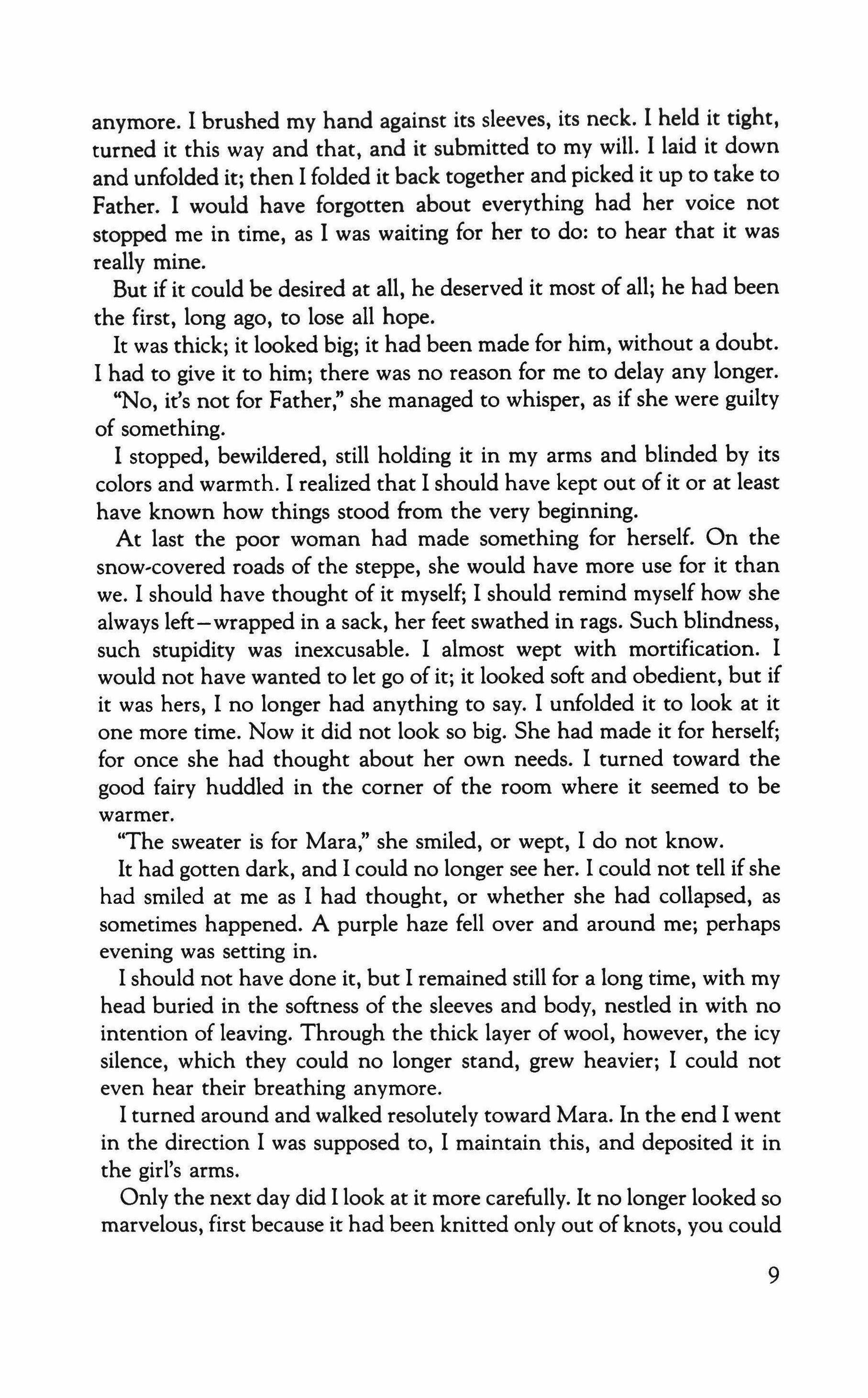
anymore. I brushed my hand against its sleeves, its neck. I held it tight, turned it this way and that, and it submitted to my will. I laid it down and unfolded it; then I folded it back together and picked it up to take to Father. I would have forgotten about everything had her voice not stopped me in time, as I was waiting for her to do: to hear that it was really mine.
But if it could be desired at all, he deserved it most of all; he had been the first, long ago, to lose all hope.
It was thick; it looked big; it had been made for him, without a doubt. I had to give it to him; there was no reason for me to delay any longer.
"No, it's not for Father," she managed to whisper, as if she were guilty of something.
I stopped, bewildered, still holding it in my arms and blinded by its colors and warmth. I realized that I should have kept out of it or at least have known how things stood from the very beginning.
At last the poor woman had made something for herself. On the snow-covered roads of the steppe, she would have more use for it than we. I should have thought of it myself; I should remind myself how she always left-wrapped in a sack, her feet swathed in rags. Such blindness, such stupidity was inexcusable. I almost wept with mortification. I would not have wanted to let go of it; it looked soft and obedient, but if it was hers, I no longer had anything to say. I unfolded it to look at it one more time. Now it did not look so big. She had made it for herself; for once she had thought about her own needs. I turned toward the good fairy huddled in the corner of the room where it seemed to be warmer.
"The sweater is for Mara," she smiled, or wept, I do not know.
It had gotten dark, and I could no longer see her. I could not tell if she had smiled at me as I had thought, or whether she had collapsed, as sometimes happened. A purple haze fell over and around me; perhaps evening was setting in.
I should not have done it, but I remained still for a long time, with my head buried in the softness of the sleeves and body, nestled in with no intention of leaving. Through the thick layer of wool, however, the icy silence, which they could no longer stand, grew heavier; I could not even hear their breathing anymore.
I turned around and walked resolutely toward Mara. In the end I went in the direction I was supposed to, I maintain this, and deposited it in the girl's arms.
Only the next day did I look at it more carefully. It no longer looked so marvelous, first because it had been knitted only out of knots, you could
9

see that. I turned it inside out and showed Mara to convince her, knot next to knot, as though it had grown only out of odds and ends barely tied together. Then the color. It seemed to have some more red here and there, it is true, but beyond that it was a mixture; you couldn't make anything out of it. White with gray, black, a trace of yellow, a remnant of green and another, darker green; a gray stripe, a bit of rotten earth brown next to a purple plum; over there a tip of pink ham, next to it a bird's red-and-yellow beak. Of course it had not been fashioned for a girl; anybody could have seen that. But I did not tell her. Mara's position, they told me, was special, and had to be preserved at all cost.
We loved her too much; we protected her more vigorously than ourselves-that is what they always told us. I could not show her that it was too big for her, and with a crew neck like a boy's. She could have seen that for herself, after all-she was old enough-but to do that she would have had to take it off again and look at it. She was allowed everything, of course. When she asked to keep it on they let her. The first few days at least she even slept in it, completely dressed. The cold froze us both day and night, it is true, especially at night. But if you tried to dress more warmly, the same plague befell you every time: lice. Undress, wash, cover yourself with other rags, clean ones; we boiled them and checked all their seams; otherwise it was disaster. I know very well that they would not have allowed me to sleep with all my clothes on three nights in a row. Even if she was the one they watched over most diligently. The moment they heard that someone had gotten sick at the other end of the pavilions, they would start to examine her. Obsessed, they felt her forehead, her neck; they would peer into her eyes, at her hair, her nails. What panic if she should have a hot forehead or warm hands
She had to go back alive at all cost, they would whisper. She had ended up among us by mistake. What would be said if she of all people were lost, and we returned, as if we had been careful to save only our own skins? Perhaps her mother had already found out where we were and was on her way here with proof to establish the truth. The little girl had nothing to do with our curse; she was innocent. Her mother had sent her to stay with an old friend for a few weeks, far away from the hospital where she had been admitted. Caught in the fury, taken together with us, she had come as far as this. Protests convinced no one; they did not have time for clarifications. They did not believe us. Of course we too, in our own way, were innocent; everyone shouted it to keep hope alive. But the case of this guest of ours seemed much more serious to us all. If the situation were not cleared up and the unfortunate
10
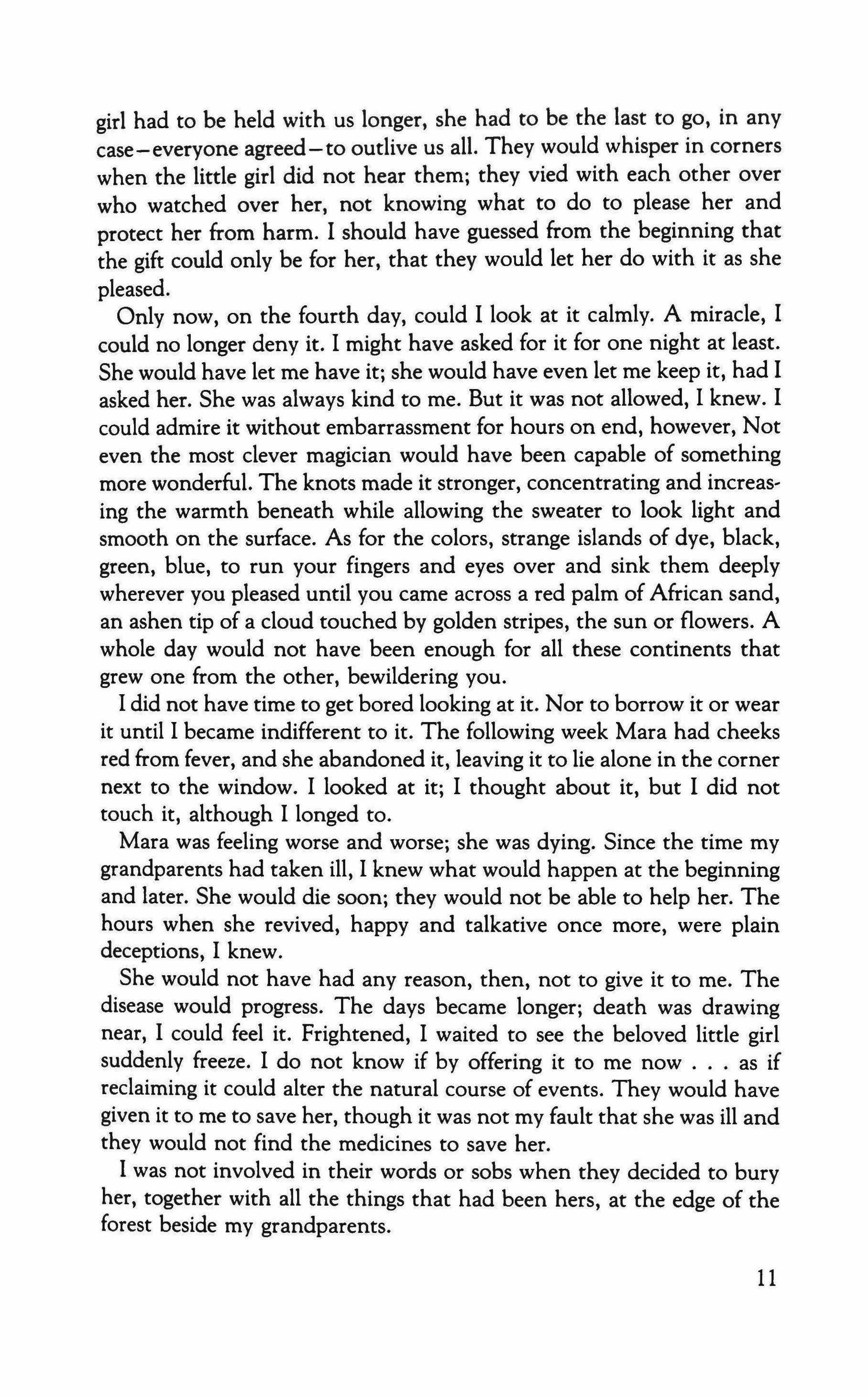
girl had to be held with us longer, she had to be the last to go, in any case-everyone agreed-to outlive us all. They would whisper in corners when the little girl did not hear them; they vied with each other over who watched over her, not knowing what to do to please her and protect her from harm. I should have guessed from the beginning that the gift could only be for her, that they would let her do with it as she pleased.
Only now, on the fourth day, could I look at it calmly. A miracle, I could no longer deny it. I might have asked for it for one night at least. She would have let me have it; she would have even let me keep it, had I asked her. She was always kind to me. But it was not allowed, I knew. I could admire it without embarrassment for hours on end, however, Not even the most clever magician would have been capable of something more wonderful. The knots made it stronger, concentrating and increasing the warmth beneath while allowing the sweater to look light and smooth on the surface. As for the colors, strange islands of dye, black, green, blue, to run your fingers and eyes over and sink them deeply wherever you pleased until you came across a red palm of African sand, an ashen tip of a cloud touched by golden stripes, the sun or flowers. A whole day would not have been enough for all these continents that grew one from the other, bewildering you.
I did not have time to get bored looking at it. Nor to borrow it or wear it until I became indifferent to it. The following week Mara had cheeks red from fever, and she abandoned it, leaving it to lie alone in the corner next to the window. I looked at it; I thought about it, but I did not touch it, although I longed to.
Mara was feeling worse and worse; she was dying. Since the time my grandparents had taken ill, I knew what would happen at the beginning and later. She would die soon; they would not be able to help her. The hours when she revived, happy and talkative once more, were plain deceptions, I knew.
She would not have had any reason, then, not to give it to me. The disease would progress. The days became longer; death was drawing near, I could feel it. Frightened, I waited to see the beloved little girl suddenly freeze. I do not know if by offering it to me now as if reclaiming it could alter the natural course of events. They would have given it to me to save her, though it was not my fault that she was ill and they would not find the medicines to save her.
I was not involved in their words or sobs when they decided to bury her, together with all the things that had been hers, at the edge of the forest beside my grandparents.
11
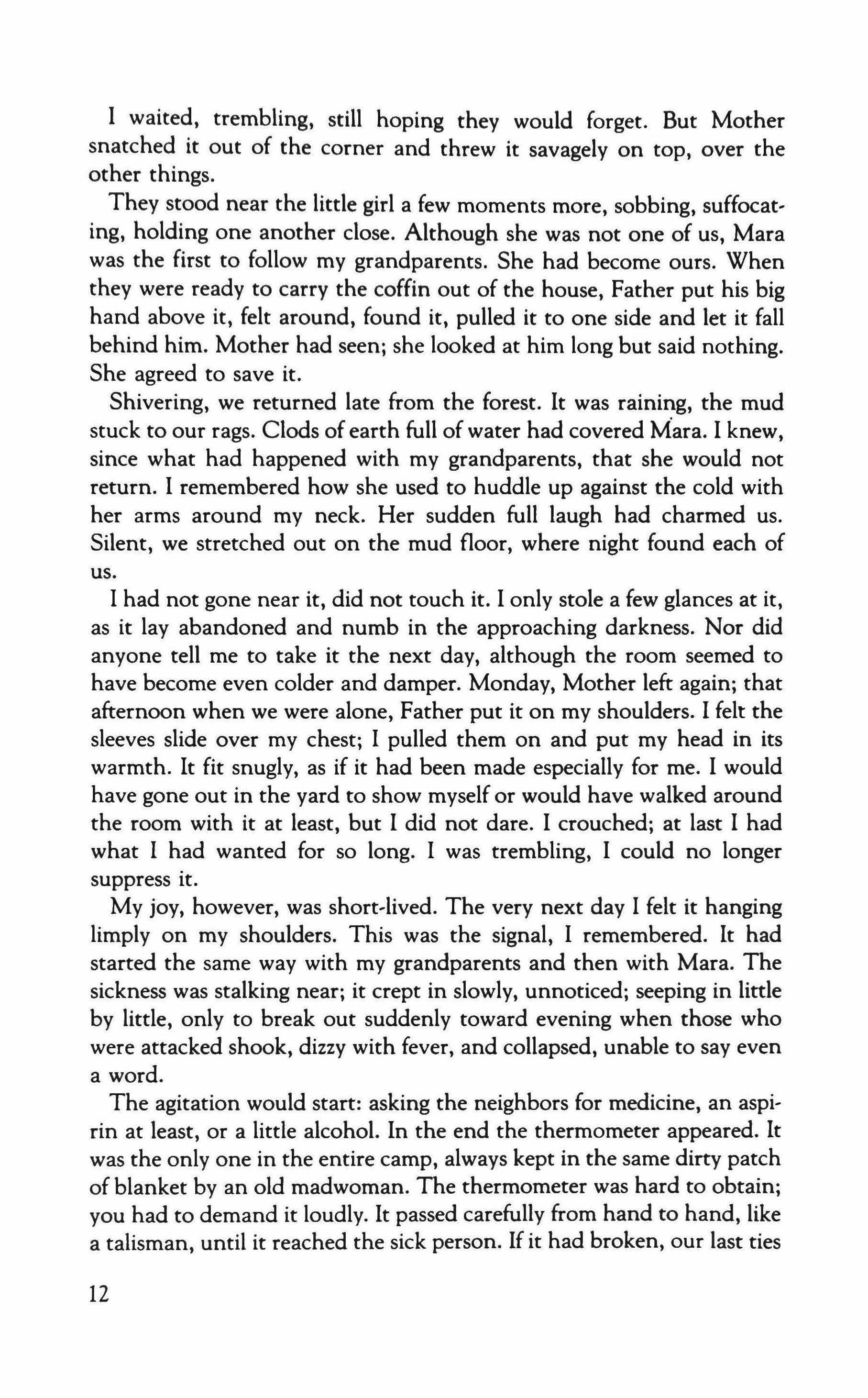
I waited, trembling, still hoping they would forget. But Mother snatched it out of the corner and threw it savagely on top, over the other things.
They stood near the little girl a few moments more, sobbing, suffocating, holding one another close. Although she was not one of us, Mara was the first to follow my grandparents. She had become ours. When they were ready to carry the coffin out of the house, Father put his big hand above it, felt around, found it, pulled it to one side and let it fall behind him. Mother had seen; she looked at him long but said nothing. She agreed to save it.
Shivering, we returned late from the forest. It was raining, the mud stuck to our rags. Clods of earth full of water had covered 'Mara. I knew, since what had happened with my grandparents, that she would not return. I remembered how she used to huddle up against the cold with her arms around my neck. Her sudden full laugh had charmed us. Silent, we stretched out on the mud floor, where night found each of us.
I had not gone near it, did not touch it. I only stole a few glances at it, as it lay abandoned and numb in the approaching darkness. Nor did anyone tell me to take it the next day, although the room seemed to have become even colder and damper. Monday, Mother left again; that afternoon when we were alone, Father put it on my shoulders. I felt the sleeves slide over my chest; I pulled them on and put my head in its warmth. It fit snugly, as if it had been made especially for me. I would have gone out in the yard to show myself or would have walked around the room with it at least, but I did not dare. I crouched; at last I had what I had wanted for so long. I was trembling, I could no longer suppress it.
My joy, however, was short-lived. The very next day I felt it hanging limply on my shoulders. This was the signal, I remembered. It had started the same way with my grandparents and then with Mara. The sickness was stalking near; it crept in slowly, unnoticed; seeping in little by little, only to break out suddenly toward evening when those who were attacked shook, dizzy with fever, and collapsed, unable to say even a word.
The agitation would start: asking the neighbors for medicine, an aspirin at least, or a little alcohol. In the end the thermometer appeared. It was the only one in the entire camp, always kept in the same dirty patch of blanket by an old madwoman. The thermometer was hard to obtain; you had to demand it loudly. It passed carefully from hand to hand, like a talisman, until it reached the sick person. If it had broken, our last ties
12

with the normal world would have disappeared, and we still wished to be tied to it.
This time too the doctor would follow. The distinguished gentleman with slender glasses and confidence in his cures had been replaced by a tired, ragged, hunched-over consumptive. We called him doctor also; he too had small white hands, although he did not wash them at the beginning and end of his visit, as in the past. His gestures and consultations were as short as possible.
He had laid his hand on the little girl's forehead, he had looked at her fingers; then he had felt for her veins and counted the number of pulsations with his lips. He had uncovered her thin yellowish body and turned it to this side and that to show the spots, more and more of them: the disease had completely taken over the body of the little patient. There was nothing else to do but raise his hands and mutter the name of the agony, which would last only a few days more. Only if a miracle, only a miracle he raised his hands once more, limply, to beg, as did everyone, for the miracle; then he slipped out, bent and ashamed, just as he had come.
Evening was approaching; I felt the light growing more and more tired, ready to give up, and especially the bitter cold that suddenly pierced me. The evening chill had begun to settle in when I felt some' thing strange; it was as if it had abandoned me, as if it were no longer protecting me; inert and cold, it now hung exhausted over me. It must have been carrying the disease within it the whole time. It had betrayed Mara too, but she had not been able to take it with her when she died. My turn had come. I would have taken it off and burned it, thrown it out, but it was too late; that would serve no purpose now.
I would not have wanted to end up in that dark wet grave where you did not know what would follow. I admitted guiltily that I should not have pursued the colors and the warmth so impatiently. I should have controlled myself, waited; I should not have followed Mara's suffering so shamelessly, and afterward, not content until I felt it cover me. I should not have been so weak and blind, so impatient that when I had it I was overcome by tears of joy. I must have been seen, noticed for my base behavior and greed. Had I given it up, if not at the beginning, at least after Mara's death, the punishment might have been avoided.
I could take it no longer; I went to the window. Father as usual was looking through the narrow aperture of light for a miracle or a disaster. Toward evening hopelessness would overcome him; he no longer knew how to suppress it.
"The disease. The disease, I'm sick." But at first he did not hear me. He
13

turned suddenly, put his hand on my forehead, my neck. He pulled me in front of the window and asked me to count, to stick out my tongue and to open my eyes. "You're pale, very pale, but you'll be all right," he said and picked me up in his big arms to sleep.
I did not have the strength to speak. I pointed a few times to the poisoned sleeves and raised my hand toward the diseased collar, but he did not notice. It had become very dark. I was covered by his big smile as he bent over me and put his palm on my moist brow.
I woke up in a coffin being lowered into a grave next to Mara; then I forgot everything. I was shivering; day had come; I wanted to tell them that I would not make it to Friday, so there would be no one to save me. Night came; I saw nothing except a thick cloud, ever thicker, and I heard the frightened voice above.
I felt the puff of hurried breathing. "Good that I've come, I've come in time," she said. I also heard the high voice of the doctor gasping nearby. "He doesn't have spots; there are no symptoms," that is what he said: "symptoms." It sounded nice, "symptoms." I dragged the word after me; I was falling, tumbling down; symptoms, it was almost a caress. I was sliding, going down; I no longer knew anything. Wet slippery fish passed over my burning lips; they licked my ears, and I flowed with them. Now and then I shook the waves from my chest and tried to open my eyes. I saw Mara, transparent, made of wax; the sharp yellow teeth of the doctor, the grave again.
The drowning probably lasted several days, until I again heard that familiar voice. "I feel better about leaving; I'm glad it's over." I had escaped the arms of death; coming to, I staggered as I attempted my first steps along the walls, with Father's arm to support me, to the window facing the steppe, which had swallowed everything.
I managed to ask if I still had spots.
"You never had them. You weren't sick. Only a scare, that's what the doctor said. You were delirious, raving the whole time. 'It's stuck to me,' you kept saying. 'It's stuck to me,' and you tried to raise your hands."
He lifted me under my arms so I could look out the window. He gave me hot gruel. Friday morning, the steppe gave Mother back to us. "I came earlier; I told them you were sick. They gave me some lard to give you strength."
And so I gained strength; I could look at it again. Defeated, diminished, obedient in a corner, ready to serve me. But I had become some' one else. I let it wait; I no longer looked at it. They had covered me with a thick blanket; I no longer felt even a trace of cold. Everyone revolved around me, determined not to abandon me again.
14

It had shrunk smaller and smaller. I allowed it finally to embrace me, and it proved not to be so dangerous. In the time it had lain thrown rolled-up next to the humid walls, its prickly uneven hairs had softened somewhat. I put my nose, my whole face in the roughness ofthe sweater, once so soft and good, to be intoxicated with its warmth, like that of toasted bread or baked potatoes, or fresh sawdust, or the fragrance of milk, rain, leaves, the longing for pencils and apples. But it was not like that; it was more like a strange odor, of mold. Something rotten and heavy. Or only sharp, choking, I don't remember. It had blackened and dried; it was becoming a weary stranger.
We got more used to each other in the next few days; we were begin' ning to recognize each other. We were slowly finding each other again. It was becoming its old self, more and more fluffy and warm. The colors had come alive; again there was a world of dyes. Still, its nearness frightened me, oppressed me. I had wanted it to be mine alone. My impatience had hastened Mara's death! I shuddered although no one but it had found me out. I approached it without courage, weak. My arms would get tangled in it; I could not get it over my head. When at last it clung to me, already too tight, it seemed to choke me. I was no longer afraid of the sickness. Mara had taken away its power, I knew; it could not give me the sickness. Only the guilt, the terror, the embrace of the hot sleeves around my neck as the little girl tried every night to huddle next to me against the cold.
But I was getting used to it, and it had also calmed down. It no longer caught my eye to keep reminding me. It obeyed me; it served me as it faded, adapted. Often I forgot about myself; I had acquired a certain confidence.
But I did not take it to the doctor's burial; that would have been too much. It was during a terrible snowstorm; I trembled with horror and bitter cold. I had hidden it well so no one would find it. I forgot about it for quite a few days and set it free only much later, when the burials had multiplied to several every day. There were no more reprieves anywhere; there was no longer any reason to be careful. They died by the dozens; the curse fell at random, exactly on those who least expected it. They no longer had time for me, nor I for myself; the terror had become every' one's, huge, ready to swallow us all. We shrank stunned; we forgot about ourselves and everyone else.
Baseness, guilt, nothing counted anymore. It had understood that too. Its color and smell faded, allowing it to pass unobserved. It was merely functional: I took it with me every day; it protected me, that was all. It stretched out perfectly, a shield, without a hint of our former glorious
15
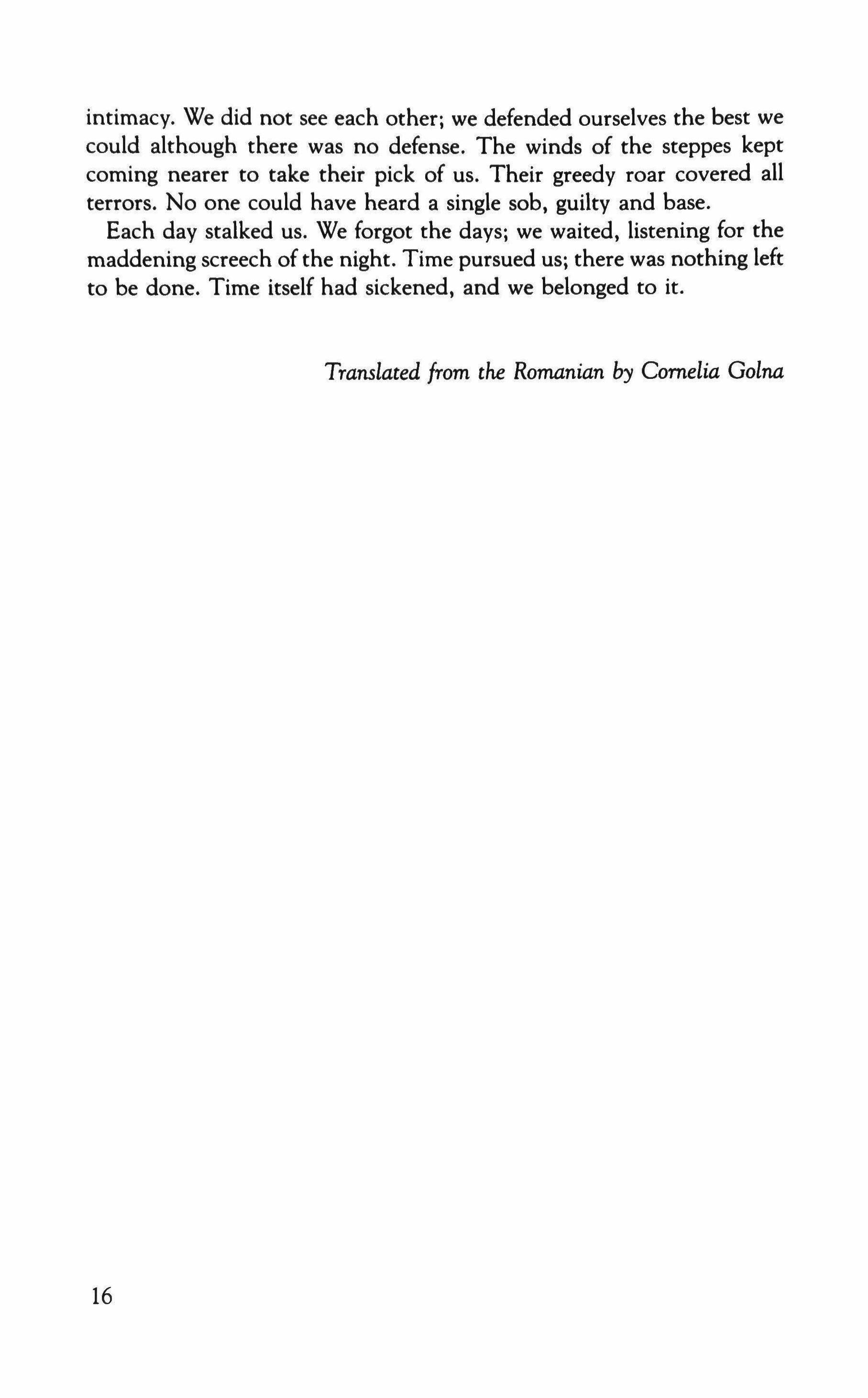
intimacy. We did not see each other; we defended ourselves the best we could although there was no defense. The winds of the steppes kept coming nearer to take their pick of us. Their greedy roar covered all terrors. No one could have heard a single sob, guilty and base.
Each day stalked us. We forgot the days; we waited, listening for the maddening screech of the night. Time pursued us; there was nothing left to be done. Time itself had sickened, and we belonged to it.
16
Translated from the Romanian by Cornelia Golna
Fighting Crickets
Huynh Quang Nhuong
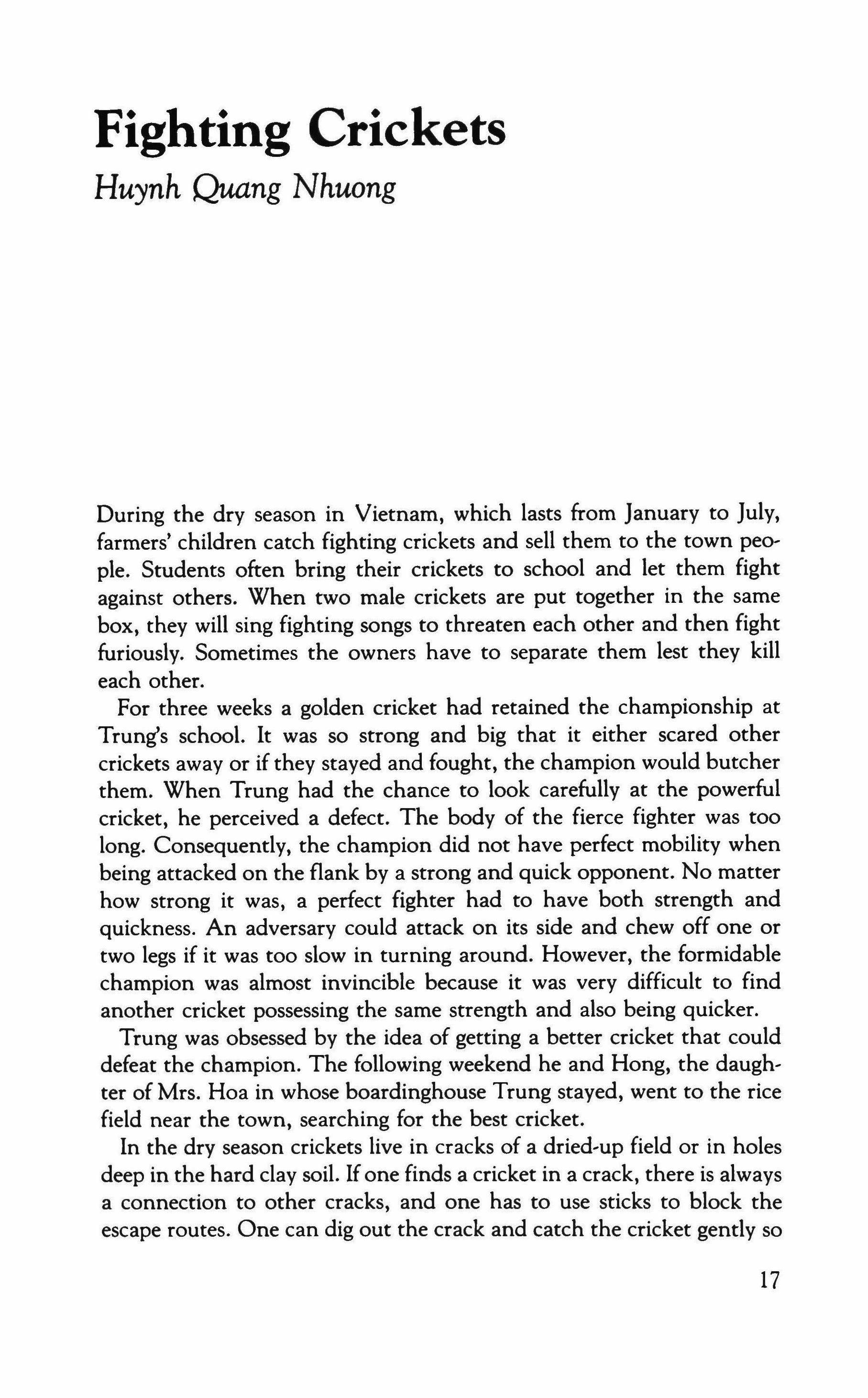
During the dry season in Vietnam, which lasts from January to July, farmers' children catch fighting crickets and sell them to the town people. Students often bring their crickets to school and let them fight against others. When two male crickets are put together in the same box, they will sing fighting songs to threaten each other and then fight furiously. Sometimes the owners have to separate them lest they kill each other.
For three weeks a golden cricket had retained the championship at Trung's school. It was so strong and big that it either scared other crickets away or if they stayed and fought, the champion would butcher them. When Trung had the chance to look carefully at the powerful cricket, he perceived a defect. The body of the fierce fighter was too long. Consequently, the champion did not have perfect mobility when being attacked on the flank by a strong and quick opponent. No matter how strong it was, a perfect fighter had to have both strength and quickness. An adversary could attack on its side and chew off one or two legs if it was too slow in turning around. However, the formidable champion was almost invincible because it was very difficult to find another cricket possessing the same strength and also being quicker.
Trung was obsessed by the idea of getting a better cricket that could defeat the champion. The following weekend he and Hong, the daughter of Mrs. Hoa in whose boardinghouse Trung stayed, went to the rice field near the town, searching for the best cricket.
In the dry season crickets live in cracks of a dried-up field or in holes deep in the hard clay soil. If one finds a cricket in a crack, there is always a connection to other cracks, and one has to use sticks to block the escape routes. One can dig out the crack and catch the cricket gently so
17
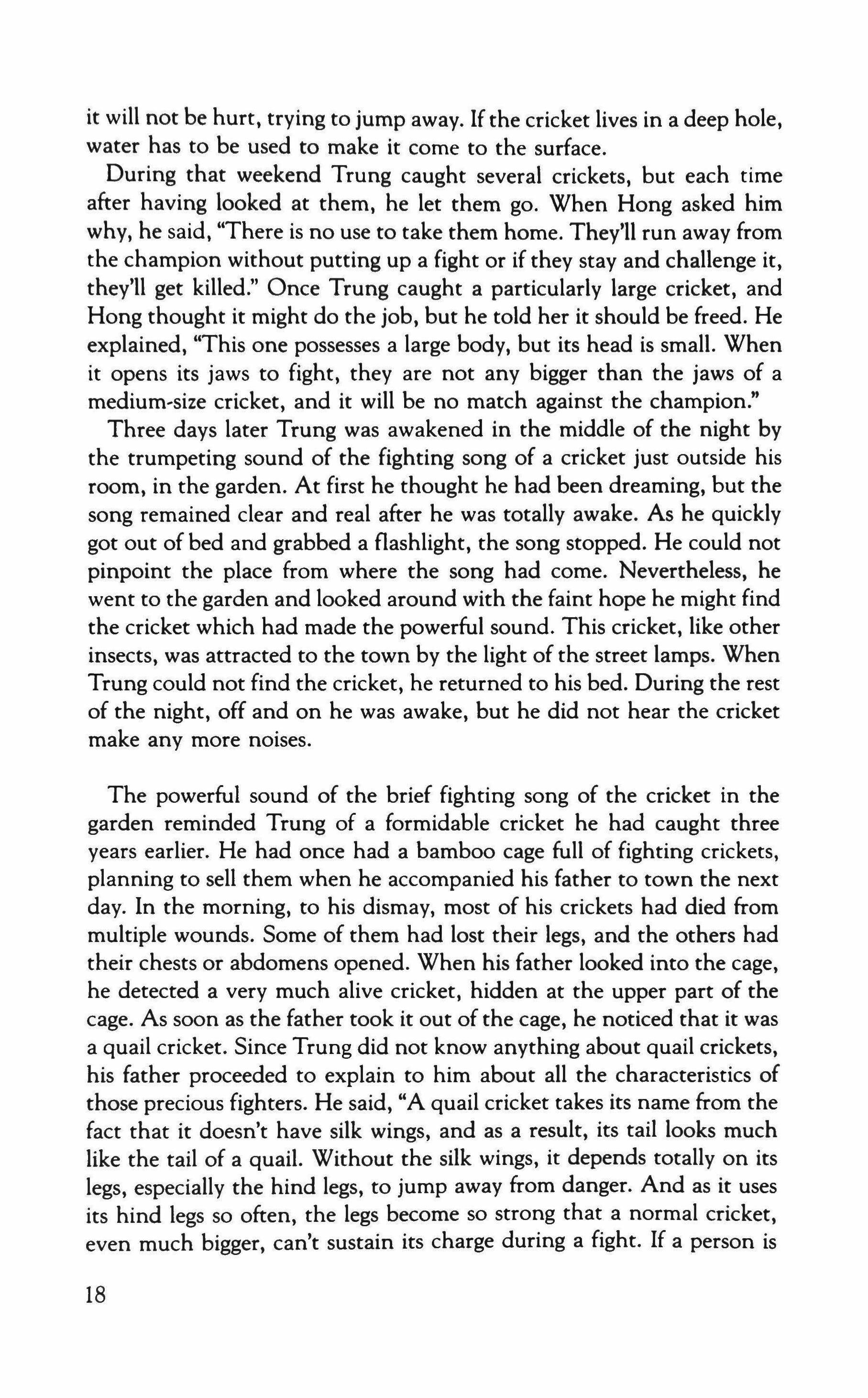
it will not be hurt, trying to jump away. If the cricket lives in a deep hole, water has to be used to make it come to the surface.
During that weekend Trung caught several crickets, but each time after having looked at them, he let them go. When Hong asked him why, he said, "There is no use to take them home. They'll run away from the champion without putting up a fight or if they stay and challenge it, they'll get killed." Once Trung caught a particularly large cricket, and Hong thought it might do the job, but he told her it should be freed. He explained, "This one possesses a large body, but its head is small. When it opens its jaws to fight, they are not any bigger than the jaws of a medium-size cricket, and it will be no match against the champion."
Three days later Trung was awakened in the middle of the night by the trumpeting sound of the fighting song of a cricket just outside his room, in the garden. At first he thought he had been dreaming, but the song remained clear and real after he was totally awake. As he quickly got out of bed and grabbed a flashlight, the song stopped. He could not pinpoint the place from where the song had come. Nevertheless, he went to the garden and looked around with the faint hope he might find the cricket which had made the powerful sound. This cricket, like other insects, was attracted to the town by the light of the street lamps. When Trung could not find the cricket, he returned to his bed. During the rest of the night, off and on he was awake, but he did not hear the cricket make any more noises.
The powerful sound of the brief fighting song of the cricket in the garden reminded Trung of a formidable cricket he had caught three years earlier. He had once had a bamboo cage full of fighting crickets, planning to sell them when he accompanied his father to town the next day. In the morning, to his dismay, most of his crickets had died from multiple wounds. Some of them had lost their legs, and the others had their chests or abdomens opened. When his father looked into the cage, he detected a very much alive cricket, hidden at the upper part of the cage. As soon as the father took it out of the cage, he noticed that it was a quail cricket. Since Trung did not know anything about quail crickets, his father proceeded to explain to him about all the characteristics of those precious fighters. He said, "A quail cricket takes its name from the fact that it doesn't have silk wings, and as a result, its tail looks much like the tail of a quail. Without the silk wings, it depends totally on its legs, especially the hind legs, to jump away from danger. And as it uses its hind legs so often, the legs become so strong that a normal cricket, even much bigger, can't sustain its charge during a fight. If a person is
18
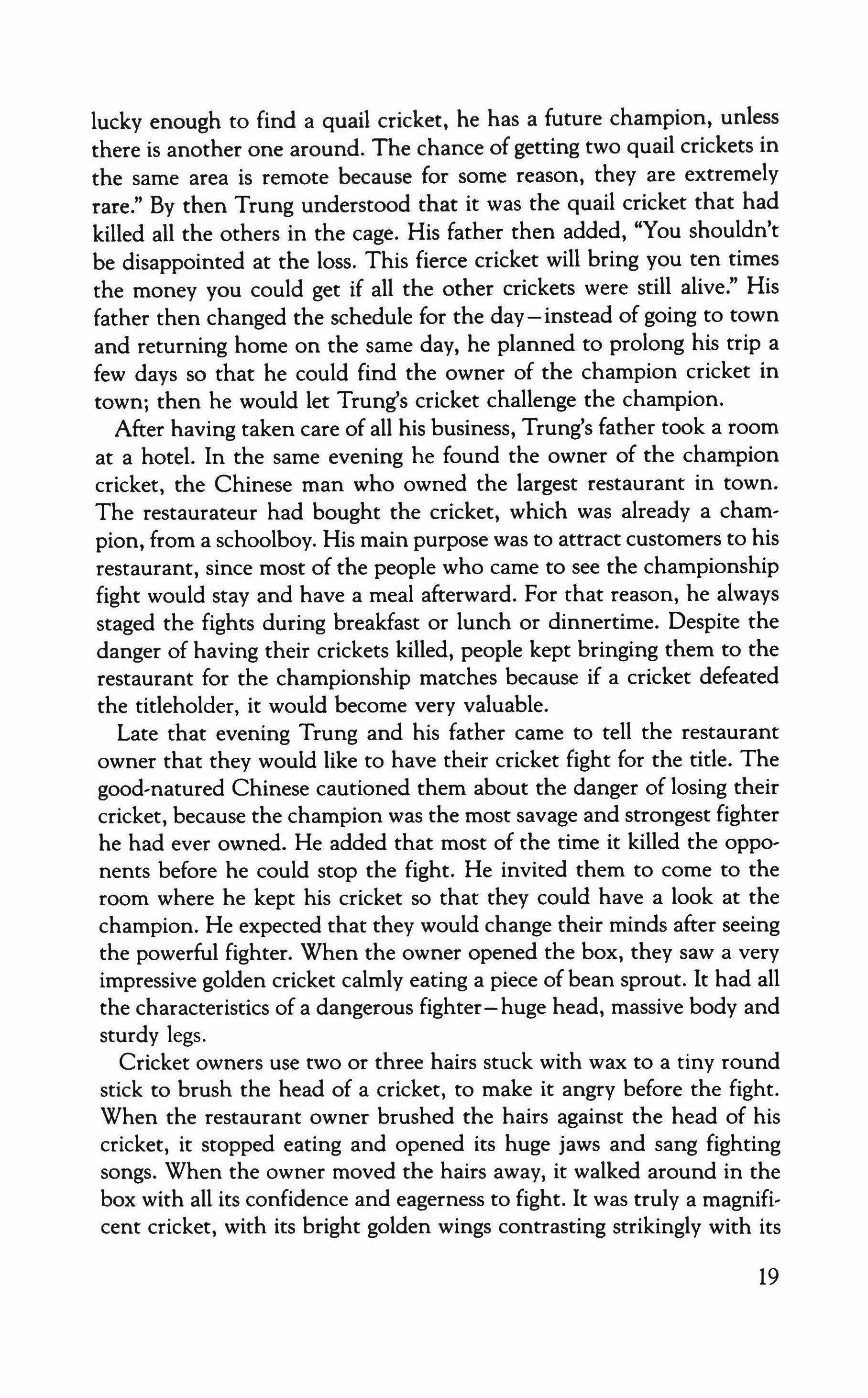
lucky enough to find a quail cricket, he has a future champion, unless there is another one around. The chance of getting two quail crickets in the same area is remote because for some reason, they are extremely rare." By then Trung understood that it was the quail cricket that had killed all the others in the cage. His father then added, "You shouldn't be disappointed at the loss. This fierce cricket will bring you ten times the money you could get if all the other crickets were still alive." His father then changed the schedule for the day - instead of going to town and returning home on the same day, he planned to prolong his trip a few days so that he could find the owner of the champion cricket in town; then he would let Trung's cricket challenge the champion.
After having taken care of all his business, Trung's father took a room at a hotel. In the same evening he found the owner of the champion cricket, the Chinese man who owned the largest restaurant in town. The restaurateur had bought the cricket, which was already a cham, pion, from a schoolboy. His main purpose was to attract customers to his restaurant, since most of the people who came to see the championship fight would stay and have a meal afterward. For that reason, he always staged the fights during breakfast or lunch or dinnertime. Despite the danger of having their crickets killed, people kept bringing them to the restaurant for the championship matches because if a cricket defeated the titleholder, it would become very valuable.
Late that evening Trung and his father came to tell the restaurant owner that they would like to have their cricket fight for the title. The good,natured Chinese cautioned them about the danger of losing their cricket, because the champion was the most savage and strongest fighter he had ever owned. He added that most of the time it killed the opponents before he could stop the fight. He invited them to come to the room where he kept his cricket so that they could have a look at the champion. He expected that they would change their minds after seeing the powerful fighter. When the owner opened the box, they saw a very impressive golden cricket calmly eating a piece of bean sprout. It had all the characteristics of a dangerous fighter-huge head, massive body and sturdy legs.
Cricket owners use two or three hairs stuck with wax to a tiny round stick to brush the head of a cricket, to make it angry before the fight. When the restaurant owner brushed the hairs against the head of his cricket, it stopped eating and opened its huge jaws and sang fighting songs. When the owner moved the hairs away, it walked around in the box with all its confidence and eagerness to fight. It was truly a magnificent cricket, with its bright golden wings contrasting strikingly with its
19
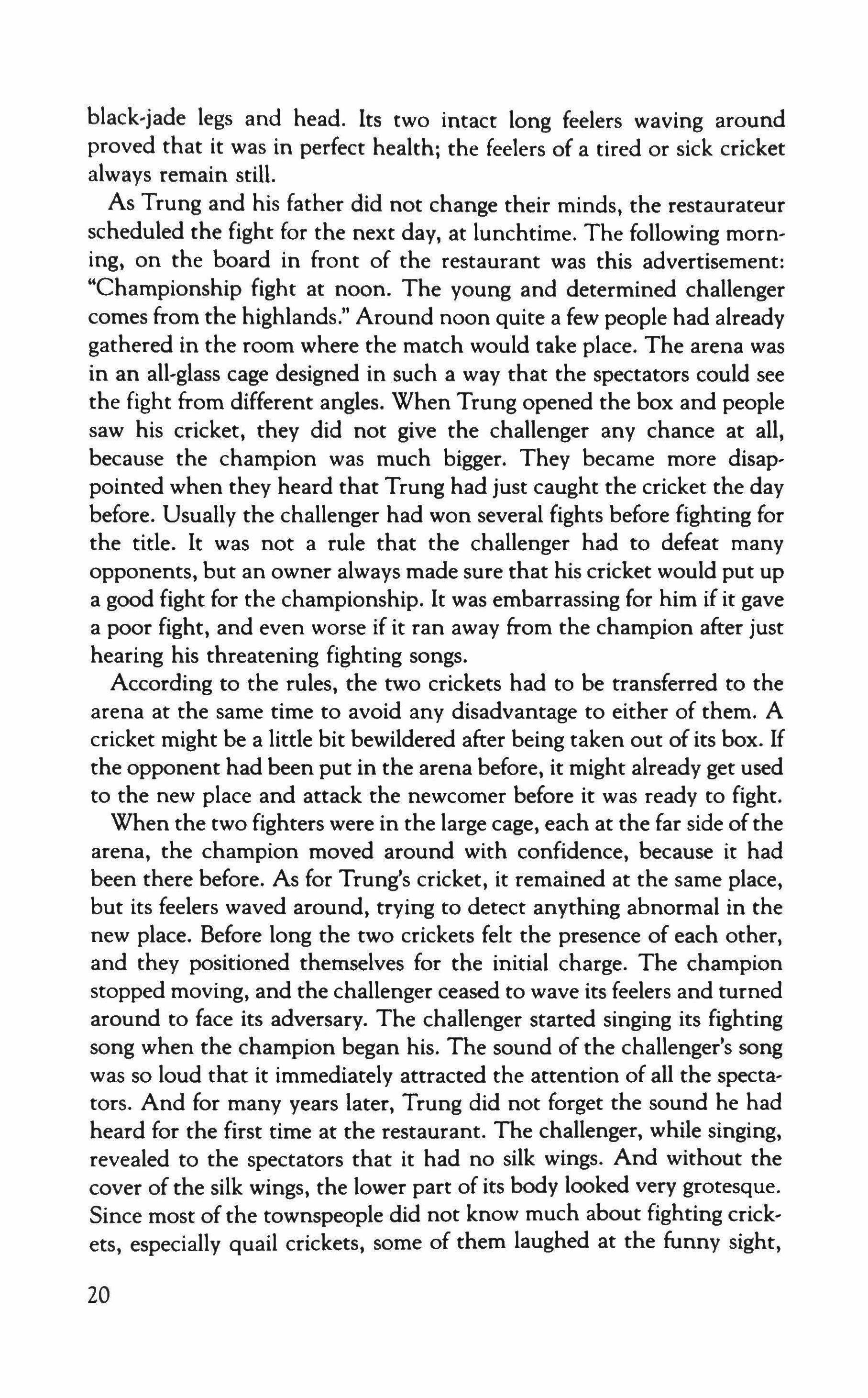
black-jade legs and head. Its two intact long feelers waving around proved that it was in perfect health; the feelers of a tired or sick cricket always remain still.
As Trung and his father did not change their minds, the restaurateur scheduled the fight for the next day, at lunchtime. The following morning, on the board in front of the restaurant was this advertisement: "Championship fight at noon. The young and determined challenger comes from the highlands." Around noon quite a few people had already gathered in the room where the match would take place. The arena was in an all-glass cage designed in such a way that the spectators could see the fight from different angles. When Trung opened the box and people saw his cricket, they did not give the challenger any chance at all, because the champion was much bigger. They became more disappointed when they heard that Trung had just caught the cricket the day before. Usually the challenger had won several fights before fighting for the title. It was not a rule that the challenger had to defeat many opponents, but an owner always made sure that his cricket would put up a good fight for the championship. It was embarrassing for him if it gave a poor fight, and even worse if it ran away from the champion after just hearing his threatening fighting songs.
According to the rules, the two crickets had to be transferred to the arena at the same time to avoid any disadvantage to either of them. A cricket might be a little bit bewildered after being taken out of its box. If the opponent had been put in the arena before, it might already get used to the new place and attack the newcomer before it was ready to fight.
When the two fighters were in the large cage, each at the far side ofthe arena, the champion moved around with confidence, because it had been there before. As for Trung's cricket, it remained at the same place, but its feelers waved around, trying to detect anything abnormal in the new place. Before long the two crickets felt the presence of each other, and they positioned themselves for the initial charge. The champion stopped moving, and the challenger ceased to wave its feelers and turned around to face its adversary. The challenger started singing its fighting song when the champion began his. The sound of the challenger's song was so loud that it immediately attracted the attention of all the spectators. And for many years later, Trung did not forget the sound he had heard for the first time at the restaurant. The challenger, while singing, revealed to the spectators that it had no silk wings. And without the cover of the silk wings, the lower part of its body looked very grotesque. Since most of the townspeople did not know much about fighting crickets, especially quail crickets, some of them laughed at the funny sight,
20
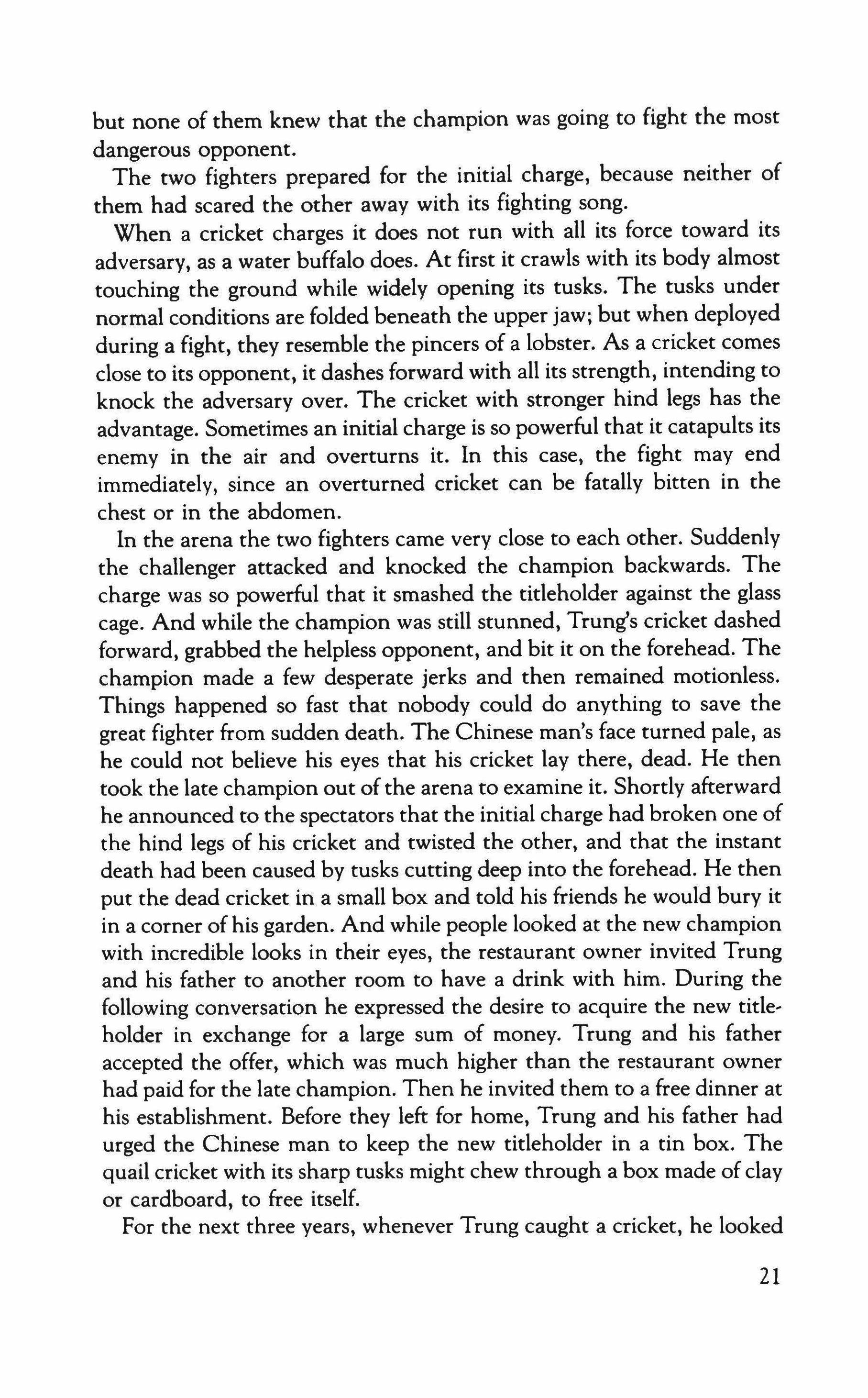
but none of them knew that the champion was going to fight the most dangerous opponent.
The two fighters prepared for the initial charge, because neither of them had scared the other away with its fighting song.
When a cricket charges it does not run with all its force toward its adversary, as a water buffalo does. At first it crawls with its body almost touching the ground while widely opening its tusks. The tusks under normal conditions are folded beneath the upper jaw; but when deployed during a fight, they resemble the pincers of a lobster. As a cricket comes close to its opponent, it dashes forward with all its strength, intending to knock the adversary over. The cricket with stronger hind legs has the advantage. Sometimes an initial charge is so powerful that it catapults its enemy in the air and overturns it. In this case, the fight may end immediately, since an overturned cricket can be fatally bitten in the chest or in the abdomen.
In the arena the two fighters came very close to each other. Suddenly the challenger attacked and knocked the champion backwards. The charge was so powerful that it smashed the titleholder against the glass cage. And while the champion was still stunned, Trung's cricket dashed forward, grabbed the helpless opponent, and bit it on the forehead. The champion made a few desperate jerks and then remained motionless. Things happened so fast that nobody could do anything to save the great fighter from sudden death. The Chinese man's face turned pale, as he could not believe his eyes that his cricket lay there, dead. He then took the late champion out ofthe arena to examine it. Shortly afterward he announced to the spectators that the initial charge had broken one of the hind legs of his cricket and twisted the other, and that the instant death had been caused by tusks cutting deep into the forehead. He then put the dead cricket in a small box and told his friends he would bury it in a corner of his garden. And while people looked at the new champion with incredible looks in their eyes, the restaurant owner invited Trung and his father to another room to have a drink with him. During the following conversation he expressed the desire to acquire the new titleholder in exchange for a large sum of money. Trung and his father accepted the offer, which was much higher than the restaurant owner had paid for the late champion. Then he invited them to a free dinner at his establishment. Before they left for home, Trung and his father had urged the Chinese man to keep the new titleholder in a tin box. The quail cricket with its sharp tusks might chew through a box made of clay or cardboard, to free itself.
For the next three years, whenever Trung caught a cricket, he looked
21
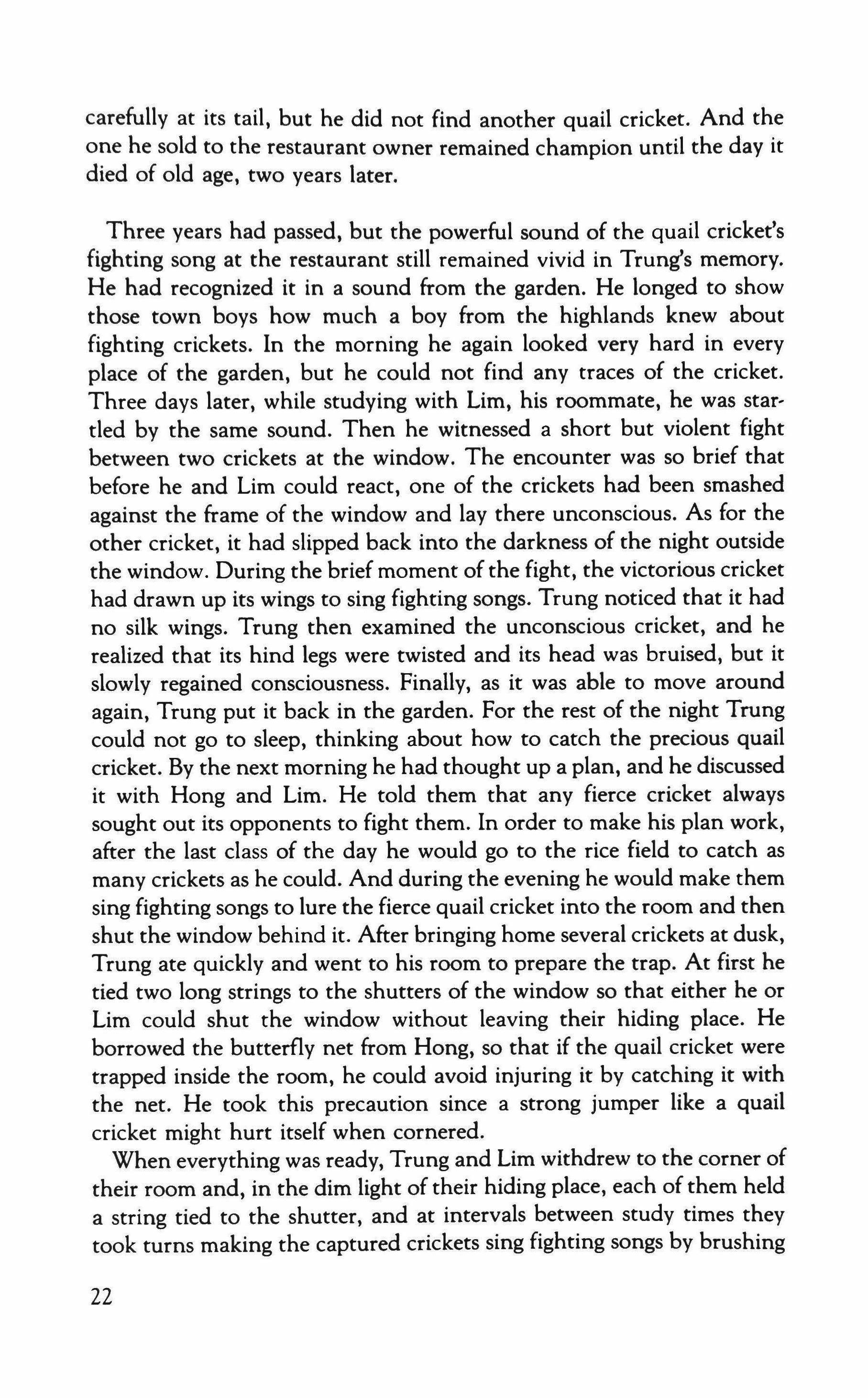
carefully at its tail, but he did not find another quail cricket. And the one he sold to the restaurant owner remained champion until the day it died of old age, two years later.
Three years had passed, but the powerful sound of the quail cricket's fighting song at the restaurant still remained vivid in Trung's memory. He had recognized it in a sound from the garden. He longed to show those town boys how much a boy from the highlands knew about fighting crickets. In the morning he again looked very hard in every place of the garden, but he could not find any traces of the cricket.
Three days later, while studying with Lim, his roommate, he was startled by the same sound. Then he witnessed a short but violent fight between two crickets at the window. The encounter was so brief that before he and Lim could react, one of the crickets had been smashed against the frame of the window and lay there unconscious. As for the other cricket, it had slipped back into the darkness of the night outside the window. During the brief moment ofthe fight, the victorious cricket had drawn up its wings to sing fighting songs. Trung noticed that it had no silk wings. Trung then examined the unconscious cricket, and he realized that its hind legs were twisted and its head was bruised, but it slowly regained consciousness. Finally, as it was able to move around again, Trung put it back in the garden. For the rest of the night Trung could not go to sleep, thinking about how to catch the precious quail cricket. By the next morning he had thought up a plan, and he discussed it with Hong and Lim. He told them that any fierce cricket always sought out its opponents to fight them. In order to make his plan work, after the last class of the day he would go to the rice field to catch as many crickets as he could. And during the evening he would make them sing fighting songs to lure the fierce quail cricket into the room and then shut the window behind it. After bringing home several crickets at dusk, Trung ate quickly and went to his room to prepare the trap. At first he tied two long strings to the shutters of the window so that either he or Lim could shut the window without leaving their hiding place. He borrowed the butterfly net from Hong, so that if the quail cricket were trapped inside the room, he could avoid injuring it by catching it with the net. He took this precaution since a strong jumper like a quail cricket might hurt itself when cornered. When everything was ready, Trung and Lim withdrew to the corner of their room and, in the dim light of their hiding place, each of them held a string tied to the shutter, and at intervals between study times they took turns making the captured crickets sing fighting songs by brushing
22
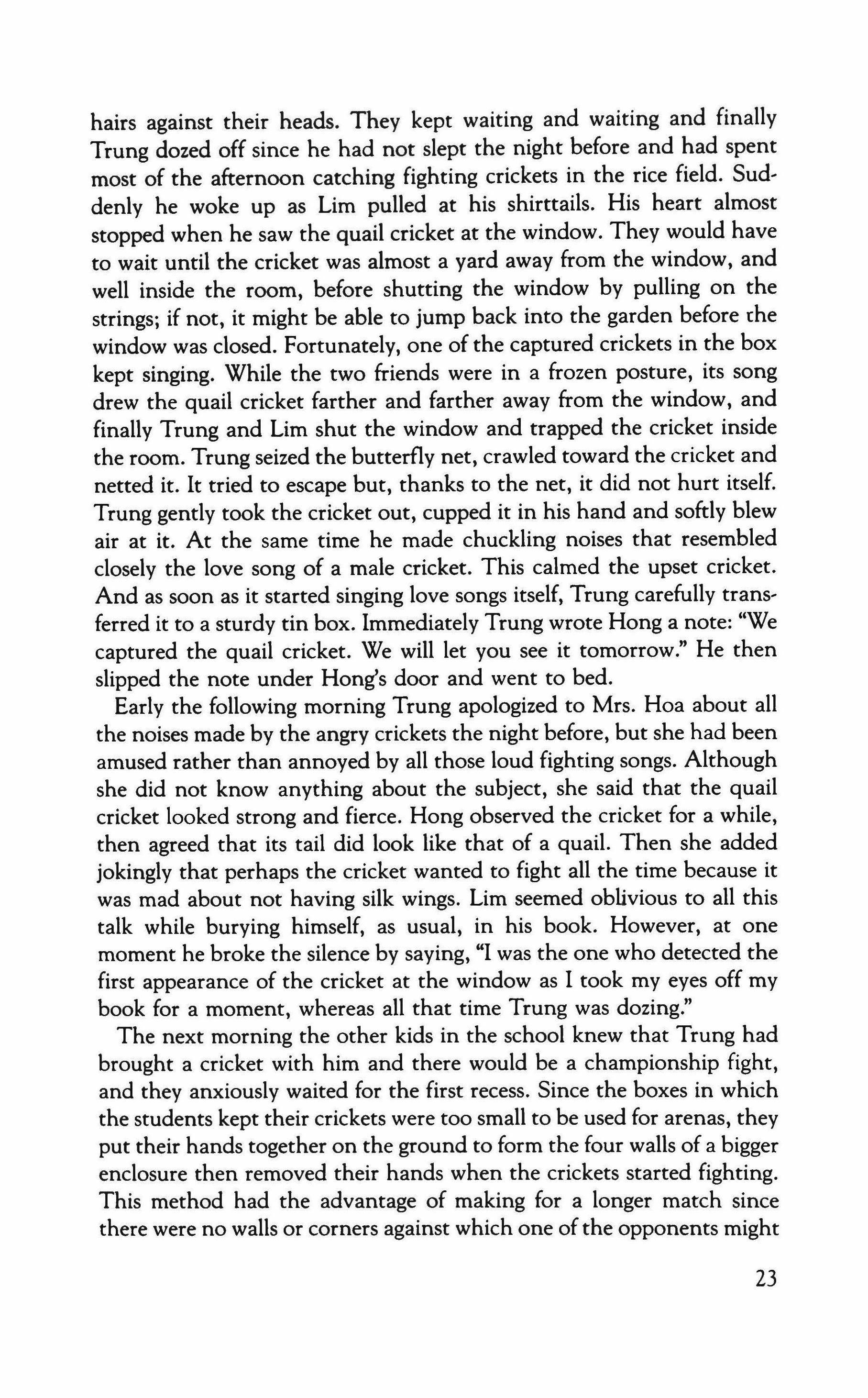
hairs against their heads. They kept waiting and waiting and finally Trung dozed off since he had not slept the night before and had spent most of the afternoon catching fighting crickets in the rice field. Suddenly he woke up as Lim pulled at his shirttails. His heart almost stopped when he saw the quail cricket at the window. They would have to wait until the cricket was almost a yard away from the window, and well inside the room, before shutting the window by pulling on the strings; if not, it might be able to jump back into the garden before (he window was closed. Fortunately, one of the captured crickets in the box kept singing. While the two friends were in a frozen posture, its song drew the quail cricket farther and farther away from the window, and finally Trung and Lim shut the window and trapped the cricket inside the room. Trung seized the butterfly net, crawled toward the cricket and netted it. It tried to escape but, thanks to the net, it did not hurt itself. Trung gently took the cricket out, cupped it in his hand and softly blew air at it. At the same time he made chuckling noises that resembled closely the love song of a male cricket. This calmed the upset cricket. And as soon as it started singing love songs itself, Trung carefully transferred it to a sturdy tin box. Immediately Trung wrote Hong a note: "We captured the quail cricket. We will let you see it tomorrow." He then slipped the note under Hong's door and went to bed.
Early the following morning Trung apologized to Mrs. Hoa about all the noises made by the angry crickets the night before, but she had been amused rather than annoyed by all those loud fighting songs. Although she did not know anything about the subject, she said that the quail cricket looked strong and fierce. Hong observed the cricket for a while, then agreed that its tail did look like that of a quail. Then she added jokingly that perhaps the cricket wanted to fight all the time because it was mad about not having silk wings. Lim seemed oblivious to all this talk while burying himself, as usual, in his book. However, at one moment he broke the silence by saying, "I was the one who detected the first appearance of the cricket at the window as I took my eyes off my book for a moment, whereas all that time Trung was dozing."
The next morning the other kids in the school knew that Trung had brought a cricket with him and there would be a championship fight, and they anxiously waited for the first recess. Since the boxes in which the students kept their crickets were too small to be used for arenas, they put their hands together on the ground to form the four walls of a bigger enclosure then removed their hands when the crickets started fighting. This method had the advantage of making for a longer match since there were no walls or corners against which one ofthe opponents might
23
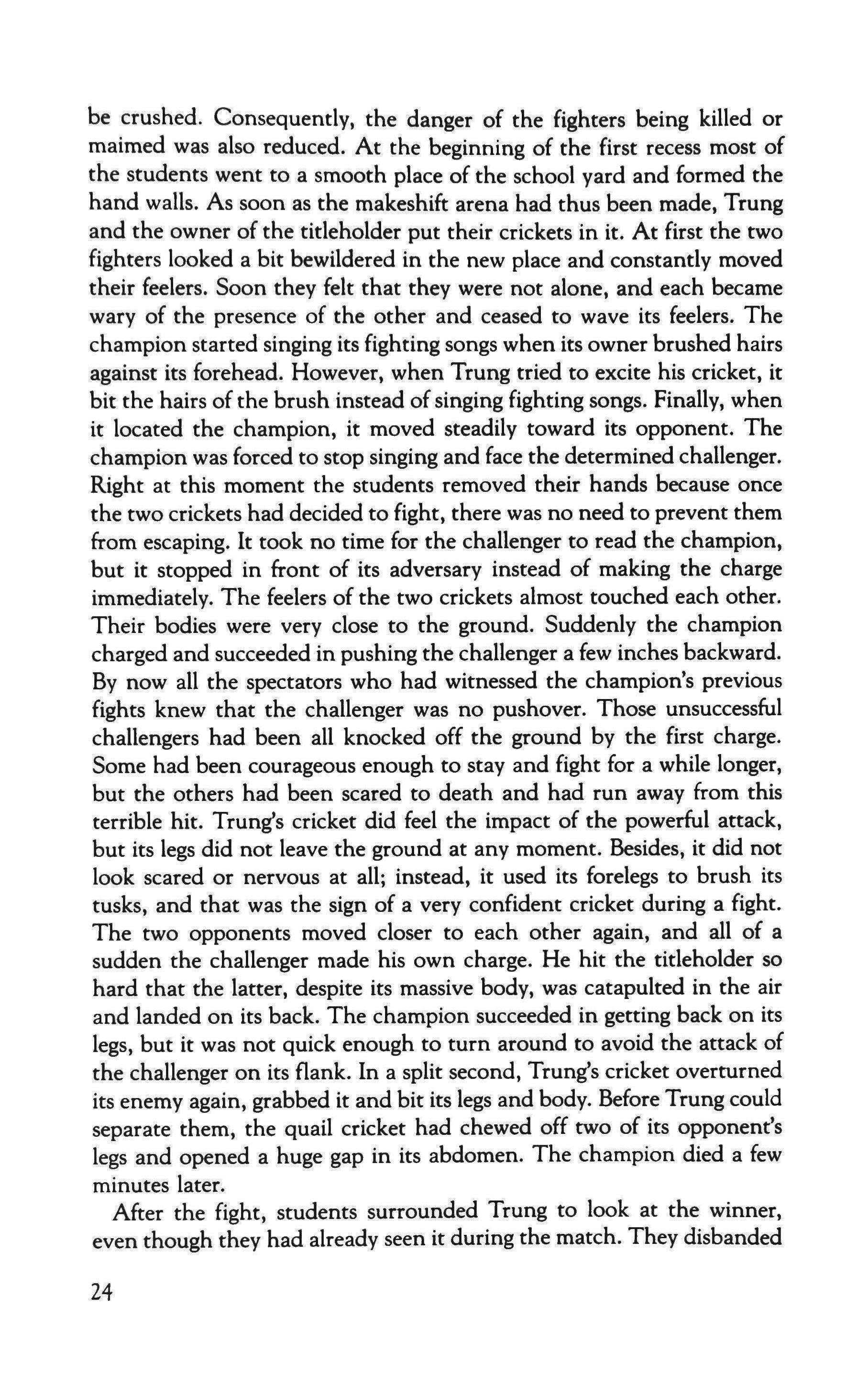
be crushed. Consequently, the danger of the fighters being killed or maimed was also reduced. At the beginning of the first recess most of the students went to a smooth place of the school yard and formed the hand walls. As soon as the makeshift arena had thus been made, Trung and the owner of the titleholder put their crickets in it. At first the two fighters looked a bit bewildered in the new place and constantly moved their feelers. Soon they felt that they were not alone, and each became wary of the presence of the other and ceased to wave its feelers. The champion started singing its fighting songs when its owner brushed hairs against its forehead. However, when Trung tried to excite his cricket, it bit the hairs of the brush instead of singing fighting songs. Finally, when it located the champion, it moved steadily toward its opponent. The champion was forced to stop singing and face the determined challenger. Right at this moment the students removed their hands because once the two crickets had decided to fight, there was no need to prevent them from escaping. It took no time for the challenger to read the champion, but it stopped in front of its adversary instead of making the charge immediately. The feelers of the two crickets almost touched each other. Their bodies were very close to the ground. Suddenly the champion charged and succeeded in pushing the challenger a few inches backward. By now all the spectators who had witnessed the champion's previous fights knew that the challenger was no pushover. Those unsuccessful challengers had been all knocked off the ground by the first charge. Some had been courageous enough to stay and fight for a while longer, but the others had been scared to death and had run away from this terrible hit. Trung's cricket did feel the impact of the powerful attack, but its legs did not leave the ground at any moment. Besides, it did not look scared or nervous at all; instead, it used its forelegs to brush its tusks, and that was the sign of a very confident cricket during a fight. The two opponents moved closer to each other again, and all of a sudden the challenger made his own charge. He hit the titleholder so hard that the latter, despite its massive body, was catapulted in the air and landed on its back. The champion succeeded in getting back on its legs, but it was not quick enough to turn around to avoid the attack of the challenger on its flank. In a split second, Trung's cricket overturned its enemy again, grabbed it and bit its legs and body. Before Trung could separate them, the quail cricket had chewed off two of its opponent's legs and opened a huge gap in its abdomen. The champion died a few minutes later.
After the fight, students surrounded Trung to look at the winner, even though they had already seen it during the match. They disbanded
24
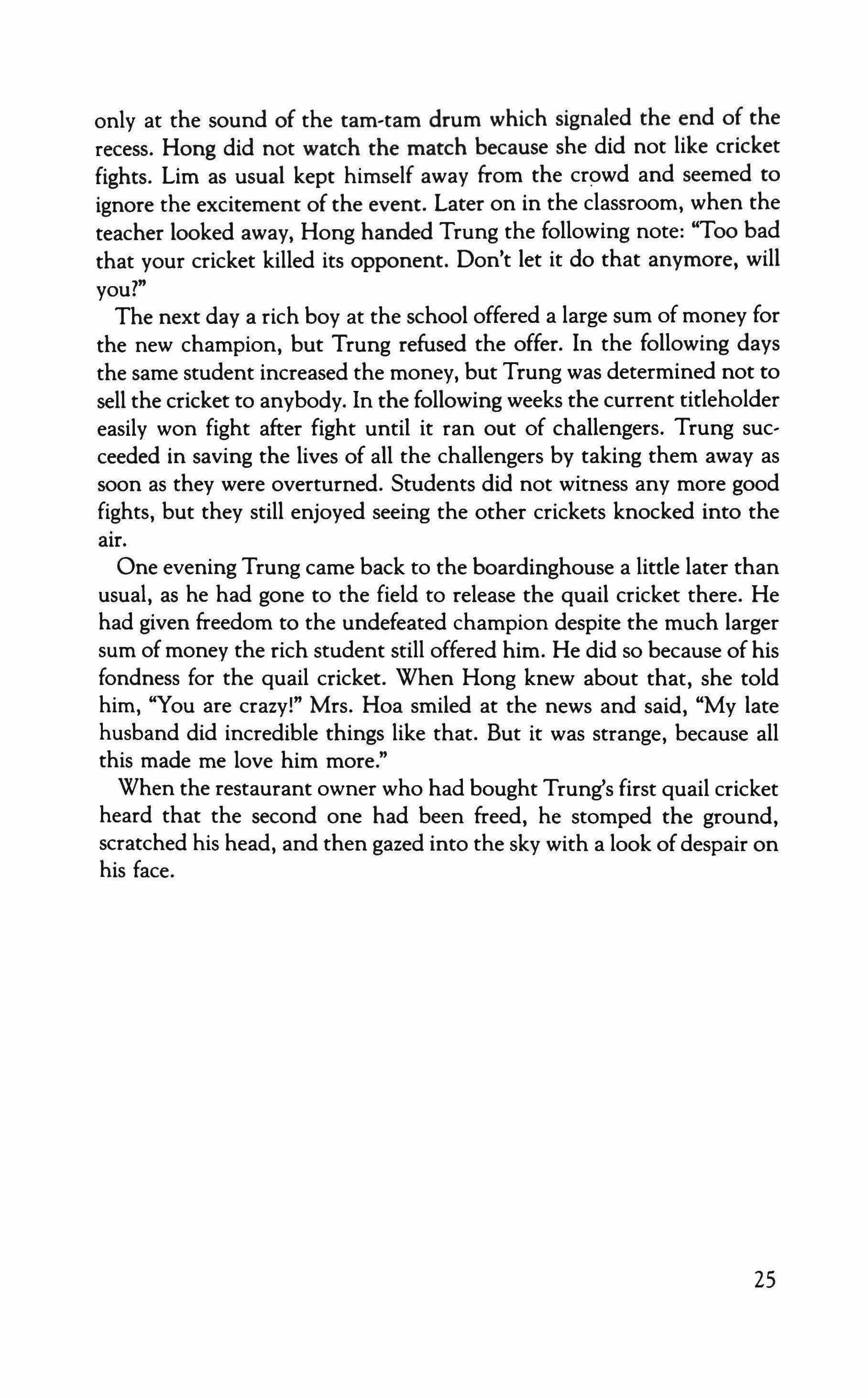
only at the sound of the tarn-tam drum which signaled the end of the recess. Hong did not watch the match because she did not like cricket fights. Lim as usual kept himself away from the crowd and seemed to ignore the excitement of the event. Later on in the classroom, when the teacher looked away, Hong handed Trung the following note: "Too bad that your cricket killed its opponent. Don't let it do that anymore, will you?"
The next day a rich boy at the school offered a large sum of money for the new champion, but Trung refused the offer. In the following days the same student increased the money, but Trung was determined not to sell the cricket to anybody. In the following weeks the current titleholder easily won fight after fight until it ran out of challengers. Trung sueceeded in saving the lives of all the challengers by taking them away as soon as they were overturned. Students did not witness any more good fights, but they still enjoyed seeing the other crickets knocked into the air.
One evening Trung came back to the boardinghouse a little later than usual, as he had gone to the field to release the quail cricket there. He had given freedom to the undefeated champion despite the much larger sum of money the rich student still offered him. He did so because of his fondness for the quail cricket. When Hong knew about that, she told him, "You are crazy!" Mrs. Hoa smiled at the news and said, "My late husband did incredible things like that. But it was strange, because all this made me love him more."
When the restaurant owner who had bought Trung's first quail cricket heard that the second one had been freed, he stomped the ground, scratched his head, and then gazed into the sky with a look ofdespair on his face.
25
What Peter Saw
w. D. Wetherell

The first timeless thing Peter ever saw was on August 29, 1968 at two o'clock in a humid Friday afternoon. It was in his own bedroom that he saw it, though at the time he was outside peering in, his face camouflaged by the yellow blossoms of his mother's roses. What was taking place there beside the bed was so strange to a child's imagination, so simple, so touched with grace, that he knew even then the sight of it would remain with him the rest of his life. Remembering, the 1968 part faded away, and it could just as easily have been a moment in the 1940's somewhere, or 1914 in the last twilight of the Edwardian summer, or even further back, back beyond all his history books, back to the days when Greece was taking boys with no malice in them and sticking spears in their hands and shipping them off to Troy.
The place was moveable, too. It was at his family's summer home on Cape Cod - a small house of cedar shakes and eccentric windowing set above a saltwater pond that hadn't yet been developed or spoiled. It was as remote a spot as the Cape had, and yet what he remembered most about it were those things that linked it with all the other places in the country. The beach grass, for instance, that enveloped him when he came back from one of his rowing expeditions: the way the tops intertwined themselves in golden tassels like prairie grass on the Nebraska plains. The way the humid air would be blown out all at once by an exhilarating northwest wind that had more of Colorado in it than Massachusetts. The way the pond was dimpled at dusk by feeding minnows - how the outspreading rings smoothed the water's turbulence and drew the landscape in upon itself, so that by the time the sunset turned purple their cove was as placid and self-contained as a pond on an Indiana farm.
26

It was the summer he turned twelve - old enough to get serious about two pressing ambitions. The first was to row the family's skiff all the way to Martha's Vineyard and not just the breakwater where the pond opened. The second, more universally, was to see a girl without any clothes on.
Ofthe two, he spent rather more time working on the first. By August he had gotten his biceps to the point where he could row from the dock to the breakwater in forty minutes flat. He would pause in the channel there at the end of the run, ship oars and stand precariously upright so he could stare toward the Vineyard seven miles away - a low smoky shape like a punctured cloud. Beneath him he could feel the incoming tide tugging the skiff back toward home, but at the same time he could feel the horizon tugging him the opposite way, so for that one fragile moment he was equipoised between forces and perfectly content. When the tide became stronger, he brought the stern around and rowed furiously home, working his stroke up to a pitch that nearly burst him, but which he would need in order to make any headway against the notorious Vineyard chop. The rest of the day he would spend going over his equipment list, reducing to the barest minimum the supplies he could take along.
These were as follows: Two one-gallon cans of Hawaiian Punch, to be drunk when necessary, then stowed away beneath the bow seat to serve as sea anchors in case of storm or water wings in case of swamping. An orange beach umbrella to keep the sun off his neck. A fishing line to use if the current carried him out to sea and he was starving. A bottle of ketchup to drown out the fishy taste. Five flashlights. A BB gun to use as a deterrent against gulls. Reading matter in case of boredom-comic books, but also biographies of Knute Rockne and Jim Thorpe. Matches, their ends dipped in nail polish. An Esso highway map of southern New England. Salt tablets. A gallon of antifreeze to pour on the water in case of sharks.
Fully loaded, the skiff weighed in the neighborhood of 658 pounds. It still wasn't enough, though, and on the day of the final dress-rehearsal launch, his father, in his careful inspection, thought of one last thing. "A compass," he said, frowning in the serious way he had that lent importance to all of Peter's projects. "What happens if it's foggy out and you miss the Vineyard? The next stop after that is Brazil." They went out and bought a compass that same morning, but it still put a damper on things. There were a lot of foggy days in August, and Peter didn't like the thought ofrowing all by himself to Brazil. More and more his thoughts began trending toward the fulfillment of his second
27

summertime ambition: to sneak through the pitch-pine woods that began past their driveway, then the cranberry bog beyond that, then the fence beyond that until he reached the high, concealing meadow grass surrounding the bunkhouses of Camp Merry B. Wampanoag for Girls. He had no idea what he would do once he got there. See a naked girl, he supposed. But what that meant he wasn't sure, no more than he was sure what would happen when he finally took the skiff out into the choppy waters of Vineyard Sound. At night after everyone had gone to bed, he would lower himself feet-first through his window outside, crawling past the cars and the drying beach towels until he reached the protection of the first brittle pines.
But once gained, the woods only confused him. The dark marbled shadows from the moonlight became mixed with the dark marbled thoughts in his head until he all but reeled from excitement and skipped toward the cranberry bog like a horny chipmunk. By the time he reached the bog he was completely disoriented; he tried wading across, but the mud was too thick for him; he tried circling around one side, but the bog was endless. In the end he would find the highest rise he could and stand there blinking his flashlight toward the unreachable camp, hoping by some miracle the beams would find a magic current and become X rays powerful enough to penetrate bunkhouse walls. They never did. After a while the batteries would start to wear down, and he would have to find his way home in the dark, chilled now from bog water, his pants ripped by thorns. When he came back from his rowing trips he always felt cleansed and uplifted, but these nighttime crawls left him feeling humiliated, defeated past words. He would karatechop any tree that got in his way, kick the thinner ones, scream at the top of his lungs so as not to be crushed from sheer implosion of the groin.
The last of these trips - the one he went on the night before the Gerards came-was particularly disastrous. He lost the flashlight in the bog, karate-chopped a sapling that turned out to be an iron boundary post and fell into one of the pit traps his younger brother Gordon was always setting for raccoons. By the time he returned to the driveway he was beaten and in tears. His father's voice, gentle as it was, fell across his back like the last stroke of the lash.
"That you, Peter?"
He was standing in the circle of cedar where the flagpole was, dressed in the gym shorts that were all he ever wore to bed, his shoulders as white and full as a sail.
"Yeah, Pop. It's me."
28

Peter stepped into the circle, ready to raise his hands like a prisoner turning himself in. His father, seeing the scratches on his face, the tatters of his shirt, only smiled.
"Been out for a stroll, have you?"
Peter thought fast. "I was out checking the oyster traps."
He wasn't sure why he said it. There were no oyster traps in the pond, not even any oysters, but it was the first thing that came to mind. His father nodded at this in his grave, thoughtful way. Peter could have told him he'd just gotten back from Uranus and he would have nodded. Perhaps because his own life had been filled with so many disappoint, ments, he was the kind of man who understood the correct proportions of dreams.
"I couldn't sleep myself," he said, gesturing vaguely toward the house. "I've been awake violating one of our rules. I was listening to the news."
There was an actual list with these rules, pasted to the refrigerator door where guests couldn't miss it. The first rule was about not mixing burnables with non-burnables in the trash; the last rule forbade academic gossip at the dinner table or in the boats. Not listening to the news was somewhere toward the middle of the list, just before the one about not complaining about the rain.
"You listened to the news?" Peter said, putting all the accusation in his tone he could.
"Yep. The entire five minutes. I listened out on the porch where your mother couldn't hear. I've been doing it all summer."
Strange as his confession was, what he did next was even stranger. He crossed over to the flagpole and started unfastening the rope from its metal cleat.
This flagpole was the highest on the pond, a proud varnished thing of genuine beauty. His father had carved it himself from a white pine that had come crashing down on the roof during Hurricane Carol back in the fifties; the flag that flew there was the old kind with forty-eight stars, and they kept it flying night and day in defiance of all convention.
It only took a moment to loosen the rope. The pulley on top made a squeaky sound, then warbled like a bird. His father, staring upwards, lowered the flag until it was halfway down the pole, tied the rope back around the cleat, then-after hesitating-added two knots more.
"There," he said. "I think we'll leave it like that for a while." He rubbed his hands on his shorts like a man who has just finished a heavy piece of work, and put one of them on Peter's shoulder. "All set now, son? We'd better get some sleep in. We'll need all our energy for the Gerards."
Peter's first thought when he woke up in the morning was that the
29

entire episode had been a dream. But no-when he rushed outside to check there was the flag at half-mast where his father had put it. It didn't look airy and perky like it usually did. The fabric, wet from ground mist, clung listlessly to the pole.
In a way he couldn't understand, the lowered flag seemed to set the mood for the entire day. Over the pond the fog was heavy and lifeless, pressed down by heat. The crickets back in the meadow sounded labored and slurred. Socrates, their Labrador, had already dug a hole for himself in the cool dirt behind the bulkhead. It was going to be hot, brutally hot. His father was rigging a tarpaulin over the patio to keep off the sun. His mother, her face dabbed in mayonnaise, was mixing chicken salad in the deep green bowl she only used when they had guests.
There were a lot of these each summer. His father liked to have the younger faculty members down; his mother was always inviting her French majors, so there were few days when the lawn and beach weren't noisy with happy sounds. Most of these guests were in their twenties, athletic and handsome. They would overcrowd the sailboat and laugh when it capsized; there were furious games of water polo that churned the water into froth. And while Peter still thought of his future as something distant, something that had to be rowed to or snuck up on and only achieved with tremendous effort, they were on the very edge of their destinies and bright with it - bright and sunny and wet.
The Gerards were in a different category altogether. What this category was, it was difficult to say. "Our distant relations," his father said, and left it at that. "Those poor people in the truck," was how Gordon put it, snobby at seven. "A good Catholic family from Providence," said his mother, shaking her head in a way that managed to combine nine parts admiration with one part distaste.
It was this last phrase that summed them up best. The Gerards were Baptists, not Catholics, but there was a generosity about them both in number and in spirit that was reminiscent of the huge, fiercely loyal Italian families in the North End. Aunt Alice had already given birth to four kids by then, and there would be another three before she was through. She had a bosom as wide as Kate Smith's, a laugh so deep it could make your ribs rattle and a total disregard of what you did or where you were from or anything except whether or not you were the kind of person who could look life in the face without flinching.
Uncle Norbett, perhaps because he worked bottling Coke all day, was much quieter-the kind of man who liked to wear green work clothes even on his days off. As a boy, he had worked as a logger in Maine, and
30
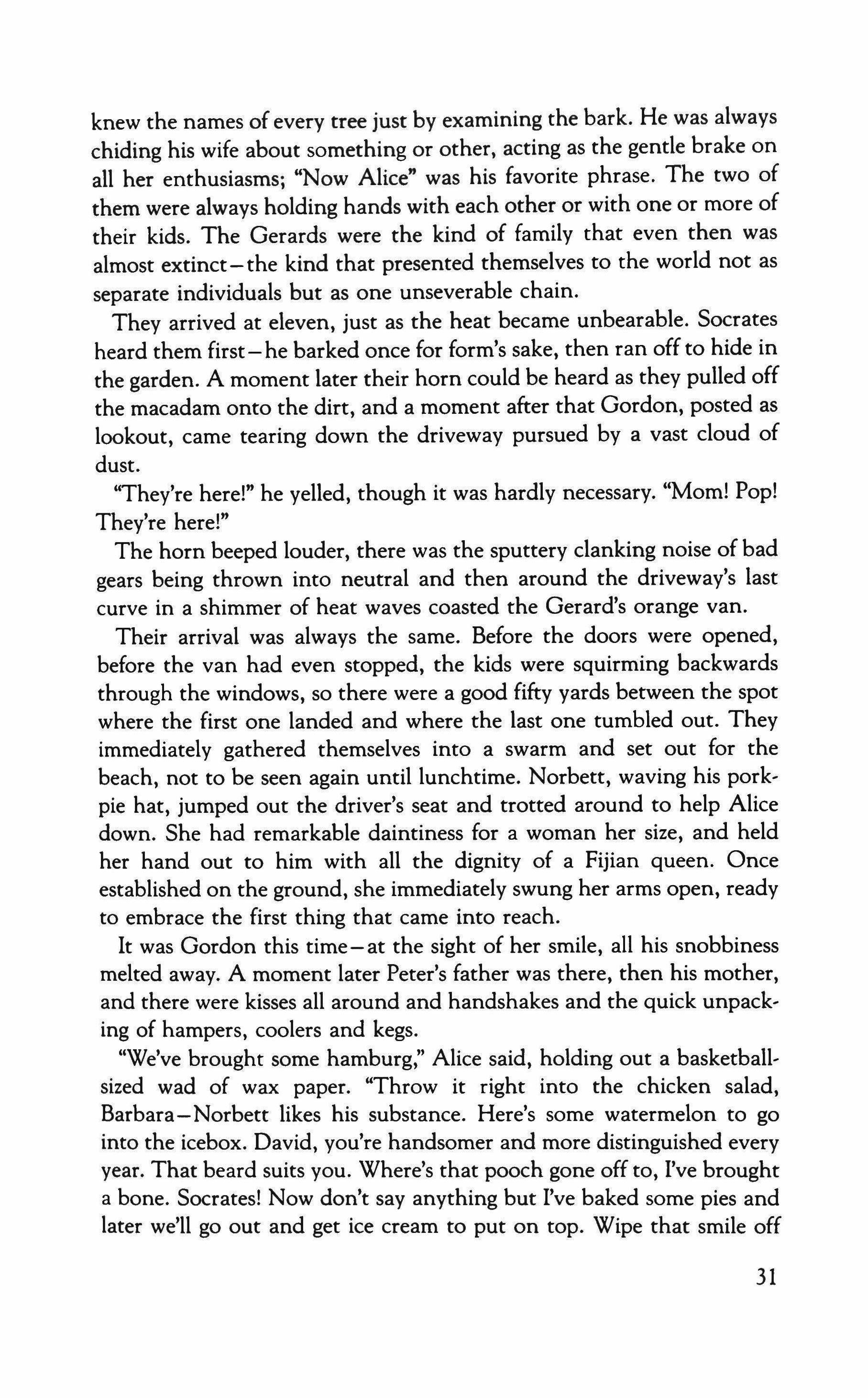
knew the names of every tree just by examining the bark. He was always chiding his wife about something or other, acting as the gentle brake on all her enthusiasms; "Now Alice" was his favorite phrase. The two of them were always holding hands with each other or with one or more of their kids. The Gerards were the kind of family that even then was almost extinct-the kind that presented themselves to the world not as separate individuals but as one unseverable chain.
They arrived at eleven, just as the heat became unbearable. Socrates heard them first-he barked once for form's sake, then ran off to hide in the garden. A moment later their horn could be heard as they pulled off the macadam onto the dirt, and a moment after that Gordon, posted as lookout, came tearing down the driveway pursued by a vast cloud of dust.
''They're here!" he yelled, though it was hardly necessary. ''Mom! Pop! They're here!"
The horn beeped louder, there was the sputtery clanking noise of bad gears being thrown into neutral and then around the driveway's last curve in a shimmer of heat waves coasted the Gerard's orange van.
Their arrival was always the same. Before the doors were opened, before the van had even stopped, the kids were squirming backwards through the windows, so there were a good fifty yards between the spot where the first one landed and where the last one tumbled out. They immediately gathered themselves into a swarm and set out for the beach, not to be seen again until lunchtime. Norbert, waving his porkpie hat, jumped out the driver's seat and trotted around to help Alice down. She had remarkable daintiness for a woman her size, and held her hand out to him with all the dignity of a Fijian queen. Once established on the ground, she immediately swung her arms open, ready to embrace the first thing that came into reach.
It was Gordon this time-at the sight of her smile, all his snobbiness melted away. A moment later Peter's father was there, then his mother, and there were kisses all around and handshakes and the quick unpacking of hampers, coolers and kegs.
"We've brought some hamburg," Alice said, holding out a basketballsized wad of wax paper. "Throw it right into the chicken salad, Barbara-Norbett likes his substance. Here's some watermelon to go into the icebox. David, you're handsomer and more distinguished every year. That beard suits you. Where's that pooch gone off to, I've brought a bone. Socrates! Now don't say anything but I've baked some pies and later we'll go out and get ice cream to put on top. Wipe that smile off
31

your face, Peter. Haven't you ever seen a fat woman perspire? Now get busy and help your uncle unload those chairs."
It was because there was no refusing one of Alice's commandsbecause he stood toward the back of the van, reaching in to pull out the last supplies-that Peter turned out to be the one to see them first. But even Peter, quick as he was, didn't see them actually descend. They were just there - there like people on a police lineup or a slave platform are there, without any preliminaries.
They held hands and faced him, smiling bashfully. The girl was about nineteen, pretty in an average sort of way, with blond hair piled over her head like a swirl of banana ice cream. She had on a white blouse that was feminine and soft-looking: below it was a miniskirt that showed off two crusty, angry red knees. Seeing Peter stare, she dropped her eyes to the ground, tucked her head into her shoulder and began very carefully to scratch.
The man was about the same age. Like her, he was the kind of person your eyes could slip right off without seeing. He had acne. He had red hair cut short in bristles. His complexion, like hers, was unhealthily pale-the white of the generic cartons that were just then starting to show up on the supermarket shelves.
So it wasn't anything about his looks that captured Peter's attention, it was what he was wearing. Not the Levis that might be expected, not the shorts or bell-bottomed cords. This average-looking man of average height and average weight and average probably intelligence had on baggy green army fatigues that - after billowing out around his waist like bloomers - bunched in tight to his calves and disappeared into the blackest, shiniest, hottest-looking combat boots Peter had ever seen.
Seeing their polish was like watching a light flash on. It was the only thing about either of them that possessed any vibrancy or life.
"Hey," the man said, with a trace of a drawl. He looked down at his hand to see if it was dirty, rubbed it vigorously on his belt, then stuck it out in Peter's direction. "Danny Doe like in John?" He tilted his head the barest minimum. "The wife."
The girl was looking up at the trees like someone seeing skyscrapers for the first time. Realizing she'd been introduced, she stuck her hand out, too, and opened her mouth just far enough for Peter to see she was chewing purple gum.
"Hi ya," she said.
Around on the other side of the van things were finally sorting themselves out. Aunt Alice, who liked billowy dresses and always seemed a step ahead of her own blur, came over to formally introduce everyone.
32

Peter wasn't sure, but there seemed to be something hesitant in the way she did this; finishing, she stood back and watched them like a matchmaker anxious everyone should get along.
"These are the Does," she explained. "Doreen is Gouger Rogowski's cousin twice removed, you remember Gouger don't you, David? That makes her my third cousin, if that still counts. She lives in Cranston, or at least she's going to now. And this," she said, worry creeping into her tone, "is Danny Doe. Danny's a private in the Army, from South Carolina originally, right, Danny? He's on leave so we can't stay very long. Danny and Doreen, I want you to meet our other cousins, the Shrivers."
The Does smiled, passively, and moved a step closer together.
"It's all right we brought them along, isn't it, Barbara?" Alice asked. "I would have called, but it all came about very suddenly."
"Of course, of course," Peter's mother said, frowning the way she did whenever she was computing portions. "Uh, would they care to go for a swim before lunch?"
Danny mumbled something in Alice's direction. "They don't swim," Alice said.
"Oh. Well, would they care to lie out in the sun then?"
Danny mumbled something again. "She burns," Alice said. "Oh," Peter's mother said. "She burns."
Everyone would have stood there forever if it weren't for Peter's father. He waved his arm around in a gesture that took in everything and made his voice turn hearty.
"Well that's fine then and you two make yourselves right at home. We have the hammock all rigged up. There are plenty of beach chairs around. Peter will lend you his fishing rod, if you don't mind catching snappers. We're glad you're here and if there's anything you want, just give a yell."
His father was hard to resist when he spoke that way. The Does walked slowly in the direction of the water, as if his hand were on their backs pushing. By the time they got to the stairs leading to the beach they had stopped again. They stood there holding hands, looking down to where the Gerard kids splashed in their floats.
Under normal circumstances Peter would have been down there with them, showing off his skiff. But so unexpected was the Does' appearance there, so out of character Alice's worried tone, that he lingered behind hoping to get some more information.
It was Alice who explained things, talking quickly in case they came back. The Does had only been married eight weeks, she said, Doreen
33
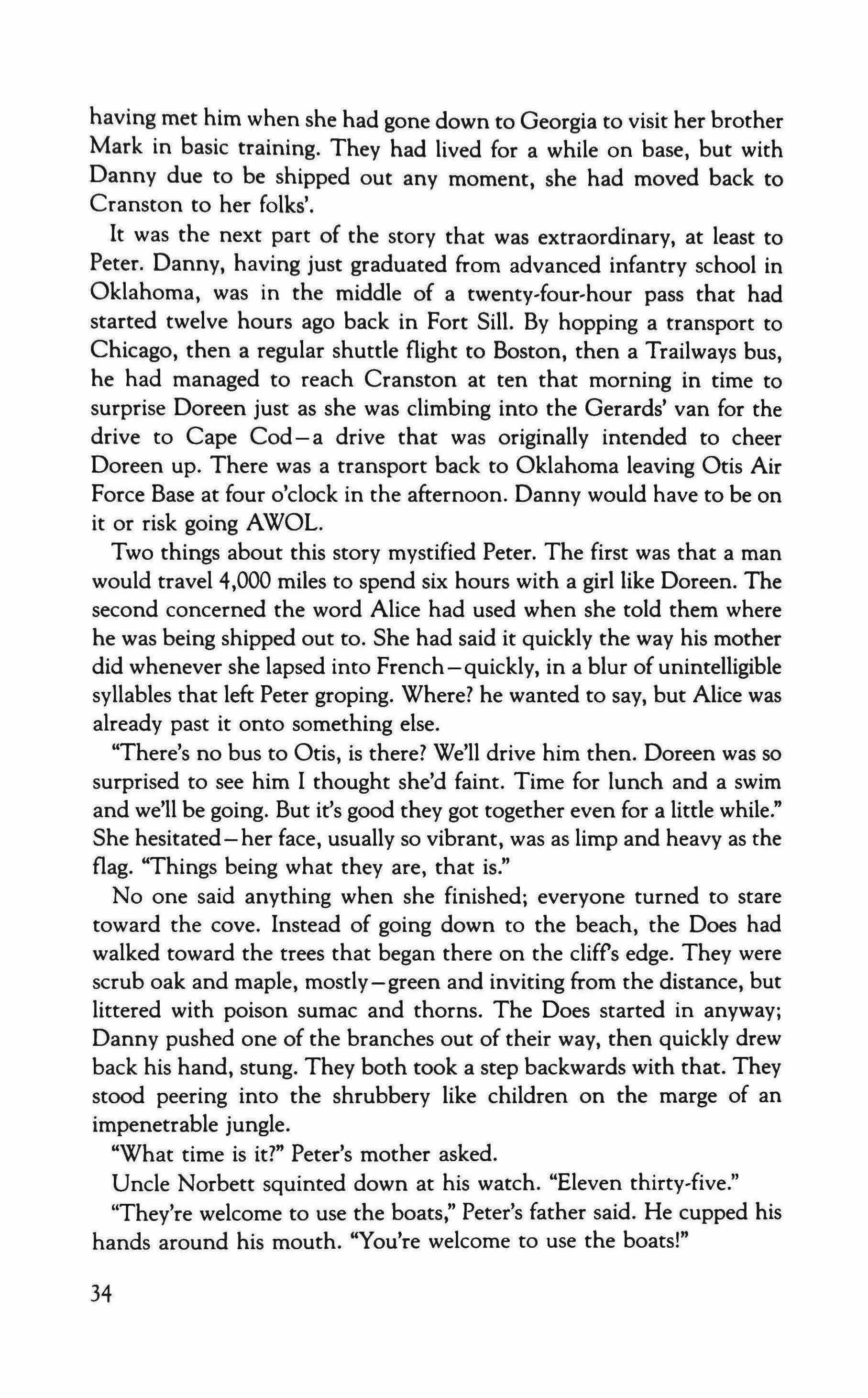
having met him when she had gone down to Georgia to visit her brother Mark in basic training. They had lived for a while on base, but with Danny due to be shipped out any moment, she had moved back to Cranston to her folks'.
It was the next part of the story that was extraordinary, at least to Peter. Danny, having just graduated from advanced infantry school in Oklahoma, was in the middle of a twenty-four-hour pass that had started twelve hours ago back in Fort Sill. By hopping a transport to Chicago, then a regular shuttle flight to Boston, then a Trailways bus, he had managed to reach Cranston at ten that morning in time to surprise Doreen just as she was climbing into the Gerards' van for the drive to Cape Cod - a drive that was originally intended to cheer Doreen up. There was a transport back to Oklahoma leaving Otis Air Force Base at four o'clock in the afternoon. Danny would have to be on it or risk going AWOL.
Two things about this story mystified Peter. The first was that a man would travel 4,000 miles to spend six hours with a girl like Doreen. The second concerned the word Alice had used when she told them where he was being shipped out to. She had said it quickly the way his mother did whenever she lapsed into French-quickly, in a blur of unintelligible syllables that left Peter groping. Where? he wanted to say, but Alice was already past it onto something else.
"There's no bus to Otis, is there? We'll drive him then. Doreen was so surprised to see him I thought she'd faint. Time for lunch and a swim and we'll be going. But it's good they got together even for a little while." She hesitated - her face, usually so vibrant, was as limp and heavy as the flag. "Things being what they are, that is."
No one said anything when she finished; everyone turned to stare toward the cove. Instead of going down to the beach, the Does had walked toward the trees that began there on the cliff's edge. They were scrub oak and maple, mostly-green and inviting from the distance, but littered with poison sumac and thorns. The Does started in anyway; Danny pushed one of the branches out of their way, then quickly drew back his hand, stung. They both took a step backwards with that. They stood peering into the shrubbery like children on the marge of an impenetrable jungle.
"What time is it?" Peter's mother asked.
Uncle Norbett squinted down at his watch. "Eleven thirty-five."
"They're welcome to use the boats," Peter's father said. He cupped his hands around his mouth. "You're welcome to use the boats!"
34
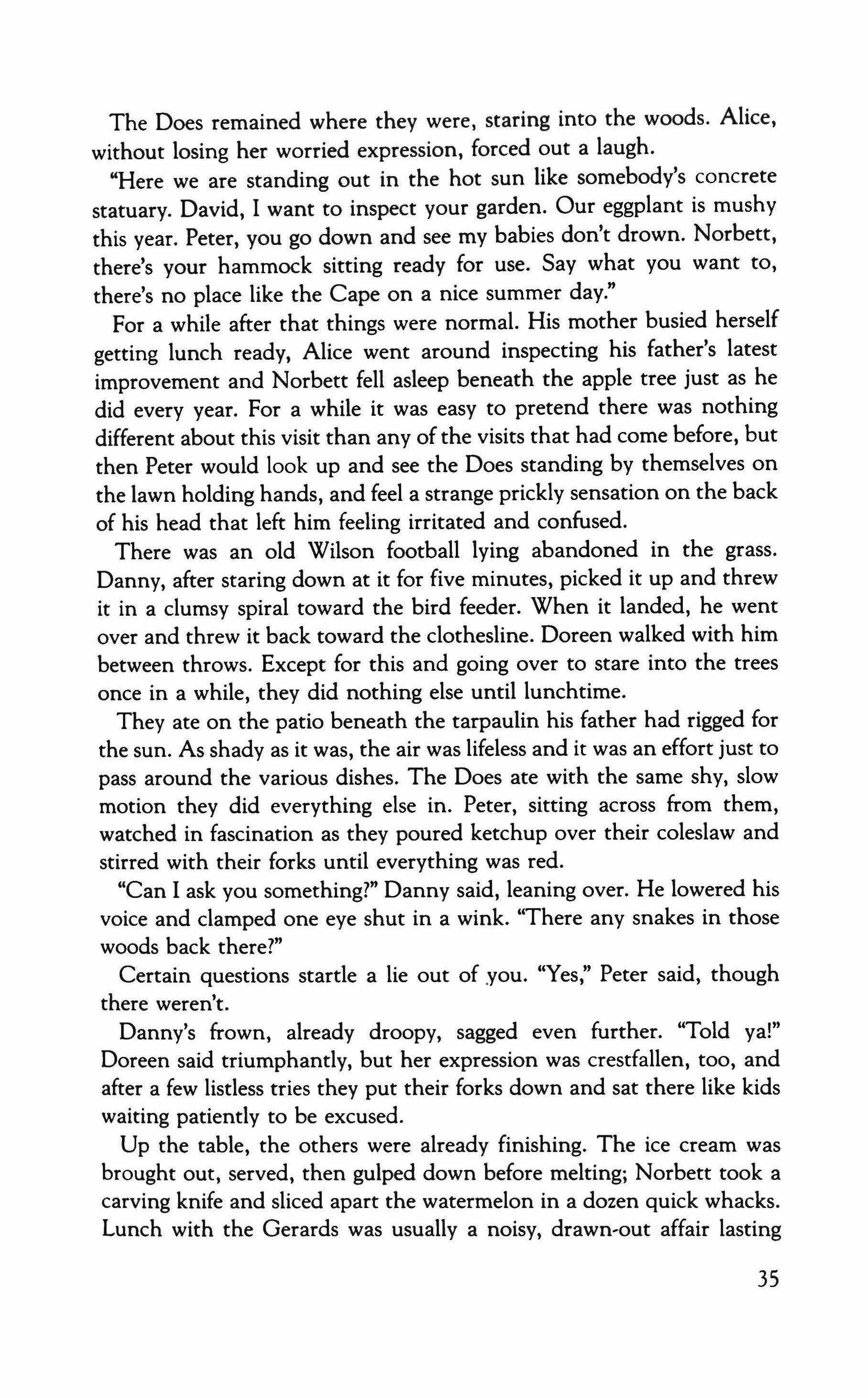
The Does remained where they were, staring into the woods. Alice, without losing her worried expression, forced out a laugh.
"Here we are standing out in the hot sun like somebody's concrete statuary. David, I want to inspect your garden. Our eggplant is mushy this year. Peter, you go down and see my babies don't drown. Norbett, there's your hammock sitting ready for use. Say what you want to, there's no place like the Cape on a nice summer day."
For a while after that things were normal. His mother busied herself getting lunch ready, Alice went around inspecting his father's latest improvement and Norbett fell asleep beneath the apple tree just as he did every year. For a while it was easy to pretend there was nothing different about this visit than any of the visits that had corne before, but then Peter would look up and see the Does standing by themselves on the lawn holding hands, and feel a strange prickly sensation on the back of his head that left him feeling irritated and confused.
There was an old Wilson football lying abandoned in the grass. Danny, after staring down at it for five minutes, picked it up and threw it in a clumsy spiral toward the bird feeder. When it landed, he went over and threw it back toward the clothesline. Doreen walked with him between throws. Except for this and going over to stare into the trees once in a while, they did nothing else until lunchtime.
They ate on the patio beneath the tarpaulin his father had rigged for the sun. As shady as it was, the air was lifeless and it was an effort just to pass around the various dishes. The Does ate with the same shy, slow motion they did everything else in. Peter, sitting across from them, watched in fascination as they poured ketchup over their coleslaw and stirred with their forks until everything was red.
"Can I ask you something?" Danny said, leaning over. He lowered his voice and clamped one eye shut in a wink. ''There any snakes in those woods back there?"
Certain questions startle a lie out of 'you. "Yes," Peter said, though there weren't.
Danny's frown, already droopy, sagged even further. "Told ya!" Doreen said triumphantly, but her expression was crestfallen, too, and after a few listless tries they put their forks down and sat there like kids waiting patiently to be excused.
Up the table, the others were already finishing. The ice cream was brought out, served, then gulped down before melting; Norbett took a carving knife and sliced apart the watermelon in a dozen quick whacks. Lunch with the Gerards was usually a noisy, drawn-out affair lasting
35

half the afternoon, and here they were pushing back their chairs ten minutes after they'd sat down.
"Everyone's acting nuts today," Peter mumbled. No one heard him. On the edge of the patio was a redwood chair with an umbrella mounted on the back. Danny stood beside it saying something to Alice, who looked off toward the water and bit her lip. Not right then, but a few minutes later she came over to where Peter's mother was wiping off the picnic table with a wet paper towel.
"May I ask a favor, Barbara?" she said, in an oddly formal tone. "Danny and Doreen are a bit tired out after all the excitement. They wanted to know if it was all right for them to take a nap somewhere."
"A nap?" His mother's eyes met Alice's and something was exchanged there too quickly for Peter to tell what. "There's Peter's room. They can have that, I suppose. We haven't gotten around to insulating the ceiling yet. This time of day it's hotter than an oven."
"Oh, that's O.K.," Alice said. "They just want to take a nap, just a short one."
The conversation was normal enough, but both women seemed relieved when it was over. Alice went back and said something to Danny; Danny turned and said something to Doreen. A moment later they disappeared through the screen door into the house, holding hands with each other but differently than before, tighter somehow, higher.
"Just a little nap," Alice whispered, watching them trudge off. "We'll give them an hour, then it will be time to go Hey!" she yelled, as ifthe thought had just struck her. "I don't know about you two, but I'm dying for a swim."
A swim for Aunt Alice meant wading around the shallows with her dress bunched up around her waist. But at least it got everyone moving again. The water felt like hot alphabet soup, one of the Gerard kids thought he saw a jellyfish and Gordon cut his foot on a shell, but for an hour or more they all went through the motions of a good time.
It was the heat that ended things. Once the sun got above the cliff it was unbearable, and one by one they all began drifting back to the patio and its shade. The kids spread their beach towels out on the cold stone and fell asleep immediately; the adults lay back in their lounge chairs, fanned themselves with paper plates and made a labored attempt at conversation.
"Do you remember Johnny Potter?" Alice asked. "Johnny Potter. Al Prince's nephew."
His father folded his plate over his nose. "No."
"I saw him the other day. He's aged."
36

Norbett nodded his head up and down. "It's tough going overseas. I remember the time I went. It was on the Queen Mary in January of forty-three and it was the coldest morning in the history of the world." It seemed like the start of a story, but he didn't tell one. "It's tough going overseas," he said.
"Overseas." His father made a tasting motion with his lips. "It's a funny word."
"Overseas," his mother said. "It makes you think of movement and spray."
They passed the word around their circle like a tray ofcool drinks. For a time they were able to talk about other things, able to keep their eyes on something beside the corner ofthe house where Peter's bedroom was. But like a magnet, it kept drawing them back.
"A man's got to serve," Norbett said, talking louder but without conviction. "Say what you want to, a man's got to serve."
"That ridiculous cowboy," his father said. "All this talk about dominoes. I believe despite all his advisers he must be a stupid, cowardly man."
"What time is it?" Alice mumbled, as if she didn't want to know.
"Isn't right," Norbett said. "Isn't right at all."
What wasn't right? Dominoes weren't right? Cowboys weren't right? What did they mean? Peter wondered. They said it to nobody, just said it to thin air, and turned to stare with helpless expressions toward the corner where Doreen and Danny had gone for their nap. Even later, when they lay their heads back against the cushions and added their snoring to the abrupter breathing of the kids, it wasn't as if they had really gone to sleep but were pretending to, closing their eyes out of sheer modesty and not fatigue.
Peter himself closed his eyes, as if to experience what they felt, but there was nothing there for him except heat and white flashes and a grainy kind of buzz. It was too hot to go to sleep-his chest raced with too many hard things. Anger that he hadn't been consulted about giving up his room, embarrassment to think of the Does opening his closet and finding his stuffed animals, fear they would get clumsy and disrupt his collection of shells. These things, and then something vaster than these, an intense curiosity that was similar to what he felt when he thought about reaching new water in his skiff-like this and like the more tormenting curiosity he felt when he began his nightly trips toward the cranberry bog and the unreachable girls' camp on the far side. He looked around the patio to make sure everyone was still asleep. Slowly, not making any sound that would give him away, he got up from
37

the chair, tiptoed over to the edge ofthe patio and let himselfdown onto the grass. His mother's hydrangea began there, and in a flash he was down on his knees behind the first of them, scuttling toward the house with the light agility of a crab.
The ground by the foundation was packed dirt, cool and mossy. He took a left at the first corner, peeked cautiously around the second, then made a left around that one, too. There was an exposed section where he had to crawl out around the bulkhead, but once past it the roses began and he was able to slither through the space left between the thorns and the foundation with inches to spare.
His room had two windows on that side. The first was too high, so he kept crawling until he reached the second. He pressed his ear to the siding, hoping to hear something, but there was nothing beside the same vacant rush he got whenever he put his ear to a shell. Slowly now, scarcely breathing, he rearranged himself on his knees and began boosting himself up inch by inch until his head reached the level of the window and he was able to see in.
He wasn't sure how long he stayed there. Thirty seconds. A minute. When he had seen all there was to see, he let himself back down, retraced his route through the roses and emerged on the open lawn on the patio's far side.
He had done all this coolly and very calmly, like a professional spy. The minute he hit the lawn, though, the accumulated tension became too much for him and he popped to his feet like an unwound spring. Throwing off his shirt, he raced down the stairs to the dock, hurled himself into the skiff, pulled at the painter until it came loose, rammed the oars into the oarlocks and began rowing furiously toward the breakwater, starting out at a pace that was twice as fast as any he had ever managed, then increasing it past that into something phenomenal. When he reached the breakwater he pulled hard on the starboard oar and skidded the boat around again toward home, his eyes blinded from sweat running down his forehead, his heart seared from pumping, his mind a mad tumbling torment of all he had seen.
The Gerards were leaving when he got back. Norbett had succeeded in wedging all the kids in the van-they draped themselves out the windows and made frantic grasping motions, as if to hold the afternoon back. Alice sat in the front seat with the happiest expression she had worn all day. She put her face to the windshield and blew kisses as Norbett backed up.
"Take Twenty-eight up to Isaac Perkins Road, then cut over on that!" his father yelled. "It'll bring you out to Otis in plenty of time."
38
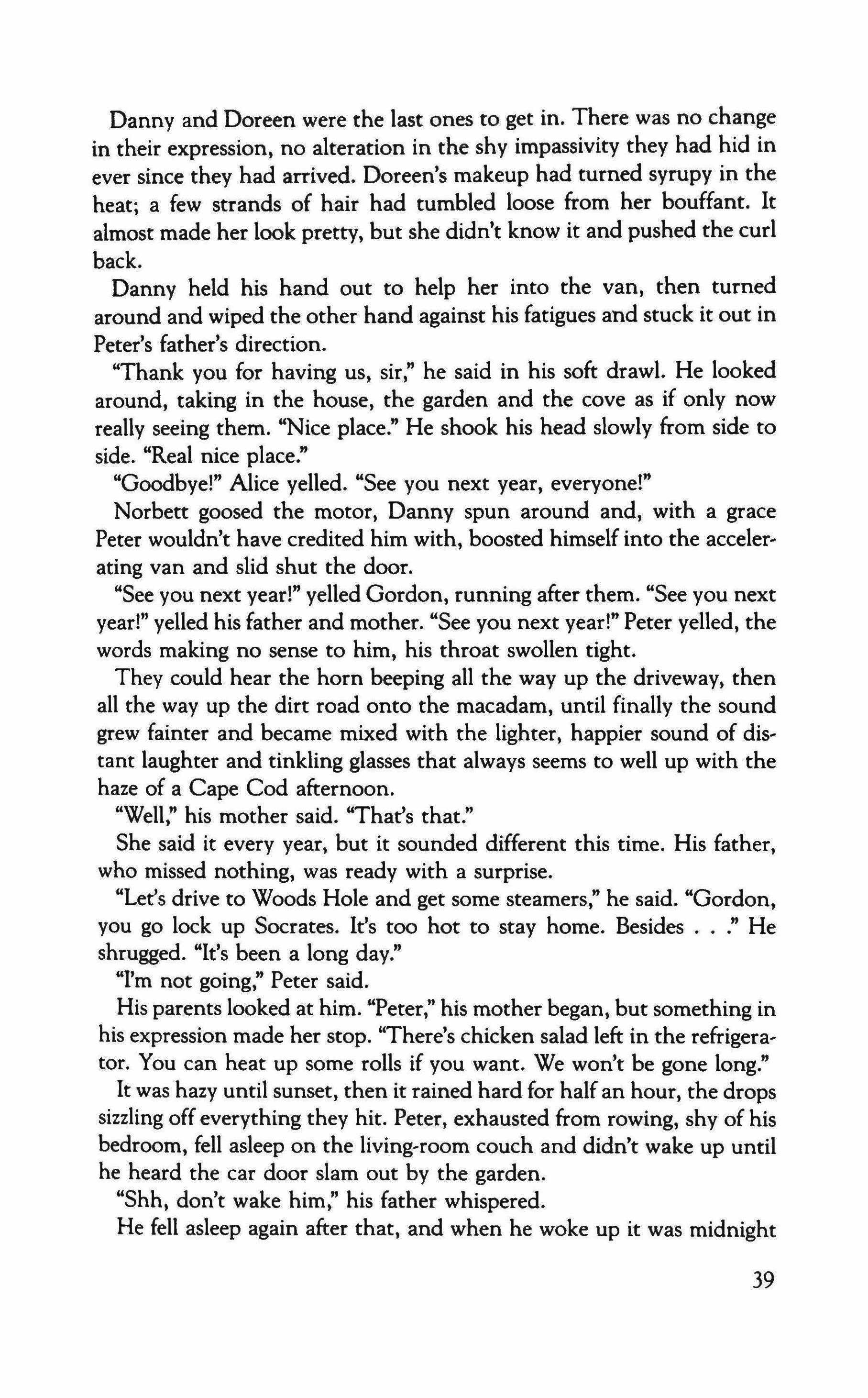
Danny and Doreen were the last ones to get in. There was no change in their expression, no alteration in the shy impassivity they had hid in ever since they had arrived. Doreen's makeup had turned syrupy in the heat; a few strands of hair had tumbled loose from her bouffant. It almost made her look pretty, but she didn't know it and pushed the curl back.
Danny held his hand out to help her into the van, then turned around and wiped the other hand against his fatigues and stuck it out in Peter's father's direction.
"Thank you for having us, sir," he said in his soft drawl. He looked around, taking in the house, the garden and the cove as if only now really seeing them. "Nice place." He shook his head slowly from side to side. "Real nice place."
"Goodbye!" Alice yelled. "See you next year, everyone!"
Norbett goosed the motor, Danny spun around and, with a grace Peter wouldn't have credited him with, boosted himself into the accelerating van and slid shut the door.
"See you next year!" yelled Gordon, running after them. "See you next year!" yelled his father and mother. "See you next year!" Peter yelled, the words making no sense to him, his throat swollen tight.
They could hear the horn beeping all the way up the driveway, then all the way up the dirt road onto the macadam, until finally the sound grew fainter and became mixed with the lighter, happier sound of distant laughter and tinkling glasses that always seems to well up with the haze of a Cape Cod afternoon.
"Well," his mother said. "That's that."
She said it every year, but it sounded different this time. His father, who missed nothing, was ready with a surprise.
"Let's drive to Woods Hole and get some steamers," he said. "Gordon, you go lock up Socrates. It's too hot to stay home. Besides ." He shrugged. "It's been a long day."
"I'm not going," Peter said.
His parents looked at him. "Peter," his mother began, but something in his expression made her stop. "There's chicken salad left in the refrigerator. You can heat up some rolls if you want. We won't be gone long."
It was hazy until sunset, then it rained hard for half an hour, the drops sizzling off everything they hit. Peter, exhausted from rowing, shy of his bedroom, fell asleep on the living-room couch and didn't wake up until he heard the car door slam out by the garden.
"Shh, don't wake him," his father whispered.
He fell asleep again after that, and when he woke up it was midnight
39

and much cooler. He groped around the closet until he found his father's sweater, then stumbled outdoors onto the lawn. He was in the dreamy, lazy state that follows hard upon exhaustion when things that happened a few hours ago already seem inconceivably remote. Had the Gerards really come? There were empty soda cans on the patio, their lids silvery and wet, but it was the only evidence he found.
Peter walked toward the water with no fixed intention. The moon was full, and it would have been a perfect night to crawl to Camp Wampanoag, but for some reason the fierce desire he usually felt wasn't there. Instead, he continued down the steps and balanced his way out the dock to its end.
The pond was still after the rain. The moon was low enough that its beams came diagonally across the surface of the water, casting a narrow band of milkiness from the far shore to his feet. As he stood there watching it, looking for the chop in the surface that meant feeding blues, something remarkable happened. A swan, one of six the pond was home to, swam across the farthest, broadest part of the band, its head upright and curious, its wings puffed and feathery, its motion stately without strain. Peter stared at it like he had never stared at anything before, trying to make the seeing so hard and so permanent it would never leave him. He knew, without anyone telling him, it was the most beautiful sight he had ever seen.
It didn't last long. By the time he really saw it, the swan was past the band into the darkness. As it disappeared - in the regret ofthe moment's passing - he felt a chill settle across his shoulders and his intuition take a sudden leap ahead. All summer long his knowing had butted itself against the secret, unreadable blankness of things, and now suddenly here it was past them, skipping ahead the way a twelve-year-old's imagination sometimes will, so that the truths that come then are often the most lasting. He knew, watching the swan glide off, that whatever else happened in the future, life would continue to present itself to him in that same shimmery, ungraspable way-that behind distant islands and distant girls' camps and lowered flags and adult silences was nothing he could isolate and give answers to, nothing concrete, but only these intertwined bewildering strands of beauty and sadness and mystery combined.
Doreen, that is, on her knees by the side of the bed, her hair stroked by a Danny who is crying. Doreen on her knees resting her cheek against the side of Danny's leg, crying likewise, Doreen with her chewing gum reaching down to tie with inexpressible tenderness the laces of her husband's boots.
40
Story of My Weight
Anne Calcagno

Until the other day, I did not know my feet had become so crookedly misshapen and wide. I told myself my socks were unnecessarily thick; the weather too hot; it stood to reason my shoes were squeezing me. That wasn't true. The things I owned or faced hadn't twisted on me: it was me. I had changed without knowing it because I hadn't looked my way for a long time. With my eyes focused away from me, I've lived out my days in an interlude. Because when I suddenly saw the width of my warped feet, my eyes next traveled up the length of my legs, noticing mottled bruises like disheveled leaves rotting on my legs-I have distracredly smashed into things. I moved to cover them, saw the back of my hand, vein-swelled and colorful, too, like a cabbage leaf. In surprise, I touched my face, the skin slack as silk. I was stunned; as if it all happens in one day, the pieces lined up: I am not young. It feels as if I have always been fat. I married twenty-three years ago, have been overweight for twenty. Over time, I lost all personal perspective, grew overwhelmed in reaction to wide-eyed glances: when you're fat you're a focus. In public places, like the supermarket, they observe you until you can't get away from being your own prisoner. Wheeling my cart around, I peered at as much as I could, before fleeing. I've been an exaggeration of cells, a reduced woman. My short blond hair curls into squat corkscrews, tips up; sometimes, when the perm is running out, I look bristling. Yet, when the harried supermarket cashier glances up, I'm the one whose eyes roll into her lap. This is how it is to be an anomaly. Yet, the point is: the other day I looked at my feet, which are gnarled by widening corns, and it became terribly clear: like other women, conclusively mortal, I am going by degrees. No one is a constant picture.
41
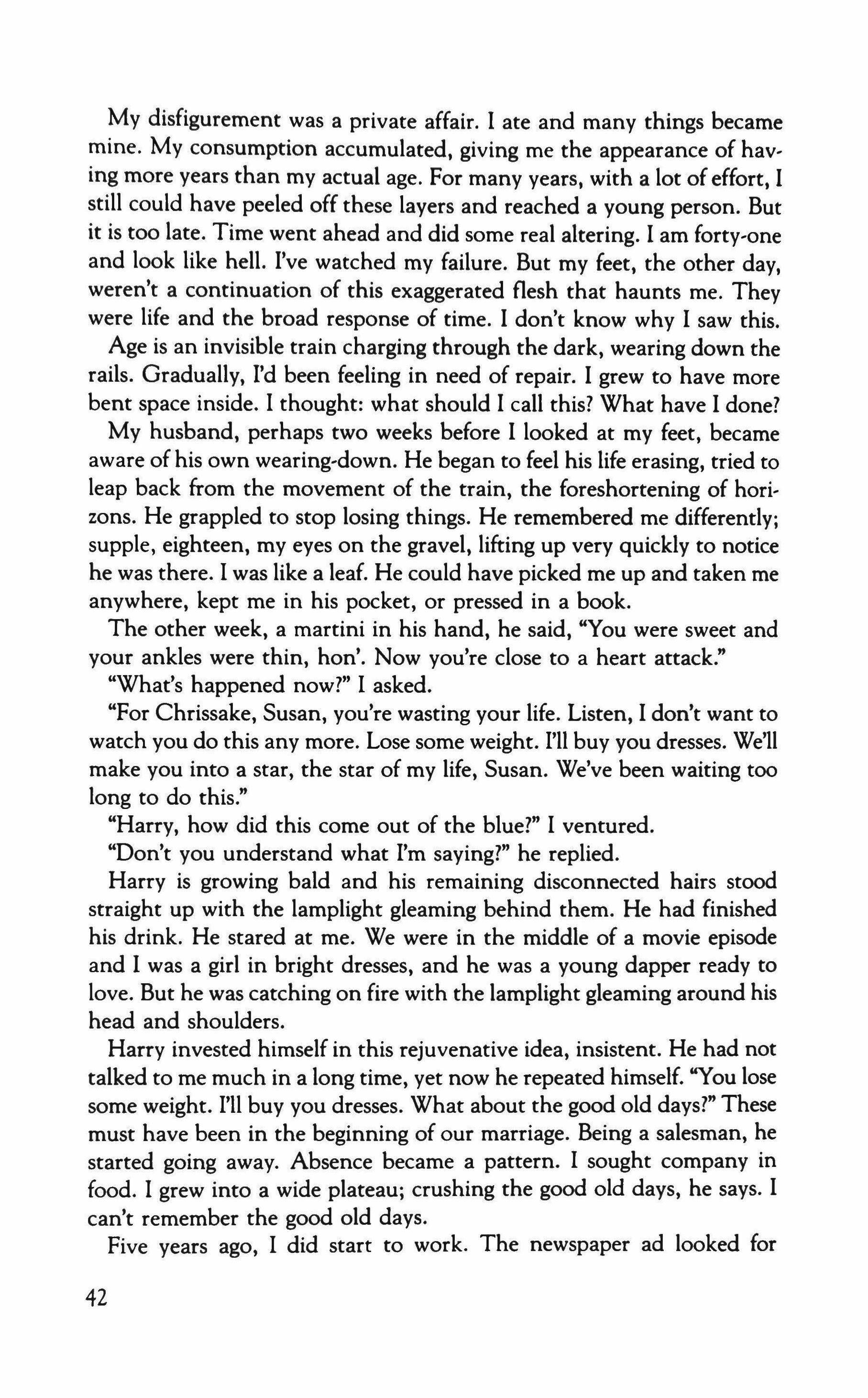
My disfigurement was a private affair. I ate and many things became mine. My consumption accumulated, giving me the appearance of having more years than my actual age. For many years, with a lot ofeffort, I still could have peeled off these layers and reached a young person. But it is too late. Time went ahead and did some real altering. I am forty-one and look like hell. I've watched my failure. But my feet, the other day, weren't a continuation of this exaggerated flesh that haunts me. They were life and the broad response of time. I don't know why I saw this.
Age is an invisible train charging through the dark, wearing down the rails. Gradually, I'd been feeling in need of repair. I grew to have more bent space inside. I thought: what should I call this? What have I done?
My husband, perhaps two weeks before I looked at my feet, became aware of his own wearing-down. He began to feel his life erasing, tried to leap back from the movement of the train, the foreshortening of horizons. He grappled to stop losing things. He remembered me differently; supple, eighteen, my eyes on the gravel, lifting up very quickly to notice he was there. I was like a leaf. He could have picked me up and taken me anywhere, kept me in his pocket, or pressed in a book.
The other week, a martini in his hand, he said, "You were sweet and your ankles were thin, hon'. Now you're close to a heart attack."
"What's happened now?" I asked.
"For Chrissake, Susan, you're wasting your life. Listen, I don't want to watch you do this any more. Lose some weight. I'll buy you dresses. We11 make you into a star, the star of my life, Susan. We've been waiting too long to do this."
"Harry, how did this come out of the blue?" I ventured.
"Don't you understand what I'm saying?" he replied.
Harry is growing bald and his remaining disconnected hairs stood straight up with the lamplight gleaming behind them. He had finished his drink. He stared at me. We were in the middle of a movie episode and I was a girl in bright dresses, and he was a young dapper ready to love. But he was catching on fire with the lamplight gleaming around his head and shoulders.
Harry invested himself in this rejuvenative idea, insistent. He had not talked to me much in a long time, yet now he repeated himself. "You lose some weight. I'll buy you dresses. What about the good old days?" These must have been in the beginning of our marriage. Being a salesman, he started going away. Absence became a pattern. I sought company in food. I grew into a wide plateau; crushing the good old days, he says. I can't remember the good old days.
Five years ago, I did start to work. The newspaper ad looked for
42
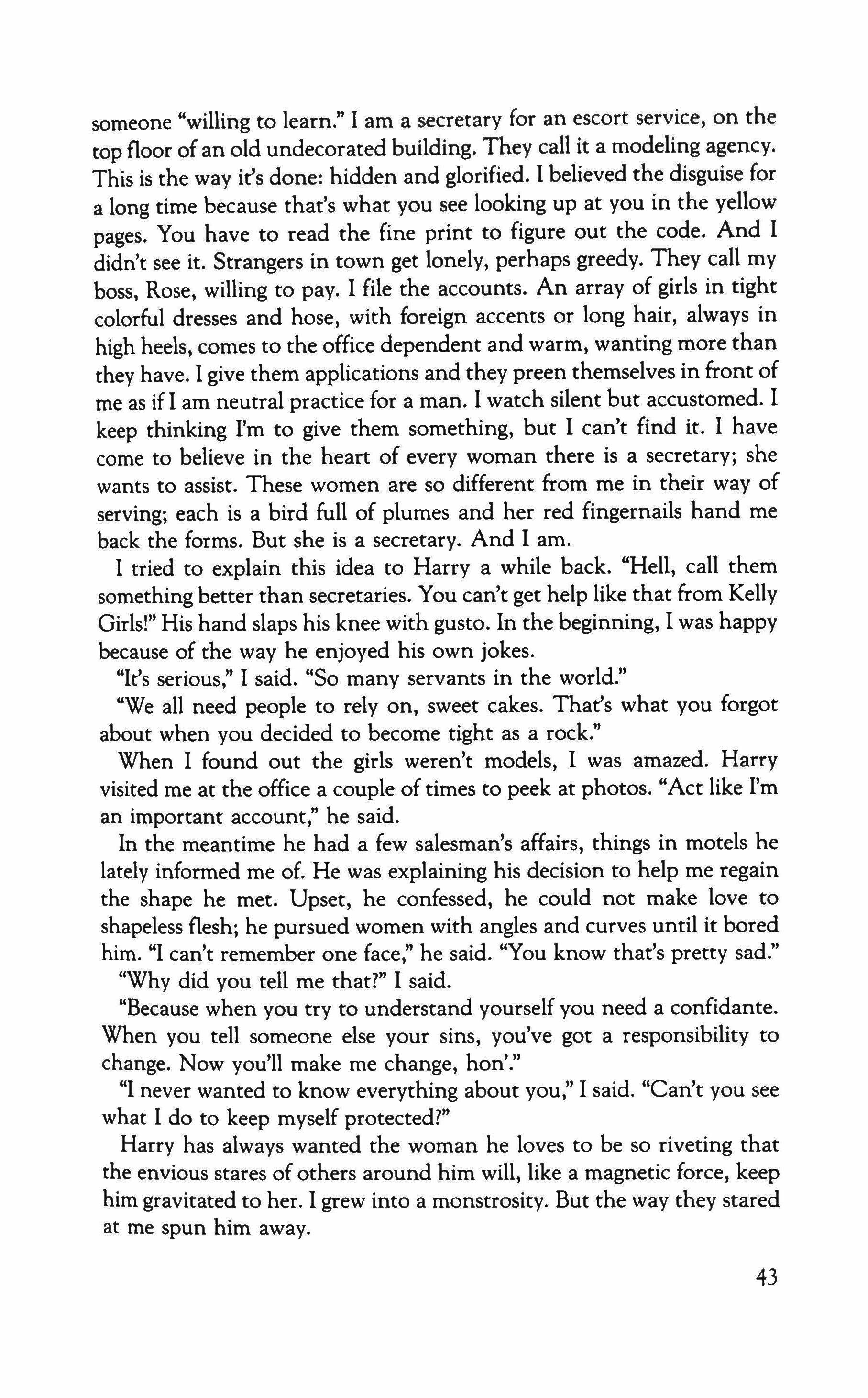
someone "willing to learn." I am a secretary for an escort service, on the top floor of an old undecorated building. They call it a modeling agency. This is the way it's done: hidden and glorified. I believed the disguise for a long time because that's what you see looking up at you in the yellow pages. You have to read the fine print to figure out the code. And I didn't see it. Strangers in town get lonely, perhaps greedy. They call my boss, Rose, willing to pay. I file the accounts. An array of girls in tight colorful dresses and hose, with foreign accents or long hair, always in high heels, comes to the office dependent and warm, wanting more than they have. I give them applications and they preen themselves in front of me as if I am neutral practice for a man. I watch silent but accustomed. I keep thinking I'm to give them something, but I can't find it. I have come to believe in the heart of every woman there is a secretary; she wants to assist. These women are so different from me in their way of serving; each is a bird full of plumes and her red fingernails hand me back the forms. But she is a secretary. And I am.
I tried to explain this idea to Harry a while back. "Hell, call them something better than secretaries. You can't get help like that from Kelly Girls!" His hand slaps his knee with gusto. In the beginning, I was happy because of the way he enjoyed his own jokes.
"It's serious," I said. "So many servants in the world."
"We all need people to rely on, sweet cakes. That's what you forgot about when you decided to become tight as a rock."
When I found out the girls weren't models, I was amazed. Harry visited me at the office a couple of times to peek at photos. "Act like I'm an important account," he said.
In the meantime he had a few salesman's affairs, things in motels he lately informed me of. He was explaining his decision to help me regain the shape he met. Upset, he confessed, he could not make love to shapeless flesh; he pursued women with angles and curves until it bored him. "I can't remember one face," he said. "You know that's pretty sad."
"Why did you tell me that?" I said.
"Because when you try to understand yourself you need a confidante. When you tell someone else your sins, you've got a responsibility to change. Now you'll make me change, hon',"
"I never wanted to know everything about you," I said. "Can't you see what I do to keep myself protected?"
Harry has always wanted the woman he loves to be so riveting that the envious stares of others around him will, like a magnetic force, keep him gravitated to her. I grew into a monstrosity. But the way they stared at me spun him away.
43
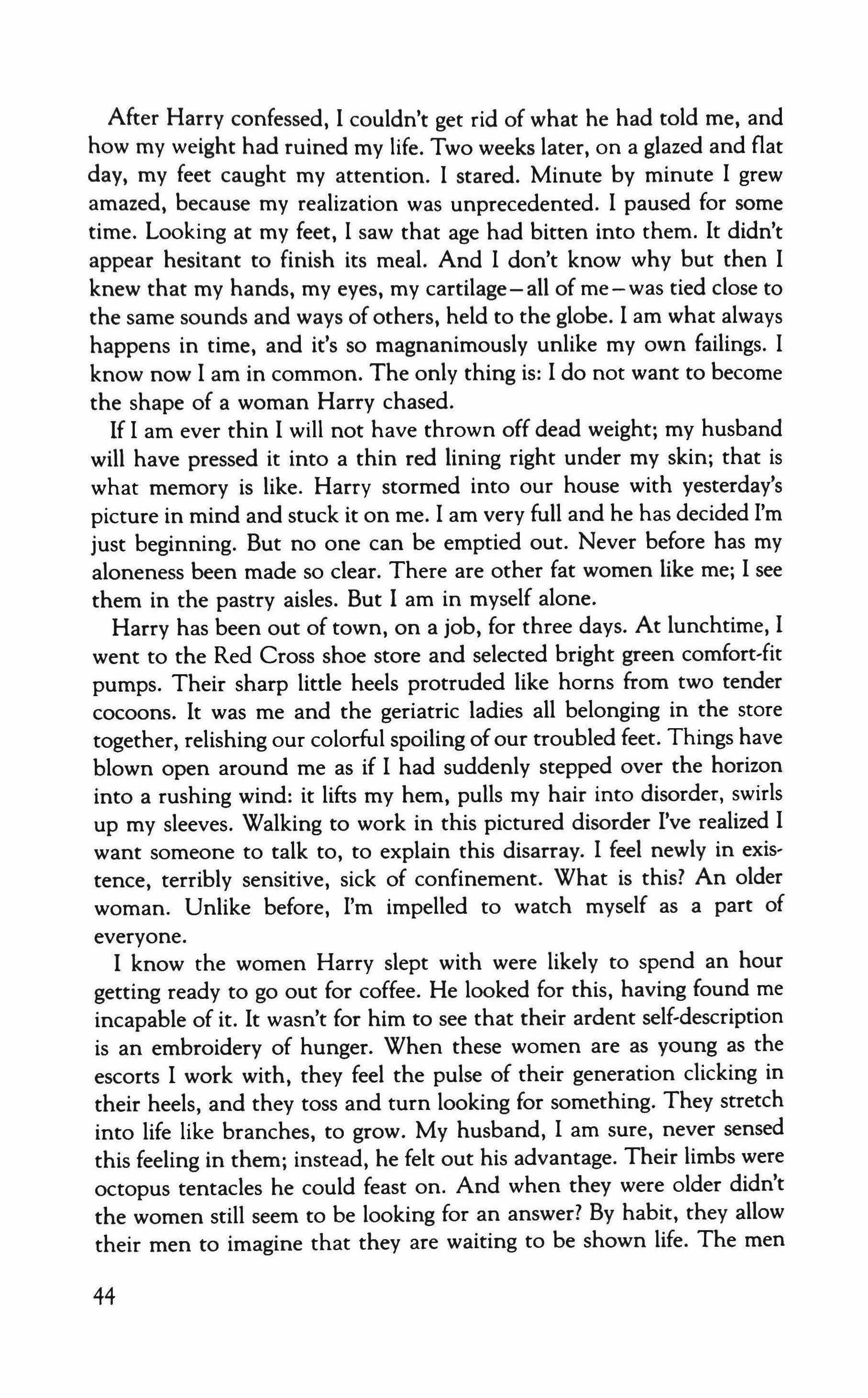
After Harry confessed, I couldn't get rid of what he had told me, and how my weight had ruined my life. Two weeks later, on a glazed and flat day, my feet caught my attention. I stared. Minute by minute I grew amazed, because my realization was unprecedented. I paused for some time. Looking at my feet, I saw that age had bitten into them. It didn't appear hesitant to finish its meal. And I don't know why but then I knew that my hands, my eyes, my cartilage-all of me-was tied close to the same sounds and ways of others, held to the globe. I am what always happens in time, and it's so magnanimously unlike my own failings. I know now I am in common. The only thing is: I do not want to become the shape of a woman Harry chased.
If I am ever thin I will not have thrown off dead weight; my husband will have pressed it into a thin red lining right under my skin; that is what memory is like. Harry stormed into our house with yesterday's picture in mind and stuck it on me. I am very full and he has decided I'm just beginning. But no one can be emptied out. Never before has my aloneness been made so clear. There are other fat women like me; I see them in the pastry aisles. But I am in myself alone.
Harry has been out of town, on a job, for three days. At lunchtime, I went to the Red Cross shoe store and selected bright green comfort-fit pumps. Their sharp little heels protruded like horns from two tender cocoons. It was me and the geriatric ladies all belonging in the store together, relishing our colorful spoiling of our troubled feet. Things have blown open around me as if I had suddenly stepped over the horizon into a rushing wind: it lifts my hem, pulls my hair into disorder, swirls up my sleeves. Walking to work in this pictured disorder I've realized I want someone to talk to, to explain this disarray. I feel newly in existence, terribly sensitive, sick of confinement. What is this? An older woman. Unlike before, I'm impelled to watch myself as a part of everyone.
I know the women Harry slept with were likely to spend an hour getting ready to go out for coffee. He looked for this, having found me incapable of it. It wasn't for him to see that their ardent self-description is an embroidery of hunger. When these women are as young as the escorts I work with, they feel the pulse of their generation clicking in their heels, and they toss and turn looking for something. They stretch into life like branches, to grow. My husband, I am sure, never sensed this feeling in them; instead, he felt out his advantage. Their limbs were octopus tentacles he could feast on. And when they were older didn't the women still seem to be looking for an answer? By habit, they allow their men to imagine that they are waiting to be shown life. The men
44

become accustomed mostly to devouring them blind. The women don't ask for change. They don't like change. They want to remain beautiful and wanted. Over the years it takes more and more time.
Today, a girl walked into the office, rather tall in a red coat. Her hair was bleached, curling down her shoulders, her nose pointed, her mouth plump as a rosebud. She reminded me of a picture of the women at Louis XVI's court in France, women in high hair and lace, with red cheeks, women decadent in their life, who at the end of the world said: "Let them eat cake."
I wondered if she knew about any of this. "You think women under, stand the world less than men?" I asked.
She looked at me and her eyes turned very thin. "Are you kidding? Everyone of those men had a mom, and if those moms hadn't been preparing men for the world the men wouldn't be able to handle any' thing." She looked at her red fingernails. "It takes a woman to know," she said. Then she leaned close to me. "I know how to baby men, too," she said.
"Don't do it," I said.
"Shit. I don't have much time. Is this an interview?" She pulled her hose up, tightening them, first up her ankles, then along her thighs.
"They look at photos before the interview," I said.
"I look good," she said. Then Rose called the girl into her office.
I made a collect call to my friend Rema, whom I've known since childhood. She listens without needing preliminaries though she lives far away. "Rema, thank God you're home. Can you listen now?"
"Well, tell me."
"It just hit me like a ton of bricks that I haven't given myself a look in years. Who've I been?"
"You've been living, honey," Rema says. "Where did you get this idea you have to stare at yourself all the time, to live? That can hold you up. Plenty of people go nuts."
"No. We don't have this idea straight, most of us: you have gold running in your veins, up to your heart; if you see that, you begin to catch it."
"Some people might feel that way," she says. "Sure some do. What's been happening?" Her voice is patient as lake water.
"I can't understand myselfwhy everything has changed," I say. "Every' thing seems on fire. It makes me so nervous." I just looked at my feet.
Rema says, "That's how it is: you can't tell when the next thing is going to happen."
After work I like to walk a few extra blocks to the bus for exercise.
45
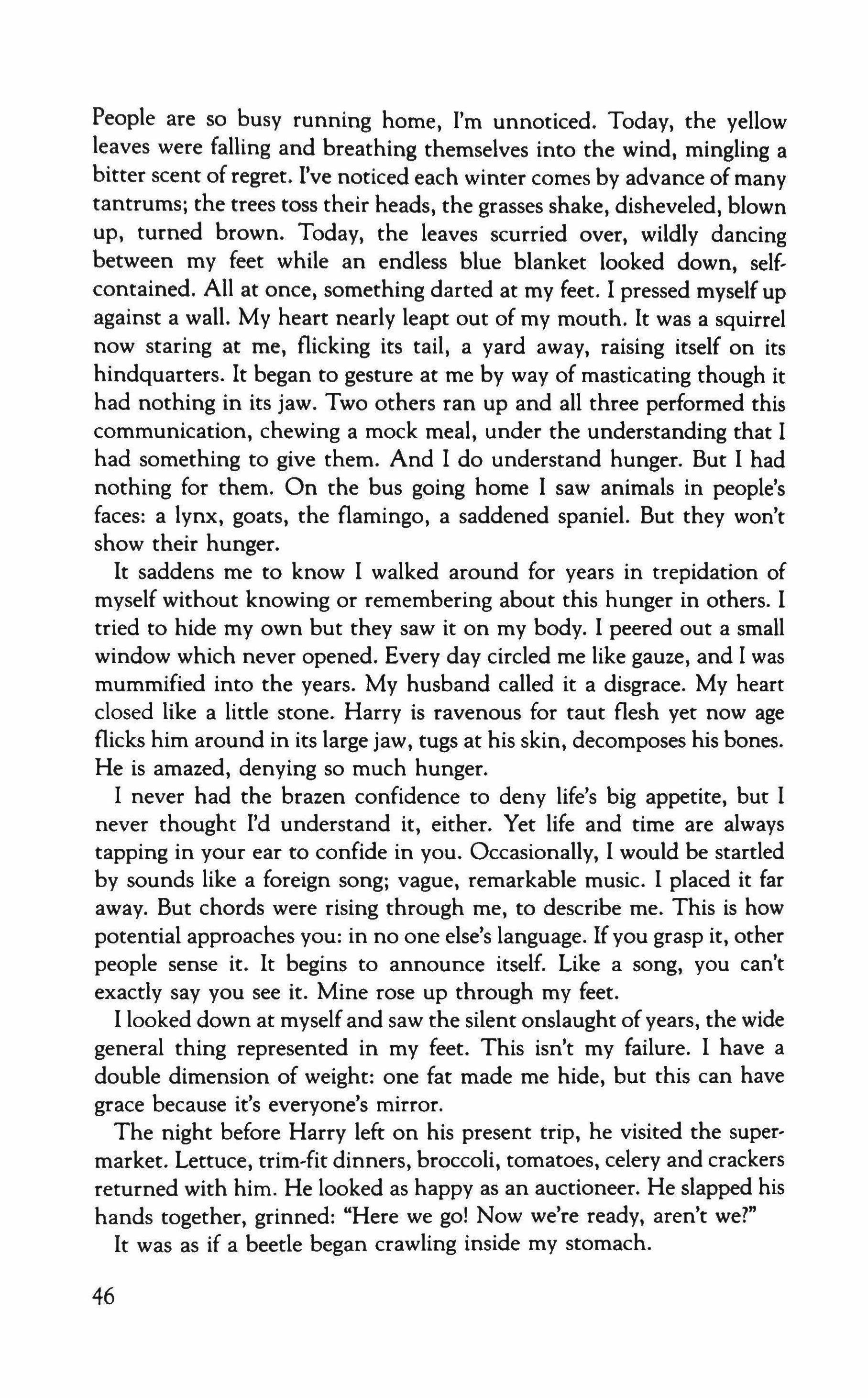
People are so busy running home, I'm unnoticed. Today, the yellow leaves were falling and breathing themselves into the wind, mingling a bitter scent of regret. I've noticed each winter comes by advance of many tantrums; the trees toss their heads, the grasses shake, disheveled, blown up, turned brown. Today, the leaves scurried over, wildly dancing between my feet while an endless blue blanket looked down, selfcontained. All at once, something darted at my feet. I pressed myself up against a wall. My heart nearly leapt out of my mouth. It was a squirrel now staring at me, flicking its tail, a yard away, raising itself on its hindquarters. It began to gesture at me by way of masticating though it had nothing in its jaw Two others ran up and all three performed this communication, chewing a mock meal, under the understanding that I had something to give them. And I do understand hunger. But I had nothing for them. On the bus going home I saw animals in people's faces: a lynx, goats, the flamingo, a saddened spaniel. But they won't show their hunger.
It saddens me to know I walked around for years in trepidation of myself without knowing or remembering about this hunger in others. I tried to hide my own but they saw it on my body. I peered out a small window which never opened. Every day circled me like gauze, and I was mummified into the years. My husband called it a disgrace. My heart closed like a little stone. Harry is ravenous for taut flesh yet now age flicks him around in its large jaw, tugs at his skin, decomposes his bones. He is amazed, denying so much hunger.
I never had the brazen confidence to deny life's big appetite, but I never thought I'd understand it, either. Yet life and time are always tapping in your ear to confide in you. Occasionally, I would be startled by sounds like a foreign song; vague, remarkable music. I placed it far away. But chords were rising through me, to describe me. This is how potential approaches you: in no one else's language. If you grasp it, other people sense it. It begins to announce itself. Like a song, you can't exactly say you see it. Mine rose up through my feet.
I looked down at myself and saw the silent onslaught of years, the wide general thing represented in my feet. This isn't my failure. I have a double dimension of weight: one fat made me hide, but this can have grace because it's everyone's mirror.
The night before Harry left on his present trip, he visited the supermarket. Lettuce, trim-fit dinners, broccoli, tomatoes, celery and crackers returned with him. He looked as happy as an auctioneer. He slapped his hands together, grinned: "Here we go! Now we're ready, aren't we?"
It was as if a beetle began crawling inside my stomach.
46

"The thing I want to tell you, honey, is that this isn't just about taking off pounds; it's about building a whole new spirit. A spic-and-span streamlined one, Susie. I can hardly wait."
I looked straight at him. "What I'm concerned with is my spirit. But you can't get it with celery. How could you go looking in the supermarketr
Harry's eyes retracted quick as crabs. "You're a coward?" he asked me. "Are you? Shit, you're the biggest disappointment in my life." He turned around to the kitchen sink and spat in it. Then he grabbed the porcelain edge as if he was saving it from falling off the wall. "You're going to ruin our life," he shouted.
I have my age. It climbs around my hips and pulls them down into more and more chairs. All my veins are pulsing more fiercely, and this work, through time, has slackened my skin, interspersed it with magnets and marbles. This is an accumulation I must tend to. Life surreptitiously crowded in me. I want to walk through my markings, to pick them up as on a cafeteria line, then to have so full a dish I'll be stunned by it. Age is a sort of overeating.
I've noticed many of the escorts from my office fear life will pass them by. They fling themselves into the world to be touched. Life has walked through me and, like a town square, I have been mute through the walkings, have been the vessel, not the subject. I see that though I did not pay attention to the way life was changing me, I cannot say it passed me by. It passes no one by. I must try to tell them this. Age draws itself on the flesh and time becomes palpable. You can tell yourself certain things did not happen and let your mind become a blank slate, but the flesh won't play chameleon. It stabilizes you, and imprints the artifacts of your route; they're yours.
I am rising, heavy and powerful as an old seal, independent in my digestion, awake.
47
Plus You
Fred Pfeil

IMark grew up in the suburbs. A medium-ritzv neighborhood, two-car garages, plenty of lawn. Houses mostly real modern-glass, hardwood floors, split-level tricks-but some also of the older kind of classy house with second floors and sometimes shutters. Or like those really old windows with iron frames running through dividing them up, or those kind of rough plaster walls and red curved Spanish tile things up on the roof. Where he lived with his family, though, was one ofthe modernistic ones.
It wasn't bad growing up there in the suburbs, mostly Mark didn't think about it one way or the other. Not until somewhere in high school, when you'd be like laying around hanging out with Tommy, David and whoever, getting messed up on some weed or whatever at somebodv's house. Then at some point they'd pull their eyes away from the tube, look around the room like it and all the stuff inside it had just shown up out of nowhere, and say Man I gotta get out of here, you know? There's nothing happening, it's driving me crazy, you know what I mean? And then, when they said that Mark realized Yeah he did know, he'd been feeling that same thing, that same low dull noise in his head. And he started coming out with the same sort of thing.
So the way the singing thing started was this one guy Allan, who they hung around with sometimes and whose father, everybody's orthodontist, ran around all the time in white deck pants and an Alfa Romeo being Mr. Divorced Superstud-this guy's son Allan had all these old,
48
like classic 45's, he'd been into it since he was like nine. So one day after school they're over there at Allan's listening to this stuff-they meaning Mark and David and Tommy-and they've all like called up their parents' houses to say Yeah, they're having dinner over at Allan's, Yeah Allan's dad Dr. Swigart is there, and Allan, who like desperately wants to hang around with the three of them on a regular basis has practically smashed in his old man's liquor cabinet so they're pretty well wasted on scotch and ginger ale, laying around on the pile carpeting, sprawled around the Swedish living combo, when the next record drops down the spindle and Allan-to impress them, whatever-begins to sing.
"Under the Boardwalk." Original version, by the Drifters. Allan takes the bass line, instrumental on the cut itself. At the time, with his weird pale fatty face, clunky glasses, chubby cheeks, he is a goony sweating guy, almost pathetic. But drunk enough at that moment to take a chance (which, Mark thought later, much later, who knows how long he'd been practicing?), smeared enough not to give a shit how he looks or how it sounds, just go right ahead. And what do you know? It sounds all right! They're laughing at him and everything, but it sounds pretty good! Next thing you know, who was it, Tommy? is up in his chair, filling in on the chorus, Allan's grinning like a fucking madman - Under the board-walk-Tommy's rolling his eyes-Out of the sun-floating it up there, hamming it up, Mark and David's laughing their asses off
Under the board-walk
Under the board-walk
Under the board-walk
Under the board-walk
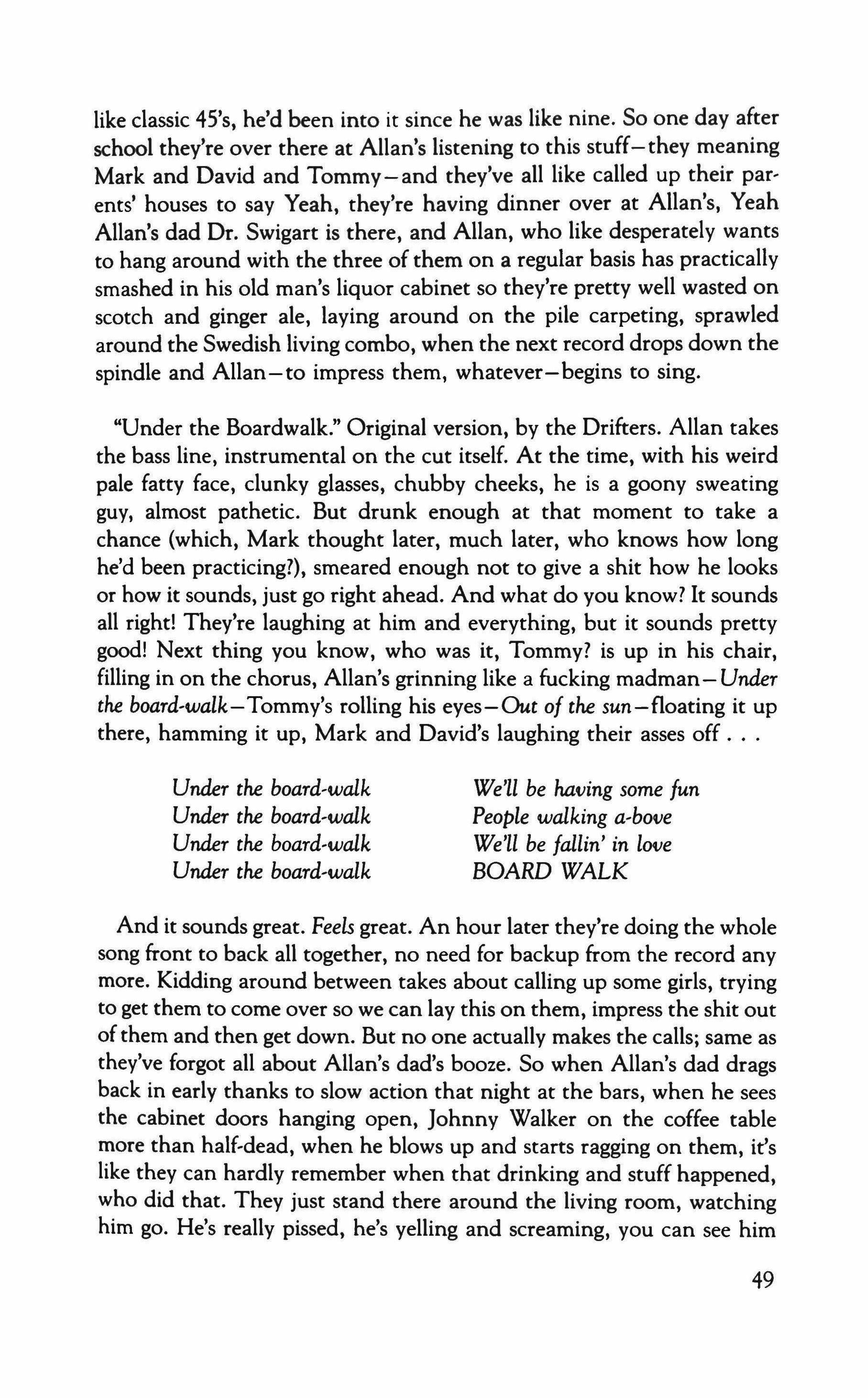
We'll be having some fun
People walking a-bove
We'll be fallin' in love
BOARD WALK
And it sounds great. Feels great. An hour later they're doing the whole song front to back all together, no need for backup from the record any more. Kidding around between takes about calling up some girls, trying to get them to come over so we can lay this on them, impress the shit out ofthem and then get down. But no one actually makes the calls; same as they've forgot all about Allan's dad's booze. So when Allan's dad drags back in early thanks to slow action that night at the bars, when he sees the cabinet doors hanging open, Johnny Walker on the coffee table more than half-dead, when he blows up and starts ragging on them, it's like they can hardly remember when that drinking and stuff happened, who did that. They just stand there around the living room, watching him go. He's really pissed, he's yelling and screaming, you can see him
49
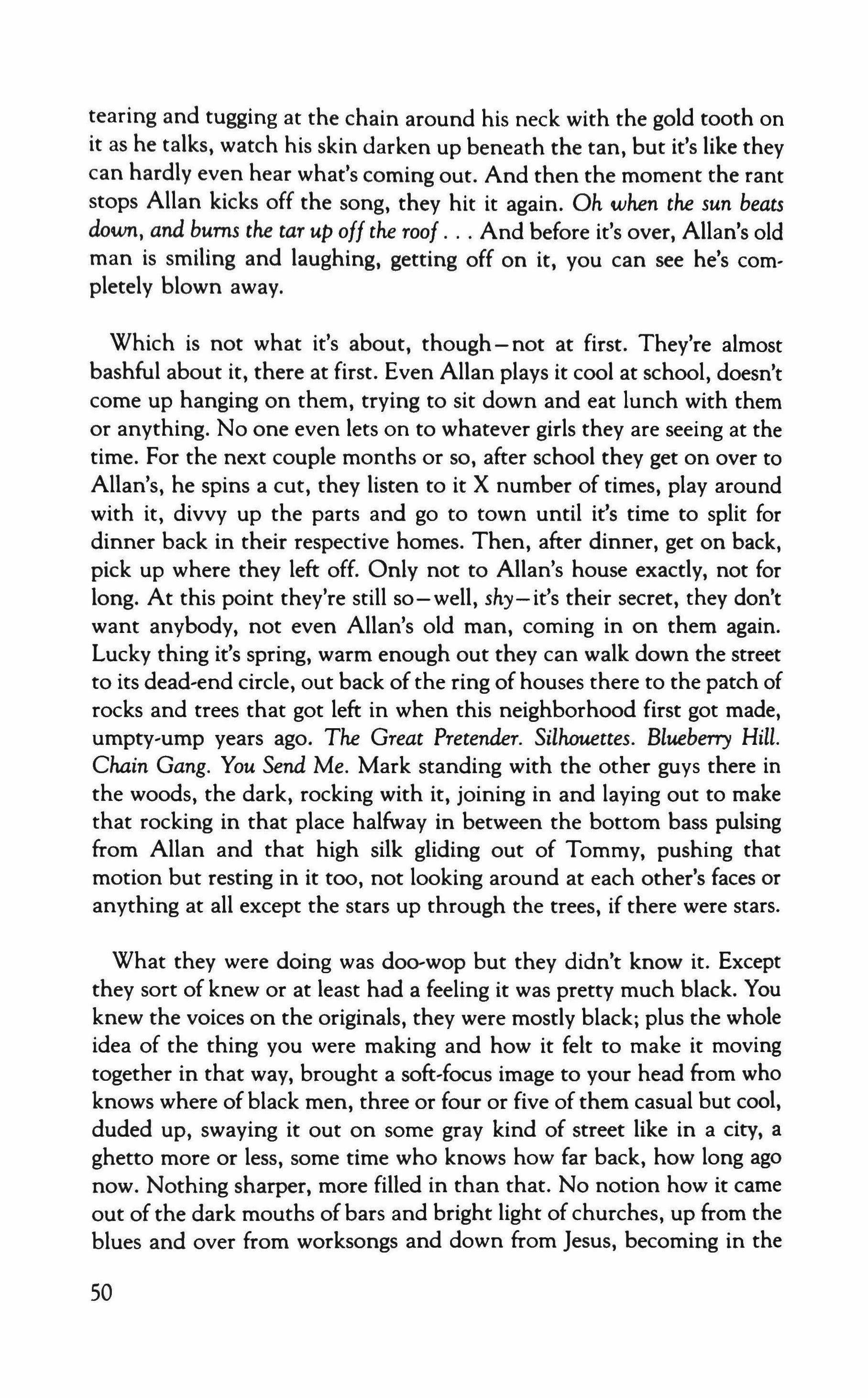
tearing and tugging at the chain around his neck with the gold tooth on it as he talks, watch his skin darken up beneath the tan, but it's like they can hardly even hear what's coming out. And then the moment the rant stops Allan kicks off the song, they hit it again. Oh when the sun beats down, and bums the tar up off the roof And before it's over, Allan's old man is smiling and laughing, getting off on it, you can see he's completely blown away.
Which is not what it's about, though - not at first. They're almost bashful about it, there at first. Even Allan plays it cool at school, doesn't come up hanging on them, trying to sit down and eat lunch with them or anything. No one even lets on to whatever girls they are seeing at the time. For the next couple months or so, after school they get on over to Allan's, he spins a cut, they listen to it X number of times, play around with it, divvy up the parts and go to town until it's time to split for dinner back in their respective homes. Then, after dinner, get on back, pick up where they left off. Only not to Allan's house exactly, not for long. At this point they're still so-well, shy-it's their secret, they don't want anybody, not even Allan's old man, coming in on them again. Lucky thing it's spring, warm enough out they can walk down the street to its dead-end circle, out back of the ring of houses there to the patch of rocks and trees that got left in when this neighborhood first got made, urnptv-ump years ago. The Great Pretender. Silhouettes. Blueberry Hill. Chain Gang. You Send Me. Mark standing with the other guys there in the woods, the dark, rocking with it, joining in and laying out to make that rocking in that place halfway in between the bottom bass pulsing from Allan and that high silk gliding out of Tommy, pushing that motion but resting in it too, not looking around at each other's faces or anything at all except the stars up through the trees, if there were stars.
What they were doing was doo-wop but they didn't know it. Except they sort of knew or at least had a feeling it was pretty much black. You knew the voices on the originals, they were mostly black; plus the whole idea of the thing you were making and how it felt to make it moving together in that way, brought a soft-focus image to your head from who knows where of black men, three or four or five of them casual but cool, duded up, swaying it out on some gray kind of street like in a city, a ghetto more or less, some time who knows how far back, how long ago now. Nothing sharper, more filled in than that. No notion how it came out of the dark mouths ofbars and bright light of churches, up from the blues and over from worksongs and down from Jesus, becoming in the
50
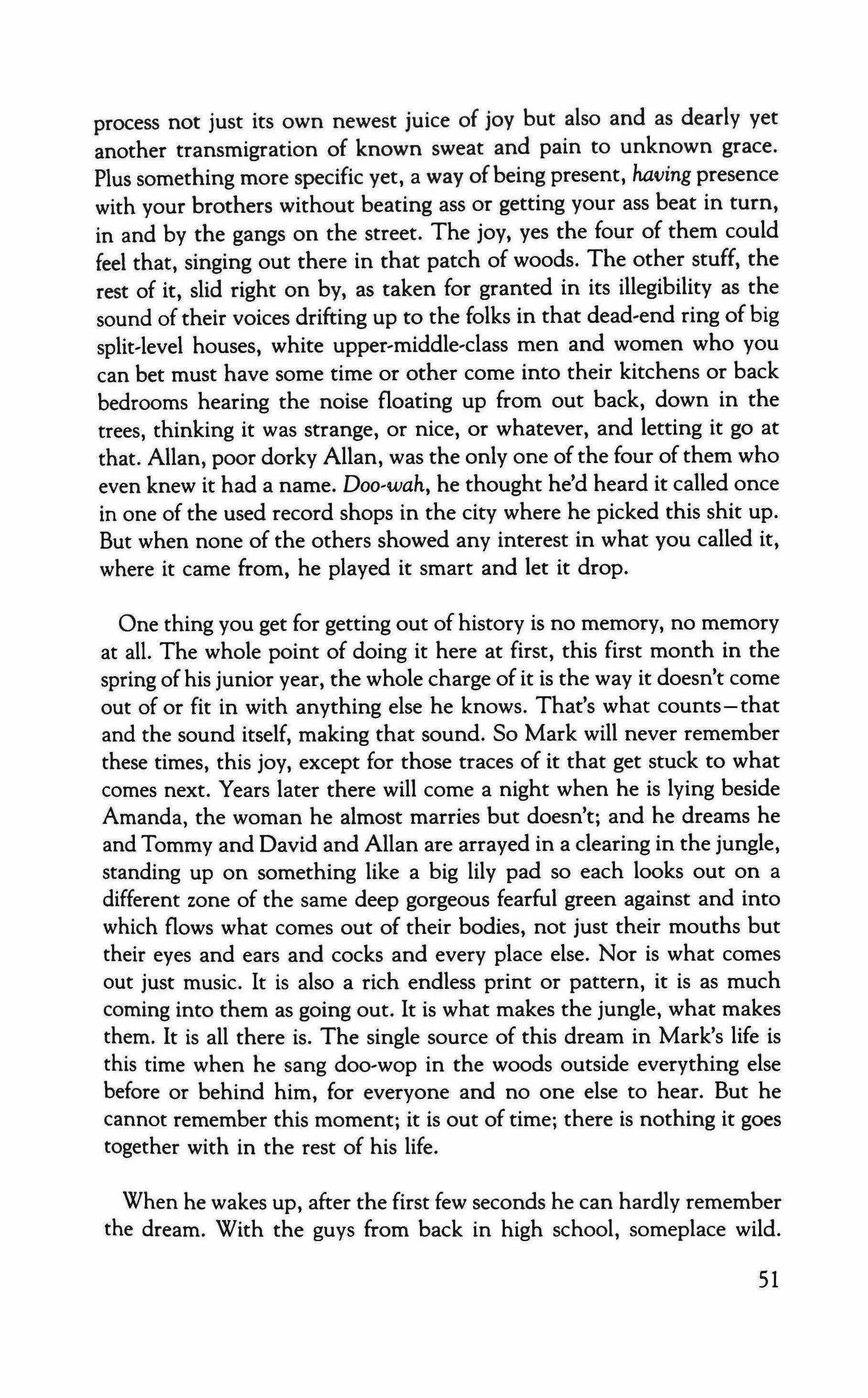
process not just its own newest juice of joy but also and as dearly yet another transmigration of known sweat and pain to unknown grace. Plus something more specific yet, a way ofbeing present, having presence with your brothers without beating ass or getting your ass beat in turn, in and by the gangs on the street. The joy, yes the four of them could feel that, singing out there in that patch of woods. The other stuff, the rest of it, slid right on by, as taken for granted in its illegibility as the sound of their voices drifting up to the folks in that dead-end ring of big split-level houses, white upper-middle-class men and women who you can bet must have some time or other corne into their kitchens or back bedrooms hearing the noise floating up from out back, down in the trees, thinking it was strange, or nice, or whatever, and letting it go at that. Allan, poor dorkv Allan, was the only one ofthe four ofthem who even knew it had a name. Doo�wah, he thought he'd heard it called once in one of the used record shops in the city where he picked this shit up. But when none of the others showed any interest in what you called it, where it carne from, he played it smart and let it drop.
One thing you get for getting out of history is no memory, no memory at all. The whole point of doing it here at first, this first month in the spring of his junior year, the whole charge of it is the way it doesn't corne out of or fit in with anything else he knows. That's what counts-that and the sound itself, making that sound. So Mark will never remember these times, this joy, except for those traces of it that get stuck to what comes next. Years later there will corne a night when he is lying beside Amanda, the woman he almost marries but doesn't; and he dreams he and Tommy and David and Allan are arrayed in a clearing in the jungle, standing up on something like a big lily pad so each looks out on a different zone of the same deep gorgeous fearful green against and into which flows what comes out of their bodies, not just their mouths but their eyes and ears and cocks and every place else. Nor is what comes out just music. It is also a rich endless print or pattern, it is as much coming into them as going out. It is what makes the jungle, what makes them. It is all there is. The single source of this dream in Mark's life is this time when he sang doo-wop in the woods outside everything else before or behind him, for everyone and no one else to hear. But he cannot remember this moment; it is out of time; there is nothing it goes together with in the rest of his life.
When he wakes up, after the first few seconds he can hardly remember the dream. With the guys from back in high school, someplace wild.
51
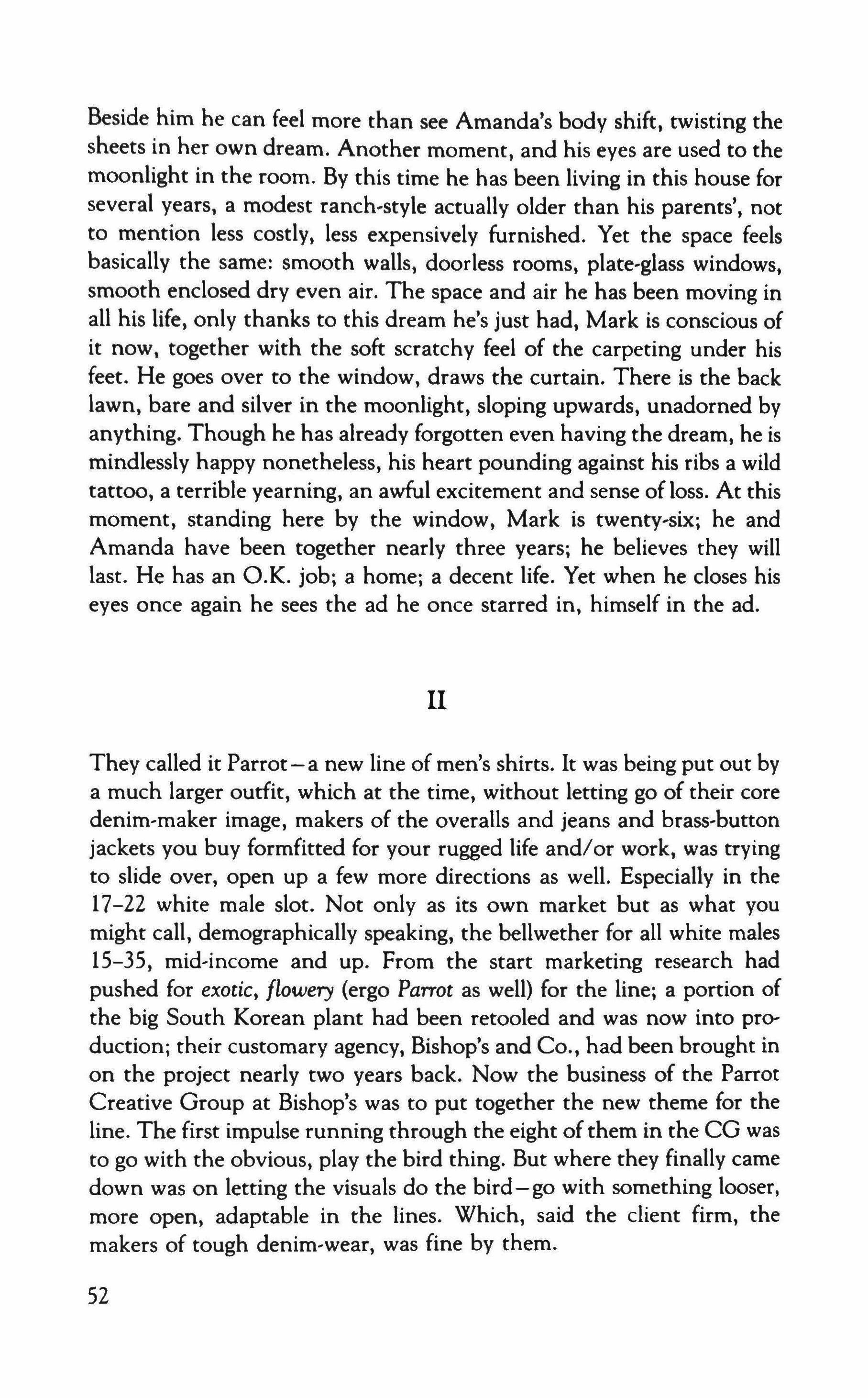
Beside him he can feel more than see Amanda's body shift, twisting the sheets in her own dream. Another moment, and his eyes are used to the moonlight in the room. By this time he has been living in this house for several years, a modest ranch-style actually older than his parents', not to mention less costly, less expensively furnished. Yet the space feels basically the same: smooth walls, doorless rooms, plate-glass windows, smooth enclosed dry even air. The space and air he has been moving in all his life, only thanks to this dream he's just had, Mark is conscious of it now, together with the soft scratchy feel of the carpeting under his feet. He goes over to the window, draws the curtain. There is the back lawn, bare and silver in the moonlight, sloping upwards, unadorned by anything. Though he has already forgotten even having the dream, he is mindlessly happy nonetheless, his heart pounding against his ribs a wild tattoo, a terrible yearning, an awful excitement and sense of loss. At this moment, standing here by the window, Mark is twenty-six; he and Amanda have been together nearly three years; he believes they will last. He has an O.K. job; a home; a decent life. Yet when he closes his eyes once again he sees the ad he once starred in, himself in the ad.
II
They called it Parrot-a new line of men's shirts. It was being put out by a much larger outfit, which at the time, without letting go of their core denim-maker image, makers of the overalls and jeans and brass-button jackets you buy formfitted for your rugged life and/or work, was trying to slide over, open up a few more directions as well. Especially in the 17-22 white male slot. Not only as its own market but as what you might call, demographically speaking, the bellwether for all white males 15-35, mid-income and up. From the start marketing research had pushed for exotic, flowery (ergo Parrot as well) for the line; a portion of the big South Korean plant had been retooled and was now into production; their customary agency, Bishop's and Co., had been brought in on the project nearly two years back. Now the business of the Parrot Creative Group at Bishop's was to put together the new theme for the line. The first impulse running through the eight of them in the CG was to go with the obvious, play the bird thing. But where they finally came down was on letting the visuals do the bird-go with something looser, more open, adaptable in the lines. Which, said the client firm, the makers of tough denim-wear, was fine by them.
52
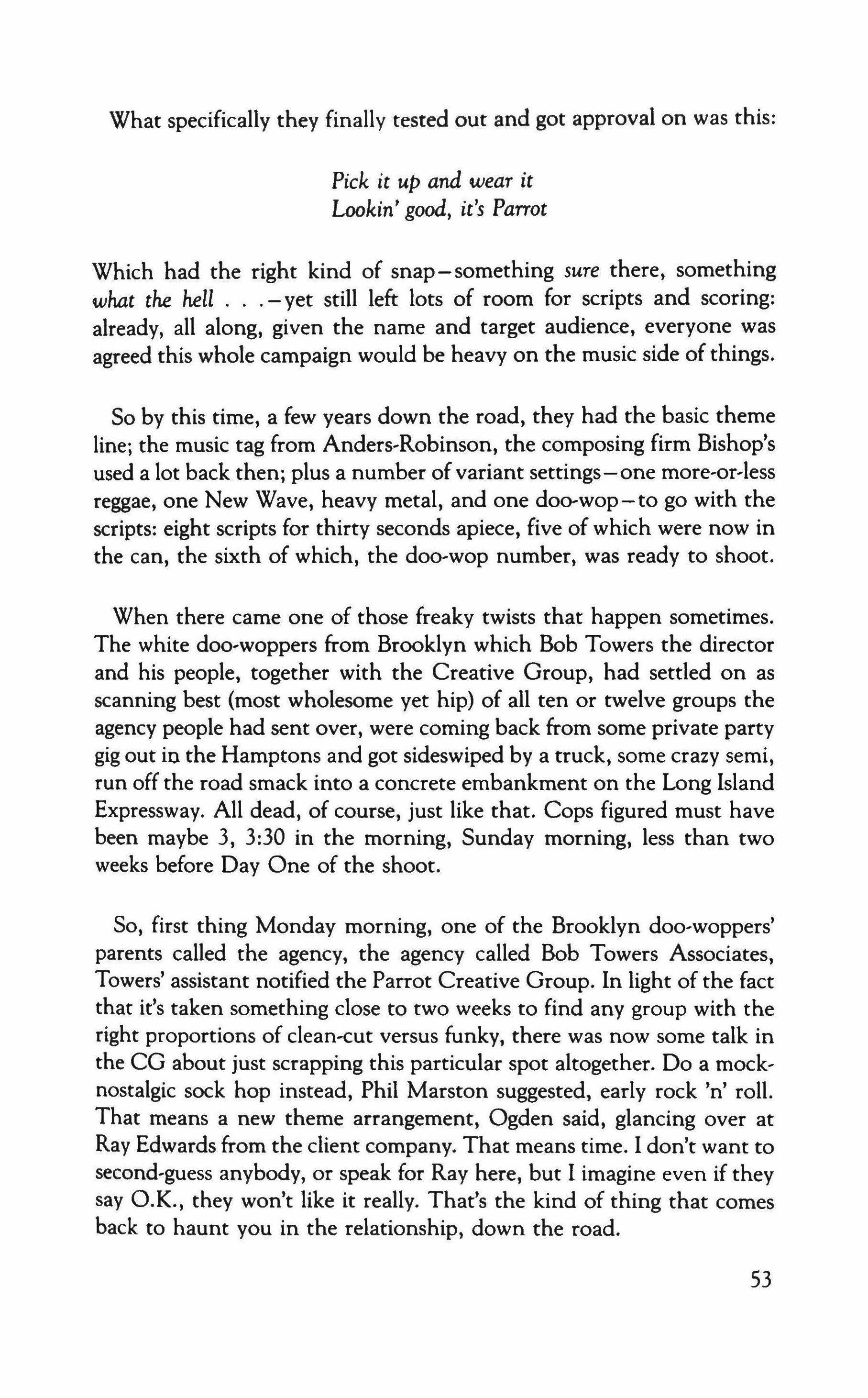
What specifically they finally tested out and got approval on was this:
Pick it up and wear it
Lookin' good, it's Parrot
Which had the right kind of snap-something sure there, something what the hell - yet still left lots of room for scripts and scoring: already, all along, given the name and target audience, everyone was agreed this whole campaign would be heavy on the music side of things.
So by this time, a few years down the road, they had the basic theme line; the music tag from Anders-Robinson, the composing firm Bishop's used a lot back then; plus a number of variant settings-one more-or-less reggae, one New Wave, heavy metal, and one doo-wop=ro go with the scripts: eight scripts for thirty seconds apiece, five of which were now in the can, the sixth of which, the doo-wop number, was ready to shoot.
When there carne one of those freaky twists that happen sometimes. The white doo-woppers from Brooklyn which Bob Towers the director and his people, together with the Creative Group, had settled on as scanning best (most wholesome yet hip) of all ten or twelve groups the agency people had sent over, were corning back from some private party gig out in the Hamptons and got sideswiped by a truck, some crazy semi, run off the road smack into a concrete embankment on the Long Island Expressway. All dead, of course, just like that. Cops figured must have been maybe 3, 3:30 in the morning, Sunday morning, less than two weeks before Day One of the shoot.
So, first thing Monday morning, one of the Brooklyn doo-woppers' parents called the agency, the agency called Bob Towers Associates, Towers' assistant notified the Parrot Creative Group. In light of the fact that it's taken something close to two weeks to find any group with the right proportions of clean-cut versus funky, there was now some talk in the CG about just scrapping this particular spot altogether. Do a mocknostalgic sock hop instead, Phil Marston suggested, early rock 'n' roll. That means a new theme arrangement, Ogden said, glancing over at Ray Edwards from the client company. That means time. I don't want to second-guess anybody, or speak for Ray here, but I imagine even if they say O.K., they won't like it really. That's the kind of thing that comes back to haunt you in the relationship, down the road.
S3
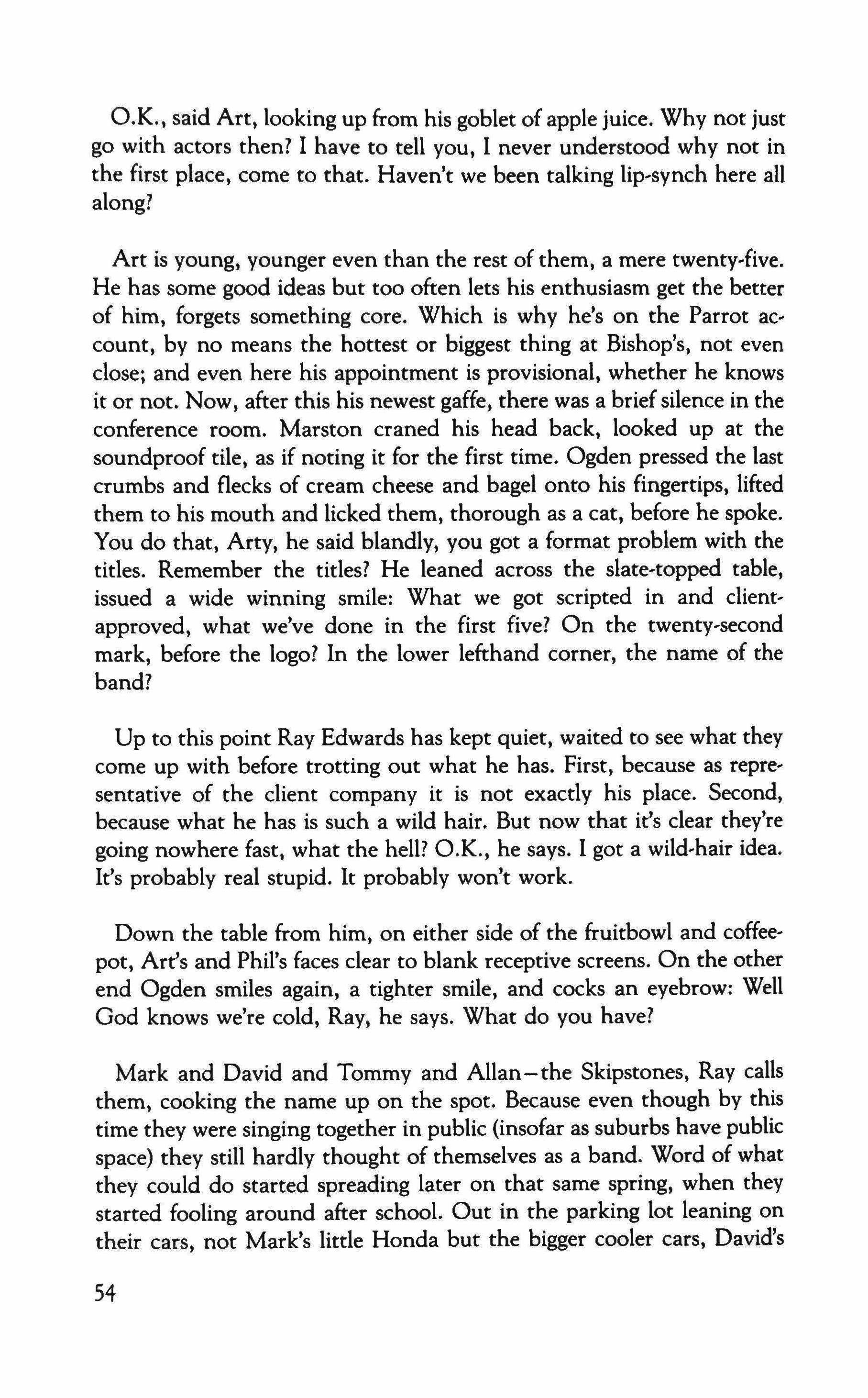
O.K., said Art, looking up from his goblet of apple juice. Why not just go with actors then? I have to tell you, I never understood why not in the first place, come to that. Haven't we been talking lip-synch here all along?
Art is young, younger even than the rest of them, a mere twenty-five. He has some good ideas but too often lets his enthusiasm get the better of him, forgets something core. Which is why he's on the Parrot account, by no means the hottest or biggest thing at Bishop's, not even close; and even here his appointment is provisional, whether he knows it or not. Now, after this his newest gaffe, there was a brief silence in the conference room. Marston craned his head back, looked up at the soundproof tile, as if noting it for the first time. Ogden pressed the last crumbs and flecks of cream cheese and bagel onto his fingertips, lifted them to his mouth and licked them, thorough as a cat, before he spoke. You do that, Arty, he said blandly, you got a format problem with the titles. Remember the titles? He leaned across the slate-topped table, issued a wide winning smile: What we got scripted in and client, approved, what we've done in the first five? On the twenty-second mark, before the logo? In the lower lefthand corner, the name of the band?
Up to this point Ray Edwards has kept quiet, waited to see what they come up with before trotting out what he has. First, because as representative of the client company it is not exactly his place. Second, because what he has is such a wild hair. But now that it's clear they're going nowhere fast, what the hell? O.K., he says. I got a wild-hair idea. It's probably real stupid. It probably won't work.
Down the table from him, on either side of the fruitbowl and coffee, pot, Art's and Phil's faces clear to blank receptive screens. On the other end Ogden smiles again, a tighter smile, and cocks an eyebrow: Well God knows we're cold, Ray, he says. What do you have?
Mark and David and Tommy and Allan-the Skipstones, Ray calls them, cooking the name up on the spot. Because even though by this time they were singing together in public (insofar as suburbs have public space) they still hardly thought of themselves as a band. Word of what they could do started spreading later on that same spring, when they started fooling around after school. Out in the parking lot leaning on their cars, not Mark's little Honda but the bigger cooler cars, David's
54

Camaro, Tommy's Mustang, Allan's Firebird. Cock your ass back against the edge of the grille or sit up on the fender, one leg out straight, one hand on bent knee; yourselfthere in the middle, other guys lined up against the car, snapping their fingers, tapping their toes, as together you dive in. Watching the other kids, feeling them gathering, moving from their cars towards the one where you are. Everybody, hoods to preppies, standing around the car watching you sing; you watching them watching, seeing what they see. The four of them still told themselves it was strictly for nothing, just a goof, but it was more than that now. Since the first head had turned and looked up-Hey isn't that Mark? - the first recognition of yourself posed with the others in the shiny finish of the car. No more hanging out at night in the woods, no more new numbers, though Allan still pushed for it every now and then. Thanks to the parking-lot appearances, they first got asked to a few kid parties, kids their own age; thanks to them, plus Allan's father talking it around, the adult crowd caught on. They did no more than forty minutes max, that was all the songs they had; kids their age thought it was a kick, people their parents' age sometimes cried and went ape-shit. Mrs. Gallagher sobbed on Mark's shoulder, said it took her back to boarding school, listening to some radio station from Detroit up in her dorm room. Mrs. Hyland invited them all back the next afternoon, and when only David and Allan showed up blew them both off, they swore it was true. They started wearing white tuxedos with big black cummerbunds to the parties. They tried to do their bit around 9:30, 10 o'clock, be out by 11 before everyone was bombed. Drive away with something like $75 apiece in their pockets, more than they knew what to do with, every week. So Ray Edwards, who lives a few streets over from Mark, sees them at the Whitson's a month or so back and stores them away out of sheer force of habit. Because who knows what might come in handy in this business, one minute to the next?
We'd have to give them a test, Ray's saying now, but they're in the ballpark. One of them a little googly, maybe, but that might play too. I swear to God, he says, smiling around, that's what I thought when I first heard them. My God, I said, how's that for a bunch of fresh-faced American kids?
Bob Ogden looks left and right over his glasses at Marston and Art. They look back like two animals at a waterhole, surprised by a third, with an alert opacity which Ogden knows from past experience signifies a very neutral form of assent. He himself has half a mind to reach for the
55
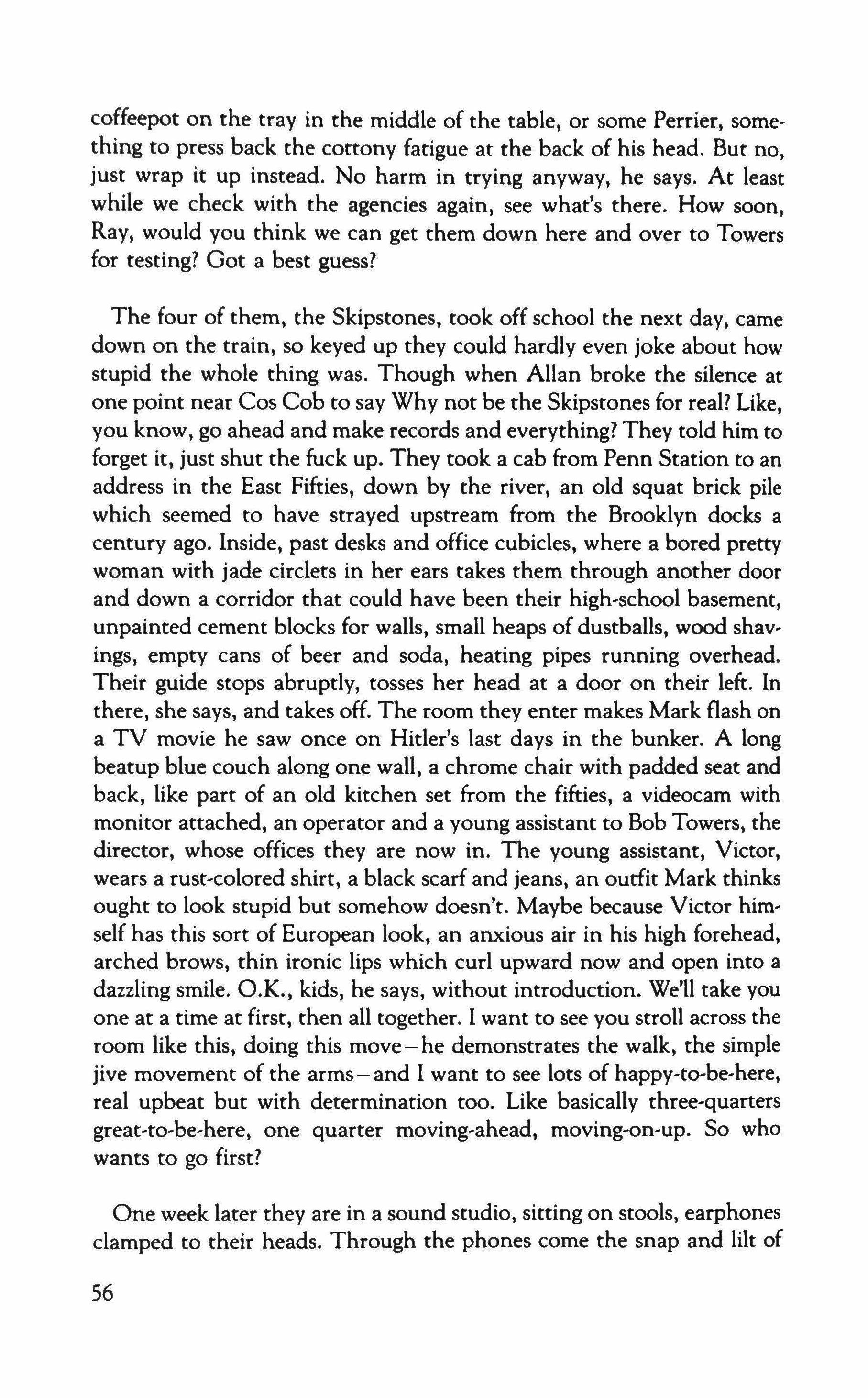
coffeepot on the tray in the middle of the table, or some Perrier, something to press back the cottony fatigue at the back of his head. But no, just wrap it up instead. No harm in trying anyway, he says. At least while we check with the agencies again, see what's there. How soon, Ray, would you think we can get them down here and over to Towers for testing? Got a best guess?
The four of them, the Skipstones, took off school the next day, came down on the train, so keyed up they could hardly even joke about how stupid the whole thing was. Though when Allan broke the silence at one point near Cos Cob to say Why not be the Skipstones for real? Like, you know, go ahead and make records and everything? They told him to forget it, just shut the fuck up. They took a cab from Penn Station to an address in the East Fifties, down by the river, an old squat brick pile which seemed to have strayed upstream from the Brooklyn docks a century ago. Inside, past desks and office cubicles, where a bored pretty woman with jade circlets in her ears takes them through another door and down a corridor that could have been their high-school basement, unpainted cement blocks for walls, small heaps of dustballs, wood shavings, empty cans of beer and soda, heating pipes running overhead. Their guide stops abruptly, tosses her head at a door on their left. In there, she says, and takes off. The room they enter makes Mark flash on a TV movie he saw once on Hitler's last days in the bunker. A long beatup blue couch along one wall, a chrome chair with padded seat and back, like part of an old kitchen set from the fifties, a videocam with monitor attached, an operator and a young assistant to Bob Towers, the director, whose offices they are now in. The young assistant, Victor, wears a rust-colored shirt, a black scarf and jeans, an outfit Mark thinks ought to look stupid but somehow doesn't. Maybe because Victor himself has this sort of European look, an anxious air in his high forehead, arched brows, thin ironic lips which curl upward now and open into a dazzling smile. O.K., kids, he says, without introduction. We'll take you one at a time at first, then all together. I want to see you stroll across the room like this, doing this move - he demonstrates the walk, the simple jive movement of the arms-and I want to see lots of happy-to-be-here, real upbeat but with determination too. Like basically three-quarters great-to-be-here, one quarter moving-ahead, moving-on-up. So who wants to go first?
One week later they are in a sound studio, sitting on stools, earphones clamped to their heads. Through the phones come the snap and lilt of
56
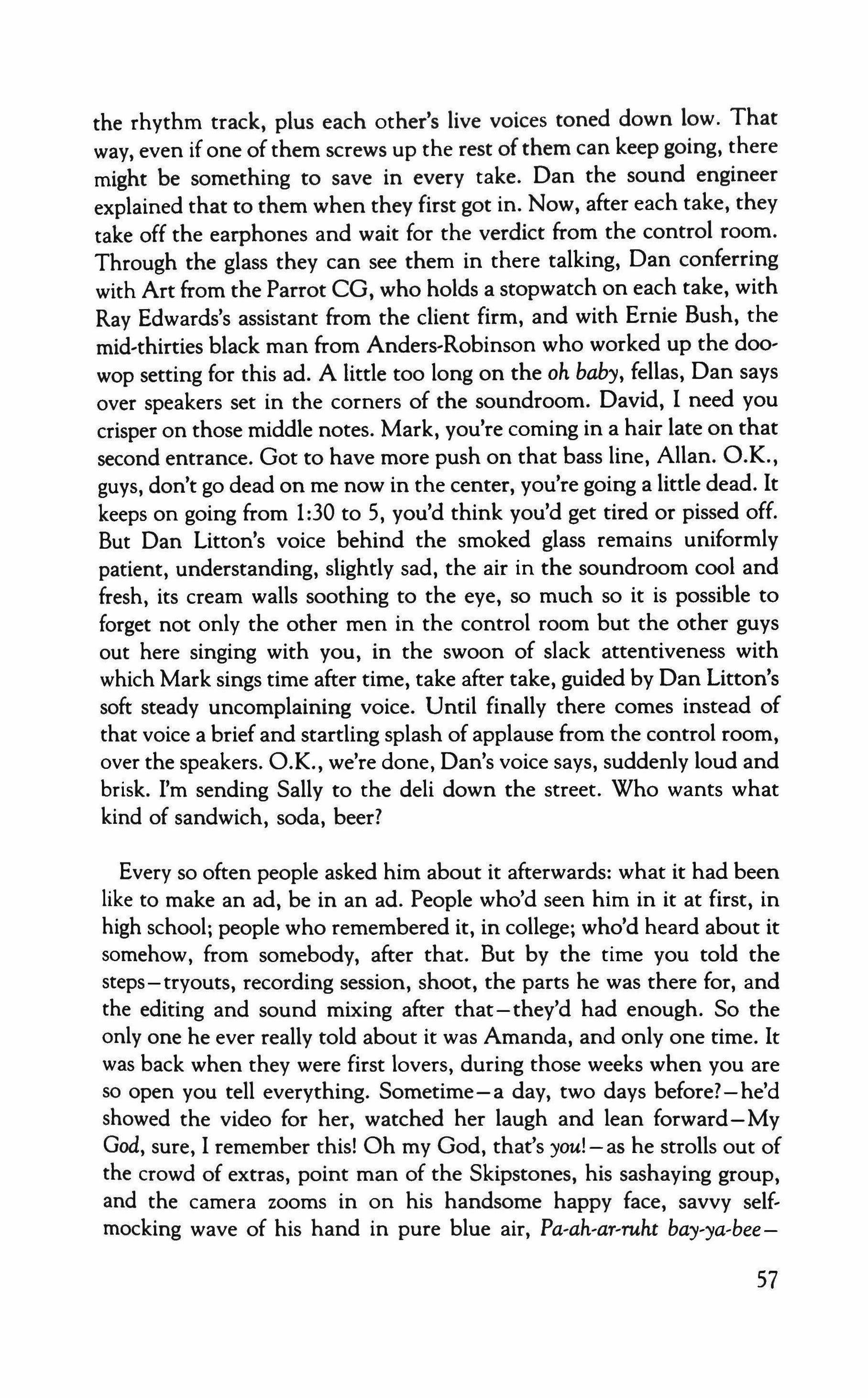
the rhythm track, plus each other's live voices toned down low. That way, even if one of them screws up the rest of them can keep going, there might be something to save in every take. Dan the sound engineer explained that to them when they first got in. Now, after each take, they take off the earphones and wait for the verdict from the control room. Through the glass they can see them in there talking, Dan conferring with Art from the Parrot CG, who holds a stopwatch on each take, with Ray Edwards's assistant from the client firm, and with Ernie Bush, the mid-thirties black man from Anders-Robinson who worked up the doowop setting for this ad. A little too long on the oh baby, fellas, Dan says over speakers set in the corners of the soundroom. David, I need you crisper on those middle notes. Mark, you're coming in a hair late on that second entrance. Got to have more push on that bass line, Allan. O.K., guys, don't go dead on me now in the center, you're going a little dead. It keeps on going from 1:30 to 5, you'd think you'd get tired or pissed off. But Dan Litton's voice behind the smoked glass remains uniformly patient, understanding, slightly sad, the air in the soundroom cool and fresh, its cream walls soothing to the eye, so much so it is possible to forget not only the other men in the control room but the other guys out here singing with you, in the swoon of slack attentiveness with which Mark sings time after time, take after take, guided by Dan Litton's soft steady uncomplaining voice. Until finally there comes instead of that voice a brief and startling splash of applause from the control room, over the speakers. O.K., we're done, Dan's voice says, suddenly loud and brisk. I'm sending Sally to the deli down the street. Who wants what kind of sandwich, soda, beer?
Every so often people asked him about it afterwards: what it had been like to make an ad, be in an ad. People who'd seen him in it at first, in high school; people who remembered it, in college; who'd heard about it somehow, from somebody, after that. But by the time you told the steps-tryouts, recording session, shoot, the parts he was there for, and the editing and sound mixing after that-they'd had enough. So the only one he ever really told about it was Amanda, and only one time. It was back when they were first lovers, during those weeks when you are so open you tell everything. Sometime-a day, two days before?-he'd showed the video for her, watched her laugh and lean forward-My God, sure, I remember this! Oh my God, that's you! - as he strolls out of the crowd of extras, point man of the Skipstones, his sashaying group, and the camera zooms in on his handsome happy face, savvy self, mocking wave of his hand in pure blue air, Pa,ah,aHuht bay,ya,bee-
57

Amanda's mouth open as if a little out of breath. Now, on this weekend afternoon when he tells her, really tells her how it was, they are lying in bed, his bed, having once again made that low slow climb, that amazing journey from easy touching and soft laughter up through the hunched urgency of their respective comes and back out again. He is there with her, lying beside her, feeling the sweat cool and vanish in the autumn breeze coming in through the window, smelling her smell, their lovemaking smell, in that same breeze. Once again he thinks ofthe ad; of her having seen that ad. He raises himself on an elbow, looks down on her. Her eyelids are closed. A corner of her lush mouth twitches. Out of her comes a low soft private noise, something like a sigh.
You know what the funniest thing was? The thing that really stays with me about being in it, I mean? It's how incredibly hot it was like the whole time, the tryouts and everything. This was like in early May, the tryouts and everything, you'd think it wouldn't be so bad. But that May there was this freak heat wave, it was just horrendous. Every day we were down here in the city it was like ninety degrees, ninety-four percent humidity, including the day of the shoot. We drove out in the vans to this big field in Flushing Meadows, and piled out. The crew starts setting up this like big picnic table under the trees with fruit juice, Perrier, fiftyseven kinds of little sandwiches, stuff like that. Other people're rehearsing the extras, showing them where to go, how to move, and making us all up, especially like the four of us, Tommy, David, Allan and me. It's like only 8:30, 9 in the morning and already steaming hot, everybody's pissing and moaning, Allan said he thought he was gonna faint, it was like utter pandemonium with thirty-five, forty people running around all sweating and drooping, unhappy as hell. Then this guy Bob Towers the director finally shows up, and he's like this really handsome guy. Sort of craggy face like he's from out West, California or someplace, and he's wearing just like carpenter pants and a blue workshirt and a Reds baseball cap; and he comes over and picks up about six little sandwiches and looks through this whole crazy crowd running around freaking out over the heat, and he looks right at me sitting there by one of the vans, on this little campstool? And it was so weird, the way he keyed on me and I responded. It was like one of those moments when you're looking at another person and it's like absolutely clear. I'm telling him yeah I'm right here; I am totally up for doing this ad. The heat wasn't fazing me, I hardly even noticed it all along, since like the first train ride down for the tryout. It was like I knew all along we were going to make that ad, even knew - this sounds weird, I know - we were going to make it with
58
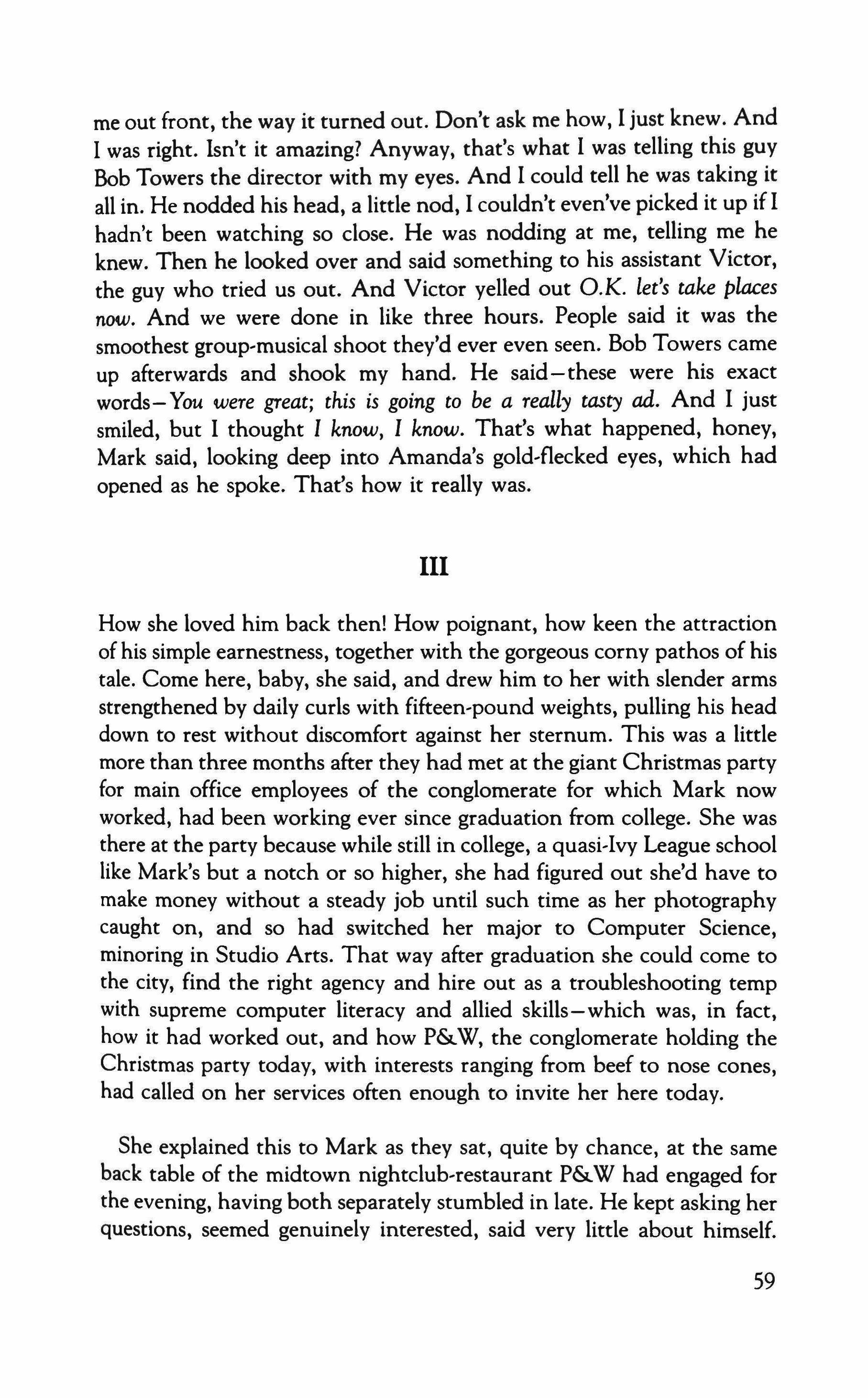
me out front, the way it turned out. Don't ask me how, I just knew. And I was right. Isn't it amazing? Anyway, that's what I was telling this guy Bob Towers the director with my eyes. And I could tell he was taking it all in. He nodded his head, a little nod, I couldn't even've picked it up if I hadn't been watching so close. He was nodding at me, telling me he knew. Then he looked over and said something to his assistant Victor, the guy who tried us out. And Victor yelled out O.K. let's take places now. And we were done in like three hours. People said it was the smoothest group-musical shoot they'd ever even seen. Bob Towers came up afterwards and shook my hand. He said-these were his exact words- You were great; this is going to be a really tasty ad. And I just smiled, but I thought I know, I know. That's what happened, honey, Mark said, looking deep into Amanda's gold-flecked eyes, which had opened as he spoke. That's how it really was.
III
How she loved him back then! How poignant, how keen the attraction of his simple earnestness, together with the gorgeous corny pathos of his tale. Come here, baby, she said, and drew him to her with slender arms strengthened by daily curls with fifteen-pound weights, pulling his head down to rest without discomfort against her sternum. This was a little more than three months after they had met at the giant Christmas party for main office employees of the conglomerate for which Mark now worked, had been working ever since graduation from college. She was there at the party because while still in college, a quasi-Ivy League school like Mark's but a notch or so higher, she had figured out she'd have to make money without a steady job until such time as her photography caught on, and so had switched her major to Computer Science, minoring in Studio Arts. That way after graduation she could come to the city, find the right agency and hire out as a troubleshooting temp with supreme computer literacy and allied skills-which was, in fact, how it had worked out, and how P&W, the conglomerate holding the Christmas party today, with interests ranging from beef to nose cones, had called on her services often enough to invite her here today.
She explained this to Mark as they sat, quite by chance, at the same back table of the midtown nighrclub-restaurant P&W had engaged for the evening, having both separately stumbled in late. He kept asking her questions, seemed genuinely interested, said very little about himself.
59
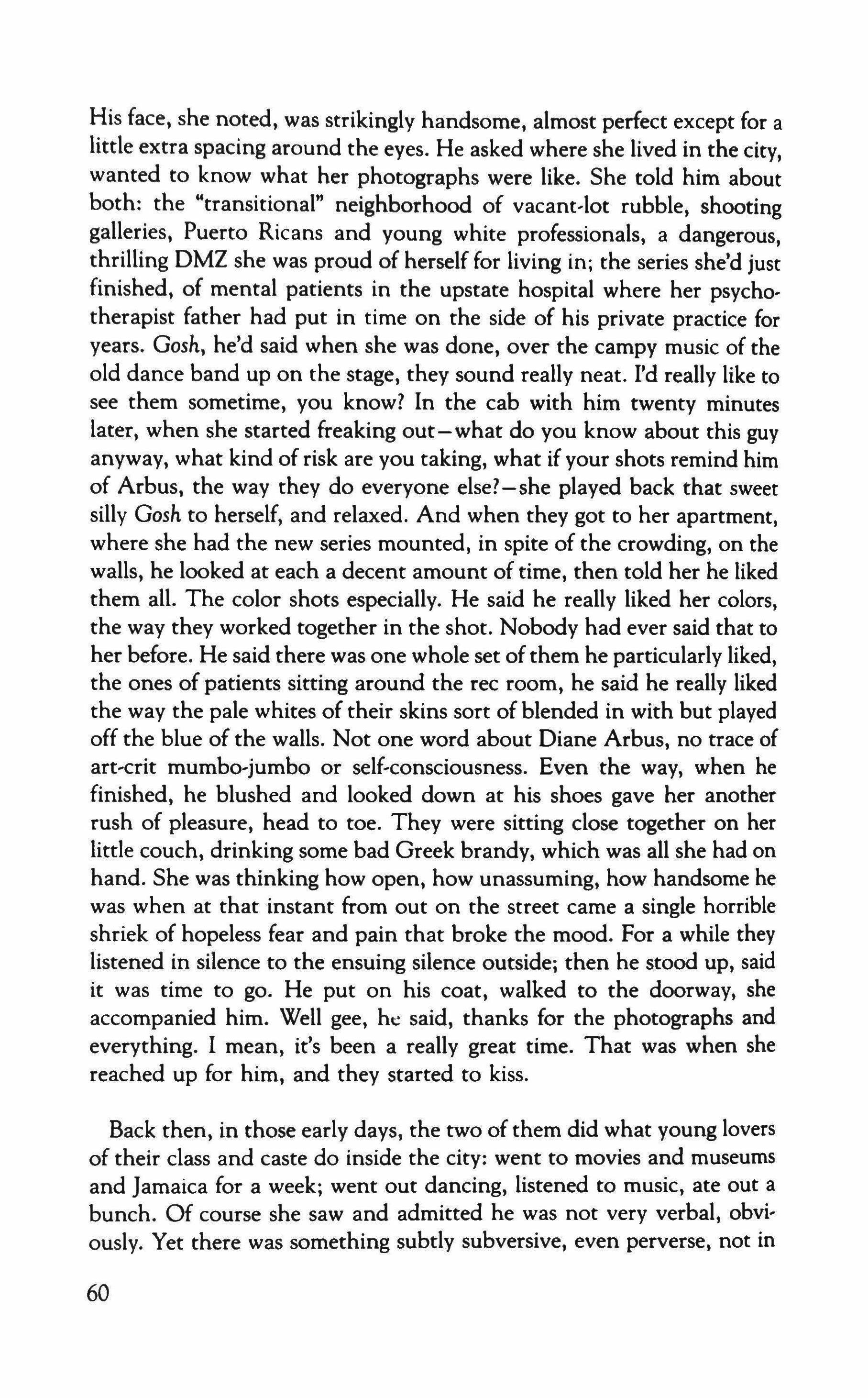
His face, she noted, was strikingly handsome, almost perfect except for a little extra spacing around the eyes. He asked where she lived in the city, wanted to know what her photographs were like. She told him about both: the "transitional" neighborhood of vacant-lot rubble, shooting galleries, Puerto Ricans and young white professionals, a dangerous, thrilling DMZ she was proud of herself for living in; the series she'd just finished, of mental patients in the upstate hospital where her psychotherapist father had put in time on the side of his private practice for years. Gosh, he'd said when she was done, over the campy music of the old dance band up on the stage, they sound really neat. I'd really like to see them sometime, you know? In the cab with him twenty minutes later, when she started freaking out-what do you know about this guy anyway, what kind of risk are you taking, what if your shots remind him of Arbus, the way they do everyone else?-she played back that sweet silly Gosh to herself, and relaxed. And when they got to her apartment, where she had the new series mounted, in spite of the crowding, on the walls, he looked at each a decent amount of time, then told her he liked them all. The color shots especially. He said he really liked her colors, the way they worked together in the shot. Nobody had ever said that to her before. He said there was one whole set ofthem he particularly liked, the ones of patients sitting around the rec room, he said he really liked the way the pale whites of their skins sort of blended in with but played off the blue of the walls. Not one word about Diane Arbus, no trace of art-crit rnumbo-jumbo or self-consciousness. Even the way, when he finished, he blushed and looked down at his shoes gave her another rush of pleasure, head to toe. They were sitting close together on her little couch, drinking some bad Greek brandy, which was all she had on hand. She was thinking how open, how unassuming, how handsome he was when at that instant from out on the street came a single horrible shriek of hopeless fear and pain that broke the mood. For a while they listened in silence to the ensuing silence outside; then he stood up, said it was time to go. He put on his coat, walked to the doorway, she accompanied him. Well gee, he said, thanks for the photographs and everything. I mean, it's been a really great time. That was when she reached up for him, and they started to kiss.
Back then, in those early days, the two of them did what young lovers of their class and caste do inside the city: went to movies and museums and Jamaica for a week; went out dancing, listened to music, ate out a bunch. Of course she saw and admitted he was not very verbal, obviously. Yet there was something subtly subversive, even perverse, not in
60

spite of but in his smiling inarticulateness and bland good looks. He'll say something like "1 guess 1 didn't like the story much" when we're walking out of some, you know, Senegalese film I've dragged him to, she told her friend Janet one May afternoon that spring, over gelati at Livecchio's. He'll say it and sort of hunch his shoulders and give a little laugh-you know, embarrassed, like a kid, but also sort of looking sideways at you, to see what you think. And all of a sudden you realize he's right, it is a really dumb slow boring story. You just didn't want to admit it, is all. And it's like that smile and look of his are telling you he knows all that and it's O.K., you can disagree with him if you want or need to. But he's going to tell you what he thinks anyway, and just see how you take it from there, you know what 1 mean?
Janet nodded, said Uh-huh. Basically, though, she was keeping her mouth shut, except to spoon in mango ice. She had met Mark twice, once at a party given by a couple of gay men she and Amanda had known back in school, the other time when, half-drunk, on her way home on foot to her place after a horrible public argument at the Lisboa with her then-lover Greg, she had run into Amanda and Mark on Broome and Mercer and allowed herself to be swept off, distracted and calmed with soothing chatter and yet more drinks. Amanda's chatter, that is: as on Janet's first encounter with him, subversive Mark had said virtually nothing, had seemed a perfectly complacent stick, with the kind of good looks that made you want to smack his dumb smug face. Yet Janet loved her friend Amanda, they went way back. So she smiled and kept on nodding and eating the ice, pressing it up with her tongue against the roof of her mouth, until it made her entire head ache.
Wow, she said, gasping, that's cold. Listen, yeah, he sounds terrific, like he's really good for you. Yet even so, she could feel as much as see her friend's smile clouding: not enough, not convincing enough, you've got to say more. Didn't you tell me once, she said, leaning forward on the marble-topped table, he told you this wonderful touching story about being in some ad?
Like all they kept of the whole scene at Flushing Meadows was the grass but even that looks weirded out. Not the color so much, but the way it sort of ripples in with the rest, the sky this kind of blue you never saw in your life and this crazy smiling cartoon sun spilling these sort of flickering rays like you might have drawn when you were in grade school if you were drawing with light instead of Crayola crayons. Which is part of the joke, the fun of the ad,
61

the way that sun looks; and which, for a second, piece of a second, is all there is, just that. Then the space starts to fill in with people coming in from either side and also like just showing up out of nowhere from the middle, moving towards you flickering different shades, whole different unreal colors in synch with sky and grass and music, Allan's voice-BAH�dop buh-Bz.H. dop buh Dup bup bup BOUW BOUW-kicking in-
Later on-two and one-half years later, to be exact-when Amanda told her how moving out of the city and into this house in Connecticut with Mark had been the stupidest biggest mistake of her entire life, Janet would remember the reservations she had eventually tried to express after all at Livecchio's that earlier day: whether it all wasn't happening too fast, whether Mark wasn't in effect asking her to give up too much, why in the world they had to be so grotesquely conclusive as to buy a goddamn house, etc., etc. Back then Amanda had just glared back and sulked; now, three years later, over hot-and-sour shrimp soup, she was telling Janet the same things herself. It was so self-destructive, I can see that now, she was saying. Like taking on some awful, stupid, moth-tothe-flame dare. I didn't want to say to myself, Look, you've stopped taking your stuff around to the galleries, you haven't shot anything new for a year, you're scared you don't have it anymore, or never did. I didn't want to think about what it meant to move in full-time with him in terms of either our relationship or my work. She turned her head from side to side with an air so intensely melodramatic that for a crazy second Janet feared her friend had flipped over some paranoid edge, was afraid she was being surveilled by the Chinese waiters. And you know what really makes me mad? Amanda said, fixingJanet in her wild stare again. I already knew, I knew I was going to do better than he was. I was already tired of those everlasting stories about all those endless wonderful nights with his buddies the Skipstones driving from gig to gig over hell's halfacre in their glorious Cadillac. I already thought the whole thing about his stupid ad and how he made it and all that happy horseshit was just plain tedious. God help me, Janet-she removed a strand of lemongrass from her mouth, placed it gently at the edge of her butter plate-I was even tired of the sex. But I was so scared to admit that to myself, you know what I mean? And now, she said, picking up the rice bowl, setting it down and, to Janet's amazement, beginning to cry-and now it's too late.
Which, of course, Janet told her, it certainly was not. So the relationship had cost her five years, come on, she was still just rwenty-sevenl
62
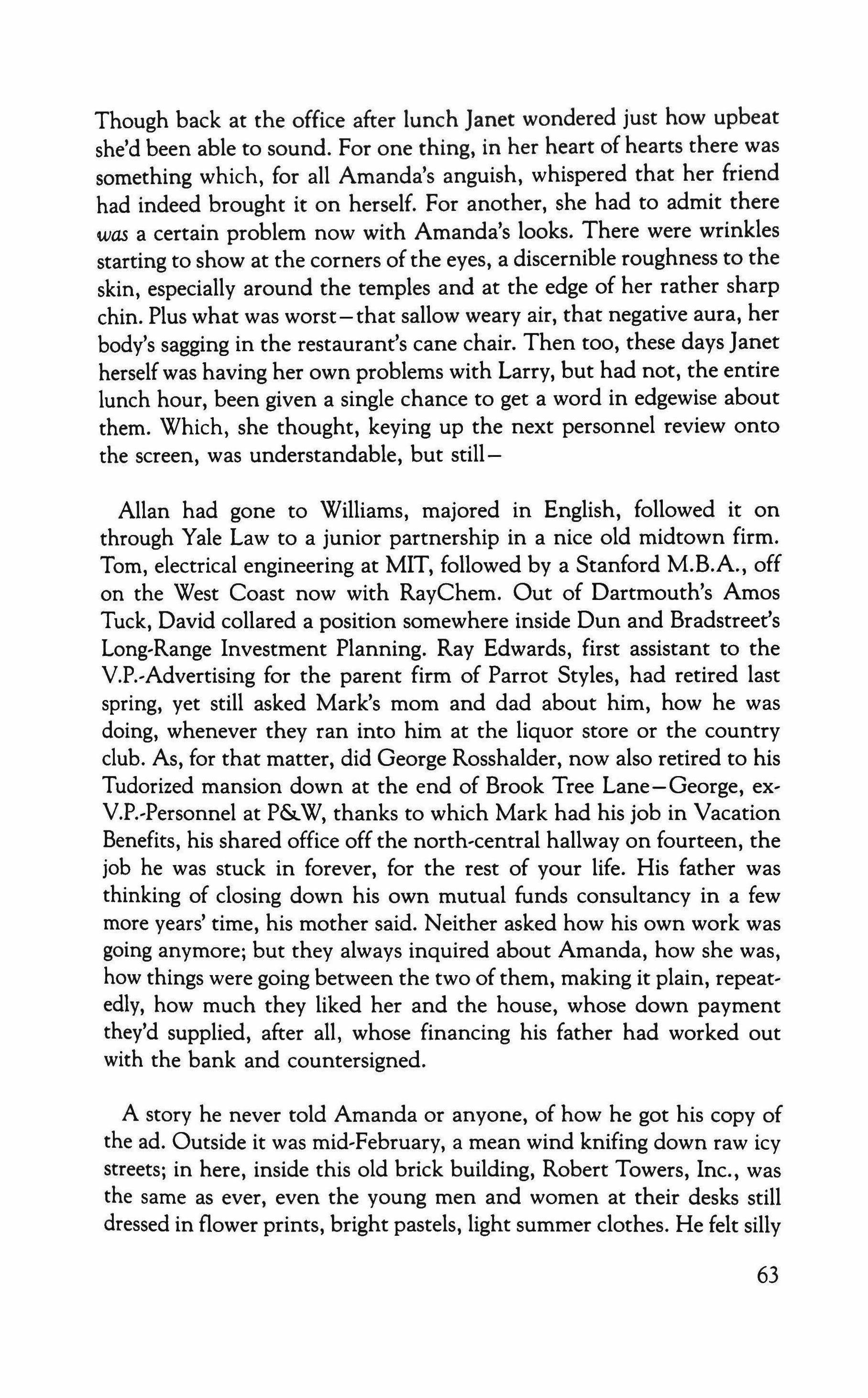
Though back at the office after lunch Janet wondered just how upbeat she'd been able to sound. For one thing, in her heart of hearts there was something which, for all Amanda's anguish, whispered that her friend had indeed brought it on herself. For another, she had to admit there was a certain problem now with Amanda's looks. There were wrinkles starting to show at the corners ofthe eyes, a discernible roughness to the skin, especially around the temples and at the edge of her rather sharp chin. Plus what was worst-that sallow weary air, that negative aura, her body's sagging in the restaurant's cane chair. Then too, these days Janet herself was having her own problems with Larry, but had not, the entire lunch hour, been given a single chance to get a word in edgewise about them. Which, she thought, keying up the next personnel review onto the screen, was understandable, but still-
Allan had gone to Williams, majored in English, followed it on through Yale Law to a junior partnership in a nice old midtown firm. Tom, electrical engineering at MIT, followed by a Stanford M.B.A., off on the West Coast now with RayChem. Out of Dartmouth's Amos Tuck, David collared a position somewhere inside Dun and Bradstreet's Long-Range Investment Planning. Ray Edwards, first assistant to the V.P.-Advertising for the parent firm of Parrot Styles, had retired last spring, yet still asked Mark's mom and dad about him, how he was doing, whenever they ran into him at the liquor store or the country club. As, for that matter, did George Rosshalder, now also retired to his Tudorized mansion down at the end of Brook Tree Lane-George, exV.P.-Personnel at P&W, thanks to which Mark had his job in Vacation Benefits, his shared office off the north-central hallway on fourteen, the job he was stuck in forever, for the rest of your life. His father was thinking of closing down his own mutual funds consultancy in a few more years' time, his mother said. Neither asked how his own work was going anymore; but they always inquired about Amanda, how she was, how things were going between the two of them, making it plain, repeatedly, how much they liked her and the house, whose down payment they'd supplied, after all, whose financing his father had worked out with the bank and countersigned.
A story he never told Amanda or anyone, of how he got his copy of the ad. Outside it was mid-February, a mean wind knifing down raw icy streets; in here, inside this old brick building, Robert Towers, Inc., was the same as ever, even the young men and women at their desks still dressed in flower prints, bright pastels, light summer clothes. He felt silly
63
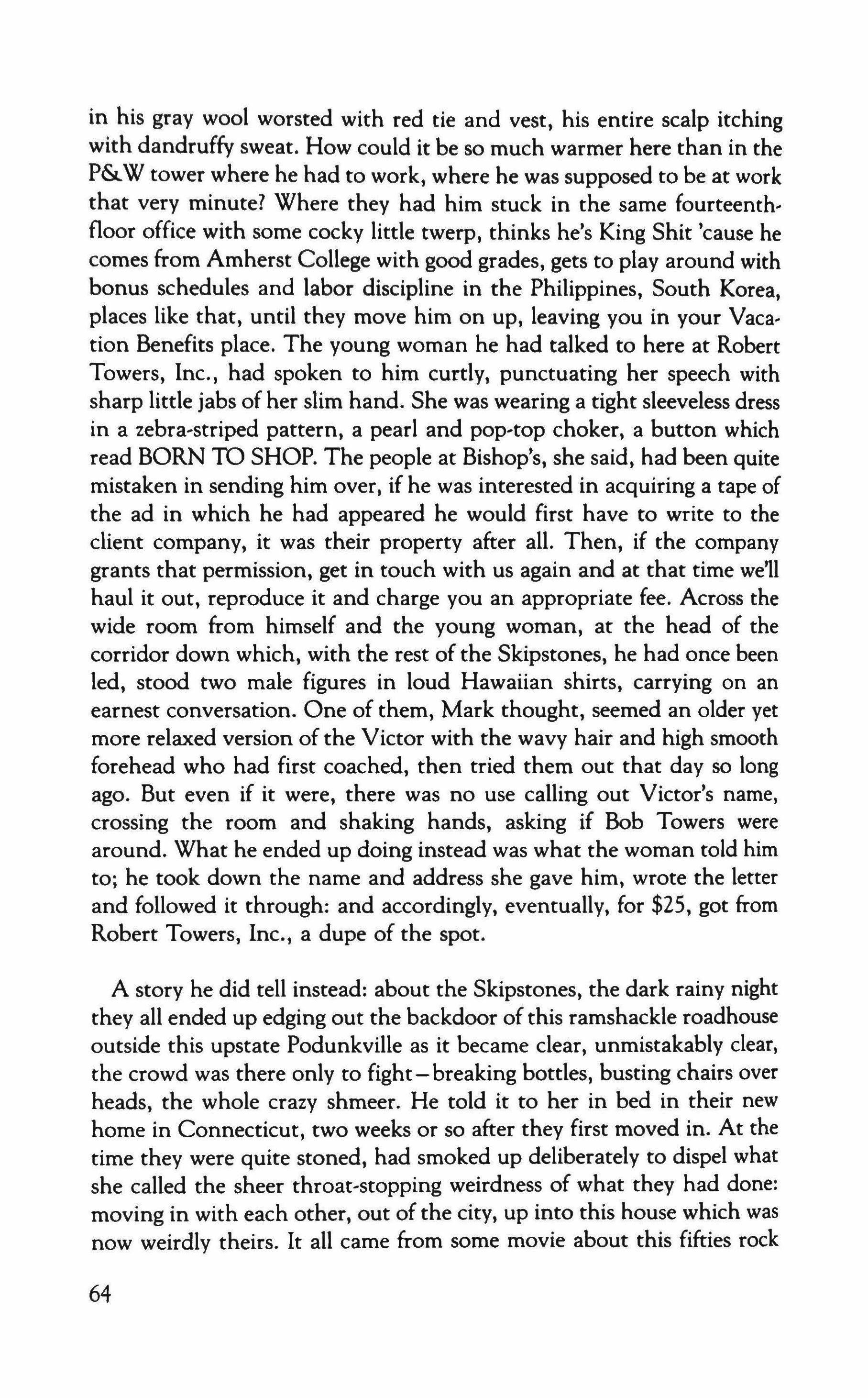
in his gray wool worsted with red tie and vest, his entire scalp itching with dandruffy sweat. How could it be so much warmer here than in the P&W tower where he had to work, where he was supposed to be at work that very minute? Where they had him stuck in the same fourteenthfloor office with some cocky little twerp, thinks he's King Shit 'cause he comes from Amherst College with good grades, gets to play around with bonus schedules and labor discipline in the Philippines, South Korea, places like that, until they move him on up, leaving you in your Vacation Benefits place. The young woman he had talked to here at Robert Towers, Inc., had spoken to him curtly, punctuating her speech with sharp little jabs of her slim hand. She was wearing a tight sleeveless dress in a zebra-striped pattern, a pearl and pop-top choker, a button which read BORN TO SHOP. The people at Bishop's, she said, had been quite mistaken in sending him over, if he was interested in acquiring a tape of the ad in which he had appeared he would first have to write to the client company, it was their property after all. Then, if the company grants that permission, get in touch with us again and at that time we'll haul it out, reproduce it and charge you an appropriate fee. Across the wide room from himself and the young woman, at the head of the corridor down which, with the rest of the Skipstones, he had once been led, stood two male figures in loud Hawaiian shirts, carrying on an earnest conversation. One of them, Mark thought, seemed an older yet more relaxed version of the Victor with the wavy hair and high smooth forehead who had first coached, then tried them out that day so long ago. But even if it were, there was no use calling out Victor's name, crossing the room and shaking hands, asking if Bob Towers were around. What he ended up doing instead was what the woman told him to; he took down the name and address she gave him, wrote the letter and followed it through: and accordingly, eventually, for $25, got from Robert Towers, Inc., a dupe of the spot.
A story he did tell instead: about the Skipstones, the dark rainy night they all ended up edging out the backdoor of this ramshackle roadhouse outside this upstate Podunkville as it became clear, unmistakably clear, the crowd was there only to fight-breaking bottles, busting chairs over heads, the whole crazy shmeer. He told it to her in bed in their new home in Connecticut, two weeks or so after they first moved in. At the time they were quite stoned, had smoked up deliberately to dispel what she called the sheer throat-stopping weirdness of what they had done: moving in with each other, out of the city, up into this house which was now weirdly theirs. It all came from some movie about this fifties rock
64
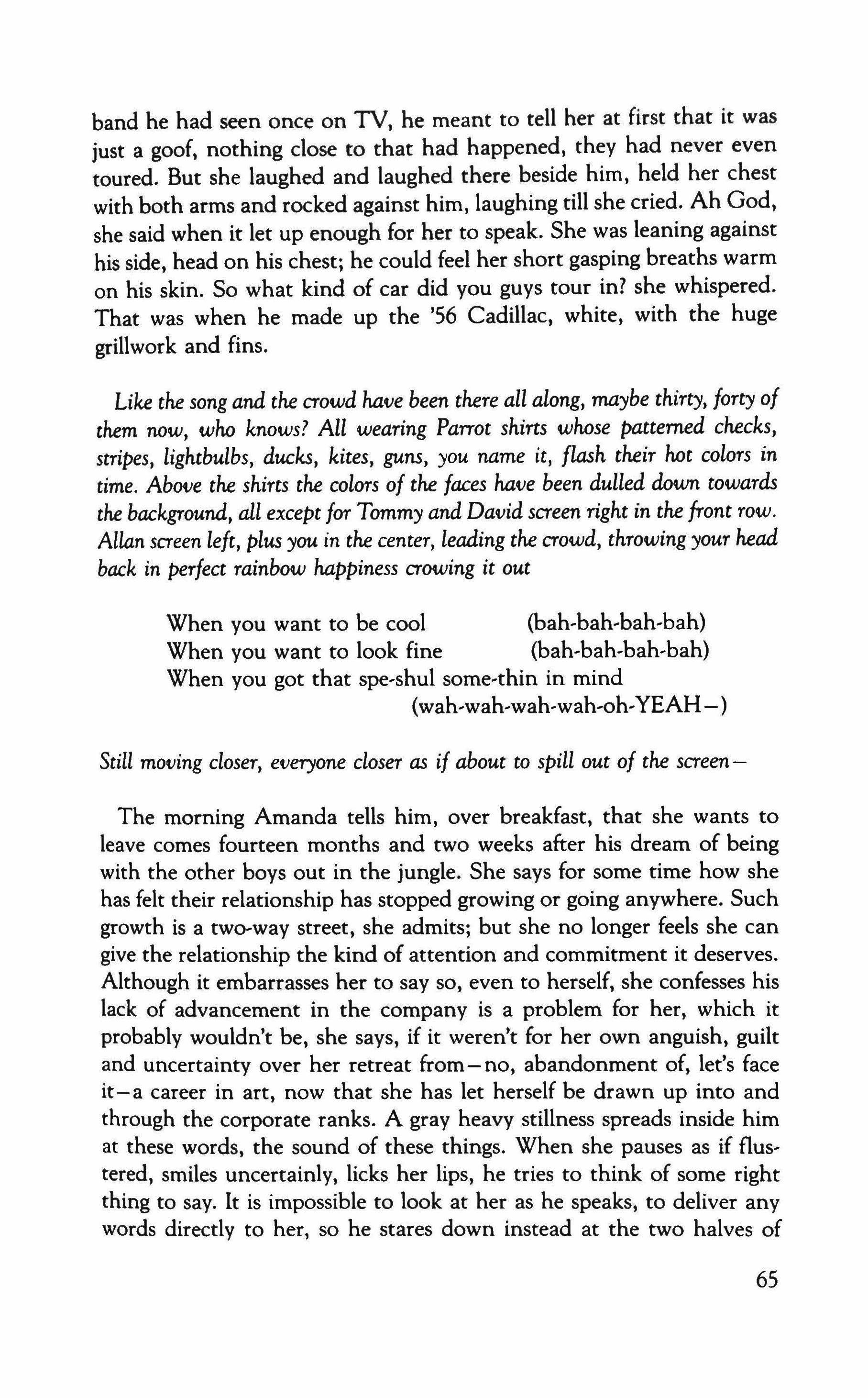
band he had seen once on TV, he meant to tell her at first that it was just a goof, nothing close to that had happened, they had never even toured. But she laughed and laughed there beside him, held her chest with both arms and rocked against him, laughing till she cried. Ah God, she said when it let up enough for her to speak. She was leaning against his side, head on his chest; he could feel her short gasping breaths warm on his skin. So what kind of car did you guys tour in? she whispered. That was when he made up the '56 Cadillac, white, with the huge grillwork and fins.
Like the song and the crowd have been there all along, maybe thirty, forty of them now, who knows? All wearing Parrot shirts whose patterned checks, stripes, lightbulbs, ducks, kites, guns, you name it, flash their hot colors in time. Above the shirts the colors of the faces have been dulled down towards the background, all except for Tommy and David screen right in the front row. Allan screen left, plus you in the center, leading the crowd, throwing your head back in perfect rainbow happiness crowing it out
When you want to be cool (bah-bah-bah-bah)
When you want to look fine (bah-bah-bah-bah)
When you got that spe-shul some-thin in mind
(wah-wah-wah-wah-oh-YEAH - )
Still moving closer, everyone closer as if about to spill out of the screen-
The morning Amanda tells him, over breakfast, that she wants to leave comes fourteen months and two weeks after his dream of being with the other boys out in the jungle. She says for some time how she has felt their relationship has stopped growing or going anywhere. Such growth is a two-way street, she admits; but she no longer feels she can give the relationship the kind of attention and commitment it deserves. Although it embarrasses her to say so, even to herself, she confesses his lack of advancement in the company is a problem for her, which it probably wouldn't be, she says, if it weren't for her own anguish, guilt and uncertainty over her retreat fromno, abandonment of, let's face it-a career in art, now that she has let herself be drawn up into and through the corporate ranks. A gray heavy stillness spreads inside him at these words, the sound of these things. When she pauses as if flustered, smiles uncertainly, licks her lips, he tries to think of some right thing to say. It is impossible to look at her as he speaks, to deliver any words directly to her, so he stares down instead at the two halves of
65
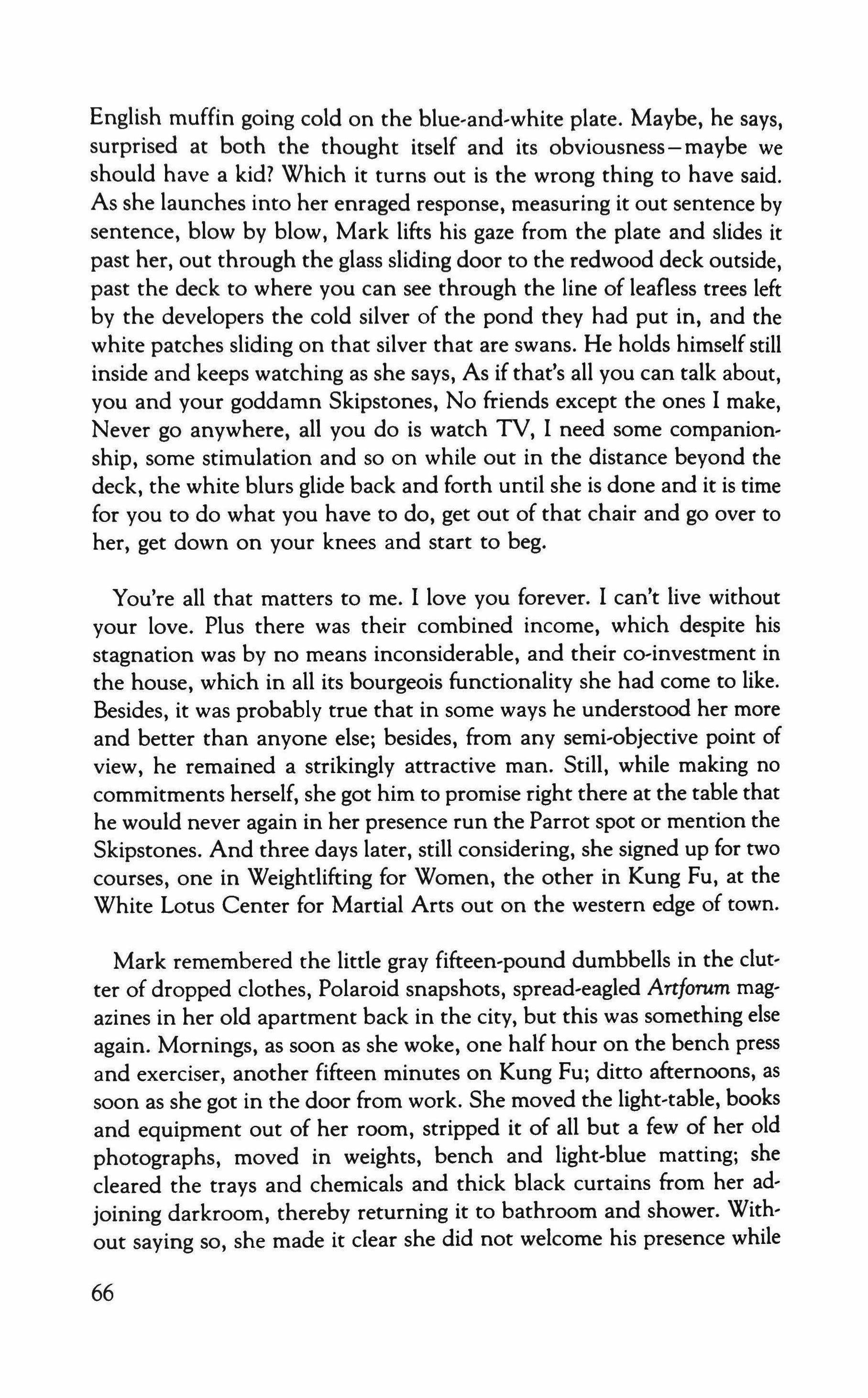
English muffin going cold on the blue-and-white plate. Maybe, he says, surprised at both the thought itself and its obviousness - maybe we should have a kid? Which it turns out is the wrong thing to have said. As she launches into her enraged response, measuring it out sentence by sentence, blow by blow, Mark lifts his gaze from the plate and slides it past her, out through the glass sliding door to the redwood deck outside, past the deck to where you can see through the line of leafless trees left by the developers the cold silver of the pond they had put in, and the white patches sliding on that silver that are swans. He holds himself still inside and keeps watching as she says, As if that's all you can talk about, you and your goddamn Skipstones, No friends except the ones I make, Never go anywhere, all you do is watch TV, I need some companionship, some stimulation and so on while out in the distance beyond the deck, the white blurs glide back and forth until she is done and it is time for you to do what you have to do, get out of that chair and go over to her, get down on your knees and start to beg.
You're all that matters to me. I love you forever. I can't live without your love. Plus there was their combined income, which despite his stagnation was by no means inconsiderable, and their co-investment in the house, which in all its bourgeois functionality she had come to like. Besides, it was probably true that in some ways he understood her more and better than anyone else; besides, from any semi-objective point of view, he remained a strikingly attractive man. Still, while making no commitments herself, she got him to promise right there at the table that he would never again in her presence run the Parrot spot or mention the Skipstones. And three days later, still considering, she signed up for two courses, one in Weightlifting for Women, the other in Kung Fu, at the White Lotus Center for Martial Arts out on the western edge of town.
Mark remembered the little gray fifteen-pound dumbbells in the clutter of dropped clothes, Polaroid snapshots, spread-eagled Art/orum magazines in her old apartment back in the city, but this was something else again. Mornings, as soon as she woke, one half hour on the bench press and exerciser, another fifteen minutes on Kung Fu; ditto afternoons, as soon as she got in the door from work. She moved the light-table, books and equipment out of her room, stripped it of all but a few of her old photographs, moved in weights, bench and light-blue matting; she cleared the trays and chemicals and thick black curtains from her adjoining darkroom, thereby returning it to bathroom and shower. Without saying so, she made it clear she did not welcome his presence while
66
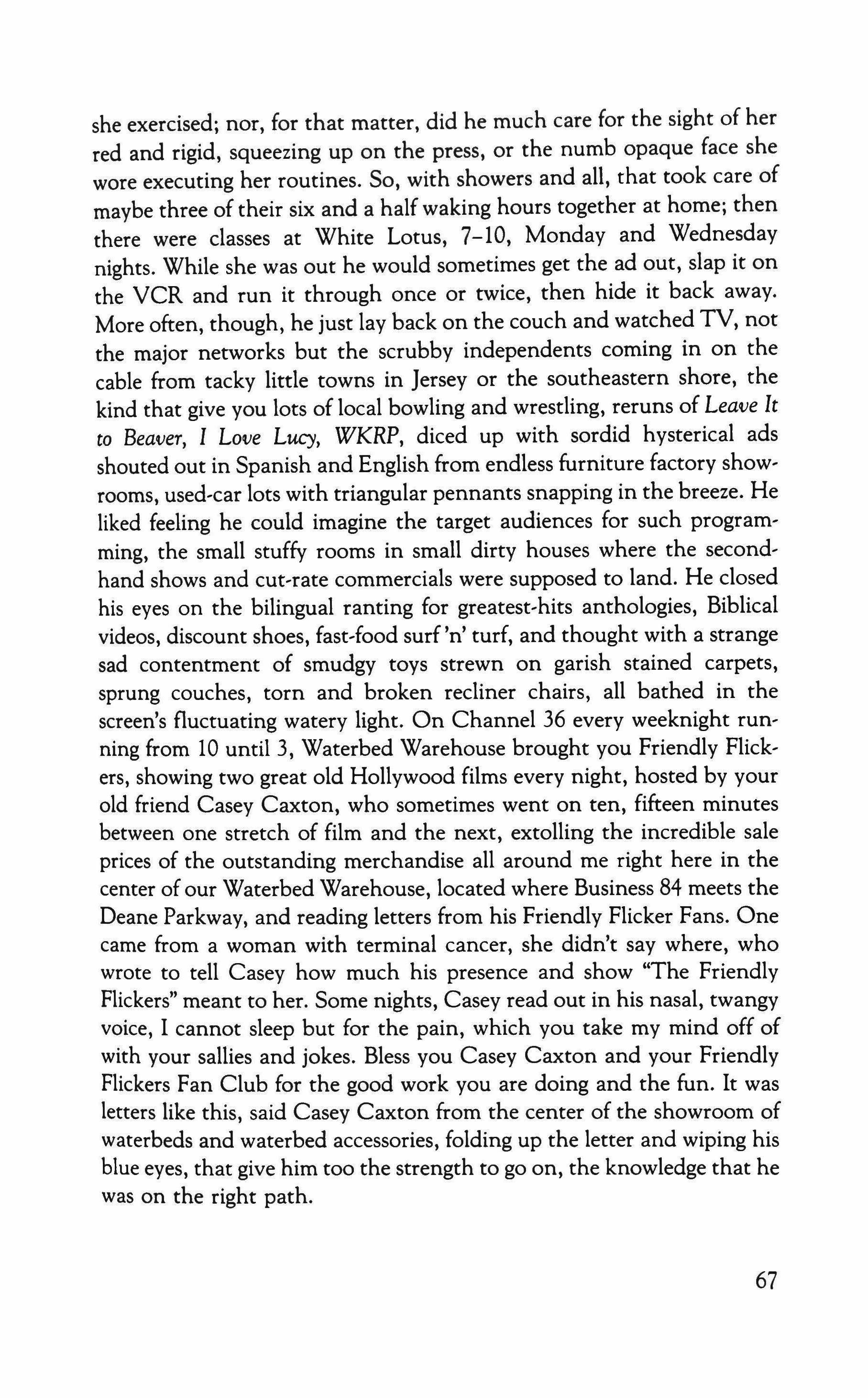
she exercised; nor, for that matter, did he much care for the sight of her red and rigid, squeezing up on the press, or the numb opaque face she wore executing her routines. So, with showers and all, that took care of maybe three of their six and a halfwaking hours together at home; then there were classes at White Lotus, 7-10, Monday and Wednesday nights. While she was out he would sometimes get the ad out, slap it on the VCR and run it through once or twice, then hide it back away. More often, though, he just lay back on the couch and watched TV, not the major networks but the scrubby independents coming in on the cable from tacky little towns in Jersey or the southeastern shore, the kind that give you lots of local bowling and wrestling, reruns of Leave It to Beaver, I Love Lucy, WKRP, diced up with sordid hysterical ads shouted out in Spanish and English from endless furniture factory showrooms, used-car lots with triangular pennants snapping in the breeze. He liked feeling he could imagine the target audiences for such programming, the small stuffy rooms in small dirty houses where the secondhand shows and cut-rate commercials were supposed to land. He closed his eyes on the bilingual ranting for greatest-hits anthologies, Biblical videos, discount shoes, fast-food surf 'n' turf, and thought with a strange sad contentment of smudgy toys strewn on garish stained carpets, sprung couches, torn and broken recliner chairs, all bathed in the screen's fluctuating watery light. On Channel 36 every weeknight running from 10 until 3, Waterbed Warehouse brought you Friendly Flickers, showing two great old Hollywood films every night, hosted by your old friend Casey Caxton, who sometimes went on ten, fifteen minutes between one stretch of film and the next, extolling the incredible sale prices of the outstanding merchandise all around me right here in the center of our Waterbed Warehouse, located where Business 84 meets the Deane Parkway, and reading letters from his Friendly Flicker Fans. One came from a woman with terminal cancer, she didn't say where, who wrote to tell Casey how much his presence and show "The Friendly Flickers" meant to her. Some nights, Casey read out in his nasal, twangy voice, I cannot sleep but for the pain, which you take my mind off of with your sallies and jokes. Bless you Casey Caxton and your Friendly Flickers Fan Club for the good work you are doing and the fun. It was letters like this, said Casey Caxton from the center of the showroom of waterbeds and waterbed accessories, folding up the letter and wiping his blue eyes, that give him too the strength to go on, the knowledge that he was on the right path.
67
Terminal cancer, he repeats, laughing, shaking his head, and then the guy goes ahead and reads the letter. I mean, you don't know whether to laugh or cry, you know what I mean? The hair dryer he has been shouting over shuts off in the bathroom, she moves briskly past him down the hallway in her old terry-cloth robe. I think what's weird is wanting to watch shows like that in the first place, she says from the bedroom. Which, for the first few seconds after the initial flash of shock-at the contempt in her voice, at her betrayal-makes him want to answer her with yet another story. This one comes from another recent evening, when she had gotten into bed with him and, once again, promptly fell asleep; and he lay there beside her a long time, feeling her next to him without touching her anywhere, just hearing her breathe and trying to push what he was feeling back down, until he couldn't anymore. Then he got up and crouched over the bed, over the blank indifferent mask of her sleeping face, and beat off on the wall-to-wall carpeting on the floor. Then he went back off into the living room to Casey Caxton, the Friendly Flickers Fan club, the special double feature we have for you tonight, Joan Crawford in The Damned Don't Cry and Charlton Heston in Pony Express.
So bay-ay-beePut it on and wear it
Lookin' good it's Parrot
So bav-av-bee=
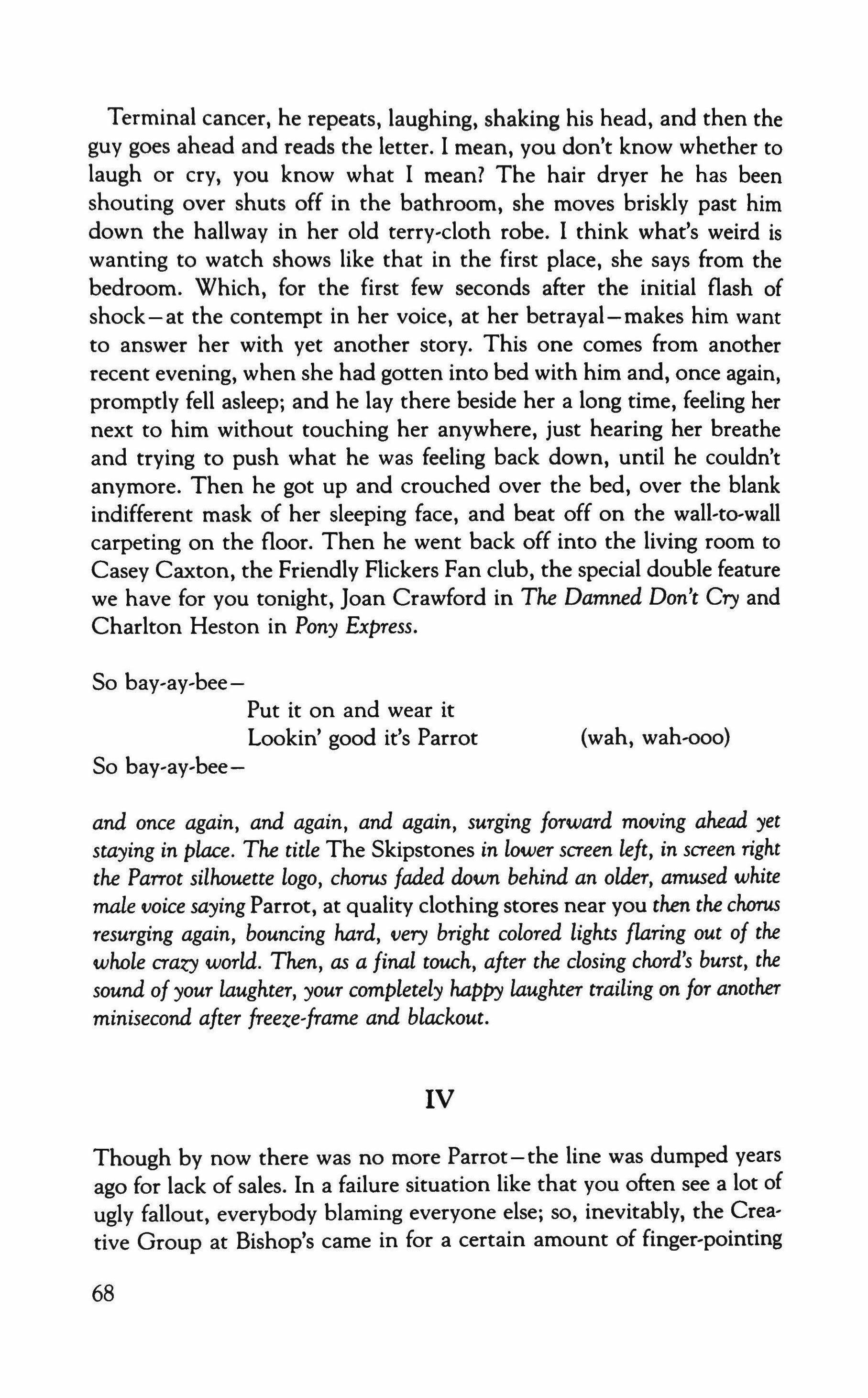
(wah, wah-coo)
and once again. and again, and again, surging forward moving ahead yet staying in place. The title The Skipstones in lower screen left, in screen right the Parrot silhouette logo, chorus faded down behind an older, amused white male voice saying Parrot, at quality clothing stores near you then the chorus resurging again, bouncing hard, very bright colored lights flaring out of the whole cra<:y world. Then, as a final touch, after the closing chord's burst, the sound of your laughter, your completely happy laughter trailing on for another minisecond after freeze-frame and blackout.
IV
Though by now there was no more Parrot - the line was dumped years ago for lack of sales. In a failure situation like that you often see a lot of ugly fallout, everybody blaming everyone else; so, inevitably, the Creative Group at Bishop's came in for a certain amount of finger-pointing
68

criticism from the client company's marketing folks, whose basic mistake it had been, in Bob Ogden's opinion, to have come up with a way-out line ofclothing for a manifestly increasingly conservative target group in the first place. Given their years with the company, and reputations for competence, Ogden and Phil Marston had few problems riding out the modest storm that followed, and attaching themselves to another prod, uct line. Not so Art, whose fortunes continued to decline. As for doowop, its free-floating connotations of nostalgic funk had by now shifted over to hip-hop, a youth subculture from the streets of Brooklyn and the Bronx in the late seventies, involving break dancing, rap music and graffiti, any or all of which could now be reinvoked and represented in a suitably transmuted form to tap that circuit, draw off some of that juice, run it through, say, Diet Coke straight to your heart.
But what happened to the music, the singing in Mark's life? It can't all have just disappeared or been diverted, let to float away or get mixed in with all this other crap, the commercial, the job, his relationship with this woman, etc. Isn't there still, way down deep-inside his character, psyche, soul, even-some kind of safe and secret place where the music remains as bright and useless as we say all great art has to be? Maybe you can still have him hum to himself in the car. Or while he's shaving, idly watching the face that is his looking back in the mirror. Maybe he can just hear the music in his head sometimes, a scrap of bass,line or melody flits by as he sits on the train to his job in the city in the morning or comes back home at night. Or even more random, more fleeting than that: a fragrance of tune, a warbling pulse, the merest sense memory of vibration, trees, night, going by so quick and low on his horizon that it hardly, hardly registers at all. Certainly not enough for him to think about, ask what it is, where it's from. But just because he doesn't ask doesn't mean it isn't still inside him somewhere, that it hasn't lasted, no one wants to think that.
Casey Caxton is really there, just as on the show he promises to be, every Saturday, all day. From the entrance doors to the giant Waterbed Warehouse you can spot him in the middle of the showroom floor, inside the same rough-shingled gazebo he comes out of at the start of each weeknight's Friendly Flickers. He is waving goodbye now to a frail white-haired couple whose dazed smiles float over Mark too on his way up through the aisles, past waterbeds and waterbed arrangements of all kinds under steel girders draped with red-white-and-blue banners pro' claiming SALE! SALE! SALE! There are, as far as Mark can see, not
69
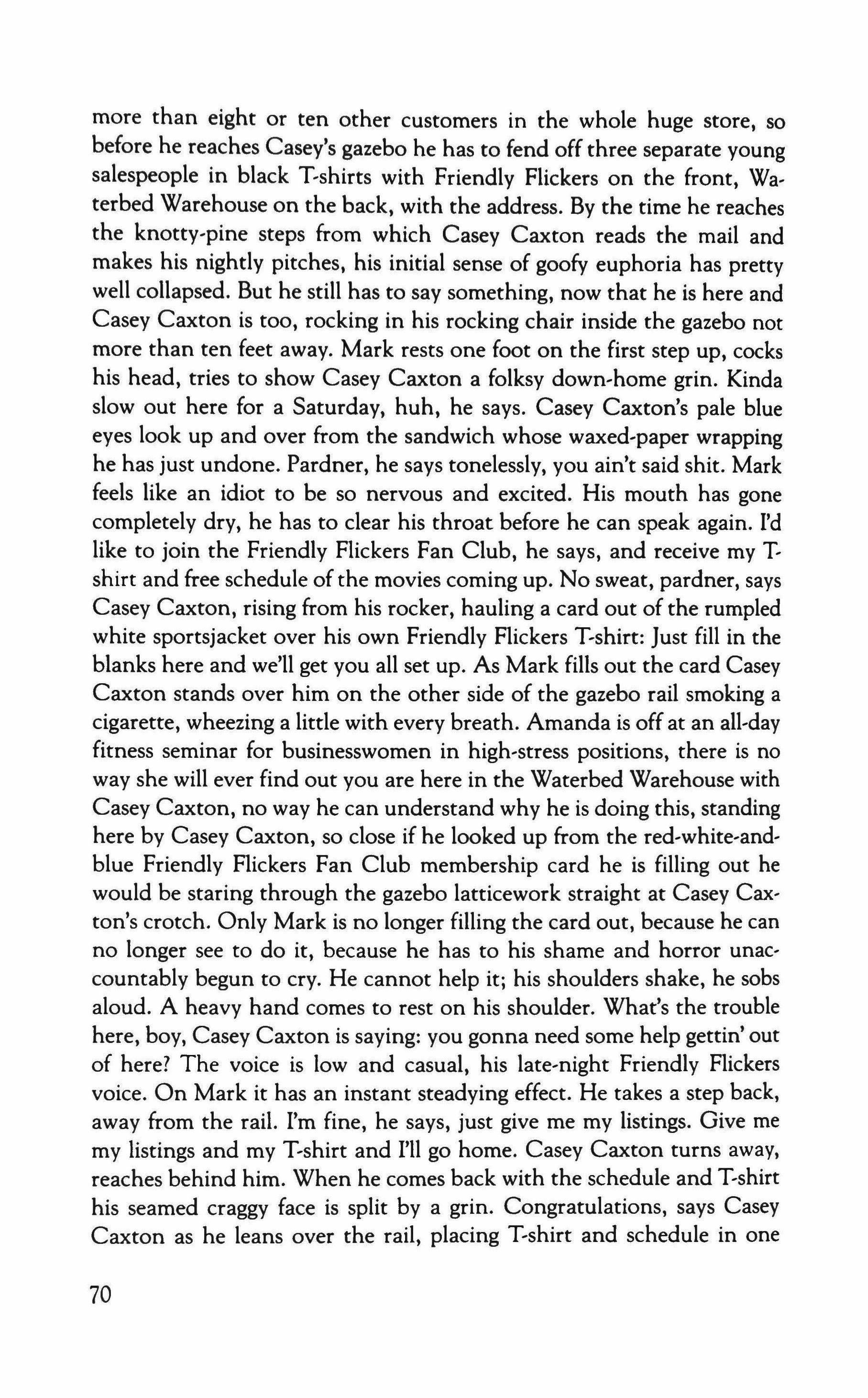
more than eight or ten other customers in the whole huge store, so before he reaches Casey's gazebo he has to fend off three separate young salespeople in black T-shirts with Friendly Flickers on the front, Waterbed Warehouse on the back, with the address. By the time he reaches the knotty-pine steps from which Casey Caxton reads the mail and makes his nightly pitches, his initial sense of goofy euphoria has pretty well collapsed. But he still has to say something, now that he is here and Casey Caxton is too, rocking in his rocking chair inside the gazebo not more than ten feet away. Mark rests one foot on the first step up, cocks his head, tries to show Casey Caxton a folksy down-home grin. Kinda slow out here for a Saturday, huh, he says. Casey Caxton's pale blue eyes look up and over from the sandwich whose waxed-paper wrapping he has just undone. Pardner, he says tonelessly, you ain't said shit. Mark feels like an idiot to be so nervous and excited. His mouth has gone completely dry, he has to clear his throat before he can speak again. I'd like to join the Friendly Flickers Fan Club, he says, and receive my Tshirt and free schedule of the movies coming up. No sweat, pardner, says Casey Caxton, rising from his rocker, hauling a card out of the rumpled white sportsjacket over his own Friendly Flickers T-shirt: Just fill in the blanks here and we'll get you all set up. As Mark fills out the card Casey Caxton stands over him on the other side of the gazebo rail smoking a cigarette, wheezing a little with every breath. Amanda is off at an all-day fitness seminar for businesswomen in high-stress positions, there is no way she will ever find out you are here in the Waterbed Warehouse with Casey Caxton, no way he can understand why he is doing this, standing here by Casey Caxton, so close if he looked up from the red-white-andblue Friendly Flickers Fan Club membership card he is filling out he would be staring through the gazebo latticework straight at Casey Caxton's crotch. Only Mark is no longer filling the card out, because he can no longer see to do it, because he has to his shame and horror unaccountably begun to cry. He cannot help it; his shoulders shake, he sobs aloud. A heavy hand comes to rest on his shoulder. What's the trouble here, boy, Casey Caxton is saying: you gonna need some help gettin' out of here? The voice is low and casual, his late-night Friendly Flickers voice. On Mark it has an instant steadying effect. He takes a step back, away from the rail. I'm fine, he says, just give me my listings. Give me my listings and my Tshirt and I'll go home. Casey Caxton turns away, reaches behind him. When he comes back with the schedule and Tshirr his seamed craggy face is split by a grin. Congratulations, says Casey Caxton as he leans over the rail, placing T-shirt and schedule in one
70
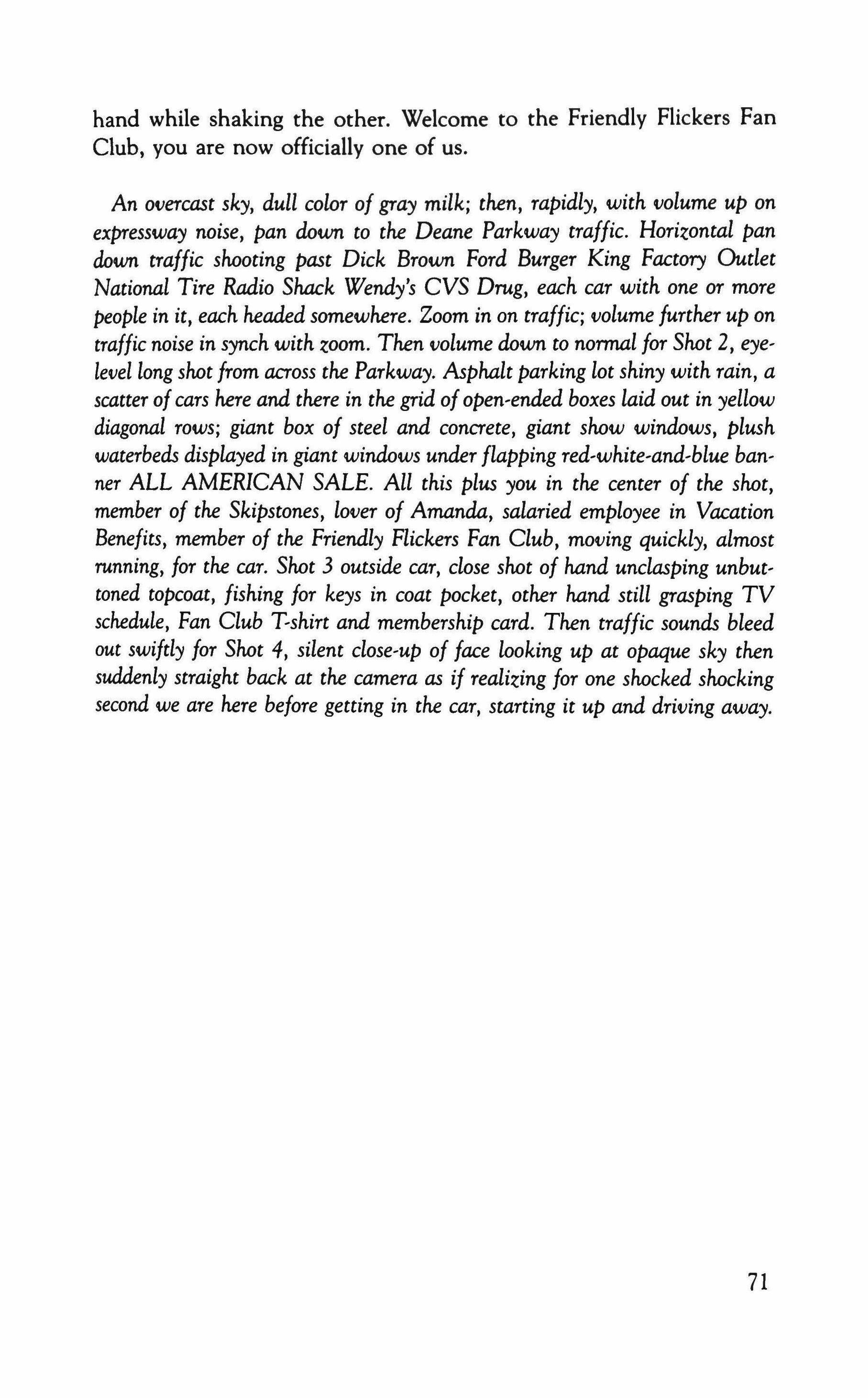
hand while shaking the other. Welcome to the Friendly Flickers Fan Club, you are now officially one of us.
An overcast sky, dull color of gray milk; then, rapidly, with volume up on expressway noise, pan down to the Deane Parkway traffic. Horizontal pan down traffic shooting past Dick Brown Ford Burger King Factory Outlet National Tire Radio Shack Wendy's CVS Drug, each car with one or more people in it, each headed somewhere. Zoom in on traffic; volume further up on traffic noise in synch with zoom. Then volume down to normal for Shot 2, eyelevel long shot from across the Parkway. Asphalt parking lot shiny with rain, a scatter of cars here and there in the grid ofopen-ended boxes laid out in yellow diagonal rows; giant box of steel and concrete, giant show windows, plush waterbeds displayed in giant windows under flapping red-white-and-blue banner ALL AMERICAN SALE. All this plus you in the center of the shot, member of the Skipstones, lover of Amanda, salaried employee in Vacation Benefits, member of the Friendly Flickers Fan Club, moving quickly, almost running, for the car. Shot 3 outside car, close shot of hand unclasping unbuttoned topcoat, fishing for keys in coat pocket, other hand still grasping TV schedule, Fan Club T-shirt and membership card. Then traffic sounds bleed out swiftly for Shot 4, silent close-up of face looking up at opaque sky then suddenly straight back at the camera as if realizing for one shocked shocking second we are here before getting in the car, starting it up and driving away.
71
A Tough Life
Sheila Schwartz
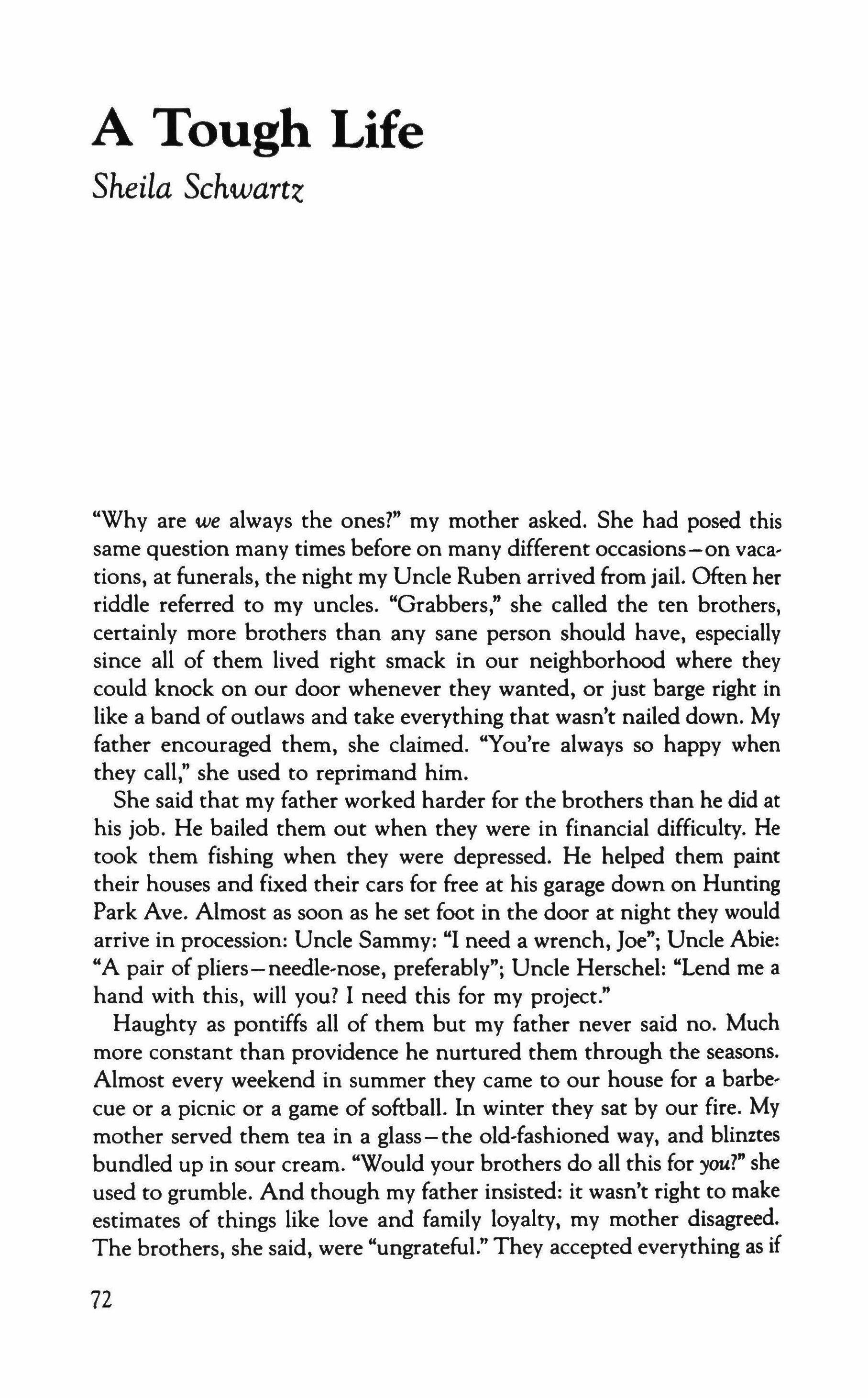
"Why are we always the ones?" my mother asked. She had posed this same question many times before on many different occasions-on vacations, at funerals, the night my Uncle Ruben arrived from jail. Often her riddle referred to my uncles. "Grabbers," she called the ten brothers, certainly more brothers than any sane person should have, especially since all of them lived right smack in our neighborhood where they could knock on our door whenever they wanted, or just barge right in like a band of outlaws and take everything that wasn't nailed down. My father encouraged them, she claimed. "You're always so happy when they call," she used to reprimand him.
She said that my father worked harder for the brothers than he did at his job. He bailed them out when they were in financial difficulty. He took them fishing when they were depressed. He helped them paint their houses and fixed their cars for free at his garage down on Hunting Park Ave. Almost as soon as he set foot in the door at night they would arrive in procession: Uncle Sammy: "I need a wrench, Joe"; Uncle Abie: "A pair of pliers-needle-nose, preferably"; Uncle Herschel: "Lend me a hand with this, will you? I need this for my project."
Haughty as pontiffs all of them but my father never said no. Much more constant than providence he nurtured them through the seasons. Almost every weekend in summer they came to our house for a barbecue or a picnic or a game of softball. In winter they sat by our fire. My mother served them tea in a glass-the old-fashioned way, and blinztes bundled up in sour cream. "Would your brothers do all this for you?" she used to grumble. And though my father insisted: it wasn't right to make estimates of things like love and family loyalty, my mother disagreed. The brothers, she said, were "ungrateful." They accepted everything as if
72
it were their due. My father got the merest of thanks ("You did a nice job, Joe"; "That looks pretty good, Kid"). In synagogue, God got the rest. To Him they bowed their heads in reverence, in appreciation for services rendered without charge. "Blessed art Thou 0 Lord," they chanted.

"Ten brothers and now this!" my mother said.
That was the summer a very strange thing happened. The brothers all disappeared, every last one of them, "poofl" my mother said, "like magic." Overnight, it seemed, they forgot who we were. All ten of them were suddenly, in mysterious unison, terribly busy, even Uncle Isidore, the unmarried brother, who usually spent a week with us at Longport, lathered up in Sea & Ski, reclining in the sun on a blanket while my mother passed him cups of icy lemonade and my father held his fishing pole in case he got a tug. "He has no one else," my father always whispered, as if this were a diagnosis of a terminal illness, but that summer Uncle Isidore somehow managed to survive all on his own without us.
Likewise the rest of them. Through the entire month of August not one of them ventured across our threshold, nor did they phone, nor did they send any oftheir offspring to borrow those indispensible items they always forgot to return. Whenever my father called them they already had one foot out the door or they had made "prior arrangements" or someone had come down with one ofthose awful colds of summer-they wouldn't dream of spreading the germs!
This quarantine began the day my Uncle Ruben arrived at our house and continued almost until the day he left. It made my mother furious. "I rest my case," she kept saying. "Don't jump to conclusions," my father would answer her back. "All the evidence isn't in yet."
I never even knew I had an Uncle Ruben until he sat down at our dinner table one Friday night.
"Kiss your uncle 'hello,'" my mother instructed. "He's been out West."
"Doing what?" I asked. I thought Uncle Ruben might be a cowboy in a rodeo-why else go out West?-but my mother just said, "Sha!" She tore off a piece ofbread and warned me not to eat it before the blessing. "For once:' she commanded, "behave." As if I didn't always. What else was there to do in my house? I folded my hands in my lap and tried to look serene, at one with God and the marvelous productions of His universe.
Uncle Ruben didn't seem to care. He noticed neither my good behavior nor her warning. He popped his bread right into his mouth, then looked at his empty hand, surprised, as though it had cheated him.
73
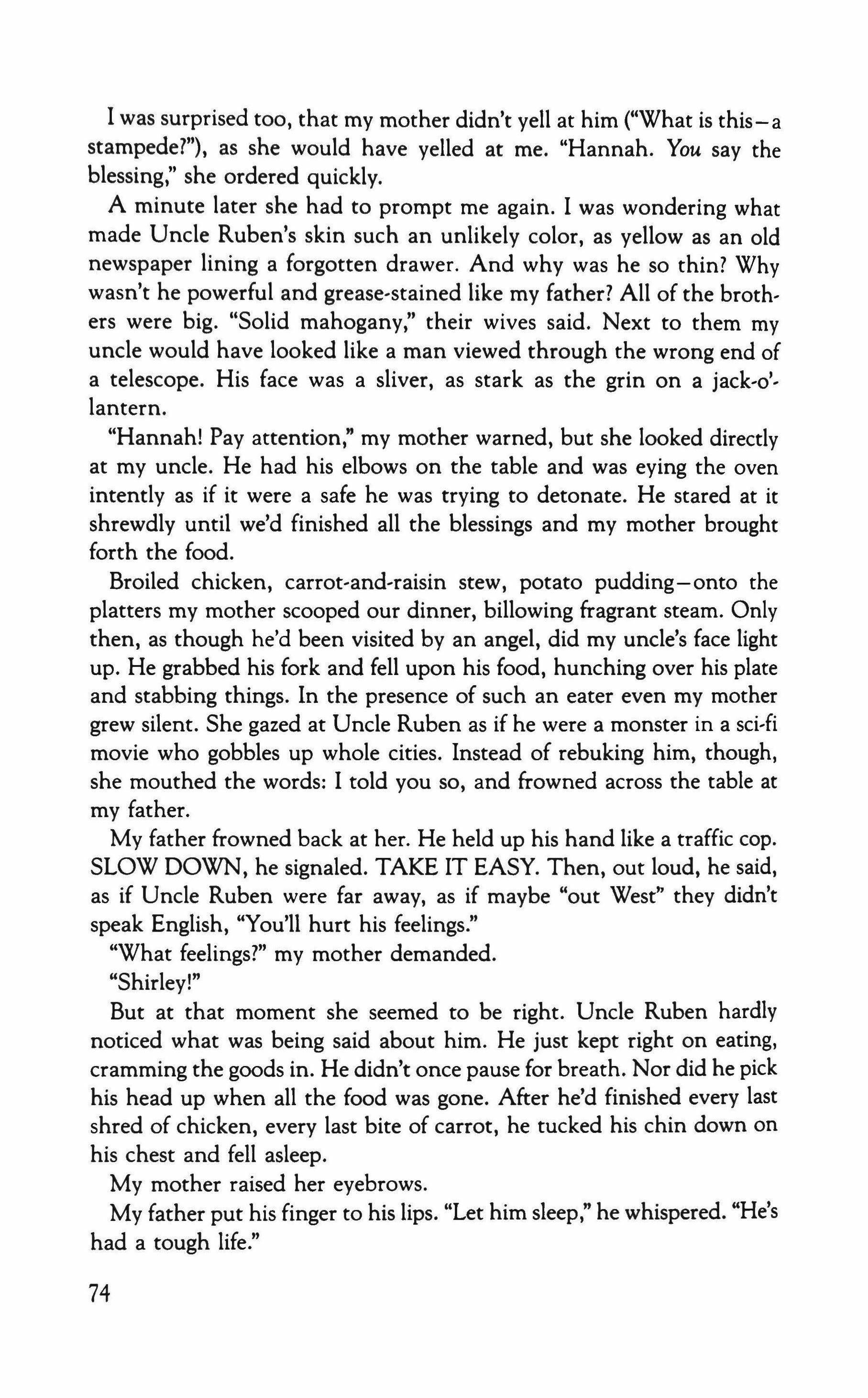
I was surprised too, that my mother didn't yell at him ("What is this-a stampede?"), as she would have yelled at me. "Hannah. You say the blessing," she ordered quickly.
A minute later she had to prompt me again. I was wondering what made Uncle Ruben's skin such an unlikely color, as yellow as an old newspaper lining a forgotten drawer. And why was he so thin? Why wasn't he powerful and grease-stained like my father? All of the brothers were big. "Solid mahogany," their wives said. Next to them my uncle would have looked like a man viewed through the wrong end of a telescope. His face was a sliver, as stark as the grin on a jack-dlantern.
"Hannah! Pay attention," my mother warned, but she looked directly at my uncle. He had his elbows on the table and was eying the oven intently as if it were a safe he was trying to detonate. He stared at it shrewdly until we'd finished all the blessings and my mother brought forth the food.
Broiled chicken, carrot-and-raisin stew, potato pudding-onto the platters my mother scooped our dinner, billowing fragrant steam. Only then, as though he'd been visited by an angel, did my uncle's face light up. He grabbed his fork and fell upon his food, hunching over his plate and stabbing things. In the presence of such an eater even my mother grew silent. She gazed at Uncle Ruben as if he were a monster in a sci-fi movie who gobbles up whole cities. Instead of rebuking him, though, she mouthed the words: I told you so, and frowned across the table at my father.
My father frowned back at her. He held up his hand like a traffic cop. SLOW DOWN, he signaled. TAKE IT EASY. Then, out loud, he said, as if Uncle Ruben were far away, as if maybe "out West" they didn't speak English, "You'll hurt his feelings."
"What feelings?" my mother demanded.
"Shirley!"
But at that moment she seemed to be right. Uncle Ruben hardly noticed what was being said about him. He just kept right on eating, cramming the goods in. He didn't once pause for breath. Nor did he pick his head up when all the food was gone. After he'd finished every last shred of chicken, every last bite of carrot, he tucked his chin down on his chest and fell asleep.
My mother raised her eyebrows.
My father put his finger to his lips. "Let him sleep," he whispered. "He's had a tough life."
74
"So who hasn't?"
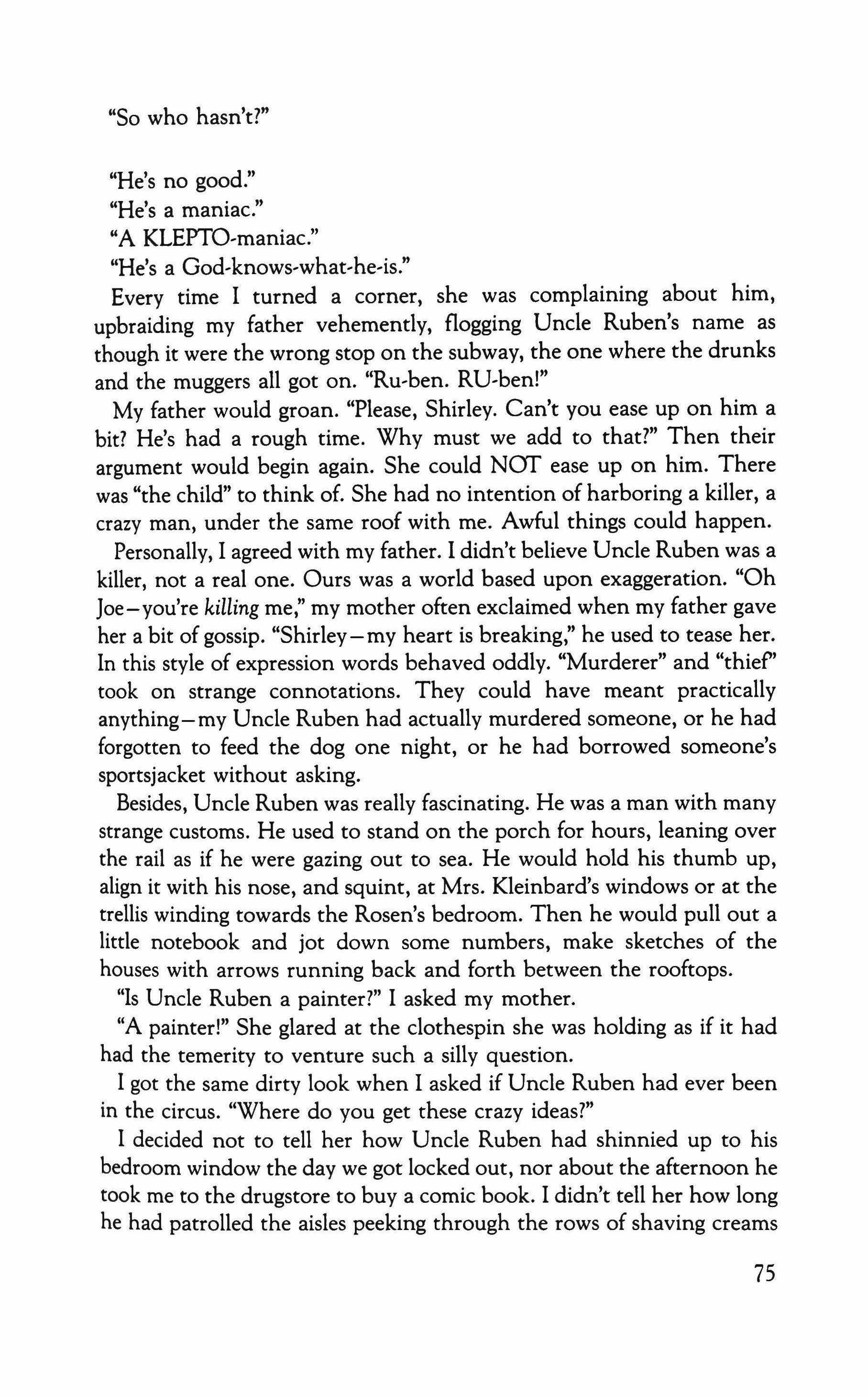
"He's no good."
"He's a maniac."
"A KLEPTO,maniac."
"He's a God-knows-what-he-is,"
Every time I turned a corner, she was complaining about him, upbraiding my father vehemently, flogging Uncle Ruben's name as though it were the wrong stop on the subway, the one where the drunks and the muggers all got on. "Ru-ben. Rl.J-ben!"
My father would groan. "Please, Shirley. Can't you ease up on him a bit? He's had a rough time. Why must we add to that?" Then their argument would begin again. She could Nor ease up on him. There was "the child" to think of. She had no intention of harboring a killer, a crazy man, under the same roof with me. Awful things could happen.
Personally, I agreed with my father. I didn't believe Uncle Ruben was a killer, not a real one. Ours was a world based upon exaggeration. "Oh Joe-you're killing me," my mother often exclaimed when my father gave her a bit of gossip. "Shirleymy heart is breaking," he used to tease her. In this style of expression words behaved oddly. "Murderer" and "thief" took on strange connotations. They could have meant practically anything-my Uncle Ruben had actually murdered someone, or he had forgotten to feed the dog one night, or he had borrowed someone's sportsjacket without asking.
Besides, Uncle Ruben was really fascinating. He was a man with many strange customs. He used to stand on the porch for hours, leaning over the rail as if he were gazing out to sea. He would hold his thumb up, align it with his nose, and squint, at Mrs. Kleinbard's windows or at the trellis winding towards the Rosen's bedroom. Then he would pull out a little notebook and jot down some numbers, make sketches of the houses with arrows running back and forth between the rooftops.
"Is Uncle Ruben a painter?" I asked my mother.
"A painter!" She glared at the clothespin she was holding as if it had had the temerity to venture such a silly question.
I got the same dirty look when I asked if Uncle Ruben had ever been in the circus. "Where do you get these crazy ideas?"
I decided not to tell her how Uncle Ruben had shinnied up to his bedroom window the day we got locked out, nor about the afternoon he took me to the drugstore to buy a comic book. I didn't tell her how long he had patrolled the aisles peeking through the rows of shaving creams
75
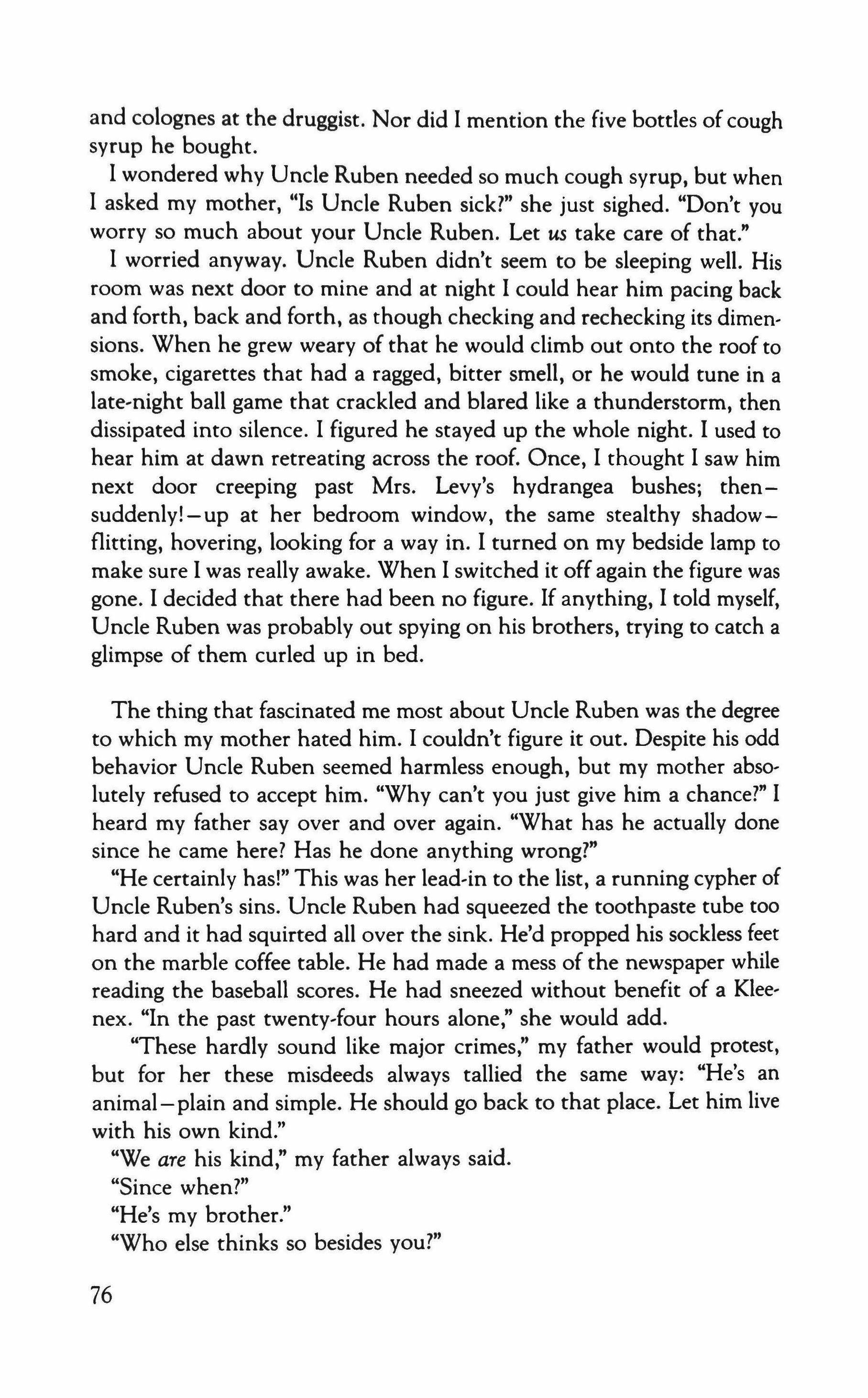
and colognes at the druggist. Nor did I mention the five bottles of cough syrup he bought.
I wondered why Uncle Ruben needed so much cough syrup, but when I asked my mother, Ills Uncle Ruben sick?" she just sighed. "Don't you worry so much about your Uncle Ruben. Let us take care of that."
I worried anyway. Uncle Ruben didn't seem to be sleeping well. His room was next door to mine and at night I could hear him pacing back and forth, back and forth, as though checking and rechecking its dimensions. When he grew weary of that he would climb out onto the roof to smoke, cigarettes that had a ragged, bitter smell, or he would tune in a late-night ball game that crackled and blared like a thunderstorm, then dissipated into silence. I figured he stayed up the whole night. I used to hear him at dawn retreating across the roof. Once, I thought I saw him next door creeping past Mrs. Levy's hydrangea bushes; thensuddenly!-up at her bedroom window, the same stealthy shadowflitting, hovering, looking for a way in. I turned on my bedside lamp to make sure I was really awake. When I switched it off again the figure was gone. I decided that there had been no figure. If anything, I told myself, Uncle Ruben was probably out spying on his brothers, trying to catch a glimpse of them curled up in bed.
The thing that fascinated me most about Uncle Ruben was the degree to which my mother hated him. I couldn't figure it out. Despite his odd behavior Uncle Ruben seemed harmless enough, but my mother absolutely refused to accept him. IIWhy can't you just give him a chance?" I heard my father say over and over again. IIWhat has he actually done since he came here? Has he done anything wrong?"
IIHe certainly has!" This was her lead-in to the list, a running cypher of Uncle Ruben's sins. Uncle Ruben had squeezed the toothpaste tube too hard and it had squirted all over the sink. He'd propped his sockless feet on the marble coffee table. He had made a mess of the newspaper while reading the baseball scores. He had sneezed without benefit of a Kleenex. IIIn the past twenty-four hours alone," she would add.
"These hardly sound like major crimes," my father would protest, but for her these misdeeds always tallied the same way: "He's an animal-plain and simple. He should go back to that place. Let him live with his own kind."
"We aTe his kind," my father always said.
"Since when?"
"He's my brother."
"Who else thinks so besides you?"
76

Face to face with Uncle Ruben she was always polite. "Would you care for another cookie, Ruben? Is this how you like your coffee? Do you have enough towels? Do you prefer this rug by your bed or beneath the vanity table]" as if she could obliterate him with kindness. Every morning she drove my uncle to the subway station though he always objected: "I'm not an old man, Shirley. There's no reason why I can't walk." He was supposed to be working downtown in a shoe factory pounding leather, stitching seams into the tough insides of boots and moccasins. Each day as we watched him shuffle up the steps, pulling himself sadly, hand over hand along the rail, my mother would observe, "You see? He doesn't really want to go but he has to. This is what comes of no schooling."
To protect me from Uncle Ruben's fate she enrolled me, on the days she worked as a dictaphone operator in a law office, in an enrichment course in "higher mathematics" at the local elementary school. "It's for gifted students only." She read from a pastel pamphlet that described this internment. "A WONDERFUL OPPORTUNITY!" "AN INTRODUCTION TO THE WORLD OF TOMORROW!" "COLLEGE PREP!" "This is marvelous," she added, exchanging an intimate, knowing look with the circular.
It really wasn't Uncle Ruben's fault I played hooky that summer. I was ripe for corruption, and besides, our teacher, Mr. Blank, was right out of college and had far too much faith in the inherent interest of his subject. He was skinny and wore enormous glasses with a double bridge and he spent the whole entire first day showing us how to use the light switch. "I'm going to teach you the binary system," he announced as proudly as if it were the antidote to kryptonite. "There are only two numbers in the binary system," he continued. "Can you guess what they are, boys and girls?"
"Very good," he told Jerome Levy, a handwaver from birth. "They are ZERO and ONE. Can you repeat that, class?"
"Zero and one," we chanted. "ZERO and ONE!!"
"Excellent," Mr. Blank commended us on our fifteenth try. "Now I want you to do something else for me. Think of the ZERO as the OFF position of these lights. Think of the ON position as ONE. Can you do that?" He made each of us get up and flick the light switch: ON OFF ON OFF ON OFF.
By the following Friday, when Uncle Ruben handed me the note, I was yearning for deliverance. I was mournfully packing my satchel with No. 2 pencils and plenty of bubblegum when he pulled me aside.
77
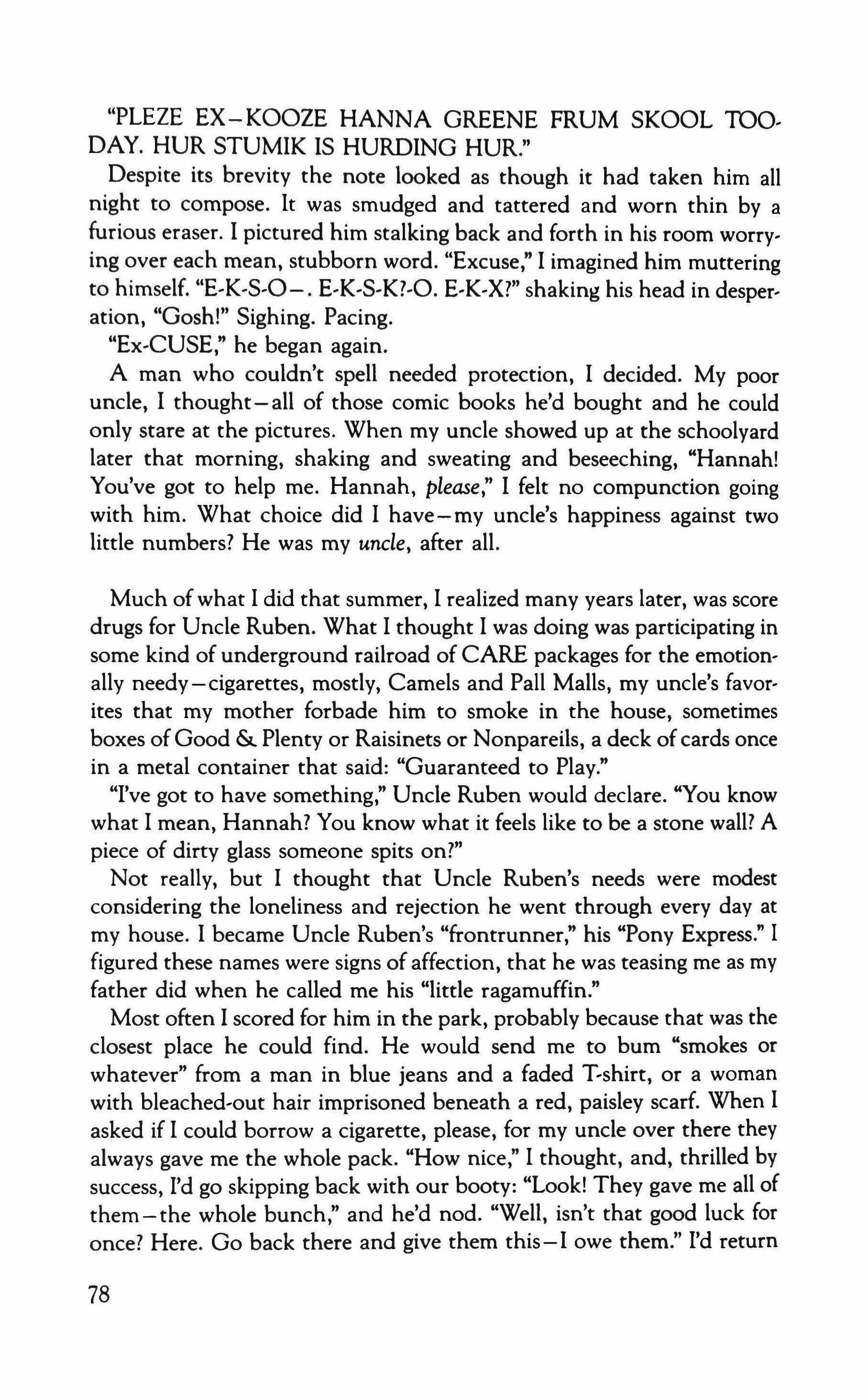
"PLEZE EX-KOOZE HANNA GREENE FRUM SKOOL roo. DAY. HUR STUMIK IS HURDING HUR."
Despite its brevity the note looked as though it had taken him all night to compose. It was smudged and tattered and worn thin by a furious eraser. I pictured him stalking back and forth in his room worrying over each mean, stubborn word. "Excuse," I imagined him muttering to himself. "E-K-S-O-. E-K-S-K?-O. E-K-X?" shaking his head in desperation, "Gosh!" Sighing. Pacing.
"Ex-CUSE," he began again.
A man who couldn't spell needed protection, I decided. My poor uncle, I thought-all of those comic books he'd bought and he could only stare at the pictures. When my uncle showed up at the schoolyard later that morning, shaking and sweating and beseeching, "Hannah! You've got to help me. Hannah, please," I felt no compunction going with him. What choice did I have-my uncle's happiness against two little numbers? He was my uncle, after all.
Much ofwhat I did that summer, I realized many years later, was score drugs for Uncle Ruben. What I thought I was doing was participating in some kind of underground railroad of CARE packages for the emotionally needy-cigarettes, mostly, Camels and Pall Malls, my uncle's favorites that my mother forbade him to smoke in the house, sometimes boxes ofGood & Plenty or Raisinets or Nonpareils, a deck ofcards once in a metal container that said: "Guaranteed to Play."
"I've got to have something," Uncle Ruben would declare. "You know what I mean, Hannah? You know what it feels like to be a stone wall? A piece of dirty glass someone spits on?"
Not really, but I thought that Uncle Ruben's needs were modest considering the loneliness and rejection he went through every day at my house. I became Uncle Ruben's "frontrunner," his "Pony Express." I figured these names were signs of affection, that he was teasing me as my father did when he called me his "little ragamuffin."
Most often I scored for him in the park, probably because that was the closest place he could find. He would send me to bum "smokes or whatever" from a man in blue jeans and a faded T-shirt, or a woman with bleached-out hair imprisoned beneath a red, paisley scarf. When I asked if I could borrow a cigarette, please, for my uncle over there they always gave me the whole pack. "How nice," I thought, and, thrilled by success, I'd go skipping back with our booty: "Look! They gave me all of them-the whole bunch," and he'd nod. "Well, isn't that good luck for once? Here. Go back there and give them this-lowe them." I'd return
78

with whatever comic book he'd been holding at the time, Archie and Veronica, Richie Rich, Thor. "There's a good part on page twenty-three," I'd say as he'd instructed. I never embarrassed him by revealing that he couldn't read.
I thought that people were really friendly in the park, that they were friendlier, in fact, most everywhere, than at home. We met people in all kinds of places who were more generous than most of my family. At bus stops, on the library steps, in various alleys behind taprooms that were neon-lit all day, people kept giving him things. Granted, it was mostly small things, but every so often there was a bundle ofshirts straight from the cleaners or a sack filled with french fries and lots and lots of salt. Occasionally, we were even invited to someone's apartment. Though I was glad for Uncle Ruben, this wasn't my favorite type ofjaunt. I had to sit in leprous kitchens where everything was peeling-the linoleum, the plaster, the vinyl coverings on the chairs, and drink Kool-Aid out of glasses that looked as if they'd never known detergent.
"Time-out for grownups," Uncle Ruben would say. "I'll be right backfive minutes," but it always took him much longer than that. Five minutes. Ten minutes. Twenty minutes. An hour. He would fall asleep in these places on ravaged couches and armchairs, in back bedrooms on war-torn mattresses, on the cold tile floors of bathrooms, his head cradled against the U-joint beneath the sink. Whenever this happened I was horribly embarrassed and concerned that Uncle Ruben was spoiling his chances to make friends. "I'm really sorry," I'd say over and over as I tried to revive him. "This happens to him a lot. You should see him at home. I think he stays up too late or something. I know it seems weird but he really likes you. I'm sure he does." Then I'd lean over him again, quickly, to get him to prove my point. "Uncle Ruben? Uncle Ruben, wake up! Your friends are waiting for you."
Oddly enough, these strangers never got angry. No matter what Uncle Ruben did they just grinned slow billowing grins like butterflies in late afternoon. "No sweat," they'd say, or "Give the poor dude a break. He'll come to in a minute." I thought they were pretty good-natured about Uncle Ruben's social inadequacies and would have thanked them, but they always disappeared soon after, down the fire escape or out a window to "cop" some fresh air.
It wasn't true what my mother claimed later. My uncle didn't drag me along on his burglaries. Nor did he try to make a drug addict out of me. Only once did I actually see him shoot up and he had me so convinced that I was watching a diabetic rescue himself from certain death that my
79
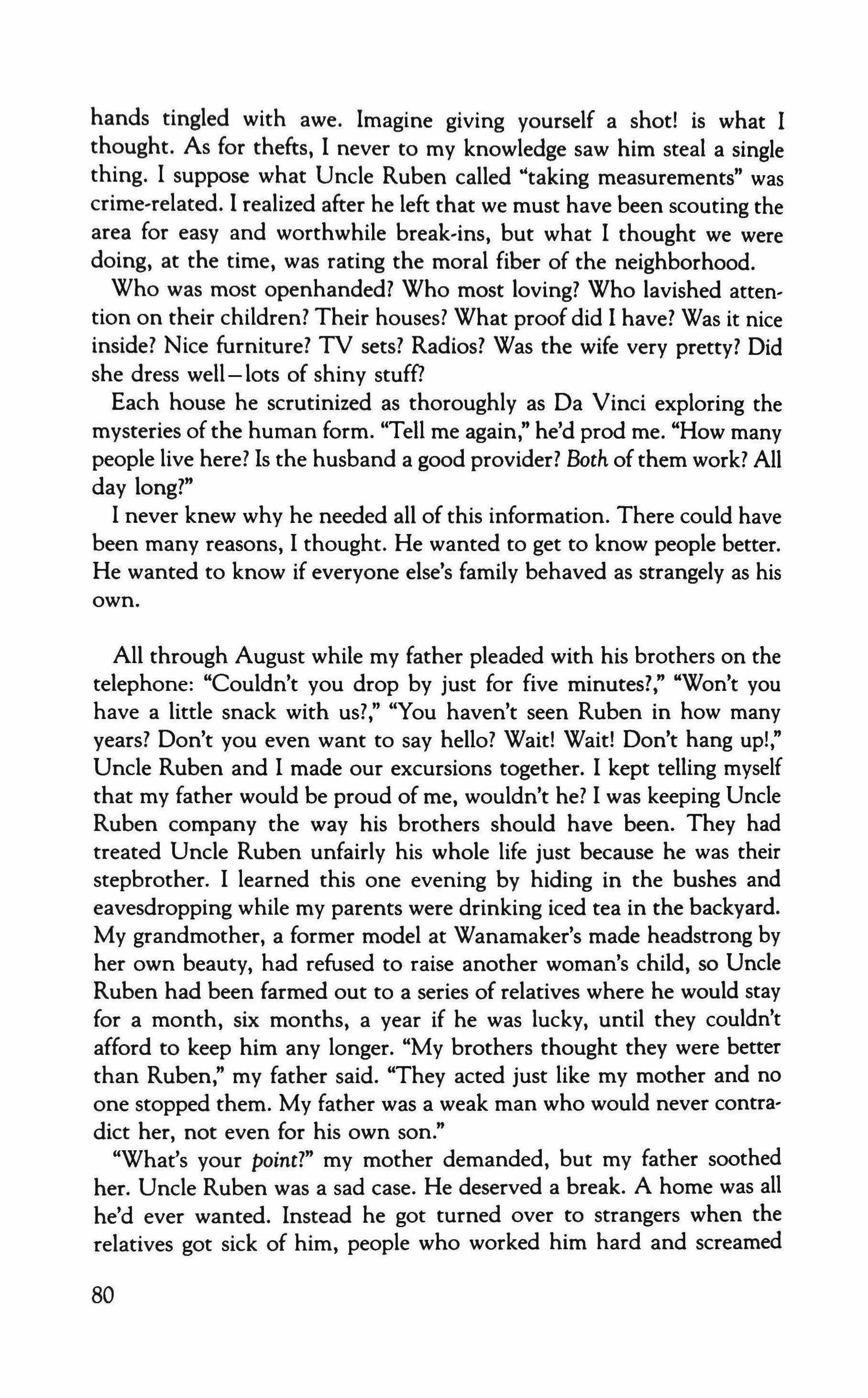
hands tingled with awe. Imagine givmg yourself a shot! is what I thought. As for thefts, I never to my knowledge saw him steal a single thing. I suppose what Uncle Ruben called "taking measurements" was crime-related. I realized after he left that we must have been scouting the area for easy and worthwhile break-ins, but what I thought we were doing, at the time, was rating the moral fiber of the neighborhood. Who was most openhanded? Who most loving? Who lavished attention on their children? Their houses? What proof did I have? Was it nice inside? Nice furniture? TV sets? Radios? Was the wife very pretty? Did she dress well-lots of shiny stuff?
Each house he scrutinized as thoroughly as Da Vinci exploring the mysteries of the human form. "Tell me again," he'd prod me. "How many people live here? Is the husband a good provider? Both of them work? All day long?"
I never knew why he needed all of this information. There could have been many reasons, I thought. He wanted to get to know people better. He wanted to know if everyone else's family behaved as strangely as his own.
All through August while my father pleaded with his brothers on the telephone: "Couldn't you drop by just for five minutes?," "Won't you have a little snack with us?," "You haven't seen Ruben in how many years? Don't you even want to say hello? Wait! Wait! Don't hang up!," Uncle Ruben and I made our excursions together. I kept telling myself that my father would be proud of me, wouldn't he? I was keeping Uncle Ruben company the way his brothers should have been. They had treated Uncle Ruben unfairly his whole life just because he was their stepbrother. I learned this one evening by hiding in the bushes and eavesdropping while my parents were drinking iced tea in the backyard. My grandmother, a former model at Wanamaker's made headstrong by her own beauty, had refused to raise another woman's child, so Uncle Ruben had been farmed out to a series of relatives where he would stay for a month, six months, a year if he was lucky, until they couldn't afford to keep him any longer. "My brothers thought they were better than Ruben," my father said. "They acted just like my mother and no one stopped them. My father was a weak man who would never contradict her, not even for his own son."
"What's your point?" my mother demanded, but my father soothed her. Uncle Ruben was a sad case. He deserved a break. A home was all he'd ever wanted. Instead he got turned over to strangers when the relatives got sick of him, people who worked him hard and screamed
80
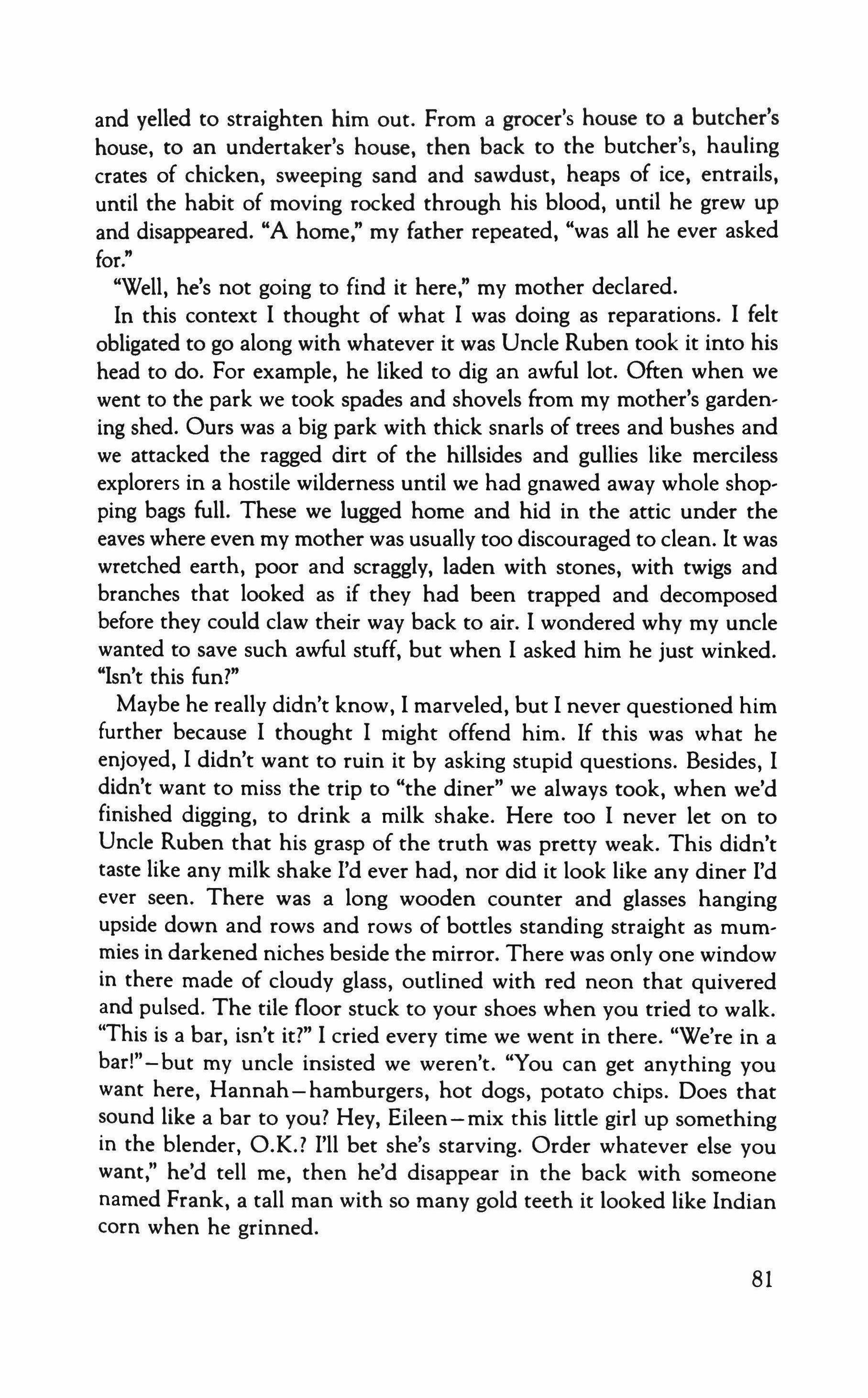
and yelled to straighten him out. From a grocer's house to a butcher's house, to an undertaker's house, then back to the butcher's, hauling crates of chicken, sweeping sand and sawdust, heaps of ice, entrails, until the habit of moving rocked through his blood, until he grew up and disappeared. "A home," my father repeated, "was all he ever asked for."
"Well, he's not going to find it here," my mother declared.
In this context I thought of what I was doing as reparations. I felt obligated to go along with whatever it was Uncle Ruben took it into his head to do. For example, he liked to dig an awful lot. Often when we went to the park we took spades and shovels from my mother's gardening shed. Ours was a big park with thick snarls of trees and bushes and we attacked the ragged dirt of the hillsides and gullies like merciless explorers in a hostile wilderness until we had gnawed away whole shopping bags full. These we lugged home and hid in the attic under the eaves where even my mother was usually too discouraged to clean. It was wretched earth, poor and scraggly, laden with stones, with twigs and branches that looked as if they had been trapped and decomposed before they could claw their way back to air. I wondered why my uncle wanted to save such awful stuff, but when I asked him he just winked. "Isn't this fun?"
Maybe he really didn't know, I marveled, but I never questioned him further because I thought I might offend him. If this was what he enjoyed, I didn't want to ruin it by asking stupid questions. Besides, I didn't want to miss the trip to "the diner" we always took, when we'd finished digging, to drink a milk shake. Here too I never let on to Uncle Ruben that his grasp of the truth was pretty weak. This didn't taste like any milk shake I'd ever had, nor did it look like any diner I'd ever seen. There was a long wooden counter and glasses hanging upside down and rows and rows of bottles standing straight as mummies in darkened niches beside the mirror. There was only one window in there made of cloudy glass, outlined with red neon that quivered and pulsed. The tile floor stuck to your shoes when you tried to walk. "This is a bar, isn't it?" I cried every time we went in there. "We're in a bar!"-but my uncle insisted we weren't. "You can get anything you want here, Hannah - hamburgers, hot dogs, potato chips. Does that sound like a bar to you? Hey, Eileen-mix this little girl up something in the blender, O.K.? I'll bet she's starving. Order whatever else you want," he'd tell me, then he'd disappear in the back with someone named Frank, a tall man with so many gold teeth it looked like Indian corn when he grinned.
81
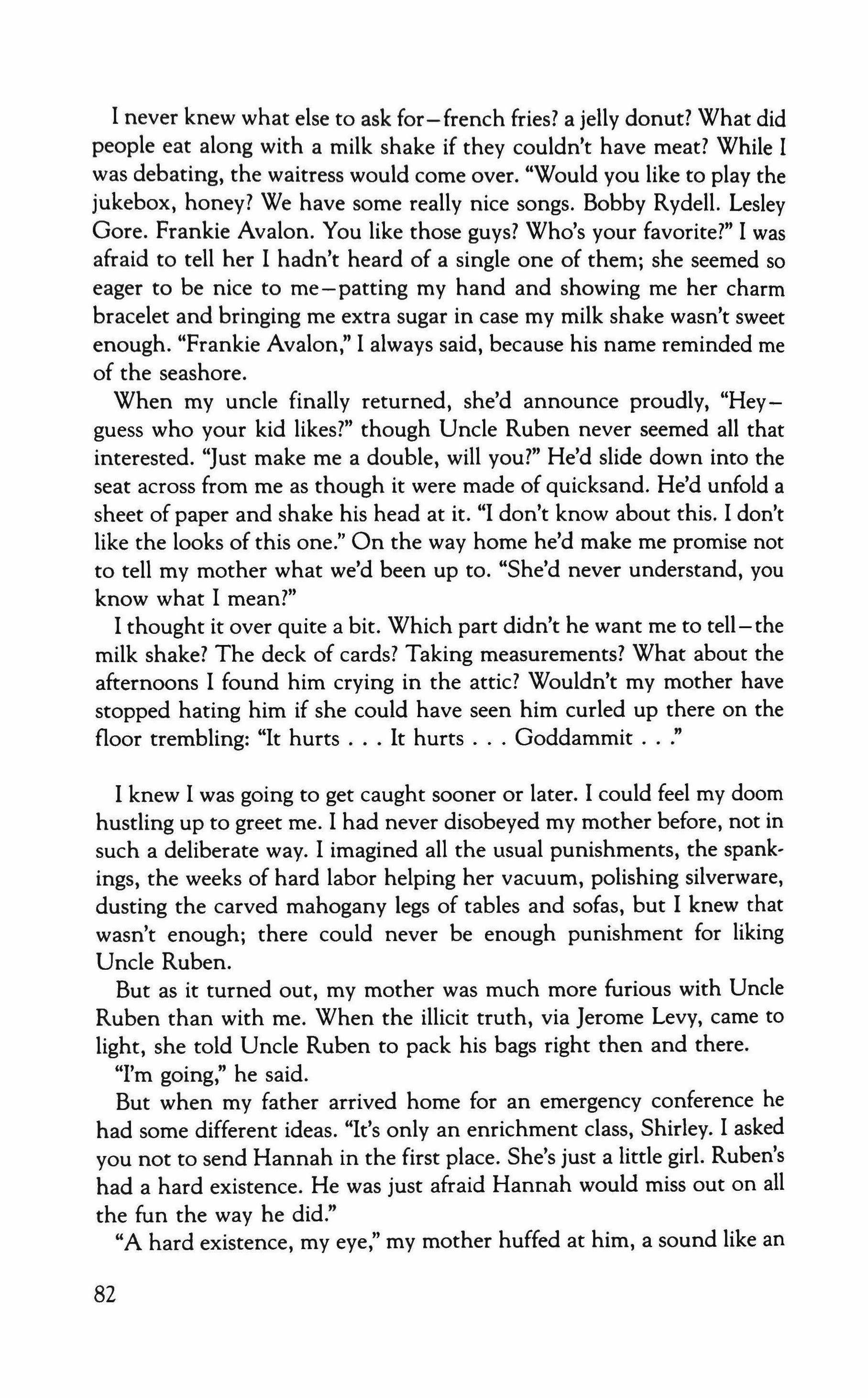
I never knew what else to ask for-french fries? a jelly donut? What did people eat along with a milk shake if they couldn't have meat? While I was debating, the waitress would come over. "Would you like to play the jukebox, honey? We have some really nice songs. Bobby Rydell. Lesley Gore. Frankie Avalon. You like those guys? Who's your favorite?" I was afraid to tell her I hadn't heard of a single one of them; she seemed so eager to be nice to me-patting my hand and showing me her charm bracelet and bringing me extra sugar in case my milk shake wasn't sweet enough. "Frankie Avalon," I always said, because his name reminded me of the seashore.
When my uncle finally returned, she'd announce proudly, "Heyguess who your kid likes?" though Uncle Ruben never seemed all that interested. "Just make me a double, will you?" He'd slide down into the seat across from me as though it were made of quicksand. He'd unfold a sheet of paper and shake his head at it. "I don't know about this. I don't like the looks of this one." On the way home he'd make me promise not to tell my mother what we'd been up to. "She'd never understand, you know what I mean?"
I thought it over quite a bit. Which part didn't he want me to tell-the milk shake? The deck of cards? Taking measurements? What about the afternoons I found him crying in the attic? Wouldn't my mother have stopped hating him if she could have seen him curled up there on the floor trembling: "It hurts It hurts Goddammit
I knew I was going to get caught sooner or later. I could feel my doom hustling up to greet me. I had never disobeyed my mother before, not in such a deliberate way. I imagined all the usual punishments, the spankings, the weeks of hard labor helping her vacuum, polishing silverware, dusting the carved mahogany legs of tables and sofas, but I knew that wasn't enough; there could never be enough punishment for liking Uncle Ruben.
But as it turned out, my mother was much more furious with Uncle Ruben than with me. When the illicit truth, via Jerome Levy, came to light, she told Uncle Ruben to pack his bags right then and there.
"I'm going," he said.
But when my father arrived home for an emergency conference he had some different ideas. "It's only an enrichment class, Shirley. I asked you not to send Hannah in the first place. She's just a little girl. Ruben's had a hard existence. He was just afraid Hannah would miss out on all the fun the way he did."
"A hard existence, my eye," my mother huffed at him, a sound like an
82

air hose trying to force sense into a hopelessly flat tire. "That's what you always say. How many times can the same excuse be good?" And though my father protested: "It's not a pass to the movies," she ignored him. "Are our lives easy?" she scolded. "Work all day long like dogs and then we have to come home at night to a good-for-nothing who wants to turn our daughter into a truant. What were they doing, I'd like to know, when they weren't doing what they were supposed to be doingHannah?"
"We read a lot of comic books," I said timidly.
"Comic books." As if this weren't sufficiently bad news to condemn my Uncle Ruben forever, she added, "He's stealing now too-are you aware of this, Joe? He's up to his old tricks again."
"Stealing?"
"Yes." My mother nodded grimly. "When he thinks I'm not looking. Spoons he stuffs into his pockets, and matchbooks from the kitchen. He slips his hand inside the cupboards like he's a ghost. Voila! No more matches. Cotton balls, from the bathroom cabinet when he assumed I was upstairs sewing clothes for Hannah for the fall. Why does he need cotton balls-a whole bag?"
My father tried to defend him. "What did he take we didn't already say he could have? We told him that this was his home."
"Exactly." My mother set the word down as if it were the last brick in Uncle Ruben's tomb. "This is exactly the point I'm trying to make." Her arms flung wide open. "Our home is his. Our home is everyone's. They're all thieves, your precious brothers. Where are they now when you need them? Why can't they give us something for once?"
"All right," my father said wearily. "All right, already. I give up. I'll ask them again. I'll call every single one of them right now."
And he did: Abe, Sammy, Theodore, Herschel, Benny, Morris, Sidney, Jack and Isidore. With each of them he pleaded: "Do me a favorjust this once. Just take him for a little while-a few days, a week; conditions are very bad here right now."
"No one forgives," he told my mother bitterly. "I want him to leave," she replied.
Uncle Ruben came downstairs with his suitcase. His face was as grim as a window in an abandoned house. "I'm going now," he said to my mother. He picked up her hand and shook it. "I'm truly sorry," he told them both. "I've made a real mess and now no one wants me; I guess nothing ever changes, does it?" He hoisted his suitcase and made for the door.
83

I never knew what exactly my father said to change her mind. Maybe the prospect of the brothers returning, full-force, was more than she could stand. In any case the two of us were confined for the rest of the summer- I, in my room, catching up on all the work I'd missed, and Uncle Ruben, catching up on work too, pumping gas down at the station where my father could keep an eye on him.
Neither one of us bore our punishment very well. For me, it was torment, pure and simple, to be pinned to my desk while the hazy joys of August drifted in through my window. Bicycle races. Baby-in-the-air. Tag and double-dutch and hopscotch. I sawall the other kids in the neighborhood, blessedly free, glorying beneath sprinklers and climbing the limbs of maple trees and weeping willows, and running with arms outstretched to catch fireflies. Most excruciating of all was the sound of the Good Humor truck approaching, its pealing chimes summoning the faithful. They appeared clutching nickels, their voices flushed with delight. "Give me a cherry popsicle! A chocolate cone! One grape and one vanilla!"
For my uncle things were even worse. Every morning at 6 A.M. my mother pounded on his bedroom door. "Wake up, Ruben. You'd better hurry. Joe is leaving for the station. Are you ready? Joe-do you hear him stirring?" Five minutes later she would scream up the stairwell, "Nu, Ruben! Where are you? I thought we made an agreement." She badgered him unmercifully. "How would you like to do me a little favor?" she prefaced all her commands. Then she'd tell him to take out the garbage, scrub the kitchen floor for her, spread mulch on all the flowerbeds and get those newspapers out ofthe basement; he could take my red wagon if he needed to-it was still serviceable for work like this.
When my father tried to intercede: "Please, Shirley-he's tired. He's been helping me all day at the shop," my mother would feign surprise: "What! A big strong character like him? Ruben. Is it true you're tired?"
By the evening when the ram's horn sounded the New Year, Uncle Ruben had sworn he was leaving on at least three more occasions-once when my mother accused him of drinking the bottle of kirschwasser she'd been saving for the holidays; again, after a neighbor saw him climbing around on our roof and reported him as a prowler; and the last time after she discovered an enormous sack ofdirt hidden in the eaves of our attic.
Each fight was the same: my mother yelled "Thiefl"; my father called his brothers; my uncle packed his bag.
"What does he want with all this dirt?" my mother wanted to know.
84
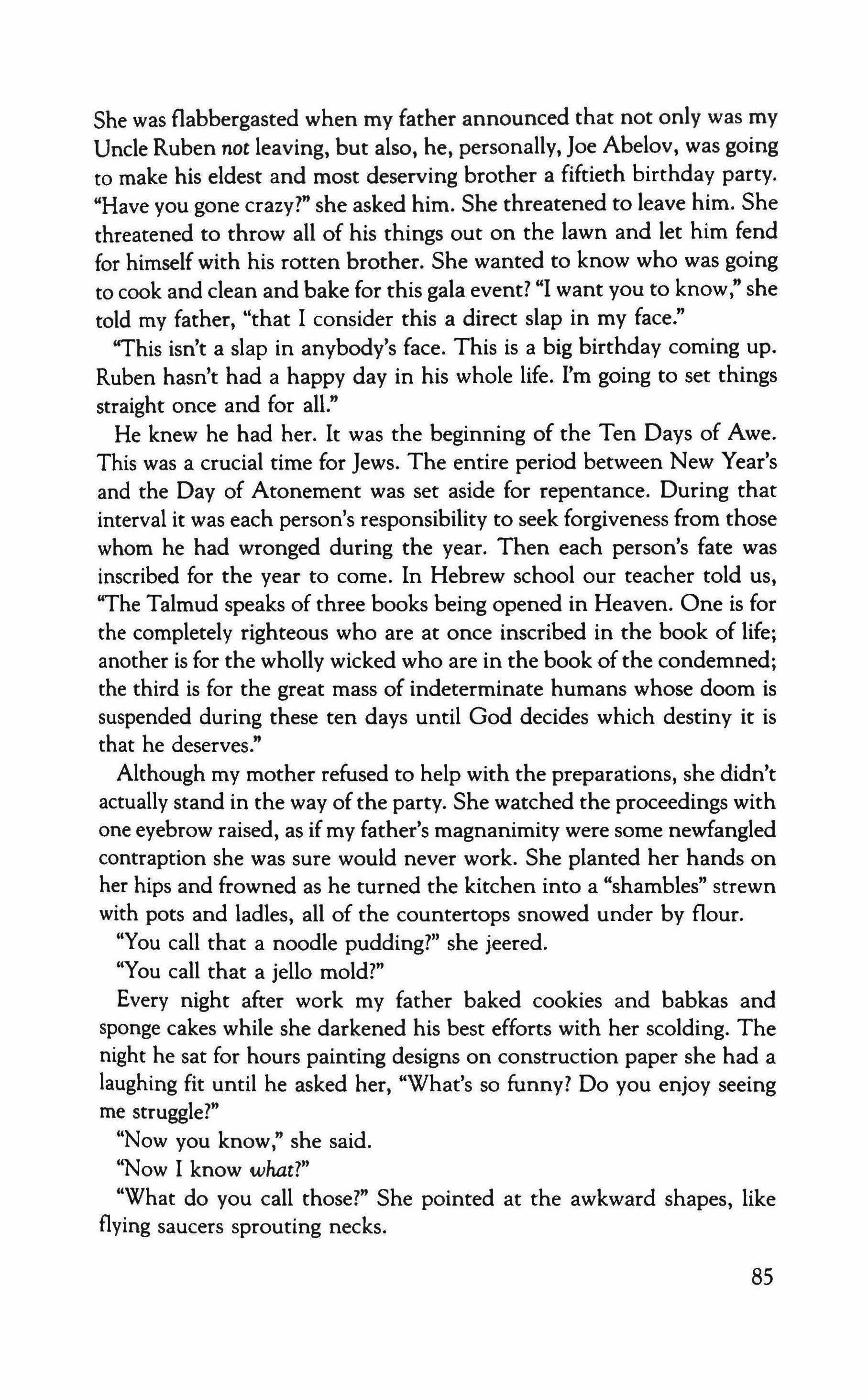
She was flabbergasted when my father announced that not only was my Uncle Ruben not leaving, but also, he, personally, Joe Abelov, was going to make his eldest and most deserving brother a fiftieth birthday party. "Have you gone crazy?" she asked him. She threatened to leave him. She threatened to throw all of his things out on the lawn and let him fend for himself with his rotten brother. She wanted to know who was going to cook and clean and bake for this gala event? "I want you to know," she told my father, "that I consider this a direct slap in my face."
"This isn't a slap in anvbodv's face. This is a big birthday coming up. Ruben hasn't had a happy day in his whole life. I'm going to set things straight once and for all."
He knew he had her. It was the beginning of the Ten Days of Awe. This was a crucial time for Jews. The entire period between New Year's and the Day of Atonement was set aside for repentance. During that interval it was each person's responsibility to seek forgiveness from those whom he had wronged during the year. Then each person's fate was inscribed for the year to come. In Hebrew school our teacher told us, "The Talmud speaks of three books being opened in Heaven. One is for the completely righteous who are at once inscribed in the book of life; another is for the wholly wicked who are in the book ofthe condemned; the third is for the great mass of indeterminate humans whose doom is suspended during these ten days until God decides which destiny it is that he deserves."
Although my mother refused to help with the preparations, she didn't actually stand in the way ofthe party. She watched the proceedings with one eyebrow raised, as if my father's magnanimity were some newfangled contraption she was sure would never work. She planted her hands on her hips and frowned as he turned the kitchen into a "shambles" strewn with pots and ladles, all of the countertops snowed under by flour.
"You call that a noodle pudding?" she jeered.
"You call that a jello mold?"
Every night after work my father baked cookies and babkas and sponge cakes while she darkened his best efforts with her scolding. The night he sat for hours painting designs on construction paper she had a laughing fit until he asked her, "What's so funny? Do you enjoy seeing me struggle?"
"Now you know," she said.
"Now I know what?"
"What do you call those?" She pointed at the awkward shapes, like flying saucers sprouting necks.
85

"They're Japanese lanterns, if you don't mind. They're for the garden. I'm going to string them between the clothespoles."
"That will be impressive," she said.
As for my Uncle Ruben, he seemed completely bewildered by this turn of events. "Is this really for me?" he kept asking. "Are you sure you want to do this? I feel funny about it. I don't think I deserve all this fuss. No one ever made a fuss like this before."
"I'm very sure," my father always replied, but Uncle Ruben didn't seem to believe him. "Look," he told my father, "I got along fine for all these years without a party; you really don't need to do this."
"Everyone deserves a little pleasure once in his life," my father said. He kept right on going, trimming the lawns and pruning the rose bushes and the hedges. He borrowed folding tables to be adorned with pink and yellow cloths which said, over and over, in fancy script: "HAPPY BIRTHDAY! HAPPY BIRTHDAY! HAPPY
BIRTHDAY!"
These he lined up in the garden, one long row to imply an endless banquet, endless reveling, then he hung up the lanterns and balloons and streamers, crepe paper around the tree trunks as if to show that the whole natural world had clamored to be included. "So much trouble for nothing," my mother said. "And who is going to attend this fabulous affair?"
"Who do you think?" he said. "They have to come this time." He had written their invitations on the backs of the New Year's cards he'd sent them: "Please come share with us this special occasion come celebrate!!"
To entertain everyone he hired a band, a guitarist and accordion player in training for weddings and Bar Mitzvahs who plodded through their opening number, "Hava Nagillah" ("Come let us rejoice") as if rejoicing were a close relative of Death.
This turned out to be the appropriate accompaniment. The brothers weren't exactly in a party mood. They came shuffling up our path like gloomy oxen staggering beneath the weight of their obligation. It was obvious they had come only to put in an appearance (for God's sake, not for Uncle Ruben's or my father's). They arrived late, en masse, as if they thought that in a crowd their ill will would not be recognized. They came empty-handed. Not a single one brought a gift, though on their birthdays my father always gave them watches or handmade tableseven, one year, a color TV set to Uncle Isidore to keep him warm on winter nights.
They huddled in a disgruntled clump near the punch bowl, whispering and muttering: "A party for a criminal-what next?" They said nothing about the display of food my father had spent all morning
86

arranging, moving the platters of cakes and salads back and forth as if the right configuration would insure a wonderful time. They didn't notice the bouquets nor the cornucopias of fruit nor the five-laver cake rising like a ski slope under a blanket of white frosting. The only thing they noticed were the lanterns. "What in the hell are those?" Uncle Sammy said.
"What in the hell are those?" the others joined in the refrain.
After three rounds of schnapps they grew impatient. "Well?" they inquired. "So where's the birthday boy? There's something the matter with him-he's missing his own party?"
"Of course there's something the matter with him," Uncle Isidore exclaimed. "Armed robbery. Manslaughter. We saw it on the six o'clock news, remember?"
"That was ten years ago," my father said. "It was an accident. A mix, up. Hannah. Go see what's keeping your uncle, would you, please?"
"Almost there," he called when I banged on his door. "Just give me five more minutes."
Oh great, 1 thought. 1 knew what five minutes could mean with Uncle Ruben. By then I'd decided that he was from a planet of denser gravity. The world he inhabited spun as slowly as a top at the end of its centrifugal rope.
"Five more minutes," 1 told my uncles sadly. "He's getting dressed. He's putting on the finishing touches." As proof 1 began to describe the new shirt and pair of slacks my father had bought him for the festivities.
But my uncles weren't interested in sportswear. "You said he was so anxious to see us," they accused my father. "We made a great concession coming over here. Where is he?"
"O.K. O.K." My father set down the platter of egg salad and tea matzohs he had been passing around with furious goodwill. "I'll go and get him."
"No! I will, Daddy. 1 promise!" 1 was afraid that if my father went upstairs my uncles would take it as an opportunity to sneak away. 1 ran back to Uncle Ruben's room. "Corne on!" 1 urged him. "They'll be leaving any second now. 1 know them. They're getting angry." 1 was starting to feel a little angry myself. After all, my father had slaved over this party. He'd given up sleep for it and endured my mother's corn' ments. This was his chance to prove to her that Uncle Ruben was worth all his efforts. "Please corne out," 1 begged. "There's cake downstairs. They're waiting for you." But Uncle Ruben didn't answer my knocks. There was a deep silence on the other side of the door as if he were
87

playing hide 'n' seek and wouldn't come out even though I'd found him. "Uncle Ruben?"
I had to shove on the door really hard to open it. There was a heavy thud, which turned out to be his suitcase, and then I saw him, as I'd seen him dozens of times before, lying on the bed, crumpled and lifeless as a forgotten towel at the beach.
For a moment I thought he actually might be dead, or maybe I just wished he were dead rather than see my father's disappointment when he realized he was the only one who cared about Uncle Ruben's party, that Uncle Ruben cared so little he'd rather sleep through the whole thing. "What on earth do you think you're doing?" I asked him. "It's your birthday! My father made you this great big party. How can you do this to him?" I went over to Uncle Ruben and tried to shake him into answering me, but he wouldn't budge. His shoulder felt like it was filled with sand, as did the rest of his body, shifting and heavy, as I pulled on his arms and legs to rouse him. I tapped him on the face and tugged at his foot and yelled directly into his ear, but none of my usual efforts to revive him made any difference. I had my head pressed to his chest to see if his heart was still beating when I heard my father coming up the stairs calling, in a voice that strained to be jovial: "Ruben! Ru - ben! Are you up there? Here we come!" I heard the sad stampede behind him just as he burst through the door: "If Mohammed won't come to the mountain "
He was carrying the cake all ablaze with candles that were snapping and hissing in the breeze ofhis fervor, and he was so busy herding the brothers he didn't have time to assess the situation. "It's O.K.!" he called back over his shoulder. "He's in here. Let's surprise him! Let's sing a good chorus of 'Happy Birthday.' It goes like this," he prompted them, turning towards the bedraggled group on the steps and squaring his shoulders bravely. "Happy birthday to you Happy birthday to you Happy birthday, dear ROOOO,ben Happy birthday to you " He sang it all the way through before they joined him in whispers fit for intensive care. "Come on," he berated them. "If you're going to sing then why don't you at least sing in the human register?" It wasn't until he'd cajoled them through it twice, wincing at each plodding chorus, that he finally lost his mornentum, turned around, and gave Uncle Ruben a closer look.
Uncle Ruben really did leave that time, first to the hospital to recover from his overdose, then to a facility for drug addicts, where my father paid his bills until Uncle Ruben got tired of being rehabilitated and ran away.
He didn't disappear completely, though. A trail of crimes, both great
88
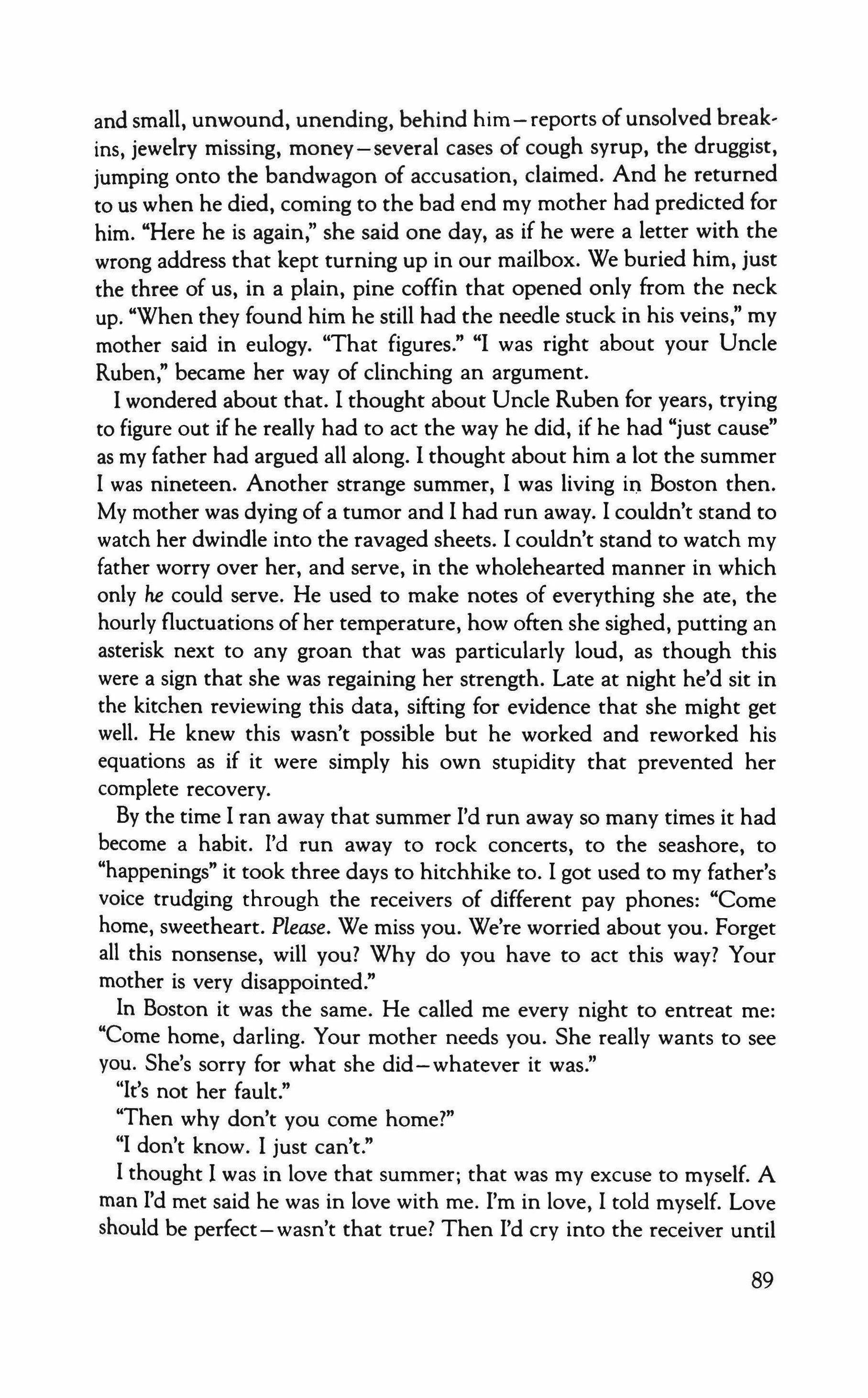
and small, unwound, unending, behind him-reports of unsolved breakins, jewelry missing, money-several cases of cough syrup, the druggist, jumping onto the bandwagon of accusation, claimed. And he returned to us when he died, coming to the bad end my mother had predicted for him. "Here he is again," she said one day, as if he were a letter with the wrong address that kept turning up in our mailbox. We buried him, just the three of us, in a plain, pine coffin that opened only from the neck up. "When they found him he still had the needle stuck in his veins," my mother said in eulogy. "That figures." "I was right about your Uncle Ruben," became her way of clinching an argument.
1 wondered about that. 1 thought about Uncle Ruben for years, trying to figure out if he really had to act the way he did, if he had "just cause" as my father had argued all along. 1 thought about him a lot the summer I was nineteen. Another strange summer, I was living in Boston then. My mother was dying of a tumor and I had run away. I couldn't stand to watch her dwindle into the ravaged sheets. I couldn't stand to watch my father worry over her, and serve, in the wholehearted manner in which only he could serve. He used to make notes of everything she ate, the hourly fluctuations of her temperature, how often she sighed, putting an asterisk next to any groan that was particularly loud, as though this were a sign that she was regaining her strength. Late at night he'd sit in the kitchen reviewing this data, sifting for evidence that she might get well. He knew this wasn't possible but he worked and reworked his equations as if it were simply his own stupidity that prevented her complete recovery.
By the time I ran away that summer I'd run away so many times it had become a habit. I'd run away to rock concerts, to the seashore, to "happenings" it took three days to hitchhike to. I got used to my father's voice trudging through the receivers of different pay phones: "Come home, sweetheart. Please. We miss you. We're worried about you. Forget all this nonsense, will you? Why do you have to act this way? Your mother is very disappointed."
In Boston it was the same. He called me every night to entreat me: "Come home, darling. Your mother needs you. She really wants to see you. She's sorry for what she did-whatever it was."
"It's not her fault."
"Then why don't you come home?"
"I don't know. I just can't."
I thought I was in love that summer: that was my excuse to myself. A man I'd met said he was in love with me. I'm in love, I told myself. Love should be perfect-wasn't that true? Then I'd cry into the receiver until
89
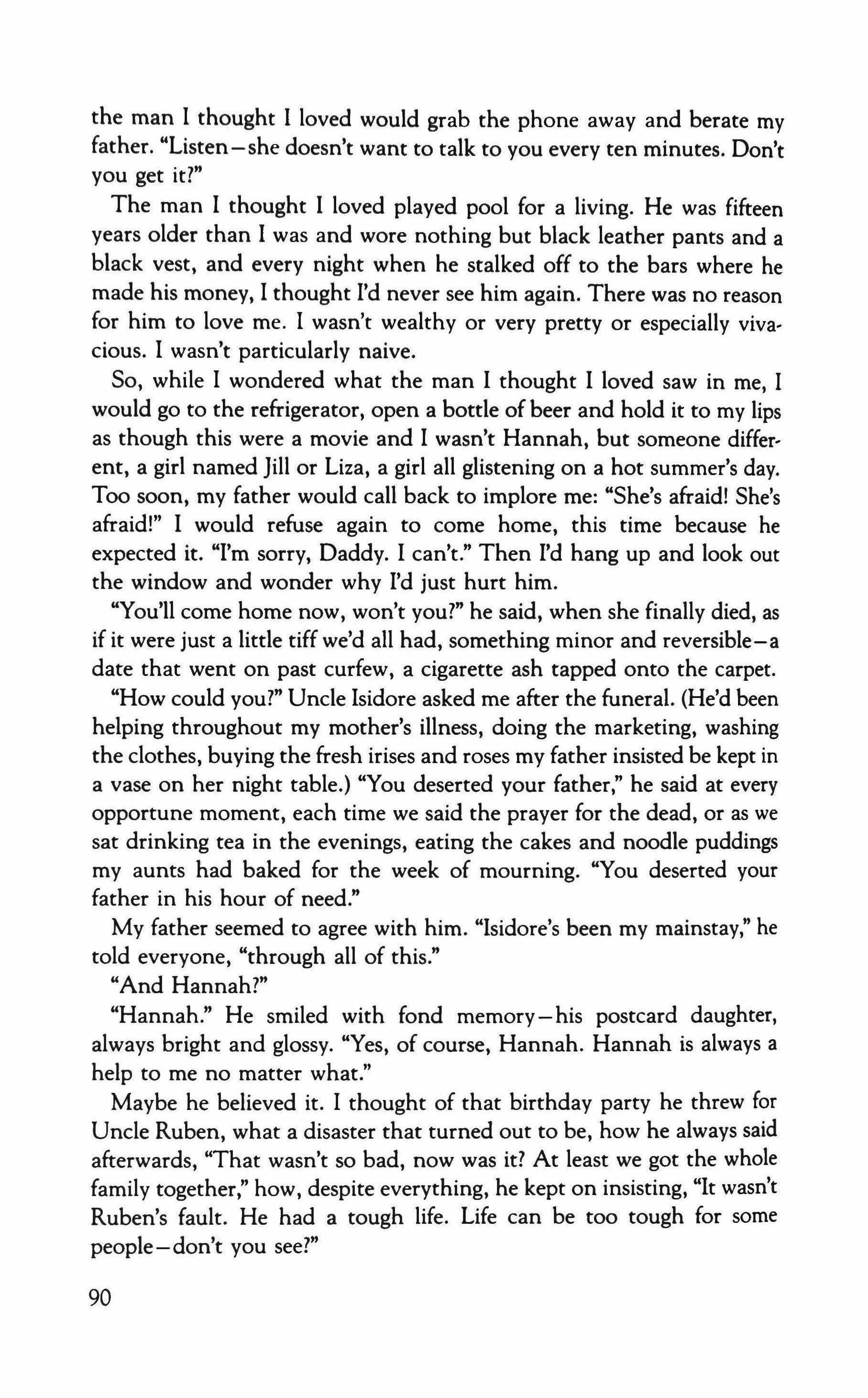
the man I thought I loved would grab the phone away and berate my father. "Listen-she doesn't want to talk to you every ten minutes. Don't you get it?"
The man I thought I loved played pool for a living. He was fifteen years older than I was and wore nothing but black leather pants and a black vest, and every night when he stalked off to the bars where he made his money, I thought I'd never see him again. There was no reason for him to love me. I wasn't wealthy or very pretty or especially vivacious. I wasn't particularly naive.
So, while I wondered what the man I thought I loved saw in me, I would go to the refrigerator, open a bottle of beer and hold it to my lips as though this were a movie and I wasn't Hannah, but someone different, a girl named Jill or Liza, a girl all glistening on a hot summer's day. Too soon, my father would call back to implore me: "She's afraid! She's afraid!" I would refuse again to corne horne, this time because he expected it. "I'm sorry, Daddy. I can't." Then I'd hang up and look out the window and wonder why I'd just hurt him.
"You'll corne horne now, won't you?" he said, when she finally died, as if it were just a little tiff we'd all had, something minor and reversible-a date that went on past curfew, a cigarette ash tapped onto the carpet.
"How could you?" Uncle Isidore asked me after the funeral. (He'd been helping throughout my mother's illness, doing the marketing, washing the clothes, buying the fresh irises and roses my father insisted be kept in a vase on her night rable.) "You deserted your father," he said at every opportune moment, each time we said the prayer for the dead, or as we sat drinking tea in the evenings, eating the cakes and noodle puddings my aunts had baked for the week of mourning. "You deserted your father in his hour of need."
My father seemed to agree with him. "Isidore's been my mainstay," he told everyone, "through all of this."
"And Hannah?"
"Hannah." He smiled with fond memory - his postcard daughter, always bright and glossy. "Yes, of course, Hannah. Hannah is always a help to me no matter what."
Maybe he believed it. I thought of that birthday party he threw for Uncle Ruben, what a disaster that turned out to be, how he always said afterwards, "That wasn't so bad, now was it? At least we got the whole family together," how, despite everything, he kept on insisting, "It wasn't Ruben's fault. He had a tough life. Life can be too tough for some people-don't you see?"
90
Notes on Veritarian Bookfighting
Steven Brint
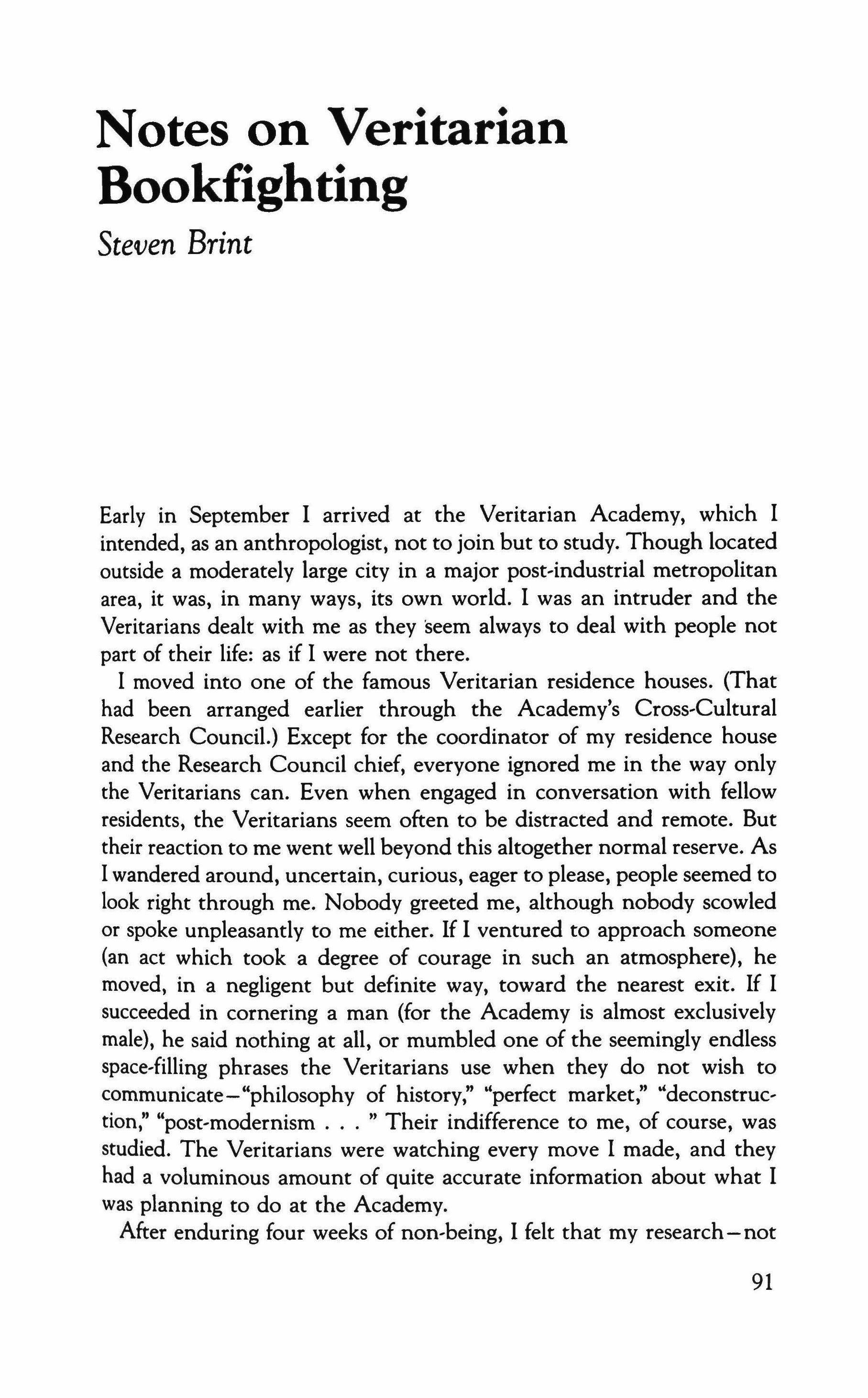
Early in September I arrived at the Veritarian Academy, which I intended, as an anthropologist, not to join but to study. Though located outside a moderately large city in a major post-industrial metropolitan area, it was, in many ways, its own world. I was an intruder and the Veritarians dealt with me as they seem always to deal with people not part of their life: as if I were not there.
I moved into one of the famous Veritarian residence houses. (That had been arranged earlier through the Academy's Cross-Cultural Research Council.) Except for the coordinator of my residence house and the Research Council chief, everyone ignored me in the way only the Veritarians can. Even when engaged in conversation with fellow residents, the Veritarians seem often to be distracted and remote. But their reaction to me went well beyond this altogether normal reserve. As I wandered around, uncertain, curious, eager to please, people seemed to look right through me. Nobody greeted me, although nobody scowled or spoke unpleasantly to me either. If I ventured to approach someone (an act which took a degree of courage in such an atmosphere), he moved, in a negligent but definite way, toward the nearest exit. If I succeeded in cornering a man (for the Academy is almost exclusively male), he said nothing at all, or mumbled one of the seemingly endless space-filling phrases the Veritarians use when they do not wish to communicate-"philosophy of history," "perfect market," "deconstruction," "post'modernism Their indifference to me, of course, was studied. The Veritarians were watching every move I made, and they had a voluminous amount of quite accurate information about what I was planning to do at the Academy.
After enduring four weeks of non-being, I felt that my research-not
91
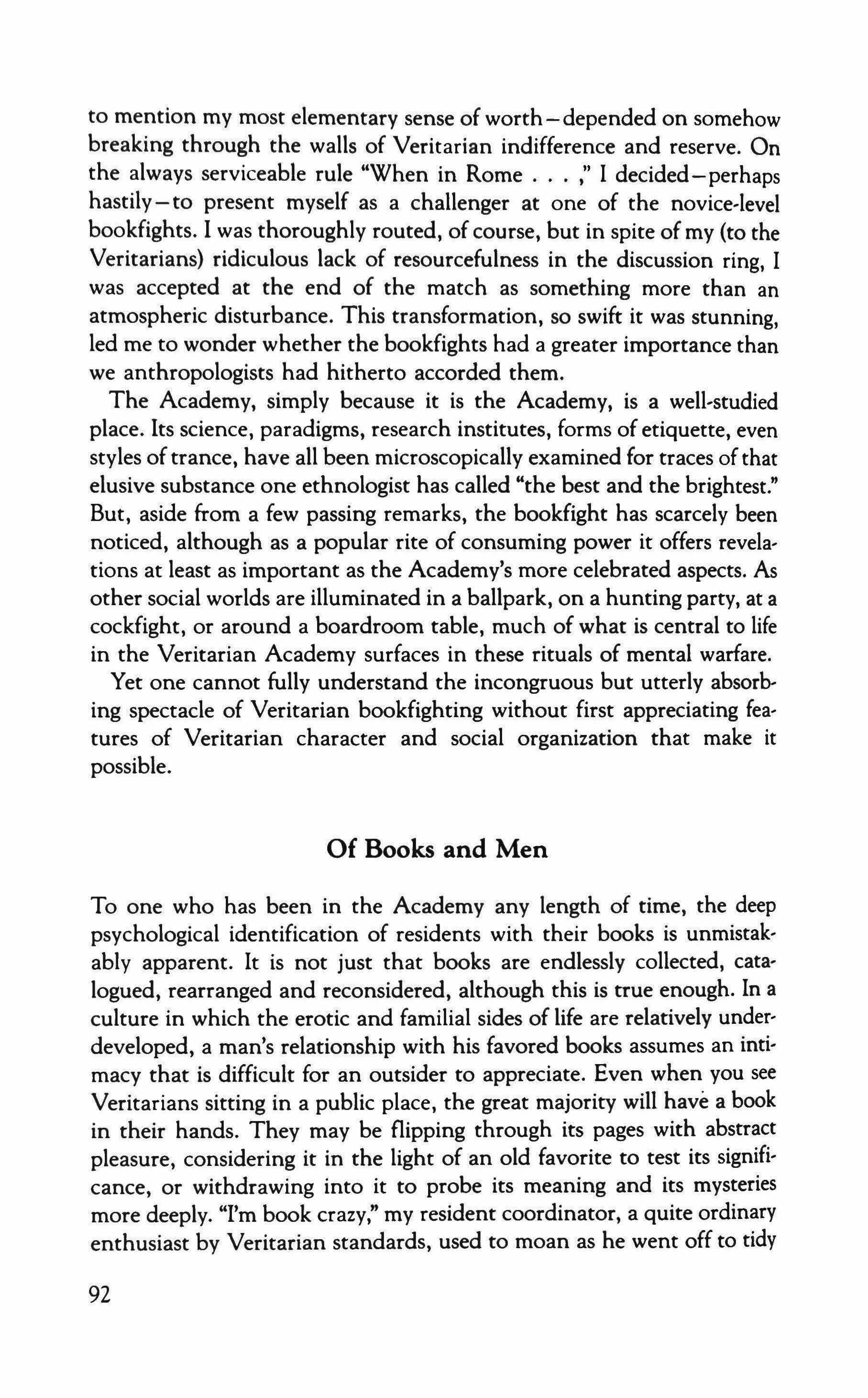
to mention my most elementary sense of worth - depended on somehow breaking through the walls of Veritarian indifference and reserve. On the always serviceable rule "When in Rome ," I decided-perhaps hastily - to present myself as a challenger at one of the novice-level bookfights. I was thoroughly routed, of course, but in spite of my (to the Veritarians) ridiculous lack of resourcefulness in the discussion ring, I was accepted at the end of the match as something more than an atmospheric disturbance. This transformation, so swift it was stunning, led me to wonder whether the bookfights had a greater importance than we anthropologists had hitherto accorded them.
The Academy, simply because it is the Academy, is a well-studied place. Its science, paradigms, research institutes, forms of etiquette, even styles of trance, have all been microscopically examined for traces ofthat elusive substance one ethnologist has called "the best and the brightest." But, aside from a few passing remarks, the bookfight has scarcely been noticed, although as a popular rite of consuming power it offers revelations at least as important as the Academy's more celebrated aspects. As other social worlds are illuminated in a ballpark, on a hunting party, at a cockfight, or around a boardroom table, much of what is central to life in the Veritarian Academy surfaces in these rituals of mental warfare.
Yet one cannot fully understand the incongruous but utterly absorbing spectacle of Veritarian bookfighting without first appreciating features of Veritarian character and social organization that make it possible.
Of Books and Men
To one who has been in the Academy any length of time, the deep psychological identification of residents with their books is unmistakably apparent. It is not just that books are endlessly collected, catalogued, rearranged and reconsidered, although this is true enough. In a culture in which the erotic and familial sides of life are relatively under, developed, a man's relationship with his favored books assumes an inti, macy that is difficult for an outsider to appreciate. Even when you see Veritarians sitting in a public place, the great majority will have a book in their hands. They may be flipping through its pages with abstract pleasure, considering it in the light of an old favorite to test its significance, or withdrawing into it to probe its meaning and its mysteries more deeply. "I'm book crazy," my resident coordinator, a quite ordinary enthusiast by Veritarian standards, used to moan as he went off to tidy
92

up his library, buy a new volume or treat himself to a rereading of a favored work. "We're all book crazy." Indeed, the term "libromaniac," which is used affectionately to describe the most dedicated, would be a fair characterization of all Veritarians.
Even the language of everyday moralism is shot through with imagery drawn from books. A pompous man whose behavior is inconsistent with his standing is compared to a book with blank pages but impressive binding. A dull man is compared to a book that is little more than a rehashing of old arguments. An overeager student is compared to a book marred by purple prose or slipshod research. A spineless man is not a coward, but one whose thoughts are likely to be pushed by any intellectual breeze. All political contests, legal judgments, personal quarrels and international entanglements are discussed in terms of styles or qualities of celebrated bookfights. Even the Academy itself is often described as shaped like a book spread open, bringing forward the light of reason to a land otherwise enveloped in darkness.
Lords of Knowledge
There are two classes in the Academy: the younger "aspirants" and the older "bookmasters," who are their teachers. Third-rank bookrnasters, the knowledge elite, are often referred to as "the Colossi." These senior bookmasters take satisfaction in the term, though there is much evidence that it is sometimes used ironically (complete with knowing smile) by lower-ranking bookmasters and some of the cockier aspirants.
The Colossi straddle the pinnacles of a social structure built upon a preoccupation with books. The images we retain from the medieval period-images of meek scholars hidden behind cloisters, quietly de, voted to their manuscripts - do not very adequately depict the world of the Veritarian Academy, however. Indeed, the Academy is dominated by men who are far more similar in character structure to the great lords ofthat middle period than to its retiring scribes. The senior bookmasters have all the personal earmarks of power: they are aloof, willful, arrogant, occasionally cruel and, above all, easily provoked by challenges (real or imagined) to their authority or honor. Some have achieved an immortality in the folklore of bookfighting as honor-mad players bent on the utter symbolic destruction of their opponents. But all share in the legacy of these legendary warriors.
93
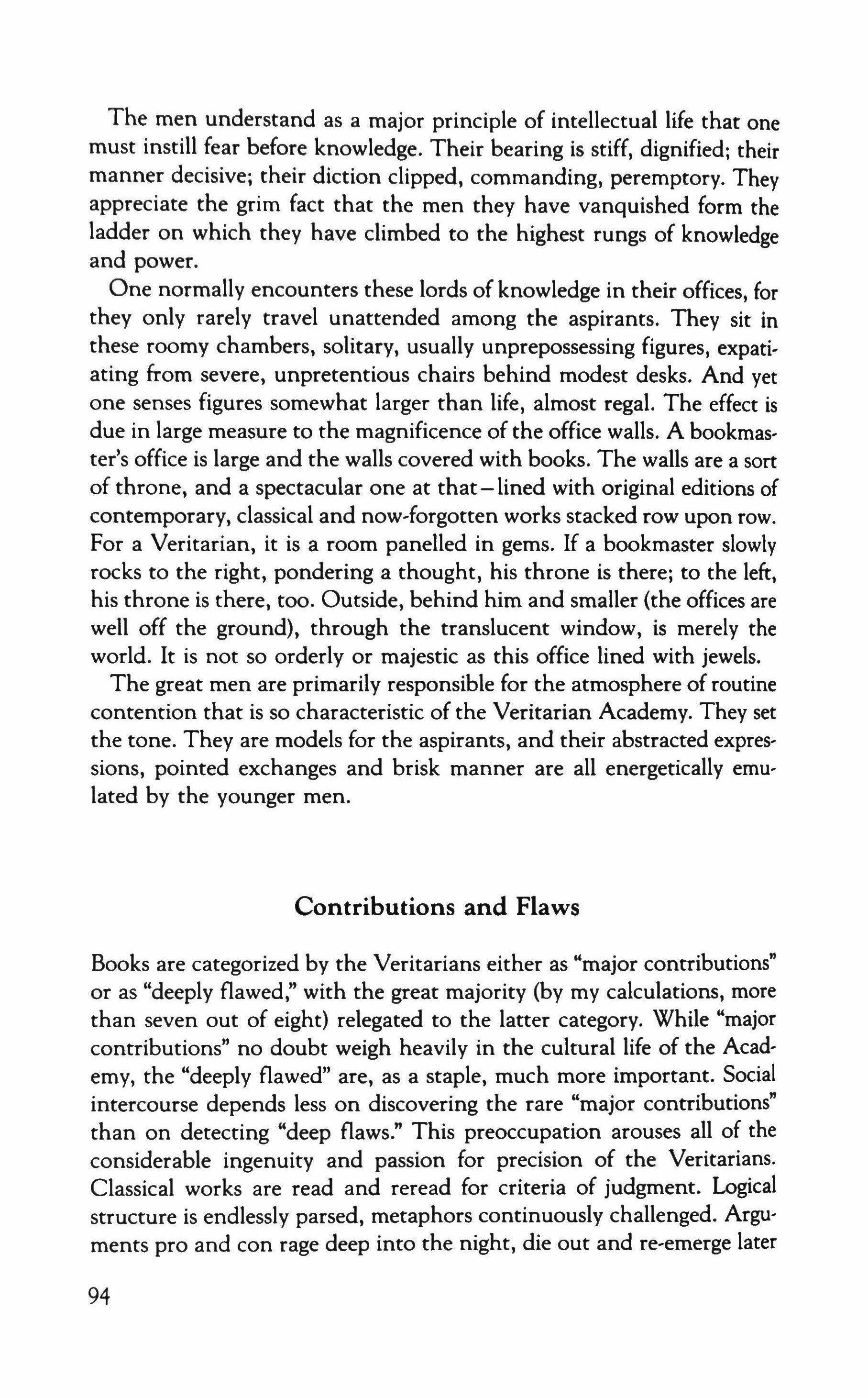
The men understand as a major principle of intellectual life that one must instill fear before knowledge. Their bearing is stiff, dignified; their manner decisive; their diction clipped, commanding, peremptory. They appreciate the grim fact that the men they have vanquished form the ladder on which they have climbed to the highest rungs of knowledge and power.
One normally encounters these lords of knowledge in their offices, for they only rarely travel unattended among the aspirants. They sit in these roomy chambers, solitary, usually unprepossessing figures, expatiating from severe, unpretentious chairs behind modest desks. And yet one senses figures somewhat larger than life, almost regal. The effect is due in large measure to the magnificence of the office walls. A bookrnaster's office is large and the walls covered with books. The walls are a sort of throne, and a spectacular one at that-lined with original editions of contemporary, classical and now-forgotten works stacked row upon row. For a Veritarian, it is a room panelled in gems. If a bookmaster slowly rocks to the right, pondering a thought, his throne is there; to the left, his throne is there, too. Outside, behind him and smaller (the offices are well off the ground), through the translucent window, is merely the world. It is not so orderly or majestic as this office lined with jewels.
The great men are primarily responsible for the atmosphere of routine contention that is so characteristic of the Veritarian Academy. They set the tone. They are models for the aspirants, and their abstracted expressions, pointed exchanges and brisk manner are all energetically emulated by the younger men.
Contributions and Flaws
Books are categorized by the Veritarians either as "major contributions" or as "deeply flawed," with the great majority (by my calculations, more than seven out of eight) relegated to the latter category. While "major contributions" no doubt weigh heavily in the cultural life of the Academy, the "deeply flawed" are, as a staple, much more important. Social intercourse depends less on discovering the rare "major contributions" than on detecting "deep flaws." This preoccupation arouses all of the considerable ingenuity and passion for precision of the Veritarians. Classical works are read and reread for criteria of judgment. Logical structure is endlessly parsed, metaphors continuously challenged. Arguments pro and con rage deep into the night, die out and re-emerge later
94
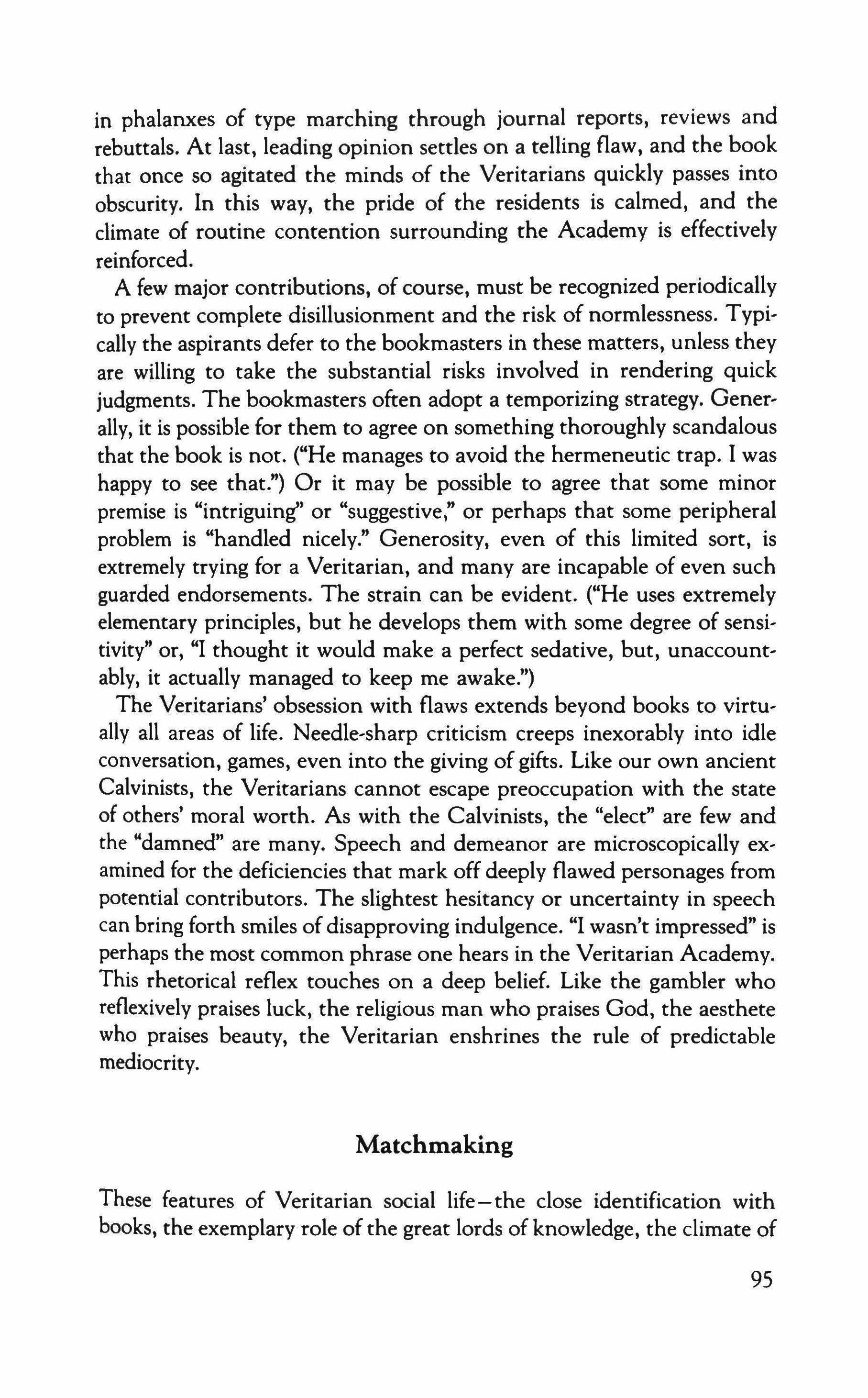
in phalanxes of type marching through journal reports, reviews and rebuttals. At last, leading opinion settles on a telling flaw, and the book that once so agitated the minds of the Veritarians quickly passes into obscurity. In this way, the pride of the residents is calmed, and the climate of routine contention surrounding the Academy is effectively reinforced.
A few major contributions, of course, must be recognized periodically to prevent complete disillusionment and the risk of normlessness. Tvpicallv the aspirants defer to the bookmasters in these matters, unless they are willing to take the substantial risks involved in rendering quick judgments. The bookmasters often adopt a temporizing strategy. Generally, it is possible for them to agree on something thoroughly scandalous that the book is not. ("He manages to avoid the hermeneutic trap. I was happy to see that.") Or it may be possible to agree that some minor premise is "intriguing" or "suggestive," or perhaps that some peripheral problem is "handled nicely." Generosity, even of this limited sort, is extremely trying for a Veritarian, and many are incapable of even such guarded endorsements. The strain can be evident. ("He uses extremely elementary principles, but he develops them with some degree of sensitivity" or, "I thought it would make a perfect sedative, but, unaccountably, it actually managed to keep me awake.")
The Veritarians' obsession with flaws extends beyond books to virtually all areas of life. Needle-sharp criticism creeps inexorably into idle conversation, games, even into the giving of gifts. Like our own ancient Calvinists, the Veritarians cannot escape preoccupation with the state of others' moral worth. As with the Calvinists, the "elect" are few and the "damned" are many. Speech and demeanor are microscopically examined for the deficiencies that mark off deeply flawed personages from potential contributors. The slightest hesitancy or uncertainty in speech can bring forth smiles of disapproving indulgence. "I wasn't impressed" is perhaps the most common phrase one hears in the Veritarian Academy. This rhetorical reflex touches on a deep belief. Like the gambler who reflexively praises luck, the religious man who praises God, the aesthete who praises beauty, the Veritarian enshrines the rule of predictable mediocrity.
Matchmaking
These features of Veritarian social life-the close identification with books, the exemplary role of the great lords of knowledge, the climate of
9S

routine contention, the preoccupation with "contributions" and "flaws" - help to bring into focus that most distinctive of Veritarian institutions, the bookfight.
Bookfights (seminara; colloquia) are held approximately once a month in discussion rings about 2oo-feet square. Typically, they begin in the afternoon and run three to four hours until sunset. Sometimes as many as five separate matches (tetatet), each of two rounds, comprise a program.
There is always a large crowd for the matches, and they always begin in the same ghostly silence. A defender will in time emerge from the silence and slip furtively into the discussion ring with his book. He will write the title of the book on the boards on both sides of the room and wait until his opponent is selected. The selection process, which takes ten to fifteen minutes, is conducted in a very subdued manner. Those not immediately involved give it at best a disguised, sidelong attention; those who are considering the match move to the judges' corner in an odd distracted fashion, as if they were being pulled slowly by a magnetic force independent of their own wills. In most cases, several books that take divergent positions on the subject at hand are proposed as challengers. The proposers step forward and present their books for inspection by the judges. In the interest ofpromoting balance, the judges determine matches as much on the basis of the rank, skills and reputation of the potential challengers as on the apposite character of the books proposed for battle. (This complicated procedure has been described in detail by R. Meerkat in "Tournament Structure of the Veritarian Seminara," Armed For. Soc. 30,66-101.) The match made, both men withdraw for five minutes to confer with a close associate (wittuner). This is a critical five minutes, especially for the defender, who has only recently discovered the identity of his opponent. Men skilled in preparing bookfighters properly in such a brief period are in great demand, and are rewarded handsomely.
While the challengers confer with their advisers, the audience bursts into a pandemonium of wager-making. To an outsider, this eruption is startling, no doubt because of its sharp contrast to the virtually complete silence that has until that moment prevailed. Those seeking bets shout out the odds they wish to entertain on the favorite, while those seeking a wager on the underdog retort with the name of their champion, if they find the odds acceptable. Odds quickly climb until they meet a chorus of responding names and the wagers can be made. As a rule, highly uneven matches at 2-1 and 3-2 elicit comparatively little interest, while balanced matches at 10-9 and 9-8 are followed with keen attention.
96
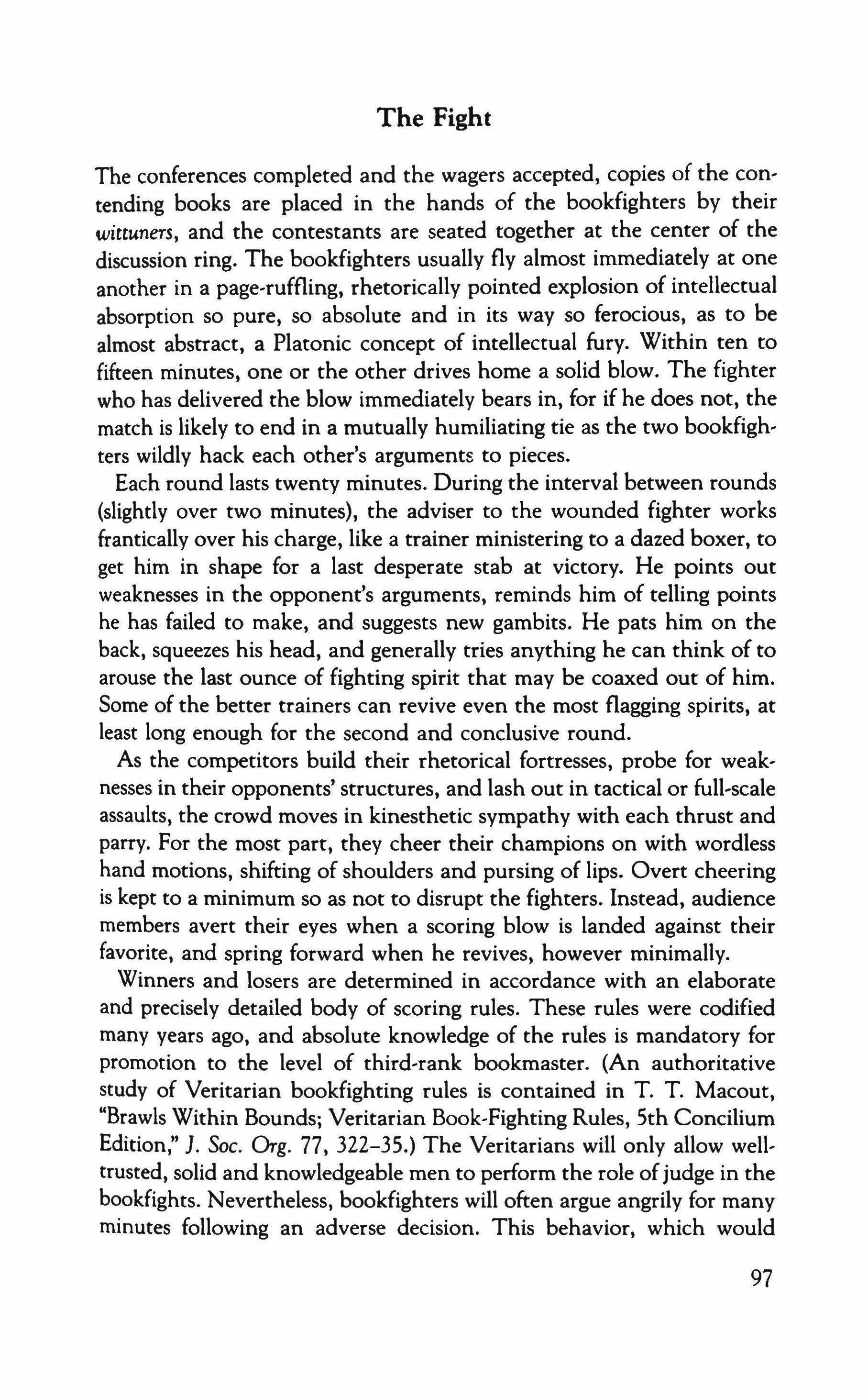
The Fight
The conferences completed and the wagers accepted, copies of the con' tending books are placed in the hands of the bookfighters by their wittuners, and the contestants are seated together at the center of the discussion ring. The bookfighters usually fly almost immediately at one another in a page,ruffling, rhetorically pointed explosion of intellectual absorption so pure, so absolute and in its way so ferocious, as to be almost abstract, a Platonic concept of intellectual fury. Within ten to fifteen minutes, one or the other drives horne a solid blow. The fighter who has delivered the blow immediately bears in, for if he does not, the match is likely to end in a mutually humiliating tie as the two bookfighters wildly hack each other's arguments to pieces.
Each round lasts twenty minutes. During the interval between rounds (slightly over two minutes), the adviser to the wounded fighter works frantically over his charge, like a trainer ministering to a dazed boxer, to get him in shape for a last desperate stab at victory. He points out weaknesses in the opponent's arguments, reminds him of telling points he has failed to make, and suggests new gambits. He pats him on the back, squeezes his head, and generally tries anything he can think of to arouse the last ounce of fighting spirit that may be coaxed out of him. Some of the better trainers can revive even the most flagging spirits, at least long enough for the second and conclusive round.
As the competitors build their rhetorical fortresses, probe for weak, nesses in their opponents' structures, and lash out in tactical or full-scale assaults, the crowd moves in kinesthetic sympathy with each thrust and parry. For the most part, they cheer their champions on with wordless hand motions, shifting of shoulders and pursing of lips. Overt cheering is kept to a minimum so as not to disrupt the fighters. Instead, audience members avert their eyes when a scoring blow is landed against their favorite, and spring forward when he revives, however minimally.
Winners and losers are determined in accordance with an elaborate and precisely detailed body of scoring rules. These rules were codified many years ago, and absolute knowledge of the rules is mandatory for promotion to the level of third-rank bookmaster. (An authoritative study of Veritarian bookfighting rules is contained in T. T. Macout, "Brawls Within Bounds; Veritarian Book-Fighting Rules, 5th Concilium Edition," J. Soc. Org. 77, 322-35.) The Veritarians will only allow well, trusted, solid and knowledgeable men to perform the role ofjudge in the bookfights. Nevertheless, bookfighters will often argue angrily for many minutes following an adverse decision. This behavior, which would
97

appear petulant and undignified to many outsiders, is regarded by the Veritarians as commendably linked to the spirit of tenacity and ferocity expected of a serious bookfighter.
The Techniques of Mental Warfare
Like all demanding skills, skills in bookfighting are acquired during a period of long apprenticeship. These skills consist mainly of techniques developed and tested in the daily rituals of routine contention and through exacting study of the most accomplished bookfighters. Just as small children in our society endlessly dissect the batting stances of their favorite ballplayers, Veritarian aspirants analyze and reanalyze the techniques of mental warfare used by the Colossi.
A systematic collection of Veritarian bookfighting techniques would yield a rich ethnographic resource. As in other forms of warfare, the basic strategic principles revolve around gaining leverage through a superior show of force or through isolating exposed enemy positions. Often, the crushing intellectual offensive is mounted by means of sheer quantities of argumentation ("There are nine points to make about that proposition "). In other cases, it may be launched through the mustering of impressive reinforcements ("The long footnote on page 39 of Peacock's regrettably forgotten critique of the early positivists is crucial for understanding the difficulties in your view of historical causation ."), or the ability to draw on unsuspected resources ("People rarely read Hancock nowadays, but his comments on the weaknesses of patrimonial administration remain authoritative "). The isolation of exposed positions is typically based on relentless attacks on the quality of an opponent's evidence ("I have reviewed seven studies in the last month that suggest a negative rather than a positive correlation, but, of course, they controlled for the relevant priors ."), or efforts to work one's opponent into a clearly reprehensible position ("Yes, Norman was a significant figure, but your position here seems dangerously close to the worse sort of pettifogging Normanism ").
If the battles are ultimately decided by these ongoing assaults and strategically designed pincer movements, a great variety of tactical maneuvering also comes into play, especially for defensive purposes. Analogies in which the second term is the more obscure are especially popular ("The probable solution to the bureaucratization of the legislative branch will be something like the results of the Second Papal Bull of 1058 ."). Combatants also frequently find it useful to establish a
98
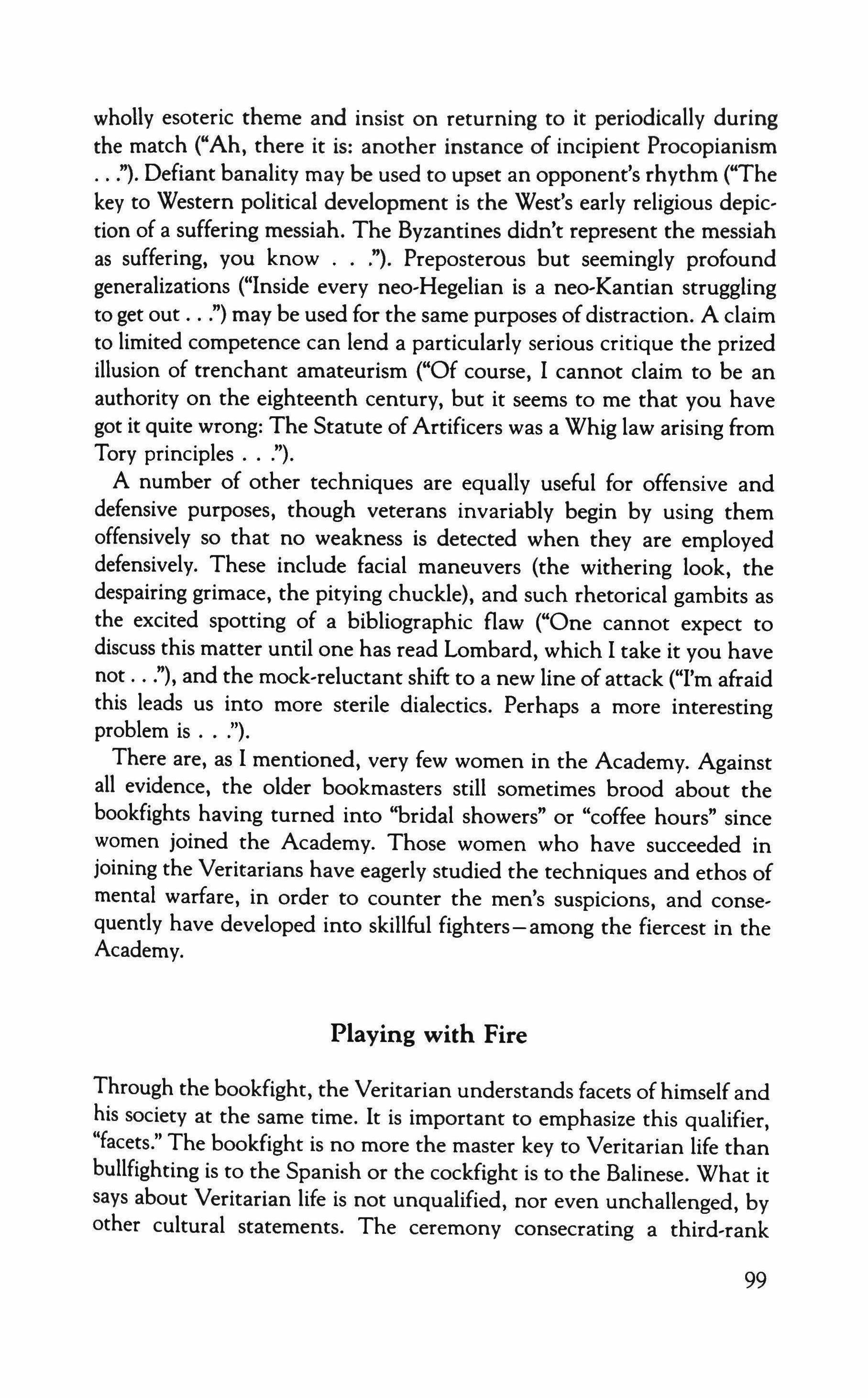
wholly esoteric theme and insist on returning to it periodically during the match ("Ah, there it is: another instance of incipient Procopianism "). Defiant banality may be used to upset an opponent's rhythm ("The key to Western political development is the West's early religious depiction of a suffering messiah. The Byzantines didn't represent the messiah as suffering, you know ."). Preposterous but seemingly profound generalizations ("Inside every nee-Hegelian is a neo-Kantian struggling to get out ") may be used for the same purposes ofdistraction. A claim to limited competence can lend a particularly serious critique the prized illusion of trenchant amateurism ("Of course, I cannot claim to be an authority on the eighteenth century, but it seems to me that you have got it quite wrong: The Statute of Artificers was a Whig law arising from Tory principles ").
A number of other techniques are equally useful for offensive and defensive purposes, though veterans invariably begin by using them offensively so that no weakness is detected when they are employed defensively. These include facial maneuvers (the withering look, the despairing grimace, the pitying chuckle), and such rhetorical gambits as the excited spotting of a bibliographic flaw ("One cannot expect to discuss this matter until one has read Lombard, which I take it you have not "), and the mock-reluctant shift to a new line of attack ("I'm afraid this leads us into more sterile dialectics. Perhaps a more interesting problem is ").
There are, as I mentioned, very few women in the Academy. Against all evidence, the older bookmasters still sometimes brood about the bookfights having turned into "bridal showers" or "coffee hours" since women joined the Academy. Those women who have succeeded in joining the Veritarians have eagerly studied the techniques and ethos of mental warfare, in order to counter the men's suspicions, and consequently have developed into skillful fighters-among the fiercest in the Academy.
Playing with Fire
Through the bookfight, the Veritarian understands facets of himself and his society at the same time. It is important to emphasize this qualifier, "facets." The bookfight is no more the master key to Veritarian life than bullfighting is to the Spanish or the cockfight is to the Balinese. What it says about Veritarian life is not unqualified, nor even unchallenged, by other cultural statements. The ceremony consecrating a third-rank
99
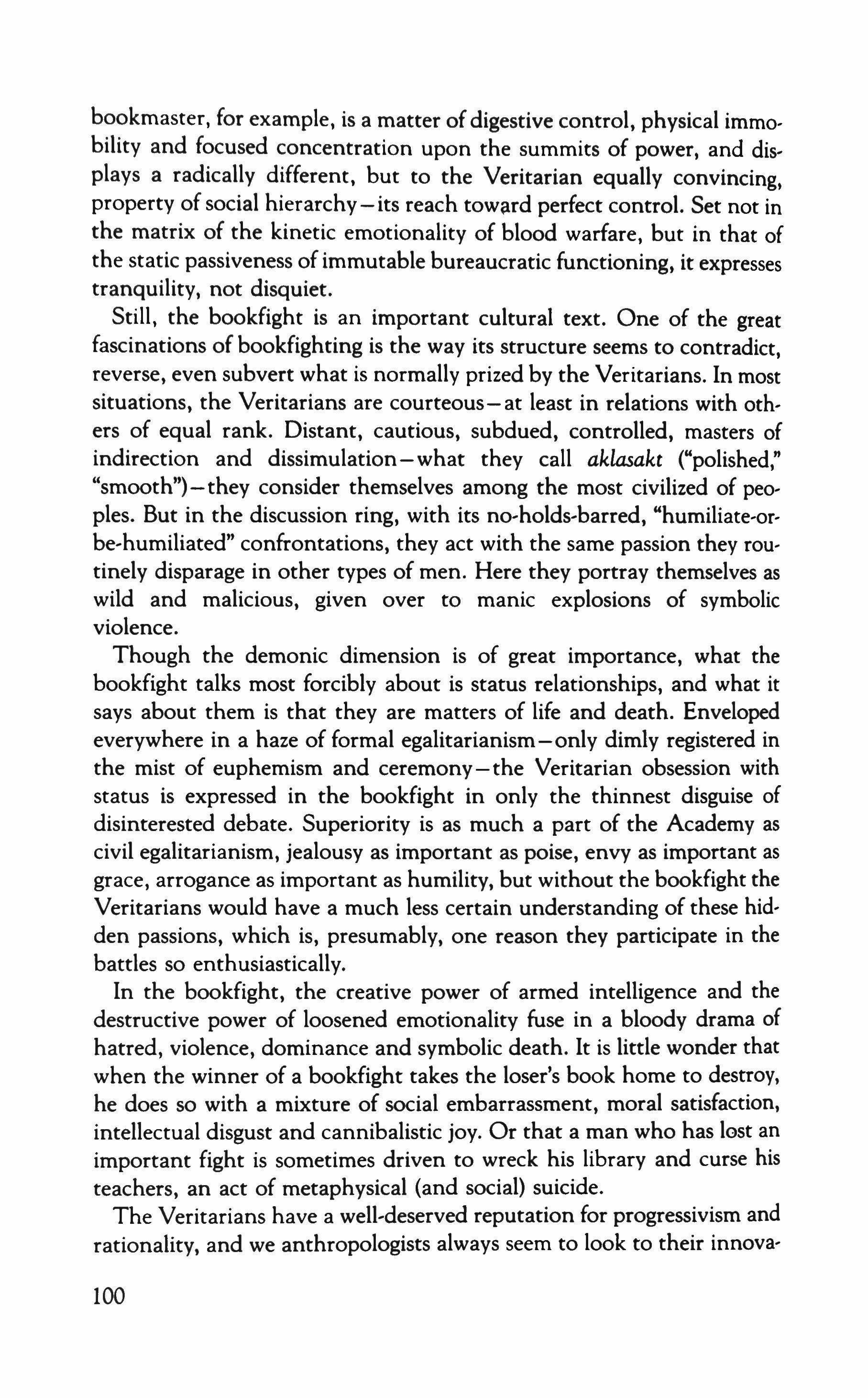
bookmaster, for example, is a matter ofdigestive control, physical immobility and focused concentration upon the summits of power, and displays a radically different, but to the Veritarian equally convincing, property of social hierarchy - its reach toward perfect control. Set not in the matrix of the kinetic emotionality of blood warfare, but in that of the static passiveness of immutable bureaucratic functioning, it expresses tranquility, not disquiet.
Still, the bookfighr is an important cultural text. One of the great fascinations of bookfighting is the way its structure seems to contradict, reverse, even subvert what is normally prized by the Veritarians. In most situations, the Veritarians are courteous- at least in relations with others of equal rank. Distant, cautious, subdued, controlled, masters of indirection and dissimulation - what they call aklasakt ("polished," "smooth")-they consider themselves among the most civilized of peoples. But in the discussion ring, with its no-holds-barred, "humiliate-orbe-humiliated" confrontations, they act with the same passion they routinely disparage in other types of men. Here they portray themselves as wild and malicious, given over to manic explosions of symbolic violence.
Though the demonic dimension is of great importance, what the bookfight talks most forcibly about is status relationships, and what it says about them is that they are matters of life and death. Enveloped everywhere in a haze of formal egalitarianism-only dimly registered in the mist of euphemism and ceremony-the Veritarian obsession with status is expressed in the bookfight in only the thinnest disguise of disinterested debate. Superiority is as much a part of the Academy as civil egalitarianism, jealousy as important as poise, envy as important as grace, arrogance as important as humility, but without the bookfight the Veritarians would have a much less certain understanding of these hidden passions, which is, presumably, one reason they participate in the battles so enthusiastically.
In the bookfight, the creative power of armed intelligence and the destructive power of loosened emotionality fuse in a bloody drama of hatred, violence, dominance and symbolic death. It is little wonder that when the winner of a bookfight takes the loser's book home to destroy, he does so with a mixture of social embarrassment, moral satisfaction, intellectual disgust and cannibalistic joy. Or that a man who has lost an important fight is sometimes driven to wreck his library and curse his teachers, an act of metaphysical (and social) suicide.
The Veritarians have a well-deserved reputation for progressivism and rationality, and we anthropologists always seem to look to their innova-
100
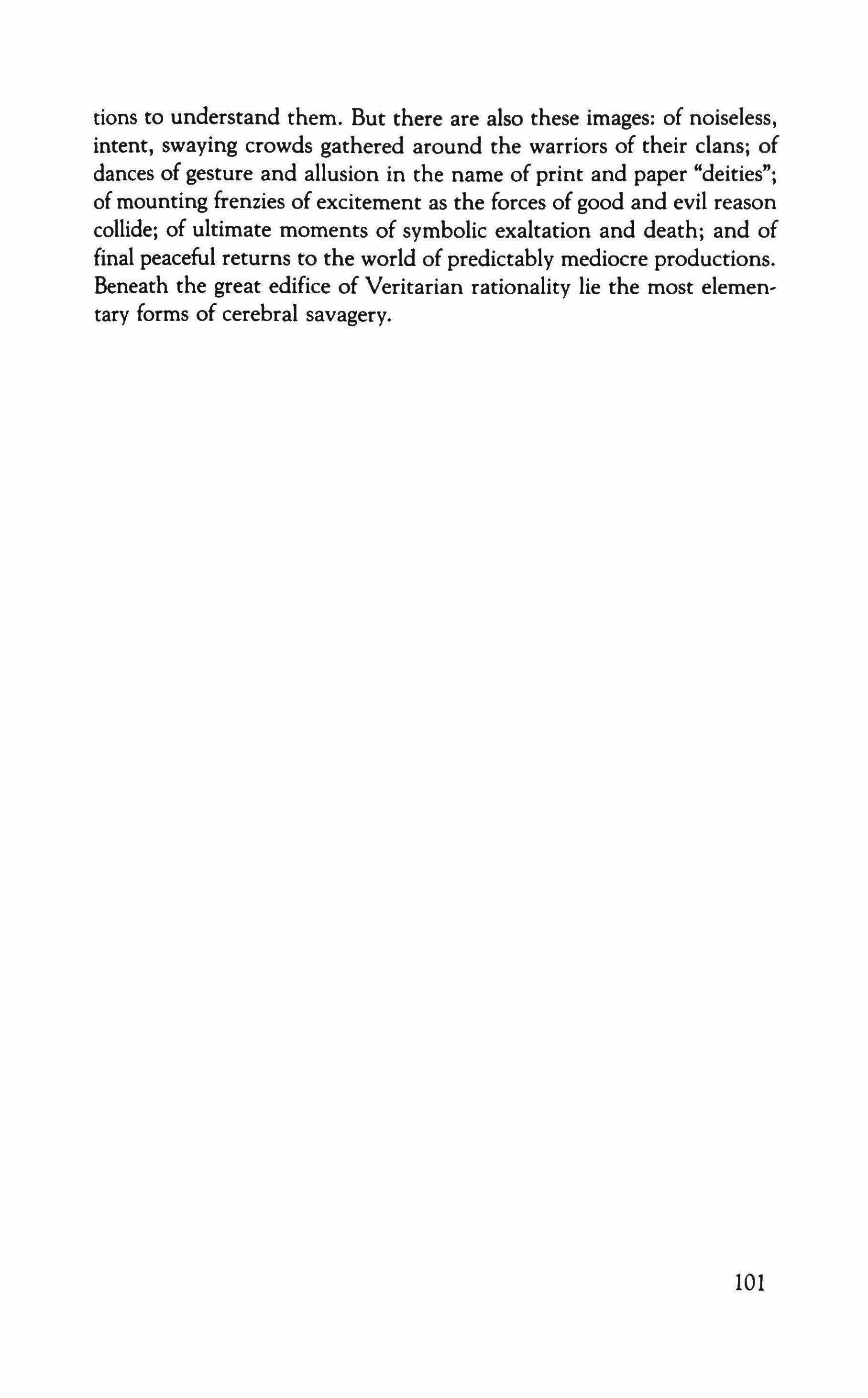
tions to understand them. But there are also these images: of noiseless, intent, swaying crowds gathered around the warriors of their clans; of dances of gesture and allusion in the name of print and paper "deities"; of mounting frenzies of excitement as the forces of good and evil reason collide; of ultimate moments of symbolic exaltation and death; and of final peaceful returns to the world of predictably mediocre productions. Beneath the great edifice of Veritarian rationality lie the most elernentary forms of cerebral savagery.
101
The Belly of Darkness
Wesley Walden

Henry, sipping his morning coffee, turned from the radio and stared.
"Going WHERE?"
"We're running a patrol on a three-mile radius from the firebase. You'll be the RTO."
"I don't know anything about going on patrol! I'm not an infantryman!"
"SIR!" the lieutenant corrected.
"Dammit, SIR! Hasn't this gone far enough? I mean, if I go out there with a radio strapped on my back my life expectancy drops remarkably. I know that for a fact!" He pushed back from the unsteady desk and sloshed hot coffee over the rim of his cup, burning his fingers. "I don't care if you have fuck books! You can look at them and pound your pud all day. I don't care!" He set the styrofoam cup on the desk, put his hand on his T�shirted chest for emphasis. "I do it myself," he said softly, as if this confession would liberate the lieutenant. "You don't have to send me on patrol over it."
"The patrol leaves in an hour, Specialist."
Henry, with a look of disbelief, said, "I just get through telling you I have been doing it, too. Using the SAME magazines, if you'll believe me. 1-" He paused; searching for a word. "- LIKE you for that!" He bent obsequiously toward the lieutenant.
"Specialist! Do you actually think I would create a patrol strictly for your personal harassment?" Lieutenant Miller sneered. "In an hour. Here's your frequency. I want an hourly commo check. On the hour. Sergeant Kirby has the rest of the details."
102

Specialist Walker cleaned his weapon, found the bandoleer that had been issued him, and checked his twelve magazines for rounds. A half hour later, his gear ready, he sat on his cot and watched the sweat bead on his bare forearm. A fly landed there. He slapped viciously at it. It flew up a few inches, and returned to the same spot. Again he slapped, harder. The fly went up, and came back down. A red mark, in the form of fingers, appeared on Henry's arm.
How the hell did this happen?
He sifted through his letters from home, reread them briefly. He realized he had not written to anyone since his first day at Emma. He felt guilt. It tied a knot in his stomach right near the knot of fear.
Carol's silky, cream-and-rose complexion drifted through his mind. It appeared to him as a world in itself, a statement of tenderness. Her naked body floated into shadow, the same smooth skin on her rounded breast; her hand covering the breast. Then the breasts were Sammy's, torn, the soul bared; the life drifting away.
"God!"
He stood, remained bent in the low culvert, and carried his gear outside.
The knot of fear spread as he looked back over his shoulder and saw the perimeter berm of Firebase Emma, from a distance, getting smaller at each step. Never before had he thought in terms of Emma as SAFE. He was on the verge of panic; his head swam in denial.
This is not happening!
He looked down at himself, saw himself carrying the M-16 at port arms. He had not done this since Basic Training, when it had still been a game. He saw his jungle boots going through the tall grass; saw his shadow now big, now small, flicker along the blades of grass. The shadow carried a square box with an antenna looped near its head.
I was supposed to have been working in an air-conditioned office!
How many times had the instructors told them: "Even if you DO go to 'Nam, they ain't gonna waste you-as an RTO! You got too much training. You teletypes are high priority."
And now I'm a grunt!
His eyes roamed constantly; he prayed he would see nothing extraordinary.
Wow, gimme a break! This isn't happening!
The low grass gave way to razor-sharp elephant grass, taller than a man. The eight shadows that had flicked along the low grass had become a long, noisy snake; shuffling, rustling, complaining.
103

"What the fuck are we doing here?" someone asked Sergeant Kirby, a Duster squad leader.
"Looking for evidence," he yelled over his shoulder.
"Of what?"
"Charley Cong! What do you fuckin' think?"
"Have we found any yet?"
"Are you bleeding yet?"
"Yeah. This motherfuckin' elephant grass has got me cut to pieces!"
Four to five voices took part in the conversation. As they got louder, Henry got more nervous. He knew his radio would be the first target in an ambush. The chatter continued.
"I see what we're doing. Search and destroy. We search them out and they motherfuckin' destroy us!" A high-pitched laugh shrilled from Henry's rear, sending a shudder up his wet back.
"Why you think the looie ain't here? He ain't fuckin' stupid!'
"When we get zapped, he'll know Charley's in the area."
"Ah'm hep. He don' wanna risk his OWN life!"
"Muddahfock dis shit!"
Amen! Henry thought. Motherfuck this shit!
"Hey, Sarge," someone continued. "Why we ain't got no point man?"
"YOU want to walk fuckin' poind"
"Hell, no!"
1000 hours. Henry clicked his mike twice. The lieutenant clicked his three times in response.
They clicked the mike instead of talking. For noise discipline. So they could keep their talking to a minimum. As the banter from the squad continued, Henry worked his way up to Sergeant Kirby.
"How come you're letting everyone talk so much?"
"You want a firefight?" the sergeant asked, turning to him.
Henry saw Sergeant Kirby's prominent nose, looked up one of his huge, hair-filled nostrils. He shook his head.
"Well," the sergeant explained, confidently, "the more noise we make, the bigger we sound. The bigger we sound, the less chance we have to make contact. I want to sound fuckin' BIG!"
"Oh."
Henry drifted back to his place, hoping to feel relieved. But the knot in his stomach only tightened. And, as they worked their way toward noon in the blazing sun, widening the gap between them and Emma, he thought he could not take the torment.
Just after noon they cleared the field of elephant grass. They stepped onto a knee-high meadow that was as wide and many times longer than
104

a football field. On the far side of this strip was the beginning of a narrow valley of dense green jungle.
Excluding himself and his RTO, Sergeant Kirby divided the remaining six men into two teams. He allowed one team to eat while the other three men spread out a hundred meters away from the resting point. He placed one man just inside the dense jungle, and the other two in opposite directions along the border of the meadow and the elephant grass. The eating men sat, fifteen meters apart, on the edge of the elephant grass, in its partial shade.
Henry removed his radio and quickly dug the Cerats from his butt pack. His instinct told him they should have been sitting inside the elephant grass. For concealment. When he opened the Cerat entree, he almost gagged at the white grease which floated on top. He scraped the grease away with his plastic spoon, slapped at the flies and mosquitoes, and ate like a frightened animal, partially chewing, swallowing quickly. He kept his eyes on the surroundings. He was living on a blade of panic; scarcely remembered his past, unaware of a future. His mind rejected this mosquito, and fly,infested fear more than anything to which he had ever been subjected.
At 1330 hours, when all the members ofthe patrol had eaten, and one soldier had had a bowel movement, they formed up again. They began the struggle back through the elephant grass toward Firebase Emma. Several meters from the resting point Henry looked up, saw the slender blades of the gray-green grass as they cut into the plane of blue sky above him. He was startled by the simple beauty. He attempted to retain the scene in his vision as he walked; and then reprimanded himself. His job was not to observe beauty; he was an RTO. He could not allow his mind to wander. Somewhere inside him, crowded by the instinct for survival, a sadness surfaced.
Late in the afternoon, they found a narrow trail. For about two hundred meters they moved, gratefully, between the stalks of grass, instead of through them. There had been little chatter, Henry noted, for almost an hour. A tremendous fatigue had taken the place of their nervousness.
The trail broke abruptly into a clearing. As if they had sprung from nothing, Henry could see the gun barrels and hootches of Emma, a short five hundred meters away.
I'm coming home!
The firebase looked inviting, comfortable. When he stepped tiredly through the gate and removed the heavy radio, he felt an unexpected sense of accomplishment.
105
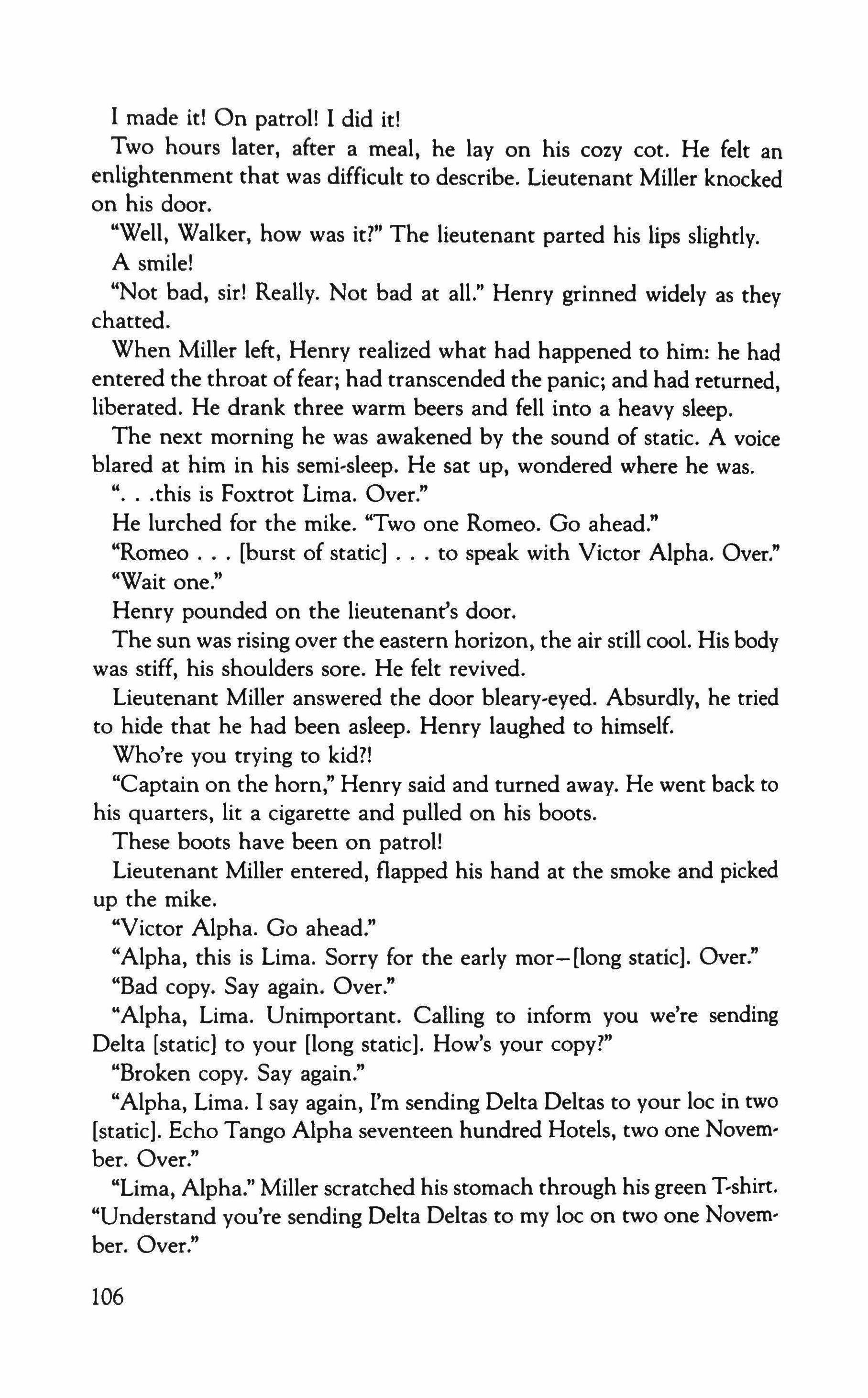
I made it! On patrol! I did it!
Two hours later, after a meal, he lay on his cozy cot. He felt an enlightenment that was difficult to describe. Lieutenant Miller knocked on his door.
"Well, Walker, how was it?" The lieutenant parted his lips slightly. A smile!
"Not bad, sir! Really. Not bad at all." Henry grinned widely as they chatted.
When Miller left, Henry realized what had happened to him: he had entered the throat offear; had transcended the panic; and had returned, liberated. He drank three warm beers and fell into a heavy sleep.
The next morning he was awakened by the sound of static. A voice blared at him in his semi-sleep. He sat up, wondered where he was.
" this is Foxtrot Lima. Over."
He lurched for the mike. "Two one Romeo. Go ahead."
"Romeo [burst of static] to speak with Victor Alpha. Over."
"Wait one."
Henry pounded on the lieutenant's door.
The sun was rising over the eastern horizon, the air still cool. His body was stiff, his shoulders sore. He felt revived.
Lieutenant Miller answered the door bleary-eyed. Absurdly, he tried to hide that he had been asleep. Henry laughed to himself.
Who're you trying to kid?!
"Captain on the horn," Henry said and turned away. He went back to his quarters, lit a cigarette and pulled on his boots.
These boots have been on patrol!
Lieutenant Miller entered, flapped his hand at the smoke and picked up the mike.
"Victor Alpha. Go ahead."
"Alpha, this is Lima. Sorry for the early mor-[long static]. Over."
"Bad copy. Say again. Over."
"Alpha, Lima. Unimportant. Calling to inform you we're sending Delta [static] to your [long static]. How's your copy?"
"Broken copy. Say again."
"Alpha, Lima. I say again, I'm sending Delta Deltas to your loc in two [static]. Echo Tango Alpha seventeen hundred Hotels, two one November. Over."
"Lima, Alpha." Miller scratched his stomach through his green Tshirt. "Understand you're sending Delta Deltas to my loc on two one November. Over."
106
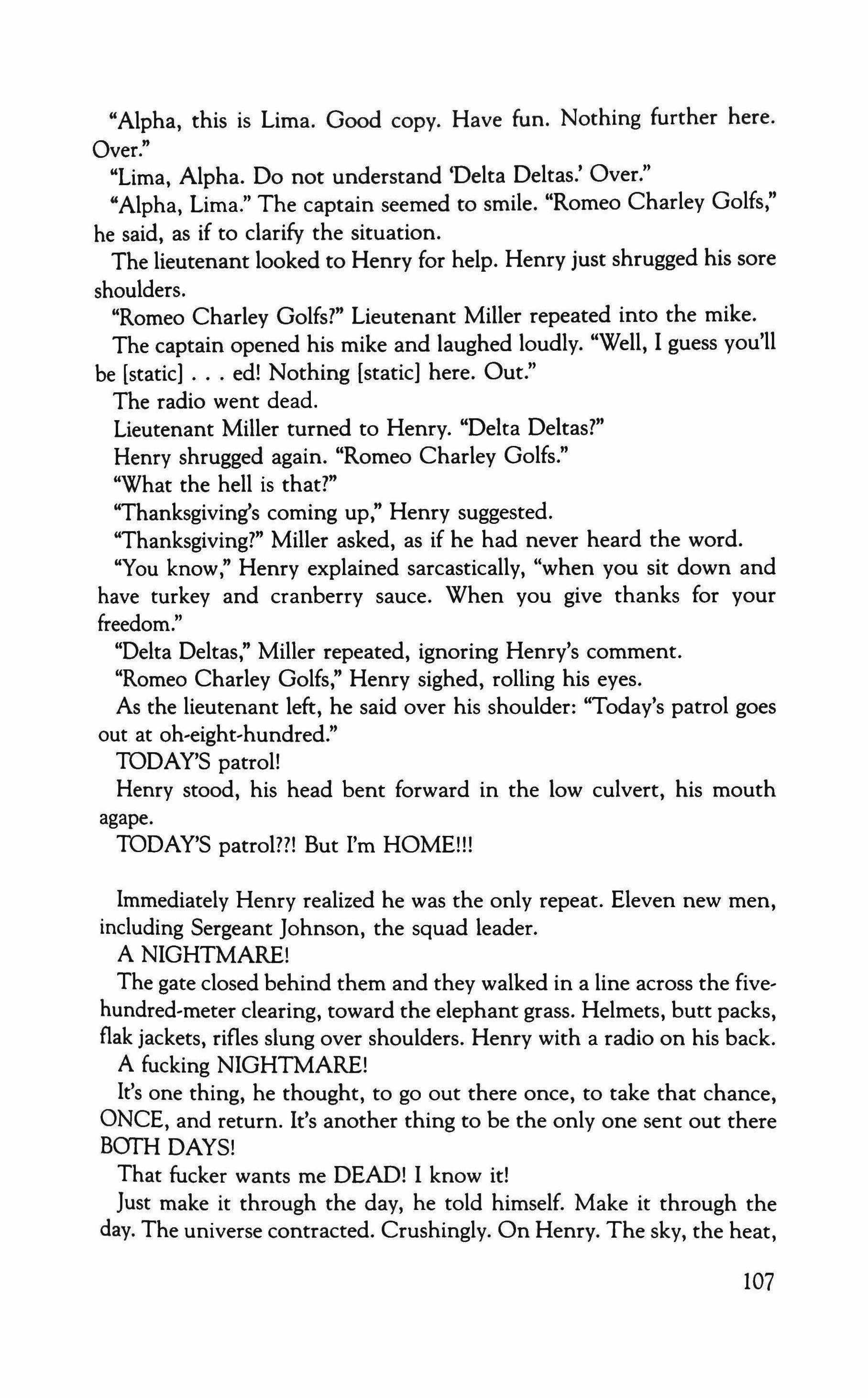
"Alpha, this is Lima. Good copy. Have fun. Nothing further here. Over."
"Lima, Alpha. Do not understand 'Delta Deltas.' Over."
"Alpha, Lima." The captain seemed to smile. "Romeo Charley Golfs," he said, as if to clarify the situation.
The lieutenant looked to Henry for help. Henry just shrugged his sore shoulders.
"Romeo Charley Golfs?" Lieutenant Miller repeated into the mike. The captain opened his mike and laughed loudly. "Well, I guess you'll be [static] ed! Nothing [static] here. Out."
The radio went dead.
Lieutenant Miller turned to Henry. "Delta Deltas?"
Henry shrugged again. "Romeo Charley Golfs."
"What the hell is that?"
"Thanksgiving's coming up," Henry suggested. "Thanksgiving?" Miller asked, as if he had never heard the word.
"You know," Henry explained sarcastically, "when you sit down and have turkey and cranberry sauce. When you give thanks for your freedom."
"Delta Deltas," Miller repeated, ignoring Henry's comment.
"Romeo Charley Golfs," Henry sighed, rolling his eyes.
As the lieutenant left, he said over his shoulder: "Today's patrol goes out at oh-eight-hundred,"
lDDAY'S patrol!
Henry stood, his head bent forward in the low culvert, his mouth agape.
lDDAY'S patrol??! But I'm HOME!!!
Immediately Henry realized he was the only repeat. Eleven new men, including Sergeant Johnson, the squad leader.
A NIGHTMARE!
The gate closed behind them and they walked in a line across the fivehundred-meter clearing, toward the elephant grass. Helmets, butt packs, flak jackets, rifles slung over shoulders. Henry with a radio on his back.
A fucking NIGHTMARE!
It's one thing, he thought, to go out there once, to take that chance, ONCE, and return. It's another thing to be the only one sent out there BOfHDAYS!
That fucker wants me DEAD! I know it!
Just make it through the day, he told himself. Make it through the day. The universe contracted. Crushingly. On Henry. The sky, the heat,
107

everything that was, seemed to push at him from all sides. He wanted to run, anywhere. Make it for one hour! Make it. Between clicks of the mike. You can do that. A minute at a time. Just get to the elephant grass. Breathe deeply, and get to the elephant grass. Get there. A second at a time. One second. A step. One foot in front of the other. Go forward.
When they cleared the five-hundred-meter firebase clearing and hit the edge of the elephant grass, Sergeant Johnson halted the patrol. He put three men on a perimeter defense and held a meeting. His light brown forehead glistened from the morning heat as he rested on his haunches. He talked in a low, throaty whisper to his men.
"We ain' use' to this," he began. "No one ain' had much trainin' in patrol. But we gotta job to do, an' we goina do it.
"Now, them mission instructions I receive' from the lieutenant is that we goina look for signs of V.C. activities. They was a patrol out yesterday, an' we goina go in a slightly diffrent area than they was. The looie been monitoring frequencies an' he say the local u.S. grunts been sighting Charley but basically not engaging. He afraid they been buildin' up to overrun Emma, maybe. We goina try an' find evidence what they doin'. We lookin' for anything atall what might sugges' they movin' within the area, expecially to Emma. In the grass we goina look for flattened areas, areas where people been walkin'; we goina listen for sounds; we gonna smell for smells. Mos' important to keep in you' mind, we goina be learnin' as we go along. An' learnin' requires bein' careful.
"We goina walk with a point man an' two men at a modified flank. I take point first." He pointed at Henry. "An' my RTO goina take a close slack." He pointed to two men in the semi-circle. "You two take the flanks. Stay close. Ten meters; no further. We could get lost easy in this place. The res' the squad stay at five-meter intervals. We can adjust if we ain' doing things right. I want noise discipline! Do I have to repeat myself on that?" The men shook their heads. "I don' want no talkin'. An' I want you walkin' without you' feet touchin' the groun'.
"We observin'! We no John Waynes. We don' need no John Waynes. But if we fin' somethin' that is enemy, we goina engage.
"Specialist Walker, he was on yesterday's patrol. He the veteran in this group. You got anything to add to what I sayed?" he asked Henry. Henry looked at the ground, wishing for brilliance. "Not really. Except that you don't learn much about this in one day."
Sergeant Johnson nodded. "Anybody got anything to add 'fore we start?" There was silence. "Any questions?"
"When's chow?" someone asked.
108
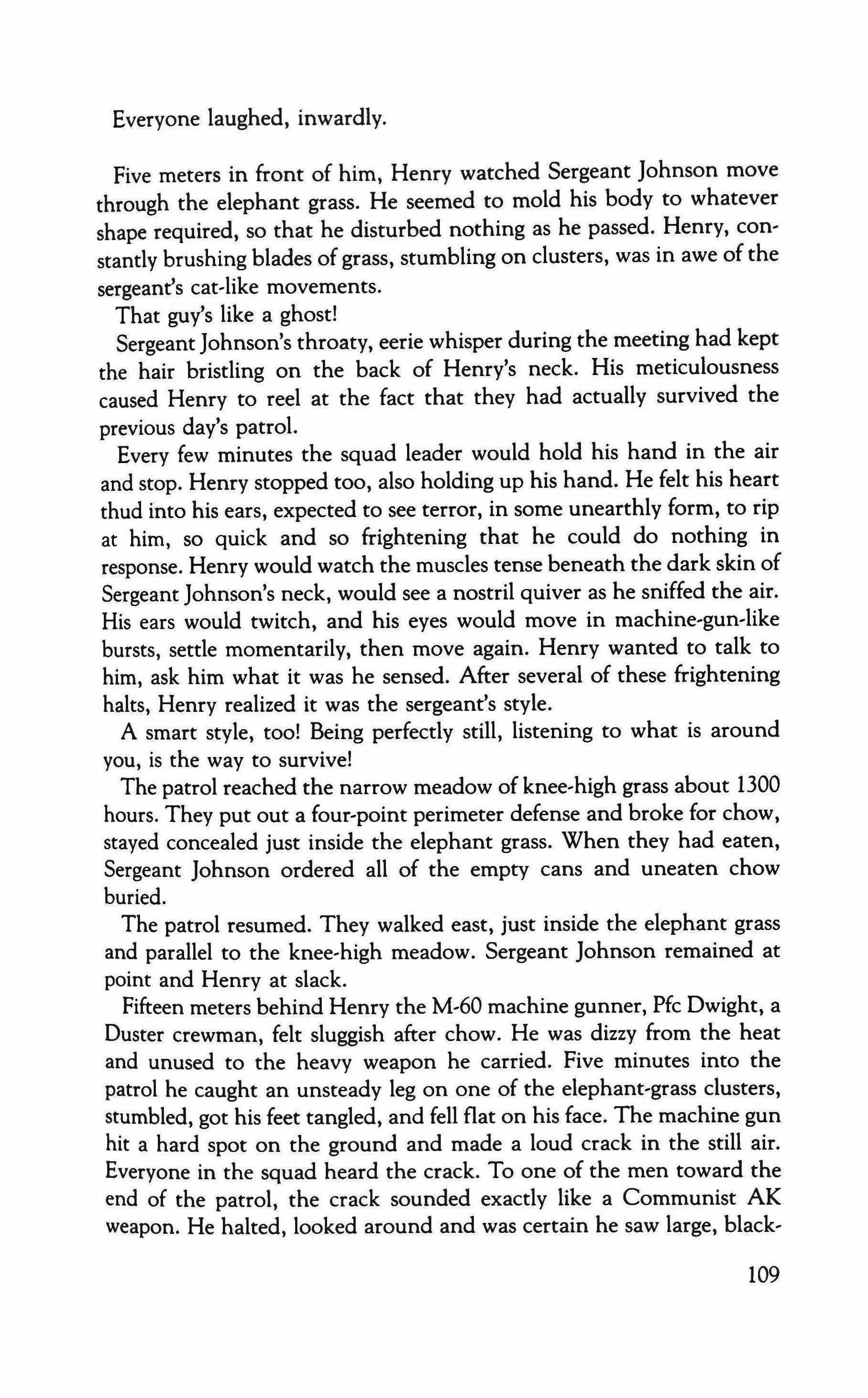
Everyone laughed, inwardly.
Five meters in front of him, Henry watched Sergeant Johnson move through the elephant grass. He seemed to mold his body to whatever shape required, so that he disturbed nothing as he passed. Henry, con, stantly brushing blades of grass, stumbling on clusters, was in awe of the sergeant's cat-like movements.
That guy's like a ghost!
Sergeant Johnson's throaty, eerie whisper during the meeting had kept the hair bristling on the back of Henry's neck. His meticulousness caused Henry to reel at the fact that they had actually survived the previous day's patrol.
Every few minutes the squad leader would hold his hand in the air and stop. Henry stopped too, also holding up his hand. He felt his heart thud into his ears, expected to see terror, in some unearthly form, to rip at him, so quick and so frightening that he could do nothing in response. Henry would watch the muscles tense beneath the dark skin of Sergeant Johnson's neck, would see a nostril quiver as he sniffed the air. His ears would twitch, and his eyes would move in machine-gun-like bursts, settle momentarily, then move again. Henry wanted to talk to him, ask him what it was he sensed. After several of these frightening halts, Henry realized it was the sergeant's style.
A smart style, too! Being perfectly still, listening to what is around you, is the way to survive!
The patrol reached the narrow meadow of knee,high grass about 1300 hours. They put out a four-point perimeter defense and broke for chow, stayed concealed just inside the elephant grass. When they had eaten, Sergeant Johnson ordered all of the empty cans and uneaten chow buried.
The patrol resumed. They walked east, just inside the elephant grass and parallel to the knee-high meadow. Sergeant Johnson remained at point and Henry at slack.
Fifteen meters behind Henry the M,60 machine gunner, Pfc Dwight, a Duster crewman, felt sluggish after chow. He was dizzy from the heat and unused to the heavy weapon he carried. Five minutes into the patrol he caught an unsteady leg on one of the elephant-grass clusters, stumbled, got his feet tangled, and fell flat on his face. The machine gun hit a hard spot on the ground and made a loud crack in the still air. Everyone in the squad heard the crack. To one of the men toward the end of the patrol, the crack sounded exactly like a Communist AK weapon. He halted, looked around and was certain he saw large, black,
109
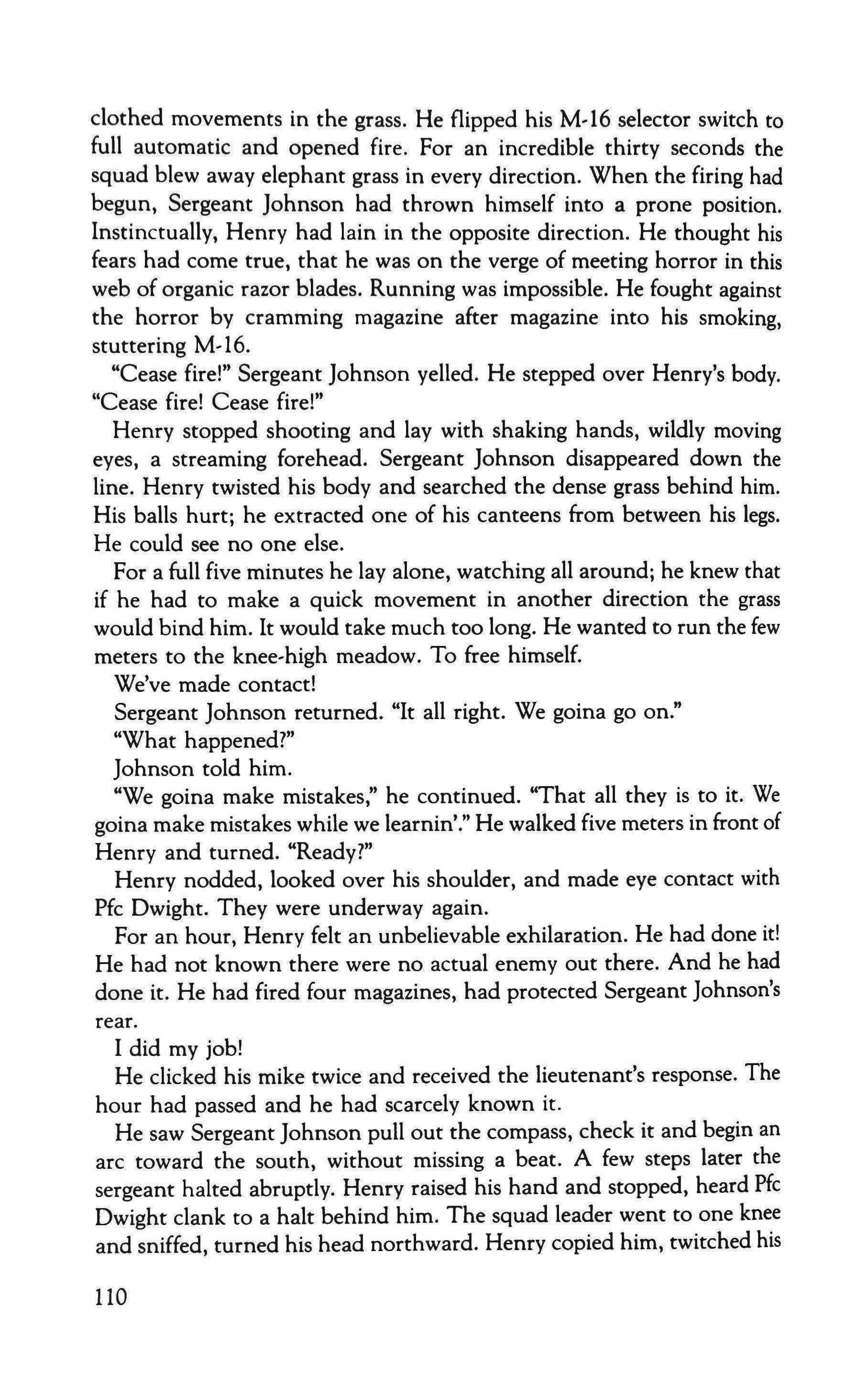
clothed movements in the grass. He flipped his M·16 selector switch to full automatic and opened fire. For an incredible thirty seconds the squad blew away elephant grass in every direction. When the firing had begun, Sergeant Johnson had thrown himself into a prone position. Instinctuallv, Henry had lain in the opposite direction. He thought his fears had come true, that he was on the verge of meeting horror in this web of organic razor blades. Running was impossible. He fought against the horror by cramming magazine after magazine into his smoking, stuttering M·16.
"Cease fire!" Sergeant Johnson yelled. He stepped over Henry's body. "Cease fire! Cease fire!"
Henry stopped shooting and lay with shaking hands, wildly moving eyes, a streaming forehead. Sergeant Johnson disappeared down the line. Henry twisted his body and searched the dense grass behind him. His balls hurt; he extracted one of his canteens from between his legs. He could see no one else.
For a full five minutes he lay alone, watching all around; he knew that if he had to make a quick movement in another direction the grass would bind him. It would take much too long. He wanted to run the few meters to the knee-high meadow To free himself.
We've made contact!
Sergeant Johnson returned. "It all right. We goina go on."
"What happened?"
Johnson told him.
"We goina make mistakes," he continued. "That all they is to it. We goina make mistakes while we learnin'." He walked five meters in front of Henry and turned. "Ready?"
Henry nodded, looked over his shoulder, and made eye contact with Pfc Dwight. They were underway again.
For an hour, Henry felt an unbelievable exhilaration. He had done it! He had not known there were no actual enemy out there. And he had done it. He had fired four magazines, had protected Sergeant Johnson's rear.
I did my job!
He clicked his mike twice and received the lieutenant's response. The hour had passed and he had scarcely known it.
He saw Sergeant Johnson pull out the compass, check it and begin an arc toward the south, without missing a beat. A few steps later the sergeant halted abruptly. Henry raised his hand and stopped, heard Pfc Dwight clank to a halt behind him. The squad leader went to one knee and sniffed, turned his head northward. Henry copied him, twitched his
110
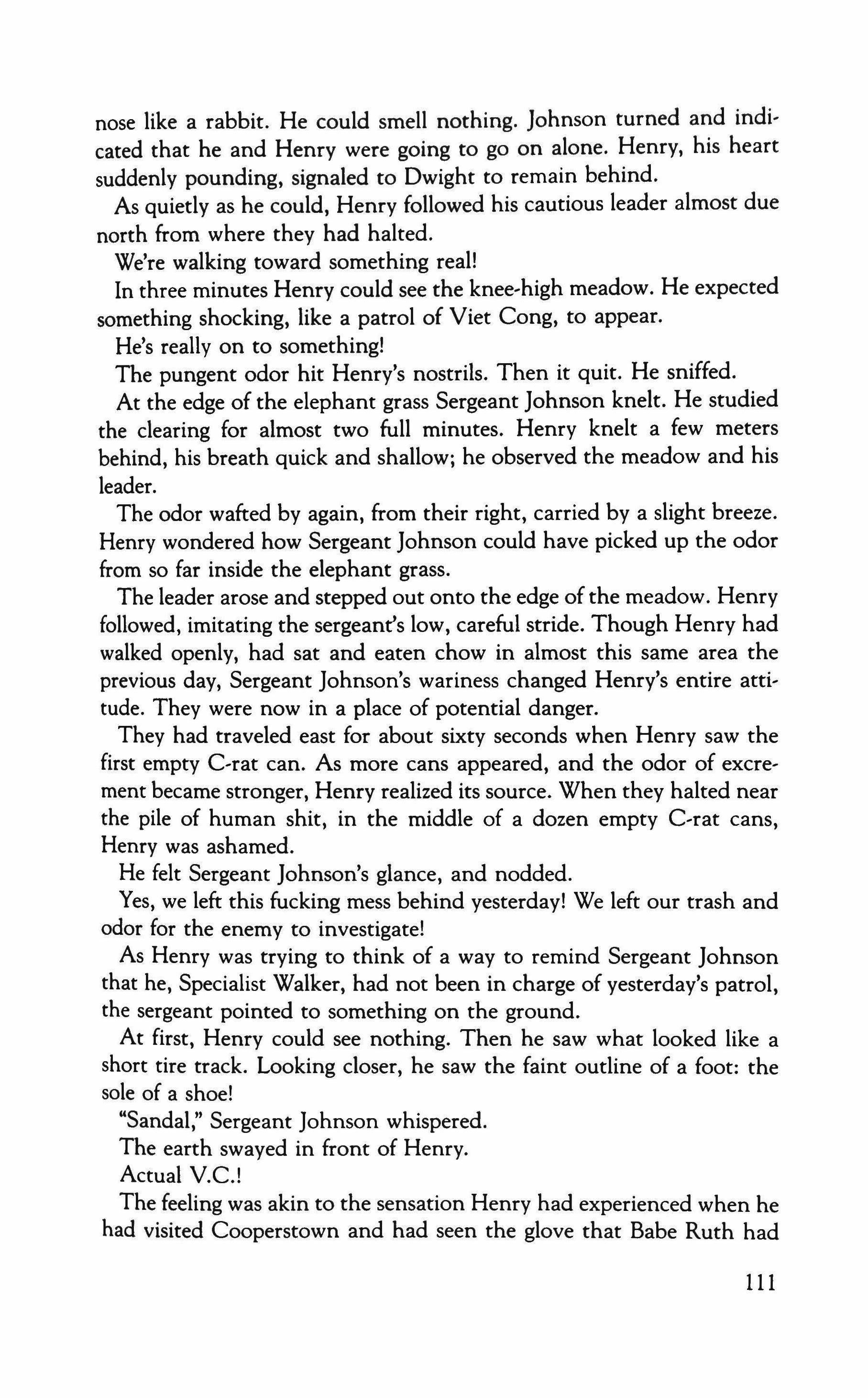
nose like a rabbit. He could smell nothing. Johnson turned and indicated that he and Henry were going to go on alone. Henry, his heart suddenly pounding, signaled to Dwight to remain behind.
As quietly as he could, Henry followed his cautious leader almost due north from where they had halted.
We're walking toward something real!
In three minutes Henry could see the knee-high meadow. He expected something shocking, like a patrol of Viet Cong, to appear.
He's really on to something!
The pungent odor hit Henry's nostrils. Then it quit. He sniffed.
At the edge of the elephant grass Sergeant Johnson knelt. He studied the clearing for almost two full minutes. Henry knelt a few meters behind, his breath quick and shallow; he observed the meadow and his leader.
The odor wafted by again, from their right, carried by a slight breeze. Henry wondered how Sergeant Johnson could have picked up the odor from so far inside the elephant grass.
The leader arose and stepped out onto the edge of the meadow. Henry followed, imitating the sergeant's low, careful stride. Though Henry had walked openly, had sat and eaten chow in almost this same area the previous day, Sergeant Johnson's wariness changed Henry's entire attitude. They were now in a place of potential danger.
They had traveled east for about sixty seconds when Henry saw the first empty C-rat can. As more cans appeared, and the odor of excrement became stronger, Henry realized its source. When they halted near the pile of human shit, in the middle of a dozen empty Cerat cans, Henry was ashamed.
He felt Sergeant Johnson's glance, and nodded.
Yes, we left this fucking mess behind yesterday! We left our trash and odor for the enemy to investigate!
As Henry was trying to think of a way to remind Sergeant Johnson that he, Specialist Walker, had not been in charge of yesterday's patrol, the sergeant pointed to something on the ground.
At first, Henry could see nothing. Then he saw what looked like a short tire track. Looking closer, he saw the faint outline of a foot: the sole of a shoe!
"Sandal," Sergeant Johnson whispered.
The earth swayed in front of Henry.
Actual V.C.!
The feeling was akin to the sensation Henry had experienced when he had visited Cooperstown and had seen the glove that Babe Ruth had
III
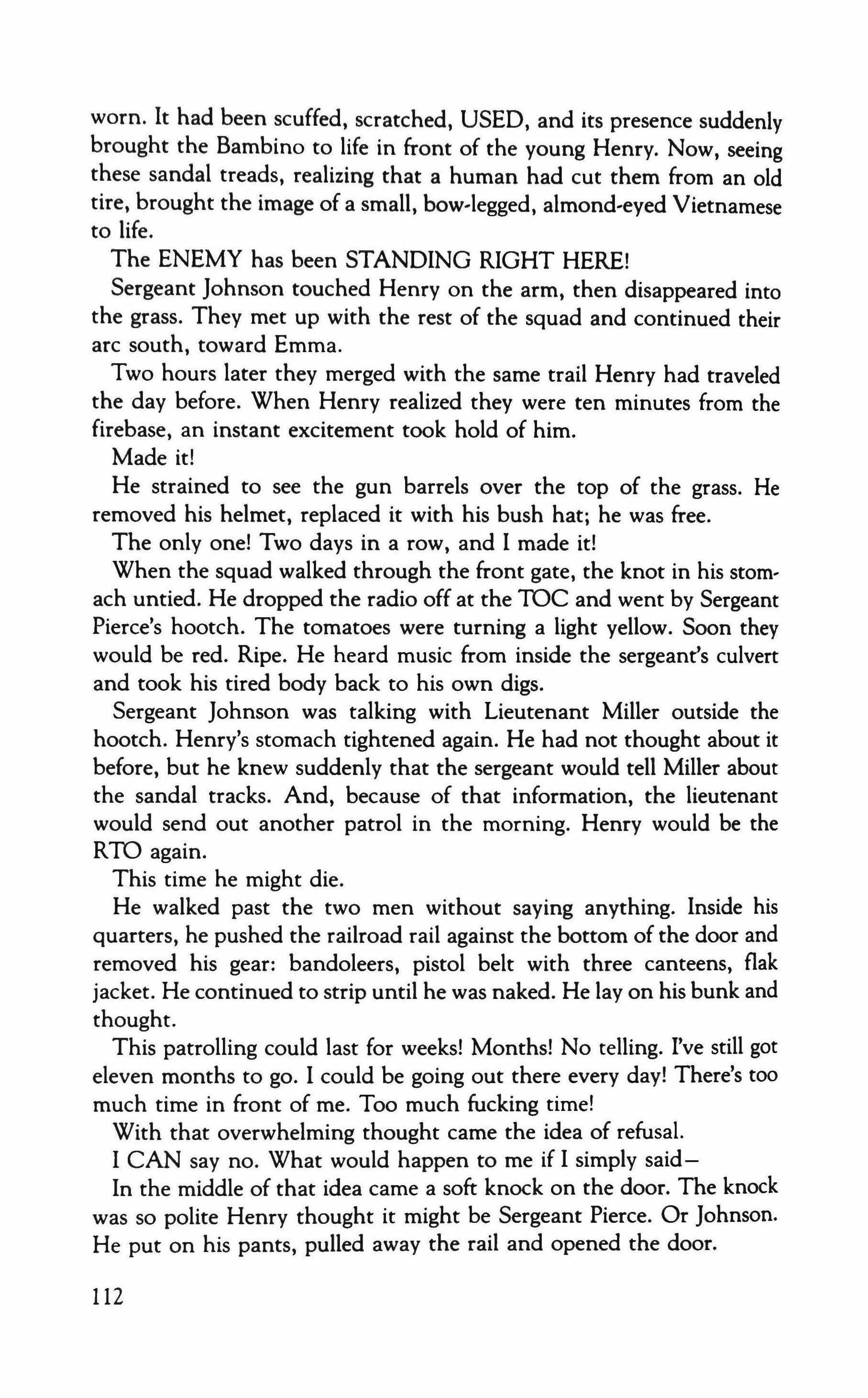
worn. It had been scuffed, scratched, USED, and its presence suddenly brought the Bambino to life in front of the young Henry. Now, seeing these sandal treads, realizing that a human had cut them from an old tire, brought the image of a small, bow-legged, almond-eyed Vietnamese to life.
The ENEMY has been STANDING RIGHT HERE!
Sergeant Johnson touched Henry on the arm, then disappeared into the grass. They met up with the rest of the squad and continued their arc south, toward Emma.
Two hours later they merged with the same trail Henry had traveled the day before. When Henry realized they were ten minutes from the firebase, an instant excitement took hold of him.
Made it!
He strained to see the gun barrels over the top of the grass. He removed his helmet, replaced it with his bush hat; he was free.
The only one! Two days in a row, and I made it!
When the squad walked through the front gate, the knot in his stomach untied. He dropped the radio off at the mc and went by Sergeant Pierce's hootch. The tomatoes were turning a light yellow. Soon they would be red. Ripe. He heard music from inside the sergeant's culvert and took his tired body back to his own digs.
Sergeant Johnson was talking with Lieutenant Miller outside the hootch. Henry's stomach tightened again. He had not thought about it before, but he knew suddenly that the sergeant would tell Miller about the sandal tracks. And, because of that information, the lieutenant would send out another patrol in the morning. Henry would be the Rm again.
This time he might die.
He walked past the two men without saying anything. Inside his quarters, he pushed the railroad rail against the bottom of the door and removed his gear: bandoleers, pistol belt with three canteens, flak jacket. He continued to strip until he was naked. He lay on his bunk and thought.
This patrolling could last for weeks! Months! No telling. I've still got eleven months to go. I could be going out there every day! There's too much time in front of me. Too much fucking time!
With that overwhelming thought came the idea of refusal.
I CAN say no. What would happen to me if I simply saidIn the middle of that idea came a soft knock on the door. The knock was so polite Henry thought it might be Sergeant Pierce. Or Johnson. He put on his pants, pulled away the rail and opened the door.
112

Lieutenant Miller entered, a stiff grin on his face. He sat down on the chair in front of the radio. Henry remained near the door, the back of his neck pushed against the culvert ceiling. Instead of monitoring frequencies, the lieutenant turned to the specialist.
"Delta Deltas!" Miller said. He shook his head and came as close as Henry had seen to laughing. "Guess what?"
"Romeo Charley Golfs," Henry responded, unenthused. In his mind, he quickly practiced asking the lieutenant, with all due respect, to get the fuck out of his hootch.
"That's right! Red Cross Girls, Donut Dollies! It just hit me this morning! Donut Dollies are coming here to entertain us!" A sudden, tight, ironic smile came to his lips. He looked up at Henry for a response.
Henry, exhausted from the day, stood as straight as he could in the low culvert, his white, naked, swimmer's torso stooped, the shoulder slumped forward.
"Well, how did it go out there today?" Lieutenant Miller asked. Henry's eyes were dull, and his mouth hung open slightly. The lieutenant waited only a moment, got no response and continued talking. "It's like a fear of mine come true." Miller shook his head angrily. "Like everything I'm trying to do just works against me. I came over here to be in a war! A war! An opportunity like this might never come again in my lifetime! Jesus!" He wadded his fist and bounced it lightly off the plywood desk. "How can they do this to me?"
"The Donut Dollies?" Henry asked.
"Yeah. That's part of it. That's part of it, all right." Then Henry saw the lieutenant's chin tremble, slightly; his eyes blinked. "They're gonna transfer me, Walker. They're bringing me back to HQ! I can feel it! Lieutenant Baines is short, and they're gonna put me in his slot. 1 know it! 1 haven't had a chance to DO anything yet!" He stared at the radio for a long moment while Henry watched him. "This is the opportunity of a lifetime. Careers are built on this kind of situation. Think of them: Teddy Roosevelt; George Washington; John Kennedy."
I'm listening to a future president! Henry thought.
"1 came here to fight a WAR! And what do I get?"
A bunch of idiots going on patrol for you!
"Nor the two gooks killed a click away from here! 1 get to babysit Donut Dollies, for godsake!" He stood in frustration. "They just CANT transfer me. I may get stuck back there the rest of my tour!" He paused, walked past Henry and out of the hootch.
Henry kept the back of his neck pressed against the culvert as he
113
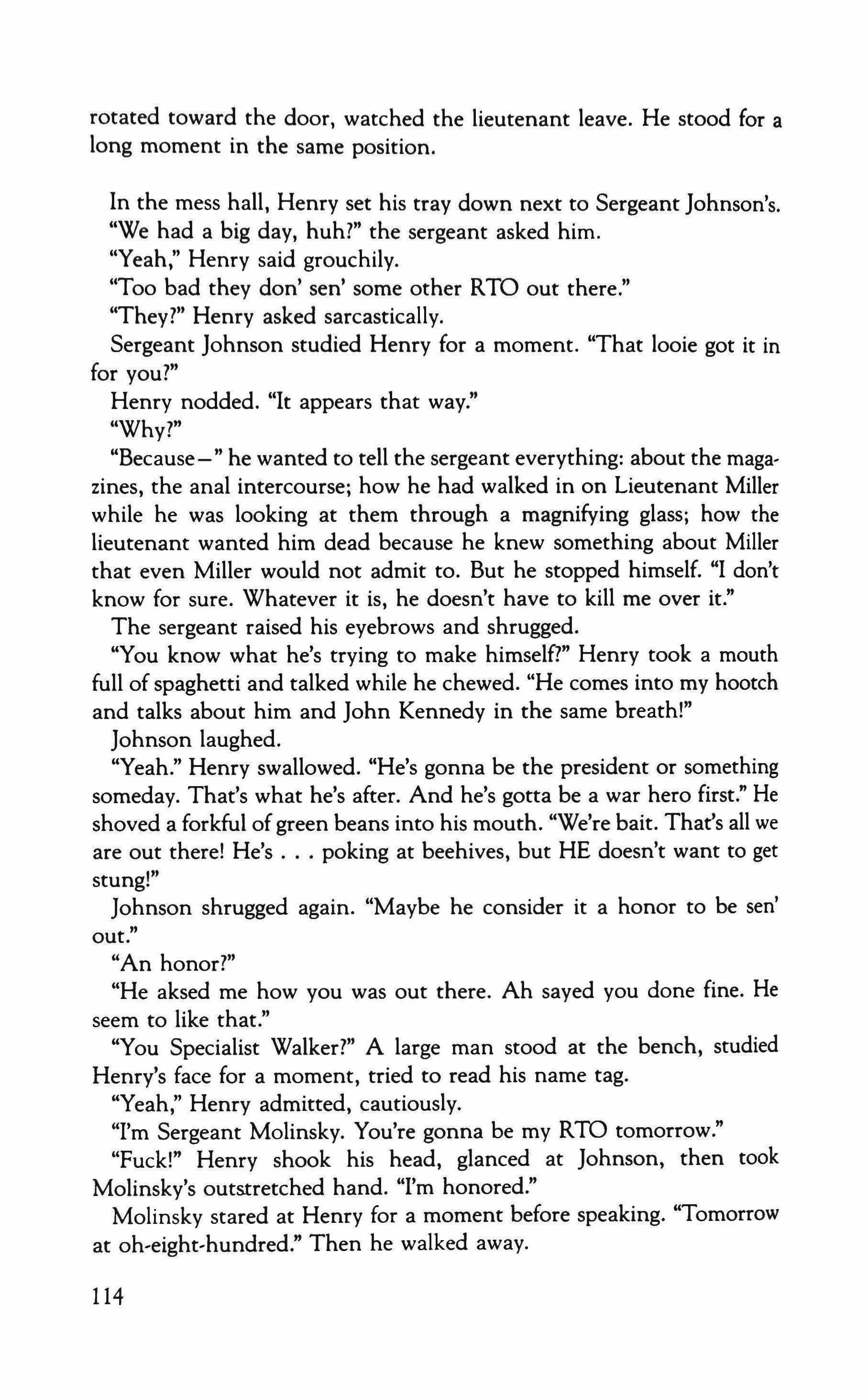
rotated toward the door, watched the lieutenant leave. He stood for a long moment in the same position.
In the mess hall, Henry set his tray down next to Sergeant Johnson's.
"We had a big day, huh?" the sergeant asked him.
"Yeah," Henry said grouchily.
"Too bad they don' sen' some other RTO out there."
"They?" Henry asked sarcastically.
Sergeant Johnson studied Henry for a moment. "That looie got it in for you?"
Henry nodded. "It appears that way."
"Why?"
"Because-" he wanted to tell the sergeant everything: about the magazines, the anal intercourse; how he had walked in on Lieutenant Miller while he was looking at them through a magnifying glass; how the lieutenant wanted him dead because he knew something about Miller that even Miller would not admit to. But he stopped himself. "I don't know for sure. Whatever it is, he doesn't have to kill me over it."
The sergeant raised his eyebrows and shrugged.
"You know what he's trying to make himself?" Henry took a mouth full of spaghetti and talked while he chewed. "He comes into my hootch and talks about him and John Kennedy in the same breath!"
Johnson laughed.
"Yeah." Henry swallowed. "He's gonna be the president or something someday. That's what he's after. And he's gotta be a war hero first." He shoved a forkful of green beans into his mouth. "We're bait. That's all we are out there! He's poking at beehives, but HE doesn't want to get stung!"
Johnson shrugged again. "Maybe he consider it a honor to be sen' out."
"An honor?"
"He aksed me how you was out there. Ah sayed you done fine. He seem to like that."
"You Specialist Walker?" A large man stood at the bench, studied Henry's face for a moment, tried to read his name tag.
"Yeah," Henry admitted, cautiously.
"I'm Sergeant Molinsky. You're gonna be my RTO tomorrow."
"Fuckl" Henry shook his head, glanced at Johnson, then took Molinsky's outstretched hand. "I'm honored."
Molinsky stared at Henry for a moment before speaking. "Tomorrow at oh-eight-hundred," Then he walked away.
114
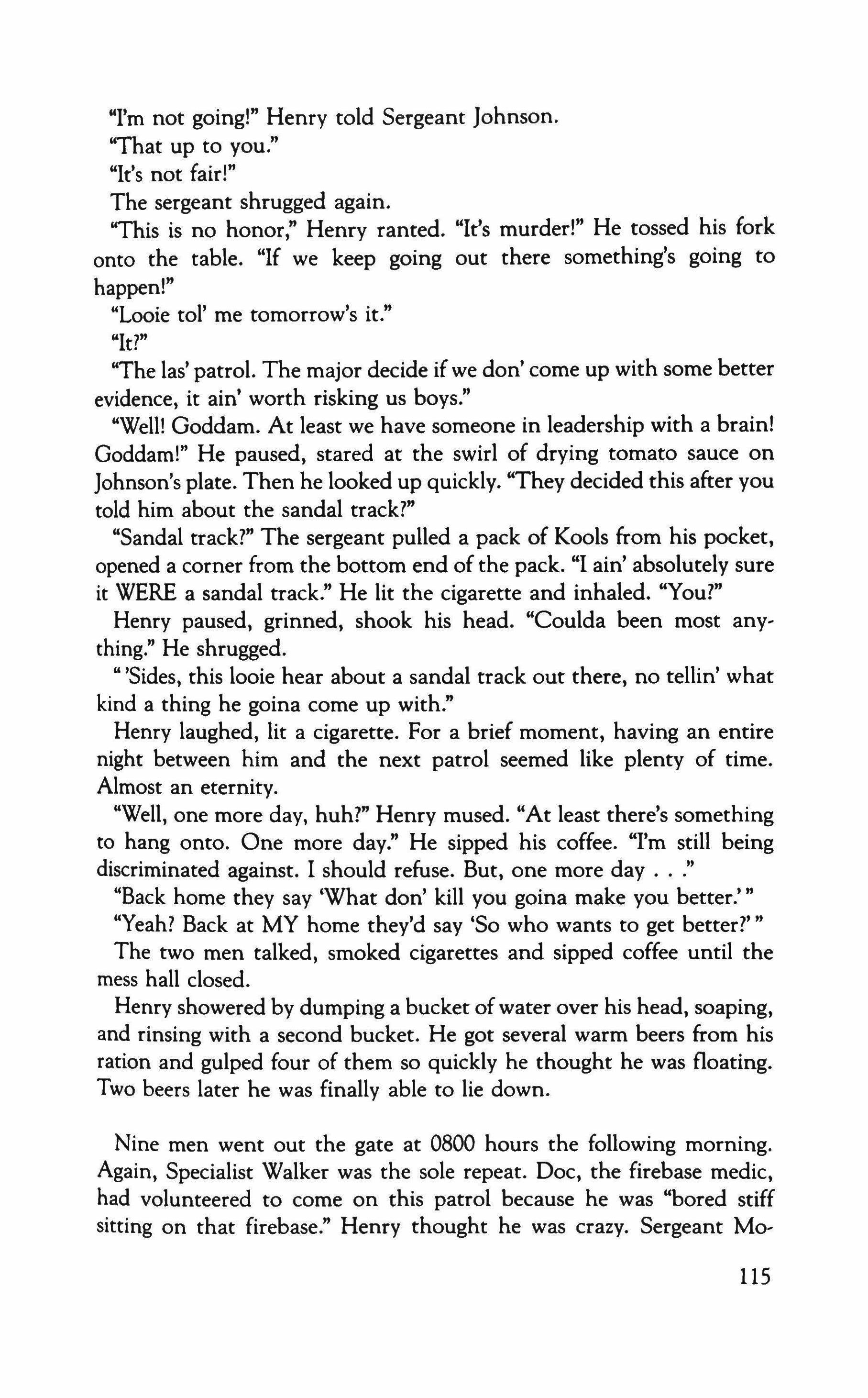
"I'm not going!" Henry told Sergeant Johnson. "That up to you."
"It's not fair!"
The sergeant shrugged again.
"This is no honor," Henry ranted. "It's murder!" He tossed his fork onto the table. "If we keep going out there something's going to happen!"
"Looie tol' me tomorrow's it."
"It?"
"The las' patrol. The major decide if we don' come up with some better evidence, it ain' worth risking us boys."
"Well! Goddam. At least we have someone in leadership with a brain! Goddam!" He paused, stared at the swirl of drying tomato sauce on Johnson's plate. Then he looked up quickly. "They decided this after you told him about the sandal track?"
"Sandal track?" The sergeant pulled a pack of Kools from his pocket, opened a corner from the bottom end of the pack. "I ain' absolutely sure it WERE a sandal track." He lit the cigarette and inhaled. "You?"
Henry paused, grinned, shook his head. "Coulda been most any' thing." He shrugged.
"'Sides, this looie hear about a sandal track out there, no tellin' what kind a thing he goina come up with."
Henry laughed, lit a cigarette. For a brief moment, having an entire night between him and the next patrol seemed like plenty of time. Almost an eternity.
"Well, one more day, huh?" Henry mused. "At least there's something to hang onto. One more day." He sipped his coffee. "I'm still being discriminated against. I should refuse. But, one more day
"Back home they say 'What don' kill you goina make you better.'"
"Yeah? Back at MY home they'd say 'So who wants to get better?'''
The two men talked, smoked cigarettes and sipped coffee until the mess hall closed.
Henry showered by dumping a bucket of water over his head, soaping, and rinsing with a second bucket. He got several warm beers from his ration and gulped four of them so quickly he thought he was floating. Two beers later he was finally able to lie down.
Nine men went out the gate at 0800 hours the following morning. Again, Specialist Walker was the sole repeat. Doc, the firebase medic, had volunteered to come on this patrol because he was "bored stiff sitting on that firebase," Henry thought he was crazy. Sergeant Mo-
115

linsky, who carried the M-60, led the patrol across the five-hundredmeter clearing. They hit the wall of elephant grass at a point about a thousand meters west of the tiny trail the patrols had taken home the two previous days. At the grass, Molinsky told the patrol he did not want any talking, gave the compass to a short, wiry Pfc and told him to walk a northerly point. When the Pfc hesitated, Molinsky barked gruffly and told the Pfc to start walking. He placed himself and Henry in the middle of the squad and ordered the other members to step into the grass at five-meter intervals. The patrol was underway.
"Hey, Sarge," Henry asked, as they waited their turn to dive into the grass. "Shouldn't we have a meeting or something?"
"What for?"
"Discuss the mission. These guys haven't been out here before." Henry waited.
Sergeant Molinsky, one cheek fat from a wad ofchewing tobacco, spat a brown stream and squinted at the sun.
"Let them know the objective," Henry urged.
"I know the objective!" Molinsky barked.
"Right." Henry looked up at the taller man, saw a mass of black hairs sticking out from the back of the sergeant's collar.
"What do THEY need to know it for?"
"Well," Henry answered, "so we can work as a team."
"We work as a team. But I'm the leader. All you have to do is what I say."
"Yesterday, we-"
"I don't wanna hear nothin' about no yesterday! This is today. And my patrol. I make the decisions, and I take the rap for it. I don't want eight other guys telling me what to do!" Just before he stepped into the grass he added, "Besides, if I make a mistake, nobody knows but me. I don't have to take no shit that way."
"Fuckin' jesuschristalmighrvl" Henry winced, waited his five meters, then stepped forward.
The patrol was not quite as noisy as Sergeant Kirby's had been. From the beginning, Sergeant Molinsky had told them several times he did not want to hear any talking. So they cursed under their breaths, and clanked their weapons and equipment; their boots thudded as they hit the jungle floor.
A half hour into the patrol Sergeant Molinsky pulled out his compass and stopped to study it. He allowed the three men in front of him to continue walking, while Henry almost bumped into him from behind. After a couple of seconds, the big sergeant raised his head, tried to see
116
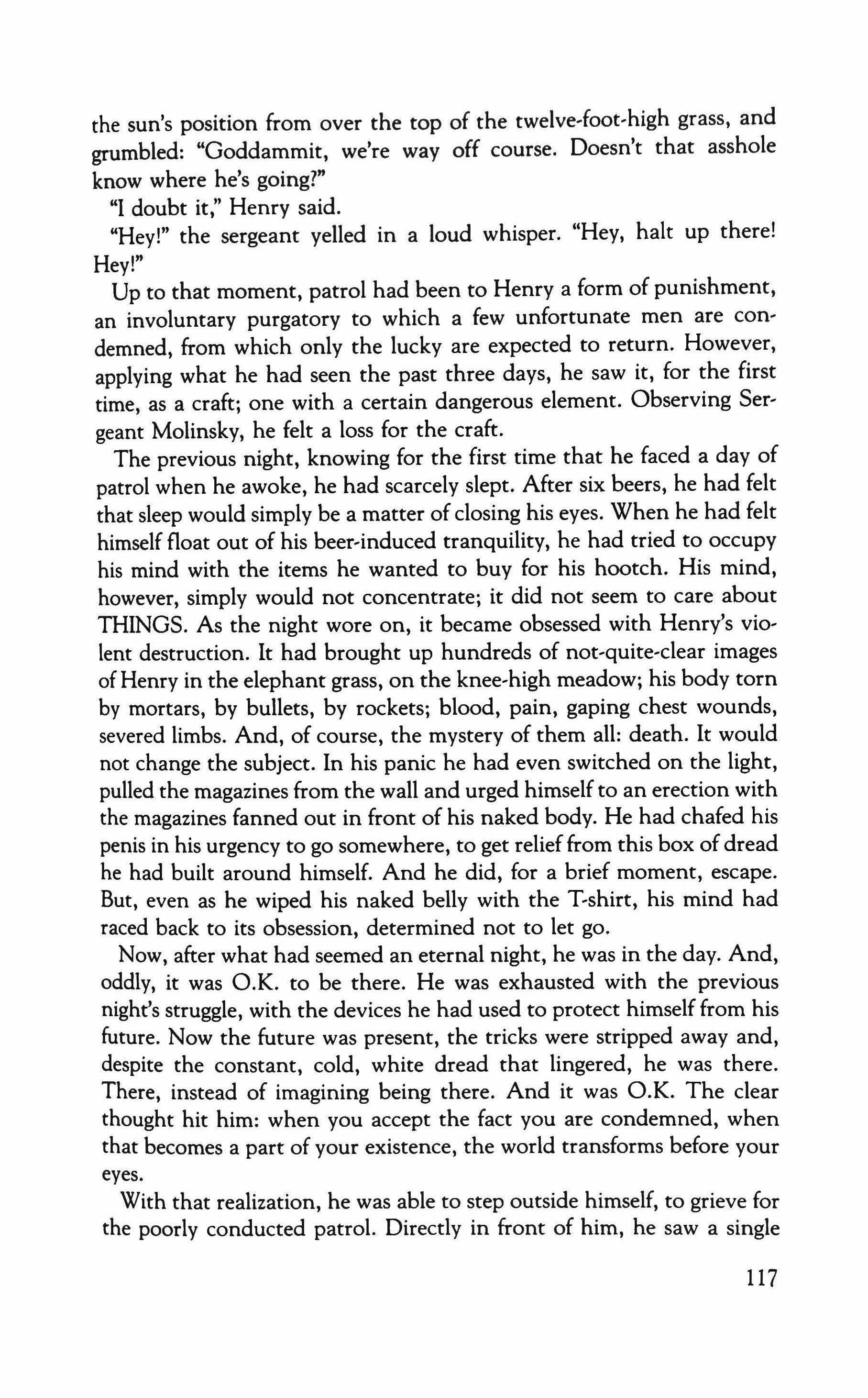
the sun's position from over the top of the twelve-foot-high grass, and grumbled: "Goddammit, we're way off course. Doesn't that asshole know where he's going?"
"I doubt it," Henry said.
"Hey!" the sergeant yelled in a loud whisper. "Hey, halt up there! Hey!"
Up to that moment, patrol had been to Henry a form of punishment, an involuntary purgatory to which a few unfortunate men are condemned, from which only the lucky are expected to return. However, applying what he had seen the past three days, he saw it, for the first time, as a craft; one with a certain dangerous element. Observing Sergeant Molinsky, he felt a loss for the craft.
The previous night, knowing for the first time that he faced a day of patrol when he awoke, he had scarcely slept. After six beers, he had felt that sleep would simply be a matter ofclosing his eyes. When he had felt himself float out of his beer-induced tranquility, he had tried to occupy his mind with the items he wanted to buy for his hootch. His mind, however, simply would not concentrate; it did not seem to care about THINGS. As the night wore on, it became obsessed with Henry's violent destruction. It had brought up hundreds of not-quite-clear images ofHenry in the elephant grass, on the knee-high meadow; his body torn by mortars, by bullets, by rockets; blood, pain, gaping chest wounds, severed limbs. And, of course, the mystery of them all: death. It would not change the subject. In his panic he had even switched on the light, pulled the magazines from the wall and urged himself to an erection with the magazines fanned out in front of his naked body. He had chafed his penis in his urgency to go somewhere, to get relief from this box ofdread he had built around himself. And he did, for a brief moment, escape. But, even as he wiped his naked belly with the T�shirt, his mind had raced back to its obsession, determined not to let go.
Now, after what had seemed an eternal night, he was in the day. And, oddly, it was O.K. to be there. He was exhausted with the previous night's struggle, with the devices he had used to protect himself from his future. Now the future was present, the tricks were stripped away and, despite the constant, cold, white dread that lingered, he was there. There, instead of imagining being there. And it was O.K. The clear thought hit him: when you accept the fact you are condemned, when that becomes a part of your existence, the world transforms before your eyes.
With that realization, he was able to step outside himself, to grieve for the poorly conducted patrol. Directly in front of him, he saw a single
117
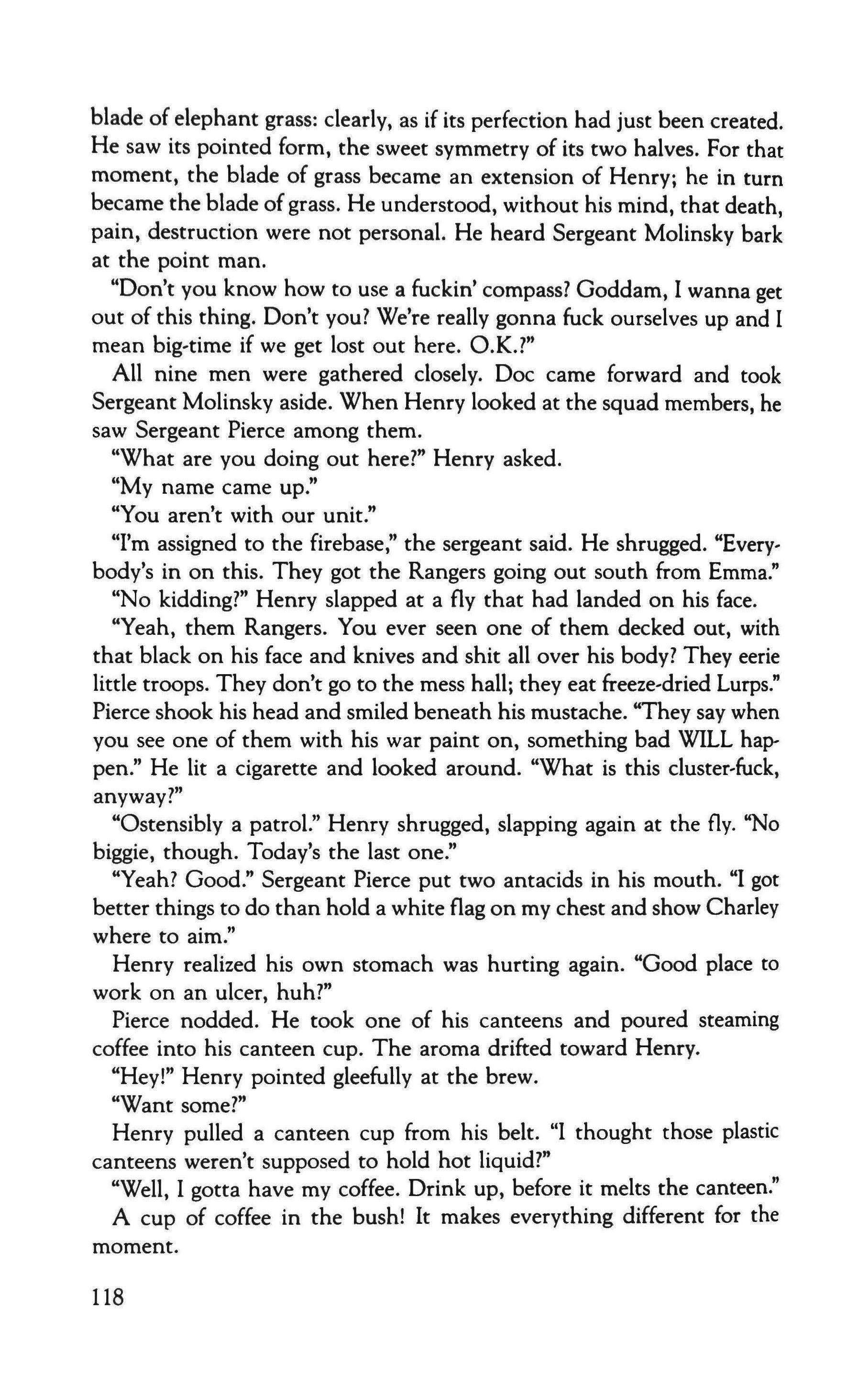
blade of elephant grass: clearly, as if its perfection had just been created. He saw its pointed form, the sweet symmetry of its two halves. For that moment, the blade of grass became an extension of Henry; he in turn became the blade of grass. He understood, without his mind, that death, pain, destruction were not personal. He heard Sergeant Molinsky bark at the point man.
"Don't you know how to use a fuckin' compass? Goddam, I wanna get out of this thing. Don't you? We're really gonna fuck ourselves up and I mean big-time if we get lost out here. O.K.?"
All nine men were gathered closely. Doc came forward and took Sergeant Molinskv aside. When Henry looked at the squad members, he saw Sergeant Pierce among them.
"What are you doing out here?" Henry asked.
"My name came up."
"You aren't with our unit."
"I'm assigned to the firebase," the sergeant said. He shrugged. "Every, body's in on this. They got the Rangers going out south from Emma."
"No kidding?" Henry slapped at a fly that had landed on his face.
"Yeah, them Rangers. You ever seen one of them decked out, with that black on his face and knives and shit all over his body? They eerie little troops. They don't go to the mess hall; they eat freeze-dried Lurps," Pierce shook his head and smiled beneath his mustache. "They say when you see one of them with his war paint on, something bad WILL hap' pen." He lit a cigarette and looked around. "What is this cluster-fuck, anyway?"
"Ostensibly a patrol." Henry shrugged, slapping again at the fly. "No biggie, though. Todav's the last one."
"Yeah? Good." Sergeant Pierce put two antacids in his mouth. "I got better things to do than hold a white flag on my chest and show Charley where to aim."
Henry realized his own stomach was hurting again. "Good place to work on an ulcer, huh?"
Pierce nodded. He took one of his canteens and poured steaming coffee into his canteen cup. The aroma drifted toward Henry.
"Hey!" Henry pointed gleefully at the brew.
"Want some?"
Henry pulled a canteen cup from his belt. "I thought those plastic canteens weren't supposed to hold hot liquid?"
"Well, I gotta have my coffee. Drink up, before it melts the canteen."
A cup of coffee in the bush! It makes everything different for the moment.
118
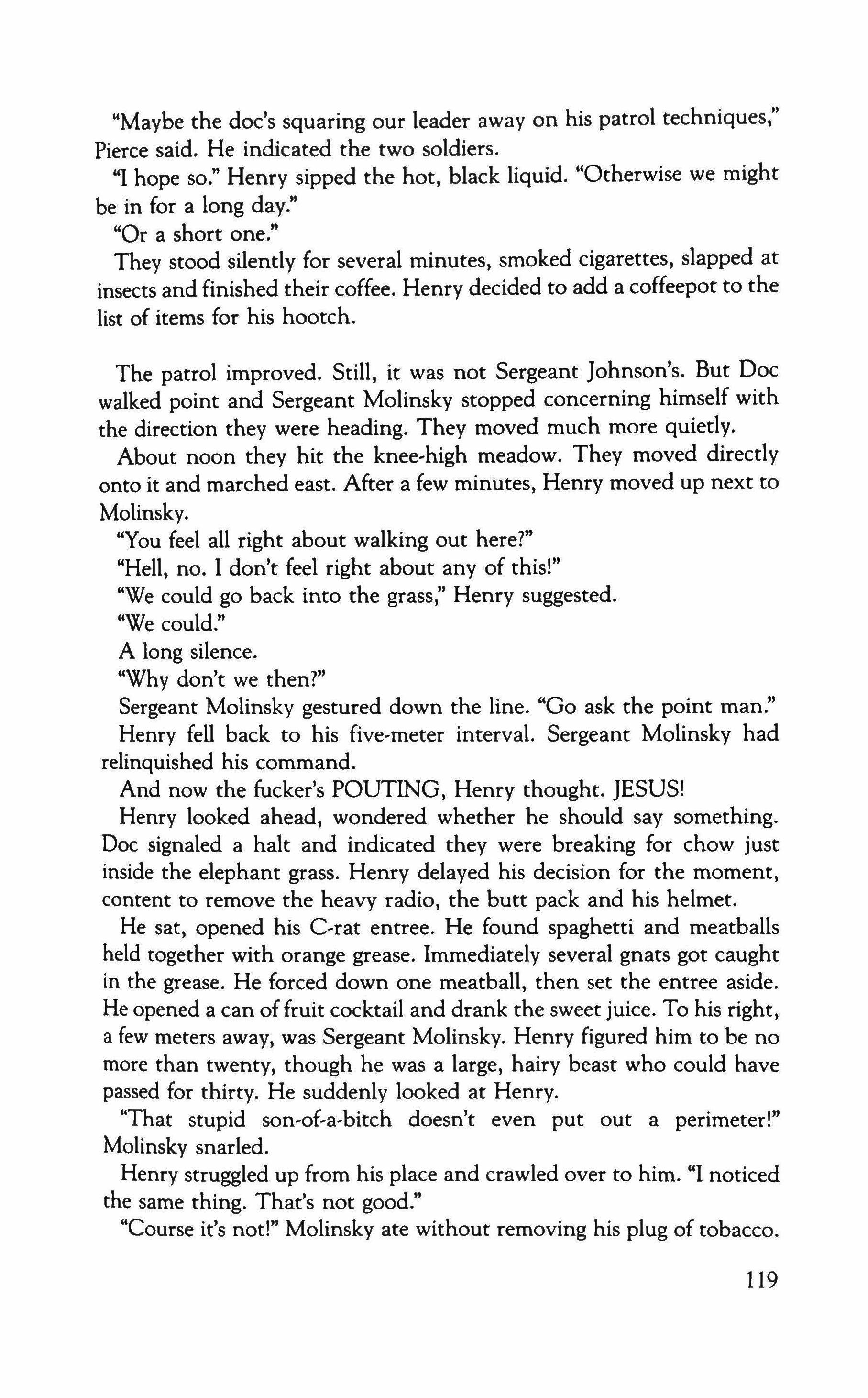
"Maybe the doc's squaring our leader away on his patrol techniques," Pierce said. He indicated the two soldiers.
"I hope so." Henry sipped the hot, black liquid. "Otherwise we might be in for a long day."
"Or a short one."
They stood silently for several minutes, smoked cigarettes, slapped at insects and finished their coffee. Henry decided to add a coffeepot to the list of items for his hootch.
The patrol improved. Still, it was not Sergeant Johnson's. But Doc walked point and Sergeant Molinsky stopped concerning himself with the direction they were heading. They moved much more quietly.
About noon they hit the knee-high meadow. They moved directly onto it and marched east. After a few minutes, Henry moved up next to Molinsky.
"You feel all right about walking out here?"
"Hell, no. I don't feel right about any of this!"
"We could go back into the grass," Henry suggested. "We could."
A long silence.
"Why don't we then?"
Sergeant Molinskv gestured down the line. "Go ask the point man." Henry fell back to his five-meter interval. Sergeant Molinsky had relinquished his command.
And now the fucker's POUTING, Henry thought. JESUS!
Henry looked ahead, wondered whether he should say something. Doc signaled a halt and indicated they were breaking for chow just inside the elephant grass. Henry delayed his decision for the moment, content to remove the heavy radio, the butt pack and his helmet.
He sat, opened his Cerat entree. He found spaghetti and meatballs held together with orange grease. Immediately several gnats got caught in the grease. He forced down one meatball, then set the entree aside. He opened a can offruit cocktail and drank the sweet juice. To his right, a few meters away, was Sergeant Molinsky. Henry figured him to be no more than twenty, though he was a large, hairy beast who could have passed for thirty. He suddenly looked at Henry.
"That stupid son-of-a-bitch doesn't even put out a perimeter!" Molinsky snarled.
Henry struggled up from his place and crawled over to him. "I noticed the same thing. That's not good."
"Course it's not!" Molinsky ate without removing his plug of tobacco.
119
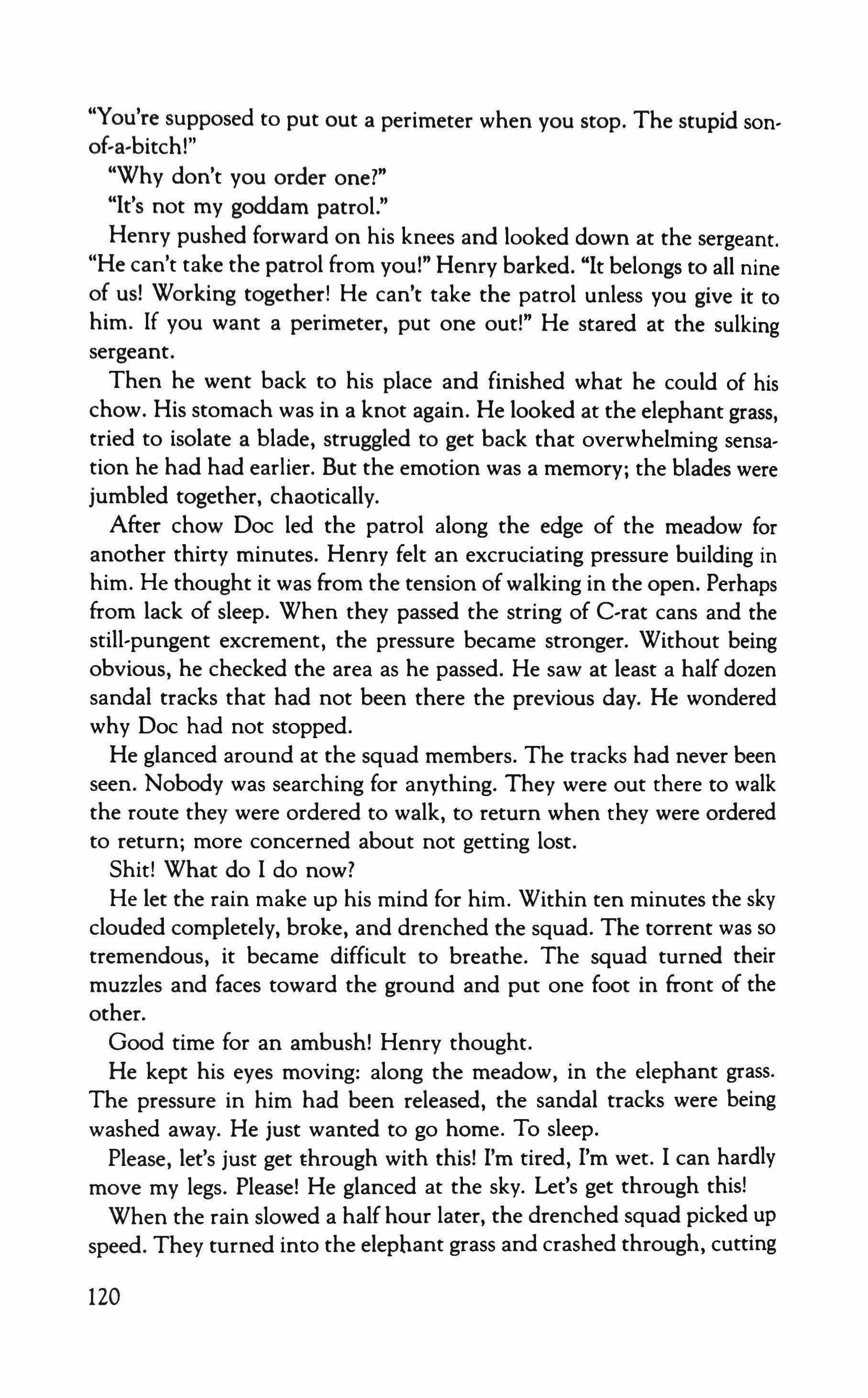
"You're supposed to put out a perimeter when you stop. The stupid sonof-a-bitch!"
"Why don't you order one?"
"It's not my goddam patrol."
Henry pushed forward on his knees and looked down at the sergeant. "He can't take the patrol from you!" Henry barked. "It belongs to all nine of us! Working together! He can't take the patrol unless you give it to him. If you want a perimeter, put one out!" He stared at the sulking sergeant.
Then he went back to his place and finished what he could of his chow. His stomach was in a knot again. He looked at the elephant grass, tried to isolate a blade, struggled to get back that overwhelming sensation he had had earlier. But the emotion was a memory; the blades were jumbled together, chaotically.
After chow Doc led the patrol along the edge of the meadow for another thirty minutes. Henry felt an excruciating pressure building in him. He thought it was from the tension of walking in the open. Perhaps from lack of sleep. When they passed the string of Cerat cans and the still-pungent excrement, the pressure became stronger. Without being obvious, he checked the area as he passed. He saw at least a half dozen sandal tracks that had not been there the previous day. He wondered why Doc had not stopped.
He glanced around at the squad members. The tracks had never been seen. Nobody was searching for anything. They were out there to walk the route they were ordered to walk, to return when they were ordered to return; more concerned about not getting lost.
Shit! What do I do now?
He let the rain make up his mind for him. Within ten minutes the sky clouded completely, broke, and drenched the squad. The torrent was so tremendous, it became difficult to breathe. The squad turned their muzzles and faces toward the ground and put one foot in front of the other.
Good time for an ambush! Henry thought. He kept his eyes moving: along the meadow, in the elephant grass. The pressure in him had been released, the sandal tracks were being washed away. He just wanted to go home. To sleep. Please, let's just get through with this! I'm tired, I'm wet. I can hardly move my legs. Please! He glanced at the sky. Let's get through this! When the rain slowed a half hour later, the drenched squad picked up speed. They turned into the elephant grass and crashed through, cutting
120
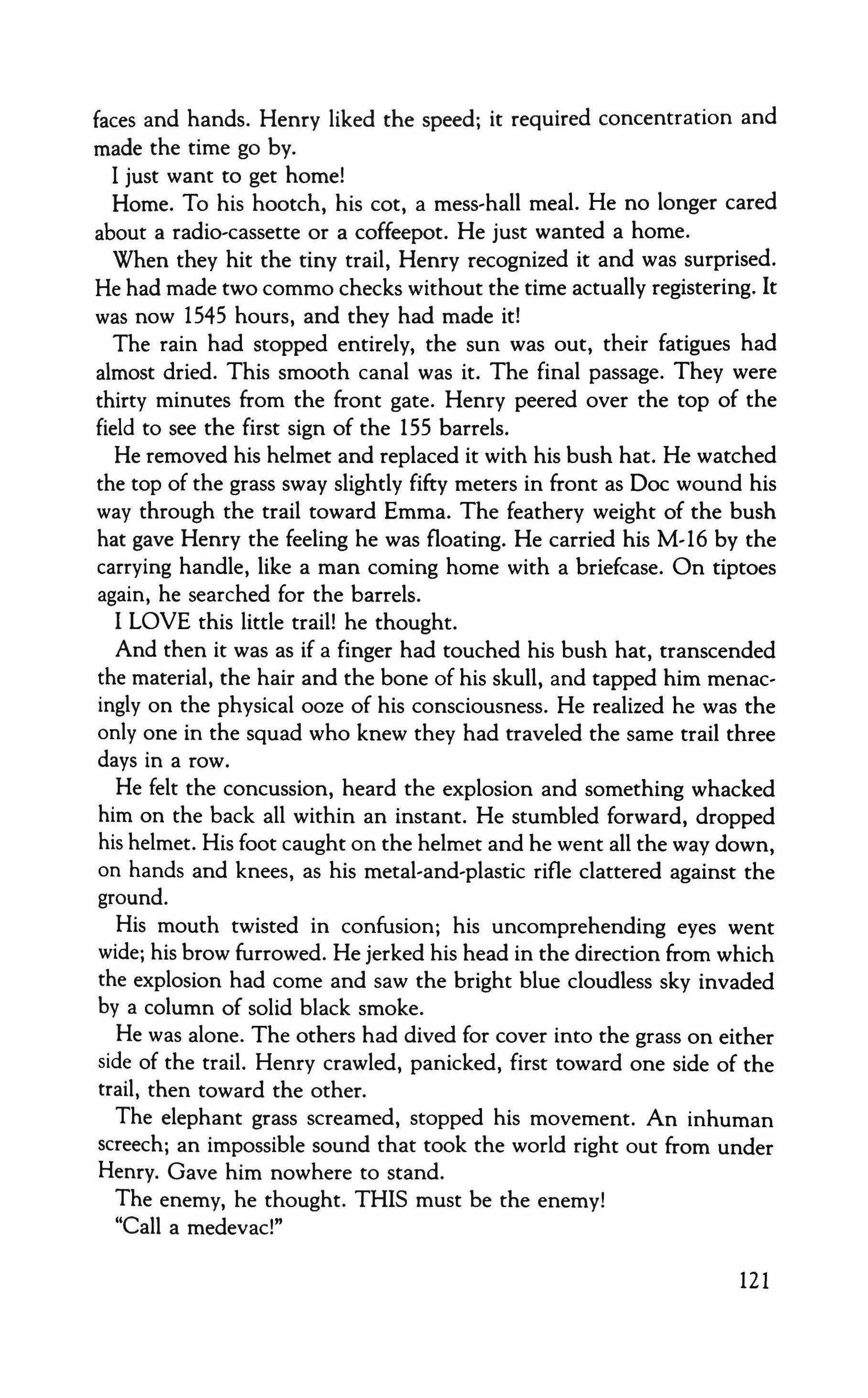
faces and hands. Henry liked the speed; it required concentration and made the time go by.
I just want to get home!
Home. To his hootch, his cot, a mess-hall meal. He no longer cared about a radio-cassette or a coffeepot. He just wanted a home.
When they hit the tiny trail, Henry recognized it and was surprised. He had made two commo checks without the time actually registering. It was now 1545 hours, and they had made it!
The rain had stopped entirely, the sun was out, their fatigues had almost dried. This smooth canal was it. The final passage. They were thirty minutes from the front gate. Henry peered over the top of the field to see the first sign of the 155 barrels.
He removed his helmet and replaced it with his bush hat. He watched the top of the grass sway slightly fifty meters in front as Doc wound his way through the trail toward Emma. The feathery weight of the bush hat gave Henry the feeling he was floating. He carried his M�16 by the carrying handle, like a man coming home with a briefcase. On tiptoes again, he searched for the barrels.
I LOVE this little trail! he thought.
And then it was as if a finger had touched his bush hat, transcended the material, the hair and the bone of his skull, and tapped him menacingly on the physical ooze of his consciousness. He realized he was the only one in the squad who knew they had traveled the same trail three days in a row.
He felt the concussion, heard the explosion and something whacked him on the back all within an instant. He stumbled forward, dropped his helmet. His foot caught on the helmet and he went all the way down, on hands and knees, as his metal-and-plastic rifle clattered against the ground.
His mouth twisted in confusion; his uncomprehending eyes went wide; his brow furrowed. He jerked his head in the direction from which the explosion had come and saw the bright blue cloudless sky invaded by a column of solid black smoke.
He was alone. The others had dived for cover into the grass on either side of the trail. Henry crawled, panicked, first toward one side of the trail, then toward the other.
The elephant grass screamed, stopped his movement. An inhuman screech; an impossible sound that took the world right out from under Henry. Gave him nowhere to stand.
The enemy, he thought. THIS must be the enemy!
"Call a medevac!"
121

"Ahhhhhhhhh!" From the elephant grass.
"Call a medevac!"
"Gaaaaawwwwwd!!!!!"
"Call a goddam medevac!!!"
Henry pressed his hands and knees into the unstable earth and tried to isolate the bellow which had paralyzed him. He turned his head toward the smoke again. It billowed black against the sky. It doesn't belong here! That color isn't right! The enemy is a SOUND! A HOWL! I was HOME! A HOWWWL!!!
"Ahhhhhhhhhhhhggghhh!!!"
Henry wanted to run. Toward the firebase. He thought: if only I can get back there, everything will be back to normal; everything will be O.K.; this will stop happening. The Donut Dollies are there. We'll watch them. Hurry! It's this way! Watch the show and everything will be in order! Everything will be in order! Everything will be in order!
He felt as though he were on his feet, and they pounded down the tiny trail. He thought he dropped the helmet, the rifle. His arms pumped freely. He threw aside his flak jacket, his boots and fatigues; tore away the dog tags and ran harder. But for the radio, which he could not get rid of, he felt absolutely naked.
"Walker! Call a medevac!"
Henry twisted from his hands and knees, sat on his butt, and fumbled for the mike.
Call a medevac? How do you do that?
"Sir!!!" he bellowed into the mike. "Sir, this is Walker. Over!"
He waited a part of a second and keyed the mike again.
"Lieutenant Miller! Lieutenant Miller!!! Come in!!! Please!"
"Don't call me that over the air!"
"Sir! We've been HIT!!! How do you call a medevac???"
"Goddamrnit, Walker! Calm down! What happened?"
"What happened? I don't know. We've been HIT! We need a medevac! We need a medevac! We need a medevac!"
"Where are you?"
"Out in the fucking elephant grass! We've been hit! There's people screaming! The GRASS is screaming!"
"A mine!" Sergeant Molinsky shouted.
"A mine!" Henry roared into the mike. "A mine! A mine! We've been hit with a mine!"
"How many wounded?"
"How many? I don't know! Everybody looks wounded to me. There's
122

somebody over by the smoke. And there's something in the grass! I'm the only one standing!!!"
"Wait one," the lieutenant said, and the radio went dead.
Expecting his world to explode entirely, knowing he was impotent to defend himself, Henry kept his body planted in one spot. He began to see details.
Where the black smoke had cleared, Sergeant Molinsky knelt over a body. It faced away from Henry, the back of its pants torn away. Where there should have been a buttocks, was merely a plane of raw, jagged flesh.
That color, too, is not right here! Not a red like that out here, in the gray-green grass!
A few feet away, at the edge ofthe trail, was a combat boot, on its side. A shredded pants leg and a piece of meat appeared to flow from the top of the boot.
A loud rustling carne from the grass behind him. He turned, startled.
Doc was pulling a soldier onto the trail. The soldier moaned; his hands hovered near his bloody thigh where a white piece of bone protruded.
How could this happen? We were HOME!
Slowly the trail filled again. Henry counted. Eight, including the soldier with the bone sticking out. And the body made nine.
This isn't fair! They should be watching the Donut Dollies!
But he couldn't see Sergeant Pierce. He searched the frightened faces quickly. Then, in horror, he arose and started walking toward the body.
"Don't move!" Doc yelled. ''There may be mines all over. Everybody stay where you are!"
The radio broke squelch in Henry's ear.
"Five four, this is Victor Alpha. Over."
"Go ahead," Henry returned, calmly, his attention on the buttless body.
"Five four, Alpha. I saw your smoke. A Dust-oft's on the way. Pop green when you see him. If you start taking incoming, pop red. You've got smoke canisters, right?"
"Pop green ."
"You got a count on the wounded?"
Doc was walking carefully by. "Tell him one KIA from a Bouncing Betty, and a fracture from a fall."
"One Kilo India Alpha; one fracture Henry still stared at the back of the crumpled body. He continued to talk into the mike. "It couldn't
123
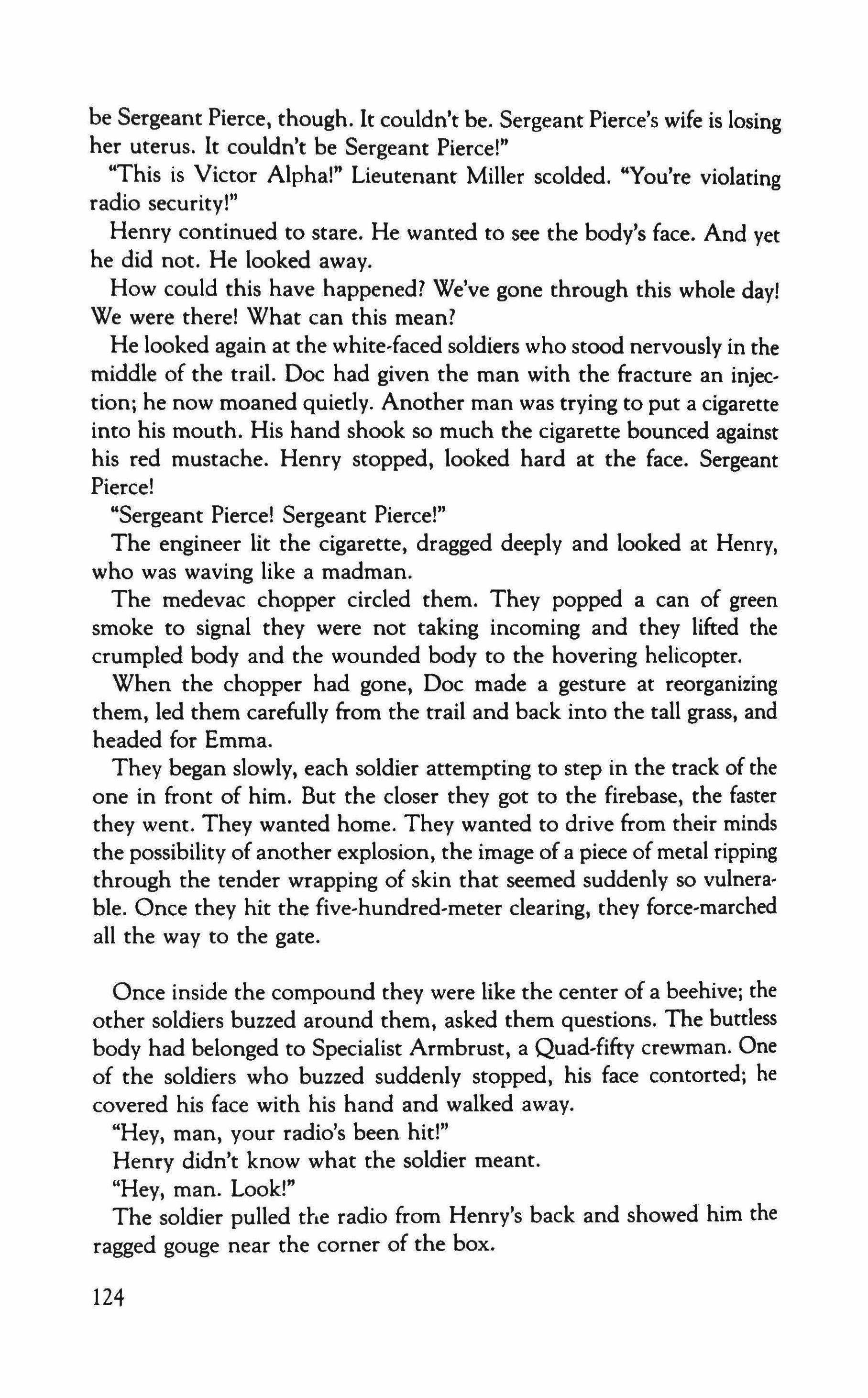
be Sergeant Pierce, though. It couldn't be. Sergeant Pierce's wife is losing her uterus. It couldn't be Sergeant Pierce!"
"This is Victor Alpha!" Lieutenant Miller scolded. "You're violating radio security!"
Henry continued to stare. He wanted to see the body's face. And yet he did not. He looked away.
How could this have happened? We've gone through this whole day! We were there! What can this mean?
He looked again at the white-faced soldiers who stood nervously in the middle of the trail. Doc had given the man with the fracture an injection; he now moaned quietly. Another man was trying to put a cigarette into his mouth. His hand shook so much the cigarette bounced against his red mustache. Henry stopped, looked hard at the face. Sergeant Pierce!
"Sergeant Pierce! Sergeant Pierce!"
The engineer lit the cigarette, dragged deeply and looked at Henry, who was waving like a madman.
The medevac chopper circled them. They popped a can of green smoke to signal they were not taking incoming and they lifted the crumpled body and the wounded body to the hovering helicopter.
When the chopper had gone, Doc made a gesture at reorganizing them, led them carefully from the trail and back into the tall grass, and headed for Emma.
They began slowly, each soldier attempting to step in the track of the one in front of him. But the closer they got to the firebase, the faster they went. They wanted home. They wanted to drive from their minds the possibility of another explosion, the image of a piece of metal ripping through the tender wrapping of skin that seemed suddenly so vulnerable. Once they hit the five-hundred-meter clearing, they force-marched all the way to the gate.
Once inside the compound they were like the center of a beehive; the other soldiers buzzed around them, asked them questions. The buttless body had belonged to Specialist Armbrust, a Quad-fifty crewman. One of the soldiers who buzzed suddenly stopped, his face contorted; he covered his face with his hand and walked away.
"Hey, man, your radio's been hit!"
Henry didn't know what the soldier meant.
"Hey, man. Look!"
The soldier pulled the radio from Henry's back and showed him the ragged gouge near the corner of the box.
124

"Wow, if you hadn't been wearing that you'd be breathing with one lung right now!" The soldier's voice was loud, frantic.
Henry stared at the torn metal, ran his finger across it, and cut the end of it. As he squeezed the tip of his finger, blood appeared: bright red in the sunlight.
"What was it like out there, man? What was it like?" the soldier shouted.
Henry looked away, at the clouds forming on the western horizon. Billowy, soft: puffy gray centers.
Dropping his gaze, he saw a group of six or seven men. One carried a sawed-off shotgun, another had bandoleers of M,60 ammo crisscrossed on his chest. Their faces were blackened and expressionless. They remained at a distance, watching.
Rangers, Henry knew.
Immediately Henry returned his radio to the TOC. He went back to his hootch, sat on his bunk and tried not to think: grabbed the sides of his head to prevent it. He massaged his neck below the chin. He struggled to find the relief he had felt the two previous days he had returned. Something was lodged in his throat.
This time I didn't make it back!
He went outside and tried to vomit.
125
Poetry and Prose
John Peck
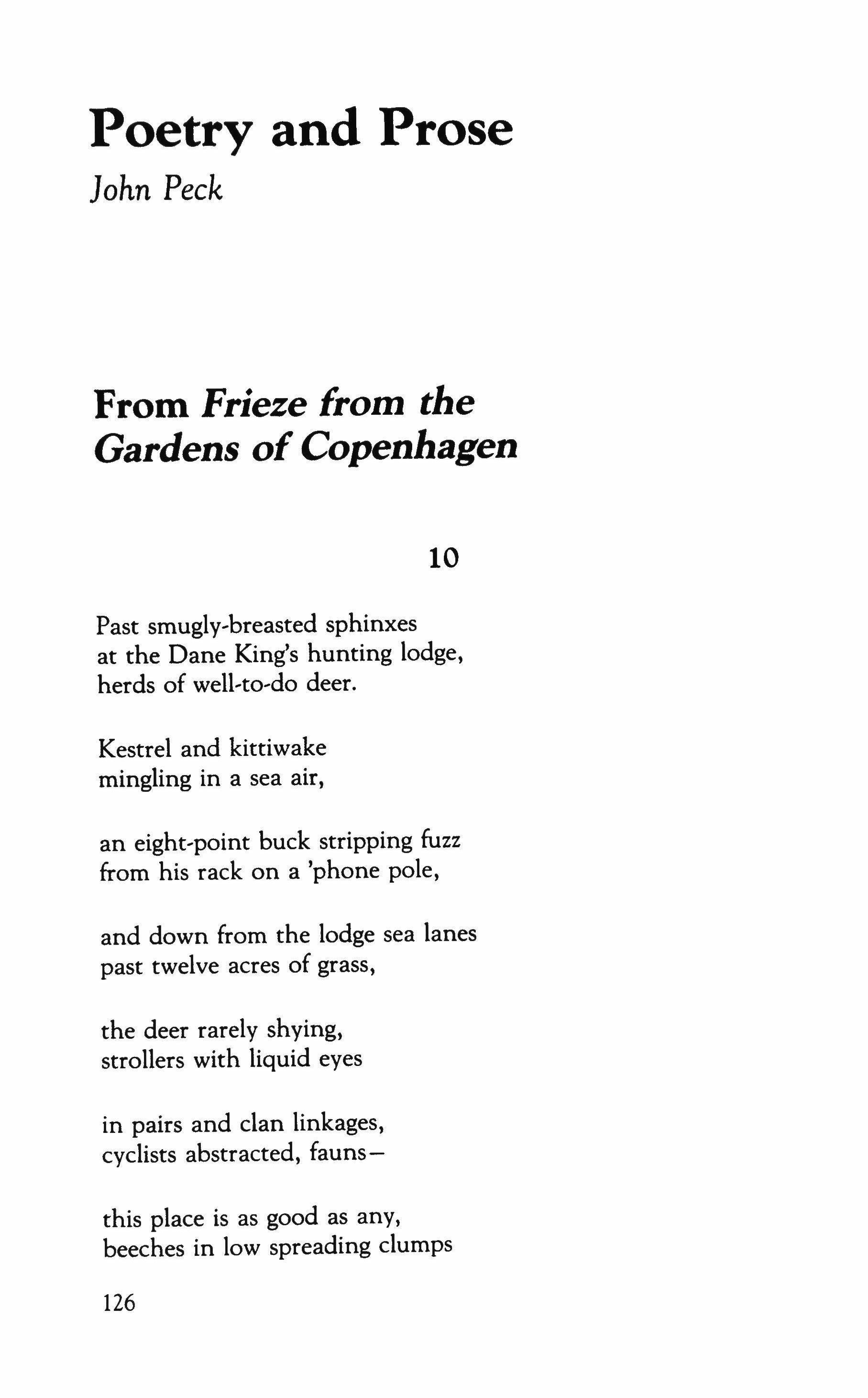
From Frieze from the Gardens of Copenhagen 10
Past smugly-breasted sphinxes at the Dane King's hunting lodge, herds of well-to-do deer.
Kestrel and kittiwake mingling in a sea air, an eight-point buck stripping fuzz from his rack on a 'phone pole, and down from the lodge sea lanes past twelve acres of grass, the deer rarely shying, strollers with liquid eyes in pairs and clan linkages, cyclists abstracted, faunsthis place is as good as any, beeches in low spreading clumps
126

and shadowy stands, to begin the accounting again.
For here
the lull, the lay of parenthesis in sweeping but struck phrasing, is a calm too assiduously preserved to remain restful, passed over by too many wings. This is the lagoon.
Then a lizard peering up: Attendez, this is not quite the place
you may think it is! And I nodded in deference to his seniority.
Nothing personal, you understand, but deposits should not be left
uninsured, the management has become notorious for its fudging.
It would have been an affront, asking him how he came there,
or inquiring into his ancestry. He sensed my tact and ventured, Betrayer, and destroyer, and now you're turning the knife on yourself? They will live. But differently, differently.
There is much humor in this, as I'm sure you have confessed, much that is ridiculous, irreplaceable! His eyes glistened.
127

Pouring through forms, a peace that would not end though they would made the cloud-swish of wheat-spill, of a scythe's way-making or voices dimly clamorous, pushing a little group out through a gap in the dirt under his breathing feet-
so peace was going to be set down in the windy book yet for gooda widow sickling her lord's field up and down one long day in order to free her son, and finishing, she fell down, my intact lizard grinning as he reclaimed the acre, its colors wheat, sweat, and sunset under the blade's hard breathing-
hush, little four legs, don't you tease, you have led me far enoughand where I stood was stubble on the berm of a raised path, where I swayed was cleared ground. Peace will try many forms, Abram and knife and ram and she who was each of them, fabled but untallied where the doe arcs and slides.
128
Space, the dying stag, browses in the wood of Charlottenlund.
Grace in spotted flesh darting and the wide light
that returns, leather tuck of his mouth not yet anticipating its red froth, and over him breathing's blue lull harboring the greatest fundamental, expectancy a pruned and changeless zone ruthlessly to be changed.
Kestrel and kittiwake planing in from the sea.
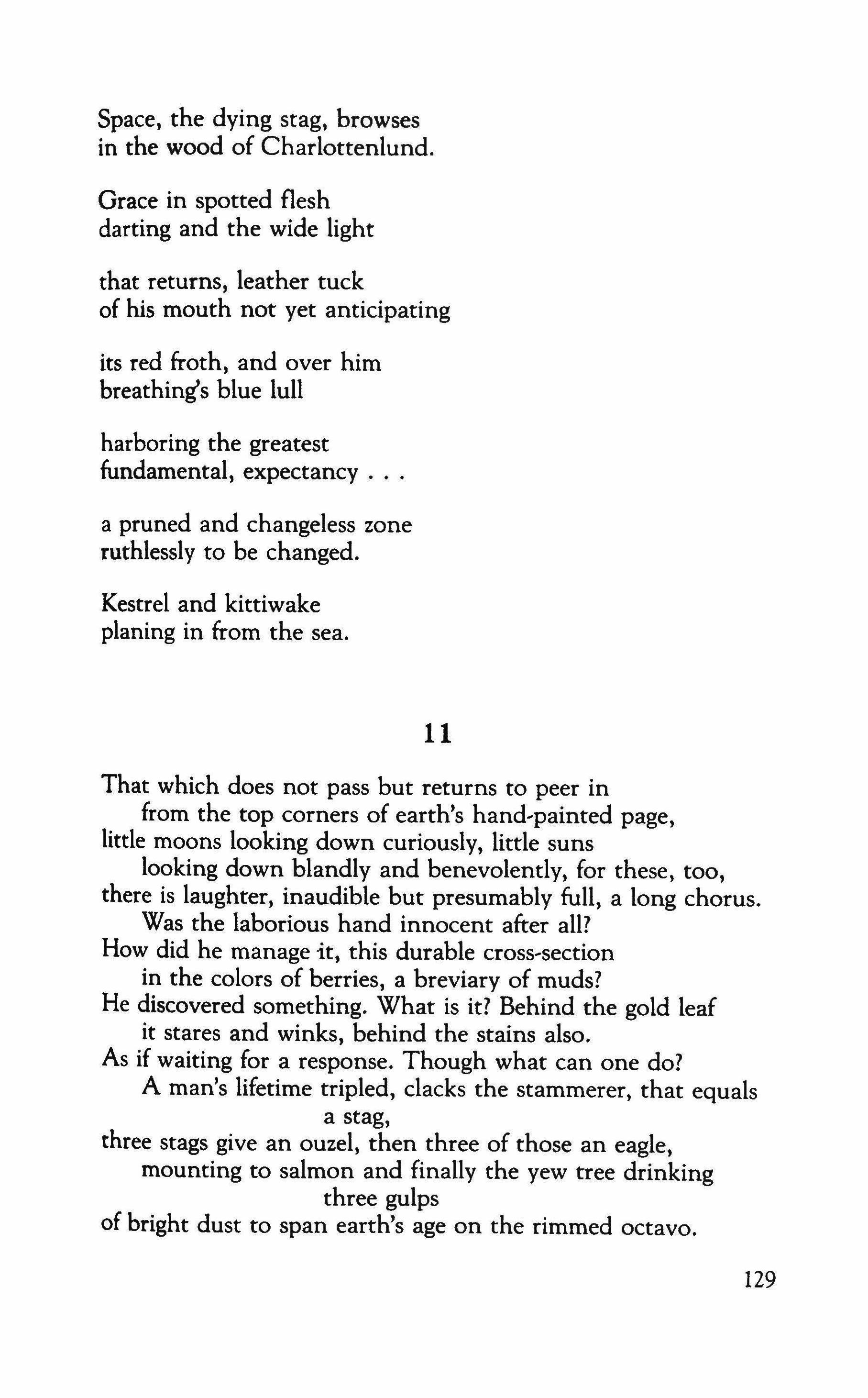
11
That which does not pass but returns to peer in from the top corners of earth's hand-painted page, little moons looking down curiously, little suns looking down blandly and benevolently, for these, too, there is laughter, inaudible but presumably full, a long chorus. Was the laborious hand innocent after all? How did he manage -it, this durable cross-section in the colors of berries, a breviary of muds? He discovered something. What is it? Behind the gold leaf it stares and winks, behind the stains also. As if waiting for a response. Though what can one do?
A man's lifetime tripled, clacks the stammerer, that equals a stag, three stags give an ouzel, then three of those an eagle, mounting to salmon and finally the yew tree drinking three gulps of bright dust to span earth's age on the rimmed octavo.
129
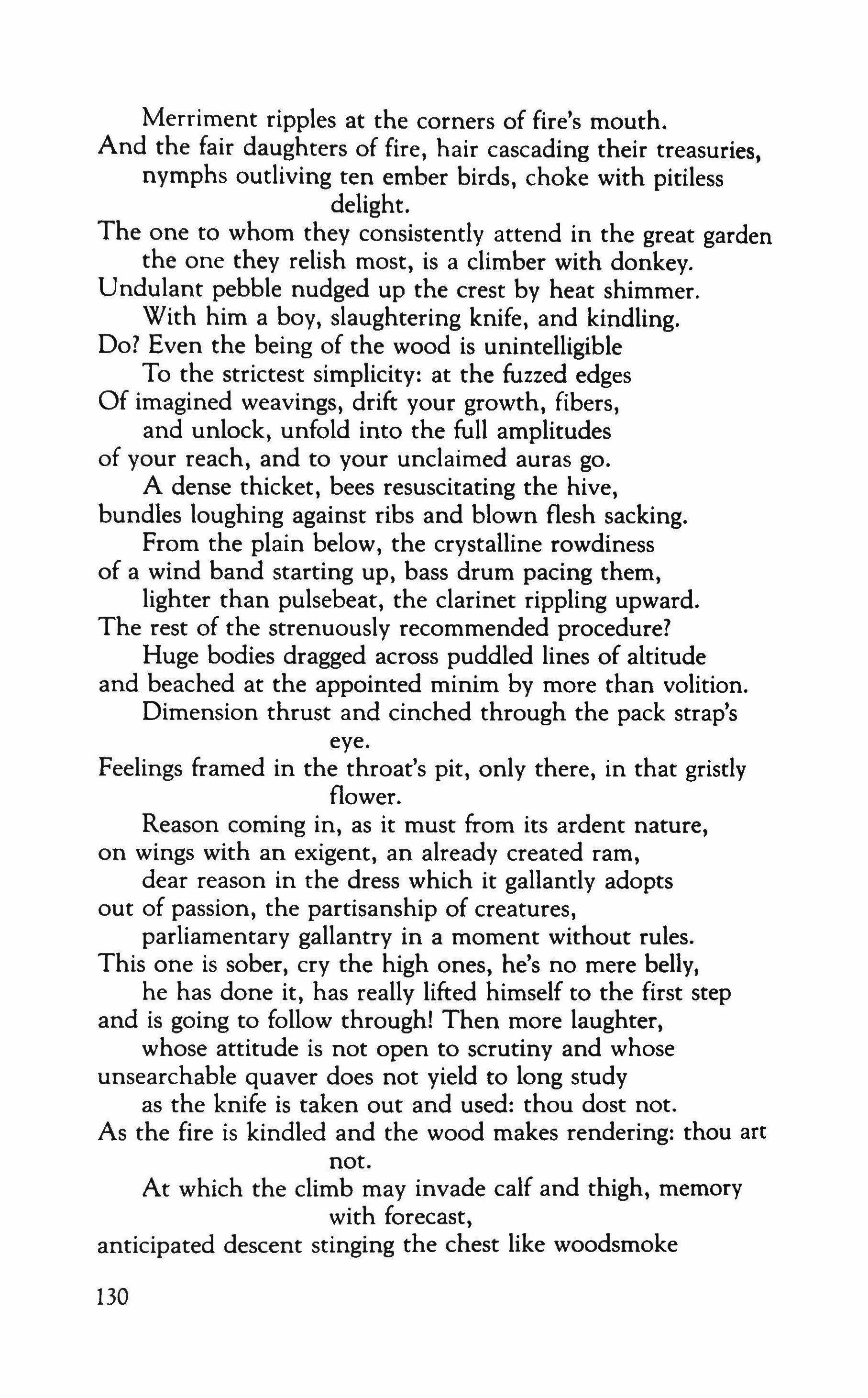
Merriment ripples at the corners of fire's mouth. And the fair daughters of fire, hair cascading their treasuries, nymphs outliving ten ember birds, choke with pitiless delight.
The one to whom they consistently attend in the great garden the one they relish most, is a climber with donkey. Undulant pebble nudged up the crest by heat shimmer. With him a boy, slaughtering knife, and kindling. Do? Even the being of the wood is unintelligible To the strictest simplicity: at the fuzzed edges Of imagined weavings, drift your growth, fibers, and unlock, unfold into the full amplitudes of your reach, and to your unclaimed auras go.
A dense thicket, bees resuscitating the hive, bundles loughing against ribs and blown flesh sacking. From the plain below, the crystalline rowdiness of a wind band starting up, bass drum pacing them, lighter than pulsebeat, the clarinet rippling upward. The rest of the strenuously recommended procedure? Huge bodies dragged across puddled lines of altitude and beached at the appointed minim by more than volition. Dimension thrust and cinched through the pack strap's eye.
Feelings framed in the throat's pit, only there, in that gristly flower.
Reason coming in, as it must from its ardent nature, on wings with an exigent, an already created ram, dear reason in the dress which it gallantly adopts out of passion, the partisanship of creatures, parliamentary gallantry in a moment without rules. This one is sober, cry the high ones, he's no mere belly, he has done it, has really lifted himself to the first step and is going to follow through! Then more laughter, whose attitude is not open to scrutiny and whose unsearchable quaver does not yield to long study as the knife is taken out and used: thou dost not. As the fire is kindled and the wood makes rendering: thou art not.
At which the climb may invade calf and thigh, memory with forecast, anticipated descent stinging the chest like woodsmoke
130

at work in the persevering eyes: so he has accomplished this thing about which the stone is speechless, crackling wood also,
over which the soaring chorus also flies speechless, done it like a man up there on a mountain in Copenhagen, over the gardens and the sea. And the aeons of light were still.
131
From A Roman Dictionary
for Philipp and Raina Fehl
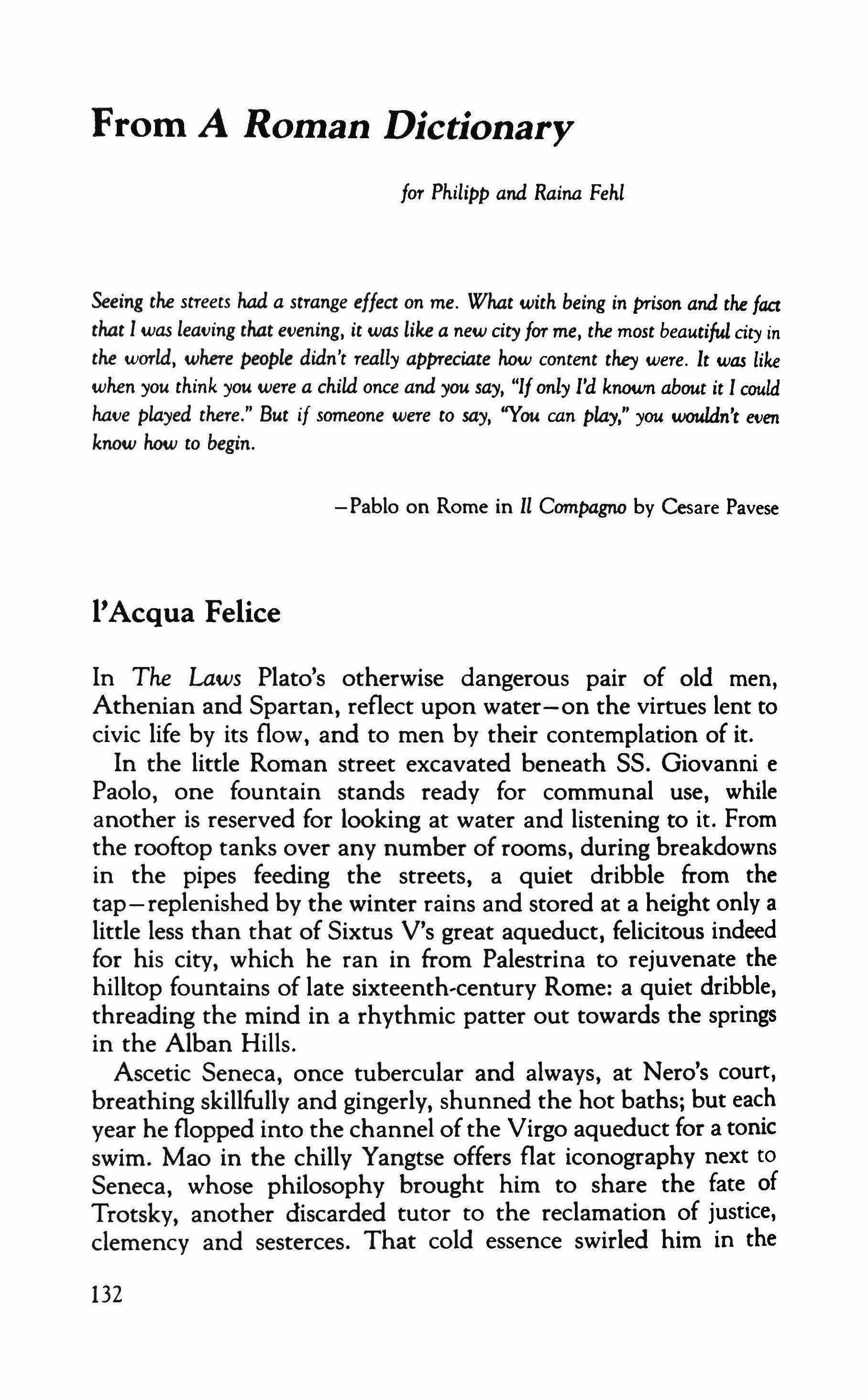
Seeing the streets had a strange effect on me. What with being in prison and the faa that I was leaving that evening, it was like a new city for me, the most beautiful city in the world, where people didn't really appreciate how content they were. It was like when you think you were a child once and you say, "Ifonly I'd known about it I could have played there." But if someone were to say, "You can play," you wouldn't even know how to begin.
l'Acqua Felice
In The Laws Plato's otherwise dangerous pair of old men, Athenian and Spartan, reflect upon water-on the virtues lent to civic life by its flow, and to men by their contemplation of it.
In the little Roman street excavated beneath SS. Giovanni e Paolo, one fountain stands ready for communal use, while another is reserved for looking at water and listening to it. From the rooftop tanks over any number of rooms, during breakdowns in the pipes feeding the streets, a quiet dribble from the tap-replenished by the winter rains and stored at a height only a little less than that of Sixtus V's great aqueduct, felicitous indeed for his city, which he ran in from Palestrina to rejuvenate the hilltop fountains of late sixteenth-century Rome: a quiet dribble, threading the mind in a rhythmic patter out towards the springs in the Alban Hills.
Ascetic Seneca, once tubercular and always, at Nero's court, breathing skillfully and gingerly, shunned the hot baths; but each year he flopped into the channel ofthe Virgo aqueduct for a tonic swim. Mao in the chilly Yangtse offers flat iconography next to Seneca, whose philosophy brought him to share the fate of Trotsky, another discarded tutor to the reclamation of justice, clemency and sesterces. That cold essence swirled him in the
- Pablo on Rome in II Compagna by Cesare Pavese
132
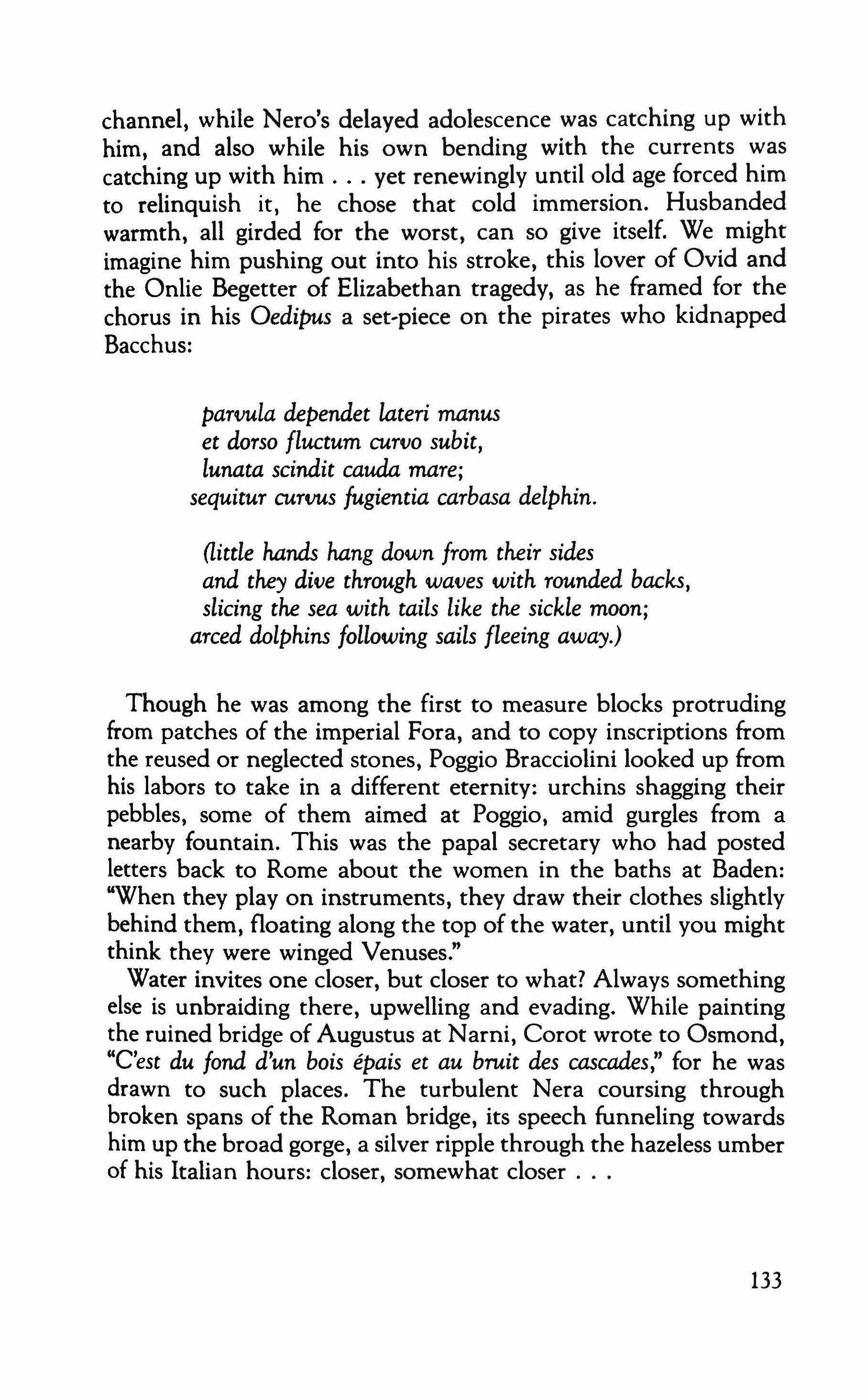
channel, while Nero's delayed adolescence was catching up with him, and also while his own bending with the currents was catching up with him yet renewingly until old age forced him to relinquish it, he chose that cold immersion. Husbanded warmth, all girded for the worst, can so give itself. We might imagine him pushing out into his stroke, this lover of Ovid and the Onlie Begetter of Elizabethan tragedy, as he framed for the chorus in his Oedipus a set-piece on the pirates who kidnapped Bacchus:
parvula dependet Laten manus et dorso fluctum CUTVO subit, lunata scindit cauda mare; sequitur curtlUs fugientia carbasa delphin.
(little hands hang down from their sides and they dive through waves with rounded backs, slicing the sea with tails like the sickle moon; arced dolphins following sails fleeing away.)
Though he was among the first to measure blocks protruding from patches of the imperial Fora, and to copy inscriptions from the reused or neglected stones, Poggio Bracciolini looked up from his labors to take in a different eternity: urchins shagging their pebbles, some of them aimed at Poggio, amid gurgles from a nearby fountain. This was the papal secretary who had posted letters back to Rome about the women in the baths at Baden: "When they play on instruments, they draw their clothes slightly behind them, floating along the top of the water, until you might think they were winged Venuses."
Water invites one closer, but closer to what? Always something else is unbraiding there, upwelling and evading. While painting the ruined bridge of Augustus at Narni, Corot wrote to Osmond, "C'est du fond d'un bois epais et au bruit des cascades," for he was drawn to such places. The turbulent Nera coursing through broken spans of the Roman bridge, its speech funneling towards him up the broad gorge, a silver ripple through the hazeless umber of his Italian hours: closer, somewhat closer
133
gli Alpini
Tourists slung with cameras spill onto the piazza before a baroque church in Rome's center. In their late fifties and early sixties, the men nonetheless wear knee socks, leather breeches with pouches and flaps along the outer thighs, and Pinocchio caps with feathers tipped at a rakish angle. Neither German nor Swiss, they are Italian veterans on a reunion tour chaperoned by uniformly substantial wives. These are the crack mountain troops from the Second War, the Alpini, lineal descendants of Roman legions assigned to alpine duty, the gaesates. Their regimental fathers scaled snowfields and needles in the Dolomites to carve out a stalemate with their Austrian counterparts in the First War. Trappings and insignia pronounce distinction; slouching camaraderie expresses boyish sameness. A detachment of the human family on parade and holiday in the afternoon of their time on earth, they gawk at gates and portals to what Dante called "this small round threshing-floor that makes us passionate." Medieval intuitions? Daily folk, they sport an ancient heraldry, and paunchy now, they once shared the trials and elations of an elite. But their vestigial brotherhood ("Come on, attaboy!") quickens the kindred intuition that the vivid aspects of a life may look and feel allegorical without amounting to the real thing. One does not enlist in the real thing only to be discharged from it, decorated, for happy reunions.
A harsh reflection, Dantesque again. Journeys into high places with assigned companions, if they remain only literal agonies and if they leave inner motives dormant, may dwindle to shoulder patches and festive interludes in an eternal city. The first alpinista got no insignia for his pains. His Lieutenant Commander prompted him, "Figliuol mio, in/in quivi ti rira," while gesturing towards a rocky ledge. "Haul yourself up this far, my son." ("Come on, boy, get a leg up on this ledge. Attaboy, only a little farther now.") How far? The mile marker read, Canto IV.
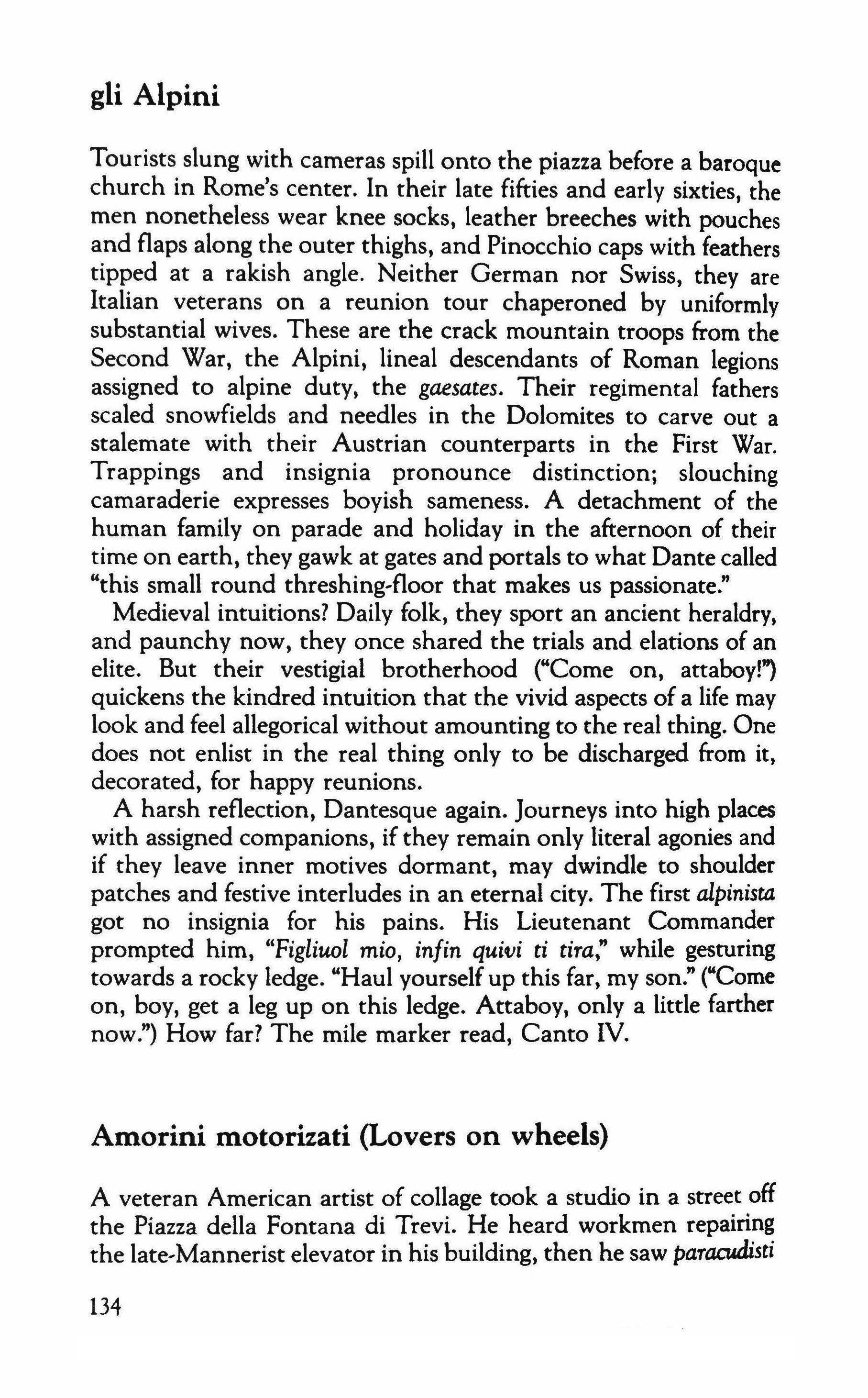
A veteran American artist of collage took a studio in a street off the Piazza della Fontana di Trevi. He heard workmen repairing the late,Mannerist elevator in his building, then he saw parac:udisti
Amorini motorizati {Lovers on wheels)
134

with submachineguns patrolling the roof. His neighbors did not know what was up, and the lovers who parked their cars in his lane after five were not interested. It was only during a short trip to France, reading the public prints, that he gleaned the facts: his building was being reconditioned for occupancy by the Republic's distinguished and aging President.
Back in Rome, late one afternoon he heard muffled banging from the shaft of the accensore. The workmen made a different sort ofnoise, and besides, they were gone now. What reached his ears were the rhythms of genteel octogenarian desperation. If the paracudisti also heard them, they were not interested, being already engaged in ogling the amorini motorizati. The artist had to act. Where were the emergency numbers? Missing. Returning to his worktable, his hands suspended over the assemblage of the moment, he felt crawl over him an intuition which the man of the New World, time'eating and space-jimmying barbarian, senses most completely, perhaps, in this navel of the Old World: that his person had been incorporated into her summary bricolage.
gli Arachidi di Mussolini, Pacero di Jefferson (Mussolini's peanuts and Jefferson's maple tree)
Tracing the advent of olive trees in Italy to the reign of Priscus Tarquin, the late medieval historian Flavio Biondo notes in his Triumphantes Romae, Book Eight, that the cherry tree came into Italy primum anno urbis sexentesimo octagesimo, brought by Lucullus ex potu», by boat.
Shortly after the Duce pushed Italy into World War Two, Ezra Pound lobbied in the Rome press for the wholesale cultivation of a cheap foodstuff: peanuts. But the Fascist government did not bite. And so then Pound imported American maple trees into the Italian Tyrol and attempted, in vain, to promote the notion of still another cash crop (Canto LXXIV: "and the wops do not use maple syrup").
At this juncture, however, legend won out over fact. Hubert Creekmore asserted the legend, which the poet's defender Hugh Kenner has echoed, that tangled in the rootlets of Pound's fragile
135
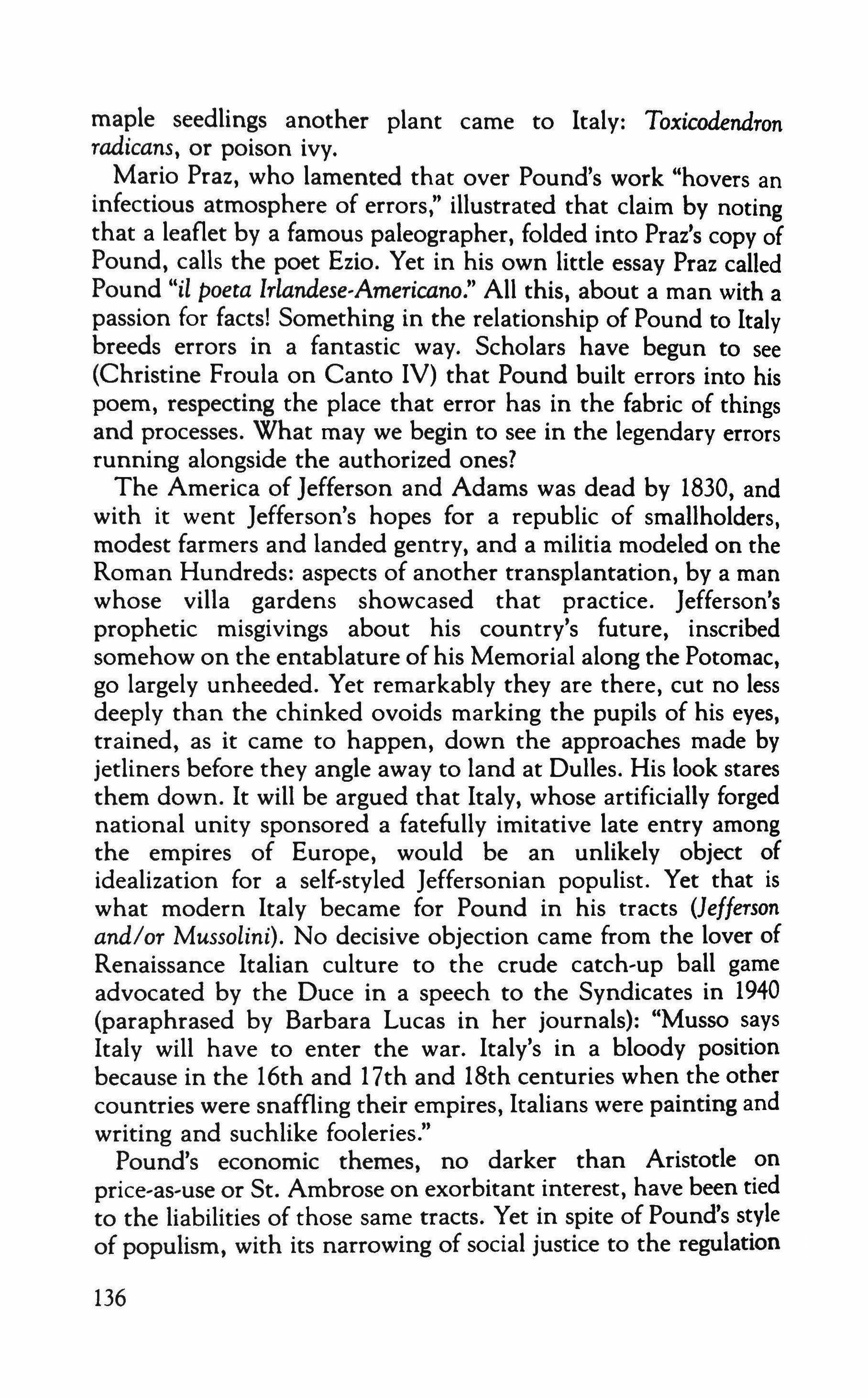
maple seedlings another plant came to Italy: Toxicodendron radicans, or poison ivy.
Mario Praz, who lamented that over Pound's work "hovers an infectious atmosphere of errors," illustrated that claim by noting that a leaflet by a famous paleographer, folded into Praz's copy of Pound, calls the poet Ezio. Yet in his own little essay Praz called Pound "i! poeta lrlandese-Americano." All this, about a man with a passion for facts! Something in the relationship of Pound to Italy breeds errors in a fantastic way. Scholars have begun to see (Christine Froula on Canto IV) that Pound built errors into his poem, respecting the place that error has in the fabric of things and processes. What may we begin to see in the legendary errors running alongside the authorized ones?
The America of Jefferson and Adams was dead by 1830, and with it went Jefferson's hopes for a republic of smallholders, modest farmers and landed gentry, and a militia modeled on the Roman Hundreds: aspects of another transplantation, by a man whose villa gardens showcased that practice. Jefferson's prophetic misgivings about his country's future, inscribed somehow on the entablature of his Memorial along the Potomac, go largely unheeded. Yet remarkably they are there, cut no less deeply than the chinked ovoids marking the pupils of his eyes, trained, as it came to happen, down the approaches made by jetliners before they angle away to land at Dulles. His look stares them down. It will be argued that Italy, whose artificially forged national unity sponsored a fatefully imitative late entry among the empires of Europe, would be an unlikely object of idealization for a self-styled Jeffersonian populist. Yet that is what modern Italy became for Pound in his tracts (Jefferson and/or Mussolini). No decisive objection came from the lover of Renaissance Italian culture to the crude catch-up ball game advocated by the Duce in a speech to the Syndicates in 1940 (paraphrased by Barbara Lucas in her journals): "Musso says Italy will have to enter the war. Italy's in a bloody position because in the 16th and 17th and 18th centuries when the other countries were snaffling their empires, Italians were painting and writing and suchlike fooleries."
Pound's economic themes, no darker than Aristotle on price-as-use or St. Ambrose on exorbitant interest, have been tied to the liabilities of those same tracts. Yet in spite of Pound's style of populism, with its narrowing of social justice to the regulation
136
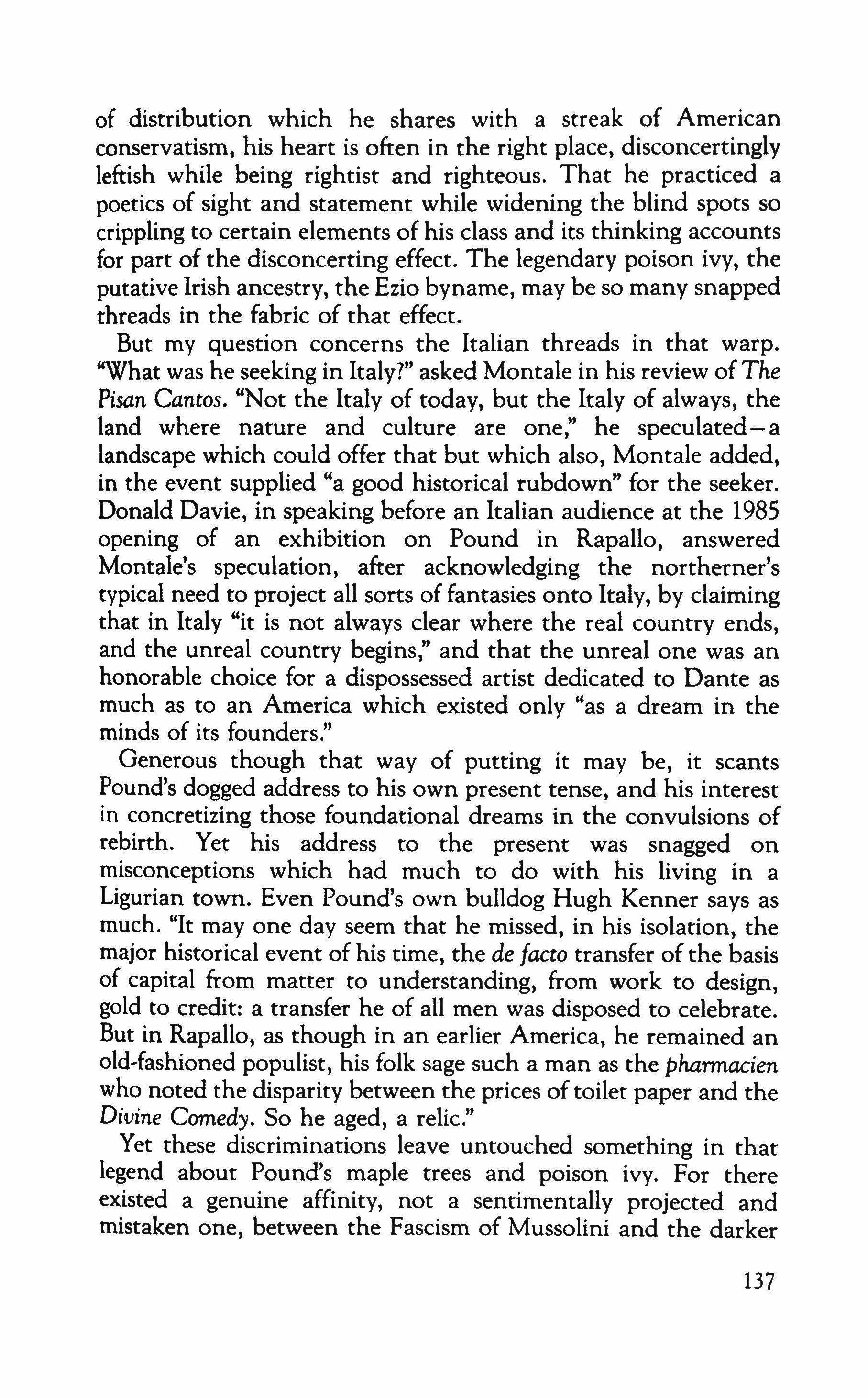
of distribution which he shares with a streak of American conservatism, his heart is often in the right place, disconcertingly leftish while being rightist and righteous. That he practiced a poetics of sight and statement while widening the blind spots so crippling to certain elements of his class and its thinking accounts for part of the disconcerting effect. The legendary poison ivy, the putative Irish ancestry, the Ezio byname, may be so many snapped threads in the fabric of that effect.
But my question concerns the Italian threads in that warp. "What was he seeking in Italy?" asked Montale in his review ofThe Pisan Cantos. "Not the Italy of today, but the Italy of always, the land where nature and culture are one," he speculated - a landscape which could offer that but which also, Montale added, in the event supplied "a good historical rubdown" for the seeker. Donald Davie, in speaking before an Italian audience at the 1985 opening of an exhibition on Pound in Rapallo, answered Montale's speculation, after acknowledging the northerner's typical need to project all sorts of fantasies onto Italy, by claiming that in Italy "it is not always clear where the real country ends, and the unreal country begins," and that the unreal one was an honorable choice for a dispossessed artist dedicated to Dante as much as to an America which existed only "as a dream in the minds of its founders."
Generous though that way of putting it may be, it scants Pound's dogged address to his own present tense, and his interest in concretizing those foundational dreams in the convulsions of rebirth. Yet his address to the present was snagged on misconceptions which had much to do with his living in a Ligurian town. Even Pound's own bulldog Hugh Kenner says as much. "It may one day seem that he missed, in his isolation, the major historical event of his time, the de facto transfer of the basis of capital from matter to understanding, from work to design, gold to credit: a transfer he of all men was disposed to celebrate. But in Rapallo, as though in an earlier America, he remained an old-fashioned populist, his folk sage such a man as the pharmacien who noted the disparity between the prices of toilet paper and the Divine Comedy. So he aged, a relic."
Yet these discriminations leave untouched something in that legend about Pound's maple trees and poison ivy. For there existed a genuine affinity, not a sentimentally projected and mistaken one, between the Fascism of Mussolini and the darker
137

impulses of America's progressive tradition, a tradition which, when scratched, fairly itches with conservatism. Pound's proposal to transplant a perennial American growth into a virulently up-to-date Italian orchard had historical logic on its side. That the "historical rubdown" he received in Italy was administered by American hands was a denouement written by tragedians sworn to much the same logic.
Pier Paolo Pasolini saw the Italian side of this logic more clearly than Americans have seen it so far. His case about Pound's ahistoricism is worth quoting at length, for it places Pound among the same concerns that have now drawn, from the other side of the fence, urban and Marxist John Berger to devote himself to the study of peasant life. It places Pound there as someone devoted to "intense, juvenile historical research," however: someone who divines his fundamentals halt-consciously.
Only discourse is historical. Chat is ahistoric. Pound chats away in the cosmos. What drives him up there with his enchanting echolalias is a trauma which had made him utterly incapable of adapting to this world. Pound's further choice of Fascism was both a cover-up for his own unadaptability, and an alibi which allowed him to pretend that he was present. What, then, brought this trauma about? The discovery, several decades ahead of Europe, of a rural world within an industrialized one. Pound saw, with abnormal precocity, that the peasant world and the industrial one are irreconcilable-the existence of one implies the death (the disappearance) of the other. Pound, in his American youth, may not have been conscious of living through such a tragedy. Perhaps because agriculture was already industrialized and "old-style farming" belonged to a cultural substratum. As he came to Europe, he found the Place where the subproletarians of an archaic peasant world had set out, taking with them their myths (of which the substratum was made up). Again, he may not have realized. Reality is at times so very much stronger than the culture which it takes as its symbol. Pound was to see all this by discovering its essence in an "elsewhere" so complete and absolute as to isolate him in a laboratory. This "elsewhere" is Chinese culture, the peasant religion of Confucianism
Fascist rhetoric had a "virtuous" ideology (purely verbal and foolish) about conservative progress-the building of modern works within the limits of the old world, whose traditions were to be
138

respected, etc. All of this must have been curiously attractive to Pound the ahistoricist, who interpreted it in a fashion entirely deviant, but not without logic.
(Translated by R. M. Clarke)
Pasolini does not rely on political terms alone to size up this resident transplanter. So our fable of judgment may well include some trees. All but condemned in the Pisa Detention Camp, Pound condensed his own movements across frontiers, in the face of life's last frontier, into an image which includes one tree's seed (Canto LXXX):
So that leaving America I brought with me $80 and England a letter of Thomas Hardy's and Italy one eucalyptus pip from the salita that goes up from Rapallo (if I go)
Professor Massimo Bacigalupo, himself raised in Rapallo, writes: "He picked the pip up under a tree I know halfway up from Rapallo to Sant' Ambrogio, supposedly as he was being walked down by the partisans who arrested him. Anyhow he had it in his pocket in Genoa and Pisa. The lines are explicit, the fine point being that each nation provides a symbolic token: The U.S. money, England the lesson of the master, Italy nature and the mystery." This is Montale's Italy of always. But the point of the fable remains good for the day - that is, Pound wrote those lines for readers who would still inhabit at least the shell of an oekuneme, a larger household, within which it would still not be unreasonable to transplant either a tree or an exemplum. Yet he also recorded, in Canto LXXX, this fact: "the eucalyptus bobble is missing."
il Archetipo (I)
Observe the garden,like yard next to the countrified gatehouse beside the massive villa in the now-civic park. See the squat marble column bases surmounted by travertine spheres, the
139

travertine plugs surmounted by iron rings, the uncut grass, and the large propane tank rusting under one of the trees.
Now overlay this scene with a yard from southern New Jersey or southern Illinois-that is, with squat pre-cast cylinders of concrete surmounted by polished metal spheres, the ebony coachboys with iron rings in their hands, the uncut grass, and the large propane tank rusting under one ofthe trees. Add only one item: a flashing and rackety windvane, which stands as the pattern's single concession to the windmill of change.
il Archetipo (II)
At Eglisau on the Swiss Rhein, not far from the railway station perched above the town, spreads a Renaissance Italian villa garden in a backyard setting, with imperial Roman columns, architrave elements, sculptural fragments, statuary and inscriptions. Screen out the vineyard backdrop and the nearby housing development, and you might be standing somewhere in Rome.
Here in the sleepy wine center where Minnesinger Hartmann von Aue spent what a German writer calls "his Swiss solitude," the junk piles up, awaiting the transformation, the apokasastasis, the restoration and redemption of each granule of Europe. Wines fatten in the heat. Townsfolk and visitors gather for a wine festival that will go until four in the morning. Motorboats scourge the Rhein. And the villa garden bakes in light haze, roped off from scrutiny, unwilling as yet to enter into fantasies about how Europe might be reborn. le Camerate Blindate
Frigerifere
These are cooled chambers for storage, which in cutaway view on advertising posters hold racks of ermines behind vault doors patrolled by uniformed guards. The leanly mustachioed Fosdicks wear sun-shades and carry submachineguns. They slouch with the surly bravado of Al Capp draftsmanship, before the eye-level gaze of passengers standing jostled on a Roman bus.
140

This style of intimidation has a counterpart in Stuttgart or Zurich, where entire storewindows promote private security firms with color photographs of armed guards posted on dusky streets or set before panels of winking lights and microphones. The opposition of Rome to Zurich or Stuttgart might nourish the secular iconography which a follower of Walter Benjamin would elaborate, but which leads me to things less ambitious, beginning with the yawningly rhetorical question: did not Augustine write the Civitas Dei when comparable security measures were failing?
In Rome's flea market I found a manuscript page among copies of financial records kept by a member of the Papal household in the sixteenth century (thefts of such documents from archives, and their resale in this manner, are not uncommon in the capital). The page concerns two of the Pope's fortress guards, and the consequences of actions perhaps conducted outside the line of duty:
I Giovanni Casbetti surgeon have administered medicaments to Stefano Gianchono of the Rocca di Papa who sustained a blow to the forehead from a stone, breaking the bone and bringing him near death: I have administered medication again to Domenico de Anto stationed at the aforesaid Rocca di Papa who has a head wound from a knife and lies near death. At the Rocca di Papa this 29th of March 1576 I Giovanni Casbetti surgeon of the Rocca have drafted this accounting in Velletri.
The Papal States have retired into history. The City of God survives as a poor cousin in the preoccupying scheme of competition, that schism which sets managed and unmanaged economies, unfree in their different ways, against each other, the dual earthly city, Roman and Eastern. On the more-or-less Roman side, the unity of advertisement testifies to "the rude valour of the barbarian mercenaries," and also to the late imperial "vain emulation of luxury, not of merit." With these phrases Gibbon studs the concluding chapters of his history. Among Rome, Stuttgart and Velletri, there may be little to choose in this regard, while across the gulf of the schism looms that other bequest of the Constantinian Settlement, an orientalized satrapy.
Traditionally supping from the same pot of food all day long, it feels ambivalence towards the tinsel hardware under armed guard in the West. Nor is the morale among the guards, if we are to take
141
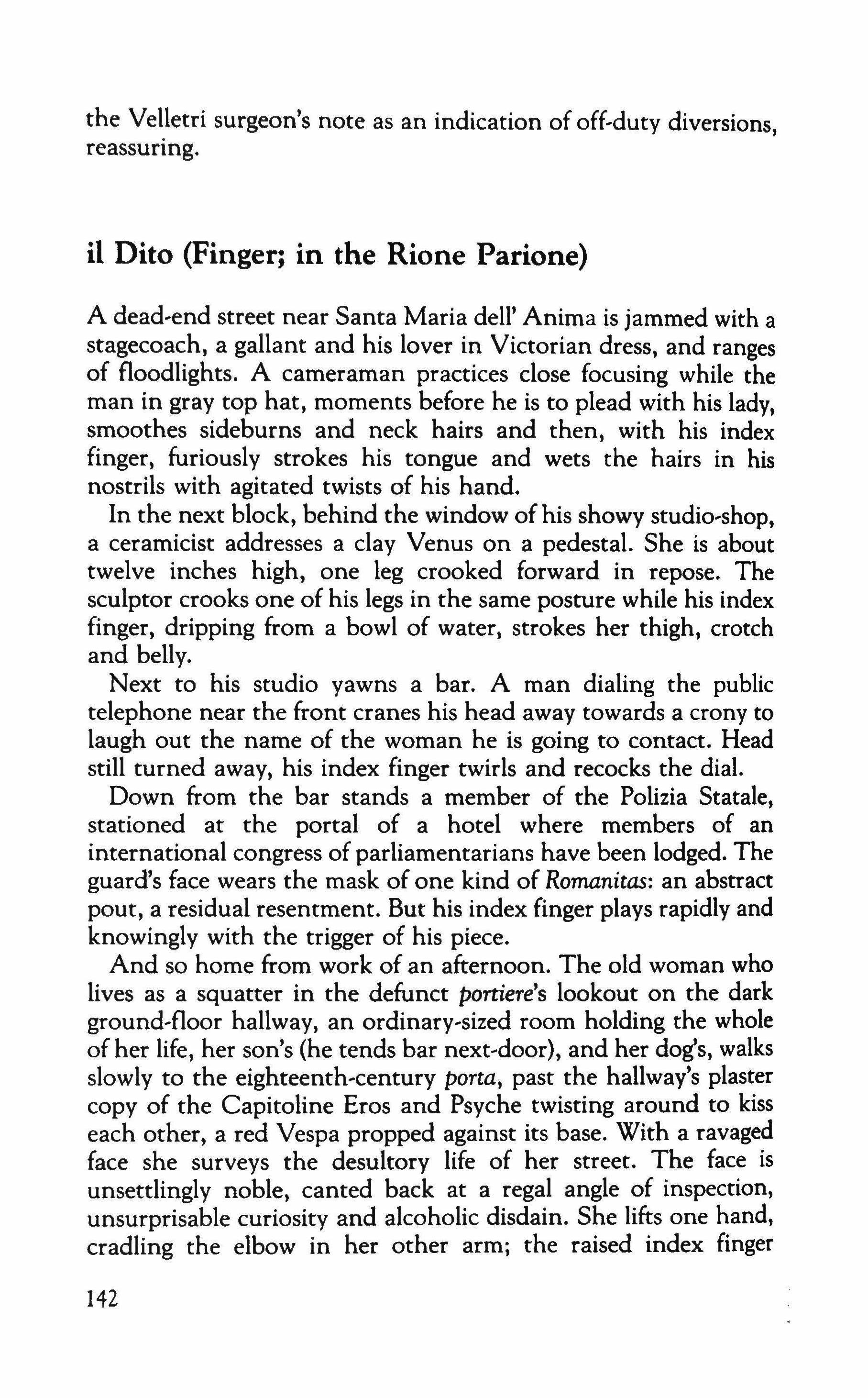
the Velletri surgeon's note as an indication of off-duty diversions, reassuring.
it Dito (Finger; in the Rione Parione)
A dead-end street near Santa Maria dell' Anima is jammed with a stagecoach, a gallant and his lover in Victorian dress, and ranges of floodlights. A cameraman practices close focusing while the man in gray top hat, moments before he is to plead with his lady, smoothes sideburns and neck hairs and then, with his index finger, furiously strokes his tongue and wets the hairs in his nostrils with agitated twists of his hand.
In the next block, behind the window of his showy studio-shop, a ceramicist addresses a clay Venus on a pedestal. She is about twelve inches high, one leg crooked forward in repose. The sculptor crooks one of his legs in the same posture while his index finger, dripping from a bowl of water, strokes her thigh, crotch and belly.
Next to his studio yawns a bar. A man dialing the public telephone near the front cranes his head away towards a crony to laugh out the name of the woman he is going to contact. Head still turned away, his index finger twirls and recocks the dial.
Down from the bar stands a member of the Polizia Statale, stationed at the portal of a hotel where members of an international congress of parliamentarians have been lodged. The guard's face wears the mask of one kind of Romanitas: an abstract pout, a residual resentment. But his index finger plays rapidly and knowingly with the trigger of his piece.
And so home from work of an afternoon. The old woman who lives as a squatter in the defunct portiere's lookout on the dark ground-floor hallway, an ordinary-sized room holding the whole of her life, her son's (he tends bar next-door), and her dog's, walks slowly to the eighteenth-century porta, past the hallway's plaster copy of the Capitoline Eros and Psyche twisting around to kiss each other, a red Vespa propped against its base. With a ravaged face she surveys the desultory life of her street. The face is unsettlingly noble, canted back at a regal angle of inspection, unsurprisable curiosity and alcoholic disdain. She lifts one hand, cradling the elbow in her other arm; the raised index finger
142
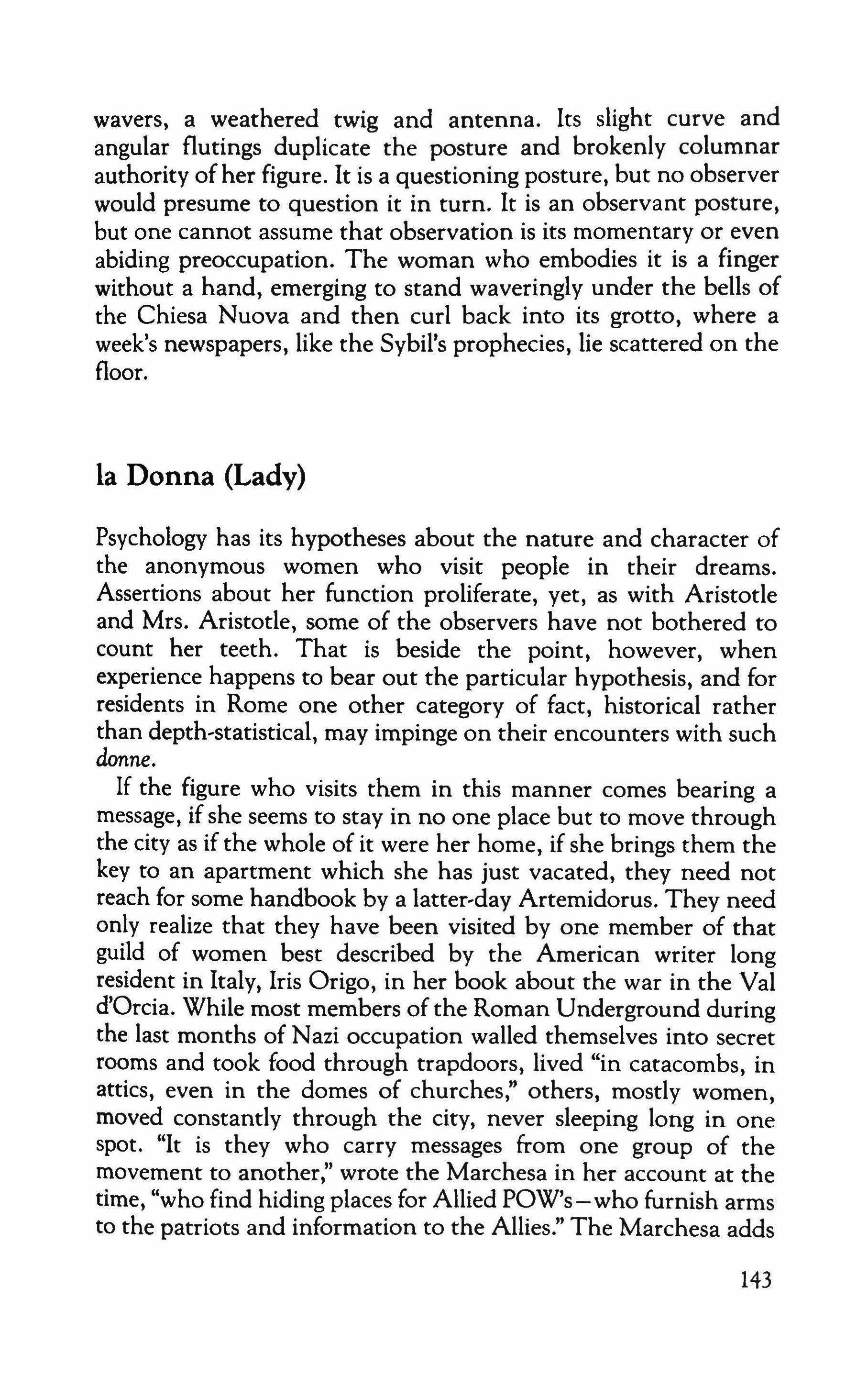
wavers, a weathered twig and antenna. Its slight curve and angular flutings duplicate the posture and brokenly columnar authority ofher figure. It is a questioning posture, but no observer would presume to question it in turn. It is an observant posture, but one cannot assume that observation is its momentary or even abiding preoccupation. The woman who embodies it is a finger without a hand, emerging to stand waveringly under the bells of the Chiesa Nuova and then curl back into its grotto, where a week's newspapers, like the Sybil's prophecies, lie scattered on the floor.
la Donna (Lady)
Psychology has its hypotheses about the nature and character of the anonymous women who visit people in their dreams. Assertions about her function proliferate, yet, as with Aristotle and Mrs. Aristotle, some of the observers have not bothered to count her teeth. That is beside the point, however, when experience happens to bear out the particular hypothesis, and for residents in Rome one other category of fact, historical rather than depth-statistical, may impinge on their encounters with such donne.
If the figure who visits them in this manner comes bearing a message, if she seems to stay in no one place but to move through the city as if the whole of it were her home, if she brings them the key to an apartment which she has just vacated, they need not reach for some handbook by a latter-day Artemidorus. They need only realize that they have been visited by one member of that guild of women best described by the American writer long resident in Italy, Iris Origo, in her book about the war in the Val d'Orcia. While most members of the Roman Underground during the last months of Nazi occupation walled themselves into secret rooms and took food through trapdoors, lived "in catacombs, in attics, even in the domes of churches," others, mostly women, moved constantly through the city, never sleeping long in one spot. "It is they who carry messages from one group of the movement to another;' wrote the Marchesa in her account at the time, "who find hiding places for Allied POW's-who furnish arms to the patriots and information to the Allies." The Marchesa adds
143
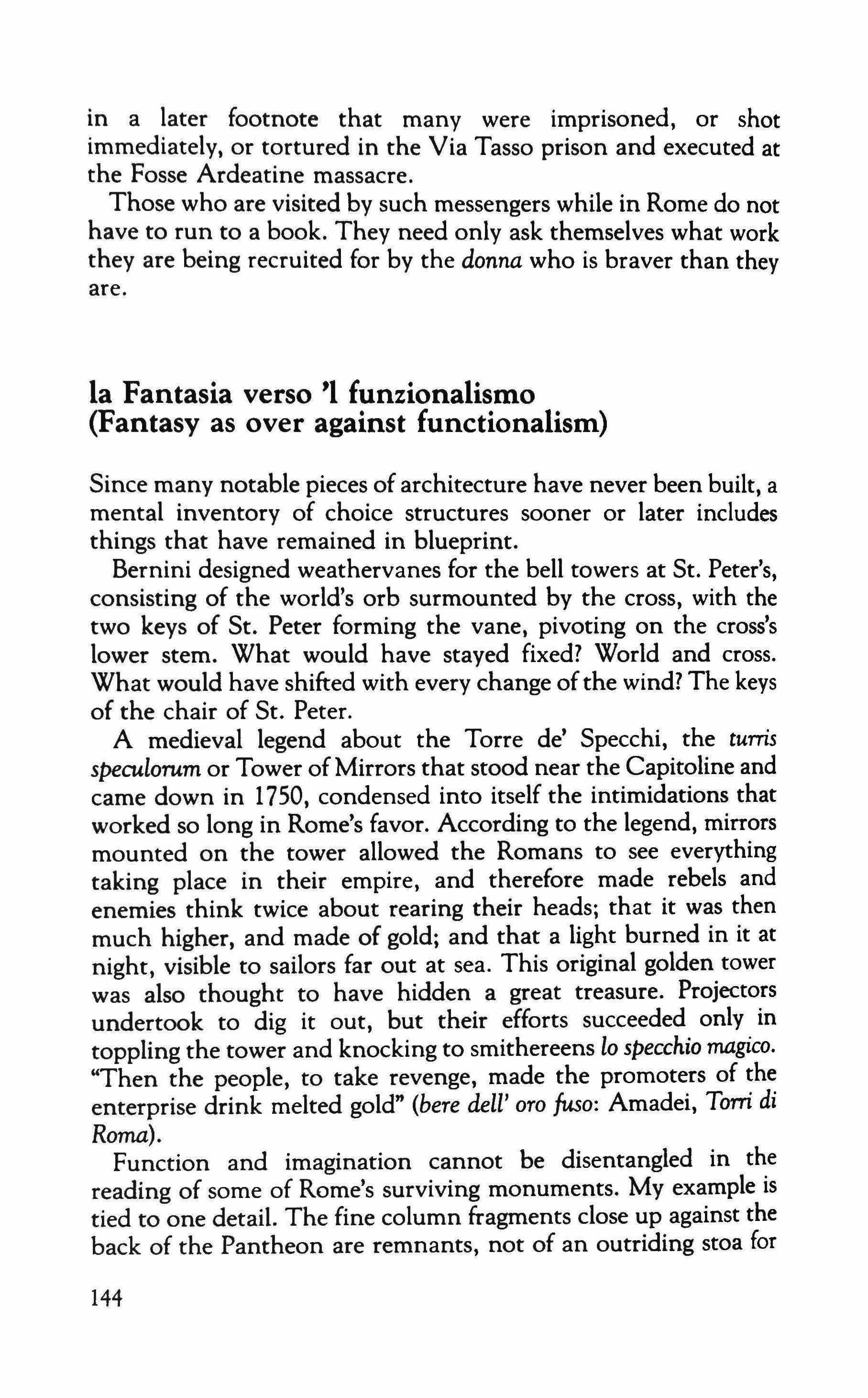
in a later footnote that many were imprisoned, or shot immediately, or tortured in the Via Tasso prison and executed at the Fosse Ardeatine massacre.
Those who are visited by such messengers while in Rome do not have to run to a book. They need only ask themselves what work they are being recruited for by the donna who is braver than they are.
la Fantasia verso '1 funzionalismo (Fantasy as over against functionalism)
Since many notable pieces of architecture have never been built, a mental inventory of choice structures sooner or later includes things that have remained in blueprint.
Bernini designed weathervanes for the bell towers at St. Peter's, consisting of the world's orb surmounted by the cross, with the two keys of St. Peter forming the vane, pivoting on the cross's lower stem. What would have stayed fixed? World and cross. What would have shifted with every change ofthe wind? The keys of the chair of St. Peter.
A medieval legend about the Torre de' Specchi, the turns speculornm or Tower of Mirrors that stood near the Capitoline and came down in 1750, condensed into itself the intimidations that worked so long in Rome's favor. According to the legend, mirrors mounted on the tower allowed the Romans to see everything taking place in their empire, and therefore made rebels and enemies think twice about rearing their heads; that it was then much higher, and made of gold; and that a light burned in it at night, visible to sailors far out at sea. This original golden tower was also thought to have hidden a great treasure. Projectors undertook to dig it out, but their efforts succeeded only in toppling the tower and knocking to smithereens lo specchio magico. "Then the people, to take revenge, made the promoters of the enterprise drink melted gold" (here dell' oro [uso: Amadei, Torn di Roma).
Function and imagination cannot be disentangled in the reading of some of Rome's surviving monuments. My example is tied to one detail. The fine column fragments close up against the back of the Pantheon are remnants, not of an outriding stoa for
144
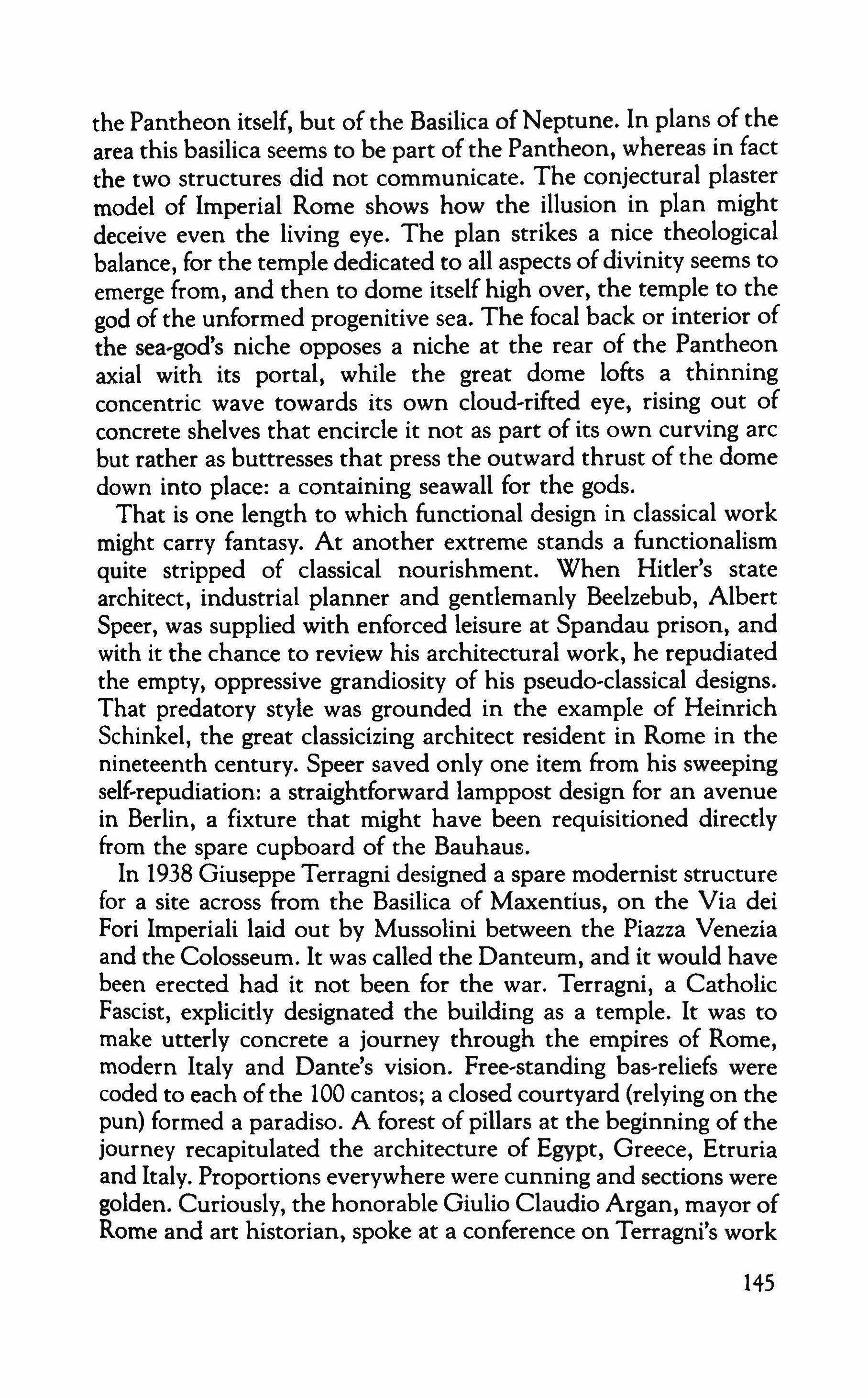
the Pantheon itself, but of the Basilica of Neptune. In plans of the area this basilica seems to be part of the Pantheon, whereas in fact the two structures did not communicate. The conjectural plaster model of Imperial Rome shows how the illusion in plan might deceive even the living eye. The plan strikes a nice theological balance, for the temple dedicated to all aspects ofdivinity seems to emerge from, and then to dome itself high over, the temple to the god of the unformed progenitive sea. The focal back or interior of the sea-god's niche opposes a niche at the rear of the Pantheon axial with its portal, while the great dome lofts a thinning concentric wave towards its own cloud-rifted eye, rising out of concrete shelves that encircle it not as part of its own curving arc but rather as buttresses that press the outward thrust of the dome down into place: a containing seawall for the gods.
That is one length to which functional design in classical work might carry fantasy. At another extreme stands a functionalism quite stripped of classical nourishment. When Hitler's state architect, industrial planner and gentlemanly Beelzebub, Albert Speer, was supplied with enforced leisure at Spandau prison, and with it the chance to review his architectural work, he repudiated the empty, oppressive grandiosity of his pseudo-classical designs. That predatory style was grounded in the example of Heinrich Schinkel, the great classicizing architect resident in Rome in the nineteenth century. Speer saved only one item from his sweeping self-repudiation: a straightforward lamppost design for an avenue in Berlin, a fixture that might have been requisitioned directly from the spare cupboard of the Bauhaus.
In 1938 Giuseppe Terragni designed a spare modernist structure for a site across from the Basilica of Maxentius, on the Via dei Fori Imperiali laid out by Mussolini between the Piazza Venezia and the Colosseum. It was called the Danteum, and it would have been erected had it not been for the war. Terragni, a Catholic Fascist, explicitly designated the building as a temple. It was to make utterly concrete a journey through the empires of Rome, modern Italy and Dante's vision. Free-standing bas-reliefs were coded to each ofthe 100 cantos; a closed courtyard (relying on the pun) formed a paradiso. A forest of pillars at the beginning of the journey recapitulated the architecture of Egypt, Greece, Etruria and Italy. Proportions everywhere were cunning and sections were golden. Curiously, the honorable Giulio Claudio Argan, mayor of Rome and art historian, spoke at a conference on Terragni's work
145
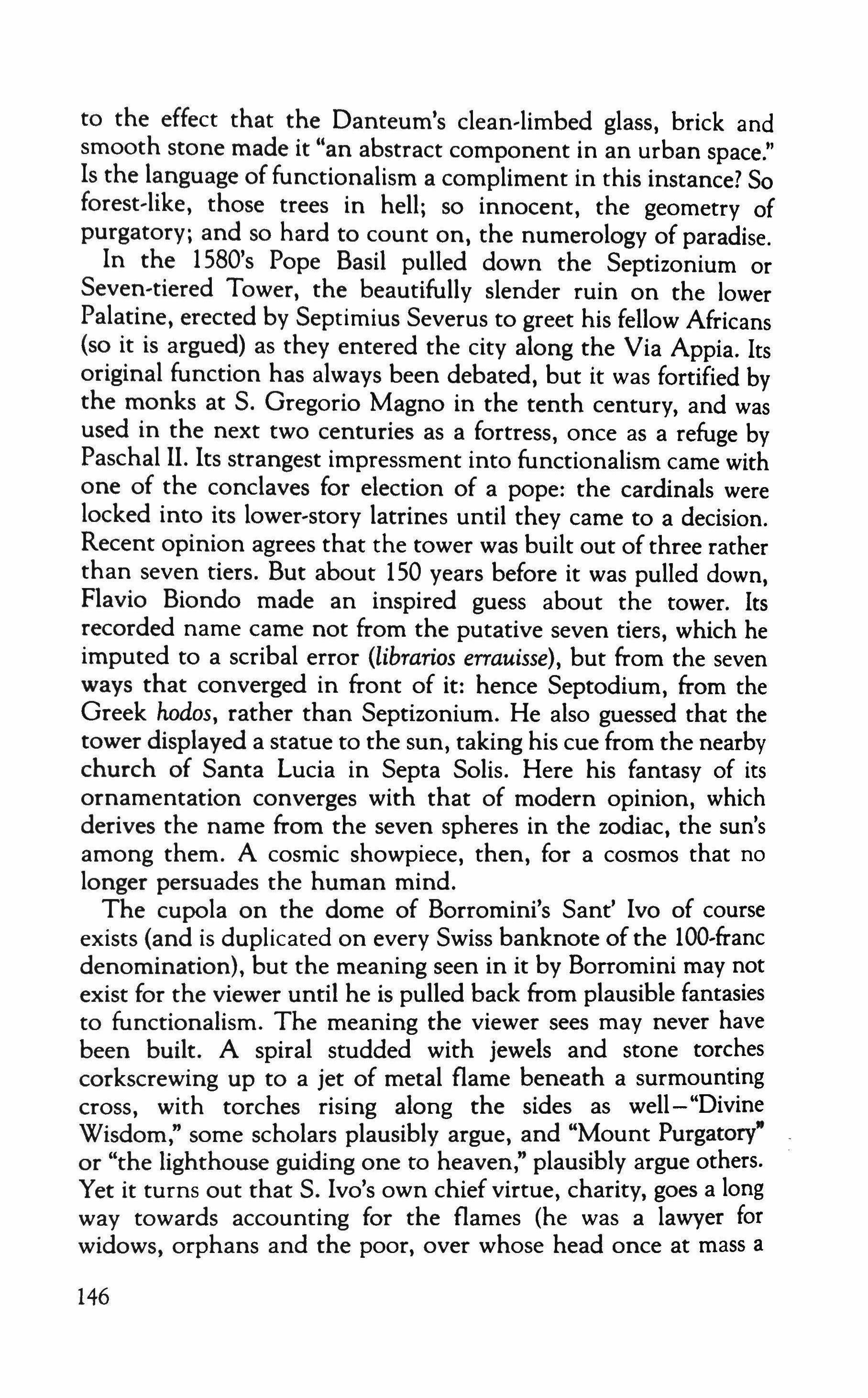
to the effect that the Danteum's clean-limbed glass, brick and smooth stone made it "an abstract component in an urban space." Is the language of functionalism a compliment in this instance? So forest-like, those trees in hell; so innocent, the geometry of purgatory; and so hard to count on, the numerology of paradise.
In the 1580's Pope Basil pulled down the Septizonium or Seven-tiered Tower, the beautifully slender ruin on the lower Palatine, erected by Septimius Severus to greet his fellow Africans (so it is argued) as they entered the city along the Via Appia. Its original function has always been debated, but it was fortified by the monks at S. Gregorio Magno in the tenth century, and was used in the next two centuries as a fortress, once as a refuge by Paschal II. Its strangest impressment into functionalism came with one of the conclaves for election of a pope: the cardinals were locked into its lower-story latrines until they came to a decision. Recent opinion agrees that the tower was built out of three rather than seven tiers. But about 150 years before it was pulled down, Flavio Biondo made an inspired guess about the tower. Its recorded name came not from the putative seven tiers, which he imputed to a scribal error (librarios errauisse), but from the seven ways that converged in front of it: hence Septodium, from the Greek hodos, rather than Septizonium. He also guessed that the tower displayed a statue to the sun, taking his cue from the nearby church of Santa Lucia in Septa Solis. Here his fantasy of its ornamentation converges with that of modern opinion, which derives the name from the seven spheres in the zodiac, the sun's among them. A cosmic showpiece, then, for a cosmos that no longer persuades the human mind.
The cupola on the dome of Borromini's Sant' Ivo of course exists (and is duplicated on every Swiss banknote of the 100,franc denomination), but the meaning seen in it by Borromini may not exist for the viewer until he is pulled back from plausible fantasies to functionalism. The meaning the viewer sees may never have been built. A spiral studded with jewels and stone torches corkscrewing up to a jet of metal flame beneath a surmounting cross, with torches rising along the sides as well-"Divine Wisdom," some scholars plausibly argue, and "Mount Purgatory" or "the lighthouse guiding one to heaven," plausibly argue others. Yet it turns out that S. Ivo's own chief virtue, charity, goes a long way towards accounting for the flames (he was a lawyer for widows, orphans and the poor, over whose head once at mass a
146

fireball appeared). Taking note ofthat fact, John Scott also notices that the jeweled spiral when seen from ground level instead of high camera angles resolves to the papal tiara (the school there depended on the Pope's charity), and finally that Borromini also wanted a spiral walkway for easy maintenance of the metal flame and cross: it is representation and functionalism most of the way, with "That gret muckle haggis-shaipit toorie" on the Pope's head (Giuseppe Belli's sonnet 280, translated by Robert Garrioch) providing its own ladder for housekeeping.
If the American finds this last kind of mental exercise dispensable, he might turn to certain structures of his own, where again he will find the troubling relation of spare functionalism to fantasies of meaning. One pair of structures might even disturb him. The Jefferson Arch at St. Louis (the Gateway Arch, the Arch of Freedom) was designed, it seems, without knowledge of a virtual prototype, the Fascist look,alike built under the populist Nero in the 1930's and called the Gateway to Venice.
uno Vicolo (Side street, alley)
Under the window evenings I hear throats honing huge phlegms, Rome's lions, poor and rich in one pack working one clutch, glottals of Africa and starved Egypt, and mica eyes taking in virgins and streetwalkers with indifference. What it was I was doing disperses. The mind is a thing with feet, belly, sexed radar, and either I go down there to walk among them an hour, two hours, or wait for great shears to rip through the overhead fabric as they did at the Colosseum, and then watch cobbles run and shine, and feel the cold frame of the window numb my own want. The rain's long slant falls from another century, from the smoothing of fury to forgetfulness, and I can look towards windows in the block across from me and say wordlessly: the great cats for the moment lie quiet, and with them the hunt, and this is stone under my hand, and that is my blood's own sound out in the air there pouring past me, silver in the strange now and here.
147
Two Poems
Kay Ryan

Such Women
There are those for whom rooms do not remain rooms when they are gone. Rooms for some collapse and trail like a long gown. I have seen such regal women in my town, careful where they step and how they sit down. In the time they take to pass a window, the shopkeeper knows there would be something uncomfortable in their eyes. There is the difference in their ordinary clothes, a recklessness, as though pulled on for a fire, as though day were midnight or some desperate hour when what they trusted burned around them. An emergency surrounds them and a grace. Whatever has happened they must now live in this place.
148
Conversion
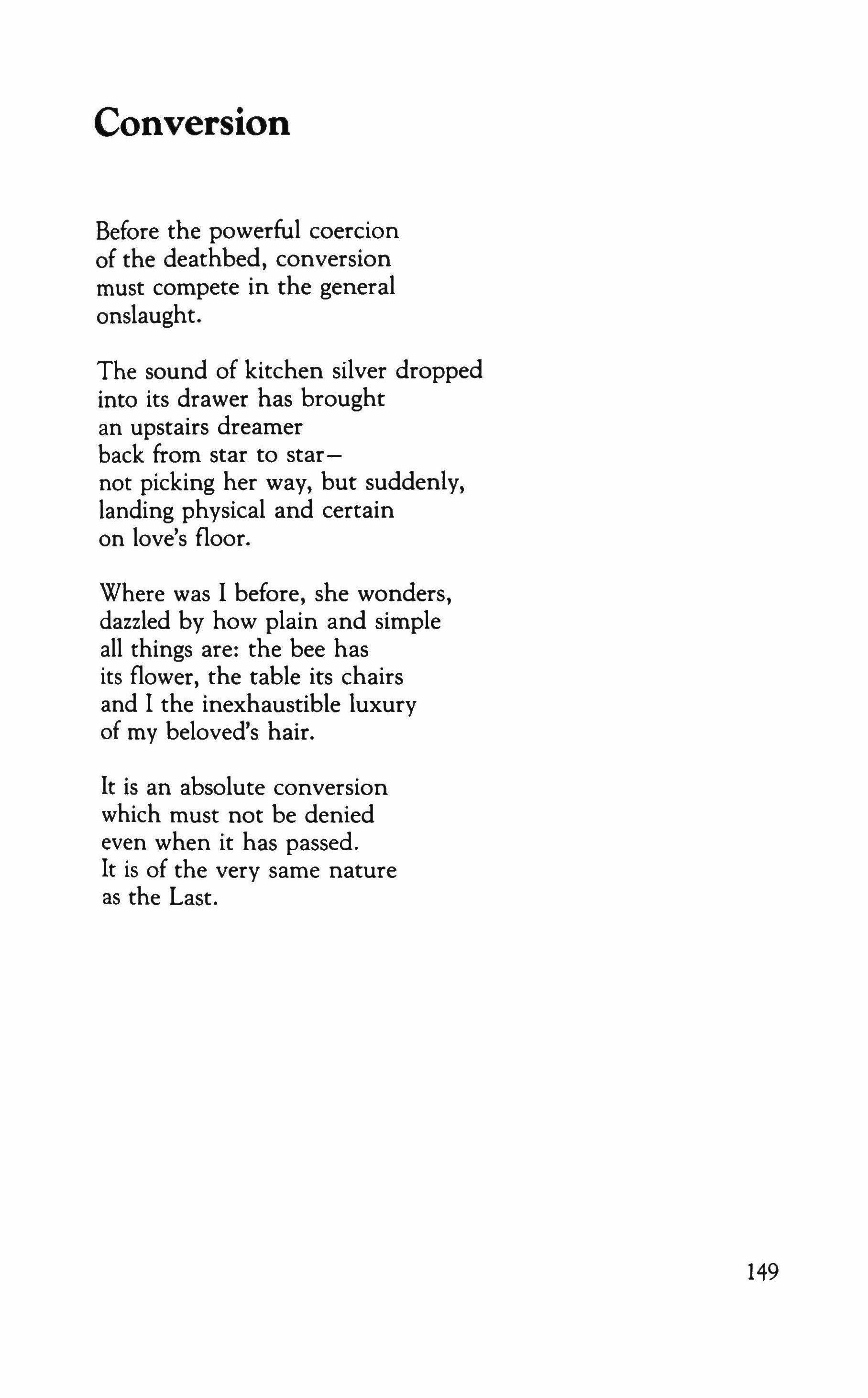
Before the powerful coercion of the deathbed, conversion must compete in the general onslaught.
The sound of kitchen silver dropped into its drawer has brought an upstairs dreamer back from star to starnot picking her way, but suddenly, landing physical and certain on love's floor.
Where was I before, she wonders, dazzled by how plain and simple all things are: the bee has its flower, the table its chairs and I the inexhaustible luxury of my beloved's hair.
It is an absolute conversion which must not be denied even when it has passed. It is of the very same nature as the Last.
149
Grand Unification
Roald Hoffmann
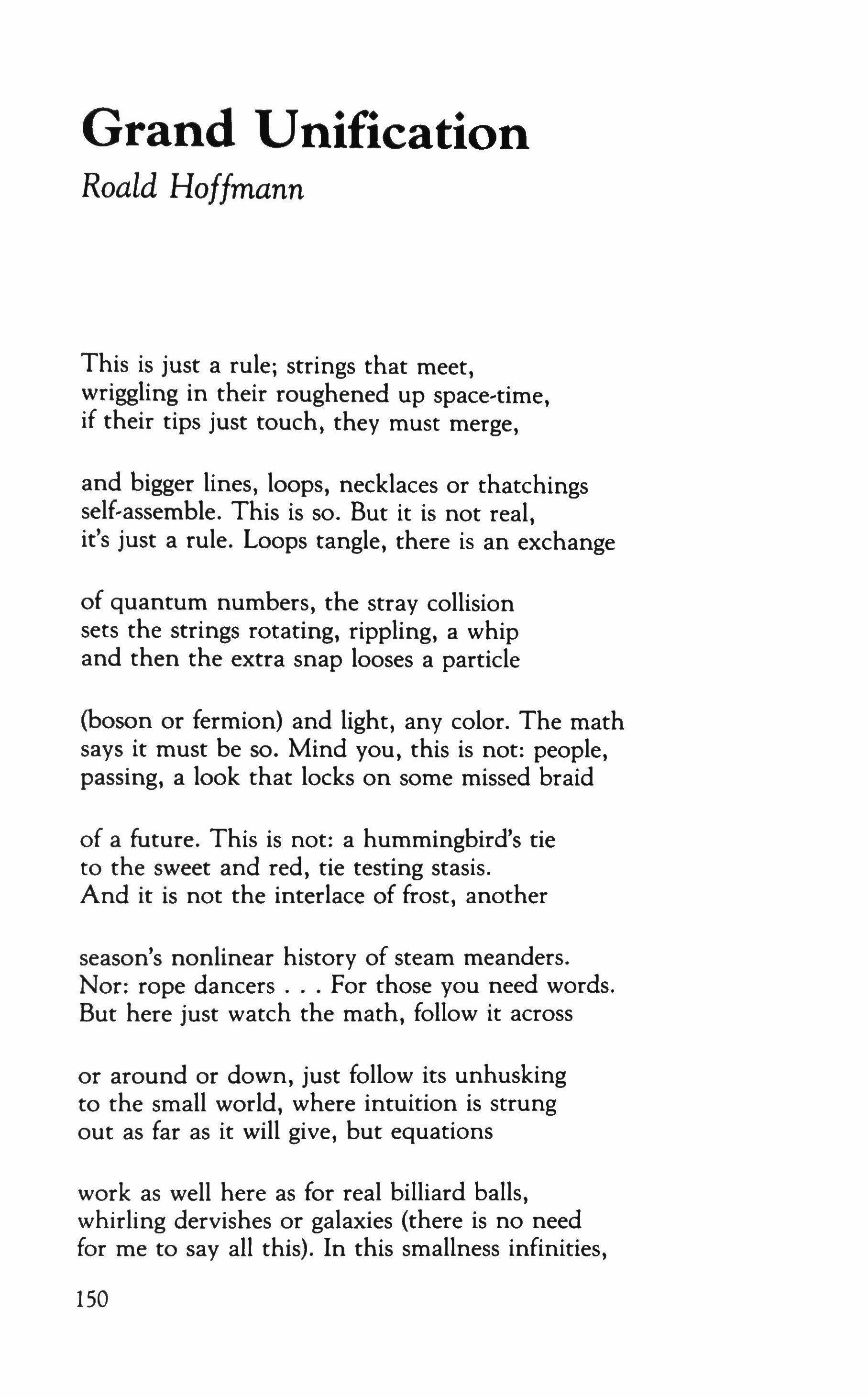
This is just a rule; strings that meet, wriggling in their roughened up space-rime, if their tips just touch, they must merge, and bigger lines, loops, necklaces or thatchings self-assemble. This is so. But it is not real, it's just a rule. Loops tangle, there is an exchange
of quantum numbers, the stray collision sets the strings rotating, rippling, a whip and then the extra snap looses a particle
{boson or fermion} and light, any color. The math says it must be so. Mind you, this is not: people, passing, a look that locks on some missed braid
of a future. This is not: a hummingbird's tie to the sweet and red, tie testing stasis. And it is not the interlace of frost, another season's nonlinear history of steam meanders. Nor: rope dancers For those you need words. But here just watch the math, follow it across or around or down, just follow its unhusking to the small world, where intuition is strung out as far as it will give, but equations
work as well here as for real billiard balls, whirling dervishes or galaxies (there is no need for me to say all this). In this smallness infinities,
150
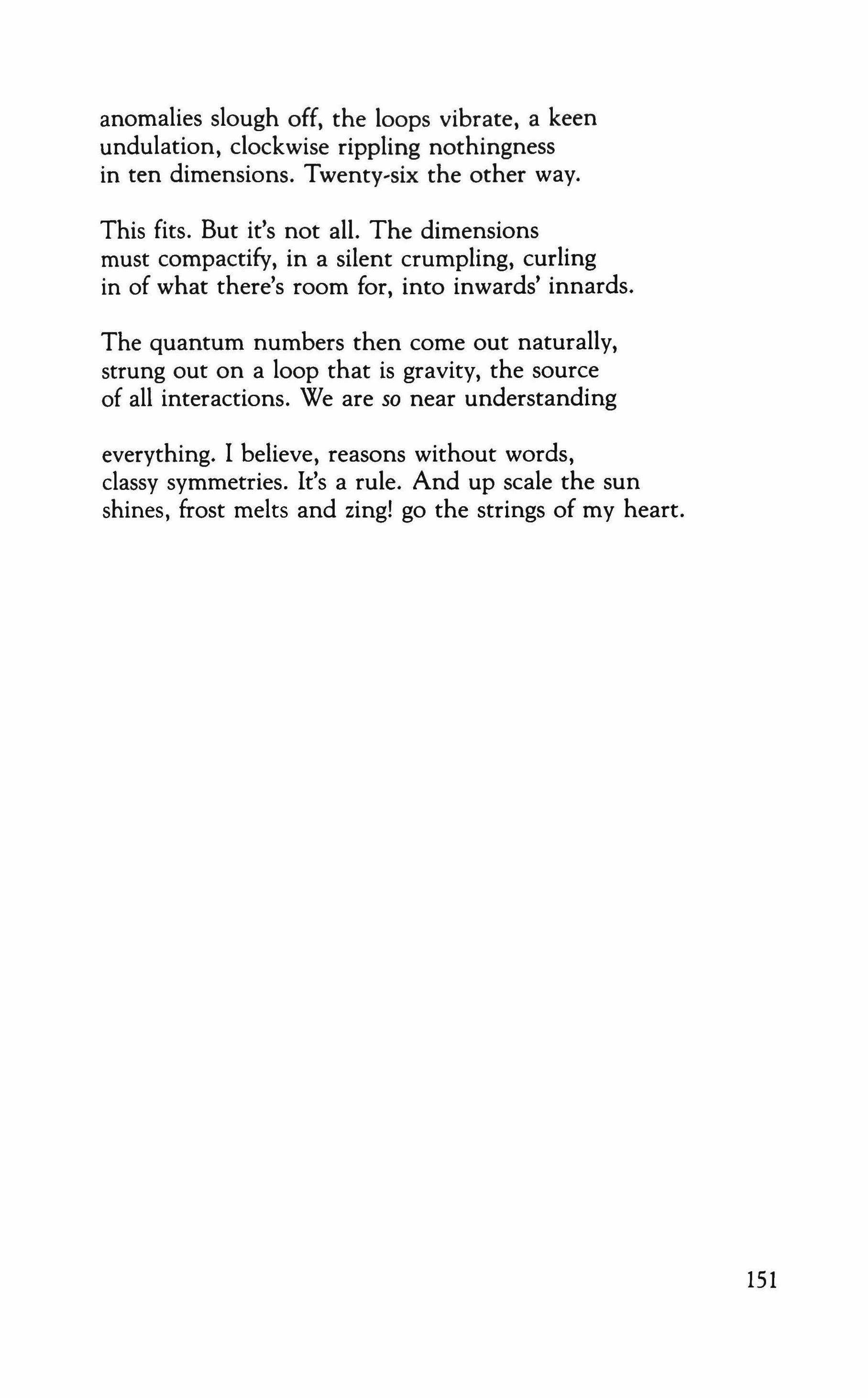
anomalies slough off, the loops vibrate, a keen undulation, clockwise rippling nothingness in ten dimensions. Twentv-six the other way.
This fits. But it's not all. The dimensions must compactify, in a silent crumpling, curling in of what there's room for, into inwards' innards.
The quantum numbers then come out naturally, strung out on a loop that is gravity, the source of all interactions. We are so near understanding everything. I believe, reasons without words, classy symmetries. It's a rule. And up scale the sun shines, frost melts and zing! go the strings of my heart.
151
Four Poems
Michael Ryan

Pedestrian Pastoral
It's nothing to a squirrel to vault ten times its pulsing length and come down running on a branch thin as a popsicle, and much less to a groundhog flattened by a tire to hold one perfect paw in air as if summoning a partner, and this unexpectedly gorgeous shaggy white cow, inexplicably alone in a pasturewhat is it to her this December if at her black nose breath-puffs vanish and appear like a Don't Walk warning blinker? But I do walk happily in this mild Virginia winter
unable to feel absolutely sure I won't be here forever almost like this, a pure observer, for once oblivious
to the spurs of ego and desire that - whatever death is or is not - could be paradise to finally do without.
152
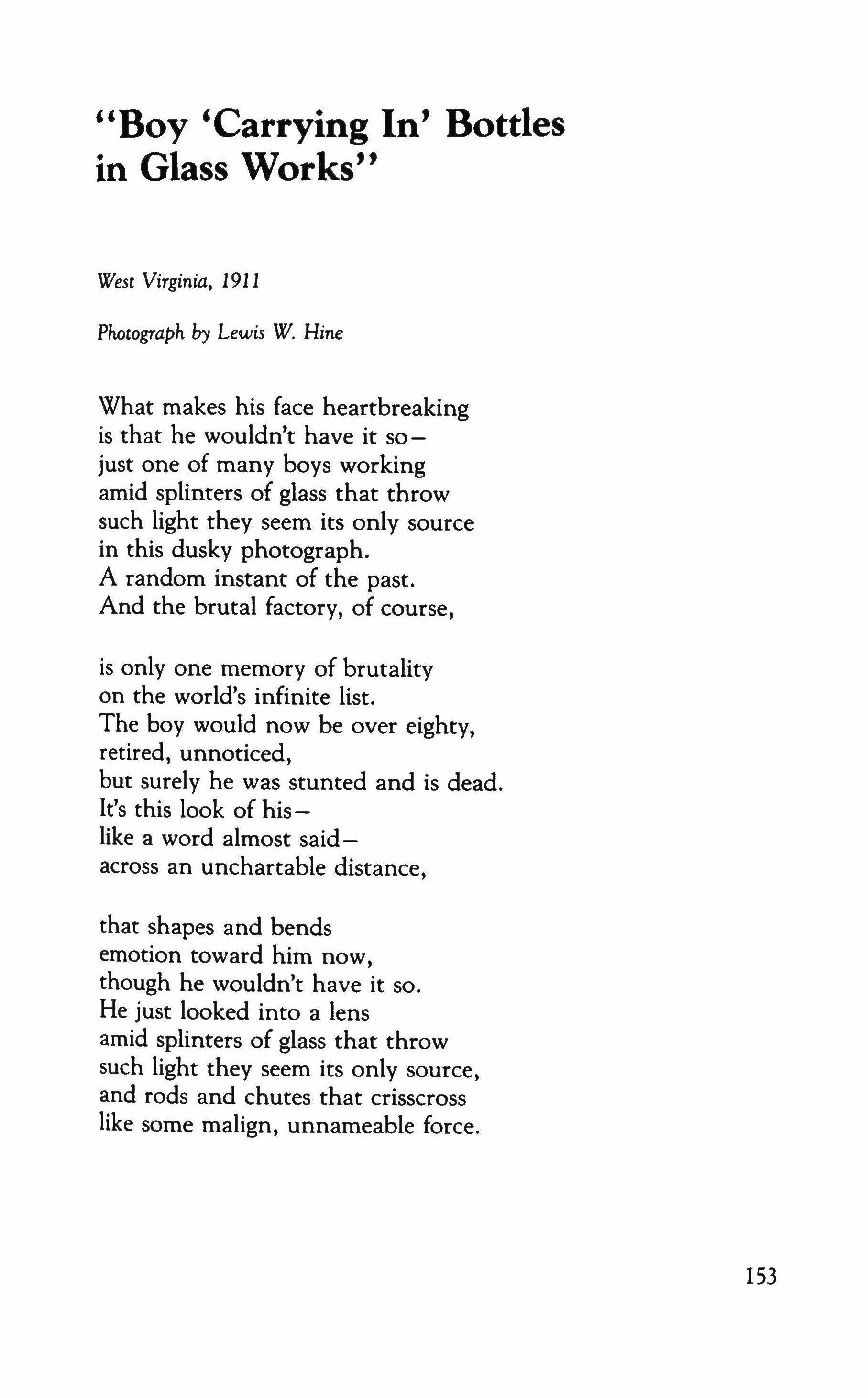
"Boy 'Carrying In' Bottles in Glass Works"
West
Virginia, 1911
Photograph by Lewis W. Hine
What makes his face heartbreaking is that he wouldn't have it sojust one of many boys working amid splinters of glass that throw such light they seem its only source in this dusky photograph. A random instant of the past. And the brutal factory, of course, is only one memory of brutality on the world's infinite list. The boy would now be over eighty, retired, unnoticed, but surely he was stunted and is dead. It's this look of hislike a word almost saidacross an unchartable distance, that shapes and bends emotion toward him now, though he wouldn't have it so. He just looked into a lens amid splinters of glass that throw such light they seem its only source, and rods and chutes that crisscross like some malign, unnameable force.
153
Through a Crack
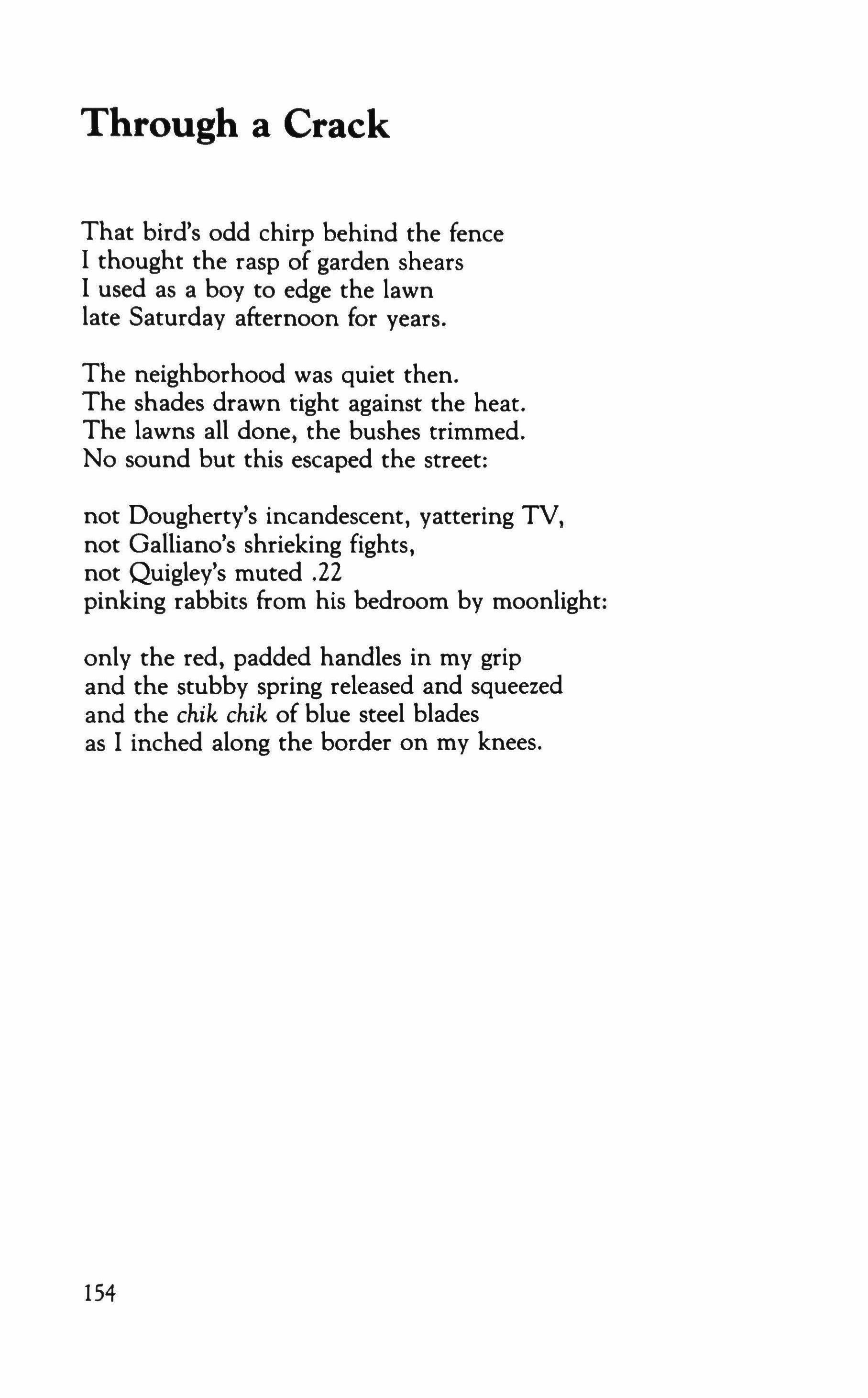
That bird's odd chirp behind the fence I thought the rasp of garden shears I used as a boy to edge the lawn late Saturday afternoon for years.
The neighborhood was quiet then. The shades drawn tight against the heat. The lawns all done, the bushes trimmed. No sound but this escaped the street:
not Dougherty's incandescent, yattering TV, not Galliano's shrieking fights, not Quigley's muted .22 pinking rabbits from his bedroom by moonlight: only the red, padded handles in my grip and the stubby spring released and squeezed and the chik chik of blue steel blades as I inched along the border on my knees.
154
Palinode
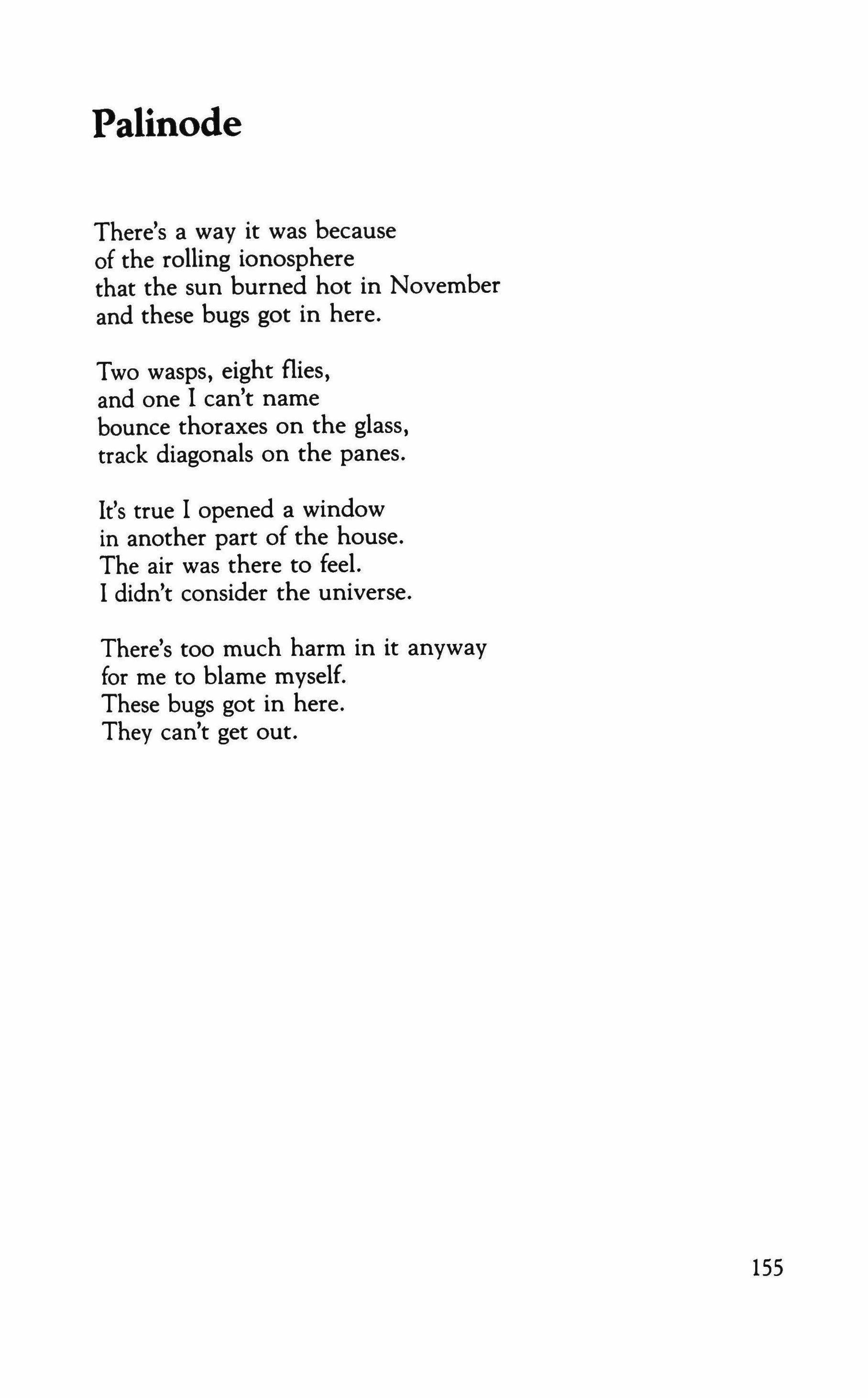
There's a way it was because of the rolling ionosphere that the sun burned hot in November and these bugs got in here.
Two wasps, eight flies, and one I can't name bounce thoraxes on the glass, track diagonals on the panes.
It's true I opened a window in another part of the house. The air was there to feel. I didn't consider the universe.
There's too much harm in it anyway for me to blame myself. These bugs got in here. They can't get out.
ISS
A Self-Portrait
Shu Ting
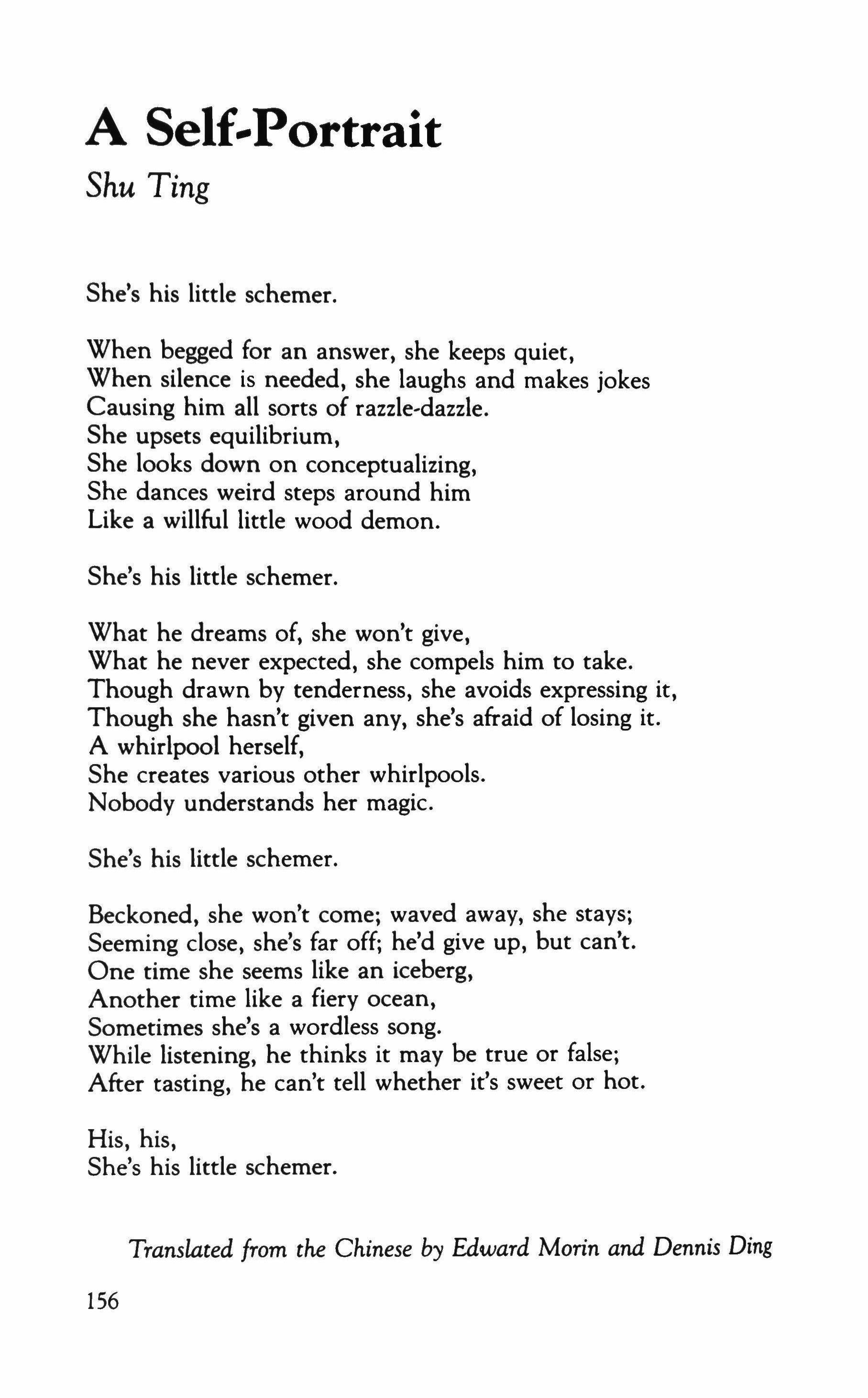
She's his little schemer.
When begged for an answer, she keeps quiet, When silence is needed, she laughs and makes jokes
Causing him all sorts of razzle-dazzle. She upsets equilibrium, She looks down on conceptualizing, She dances weird steps around him Like a willful little wood demon.
She's his little schemer.
What he dreams of, she won't give, What he never expected, she compels him to take. Though drawn by tenderness, she avoids expressing it, Though she hasn't given any, she's afraid of losing it. A whirlpool herself, She creates various other whirlpools. Nobody understands her magic.
She's his little schemer.
Beckoned, she won't come; waved away, she stays; Seeming close, she's far off; he'd give up, but can't. One time she seems like an iceberg, Another time like a fiery ocean, Sometimes she's a wordless song. While listening, he thinks it may be true or false; After tasting, he can't tell whether it's sweet or hot.
His, his, She's his little schemer.
Translated from the Chinese by Edward Morin and Dennis Ding
156
Mr. Giai's Poem
John Balaban
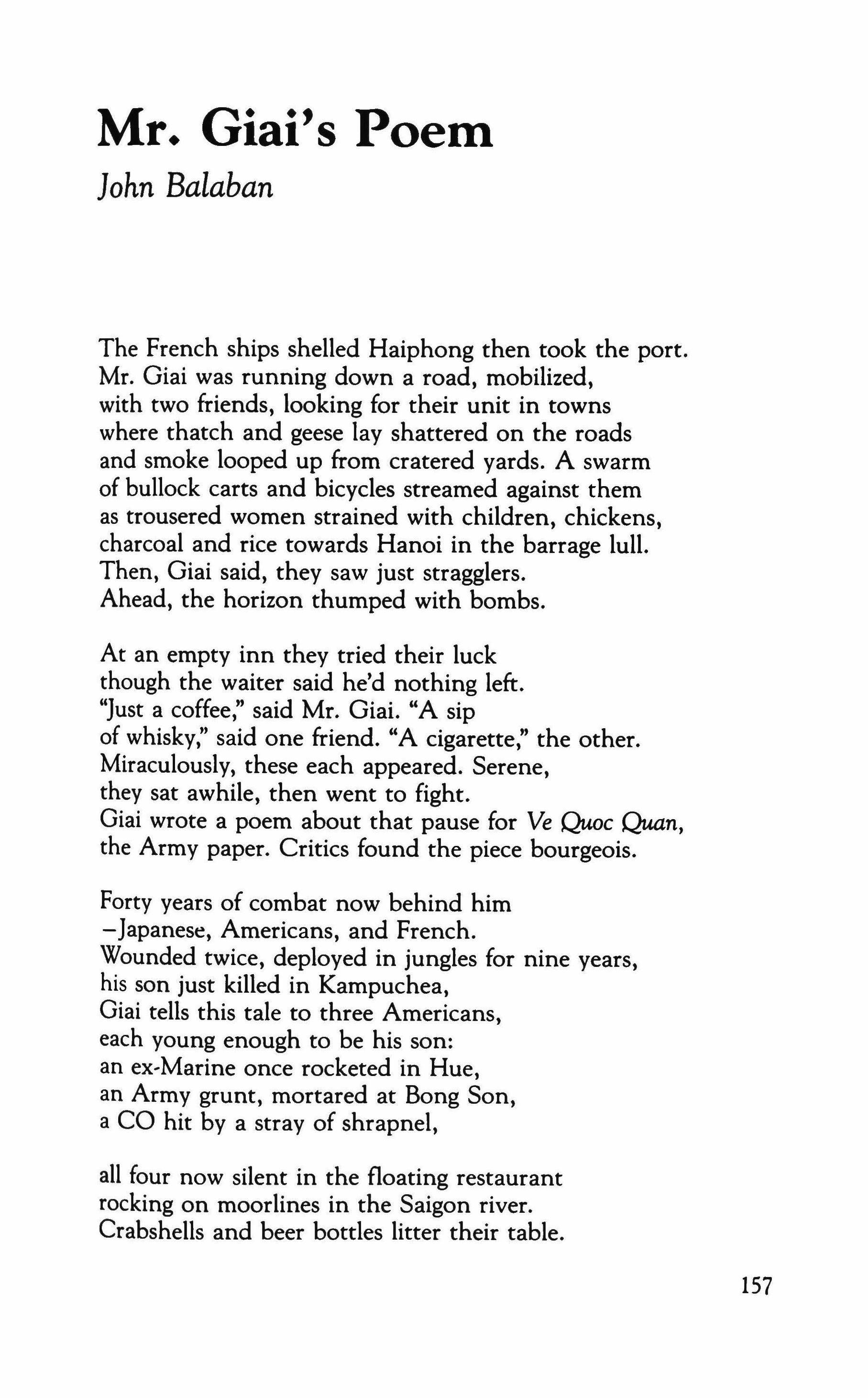
The French ships shelled Haiphong then took the port. Mr. Giai was running down a road, mobilized, with two friends, looking for their unit in towns where thatch and geese lay shattered on the roads and smoke looped up from cratered yards. A swarm of bullock carts and bicycles streamed against them as trousered women strained with children, chickens, charcoal and rice towards Hanoi in the barrage lull. Then, Giai said, they saw just stragglers. Ahead, the horizon thumped with bombs.
At an empty inn they tried their luck though the waiter said he'd nothing left. "Just a coffee," said Mr. Giai. «A sip of whisky," said one friend. «A cigarette," the other. Miraculously, these each appeared. Serene, they sat awhile, then went to fight.
Giai wrote a poem about that pause for Ve Quae Quan, the Army paper. Critics found the piece bourgeois.
Forty years of combat now behind him - Japanese, Americans, and French. Wounded twice, deployed in jungles for nine years, his son just killed in Kampuchea, Giai tells this tale to three Americans, each young enough to be his son: an ex-Marine once rocketed in Hue, an Army grunt, mortared at Bong Son, a CO hit by a stray of shrapnel, all four now silent in the floating restaurant rocking on moorlines in the Saigon river. Crabshells and beer bottles litter their table.
157

A rat runs a rafter overhead. A wave slaps by. "That moment," Giai adds, "was a little like now." They raise their glasses to the river's amber light, all four as quiet as if carved in ivory.
158
Five Poems
Bruce Weigl
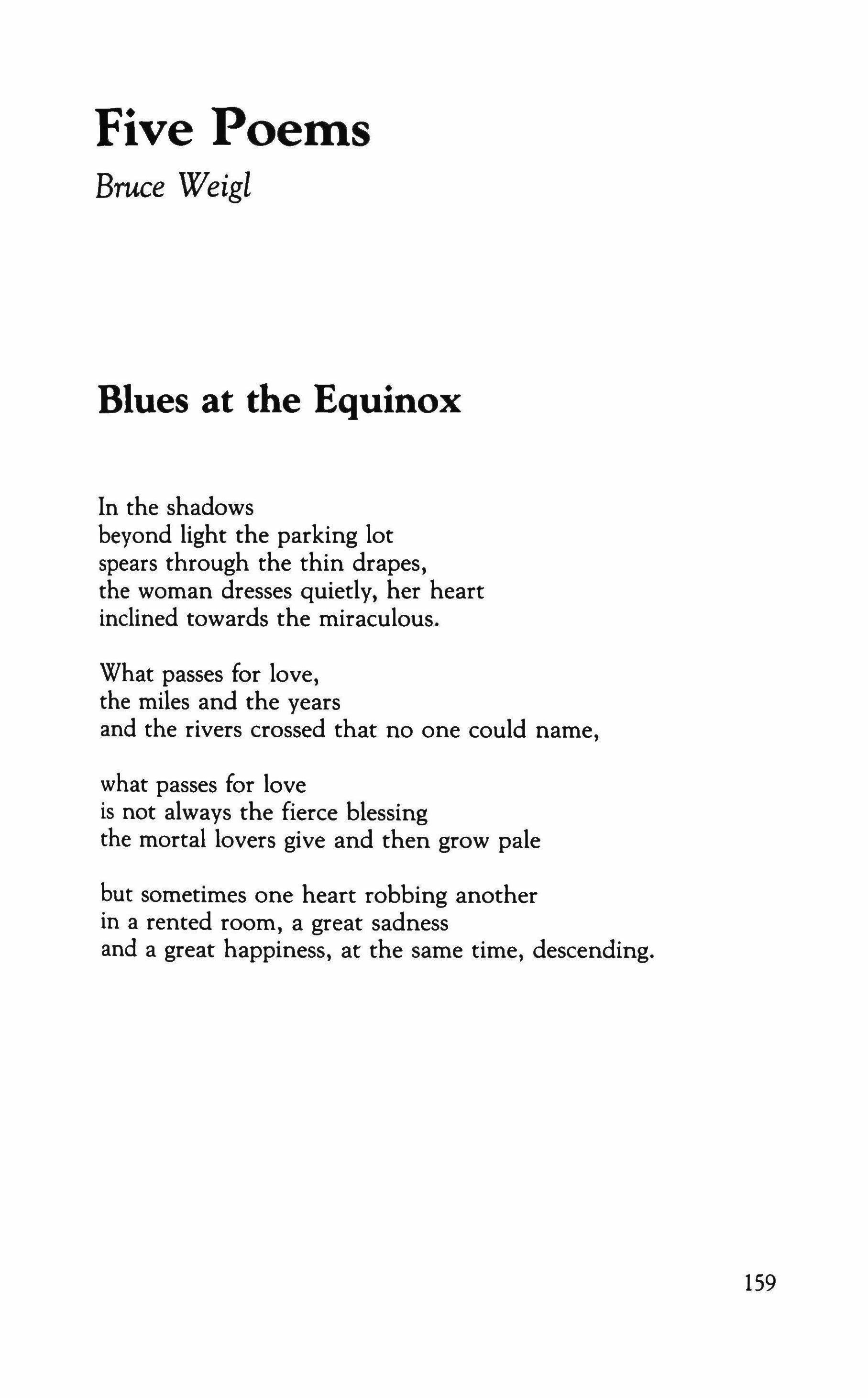
Blues at the Equinox
In the shadows beyond light the parking lot spears through the thin drapes, the woman dresses quietly, her heart inclined towards the miraculous.
What passes for love, the miles and the years and the rivers crossed that no one could name, what passes for love is not always the fierce blessing the mortal lovers give and then grow pale but sometimes one heart robbing another in a rented room, a great sadness and a great happiness, at the same time, descending.
159
Apparition of the Exile

There was another life of cool summer mornings, the dogwood air and the slag stink so gray like our monsoon which we loved for the rain and cool wind until the rot came into us. And I remember the boys we were the evening of our departure, our mothers waving through the train's black pluming exhaust; they were not proud in their tears of our leaving, so don't tell me to shut up about the war or I might pull something from my head from my head from my head that you wouldn't want to see and whoever the people are might be offended.
From the green country you reconstruct in your brain, from the rubble and stink of your occupation, there is no moving out. A sweet boy who got drunk on our long ride into the State draws a maze every day on white paper, precisely in his room of years, as if you could walk into it. All day he draws and imagines his platoon will return from the burning river where he sent them sixteen years ago into fire. He can't stop seeing the tree line explode in white phosphorus blossoms and the liftship sent for them spinning uncontrollably beyond hope into the Citadel wall. Only his mother comes these days, drying the fruit in her apron, or singing the cup of hot tea into his fingers which, like barb wire, web the air.
160
In the Days Before Insurrection
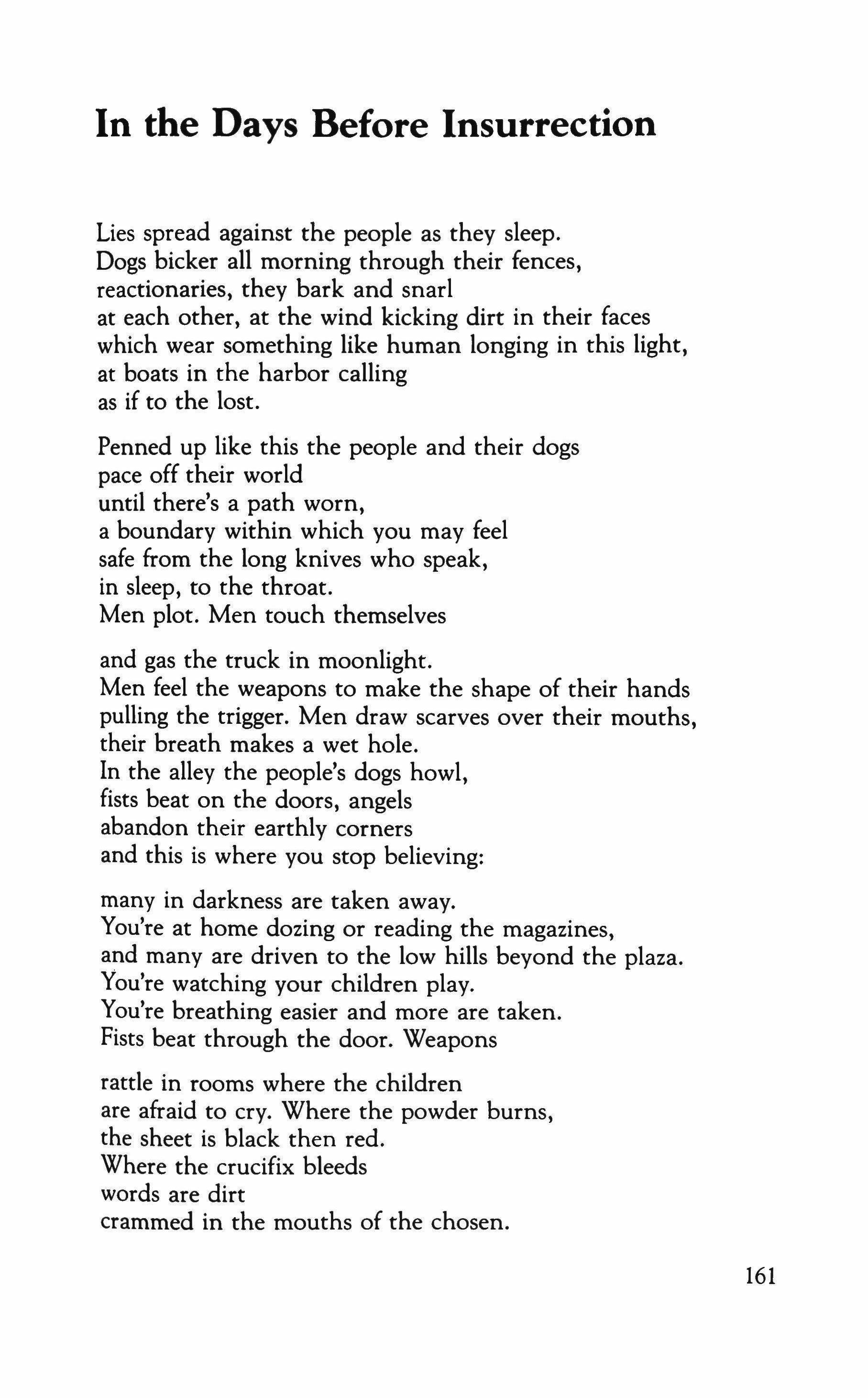
Lies spread against the people as they sleep. Dogs bicker all morning through their fences, reactionaries, they bark and snarl at each other, at the wind kicking dirt in their faces which wear something like human longing in this light, at boats in the harbor calling as if to the lost.
Penned up like this the people and their dogs pace off their world until there's a path worn, a boundary within which you may feel safe from the long knives who speak, in sleep, to the throat. Men plot. Men touch themselves and gas the truck in moonlight. Men feel the weapons to make the shape of their hands pulling the trigger. Men draw scarves over their mouths, their breath makes a wet hole.
In the alley the people's dogs howl, fists beat on the doors, angels abandon their earthly corners and this is where you stop believing: many in darkness are taken away. You're at home dozing or reading the magazines, and many are driven to the low hills beyond the plaza. You're watching your children play. You're breathing easier and more are taken. Fists beat through the door. Weapons rattle in rooms where the children are afraid to cry. Where the powder burns, the sheet is black then red. Where the crucifix bleeds words are dirt crammed in the mouths of the chosen.
161
In the House of Immigrants

After milk the kittens spill out of their box, the weary mother cat snapping at them, too young for So many babies. In the bedroom the boy bows his cello painfully down the hall, Mozart. He loves his practice more than ball with the boys who call him through the summer's open window. The grandfather smokes, reads his Hungarian newspaper moving his lips. The mother cooks: some nice chicken with garlic, some boiled potatoes, and our children run in and out ofthe room as ifthere were not enough time to live because there isn't, the solstice sun already gone below the oaks looming over us and I argue with the father. He loves our country no matter what he says. There must be sacrifices, our voices beginning to rise above the cello, above the children, above the kitchen noise until everyone freezes, stares at us fearfully and with disappointment. We've come too far to stop. I'm not interested in details he says, only the principle is important, his hands shaking between us and a wronged light cast down on his face until the mother steps from the kitchen and tells us with her eyes to stop. She shakes her finger at her husband and says his name stressing the two syllables the way a mother calls her children home across the dark neighborhood and then she turns to me. I was only a child she says. They lined you up without a word and shot you like a dog. I won't listen to Russian music. I don't care if you say it is beautiful. I won't read Russian books. I don't care what you say. I saw what they do. They buried people in the schoolyard where I played.
162
April
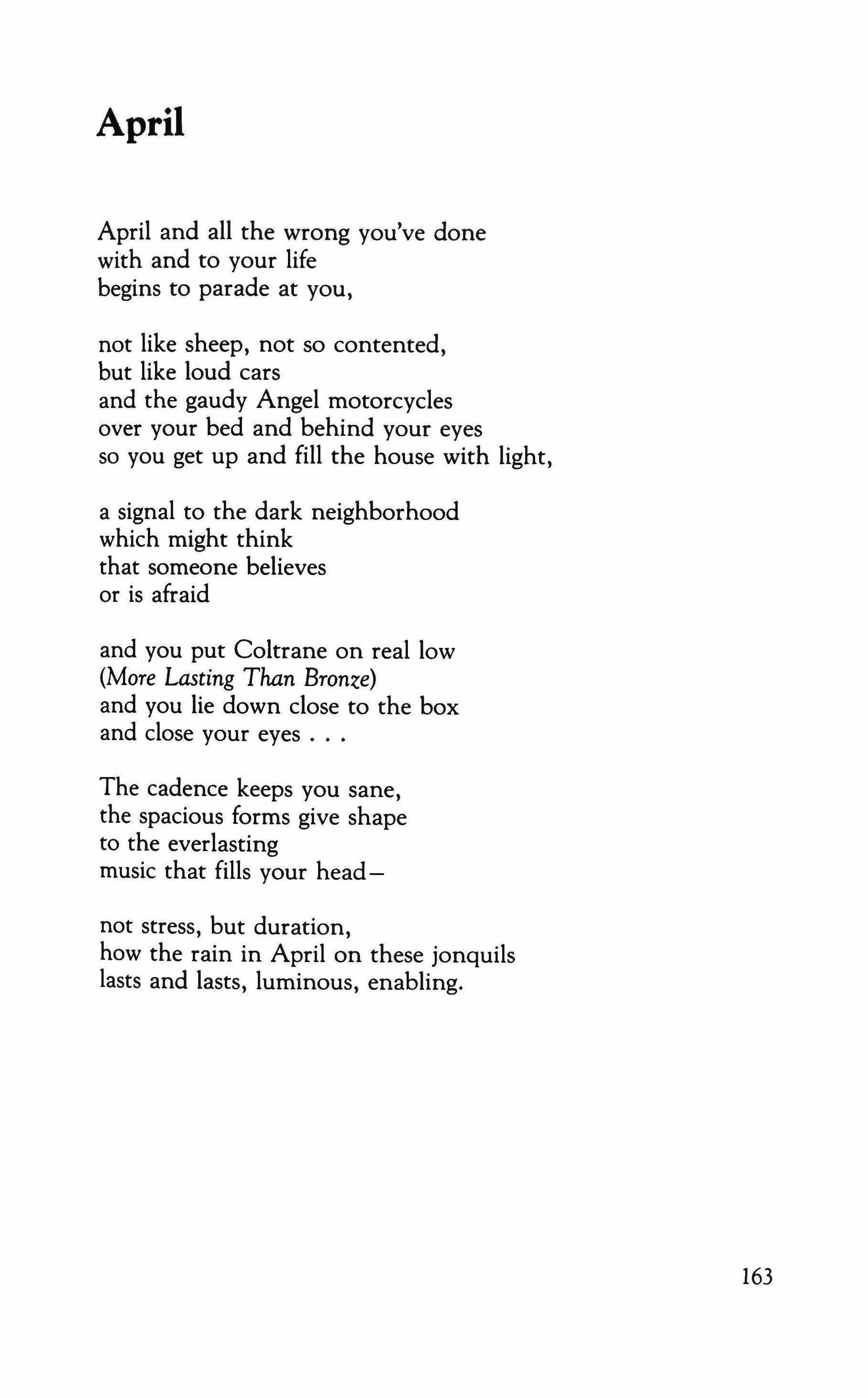
April and all the wrong you've done with and to your life begins to parade at you,
not like sheep, not so contented, but like loud cars and the gaudy Angel motorcycles over your bed and behind your eyes so you get up and fill the house with light, a signal to the dark neighborhood which might think that someone believes or is afraid
and you put Coltrane on real low (More Lasting Than Bronze) and you lie down close to the box and close your eyes
The cadence keeps you sane, the spacious forms give shape to the everlasting music that fills your head-
not stress, but duration, how the rain in April on these jonquils lasts and lasts, luminous, enabling.
163
Two Poems
Jenny Mueller
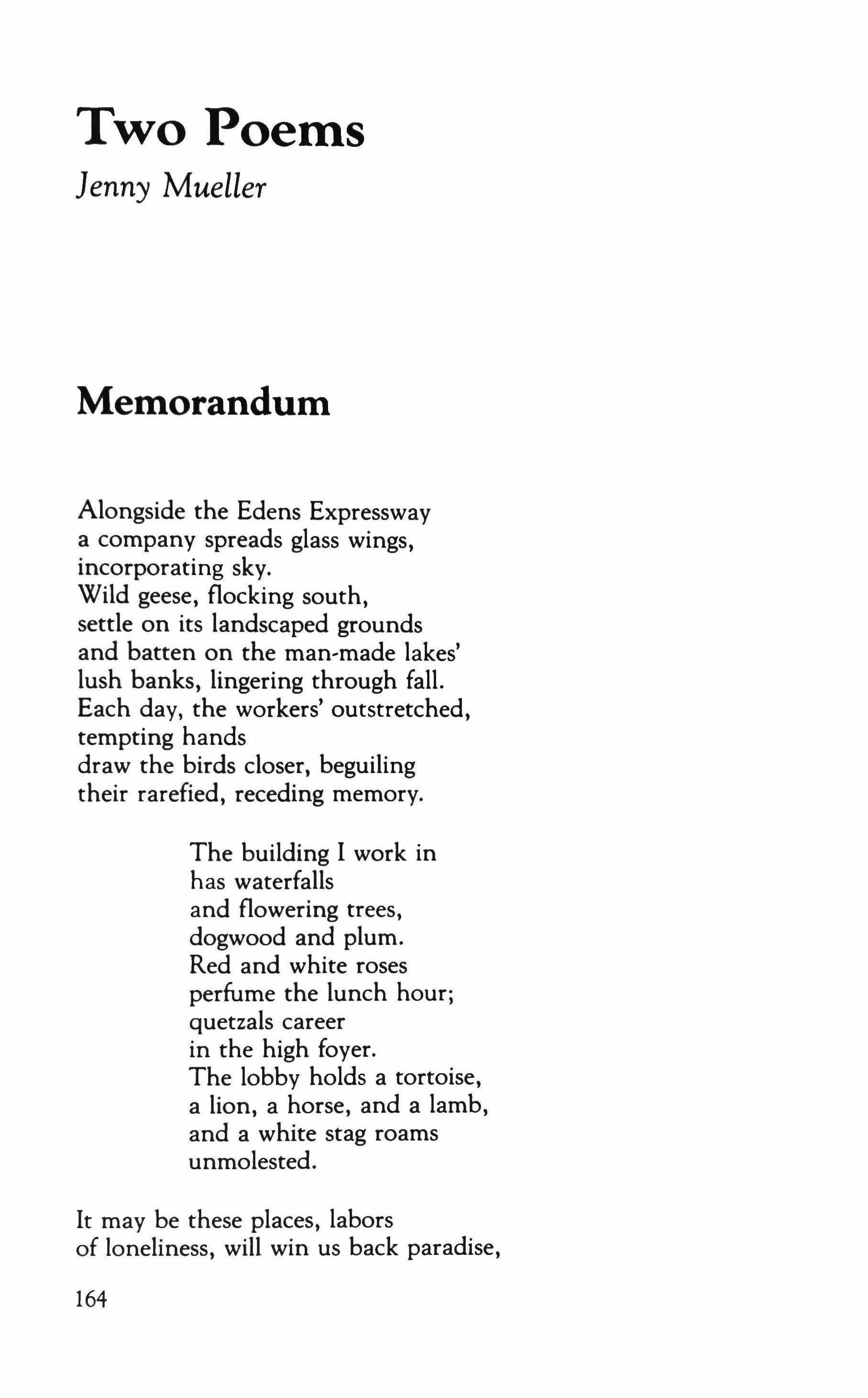
Memorandum
Alongside the Edens Expressway a company spreads glass wings, incorporating sky. Wild geese, flocking south, settle on its landscaped grounds and batten on the man-made lakes' lush banks, lingering through fall. Each day, the workers' outstretched, tempting hands draw the birds closer, beguiling their rarefied, receding memory.
The building I work in has waterfalls and flowering trees, dogwood and plum. Red and white roses perfume the lunch houri quetzals career in the high foyer. The lobby holds a tortoise, a lion, a horse, and a lamb, and a white stag roams unmolested.
It may be these places, labors of loneliness, will win us back paradise,
164

and summon the animals back to the ones whose company they were created for: now that the apple's detoxed and the black file's erased.
165
Shower and Sun
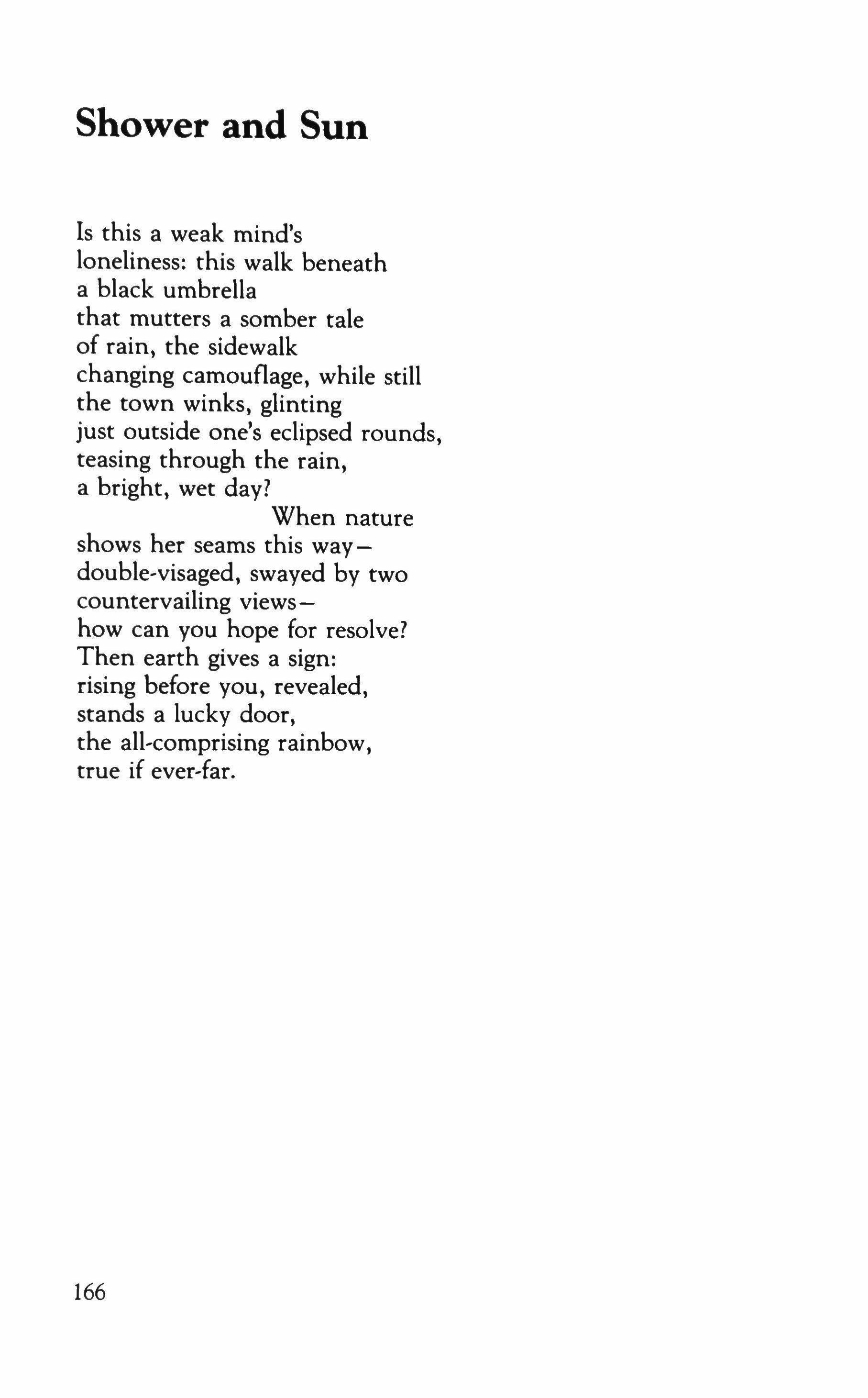
Is this a weak mind's loneliness: this walk beneath a black umbrella that mutters a somber tale of rain, the sidewalk changing camouflage, while still the town winks, glinting just outside one's eclipsed rounds, teasing through the rain, a bright, wet day?
When nature shows her seams this waydouble-visaged, swayed by two countervailing viewshow can you hope for resolve? Then earth gives a sign: rising before you, revealed, stands a lucky door, the all-comprising rainbow, true if ever-far.
166
Two Poems
w. s. Di Pieto
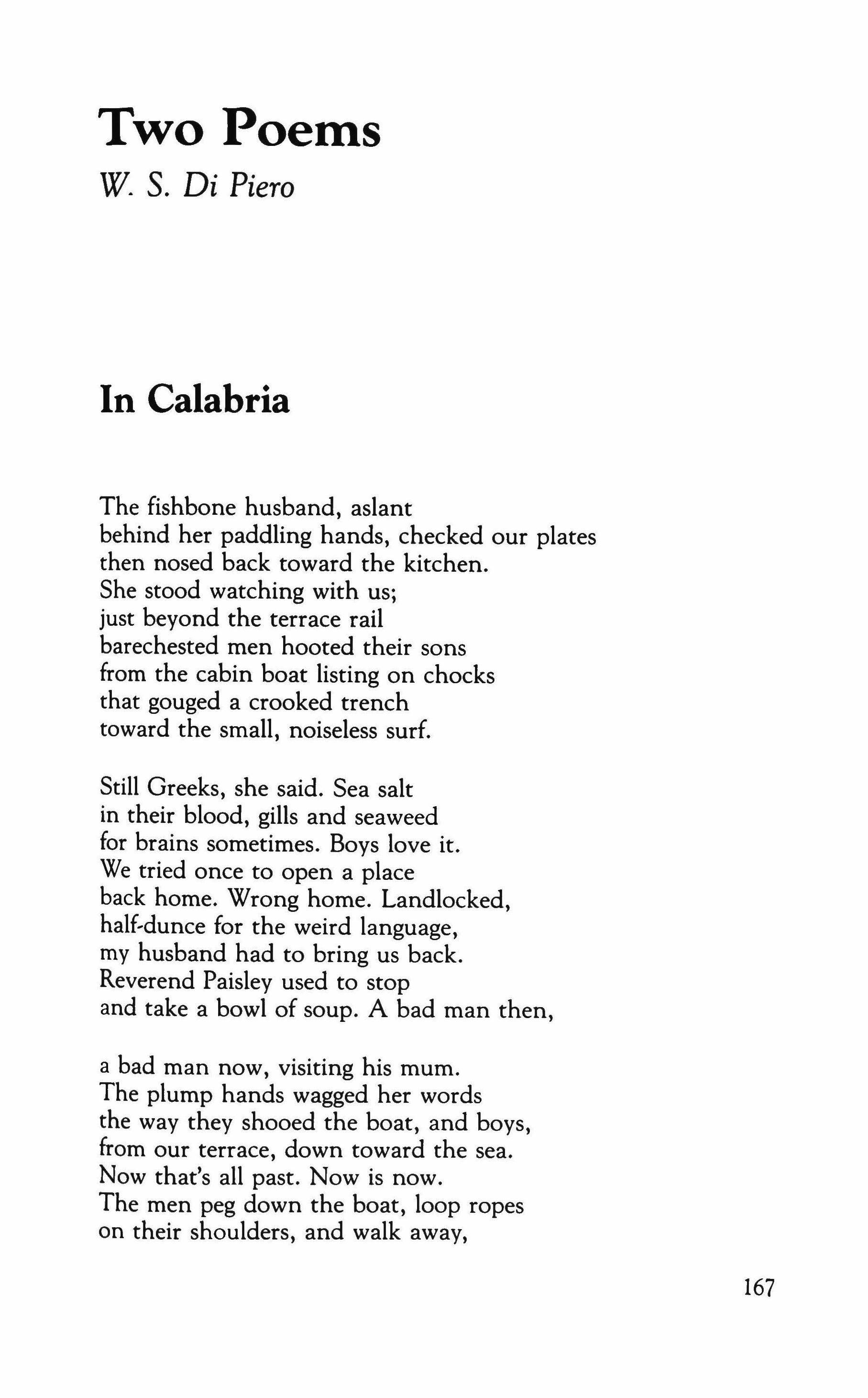
In Calabria
The fishbone husband, aslant behind her paddling hands, checked our plates then nosed back toward the kitchen. She stood watching with us; just beyond the terrace rail barechested men hooted their sons from the cabin boat listing on chocks that gouged a crooked trench toward the small, noiseless surf.
Still Greeks, she said. Sea salt in their blood, gills and seaweed for brains sometimes. Boys love it. We tried once to open a place back home. Wrong home. Landlocked, half-dunce for the weird language, my husband had to bring us back. Reverend Paisley used to stop and take a bowl of soup. A bad man then, a bad man now, visiting his mum. The plump hands wagged her words the way they shooed the boat, and boys, from our terrace, down toward the sea. Now that's all past. Now is now. The men peg down the boat, loop ropes on their shoulders, and walk away,
167
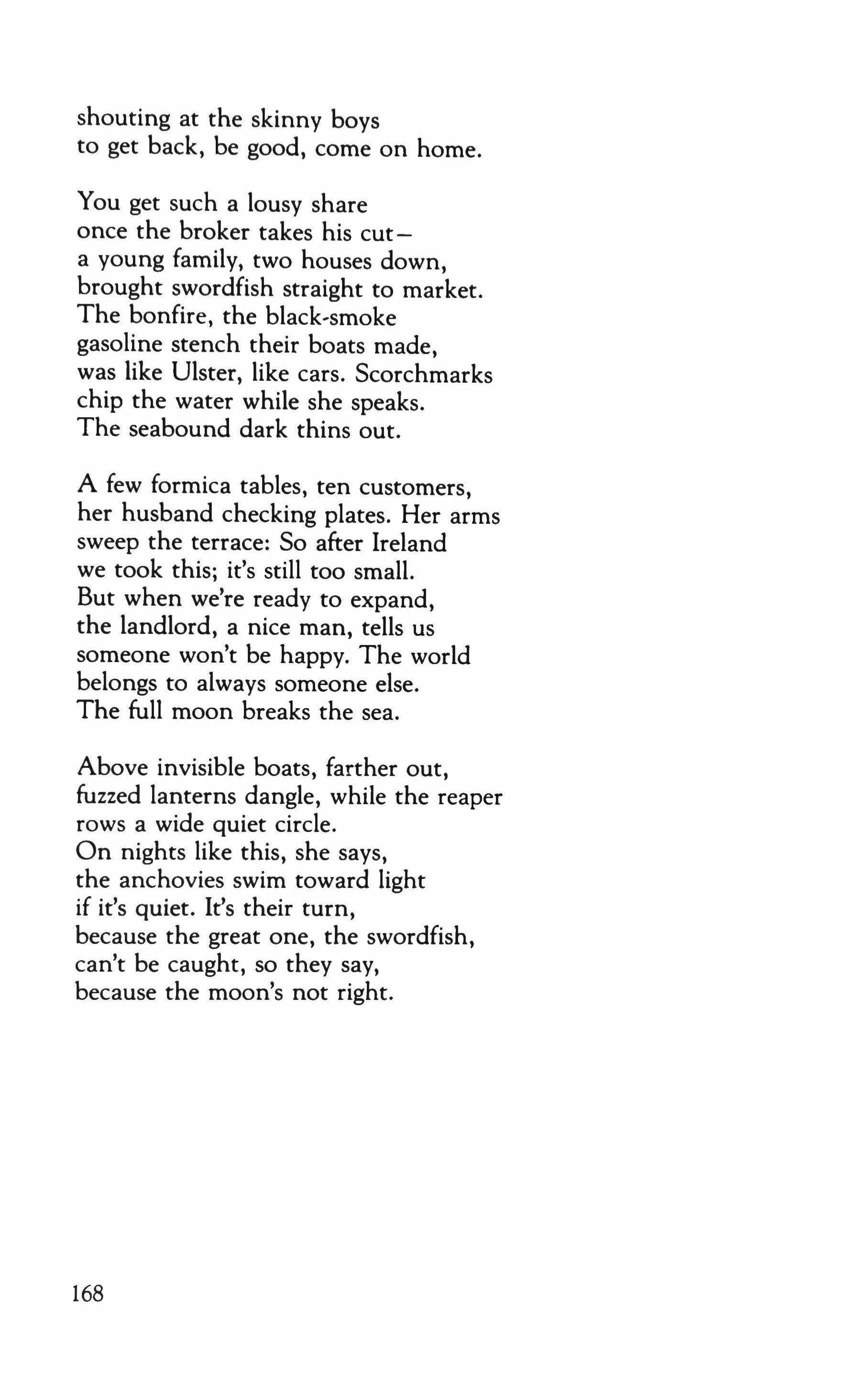
shouting at the skinny boys to get back, be good, come on home.
You get such a lousy share once the broker takes his cuta young family, two houses down, brought swordfish straight to market. The bonfire, the black-smoke gasoline stench their boats made, was like Ulster, like cars. Scorchmarks chip the water while she speaks. The seabound dark thins out.
A few formica tables, ten customers, her husband checking plates. Her arms sweep the terrace: So after Ireland we took this; it's still too small. But when we're ready to expand, the landlord, a nice man, tells us someone won't be happy. The world belongs to always someone else. The full moon breaks the sea.
Above invisible boats, farther out, fuzzed lanterns dangle, while the reaper rows a wide quiet circle. On nights like this, she says, the anchovies swim toward light if it's quiet. It's their turn, because the great one, the swordfish, can't be caught, so they say, because the moon's not right.
168
The Caverns
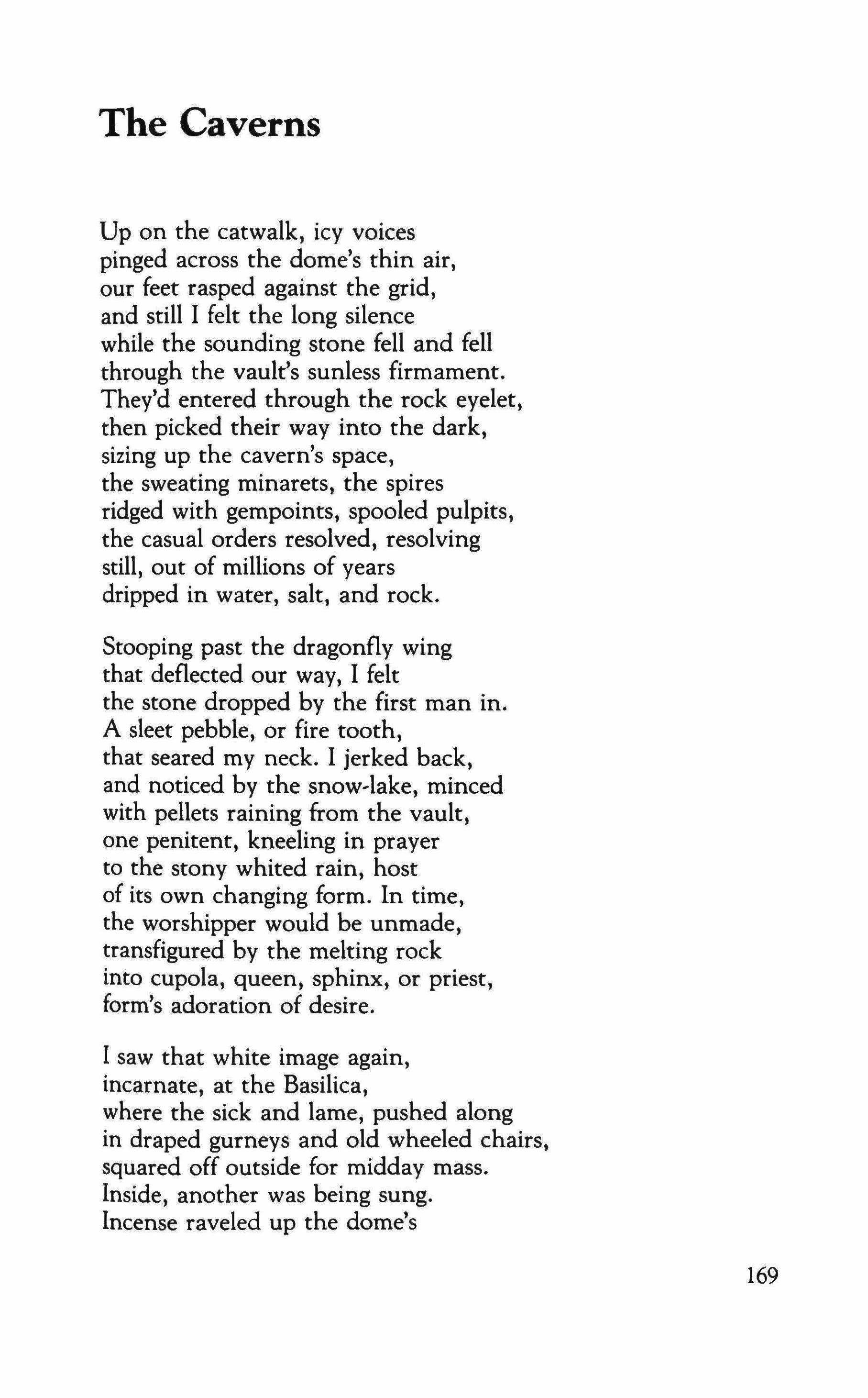
Up on the catwalk, icy voices pinged across the dome's thin air, our feet rasped against the grid, and still I felt the long silence while the sounding stone fell and fell through the vault's sunless firmament. They'd entered through the rock eyelet, then picked their way into the dark, sizing up the cavern's space, the sweating minarets, the spires ridged with gempoints, spooled pulpits, the casual orders resolved, resolving still, out of millions of years dripped in water, salt, and rock.
Stooping past the dragonfly wing that deflected our way, I felt the stone dropped by the first man in. A sleet pebble, or fire tooth, that seared my neck. I jerked back, and noticed by the snow-lake, minced with pellets raining from the vault, one penitent, kneeling in prayer to the stony whited rain, host of its own changing form. In time, the worshipper would be unmade, transfigured by the melting rock into cupola, queen, sphinx, or priest, form's adoration of desire.
I saw that white image again, incarnate, at the Basilica, where the sick and lame, pushed along in draped gurneys and old wheeled chairs, squared off outside for midday mass. Inside, another was being sung. Incense raveled up the dome's
169

sun-gashed ribs. Some worshippers entered Mary's house, kneeling, or fondled its marble carapace. Some, with rosaries, stood apart. Remote, puff-eyed children, staring every wild way, rocked and slouched among disheveled pews.
Near, unwatched by them, a man old enough to be shamed by loss or want, knelt in a corner, weeping to his young confessor whose face, passionate in reply, imaged political conviction, the ideologue's righteous love unchanging. His look assumed a world. All around, in other boxes, the wronged, the sorry, the charged will despairing momentarily in penitential disarray waited, astonished, all of us, by brute divinity in the air.
The want of faith crushed my breath. Wanting that piece of nature back, I looked up toward the smoldering dome and wondered how long it would take the stone, dropped twenty years ago, to hit bottom, to be at rest. The hot finger stung my flesh. One of the mongol children, puffed face nodding, grinned at my surprisehis smile mocked no images, gave proof of chaotic election, that touch (his keeper grabbed him, begged forgiveness) the last ruined gift that explodes and brings the god.
170
Poetry
Cai Qi;jiao

It is the tide, an everlasting cry Or a star, the never-ending silence. Whether shouted or voiceless, Neither is for human beings to choose.
How easy to not write poetry for truth. Lies come along to cover emptiness. The shining petals of glory Are never an equal of truth.
To search the heart is poetry's lifeblood. Perhaps it was found but it's lost again. The blue smoke and gray ash Both are brothers of that fire.
1976
Translated from the Chinese by Edward Morin and Dai Fang
171
Two Poems
Stephen Dunn
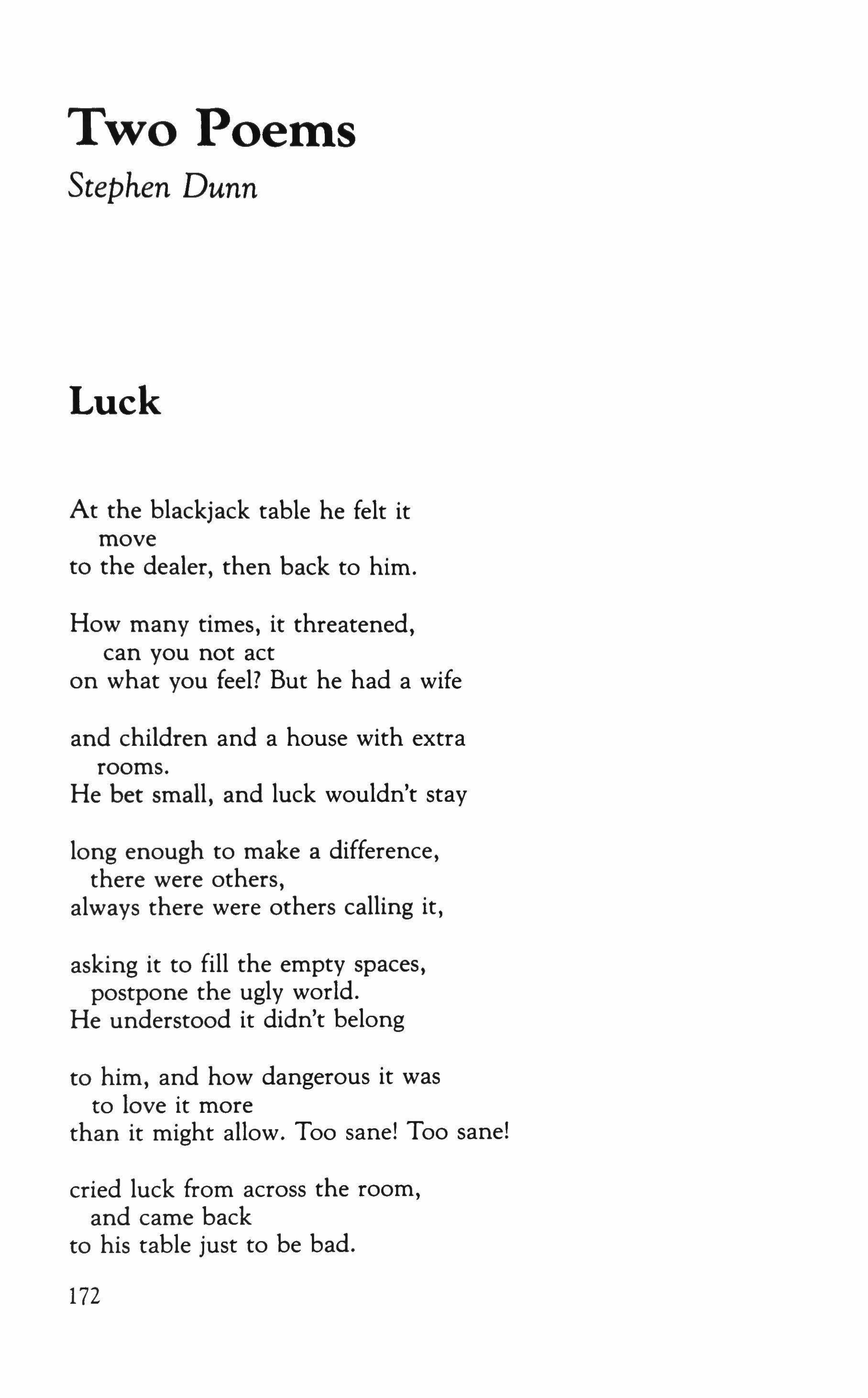
Luck
At the blackjack table he felt it move to the dealer, then back to him. How many times, it threatened, can you not act on what you feel? But he had a wife and children and a house with extra rooms. He bet small, and luck wouldn't stay long enough to make a difference, there were others, always there were others calling it, asking it to fill the empty spaces, postpone the ugly world. He understood it didn't belong to him, and how dangerous it was to love it more than it might allow. Too sane! Too sane!
cried luck from across the room, and came back to his table just to be bad. 172
The Man Who Closed Shop
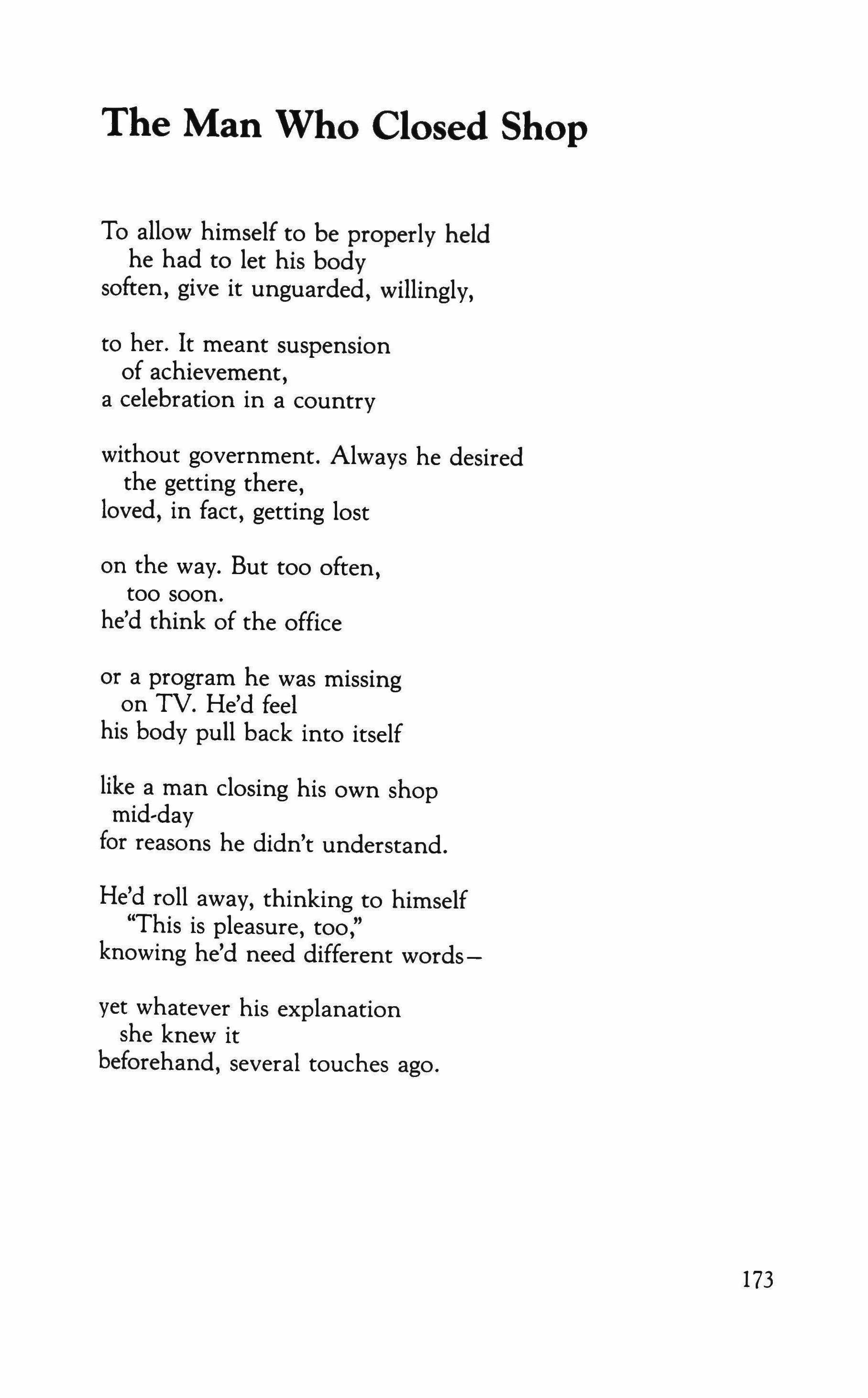
To allow himself to be properly held he had to let his body soften, give it unguarded, willingly, to her. It meant suspension of achievement, a celebration in a country without government. Always he desired the getting there, loved, in fact, getting lost on the way. But too often, too soon. he'd think of the office or a program he was missing on TV. He'd feel his body pull back into itself
like a man closing his own shop mid-day for reasons he didn't understand. He'd roll away, thinking to himself "This is pleasure, too:' knowing he'd need different wordsyet whatever his explanation she knew it beforehand, several touches ago.
173
Two Poems
Margaret Randall
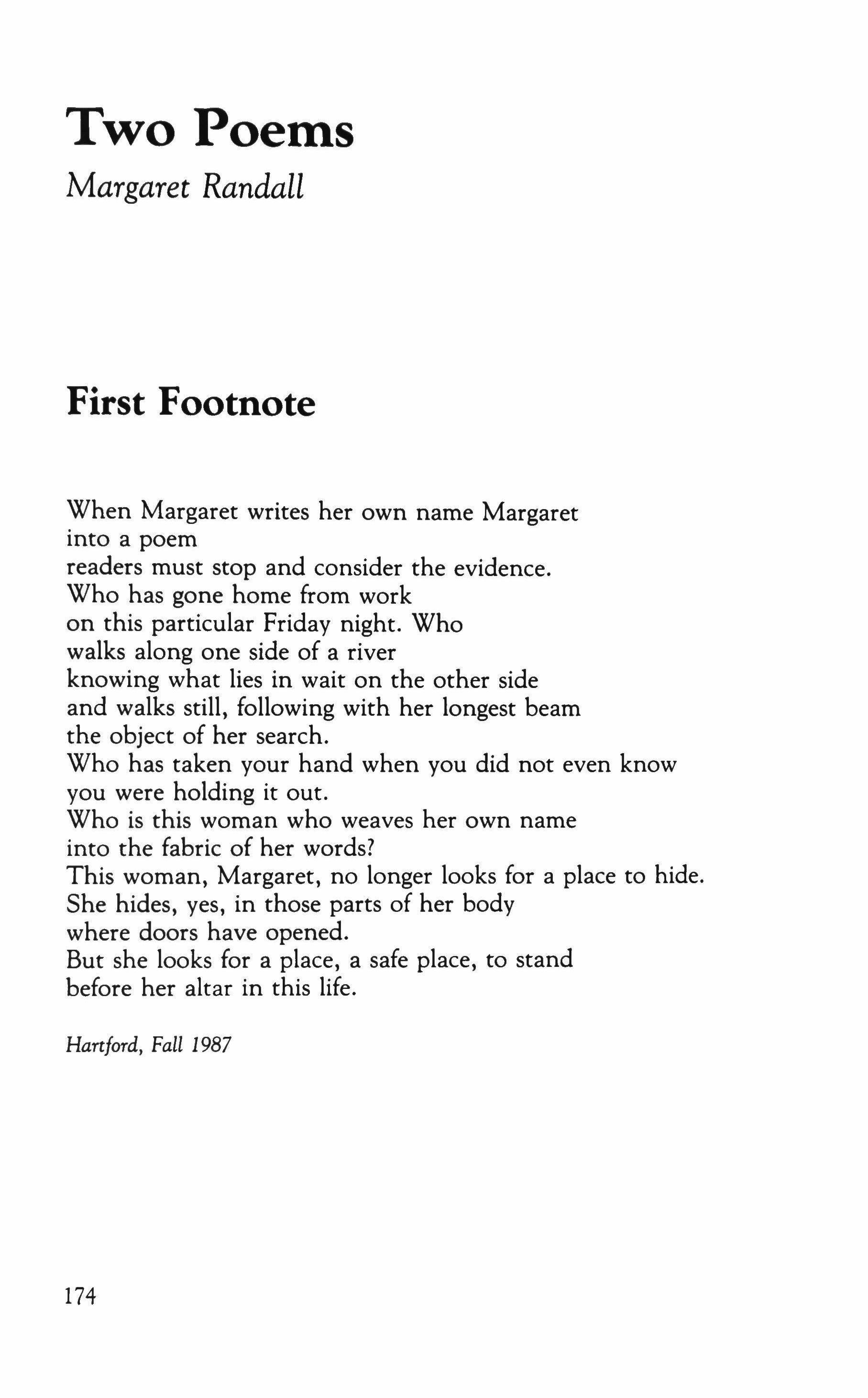
First Footnote
When Margaret writes her own name Margaret into a poem readers must stop and consider the evidence. Who has gone home from work on this particular Friday night. Who walks along one side of a river knowing what lies in wait on the other side and walks still, following with her longest beam the object of her search.
Who has taken your hand when you did not even know you were holding it out. Who is this woman who weaves her own name into the fabric of her words?
This woman, Margaret, no longer looks for a place to hide. She hides, yes, in those parts of her body where doors have opened.
But she looks for a place, a safe place, to stand before her altar in this life.
Hartford, Fall 1987
174
Second Footnote
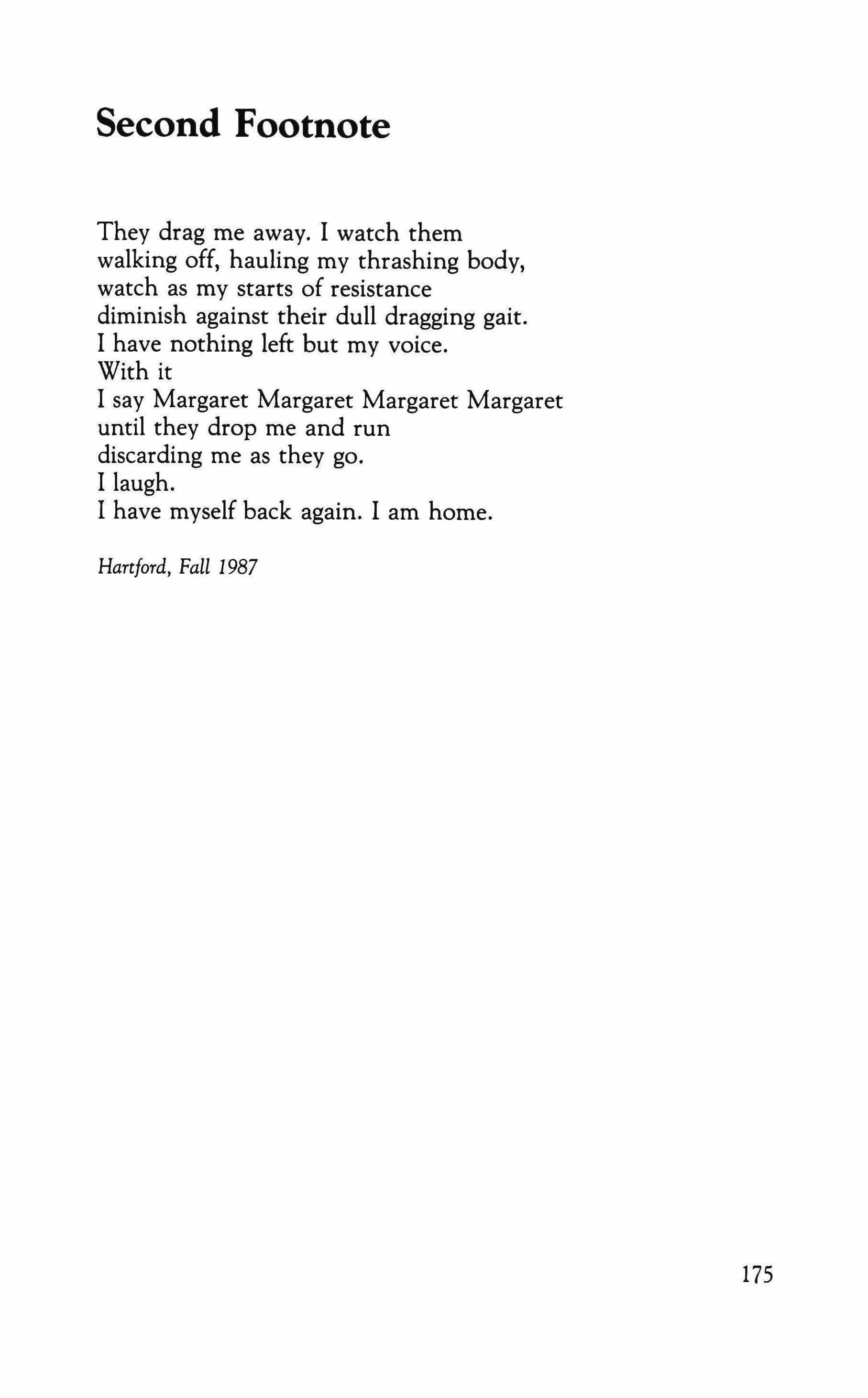
They drag me away. I watch them walking off, hauling my thrashing body, watch as my starts of resistance diminish against their dull dragging gait. I have nothing left but my voice. With it
I say Margaret Margaret Margaret Margaret until they drop me and run discarding me as they go. I laugh. I have myself back again. I am home.
Hartford, Fall 1987
175
Four Poems
Alan Shapiro
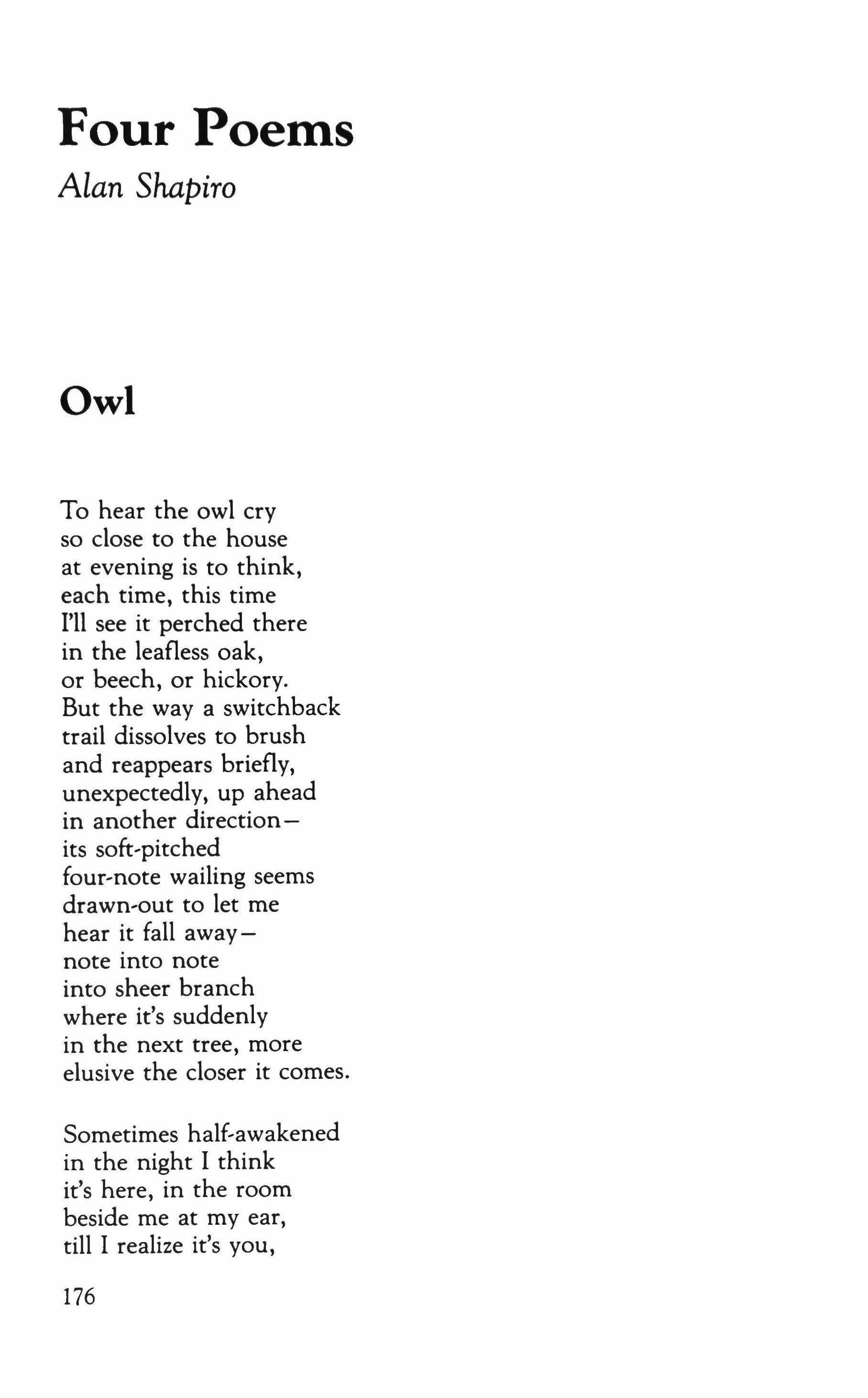
Owl
To hear the owl cry so close to the house at evening is to think, each time, this time I'll see it perched there in the leafless oak, or beech, or hickory. But the way a switchback trail dissolves to brush and reappears briefly, unexpectedly, up ahead in another directionits soft-pitched four-note wailing seems drawn-out to let me hear it fall awaynote into note into sheer branch where it's suddenly in the next tree, more elusive the closer it comes.
Sometimes half-awakened in the night I think it's here, in the room beside me at my ear, till I realize it's you,
176
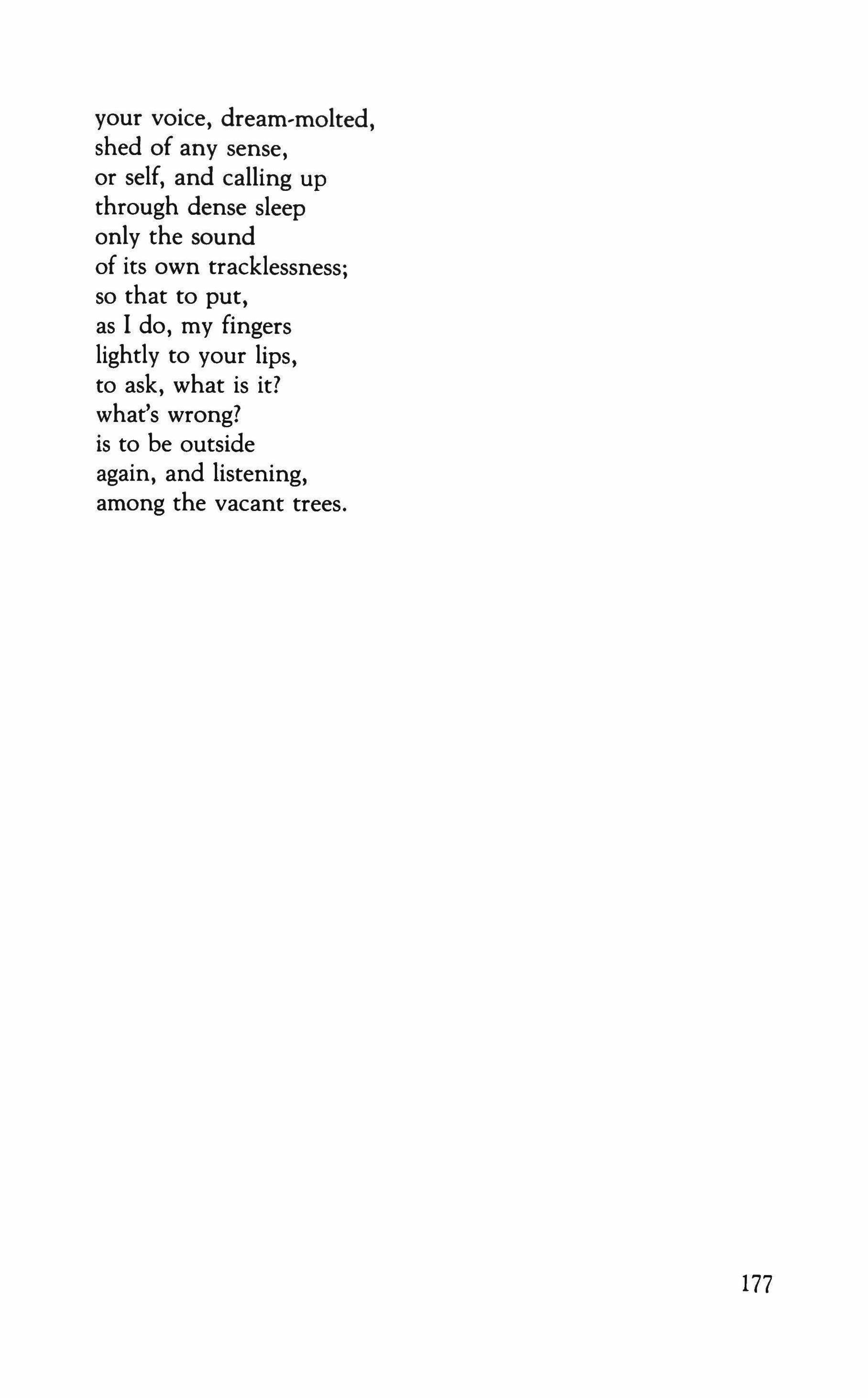
your voice, dream,molted, shed of any sense, or self, and calling up through dense sleep only the sound of its own tracklessness; so that to put, as I do, my fingers lightly to your lips, to ask, what is it? what's wrong? is to be outside again, and listening, among the vacant trees.
177
Night Watch
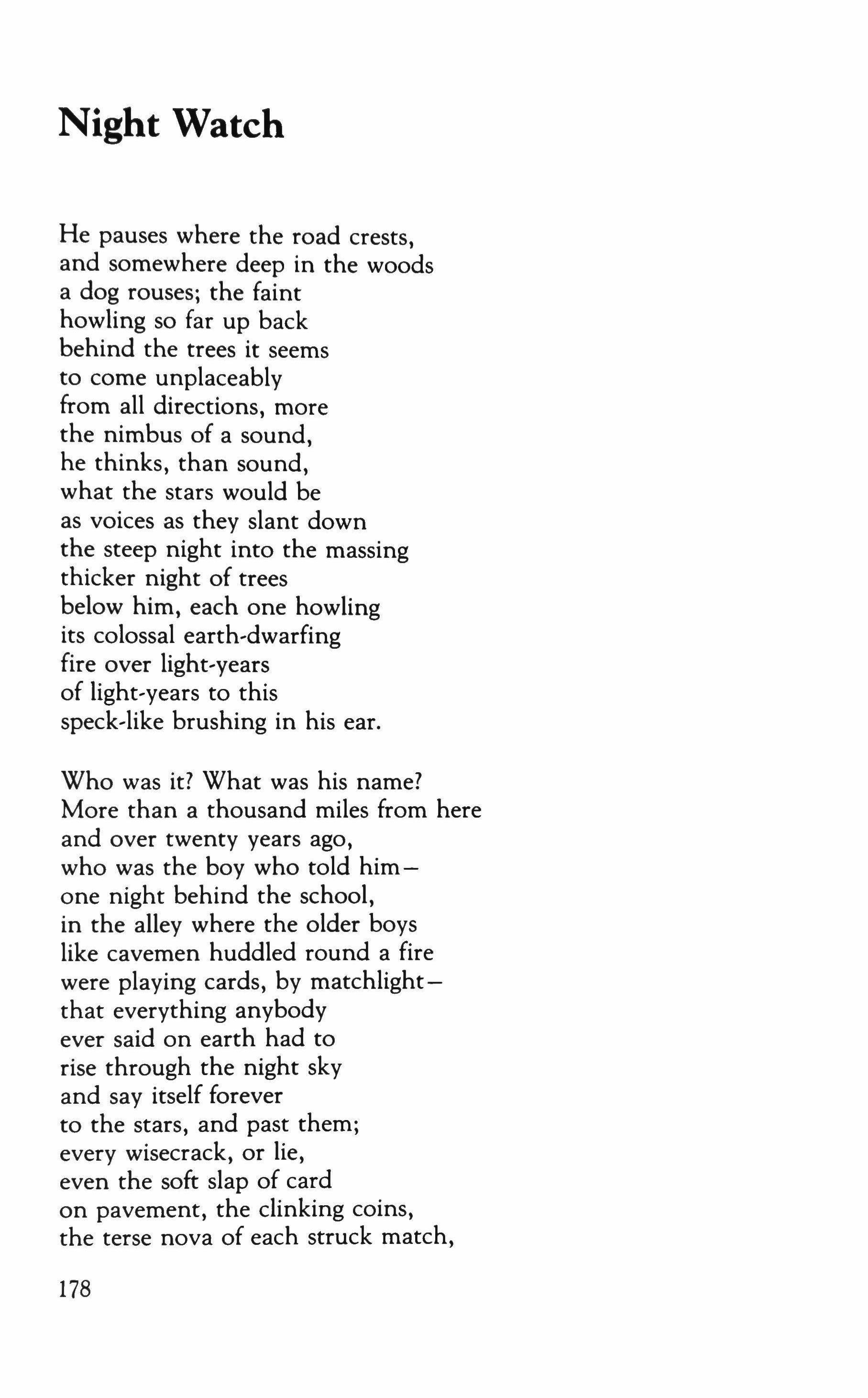
He pauses where the road crests, and somewhere deep in the woods a dog rouses; the faint howling so far up back behind the trees it seems to come unplaceably from all directions, more the nimbus of a sound, he thinks, than sound, what the stars would be as voices as they slant down the steep night into the massing thicker night of trees below him, each one howling its colossal earth-dwarfing fire over light,years of light-years to this speck,like brushing in his ear.
Who was it? What was his name?
More than a thousand miles from here and over twenty years ago, who was the boy who told himone night behind the school, in the alley where the older boys like cavemen huddled round a fire were playing cards, by matchlightthat everything anybody ever said on earth had to rise through the night sky and say itself forever to the stars, and past them; every wisecrack, or lie, even the soft slap of card on pavement, the clinking coins, the terse nova of each struck match,
178
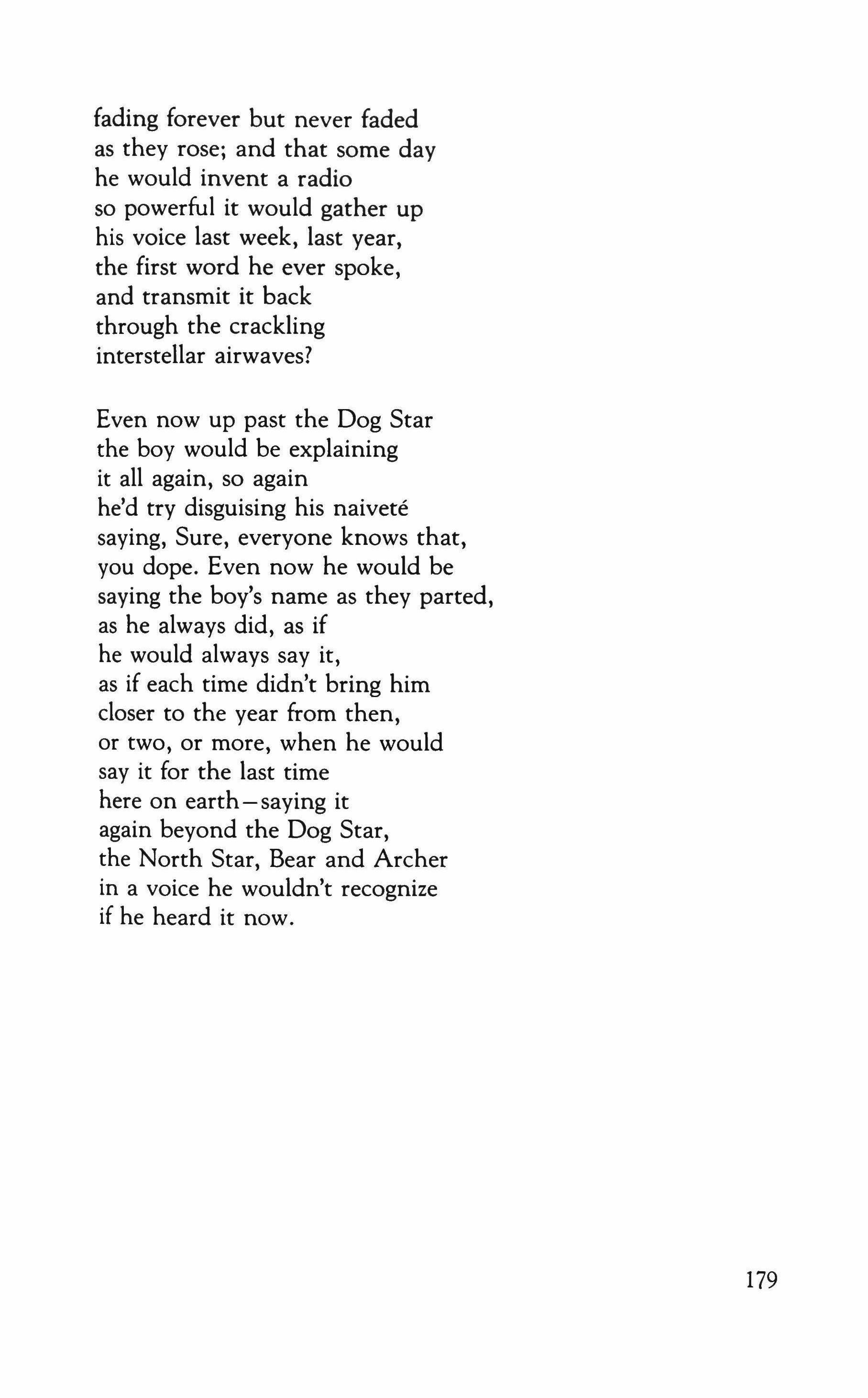
fading forever but never faded as they rose; and that some day he would invent a radio so powerful it would gather up his voice last week, last year, the first word he ever spoke, and transmit it back through the crackling interstellar airwaves?
Even now up past the Dog Star the boy would be explaining it all again, so again he'd try disguising his naivete saying, Sure, everyone knows that, you dope. Even now he would be saying the boy's name as they parted, as he always did, as if he would always say it, as if each time didn't bring him closer to the year from then, or two, or more, when he would say it for the last time here on earth - saying it again beyond the Dog Star, the North Star, Bear and Archer in a voice he wouldn't recognize if he heard it now.
179
Kinship
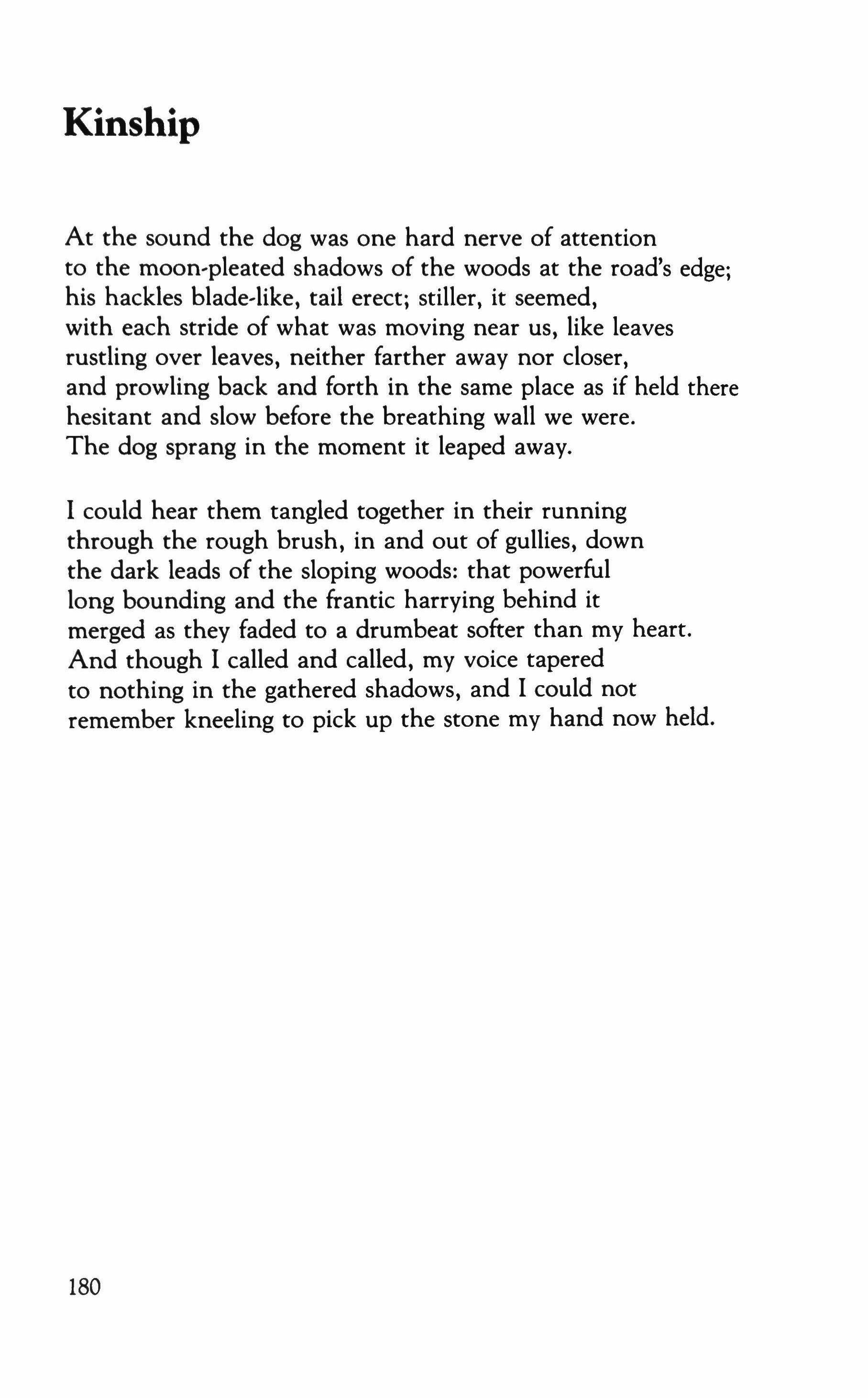
At the sound the dog was one hard nerve of attention to the moon-pleated shadows of the woods at the road's edge; his hackles blade-like, tail erect; stiller, it seemed, with each stride of what was moving near us, like leaves rustling over leaves, neither farther away nor closer, and prowling back and forth in the same place as if held there hesitant and slow before the breathing wall we were. The dog sprang in the moment it leaped away.
I could hear them tangled together in their running through the rough brush, in and out of gullies, down the dark leads of the sloping woods: that powerful long bounding and the frantic harrying behind it merged as they faded to a drumbeat softer than my heart. And though I called and called, my voice tapered to nothing in the gathered shadows, and I could not remember kneeling to pick up the stone my hand now held.
180
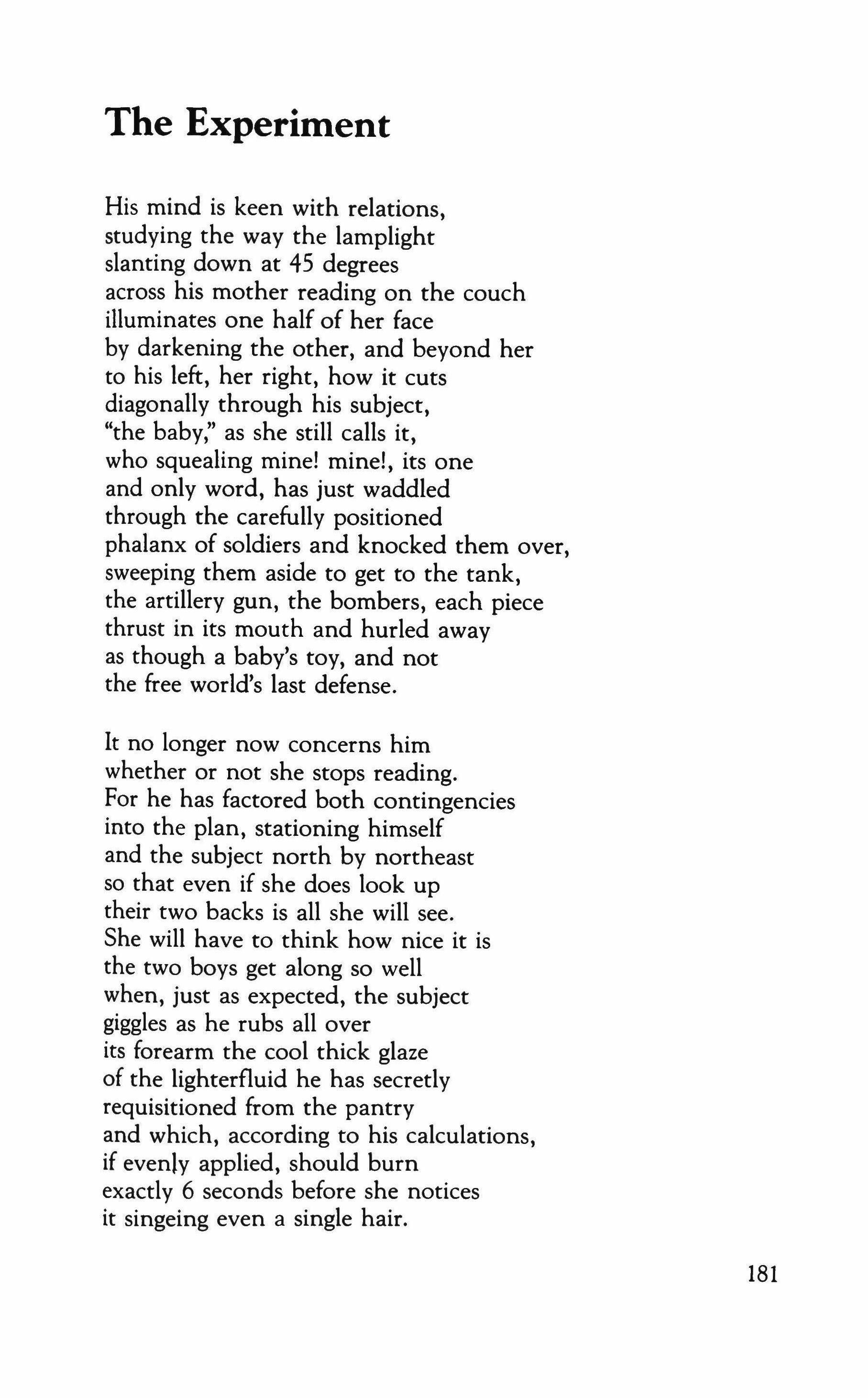
The Experiment
His mind is keen with relations, studying the way the lamplight slanting down at 45 degrees across his mother reading on the couch illuminates one half of her face by darkening the other, and beyond her to his left, her right, how it cuts diagonally through his subject, "the baby," as she still calls it, who squealing mine! mine!, its one and only word, has just waddled through the carefully positioned phalanx of soldiers and knocked them over, sweeping them aside to get to the tank, the artillery gun, the bombers, each piece thrust in its mouth and hurled away as though a baby's toy, and not the free world's last defense.
It no longer now concerns him whether or not she stops reading. For he has factored both contingencies into the plan, stationing himself and the subject north by northeast so that even if she does look up their two backs is all she will see. She will have to think how nice it is the two boys get along so well when, just as expected, the subject giggles as he rubs all over its forearm the cool thick glaze of the lighterfluid he has secretly requisitioned from the pantry and which, according to his calculations, if evenly applied, should burn exactly 6 seconds before she notices it singeing even a single hair.
181
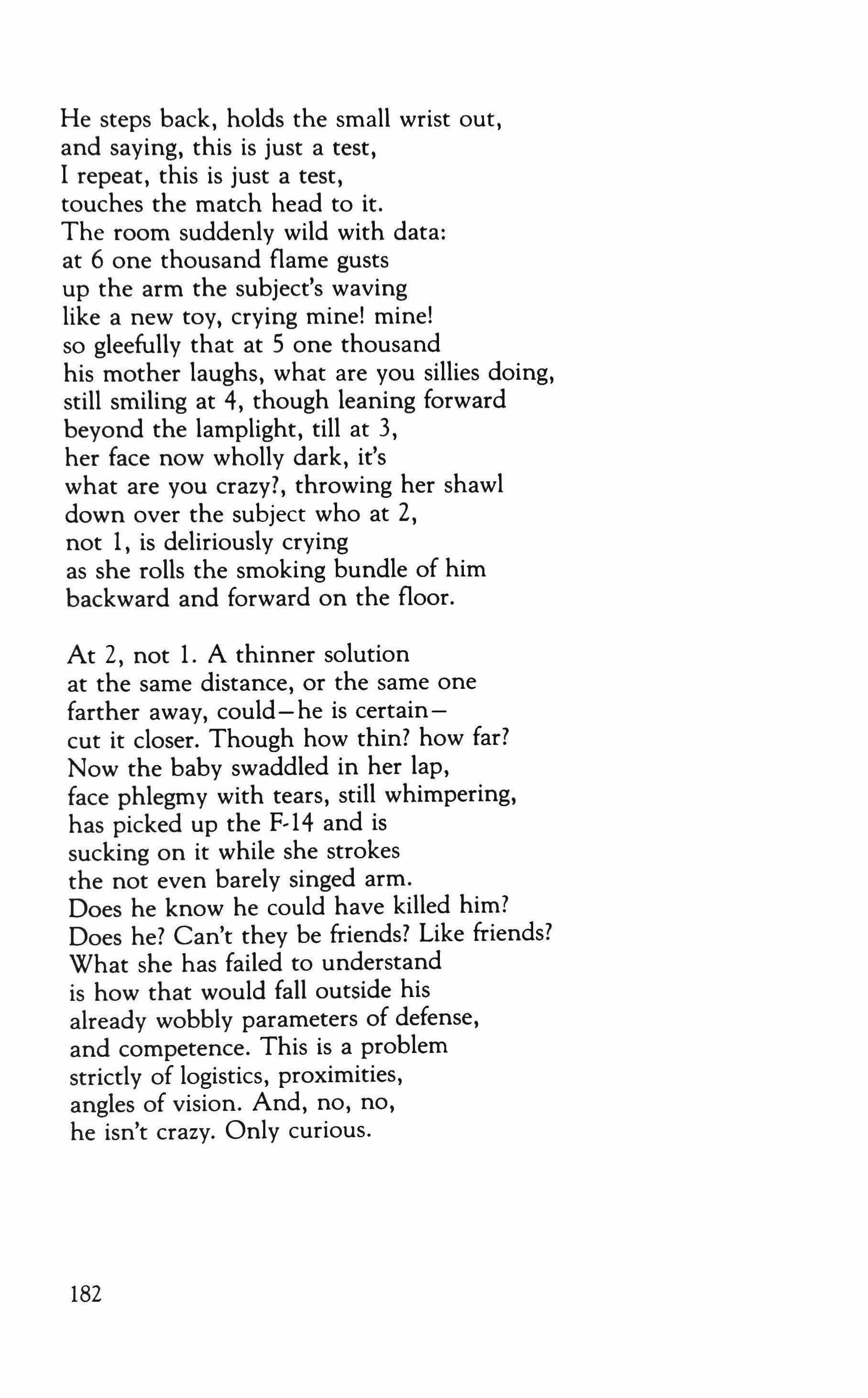
He steps back, holds the small wrist out, and saying, this is just a test, I repeat, this is just a test, touches the match head to it.
The room suddenly wild with data: at 6 one thousand flame gusts up the arm the subject's waving like a new toy, crying mine! mine! so gleefully that at 5 one thousand his mother laughs, what are you sillies doing, still smiling at 4, though leaning forward beyond the lamplight, till at 3, her face now wholly dark, it's what are you crazy?, throwing her shawl down over the subject who at 2, not 1, is deliriously crying as she rolls the smoking bundle of him backward and forward on the floor.
At 2, not 1. A thinner solution at the same distance, or the same one farther away, could-he is certaincut it closer. Though how thin? how far? Now the baby swaddled in her lap, face phlegmy with tears, still whimpering, has picked up the F-14 and is sucking on it while she strokes the not even barely singed arm. Does he know he could have killed him? Does he? Can't they be friends? Like friends? What she has failed to understand is how that would fall outside his already wobbly parameters of defense, and competence. This is a problem strictly of logistics, proximities, angles of vision. And, no, no, he isn't crazy. Only curious.
182
Three Poems
Hwang linie
Ah, What Have I Done
Ah, what have I done-as though I didn't know my feelings would remain. I would not add the few words that would keep him.
I want to understand the joy I felt as I was letting him go.
Whenever Did I
Whenever did I break trust? When did I ever break words to you? Dark so deep the risen moon is drowned, and you would not bestow a sign.
Wind still fills with falling leaves, but what have I now to do with sound?
At Cold Solstice
At cold solstice I cut myself in two, take the long middle of my night to quilted bed, curl up the dark under broideries of spring, to wait a night spread out again for you.

Translated from the Korean by Constantine Contogenis and Wolhee Choe
183
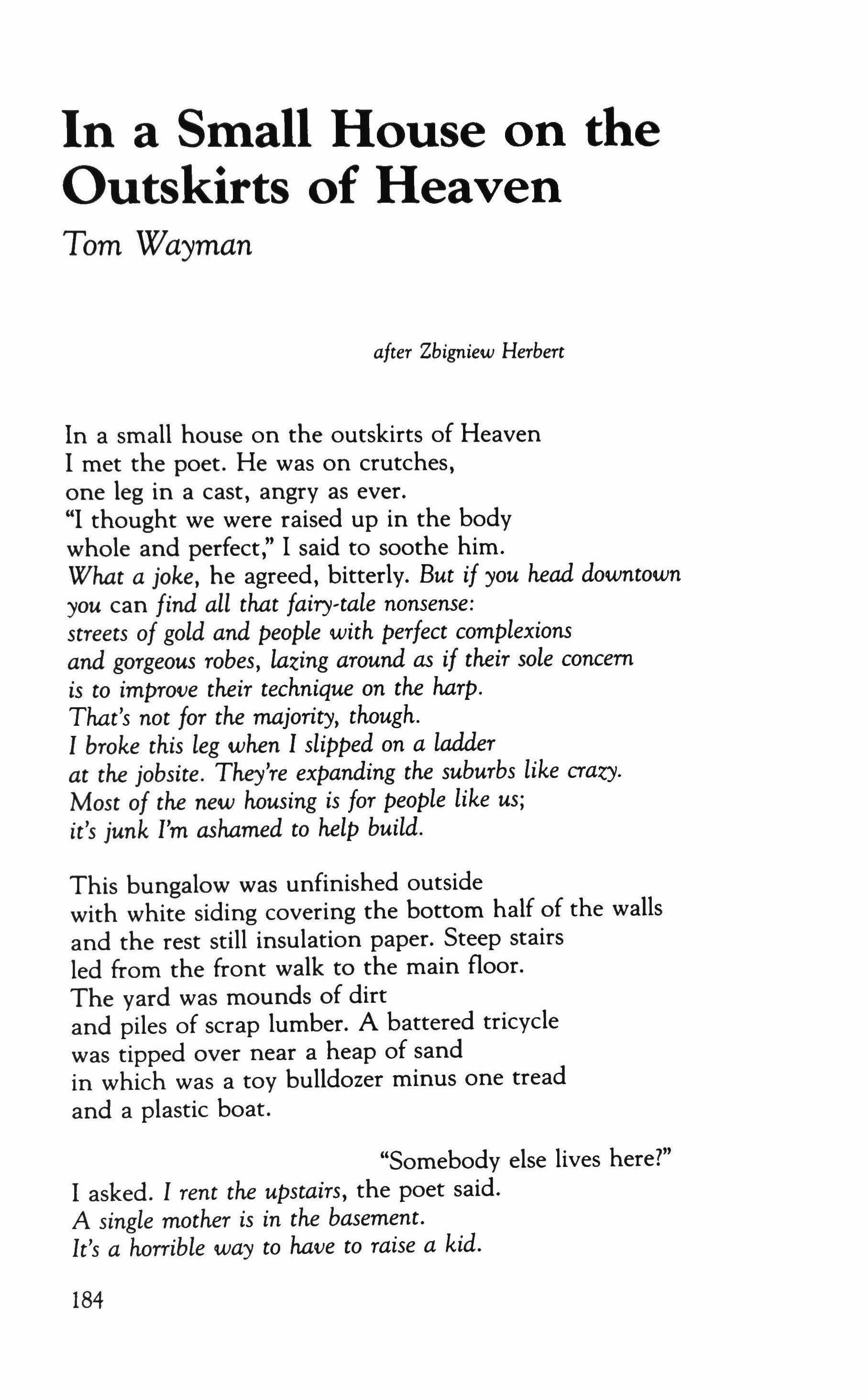
In a Small House on the Outskirts of Heaven
Tom Wayman after Zbigniew Herbert
In a small house on the outskirts of Heaven
I met the poet. He was on crutches, one leg in a cast, angry as ever. "I thought we were raised up in the body whole and perfect," I said to soothe him. What a joke, he agreed, bitterly. But if you head downtown you can find all that fairy-tale nonsense: streets of gold and people with perfect complexions and gorgeous robes, lazing around as if their sole concern is to improve their technique on the harp. That's not for the majority, though. I broke this leg when I slipped on a ladder at the jobsite. They're expanding the suburbs like crazy. Most of the new housing is for people like us; it's junk I'm ashamed to help build.
This bungalow was unfinished outside with white siding covering the bottom half of the walls and the rest still insulation paper. Steep stairs led from the front walk to the main floor. The yard was mounds of dirt and piles of scrap lumber. A battered tricycle was tipped over near a heap of sand in which was a toy bulldozer minus one tread and a plastic boat.
"Somebody else lives here?"
I asked. I rent the upstairs, the poet said. A single mother is in the basement. It's a horrible way to have to raise a kid.
184
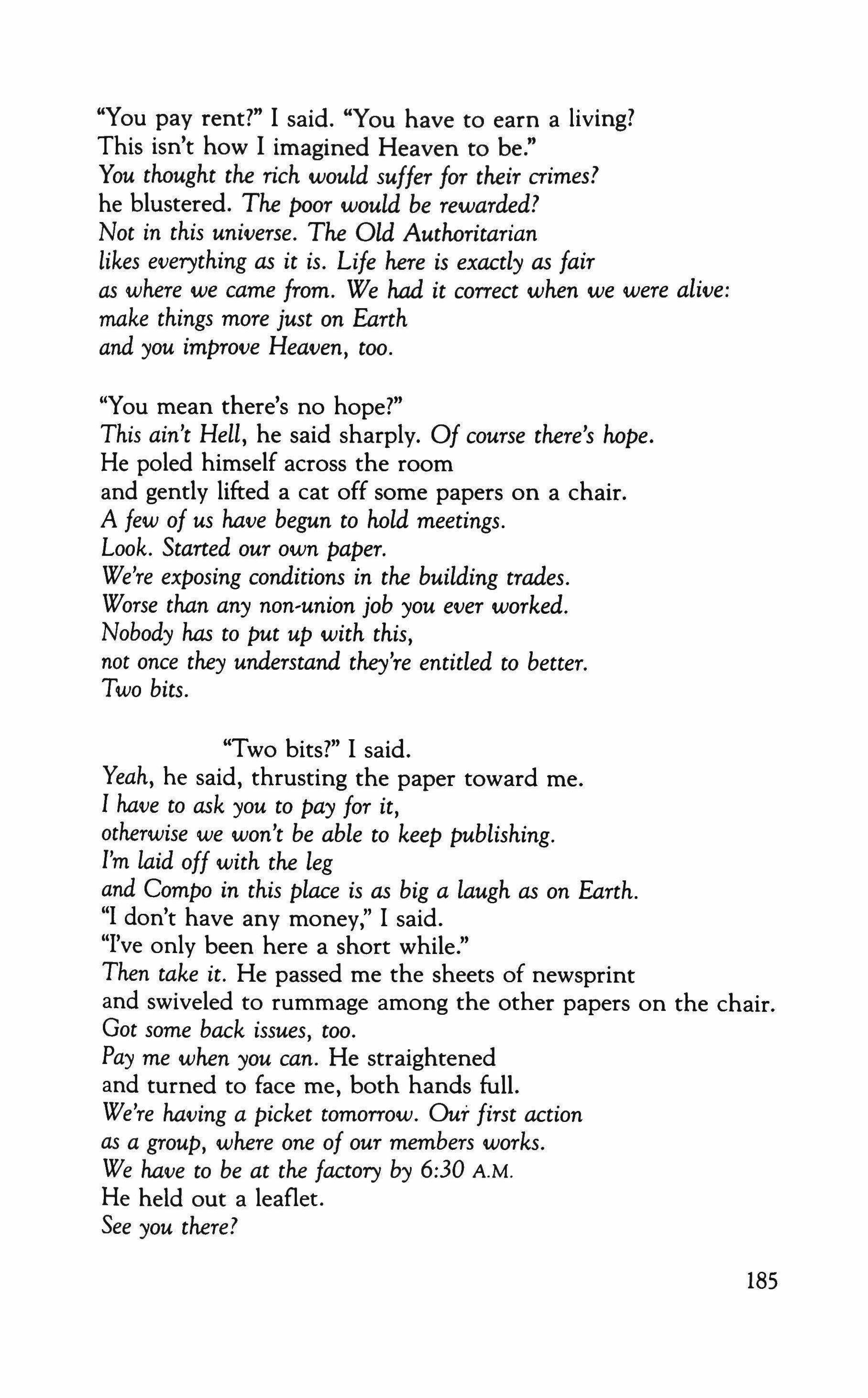
"You pay rent?" I said. "You have to earn a living? This isn't how I imagined Heaven to be." You thought the rich would suffer for their crimes? he blustered. The poor would be rewarded? Not in this universe. The Old Authoritarian likes everything as it is. Life here is exactly as fair as where we came from. We had it correct when we were alive: make things more just on Earth and you improve Heaven, too.
"You mean there's no hope?"
This ain't Hell, he said sharply. Of course there's hope. He poled himself across the room and gently lifted a cat off some papers on a chair. A few of us have begun to hold meetings. Look. Started our own paper. We're exposing conditions in the building trades. Worse than any non-unton job you ever worked. Nobody has to put up with this, not once they understand they're entitled to better. Two bits.
"Two bits?" I said. Yeah, he said, thrusting the paper toward me. I have to ask you to pay for it, otherwise we won't be able to keep publishing. I'm laid off with the leg and Compo in this place is as big a laugh as on Earth. "I don't have any money;' I said. "I've only been here a short while." Then take it. He passed me the sheets of newsprint and swiveled to rummage among the other papers on the chair. Got some back issues, too. Pay me when you can. He straightened and turned to face me, both hands full. We're having a picket tomorrow. Our first action as a group, where one of our members works. We have to be at the factory by 6:30 A.M. He held out a leaflet.
See you there?
185
Three Poems
Sandra McPherson
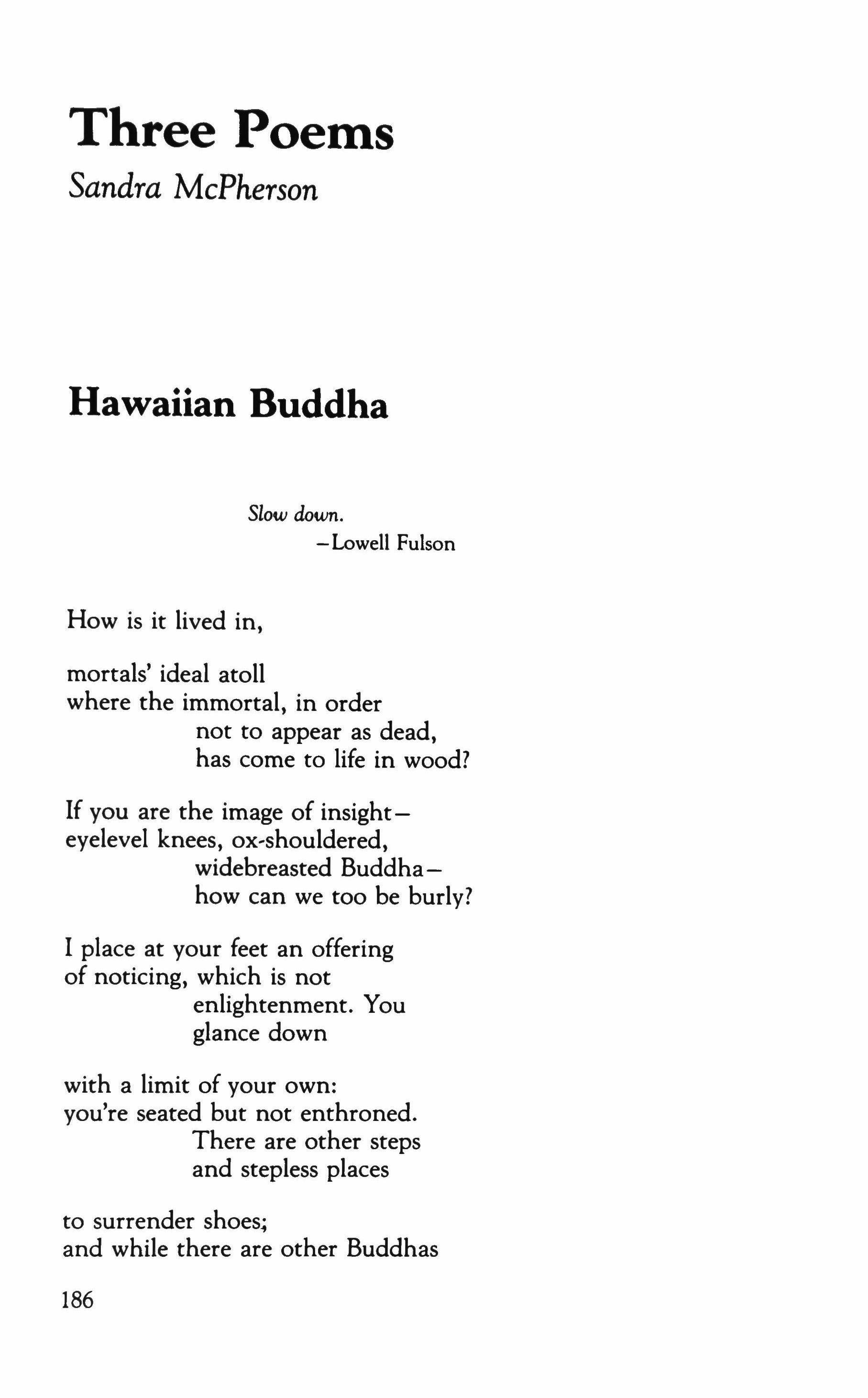
Hawaiian Buddha Slow down.
- Lowell Fulson
How is it lived in, mortals' ideal atoll where the immortal, in order not to appear as dead, has come to life in wood?
If you are the image of insighteyelevel knees, ox-shouldered, widebreasted Buddhahow can we too be burly?
I place at your feet an offering of noticing, which is not enlightenment. You glance down with a limit of your own: you're seated but not enthroned. There are other steps and stepless places to surrender shoes; and while there are other Buddhas
186
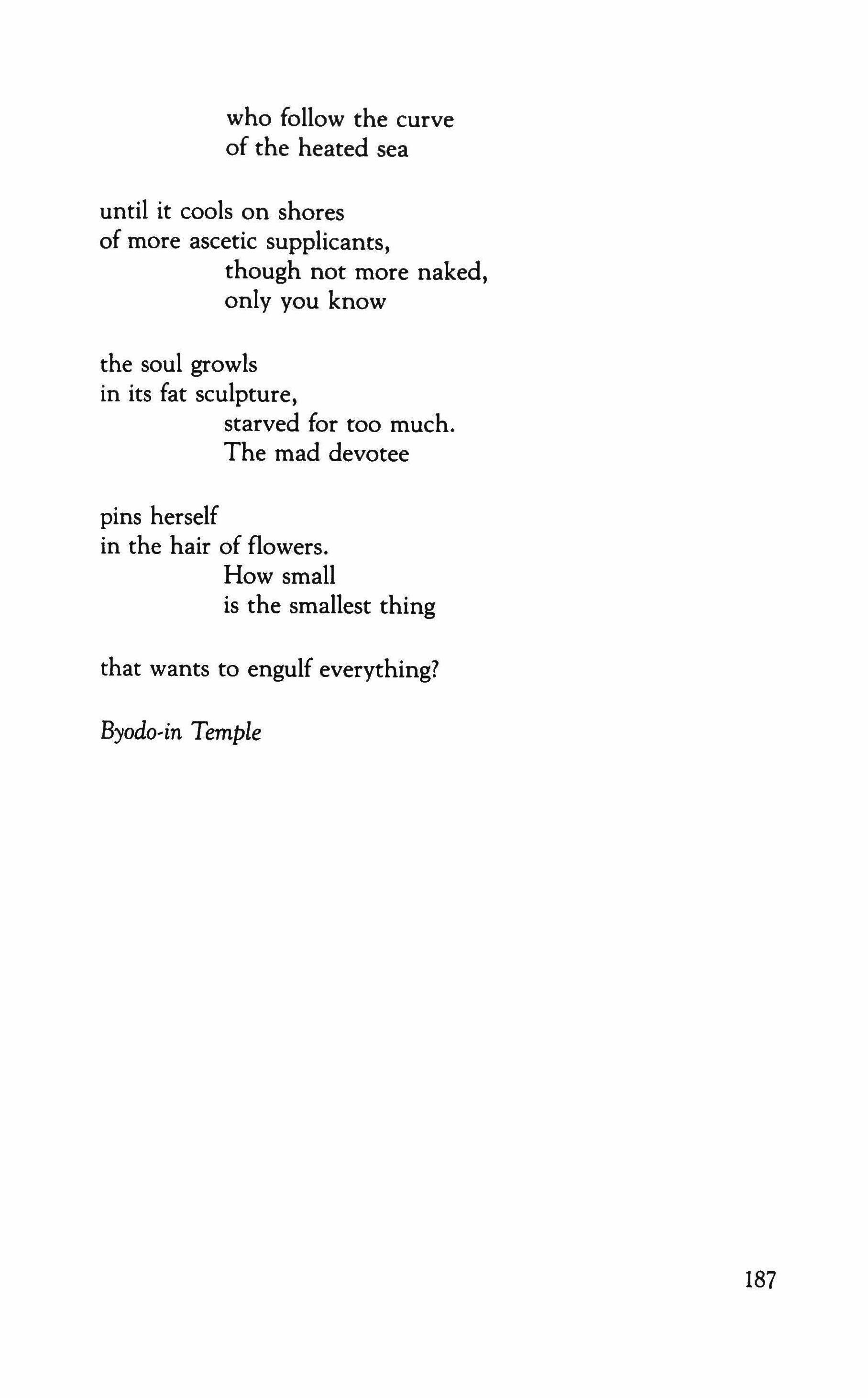
who follow the curve of the heated sea until it cools on shores of more ascetic supplicants, though not more naked, only you know the soul growls in its fat sculpture, starved for too much. The mad devotee pins herself in the hair of flowers. How small is the smallest thing that wants to engulf everything?
Byodo�in Temple
187

Blues in the Joy of the Fourth of July,
Dusk, Crissy Field, San Francisco
We are the host of people who don't sing but breathe in, suspiring cheap cupped spirits, cheer upward from the muddy front row, the sung-to under the chord of white, red, and blue.
Star on his turban, star over his head, the thinned man singing where the stage drops away outsings impatiently growling cannons poised to the north by the awe of the bay.
Hundreds of boats light up in strings of incandescence floating, tying up the air. While draped in bundles of phosphorescent whips, vendors want to sell the thing that makes them beautiful. And between songs the smell of launched light and its popping sound, proteiform smoke in faces of wind, a new lavender bomb of sparks,
of details, everyone sighing a roar. Ages of voices run together. But it is the singer's one voice, ropy, pulling, saying: A voice must be old, a voice compounded daily, split, doubled, rolling with cobbles like a mine under the sea, its sweetness kept as a matrix for roughness; a voice shivering, declarative, sent on ahead. Alleging. It must be first-person, closing in. Then his simplified speaking voice saying, "As soon as we're through here I'm playing at Eli's."
188
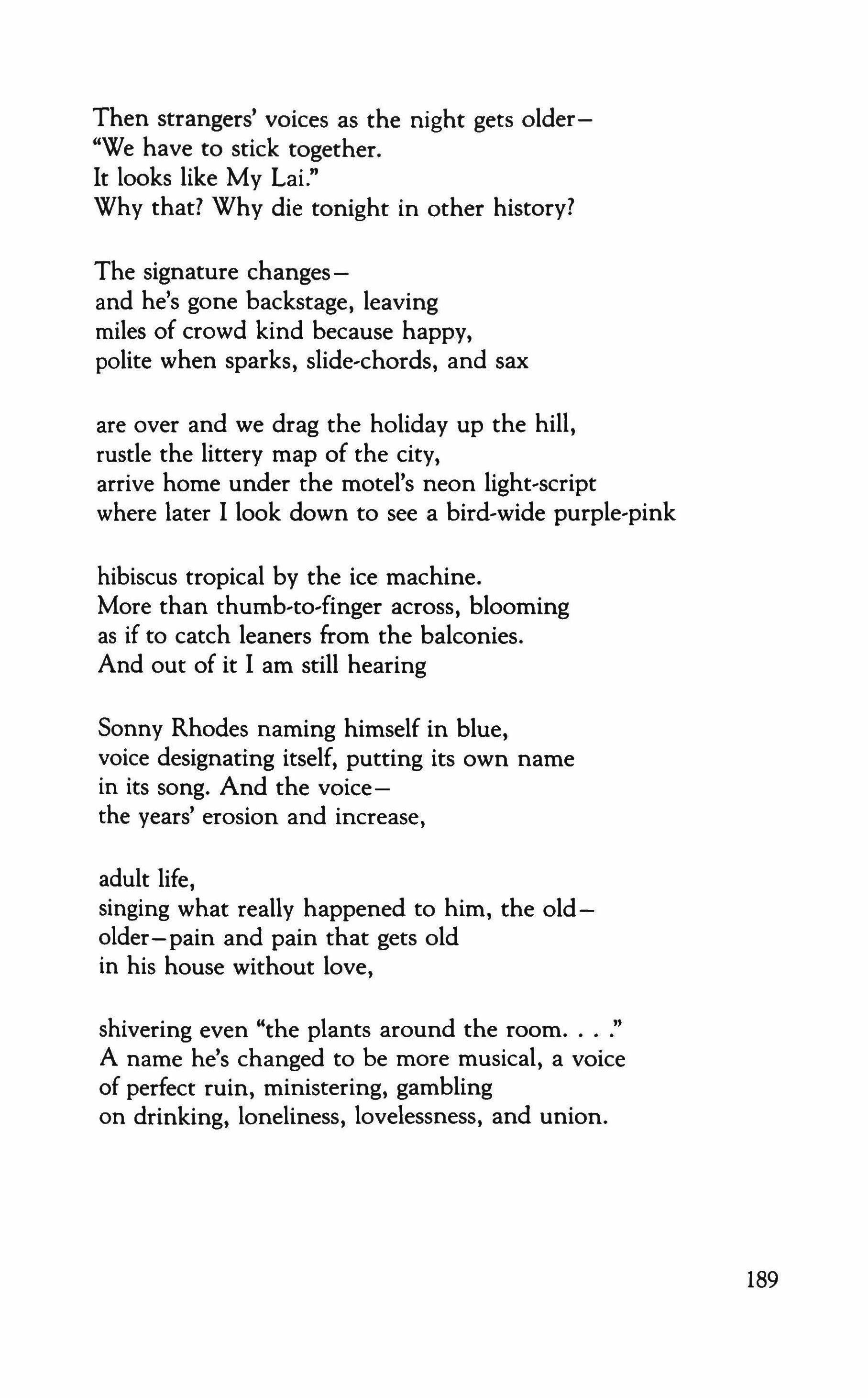
Then strangers' voices as the night gets older"We have to stick together. It looks like My LaL" Why that? Why die tonight in other history?
The signature changesand he's gone backstage, leaving miles of crowd kind because happy, polite when sparks, slide-chords, and sax
are over and we drag the holiday up the hill, rustle the littery map of the city, arrive home under the motel's neon light-script where later I look down to see a bird-wide purple-pink
hibiscus tropical by the ice machine. More than thumb-to-finger across, blooming as if to catch leaners from the balconies. And out of it I am still hearing
Sonny Rhodes naming himself in blue, voice designating itself, putting its own name in its song. And the voicethe years' erosion and increase,
adult life, singing what really happened to him, the oldolder-pain and pain that gets old in his house without love,
shivering even "the plants around the room A name he's changed to be more musical, a voice of perfect ruin, ministering, gambling on drinking, loneliness, lovelessness, and union.
189
Suspension:
Junior Wells on a Small Stage in a Converted Barn
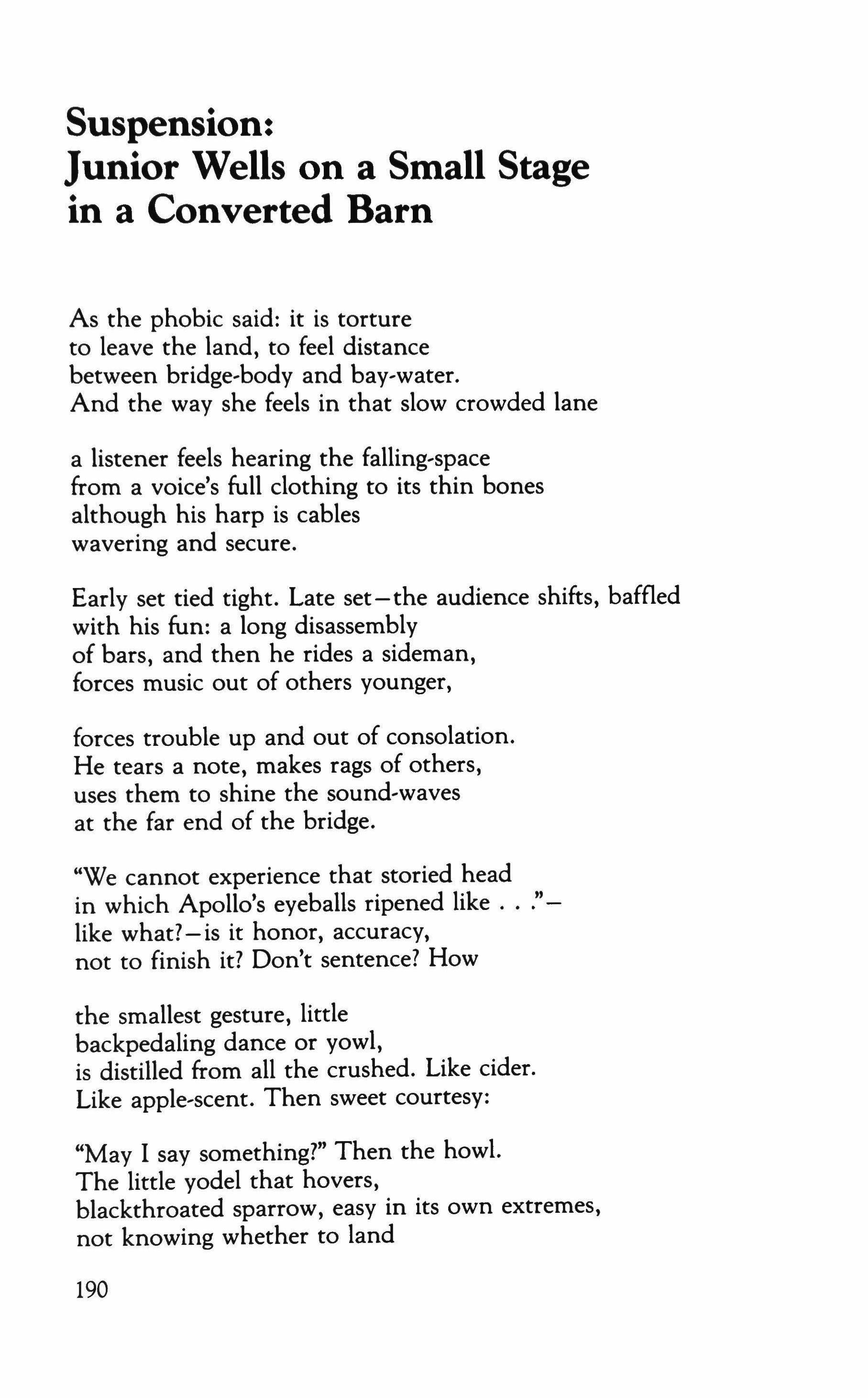
As the phobic said: it is torture to leave the land, to feel distance between bridge-body and bay-water. And the way she feels in that slow crowded lane
a listener feels hearing the falling-space from a voice's full clothing to its thin bones although his harp is cables wavering and secure.
Early set tied tight. Late set-the audience shifts, baffled with his fun: a long disassembly of bars, and then he rides a sideman, forces music out of others younger, forces trouble up and out of consolation. He tears a note, makes rags of others, uses them to shine the sound-waves at the far end of the bridge.
"We cannot experience that storied head in which Apollo's eyeballs ripened like "like what?-is it honor, accuracy, not to finish it? Don't sentence? How the smallest gesture, little backpedaling dance or yowl, is distilled from all the crushed. Like cider. Like apple-scent. Then sweet courtesy:
"May I say something?" Then the howl. The little yodel that hovers, blackthroated sparrow, easy in its own extremes, not knowing whether to land 190
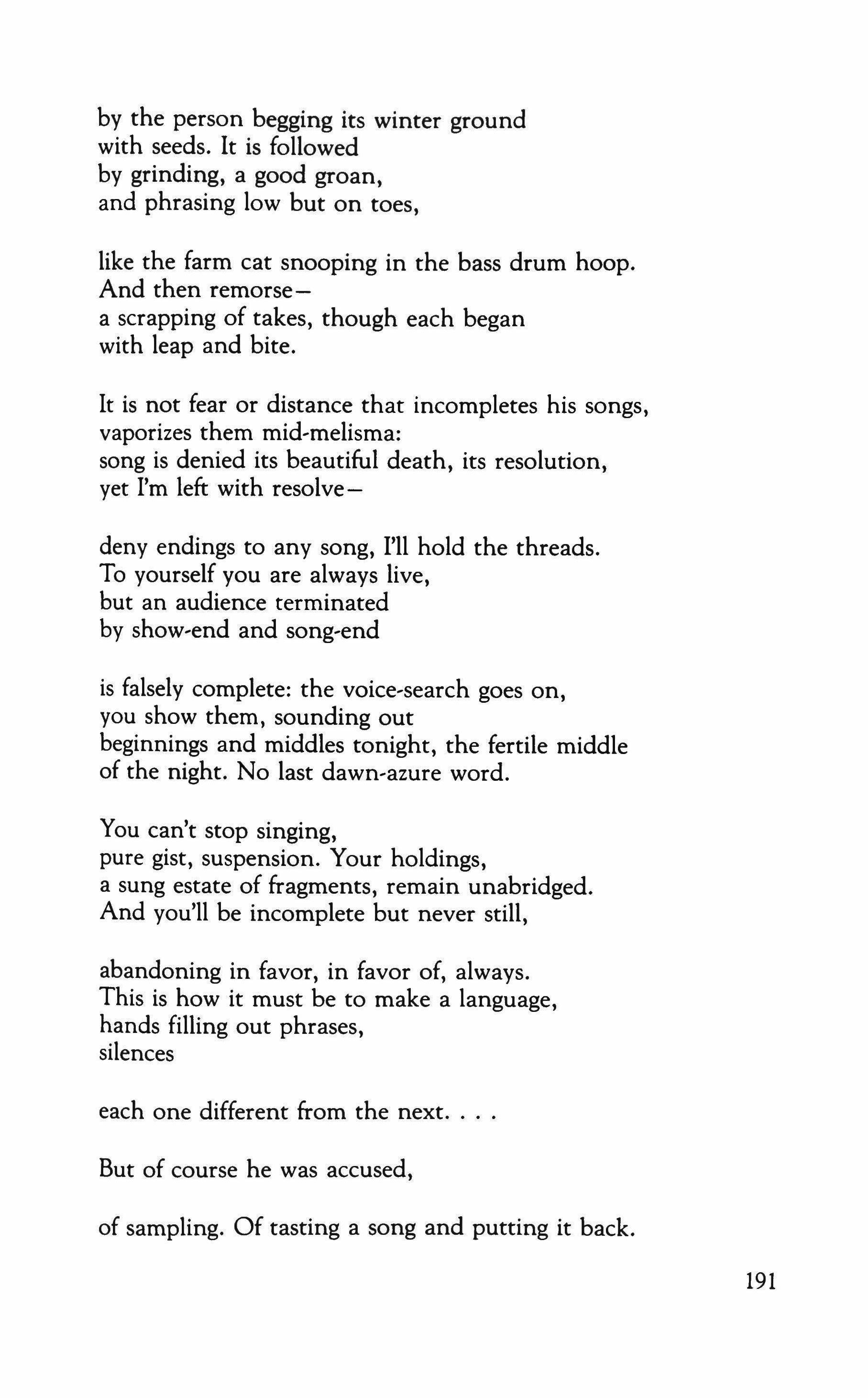
by the person begging its winter ground with seeds. It is followed by grinding, a good groan, and phrasing low but on toes,
like the farm cat snooping in the bass drum hoop. And then remorsea scrapping of takes, though each began with leap and bite.
It is not fear or distance that incompletes his songs, vaporizes them rnid-rnelisma: song is denied its beautiful death, its resolution, yet I'm left with resolve-
deny endings to any song, I'll hold the threads. To yourself you are always live, but an audience terminated by show-end and song-end
is falsely complete: the voice-search goes on, you show them, sounding out beginnings and middles tonight, the fertile middle of the night. No last dawn-azure word.
You can't stop singing, pure gist, suspension. Your holdings, a sung estate of fragments, remain unabridged. And you'll be incomplete but never still,
abandoning in favor, in favor of, always. This is how it must be to make a language, hands filling out phrases, silences
each one different from the next
But of course he was accused, of sampling. Of tasting a song and putting it back.
191
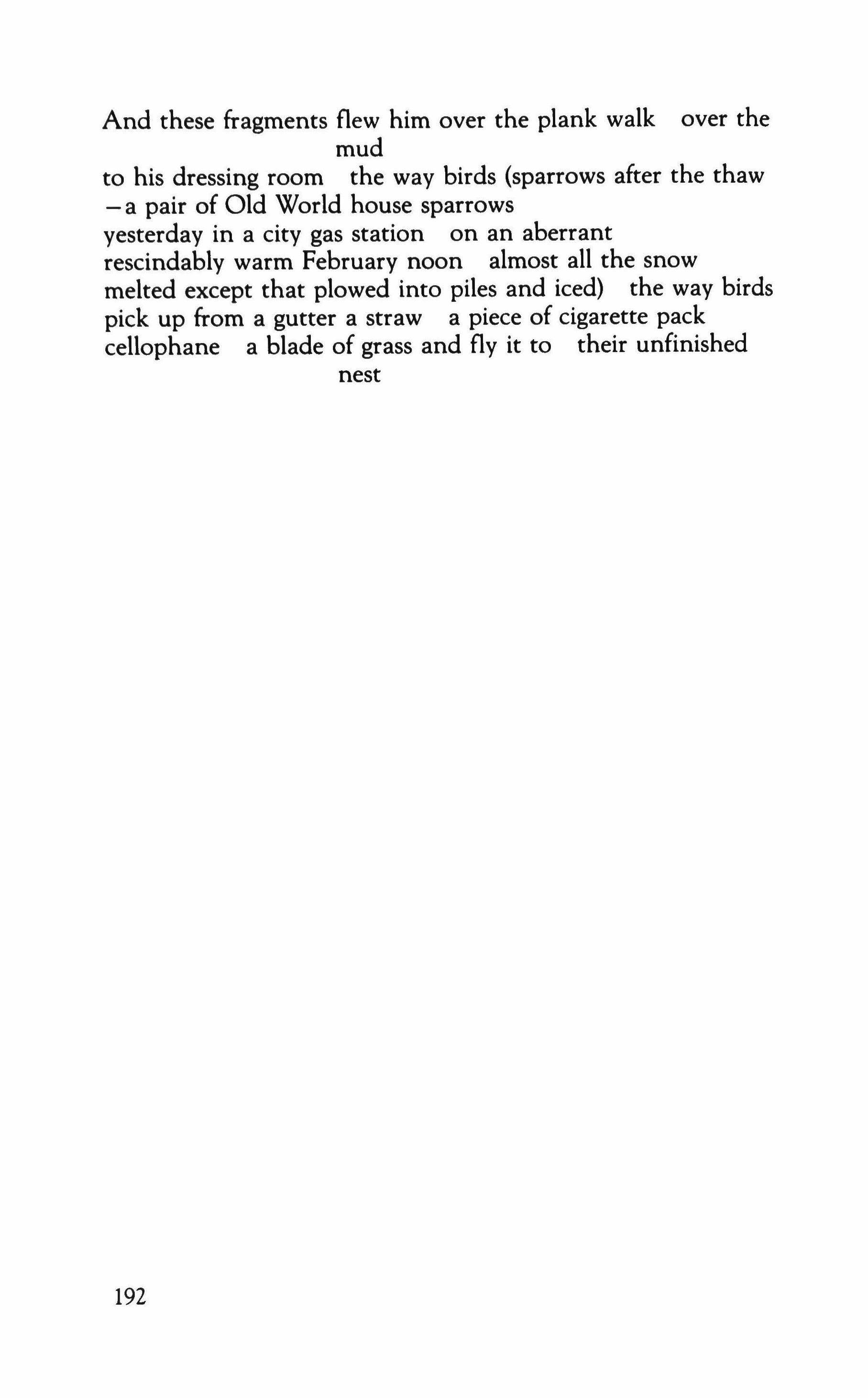
And these fragments flew him over the plank walk over the mud to his dressing room the way birds (sparrows after the thaw - a pair of Old World house sparrows yesterday in a city gas station on an aberrant rescindably warm February noon almost all the snow melted except that plowed into piles and iced) the way birds pick up from a gutter a straw a piece of cigarette pack cellophane a blade of grass and fly it to their unfinished nest
192
The Poet and History*
c. K. Williams
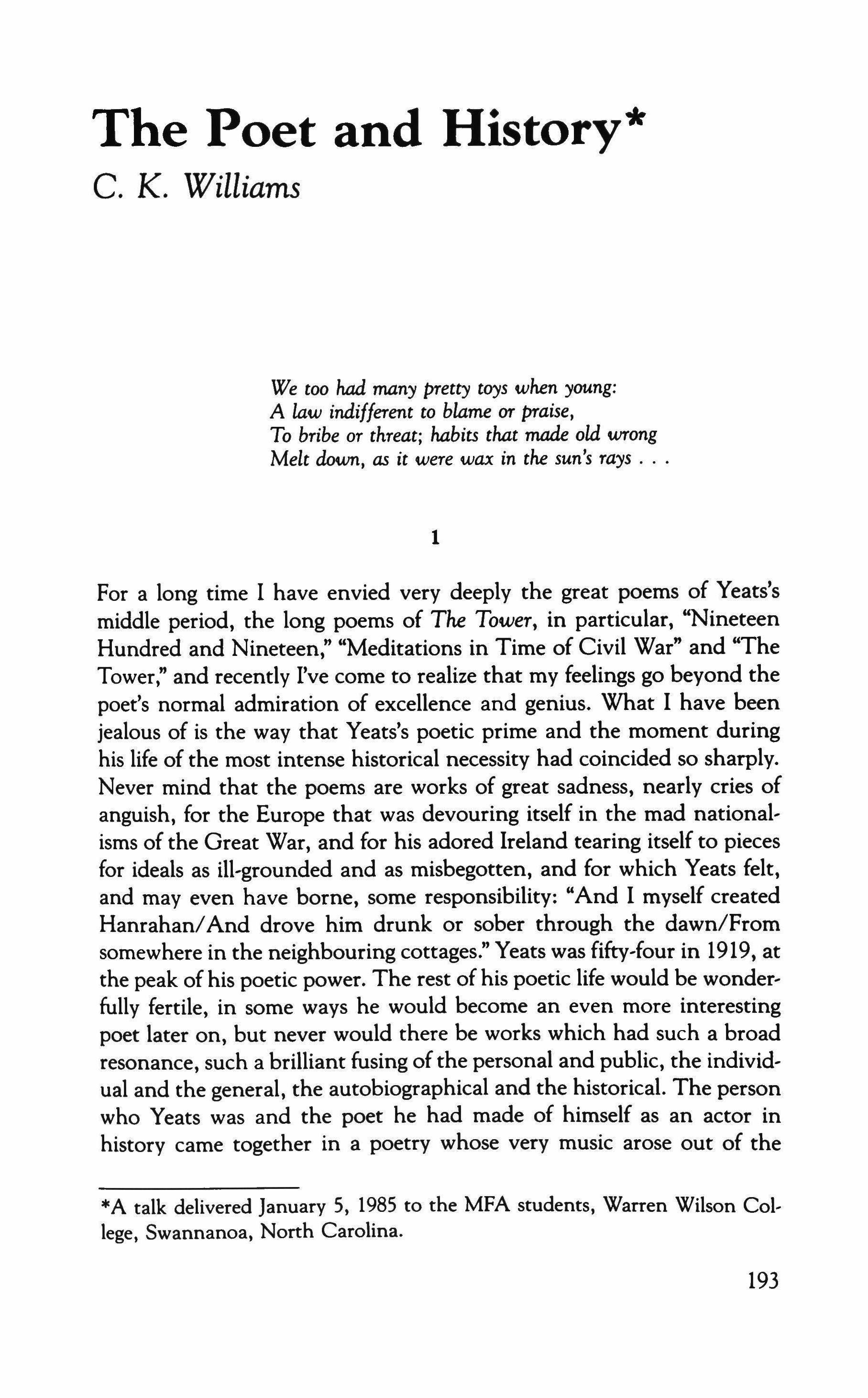
We too had many pretty toys when young: A law indifferent to blame or praise, To bribe or threat; habits that made old wrong Melt down, as it were wax in the sun's rays
1
For a long time I have envied very deeply the great poems of Yeats's middle period, the long poems of The Tower, in particular, "Nineteen Hundred and Nineteen," "Meditations in Time of Civil War" and "The Tower," and recently I've come to realize that my feelings go beyond the poet's normal admiration of excellence and genius. What I have been jealous of is the way that Yeats's poetic prime and the moment during his life of the most intense historical necessity had coincided so sharply. Never mind that the poems are works of great sadness, nearly cries of anguish, for the Europe that was devouring itself in the mad nationalisms of the Great War, and for his adored Ireland tearing itself to pieces for ideals as ill-grounded and as misbegotten, and for which Yeats felt, and may even have borne, some responsibility: "And I myself created Hanrahan/And drove him drunk or sober through the dawn/From somewhere in the neighbouring cottages." Yeats was fifty-four in 1919, at the peak of his poetic power. The rest of his poetic life would be wonderfully fertile, in some ways he would become an even more interesting poet later on, but never would there be works which had such a broad resonance, such a brilliant fusing ofthe personal and public, the individual and the general, the autobiographical and the historical. The person who Yeats was and the poet he had made of himself as an actor in history came together in a poetry whose very music arose out of the
*A talk delivered January 5, 1985 to the MFA students, Warren Wilson College, Swannanoa, North Carolina.
193
conflicts of his awareness of that history, and whose very beauty was soaked in horror, like the mother in "Nineteen Hundred and Nineteen," who must "crawl in her own blood."
It is quite feasible and not at all aesthetically immoral to define poetry in such a way that one does not have to feel either a particular responsibility towards history, nor any squeamishness about apparently omitting such concerns from one's work. The traditions of poetry are rooted as much in pure song, "life's own self-delight," to quote Yeats again, as they are in any sort of "meaning," whether historical, political, philosophical or otherwise. A poem is grounded in its time, whether it articulates its consciousness of this or not, and it does not have to manifest a direct awareness of its historical situation in order to be significant and to fulfill a rich definition of poetry.
At the same time, once one does decide to try for whatever personal reasons to commit one's poetry as intentionally as possible to questions of direct historical and social significance, issues are raised which are not easily evaded, the central one of which seems to me to be this: how am I to reconcile my sense of limitation, even of inadequacy, in terms of my own actual position in history, with the apparently heroic self which these sorts of meditation seem to call for? If, as Wittgenstein could say, "The world is the case," how is one, as it were, really to take one's self as the lyric case?

The most extreme, and the most heroic, example we have in literature of the poet indeed taking himself as the case is Dante. As we know, Dante's entire comedy was as profoundly immersed in his vision of history as it was in his vision of the divine, and much of his greatness is in his fusion of realms, his bringing human history and divine history into congruence: the moral and the pragmatic, the metaphysical and the autobiographical.
Dante's technique for enacting these unifications was to designate himself as humanity's visionary, as the sole living human being who would be allowed, through the power of the inspiration of his mortal love for Beatrice, to explore the realms of the dead and of the eternal afterlife. Dante was to be the spiritual hero of the entire human adventure: it was he, and we only through him, who would actually experience how humans in history find their ultimate rewards and punishment in divine judgment. Dante is historically very specific: there are
2
194
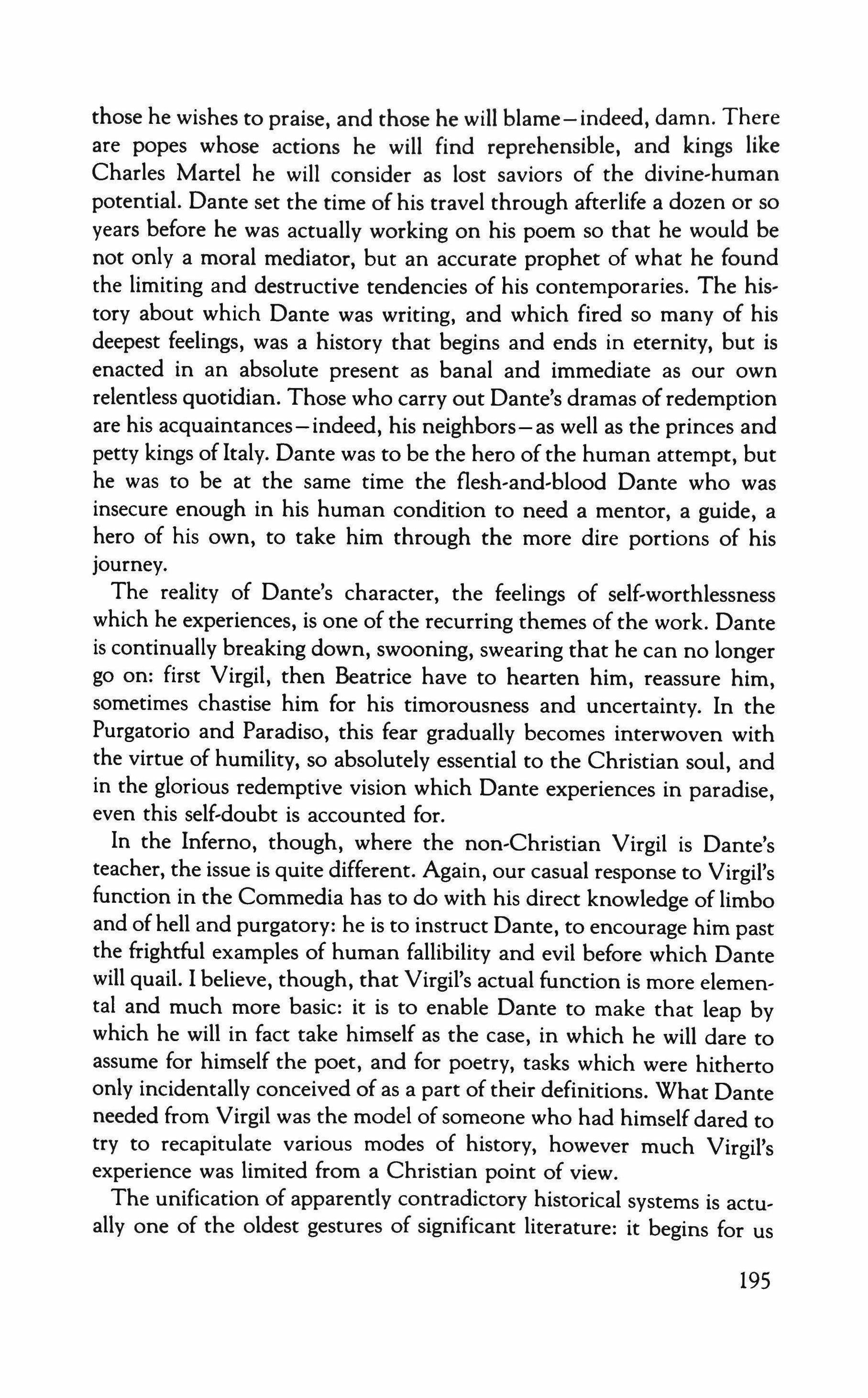
those he wishes to praise, and those he will blame-indeed, damn. There are popes whose actions he will find reprehensible, and kings like Charles Martel he will consider as lost saviors of the divine-human potential. Dante set the time of his travel through afterlife a dozen or so years before he was actually working on his poem so that he would be not only a moral mediator, but an accurate prophet of what he found the limiting and destructive tendencies of his contemporaries. The history about which Dante was writing, and which fired so many of his deepest feelings, was a history that begins and ends in eternity, but is enacted in an absolute present as banal and immediate as our own relentless quotidian. Those who carry out Dante's dramas ofredemption are his acquaintances - indeed, his neighbors - as well as the princes and petty kings of Italy. Dante was to be the hero of the human attempt, but he was to be at the same time the flesh-and-blood Dante who was insecure enough in his human condition to need a mentor, a guide, a hero of his own, to take him through the more dire portions of his journey.
The reality of Dante's character, the feelings of self-worthlessness which he experiences, is one of the recurring themes of the work. Dante is continually breaking down, swooning, swearing that he can no longer go on: first Virgil, then Beatrice have to hearten him, reassure him, sometimes chastise him for his timorousness and uncertainty. In the Purgatorio and Paradiso, this fear gradually becomes interwoven with the virtue of humility, so absolutely essential to the Christian soul, and in the glorious redemptive vision which Dante experiences in paradise, even this self-doubt is accounted for.
In the Inferno, though, where the non-Christian Virgil is Dante's teacher, the issue is quite different. Again, our casual response to Virgil's function in the Commedia has to do with his direct knowledge of limbo and of hell and purgatory: he is to instruct Dante, to encourage him past the frightful examples of human fallibility and evil before which Dante will quail. I believe, though, that Virgil's actual function is more elemental and much more basic: it is to enable Dante to make that leap by which he will in fact take himself as the case, in which he will dare to assume for himself the poet, and for poetry, tasks which were hitherto only incidentally conceived of as a part of their definitions. What Dante needed from Virgil was the model of someone who had himself dared to try to recapitulate various modes of history, however much Virgil's experience was limited from a Christian point of view.
The unification of apparently contradictory historical systems is actually one of the oldest gestures of significant literature: it begins for us
195

with Homer's warriors who inhabit a half-mythic world of gods and absolute passions, and Aeschylus's Orestes who flees from mythic history to the symbolic reality of Athens. When we participate in literature as readers, we are so accustomed to this movement that we hardly remark it, so deftly does Milton, as another example, poeticize his metaphysic and embody his historical-ethical imperatives in the divine history he is reincarnating. But when we, as poets, consider that movement, that attempt, that task, it is a forbidding undertaking. There are presumptions, about the self, about the social, about the metaphysical, so gigantic that one does not, literally, know how to begin. The sheer will, the intensity of the overcoming of one's vision of self that is called for, is so daunting.
Naturally we don't believe that we can will ourselves to be Dantes or Miltons, and neither do we-or most of us, anyway-have such a clear vision of the varieties ofdivine and human history: even if we are deeply religious, there has been in the conceptual mind of the West an apparently quite irrevocable split between the workings-out of the secular and the holy.
At the same time, though, history, past and future, remains for us the necessary matrix in which our most profound ideas and ideals will be enacted. Our metaphysic and our ethic evolve in a dialectic with whatever spiritual structure we happen to be born into or to construct for ourselves; but without the connection to a concrete historical reality with its necessities and its responsibilities and demands, we cannot even refer to an ethic as such: it will be simply a sort of Boy Scout handbook to good deeds.
It is here that our presumption isn't so audacious in defining ourselves by a spiritual gesture similar to the heroic Dante's, for we, too, when we dare to try to conceive of ourselves as active agents, active participants in the larger social and political histories around us, experience an acute and painful sense of insignificance and uncertainty. The actual history Dante participated in, the ebb and flow ofthose human events which he could quite clearly visualize as beginning at least as far back as the early Roman Empire and culminating in the Guelph-Ghibelline dispute, was quite accessible to him-perhaps in his exile he may even have thought it too much so. But where is our history now, how do we dare to think that we are actually participating in it in an ethically direct way, rather than being mere observers of it, passive recipients?
There is serious debate about whether the individual's actual experience of self in history has really been heightened since the Age of Revolutions, since our rights as democratic agents have been elaborated
196
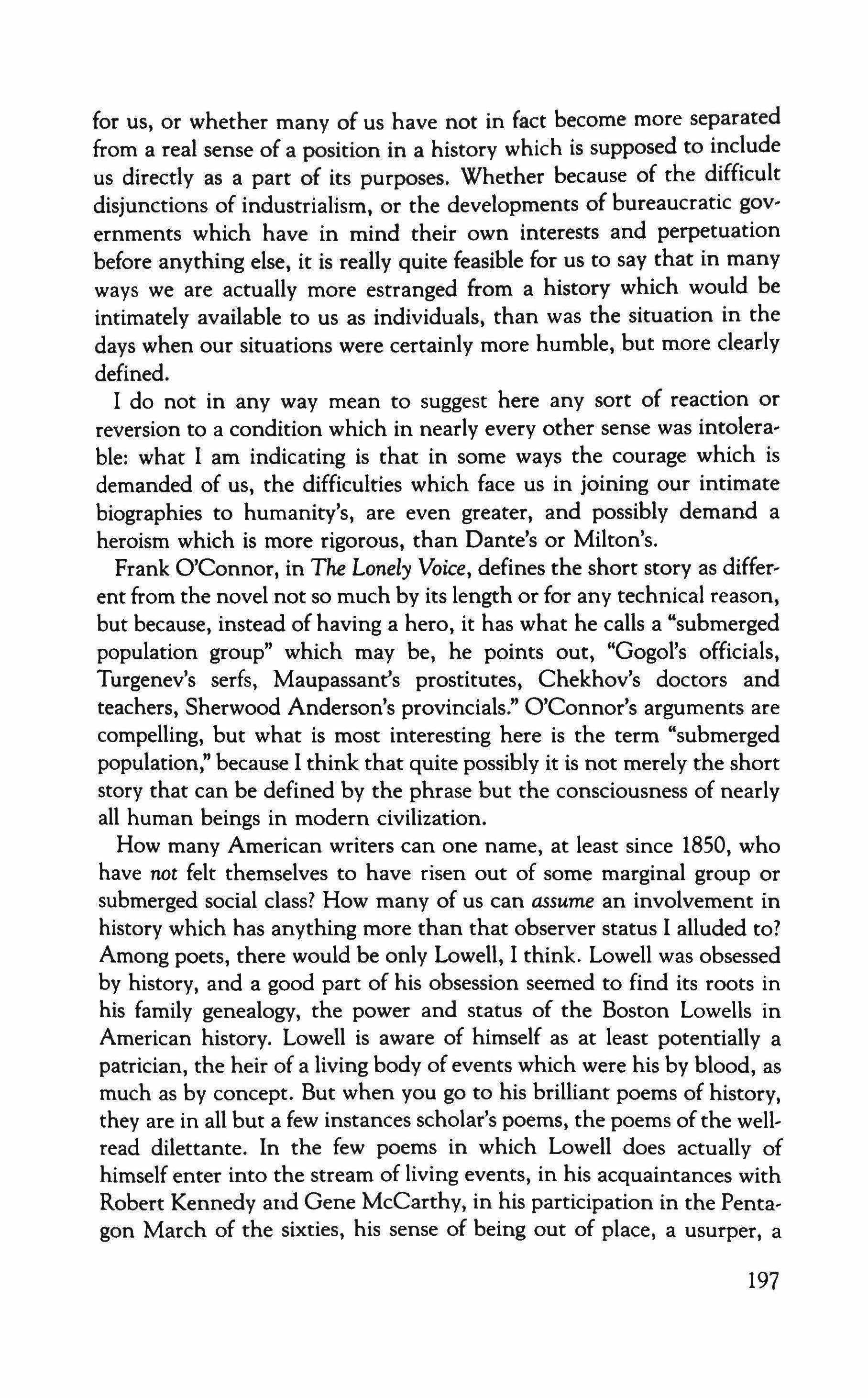
for us, or whether many of us have not in fact become more separated from a real sense of a position in a history which is supposed to include us directly as a part of its purposes. Whether because of the difficult disjunctions of industrialism, or the developments of bureaucratic governments which have in mind their own interests and perpetuation before anything else, it is really quite feasible for us to say that in many ways we are actually more estranged from a history which would be intimately available to us as individuals, than was the situation in the days when our situations were certainly more humble, but more clearly defined.
I do not in any way mean to suggest here any sort of reaction or reversion to a condition which in nearly every other sense was intolerable: what I am indicating is that in some ways the courage which is demanded of us, the difficulties which face us in joining our intimate biographies to humanity's, are even greater, and possibly demand a heroism which is more rigorous, than Dante's or Milton's.
Frank O'Connor, in The Lonely Voice, defines the short story as differ, ent from the novel not so much by its length or for any technical reason, but because, instead of having a hero, it has what he calls a "submerged population group" which may be, he points out, "Gogel's officials, Turgenev's serfs, Maupassant's prostitutes, Chekhov's doctors and teachers, Sherwood Anderson's provincials." O'Connor's arguments are compelling, but what is most interesting here is the term "submerged population," because I think that quite possibly it is not merely the short story that can be defined by the phrase but the consciousness of nearly all human beings in modern civilization.
How many American writers can one name, at least since 1850, who have not felt themselves to have risen out of some marginal group or submerged social class? How many of us can assume an involvement in history which has anything more than that observer status I alluded to? Among poets, there would be only Lowell, I think. Lowell was obsessed by history, and a good part of his obsession seemed to find its roots in his family genealogy, the power and status of the Boston Lowells in American history. Lowell is aware of himself as at least potentially a patrician, the heir of a living body of events which were his by blood, as much as by concept. But when you go to his brilliant poems of history, they are in all but a few instances scholar's poems, the poems of the well, read dilettante. In the few poems in which Lowell does actually of himself enter into the stream of living events, in his acquaintances with Robert Kennedy and Gene McCarthy, in his participation in the Penta, gon March of the sixties, his sense of being out of place, a usurper, a
197
pretender, is as acute as that of Norman Mailer's, although Mailer could idealize Lowell as the living embodiment of various unattainable partrimonies and sureties which Mailer felt were forbidden to him.
The sense of being outside of things is not an American phenomenon of course: from Baudelaire to Vallejo, the poet's image of being at the margins of society, sending poems towards a center, has been almost the primary description of the poet's situation, or plight.
So there seems to be a double overcoming which is demanded of the modern poet who would take upon him- or herself the business of history, of being in history, or responsibility towards it and of conscious enactment in it. Not only is one presuming mightily to take oneself as the case, but even the larger group to which one belongs seems invariably to have a tangential relation to the direct realm of politics and social choice, to that world which one hopes is to be affected by the labors of the poet and the poem.
To observe, to comment, to pass notes back and forth to one another is not to participate in history as Dante or Yeats did. How are we to find our way, then, to a place near enough to the center so that our efforts to affect that center are not so feeble and futile that there is no point in even beginning, even putting pen to paper?

A year or so ago, in an undergraduate creative writing class, we were discussing nuclear war. It was the week of the showing of what turned out to be that lame film The Day After, and we had quite a lively discussion going. At one point, one of my more articulate students said something which at the time I more or less dismissed but which I've thought of often since. What he said in essence was: "Why worry so much about all of this? If there's going to be a nuclear war, there'll be one, it won't be for us to decide. Why pretend that we have anything to do with the choice? Why should we shorten our lives with worry?" (One of my other students chipped in that he'd heard the whole nuclear-freeze debate was a result of manipulation by the Russians, who were trying to shorten American life-expectancy by inducing stress in us.)
As I say, at first I didn't think much of what my good student had offered: I suppose I gave him some homilies about participatory democracy and the like, but after I'd thought about it for a while, I came to realize that what he'd been making wasn't a polemic, but a plea. Not to me, not to anyone in particular, but to things as they are, to reality
3
198
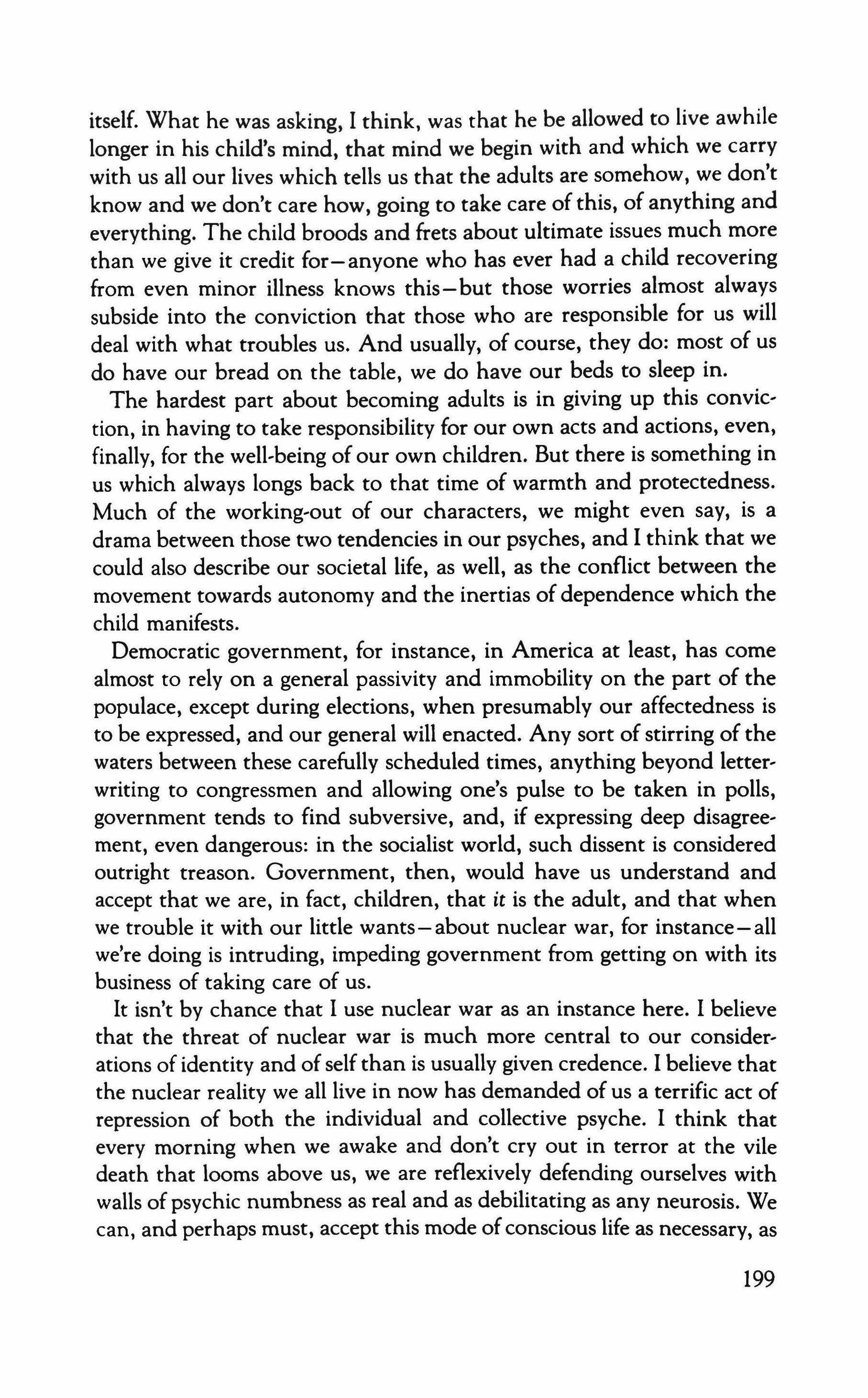
itself. What he was asking, I think, was that he be allowed to live awhile longer in his child's mind, that mind we begin with and which we carry with us all our lives which tells us that the adults are somehow, we don't know and we don't care how, going to take care ofthis, of anything and everything. The child broods and frets about ultimate issues much more than we give it credit for-anyone who has ever had a child recovering from even minor illness knows this-but those worries almost always subside into the conviction that those who are responsible for us will deal with what troubles us. And usually, of course, they do: most of us do have our bread on the table, we do have our beds to sleep in.
The hardest part about becoming adults is in giving up this conviction, in having to take responsibility for our own acts and actions, even, finally, for the well-being of our own children. But there is something in us which always longs back to that time of warmth and protectedness. Much of the working-out of our characters, we might even say, is a drama between those two tendencies in our psyches, and I think that we could also describe our societal life, as well, as the conflict between the movement towards autonomy and the inertias of dependence which the child manifests.
Democratic government, for instance, in America at least, has come almost to rely on a general passivity and immobility on the part of the populace, except during elections, when presumably our affectedness is to be expressed, and our general will enacted. Any sort of stirring of the waters between these carefully scheduled times, anything beyond letterwriting to congressmen and allowing one's pulse to be taken in polls, government tends to find subversive, and, if expressing deep disagreement, even dangerous: in the socialist world, such dissent is considered outright treason. Government, then, would have us understand and accept that we are, in fact, children, that it is the adult, and that when we trouble it with our little wants-about nuclear war, for instance-all we're doing is intruding, impeding government from getting on with its business of taking care of us.
It isn't by chance that I use nuclear war as an instance here. I believe that the threat of nuclear war is much more central to our considerations of identity and of self than is usually given credence. I believe that the nuclear reality we all live in now has demanded of us a terrific act of repression of both the individual and collective psyche. I think that every morning when we awake and don't cry out in terror at the vile death that looms above us, we are reflexively defending ourselves with walls of psychic numbness as real and as debilitating as any neurosis. We can, and perhaps must, accept this mode ofconscious life as necessary, as
199
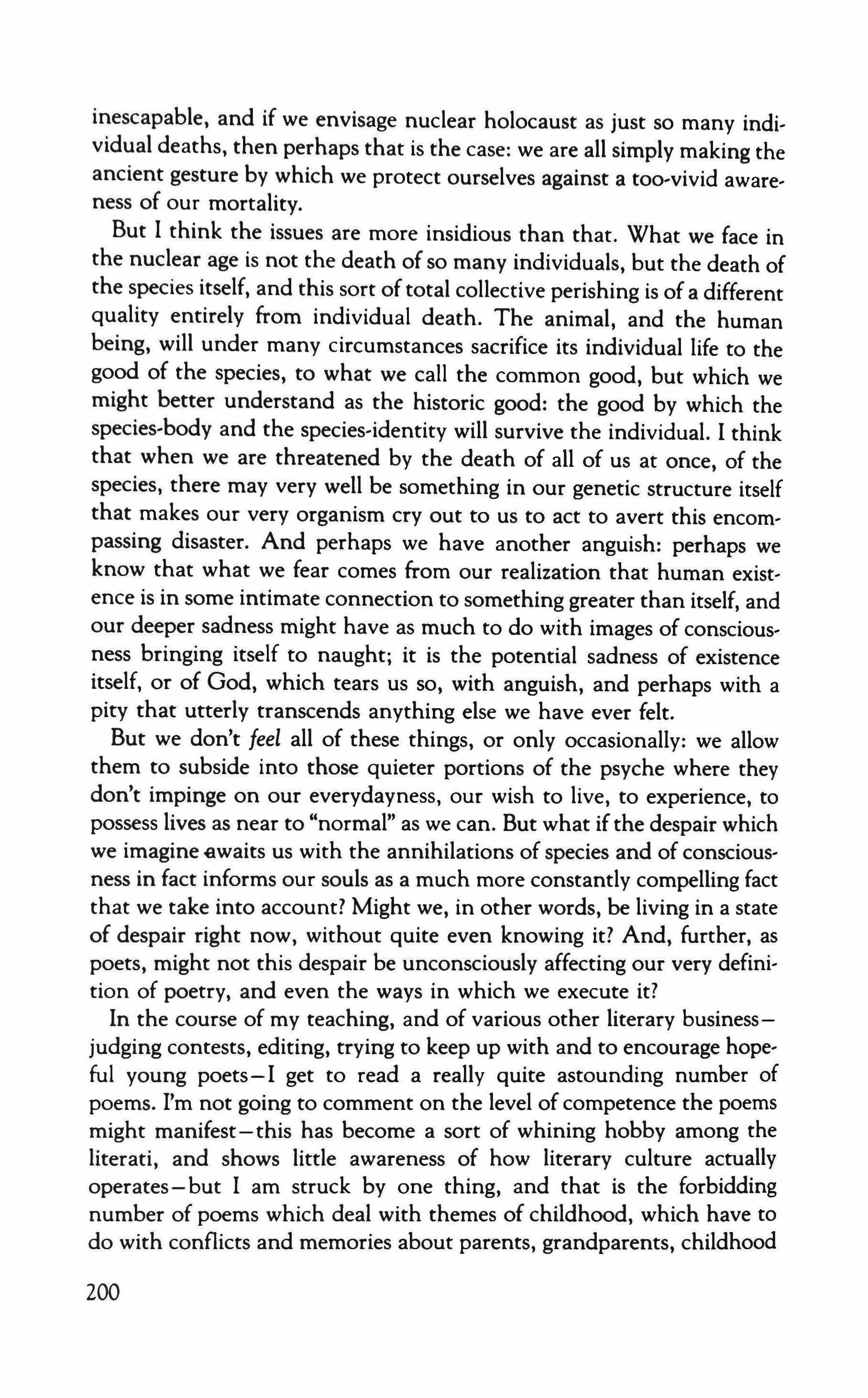
inescapable, and if we envisage nuclear holocaust as just so many individual deaths, then perhaps that is the case: we are all simply making the ancient gesture by which we protect ourselves against a too-vivid awareness of our mortality.
But I think the issues are more insidious than that. What we face in the nuclear age is not the death of so many individuals, but the death of the species itself, and this sort oftotal collective perishing is of a different quality entirely from individual death. The animal, and the human being, will under many circumstances sacrifice its individual life to the good of the species, to what we call the common good, but which we might better understand as the historic good: the good by which the species-body and the species-idennrv will survive the individual. I think that when we are threatened by the death of all of us at once, of the species, there may very well be something in our genetic structure itself that makes our very organism cry out to us to act to avert this encompassing disaster. And perhaps we have another anguish: perhaps we know that what we fear comes from our realization that human existence is in some intimate connection to something greater than itself, and our deeper sadness might have as much to do with images of consciousness bringing itself to naught; it is the potential sadness of existence itself, or of God, which tears us so, with anguish, and perhaps with a pity that utterly transcends anything else we have ever felt.
But we don't feel all of these things, or only occasionally: we allow them to subside into those quieter portions of the psyche where they don't impinge on our everydayness, our wish to live, to experience, to possess lives as near to "normal" as we can. But what ifthe despair which we imagine awaits us with the annihilations of species and of consciousness in fact informs our souls as a much more constantly compelling fact that we take into account? Might we, in other words, be living in a state of despair right now, without quite even knowing it? And, further, as poets, might not this despair be unconsciously affecting our very definition of poetry, and even the ways in which we execute it?
In the course of my teaching, and of various other literary businessjudging contests, editing, trying to keep up with and to encourage hopeful young poets-I get to read a really quite astounding number of poems. I'm not going to comment on the level of competence the poems might manifest - this has become a sort of whining hobby among the literati, and shows little awareness of how literary culture actually operates - but I am struck by one thing, and that is the forbidding number of poems which deal with themes of childhood, which have to do with conflicts and memories about parents, grandparents, childhood 200
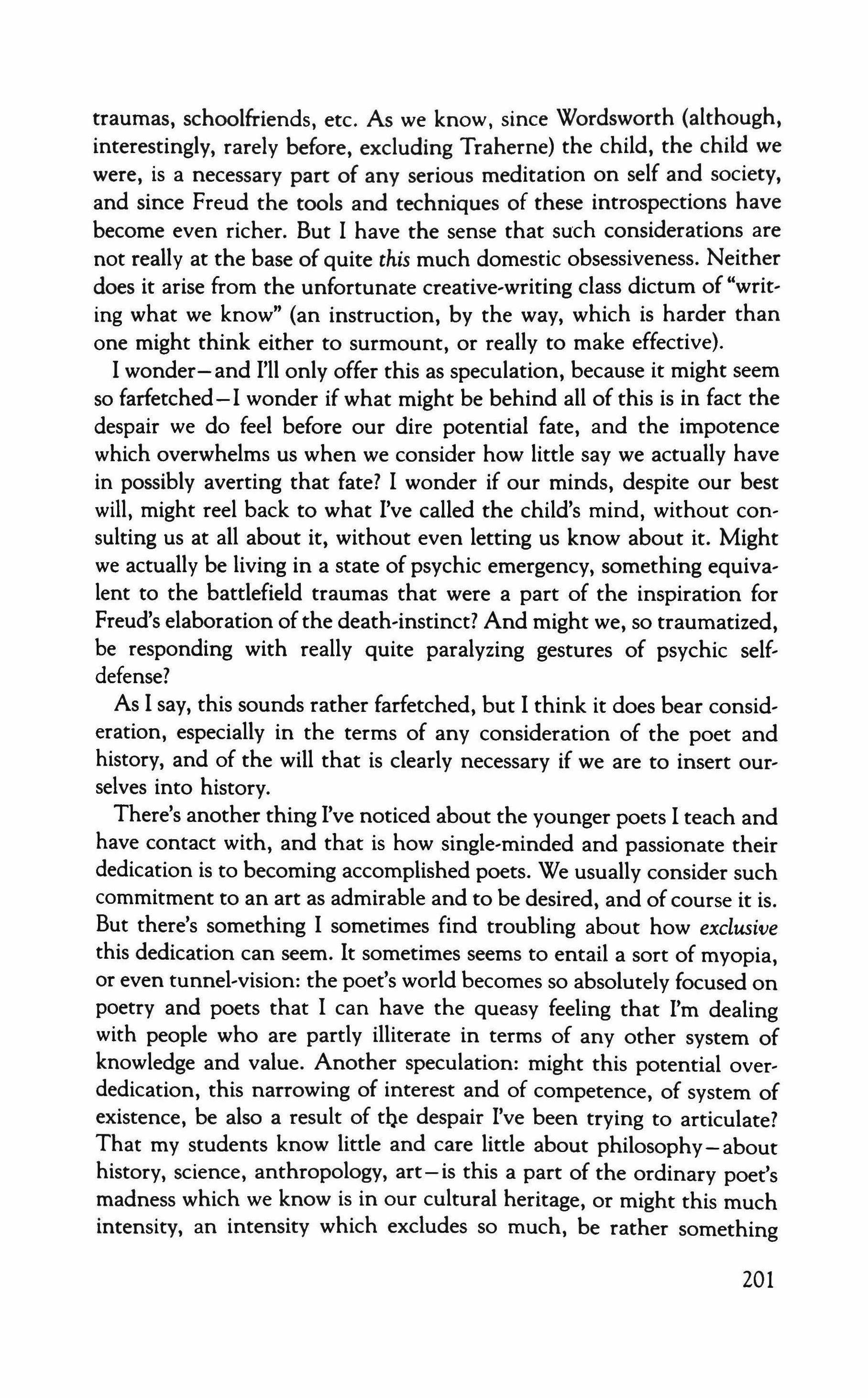
traumas, schoolfriends, etc. As we know, since Wordsworth (although, interestingly, rarely before, excluding Traherne) the child, the child we were, is a necessary part of any serious meditation on self and society, and since Freud the tools and techniques of these introspections have become even richer. But I have the sense that such considerations are not really at the base of quite this much domestic obsessiveness. Neither does it arise from the unfortunate creative-writing class dictum of "writ, ing what we know" {an instruction, by the way, which is harder than one might think either to surmount, or really to make effective}.
I wonder- and I'll only offer this as speculation, because it might seem so farfetched - I wonder if what might be behind all of this is in fact the despair we do feel before our dire potential fate, and the impotence which overwhelms us when we consider how little say we actually have in possibly averting that fate? I wonder if our minds, despite our best will, might reel back to what I've called the child's mind, without con, sulting us at all about it, without even letting us know about it. Might we actually be living in a state of psychic emergency, something equivalent to the battlefield traumas that were a part of the inspiration for Freud's elaboration of the death-instinct? And might we, so traumatized, be responding with really quite paralyzing gestures of psychic self, defense?
As I say, this sounds rather farfetched, but I think it does bear consideration, especially in the terms of any consideration of the poet and history, and of the will that is clearly necessary if we are to insert our, selves into history.
There's another thing I've noticed about the younger poets I teach and have contact with, and that is how single-minded and passionate their dedication is to becoming accomplished poets. We usually consider such commitment to an art as admirable and to be desired, and of course it is. But there's something I sometimes find troubling about how exclusive this dedication can seem. It sometimes seems to entail a sort of myopia, or even tunnel-vision: the poet's world becomes so absolutely focused on poetry and poets that I can have the queasy feeling that I'm dealing with people who are partly illiterate in terms of any other system of knowledge and value. Another speculation: might this potential over, dedication, this narrowing of interest and of competence, of system of existence, be also a result of the despair I've been trying to articulate? That my students know little and care little about philosophy - about history, science, anthropology, art-is this a part of the ordinary poet's madness which we know is in our cultural heritage, or might this much intensity, an intensity which excludes so much, be rather something
201

new? Might there not be a different sort of sacrifice implied than our traditional marriage to our art? Might there be a portion of our humanity which is at risk?
I speak of the younger poets, but I have to say that these are tendencies and directions I've felt in myself as well, which is perhaps why I dare to offer such possible affront to so many I admire. I feel in myself a constant leaning towards a sort of limiting ambition, a tendency to become a poetic grind; I feel myself overwhelmed with a moral indolence about what certain tasks of my identity as human being, rather than as poet, entail.
What are those tasks? What does it mean to have an identity as a human being beyond that of the poet? We all, of course, define ourselves in many systems, and any of us would indeed be affronted to have only a single definition. Another observation, and another speculation: I have noticed also, and not only among my students now, that there is very little philosophizing these days about the nature of the human. Very rarely in our poems does one find the sorts of reflection on the basic attributes of the human soul, as, to use our examples again, are in Dante, Milton or Yeats. Possibly there is nothing to fret about here because such reflection, such philosophical work, is assumed by any literary artifact. But might the question be deeper, might it be that something keeps us from reflecting on the nature of the human as the starting point of our mature considerations?
I am going to postulate another genre of despair now, possibly more available to our consciousness than the nuclear anguish we must live with, but possibly just as much an obstacle to be overcome if we are to conceive of ourselves as participants and real agents of our history.
The process ofdefining our humanity is always a dialectic between our vision of what we see before us-the evidence-and of what we can conceive ideally for the human. What we call philosophical thinking is actually much more firmly grounded in the life we live, even the life philosophers live, than philosophy itself admits. Our image of philosophical thought is of an activity purified of the mucks and manias of human interchange and human emotion, but the dialectic by which one arrives at the most abstruse notions of consciousness and of ethical purpose should and must be embedded in the realities of history as fact and history as possibility. It is between these facts and possibilities that the dialectic of our first definitions depends, and the task we must set ourselves in trying to make ourselves conscious of our philosophical and historical situation has very much to do with trying to clarify both the
202
terms of that dialectic, and what the facts of our history actually have been.
The facts of our recent history are nearly as depressing as our nuclear future. Wars, oppressions, colonialisms, concentration camps: the human animal hangs its head in shame, but our spirits have survived all of these, we have retained our hope, or so we like to think. But have we indeed kept a hope that is as real and as vibrant as that which poets have traditionally assumed? If defining the human reality also entails dreaming the human possibility, where are we in our history now? Andre Brink succinctly sums up the results of some centuries of human attempt by saying, "We are living amid the ruins of not one, but two, utopian visions of the world." The two empires Brink refers to are of course the Capitalist-Christian and the Socialist-Communist. Whatever one's political attitudes and ideals, it does not take a great deal ofeffort if not to agree with Brink, then to entertain his point of view. Clearly capitalism as we know it is terribly flawed. The wealth and well-being it has undeniably brought to so many has also been forbidden to just as many, or more. Whether all the rich ofthe world are riding on the backs of the poor is a matter to be debated, but that those poor, whether in the Third World or in the slums of the industrial democracies, are not along on the rosy railroad of capitalist progress is certain. The failings of Soviet and Eastern communism are different, but as dismal. Societies in which the expression of the individual-whether artist, writer or union member-is deemed to be a threat to the fabric of the society, can in no sense claim the mantle of idealism which Marx postulated for them. In some ways, then, the result of all our philosophizing, all the grand and good intent of all our houses, has been so disastrous that the attempt to define ourselves with any level of conviction seems to be nullified in advance, because we know by experience how such philosophical certainties will corne to be enacted: in fanaticism, distortion and hideous violence.
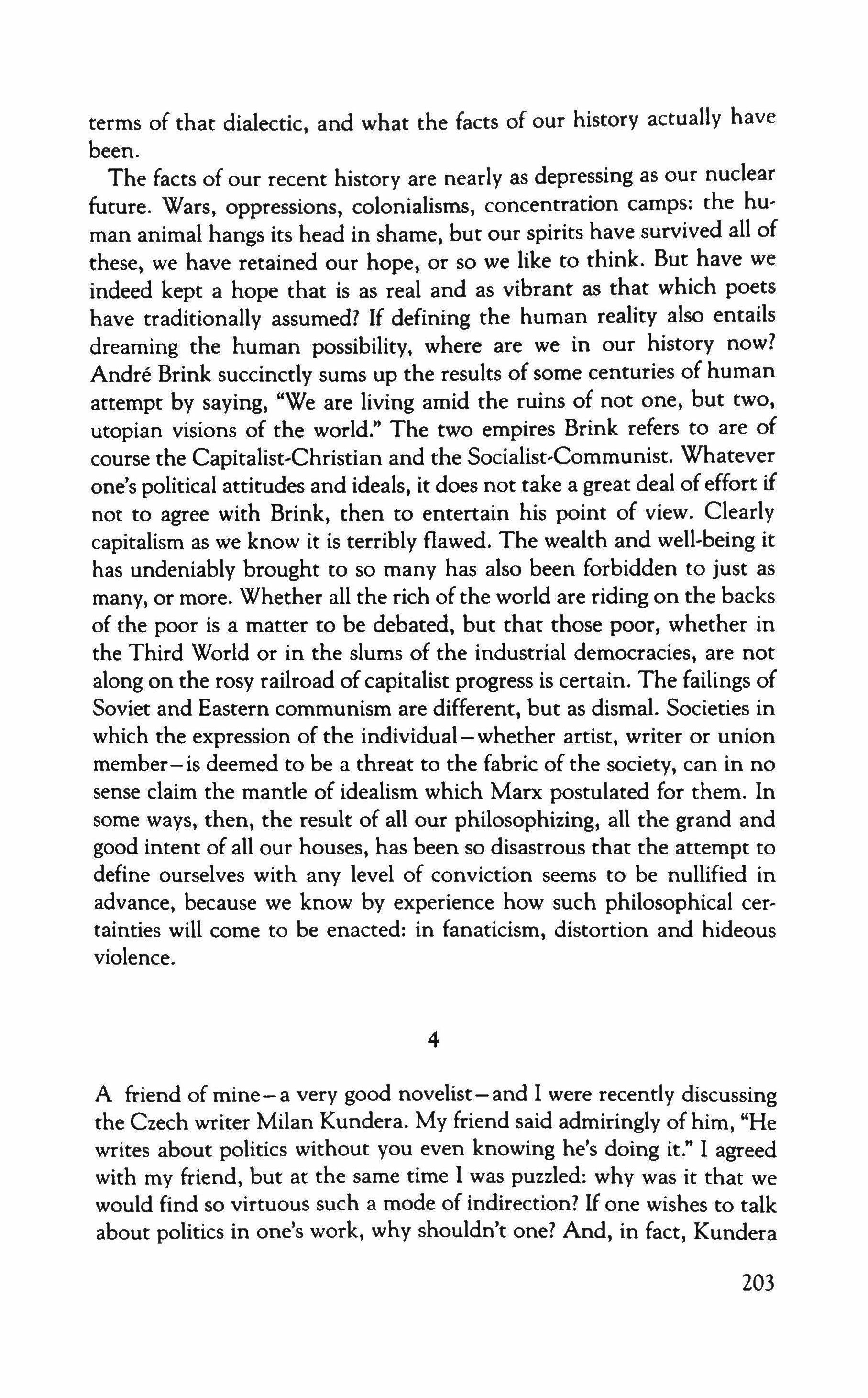
A friend of mine-a very good novelist-and I were recently discussing the Czech writer Milan Kundera. My friend said admiringly of him, "He writes about politics without you even knowing he's doing it." I agreed with my friend, but at the same time I was puzzled: why was it that we would find so virtuous such a mode of indirection? If one wishes to talk about politics in one's work, why shouldn't one? And, in fact, Kundera
4
203
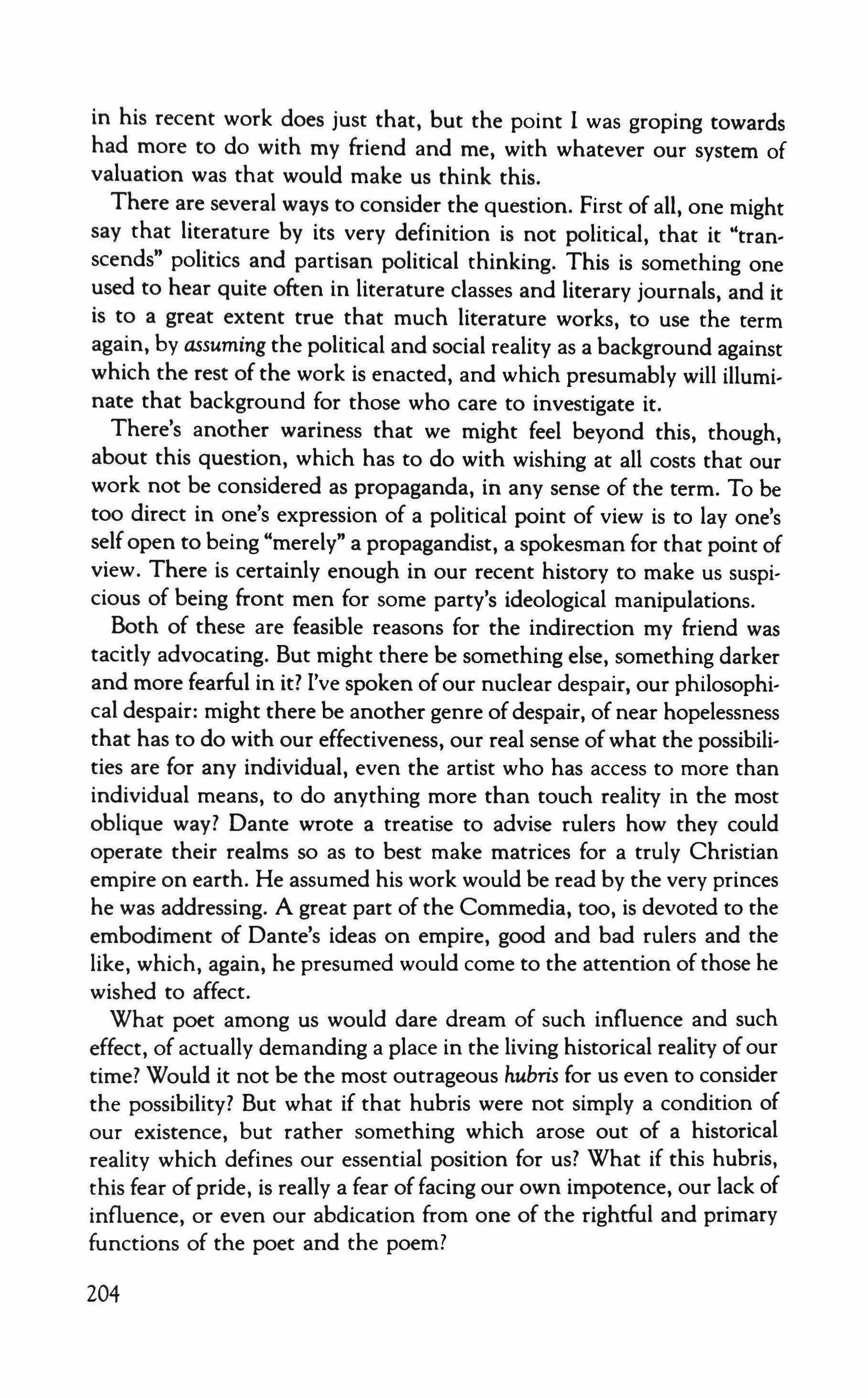
in his recent work does just that, but the point I was groping towards had more to do with my friend and me, with whatever our system of valuation was that would make us think this.
There are several ways to consider the question. First of all, one might say that literature by its very definition is not political, that it "transcends" politics and partisan political thinking. This is something one used to hear quite often in literature classes and literary journals, and it is to a great extent true that much literature works, to use the term again, by assuming the political and social reality as a background against which the rest of the work is enacted, and which presumably will illuminate that background for those who care to investigate it.
There's another wariness that we might feel beyond this, though, about this question, which has to do with wishing at all costs that our work not be considered as propaganda, in any sense of the term. To be too direct in one's expression of a political point of view is to lay one's self open to being "merely" a propagandist, a spokesman for that point of view. There is certainly enough in our recent history to make us suspicious of being front men for some party's ideological manipulations. Both of these are feasible reasons for the indirection my friend was tacitly advocating. But might there be something else, something darker and more fearful in it? I've spoken of our nuclear despair, our philosophical despair: might there be another genre ofdespair, of near hopelessness that has to do with our effectiveness, our real sense ofwhat the possibilities are for any individual, even the artist who has access to more than individual means, to do anything more than touch reality in the most oblique way? Dante wrote a treatise to advise rulers how they could operate their realms so as to best make matrices for a truly Christian empire on earth. He assumed his work would be read by the very princes he was addressing. A great part of the Commedia, too, is devoted to the embodiment of Dante's ideas on empire, good and bad rulers and the like, which, again, he presumed would come to the attention of those he wished to affect.
What poet among us would dare dream of such influence and such effect, of actually demanding a place in the living historical reality of our time? Would it not be the most outrageous hubris for us even to consider the possibility? But what if that hubris were not simply a condition of our existence, but rather something which arose out of a historical reality which defines our essential position for us? What if this hubris, this fear ofpride, is really a fear of facing our own impotence, our lack of influence, or even our abdication from one of the rightful and primary functions of the poet and the poem?
204
What if, we might say, we have been cheated of history?
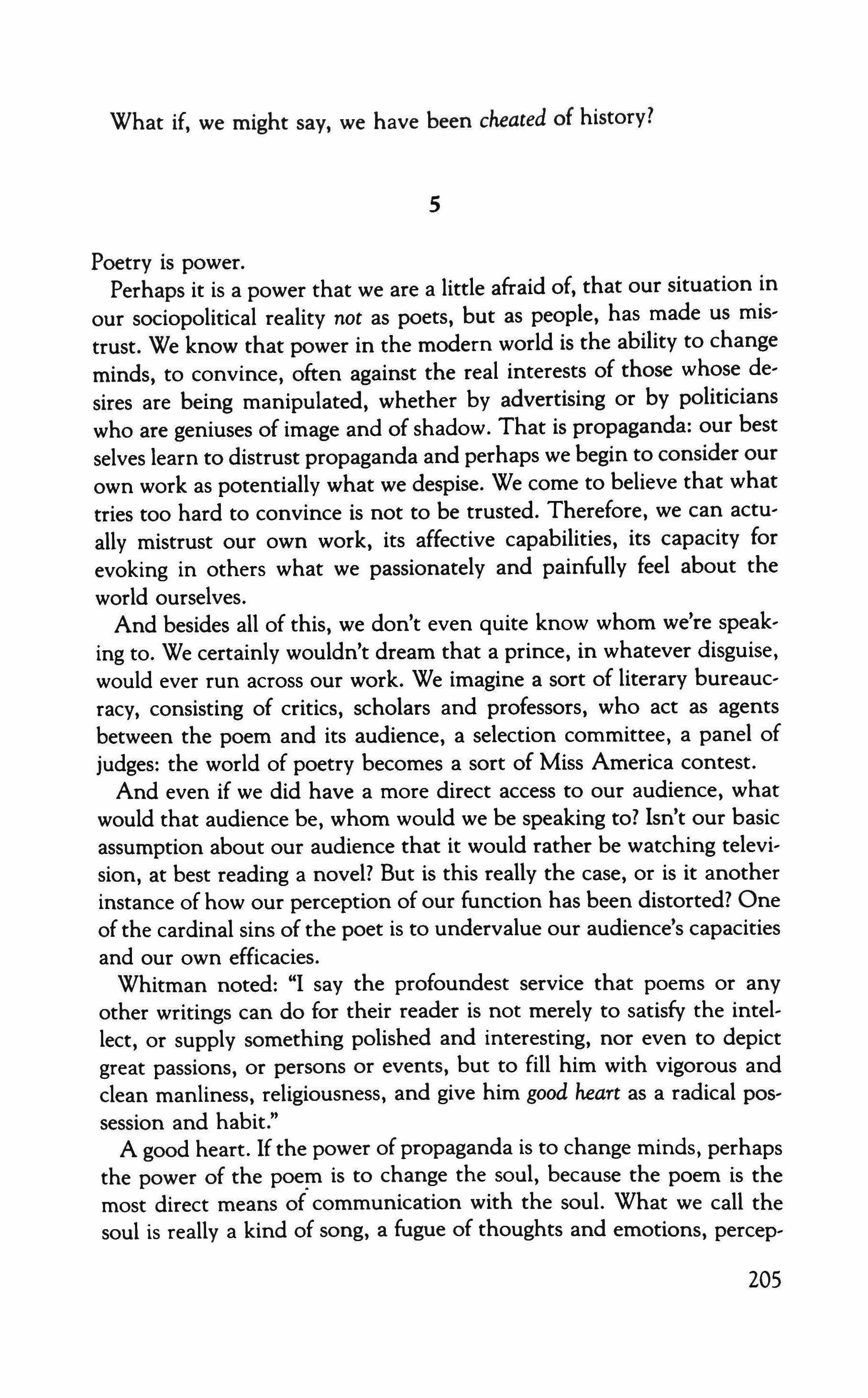
Poetry is power.
Perhaps it is a power that we are a little afraid of, that our situation in our sociopolitical reality not as poets, but as people, has made us mistrust. We know that power in the modern world is the ability to change minds, to convince, often against the real interests of those whose desires are being manipulated, whether by advertising or by politicians who are geniuses of image and of shadow. That is propaganda: our best selves learn to distrust propaganda and perhaps we begin to consider our own work as potentially what we despise. We come to believe that what tries too hard to convince is not to be trusted. Therefore, we can actually mistrust our own work, its affective capabilities, its capacity for evoking in others what we passionately and painfully feel about the world ourselves.
And besides all of this, we don't even quite know whom we're speaking to. We certainly wouldn't dream that a prince, in whatever disguise, would ever run across our work. We imagine a sort of literary bureaucracy, consisting of critics, scholars and professors, who act as agents between the poem and its audience, a selection committee, a panel of judges: the world of poetry becomes a sort of Miss America contest.
And even if we did have a more direct access to our audience, what would that audience be, whom would we be speaking to? Isn't our basic assumption about our audience that it would rather be watching television, at best reading a novel? But is this really the case, or is it another instance of how our perception of our function has been distorted? One of the cardinal sins of the poet is to undervalue our audience's capacities and our own efficacies.
Whitman noted: "I say the profoundest service that poems or any other writings can do for their reader is not merely to satisfy the intellect, or supply something polished and interesting, nor even to depict great passions, or persons or events, but to fill him with vigorous and clean manliness, religiousness, and give him good heart as a radical possession and habit."
A good heart. If the power of propaganda is to change minds, perhaps the power of the poem is to change the soul, because the poem is the most direct means of communication with the soul. What we call the soul is really a kind of song, a fugue of thoughts and emotions, percep-
5
205
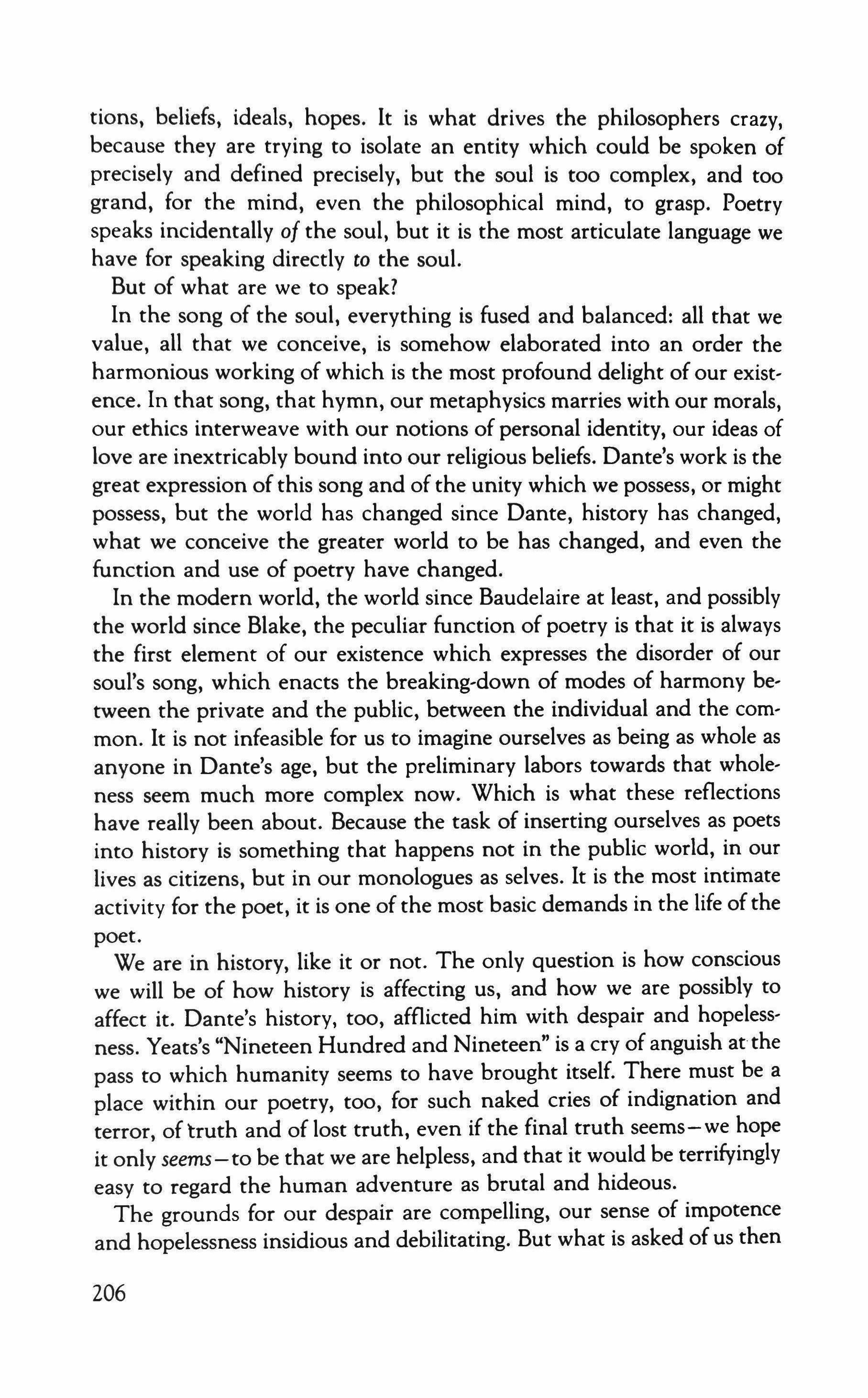
tions, beliefs, ideals, hopes. It is what drives the philosophers crazy, because they are trying to isolate an entity which could be spoken of precisely and defined precisely, but the soul is too complex, and too grand, for the mind, even the philosophical mind, to grasp. Poetry speaks incidentally of the soul, but it is the most articulate language we have for speaking directly to the soul.
But of what are we to speak?
In the song of the soul, everything is fused and balanced: all that we value, all that we conceive, is somehow elaborated into an order the harmonious working of which is the most profound delight of our existence. In that song, that hymn, our metaphysics marries with our morals, our ethics interweave with our notions of personal identity, our ideas of love are inextricably bound into our religious beliefs. Dante's work is the great expression of this song and of the unity which we possess, or might possess, but the world has changed since Dante, history has changed, what we conceive the greater world to be has changed, and even the function and use of poetry have changed.
In the modern world, the world since Baudelaire at least, and possibly the world since Blake, the peculiar function of poetry is that it is always the first element of our existence which expresses the disorder of our soul's song, which enacts the breaking-down of modes of harmony between the private and the public, between the individual and the common. It is not infeasible for us to imagine ourselves as being as whole as anyone in Dante's age, but the preliminary labors towards that wholeness seem much more complex now. Which is what these reflections have really been about. Because the task of inserting ourselves as poets into history is something that happens not in the public world, in our lives as citizens, but in our monologues as selves. It is the most intimate activity for the poet, it is one of the most basic demands in the life ofthe poet.
We are in history, like it or not. The only question is how conscious we will be of how history is affecting us, and how we are possibly to affect it. Dante's history, too, afflicted him with despair and hopelessness. Yeats's "Nineteen Hundred and Nineteen" is a cry of anguish atthe pass to which humanity seems to have brought itself. There must be a place within our poetry, too, for such naked cries of indignation and terror, of truth and of lost truth, even if the final truth seems-we hope it only seems-to be that we are helpless, and that it would be terrifyingly easy to regard the human adventure as brutal and hideous.
The grounds for our despair are compelling, our sense of impotence and hopelessness insidious and debilitating. But what is asked of us then
206
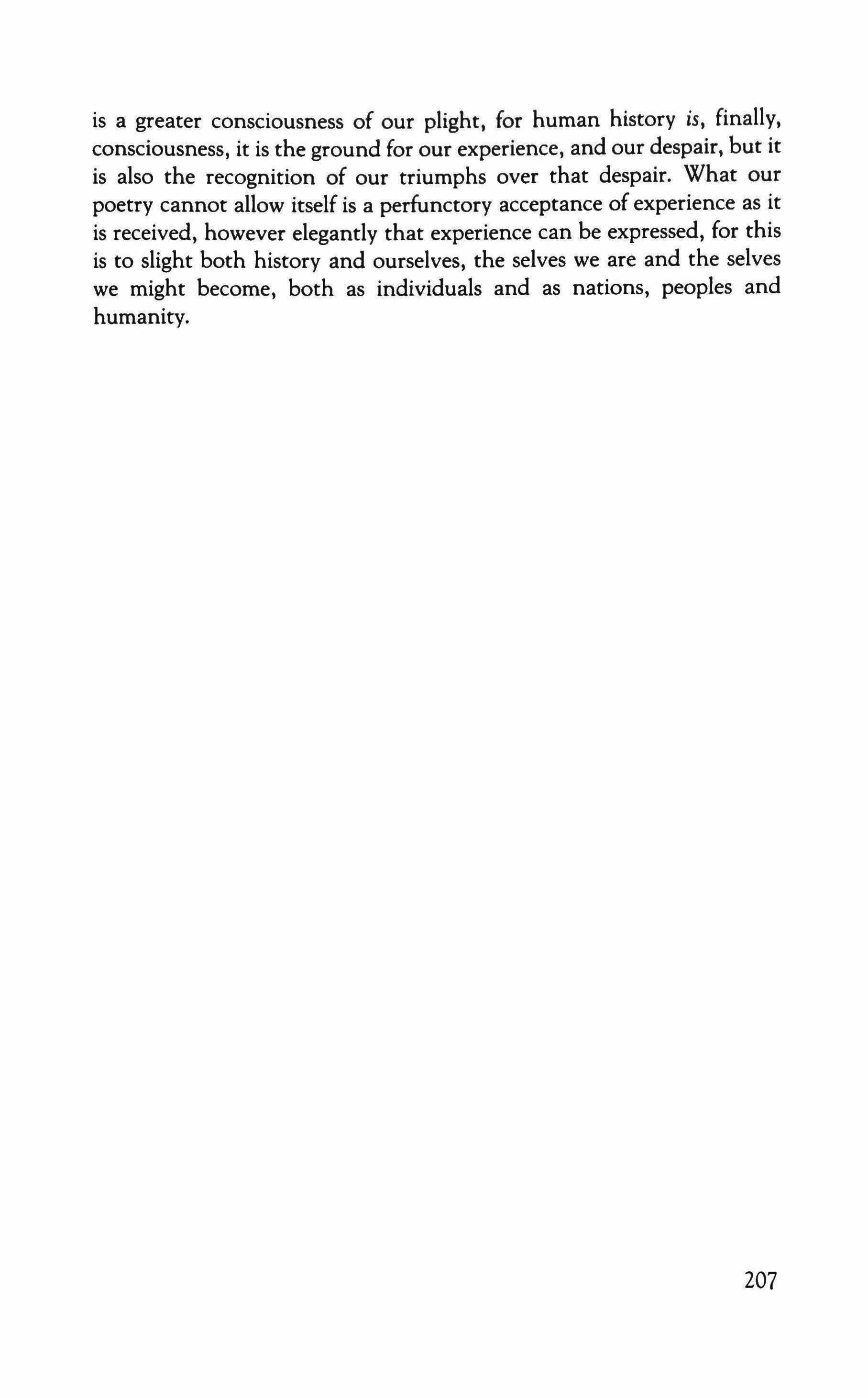
is a greater consciousness of our plight, for human history is, finally, consciousness, it is the ground for our experience, and our despair, but it is also the recognition of our triumphs over that despair. What our poetry cannot allow itself is a perfunctory acceptance of experience as it is received, however elegantly that experience can be expressed, for this is to slight both history and ourselves, the selves we are and the selves we might become, both as individuals and as nations, peoples and humanity.
207
Contributors
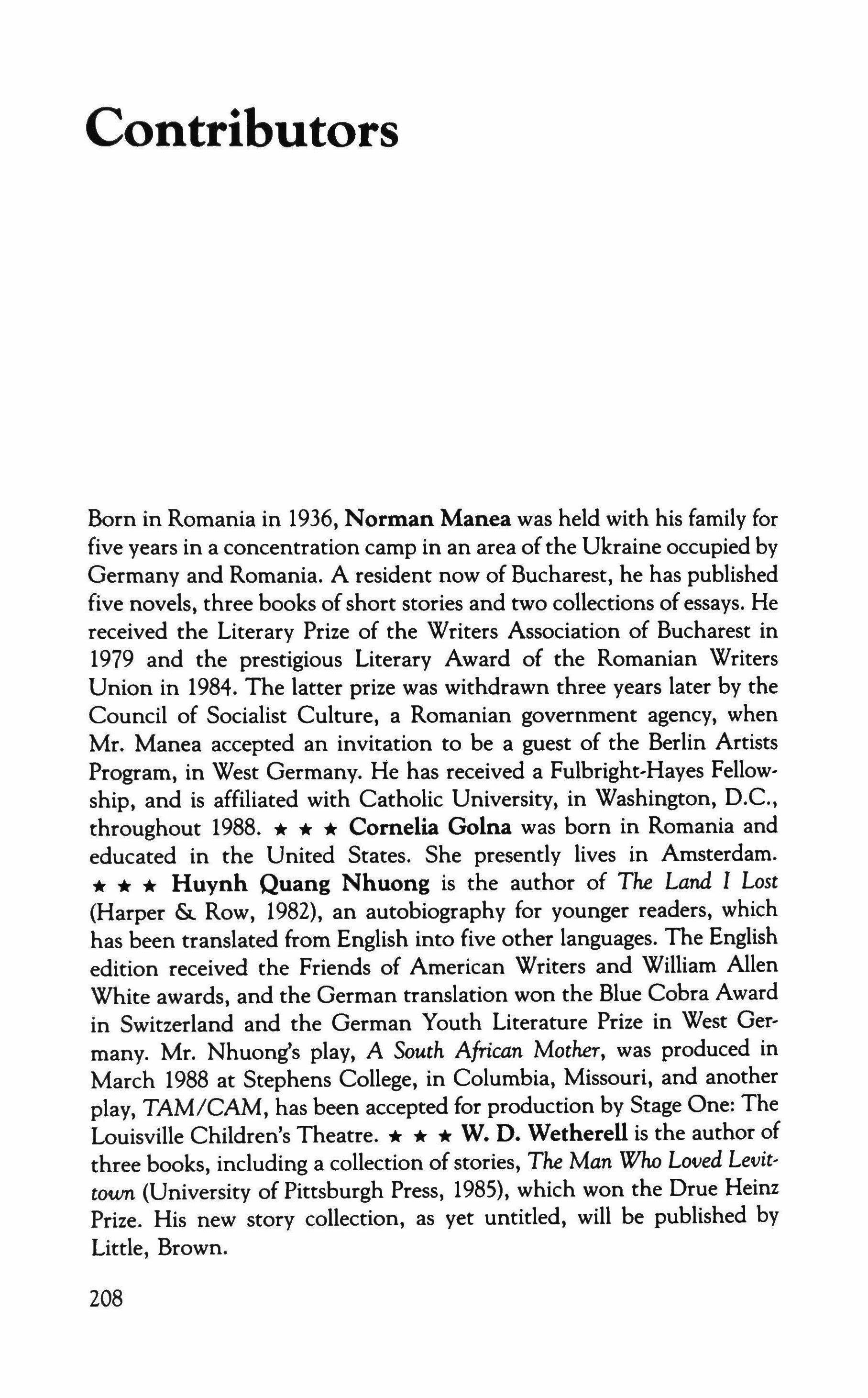
Born in Romania in 1936, Norman Manea was held with his family for five years in a concentration camp in an area of the Ukraine occupied by Germany and Romania. A resident now of Bucharest, he has published five novels, three books ofshort stories and two collections of essays. He received the Literary Prize of the Writers Association of Bucharest in 1979 and the prestigious Literary Award of the Romanian Writers Union in 1984. The latter prize was withdrawn three years later by the Council of Socialist Culture, a Romanian government agency, when Mr. Manea accepted an invitation to be a guest of the Berlin Artists Program, in West Germany. He has received a Fulbright-Haves Fellow, ship, and is affiliated with Catholic University, in Washington, D.C., throughout 1988. * * * Cornelia Golna was born in Romania and educated in the United States. She presently lives in Amsterdam.
* * * Huynh Quang Nhuong is the author of The Land I Lost (Harper & Row, 1982), an autobiography for younger readers, which has been translated from English into five other languages. The English edition received the Friends of American Writers and William Allen White awards, and the German translation won the Blue Cobra Award in Switzerland and the German Youth Literature Prize in West Germany. Mr. Nhuong's play, A South African Mother, was produced in March 1988 at Stephens College, in Columbia, Missouri, and another play, TAM/CAM, has been accepted for production by Stage One: The Louisville Children's Theatre. * * * W. D. Wetherell is the author of three books, including a collection of stories, The Man Who Loved Levit, town (University of Pittsburgh Press, 1985), which won the Drue Heinz Prize. His new story collection, as yet untitled, will be published by Little, Brown.
208

Anne Calcagno's stories have been published in the North American Review, Denver Quarterly, Epoch and other journals. She is employed as a writer by Northwestern University. * * * Fred Pfeil is the author of a collection of stories, Shine On (Lynx House Press, 1987) and a science-fiction novel, Goodman 2020 (Indiana University Press, 1986). He is the fiction editor of the minnesota review and a co-editor of the annual The Year Left: An American Socialist Yearbook (Verso). * * * Sheila Schwartz has published short stories in the Atlantic, MSS, Sequoia and other periodicals. She teaches in the English Department at Ohio University. * * * Steven Brint is an assistant professor ofsociology at Yale University. He is at work on his third book, The End of the Pluralist Era, a study of recent changes in American politics and government. "Notes on Veritarian Bookfightlng' is his first work of fiction. * * * Wesley Walden's stories have appeared in several magazines, including TQ #62. He is a social worker in Junction City, Kansas.
John Peck's books of poetry include Shagbark (Bobbs-Merrill, 1972), and The Broken Blockhouse Wall (Godine, 1978). His poems have also appeared in TQ #56 and #61. * * * Kay Ryan has published a book of poems entitled Strangely Marked Metal (Copper Beech Press, 1985). Her work has appeared in several journals, including the Paris Review, Amencan Poetry Review, Partisan Review and Poetry. * * * The recipient of the Nobel Prize in chemistry in 1981, Roald Hoffmann teaches and conducts research in theoretical chemistry at Cornell University. His first collection of poems, The Metamict State, was published by the University of Central Florida Press (1987).
* * * Michael Ryan has received a Whiting Writers Award for his poetry and essays and the Virginia Prize for the manuscript of God Hunger, his third book of poems, which will be published in spring 1989 by Viking Penguin. He teaches in the MFA Program for Writers at Warren Wilson College and at the University of Virginia.
Born in Fujian Province in the People's Republic of China, Shu Ting was sent to the countryside as a child in the late fifties when her father was accused of being a Rightist. After receiving her education and holding a series of odd jobs, she became associated with the editors of the journal, ]intian (Today), and began publishing her poetry. She is presently a correspondent for the Beijing Review and a member of the Council ofthe Chinese Writers Association. * * * Edward Morin is a professor of English at Wayne State University. His translations from modern Greek and Chinese have appeared in several periodicals, and his own poems have been published in the Hudson Review, Ploughshares, Poetry Northwest and other journals. * * * Dennis Ding, whose Chi-
209
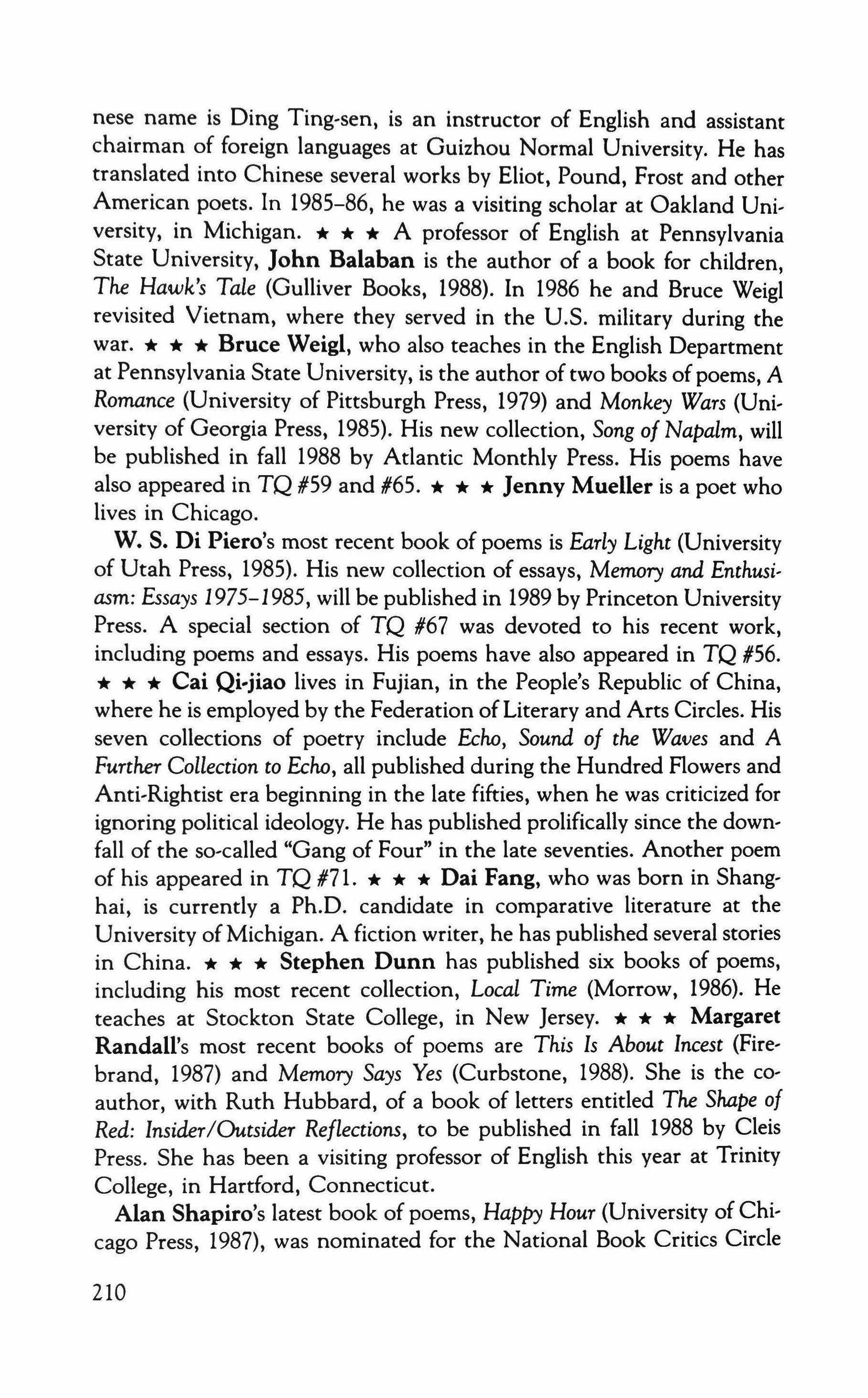
nese name is Ding Ting-sen, is an instructor of English and assistant chairman of foreign languages at Guizhou Normal University. He has translated into Chinese several works by Eliot, Pound, Frost and other American poets. In 1985-86, he was a visiting scholar at Oakland University, in Michigan. * * * A professor of English at Pennsylvania State University, John Balaban is the author of a book for children, The Hawk's Tale (Gulliver Books, 1988). In 1986 he and Bruce Weigl revisited Vietnam, where they served in the U.S. military during the war. * * * Bruce Weigl, who also teaches in the English Department at Pennsylvania State University, is the author of two books of poems, A Romance (University of Pittsburgh Press, 1979) and Monkey Wars (University of Georgia Press, 1985). His new collection, Song of Napalm, will be published in fall 1988 by Atlantic Monthly Press. His poems have also appeared in TQ #59 and #65. * * * Jenny Mueller is a poet who lives in Chicago.
W. S. Di Piero's most recent book of poems is Early Light (University of Utah Press, 1985). His new collection of essays, Memory and Enthusiasm: Essays 1975-1985, will be published in 1989 by Princeton University Press. A special section of TQ #67 was devoted to his recent work, including poems and essays. His poems have also appeared in TQ #56. * * * Cai Qi-jiao lives in Fujian, in the People's Republic of China, where he is employed by the Federation ofLiterary and Arts Circles. His seven collections of poetry include &ho, Sound of the Waves and A Further Collection to &ho, all published during the Hundred Flowers and Anti-Rightist era beginning in the late fifties, when he was criticized for ignoring political ideology. He has published prolifically since the downfall of the so-called "Gang of Four" in the late seventies. Another poem of his appeared in TQ #71. * * * Dai Fang, who was born in Shanghai, is currently a Ph.D. candidate in comparative literature at the University ofMichigan. A fiction writer, he has published several stories in China. * * * Stephen Dunn has published six books of poems, including his most recent collection, Local Time (Morrow, 1986). He teaches at Stockton State College, in New Jersey. * * * Margaret Randall's most recent books of poems are This Is About Incest (Firebrand, 1987) and Memory Says Yes (Curbstone, 1988). She is the coauthor, with Ruth Hubbard, of a book of letters entitled The Shape of Red: Insider/Outsider Reflections, to be published in fall 1988 by Cleis Press. She has been a visiting professor of English this year at Trinity College, in Hartford, Connecticut.
Alan Shapiro's latest book of poems, Happy Hour (University of Chicago Press, 1987), was nominated for the National Book Critics Circle
210
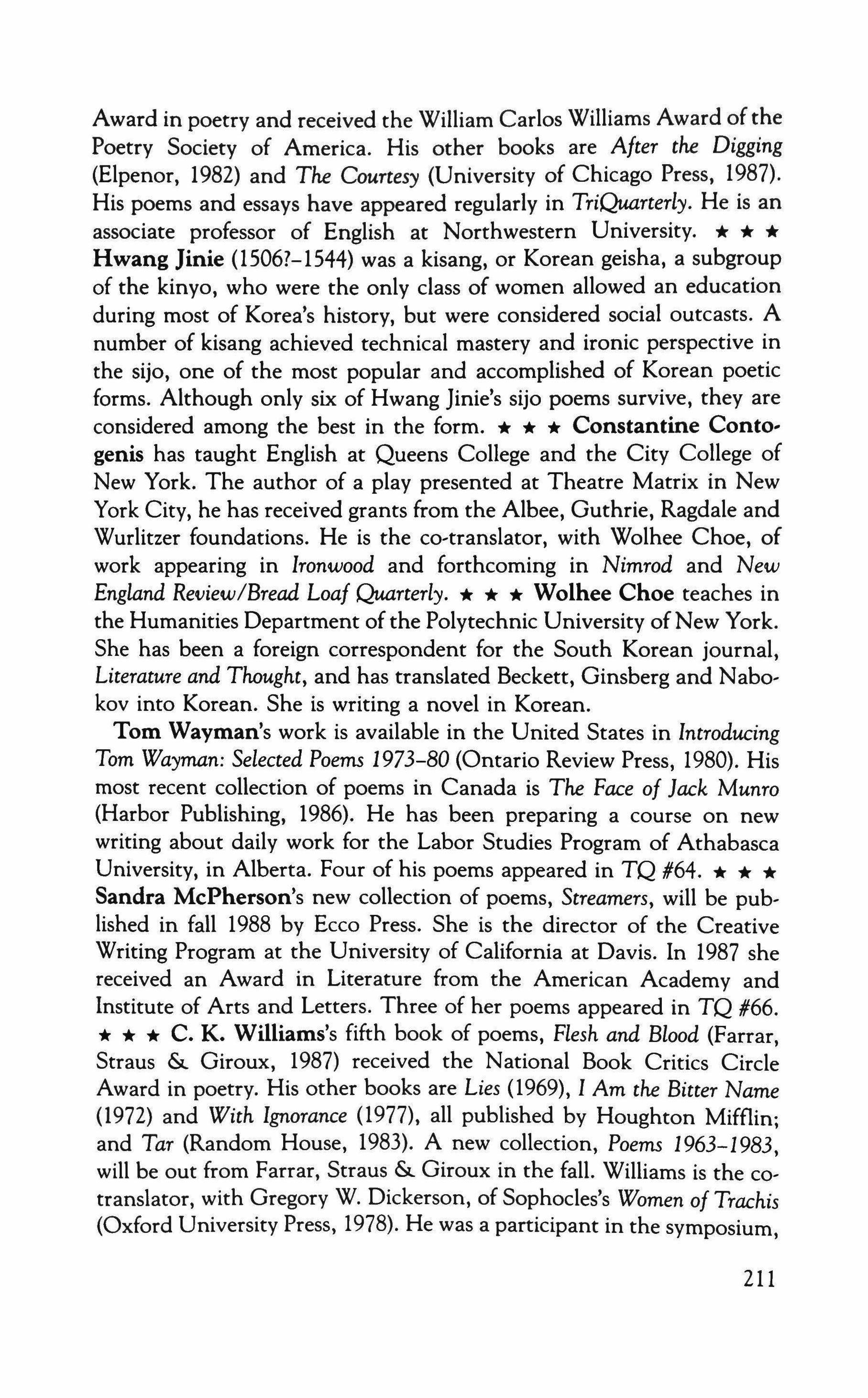
Award in poetry and received the William Carlos Williams Award of the Poetry Society of America. His other books are After the Digging (Elpenor, 1982) and The Courtesy (University of Chicago Press, 1987). His poems and essays have appeared regularly in TriQuarterly. He is an associate professor of English at Northwestern University. * * * Hwang Jinie (1506?-1544) was a kisang, or Korean geisha, a subgroup of the kinyo, who were the only class of women allowed an education during most of Korea's history, but were considered social outcasts. A number of kisang achieved technical mastery and ironic perspective in the sijo, one of the most popular and accomplished of Korean poetic forms. Although only six of Hwang ]inie's sijo poems survive, they are considered among the best in the form. * * * Constantine Contogenis has taught English at Queens College and the City College of New York. The author of a play presented at Theatre Matrix in New York City, he has received grants from the Albee, Guthrie, Ragdale and Wurlitzer foundations. He is the co-translator, with Wolhee Choe, of work appearing in Ironwood and forthcoming in Nimrod and New England Review/Bread Loaf Quarterly. * * * Wolhee Choe teaches in the Humanities Department ofthe Polytechnic University ofNew York. She has been a foreign correspondent for the South Korean journal, Literature and Thought, and has translated Beckett, Ginsberg and Nabokov into Korean. She is writing a novel in Korean.
Tom Wayman's work is available in the United States in Introducing Tom Wayman: Selected Poems 1973-80 (Ontario Review Press, 1980). His most recent collection of poems in Canada is The Face of lack Munro (Harbor Publishing, 1986). He has been preparing a course on new writing about daily work for the Labor Studies Program of Athabasca University, in Alberta. Four of his poems appeared in TQ #64. * * * Sandra McPherson's new collection of poems, Streamers, will be published in fall 1988 by Ecco Press. She is the director of the Creative Writing Program at the University of California at Davis. In 1987 she received an Award in Literature from the American Academy and Institute of Arts and Letters. Three of her poems appeared in TQ #66.
* * * C. K. Williams's fifth book of poems, Flesh and Blood (Farrar, Straus & Giroux, 1987) received the National Book Critics Circle Award in poetry. His other books are Lies (1969), I Am the Bitter Name (1972) and With Ignorance (1977), all published by Houghton Mifflin; and Tar (Random House, 1983). A new collection, Poems 1963-1983, will be out from Farrar, Straus & Giroux in the fall. Williams is the cotranslator, with Gregory W. Dickerson, of Sophocles's Women of Trachis (Oxford University Press, 1978). He was a participant in the symposium,
211

The Writer in Our World (TQ #65), contributing an essay and poems to that volume, and his poems have also appeared in TQ #58.
212
"What the mothersings to the cradle goes all the way down to the coffin:' -Henry Ward Beecher
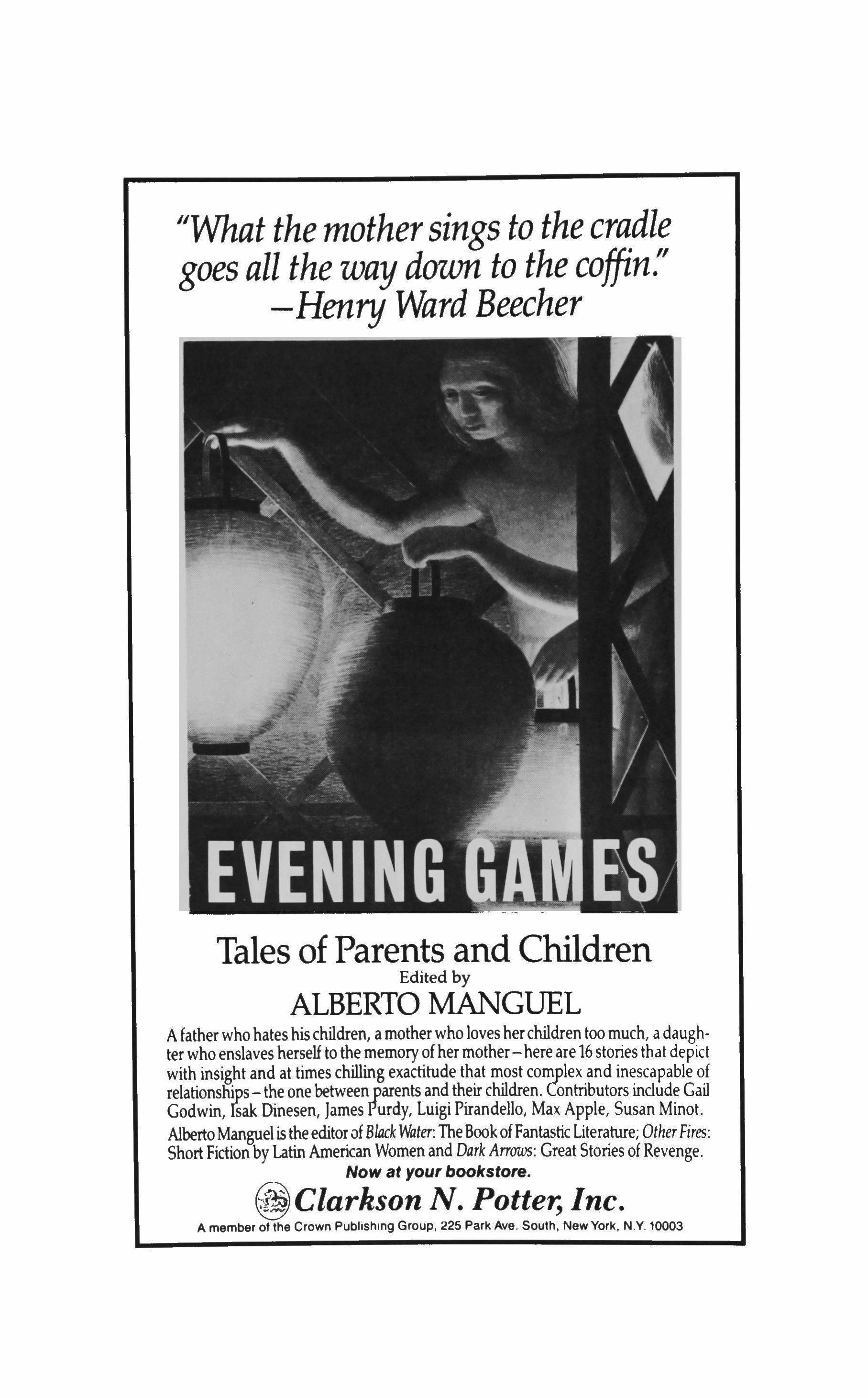
Tales of Parents and Children
Edited by ALBERTO MANGUEL
A father who hates his children, a mother who loves herchildren too much, a daughter who enslaves herself to the memory ofher mother - here are 16 stories that depict with insight and at times chilling exactitude that most complex and inescapable of relationships - the one between parents and theirchildren. Contributors include Gail Godwin, Isak Dinesen, James Purdy, Luigi Pirandello, Max Apple, Susan Minot. AlbertoManguelistheeditor0f Black Water: TheBookofFantastic Literature; OtherFires: Short Fiction by Latin American Women and Dark Arrows: Great Stories of Revenge. Now at your bookstore.
@ClarksonN. Potter, Inc.
A member of the Crown Publishing Group, 225 Park Ave. South, New York, N.Y. 10003
FROM THE CROWN
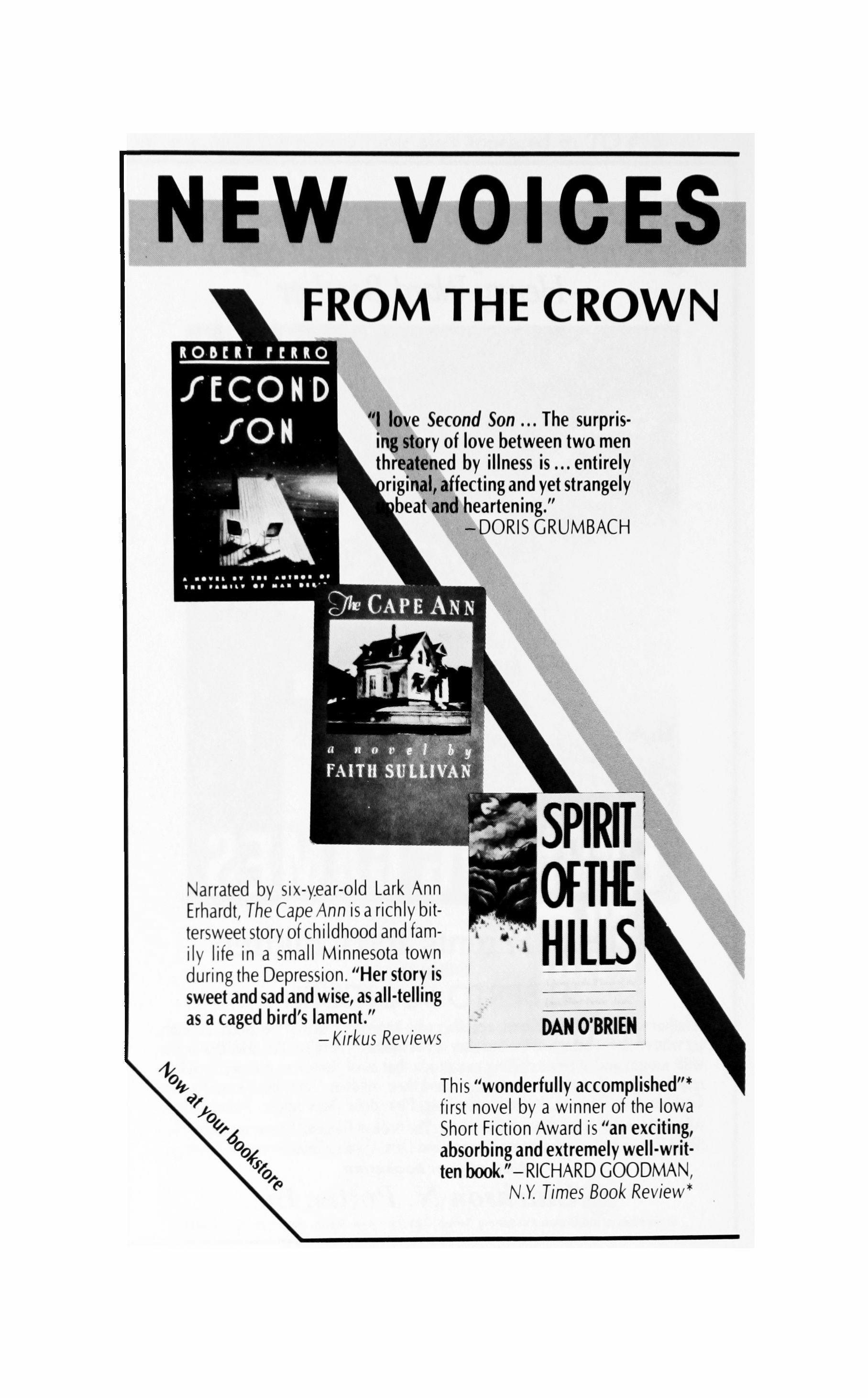
Narrated by six-year-old Lark Ann Erhardt, The Cape Ann is a richly bittersweet story ofchiIdhood and family life in a small Minnesota town during the Depression. "Her story is sweet and sad and wise, as all-telling as a caged bird's lament." - Kirkus Reviews I {
I
Th is "wonderfully accomplished"* first novel by a winner of the Iowa Short Fiction Award is "an exciting, absorbing and extremely well-written book," - RICHARD GOODMAN, N.Y Times Book Review*
r'
�---.---------j
DAN O'BRIEN
PUBLISHING GROUP
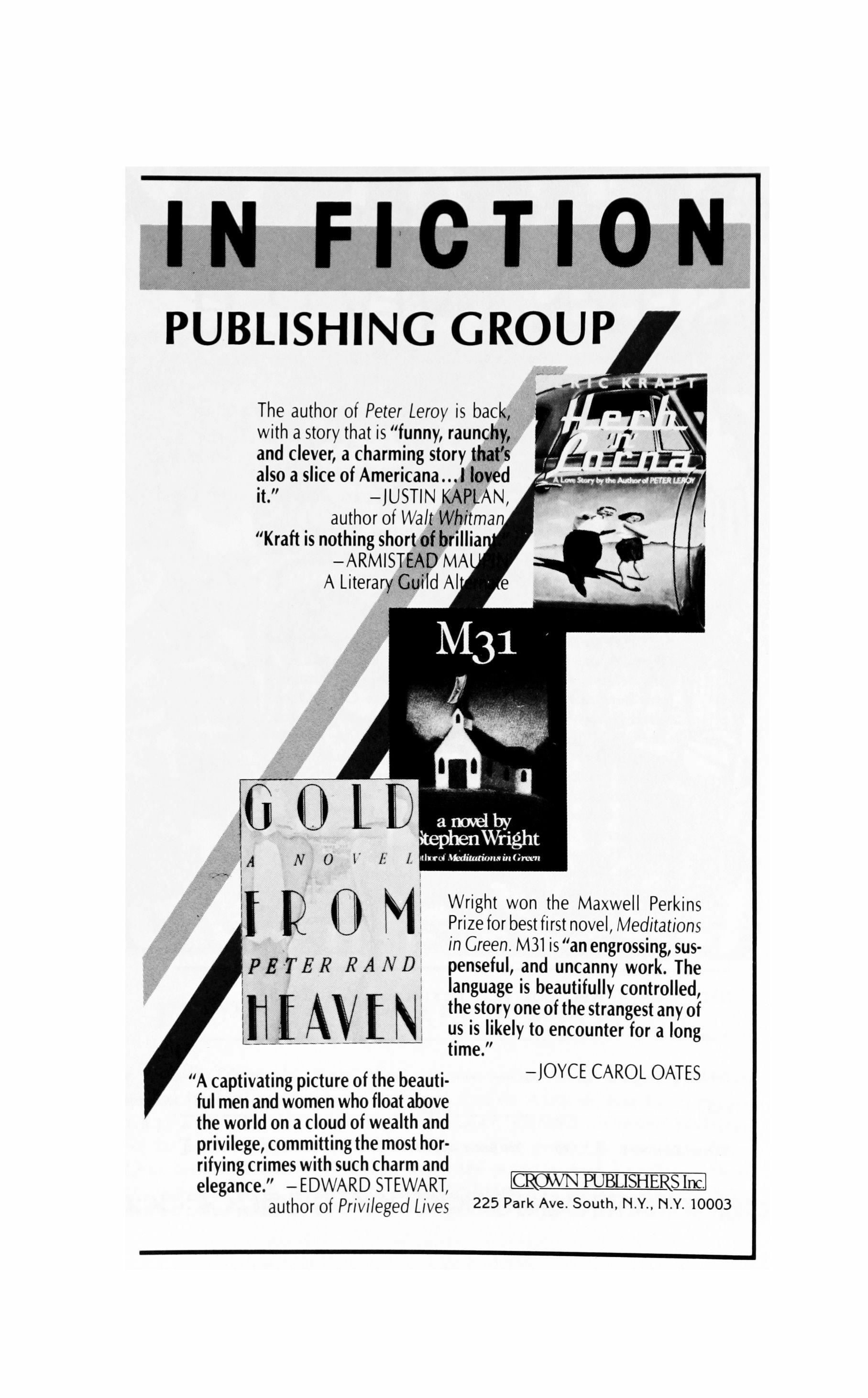
Wright won the Maxwell Perkins Prize for best first novel, Meditations in Green. M31 is "an engrossing, suspenseful, and uncanny work. The language is beautifully controlled, the story one of the strangest any of �s is likely to encounter for a long time."
"A captivating picture of the beauti- -JOYCE CAROL OATES ful men and women who float above the world on a cloud of wealth and privilege,committingthe most horrifying crimes with such charm and elegance." - EDWARD STEWART, author of Privileged Lives 225
10003 jA NOV I If � 0 M\ PETER RAND! �iAV(NI � PUBLISHERSJIid
Park Ave. South, N.Y., N.Y.
SHENANDOAH
THE WASHINOTON AND LEE UNIVERSITY REVIEW
"Full of fictional, critical, poetic and biographical splendor." - The New York Times Book Review
"Well burnished excellence, long maintained." - Kirkus Reviews
"A showcase for exceptional writing." - The Washington Post
AMONG OUR PAST CONTRIBUTORS:
Alice Adams
W. H. Auden
Ann Beattie
John Berryman
Alfred Corn
e. e. cummings
J ames Dickey
William Faulkner
Jonathan Galassi
Seamus Heaney
John Hersey
Daniel Hoffman
Richard Howard
David Lehman
Robert Lowell

Thomas McGuane
James Merrill
Howard Nernerov
Joyce Carol Oates
Flannery O'Connor
Katherine Anne Porter
Ezra Pound
Reynolds Price
Stephen Spender
Wallace Stevens
Dabney Stuart
Peter Taylor
Eudora Wehy
Richard Wilbur
Marguerite Yourcenar
SHENANDOAH, Box 722, LEXINGTON, VA. 24450
Name
SINGLE ISSUE: $3.50 SUBSCRIPTION: $11.00 A YEAR ($14.00 FOREIGN) T
Address City State Zip
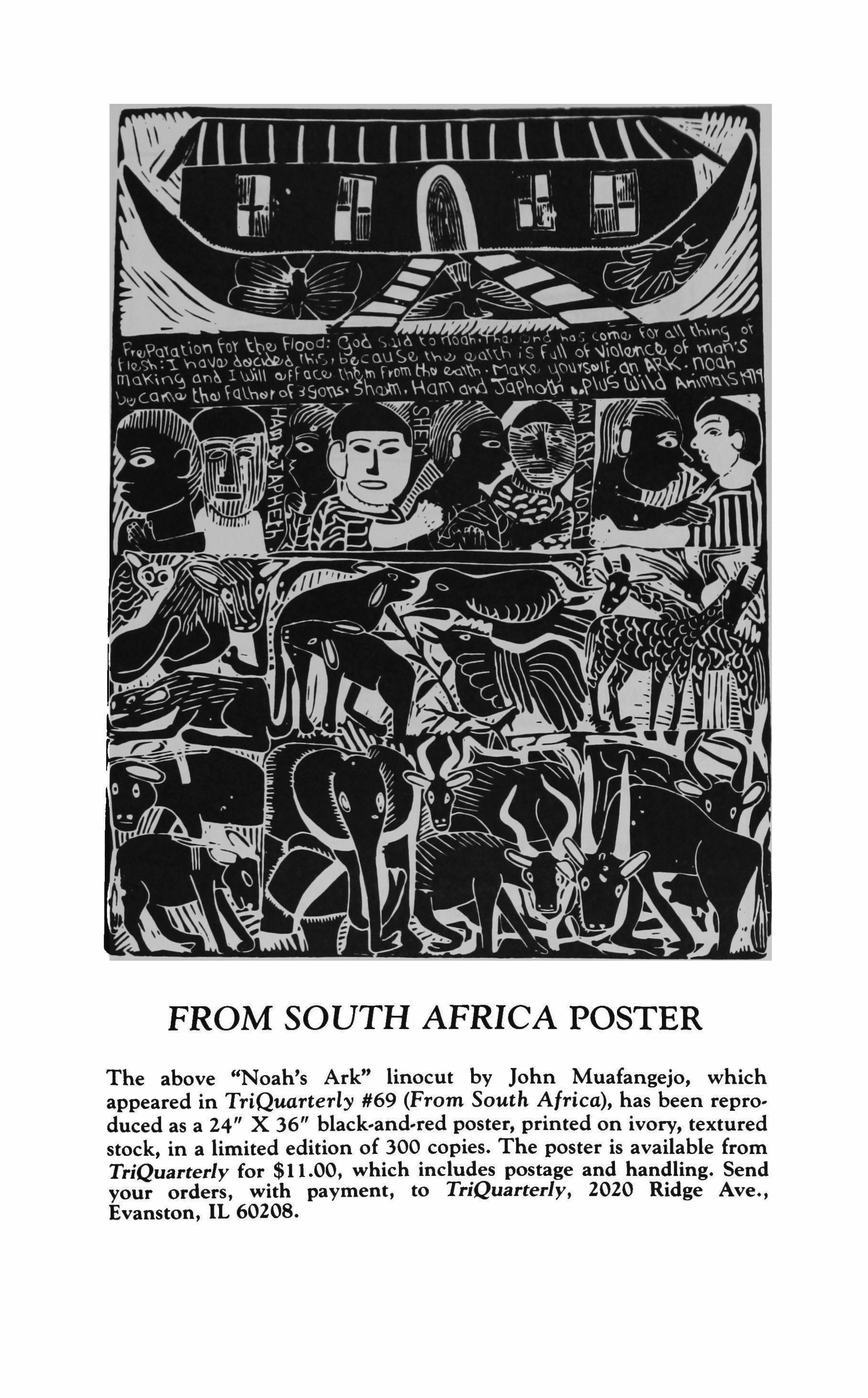
FROM SOUTH AFRICA POSTER
The above "Noah's Ark" linocut by John Muafangejo, which appeared in TriQuarterly #69 (From South Africa), has been reproduced as a 24" X 36" black-and-red poster, printed on ivory, textured stock, in a limited edition of 300 copies. The poster is available from TriQuarterly for $11.00, which includes postage and handling. Send your orders, with payment, to TriQuarterly, 2020 Ridge Ave., Evanston, IL 60208.
"Best New loumal- 1986"
Conference of Editors of Learned Journals
STUDIES IN AMERICAN DRAMA
1945·PRESENT
EDIlORS AND PUBLISHERS
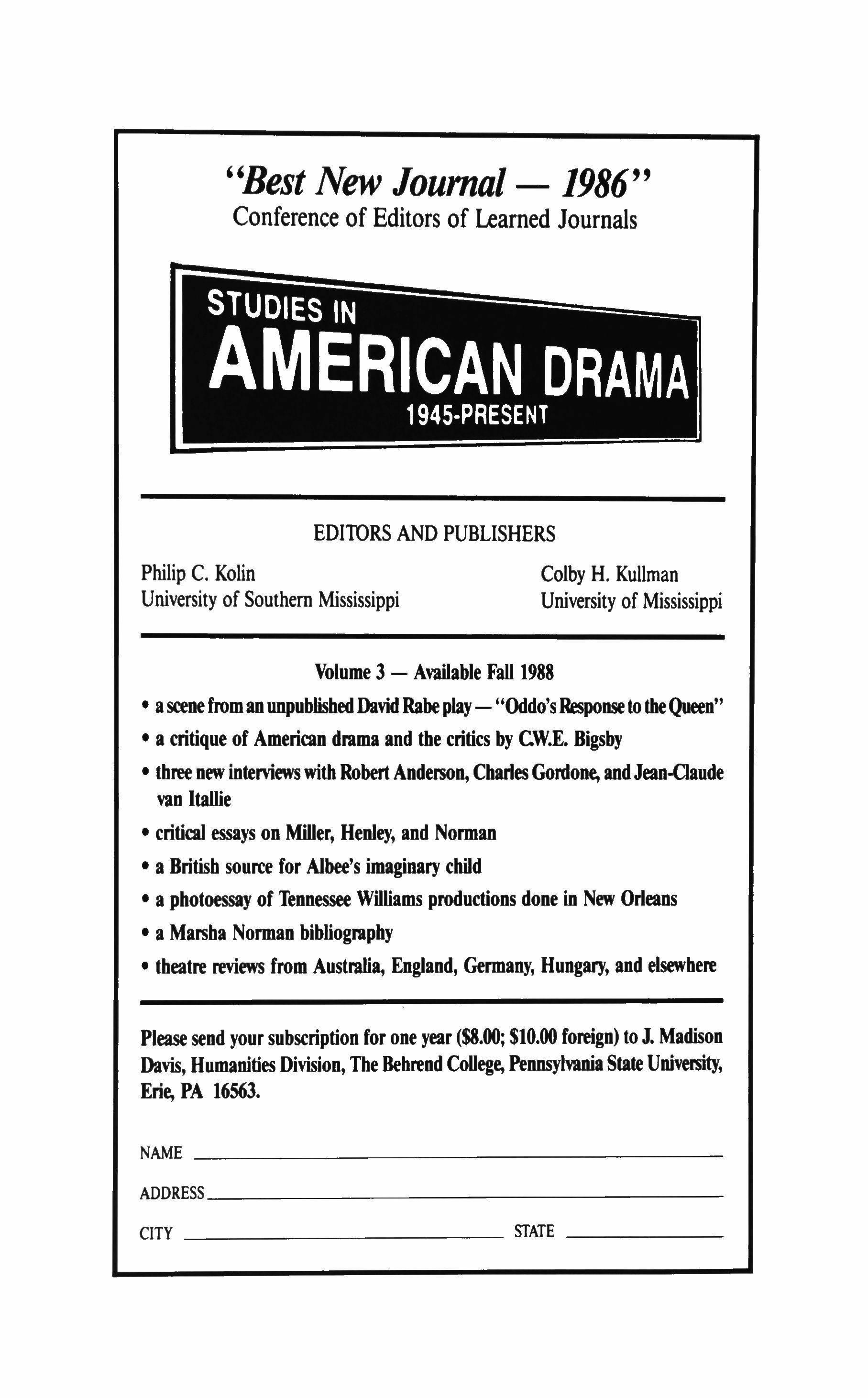
Philip C. Kolin
University of Southern Mississippi
Colby H. Kullman
University of Mississippi
Volume 3 - Available Fall 1988
a scene from an unpublisbedDavidRabeplay - "Oddo'sResponse totheQueen"
• a critique of American drama and tbe critics by CW.E. Bigsby
• tbree new interviews witb Robert Anderson, Cbarles Gordone, andJean-Ciaude van Itallie
critical essays on Miller, Henley, and Norman
a Britisb source for Albee's imaginary child
• a photoessay of Tennessee Williams productions done in New Orleans
• a Marsha Norman bibliography
• theatre reviews from Australia, England, Germany, Hungary, and elsewbere
Please send your subscription for one year (58.00; 510.00 foreign) to J. Madison Davis, Humanities Division, The Bebrend CoUege,PennsylvaniaState University, Erie, PA 16563.
NAME
ADDRESS
CITY STATE

1h¥lle Review
Kai Erikson, editor
For over seventy-six years The Yale Review has been publishing the best in poetry, fiction, book reviews. and essays of general intellectual interest. And the tradition remains very much alive. In the last several issues, for example, the Review has included:
Essays by Isaiah Berlin, Robert Brustein, Hortense N Calisher, Harvey Cox, Natalie Zemon Davis, Paul Freund, Francine du Plessix Gray. Seamus Heaney. Nat Hentoff, john Hersey, Paul Horgan, William Maxwell, W. V. Quine, Bayard Rustin, Mary Lee Settle, E. P. Thompson
� Poetry byjohn Ashbery. Amy Clampitt, Thorn Cunn, Anthony Hecht,james Merrill, W. S. Merwin, Howard Nemerov, Adrienne Rich, Gjertrud Schnackenberg, Grace Schulman, May Swenson, Charles Wright
Don't miss this opportunity to keep abreast of the best in current writing and criticism.
The Yale Review/Dept. EXC/g2A Yale Station/New Haven, CT 06520
Please enter my one-year (4 issues) subscription to The Yale Review at
$16.00 individual rate
$25.00 institutional rate
Please enclose check or charge: MasterCard VISA
Account# Exp. date
Signature
Name
Address
City State Zip
a look at the literati of the "Beat" generation by
John Clellan Holmes
Representative Men takes a long. penetrating. and personal look at the most celebrated group of non-conformists In post-World War II America. A close friend of men like Jack Kerouac. Allen Ginsberg. Jay Landesman. and Gershon Legman. John Clellon Holmes dlcusses with sympathy and candor the richly textured personalities of these representative men and the flavor of the era In which they labored.
$23.95. cloth; $12.95. paper
University of Arkansas
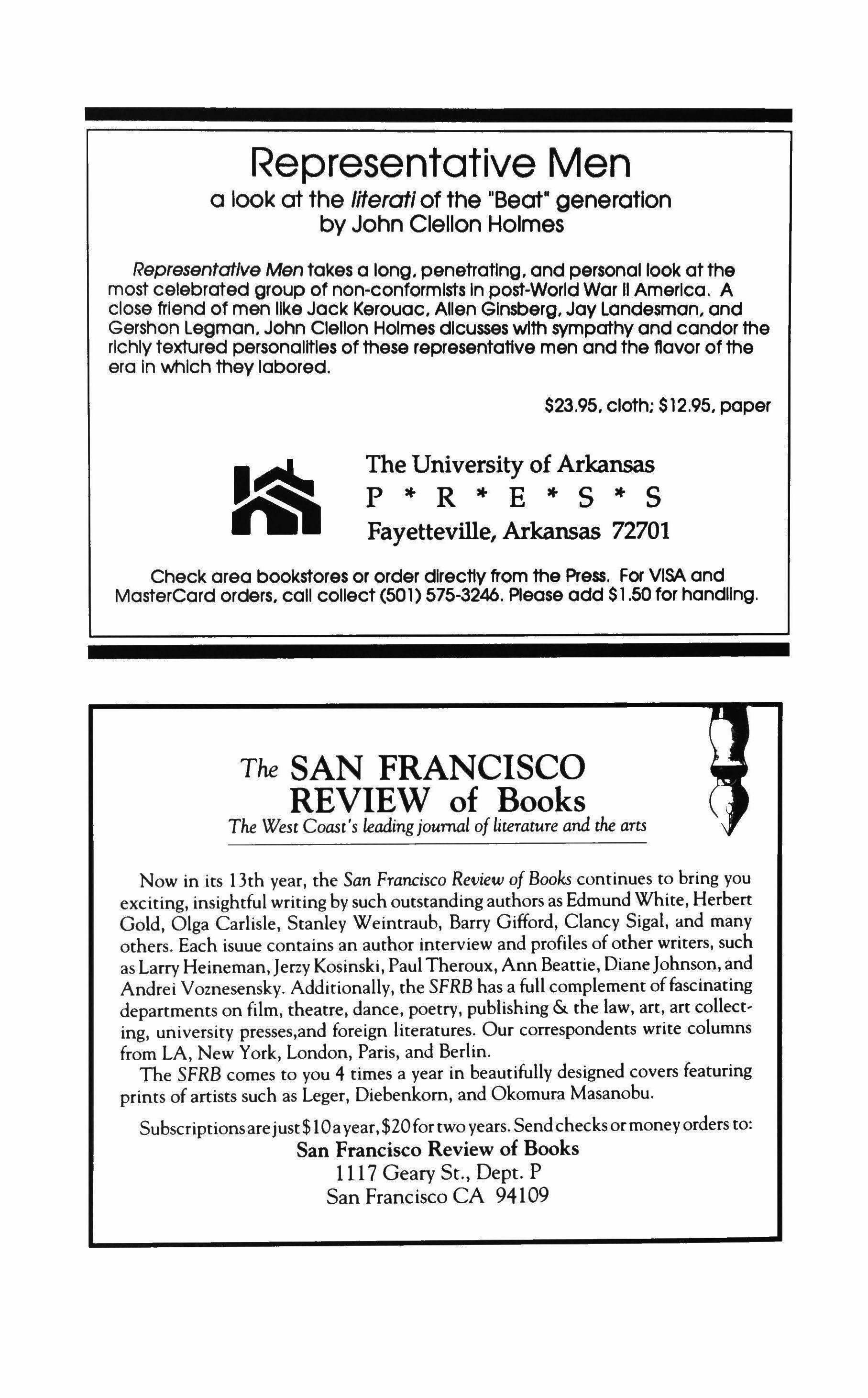
Check area bookstores or order directly from the Press. For VISA and MasterCard orders. call collect (501) 575-3246. Please add $1.50 for handling.
The SAN FRANCISCO REVIEW of Books
The West Coast's leadingjournal ofliterature and the arts
Now in its 13th year, the San Francisco Review of Books continues to bring you exciting, insightful writing by such outstanding authors as Edmund White, Herbert Gold, Olga Carlisle, Stanley Weintraub, Barry Gifford, Clancy Sigal, and many others. Each isuue contains an author interview and profiles ofother writers, such as Larry Heineman, [erzv Kosinski, Paul Theroux, Ann Beattie, DianeJohnson, and Andrei Voznesensky. Additionally, the SFRB has a full complement offascinating departments on film, theatre, dance, poetry, publishing & the law, art, art collecting, university presses,and foreign literatures. Our correspondents write columns from LA, New York, London, Paris, and Berlin.
The SFRB comes to you 4 times a year in beautifully designed covers featuring prints of artists such as Leger, Diebenkom, and Okomura Masanobu.
Subscriptions arejust$lOa year, $20for two years. Sendchecks or money orders to: San Francisco Review of Books 1117 Geary St., Dept. P San Francisco CA 94109
Representative Men
The
P * R * E * 5 * 5 Fayetteville, Arkansas 72701
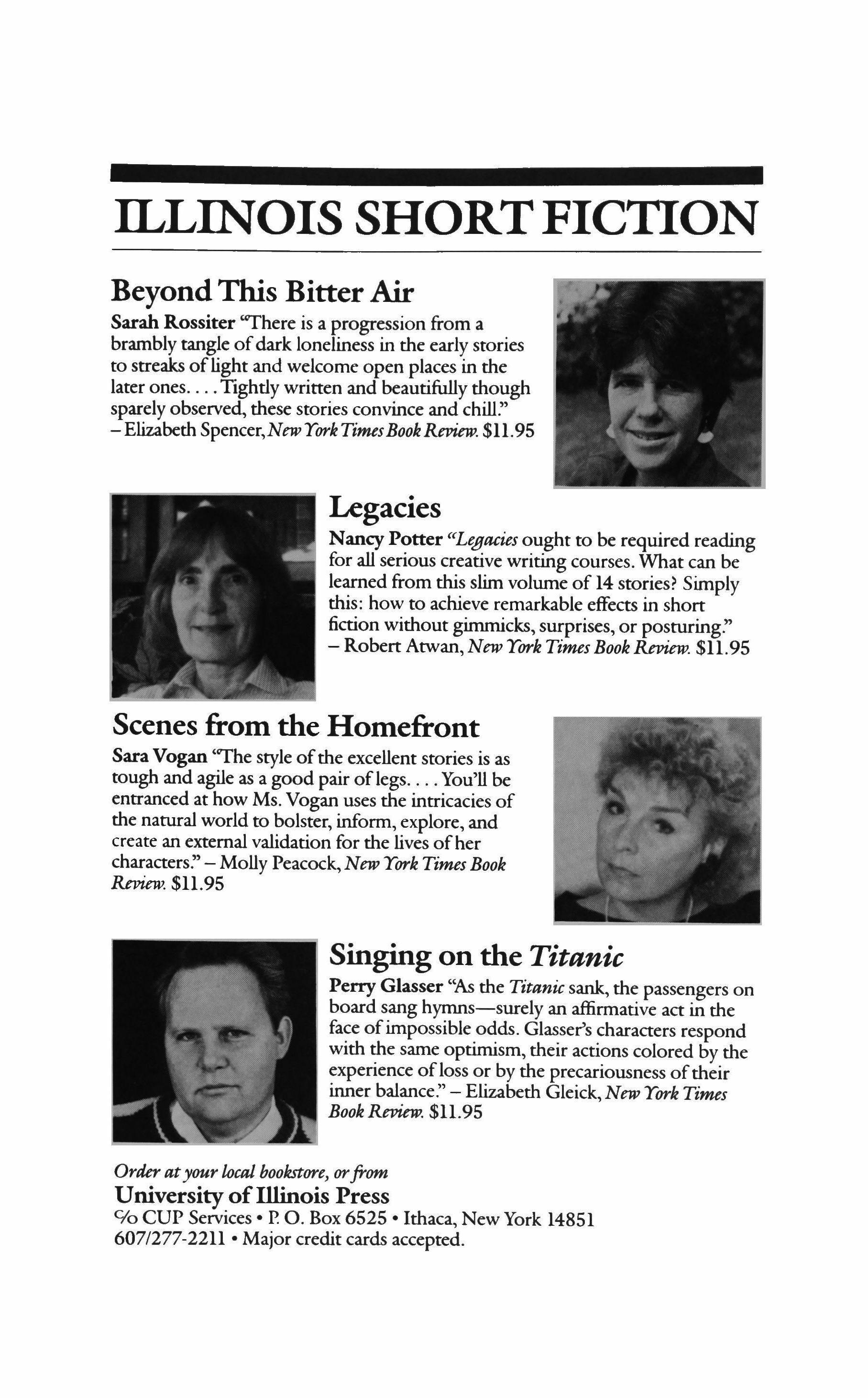
ILLINOIS SHORT FICTION
Beyond This Bitter Air
Sarah Rossiter "There is a progression from a brambly tangle ofdark loneliness in the early stories to streaks oflight and welcome open places in the later ones Tightly written and beautifullythough sparely observed, these stories convince and chill."
- Elizabeth Spencer,NewYork TimesBook Review. $11.95
Legacies
Nancy Potter «Legacies ought to be required reading for all serious creative writing courses. What can be learned from this slim volume of 14 stories? Simply this: how to achieve remarkable effects in short fiction without gimmicks,surprises, or posturing."
- Robert Arwan, New York Times Book Review. $11.95
Scenes from the Homefront
Sara Vogan ''The style ofthe excellent stories is as tough and agile as a good pair oflegs You'll be entranced at how Ms. Vogan uses the intricacies of the natural world to bolster, inform, explore, and create an external validation for the lives ofher characters." - Molly Peacock, New York Times Book Review. $11.95
Singing on the Titanic
Perry Glasser ''As the Titanic sank, the passengers on board sang hynms-surely an affirmative act in the face ofimpossible odds. Glasser's characters respond with the same optimism, their actions colored by the experience ofloss or by the precariousness oftheir inner balance." - Elizabeth Gleick,NewYork Times Book Review. $11.95
Order atyour 1000 bookstore, orfrom University ofIllinois Press <1'0 CUP Services> P. O. Box 6525· Ithaca, New York 14851 607/277-2211 Major credit cards accepted.
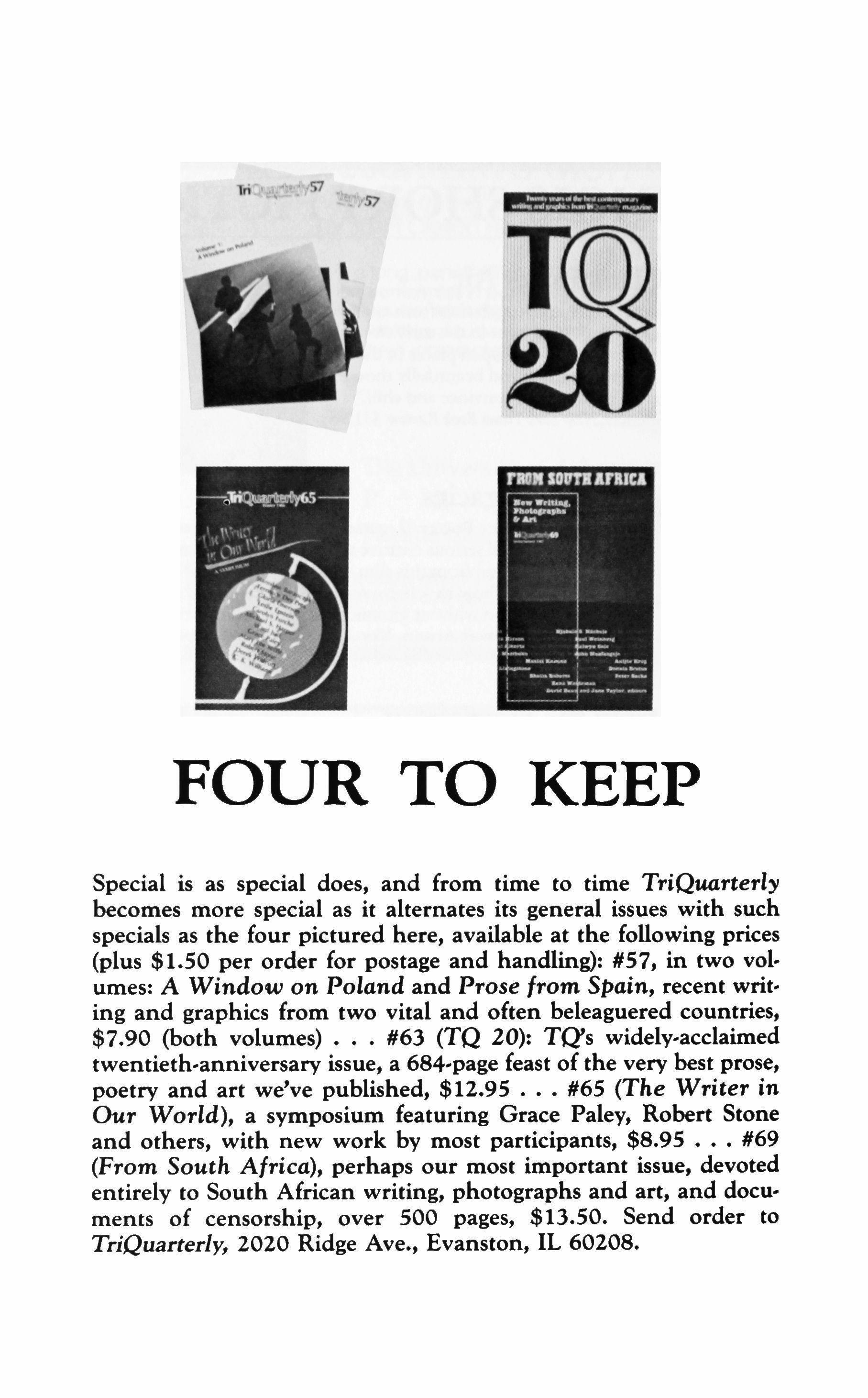
FOUR TO KEEP
Special is as special does, and from time to time TriQuarterly becomes more special as it alternates its general issues with such specials as the four pictured here, available at the following prices (plus $1.50 per order for postage and handling): #57, in two volumes: A Window on Poland and Prose from Spain, recent writing and graphics from two vital and often beleaguered countries, $7.90 (both volumes) #63 (TQ 20): TO's widely-acclaimed twentieth-anniversary issue, a 684-page feast of the very best prose, poetry and art we've published, $12.95 #65 (The Writer in Our World), a symposium featuring Grace Paley, Robert Stone and others, with new work by most participants, $8.95 •.. #69 (From South Africa), perhaps our most important issue, devoted entirely to South African writing, photographs and art, and documents of censorship, over 500 pages, $13.50. Send order to TriQuarterly, 2020 Ridge Ave., Evanston, IL 60208.
1_.n>In .-I.,..,.. m.. JWW
It was a Thursday when I lifted the phone and called my agent. I said, "Gabe, I'm going to be sixty-six tomorrow, Friday, January 13, 1978, and I've been writing fiction all my life and no one's ever published a word of it and I'd give my left pinkie to get into The Paris Review:' And I did because Gabriel was interested at once and told me that he'd get in touch with me the next day because he thought he might find a buyer. He did When my story came out, I went to Dr. Dodypol and had the finger removed surgically and under anesthesia. His head nurse, Kate Crackernuts, wrapped the finger in cotton bandages and in red tissue paper with a yellow ribbon around it and I walked out a published author and weighing three ounces less than when I walked in.
-Dallas Wiebe, "Night Flight to Stockholm," Issue 73
THE PARIS REVIEW

"A
Prestigious Launching Pad for Young Writers."
-The Boston Globe
Please send me the following:
o 1 year subscription (four issues), for $20
o 2 year subscription (eight issues), for $40
o The commemorative 100th issue, for $11 NAME
Squ ��.�-
�
ADDRESS CITY STATE ZIP THE PARIS REVIEW 45-39171st Place, Flushing, NY 11358 35
Poetry • Art Criticism Th ree ti mes a year
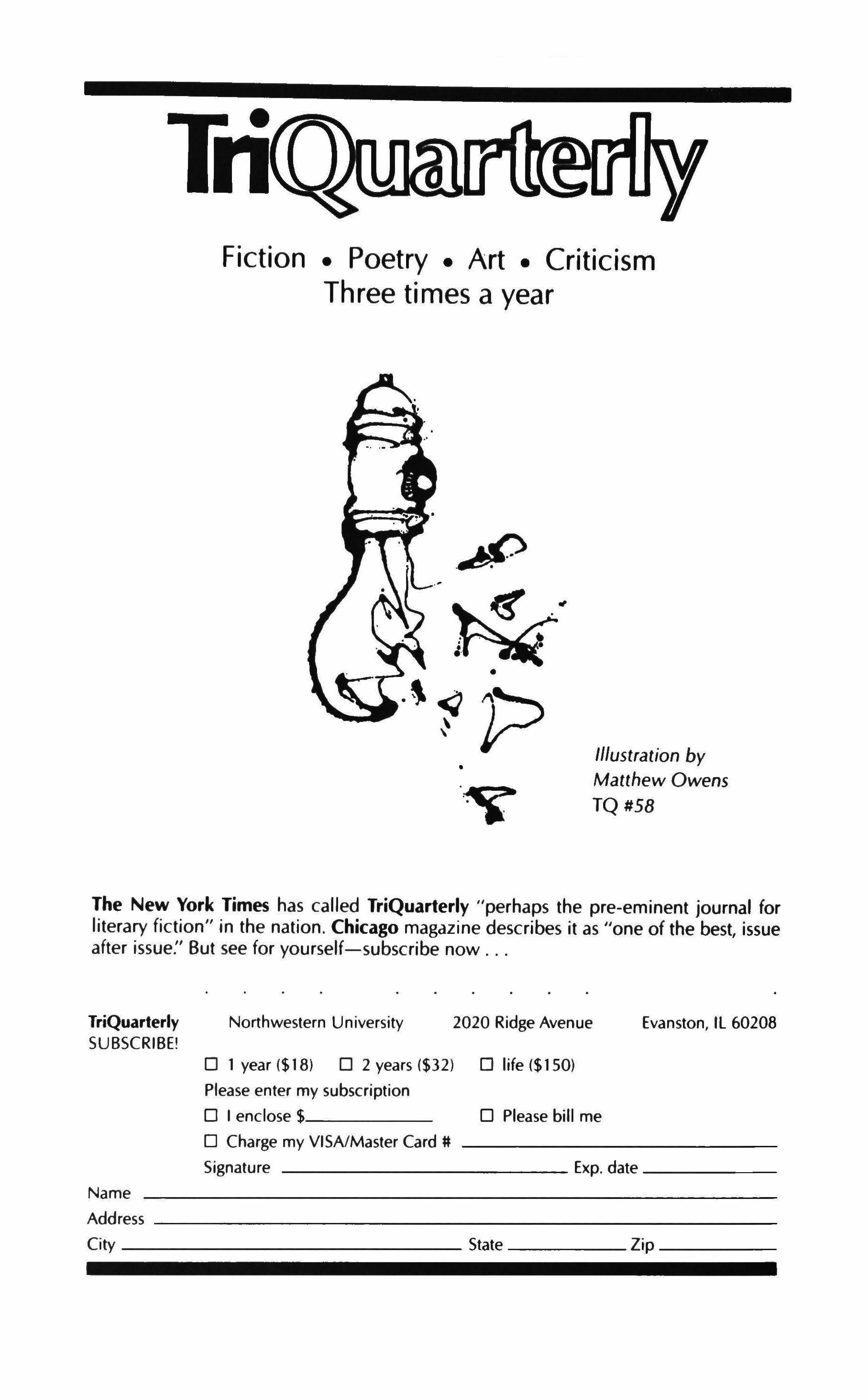
Illustration by Matthew Owens TQ#58
The New York Times has called TriQuarterly "perhaps the pre-eminent journal for literary fiction" in the nation. Chicago magazine describes it as "one of the best, issue after issue:' But see for yourself-subscribe now
TriQuarterly SUBSCRIBE! Northwestern University 2020 Ridge Avenue Evanston, IL
o 1 year ($18) 0 2 years ($32) 0 life ($150)
Please enter my subscription
o I enclose $.
o Charge my VISNMaster Card 1*
o Please bill me
Signature Exp. date
Name
Fiction
JP ��/., i� P .�
60208
Address City State Zip
Mr. and Mrs. Solway F. Firestone
Fred S. Novy
Mn. Larry Shinddman
David C. Abercrombie
Amin Alimard
Lois Arnes
Sandy Andenon
Richard H. Anderson
Univemty of Arizona Poetry Center
Gayle Arnzen
Ala Baber
TomG. Bell
Carol Bly
Kay Bonetti
Robert Boruch
Van K. Brock
Gwendolyn Brooks
Timothy Browne
Paul Bundy
Eric O. Cahn
DavidC_k
Stephen Chapman
Anthony CIwe
Michael Chwe
Andrew Cyr
Kenneth Day
Mark W. DeBree
Mr. and Mrs. Lorentz de Haas
Alan Dilder
Anstios Drake
John B. Elliott
Christopher English
Carol Erickson
Steven Finch
David R. Fine
Mr. and Mrs. H. Bernard Firestone
Paul Fjelstad
Torrence Foesland
Helen and C. Dwiaht Foster
Mrs. Antela M. Gannon
Kathy M. Gam_
Lawrence J. Gorman
Maxine Groffaky
Rev. Dr. Elliott Hagle
Jack Haptrom
ROIl B. Heath
Charles Hedde
Donald Hey
Donald A. Hillel
Craig V. Hodson
Irwin L. Hoffman
Irwin T. Holtzman
P. Hosier
Charles Huas
Curtis Imrie
Helen Jacob
Del Ivan Janik
Dr. Alfred D. Klinler
Loy E. Knapp
Sydney Knowlton
Mr. and Mn. Carl A. Krach
Judy Kuru
Conrad A. Langenbera
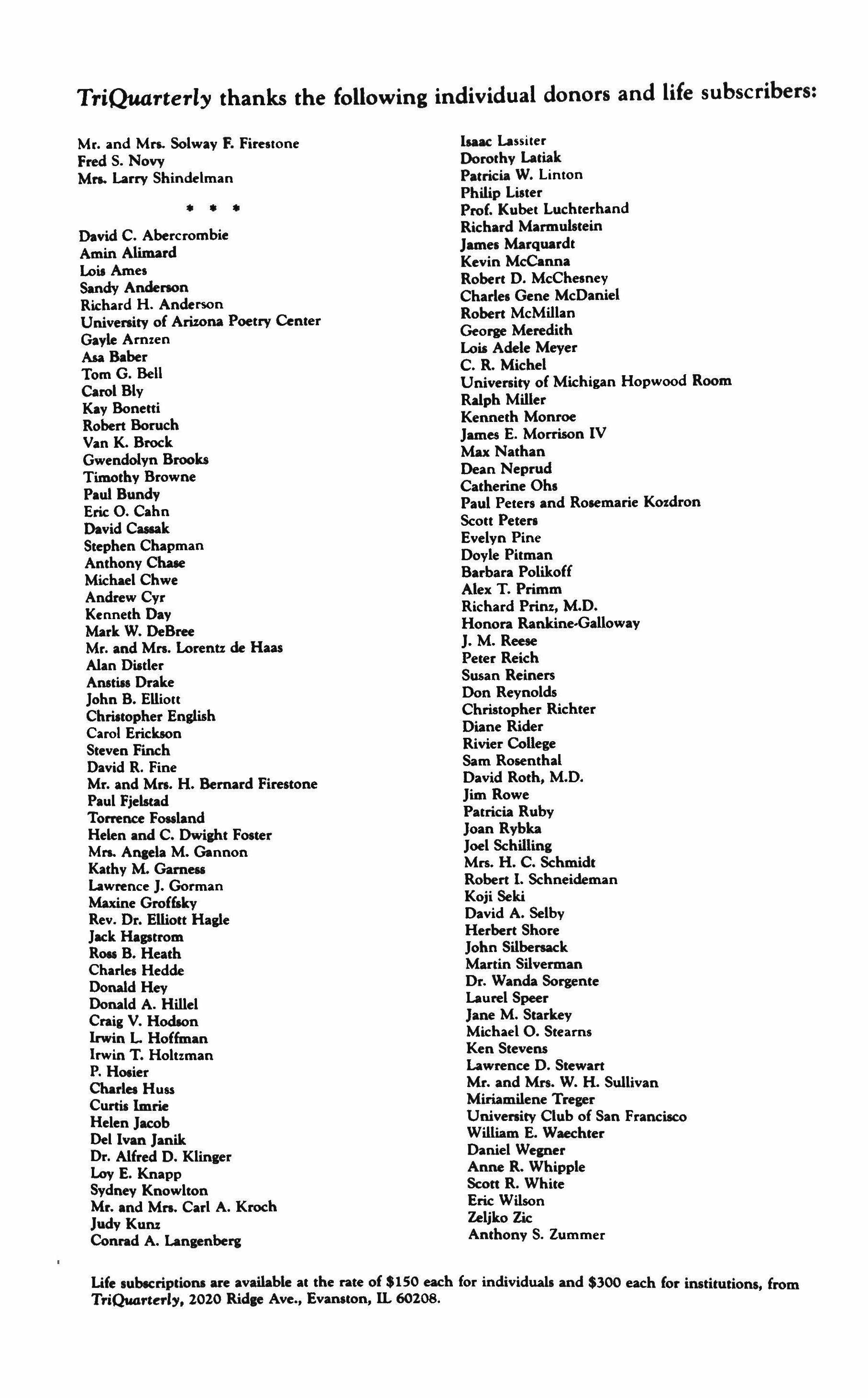
Isaac Lassiter
Dorothy Latiak
Patricia W. Linton
Philip Liot�r
Prof. Kubet Luchterhand
Richard Marmulstein
James Marquardt
Kevin McCanna
Robert D. McChemey
Charles Gene McDaniel
Robert McMillan
Geo� Meredith
Loil Adele Meyer
C. R. Michel
University of Michigan Hopwood Room
Ralph Miller
Kenneth Monroe
James E. Morrison IV
Max Nathan
Dean Neprud
Catherine Oh.
Paul Peters and Rosemarie Kozdron
Scott Peten
Evelyn Pine
Doyle Pitman
Barbara PolikoH
Alex T. Primm
Richard Prine, M.D.
Honora Rankine-Galloway
J. M. Reese
Peter Reich
Susan Reiners
Don Reynolds
Christopher Richter
Diane Rider
Rivier College
Sam Rosenthal
David Roth, M.D.
Jim Rowe
Patricia Ruby
Joan Rybka
Joel Schilling
Mrs. H. C. Schmidt
Robert I. Schneideman
Koji Seki
David A. Selby
Herbert Shore
John Silbenack
Martin Silverman
Dr. Wanda Sorgente
Laurel Speer
Jane M. Starkey
Michael O. Stearns
Ken Stevens
Lawrence D. Stewart
Mr. and Mrs. W. H. Sullivan
Miriamilene Tre�r
Univenity Club of San Francisco
William E. Waechter
Daniel Wesner
Anne R. Whipple
Scott R. White
Eric Wilson
Zeljko lie
Anthony S. Zummer
TTiQuaTteTly thanks the
life subscribers:
following individual donors and
•
uu ltutlon5,
Ufe subacripliom are available at the rate of $150 each for individuals and $300 each � f' f TriQuorlet"I" 2020 Ridge Ave., Evanston, lL 60208. or
rom





































































































































































































































